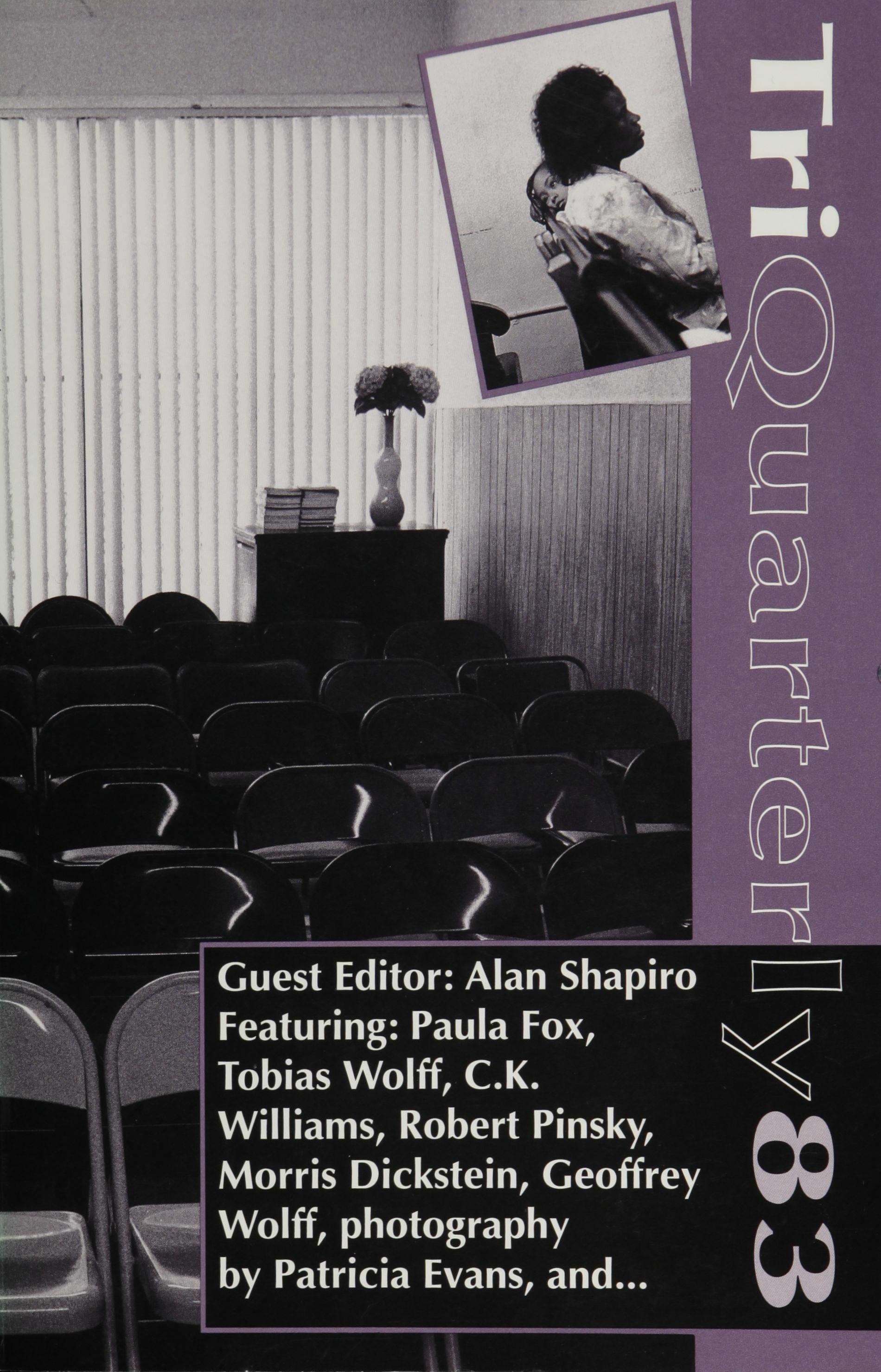
Publication of TriQuarterly is made possible in part by the donors of gifts and grants to the maga eine. For their recent and continuing support, we are very pleased to thank the Illinois Arts Council, the John D. and Catherine T. MacArthur Foundation, the National Endowment for the Arts and the Witter Bvnner Foundation for Poetry, Inc.
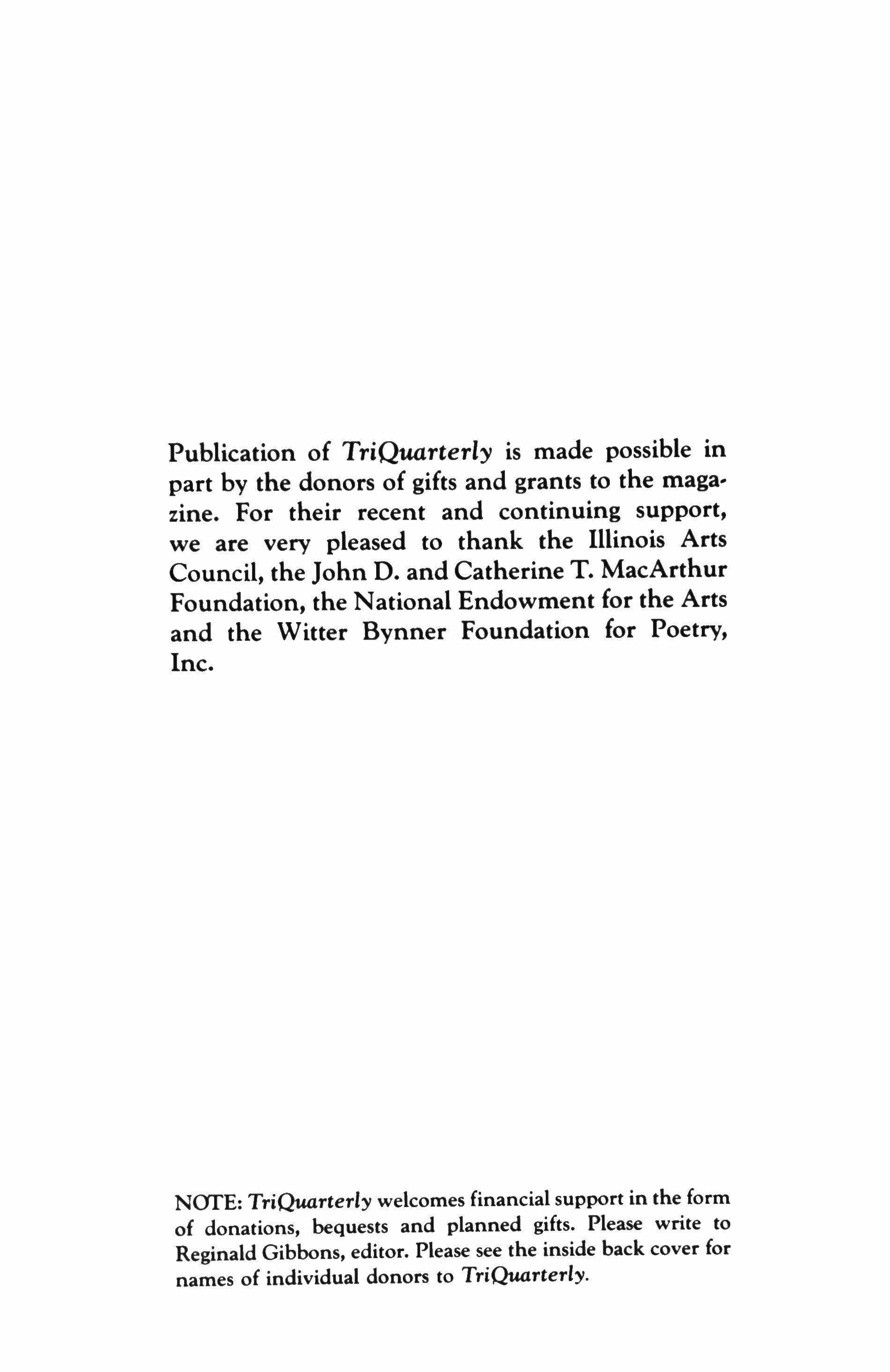
NOTE: TriQuarterly welcomes financial support in the form of donations, bequests and planned gifts. Please write to Reginald Gibbons, editor. Please see the inside back cover for names of individual donors to TriQuarterly.
Editor Reginald Gibbons
Managing Editor Kirstie Felland
Executive Editor Bob Perlongo
Special Projects Editor Fred Shafer
Readers
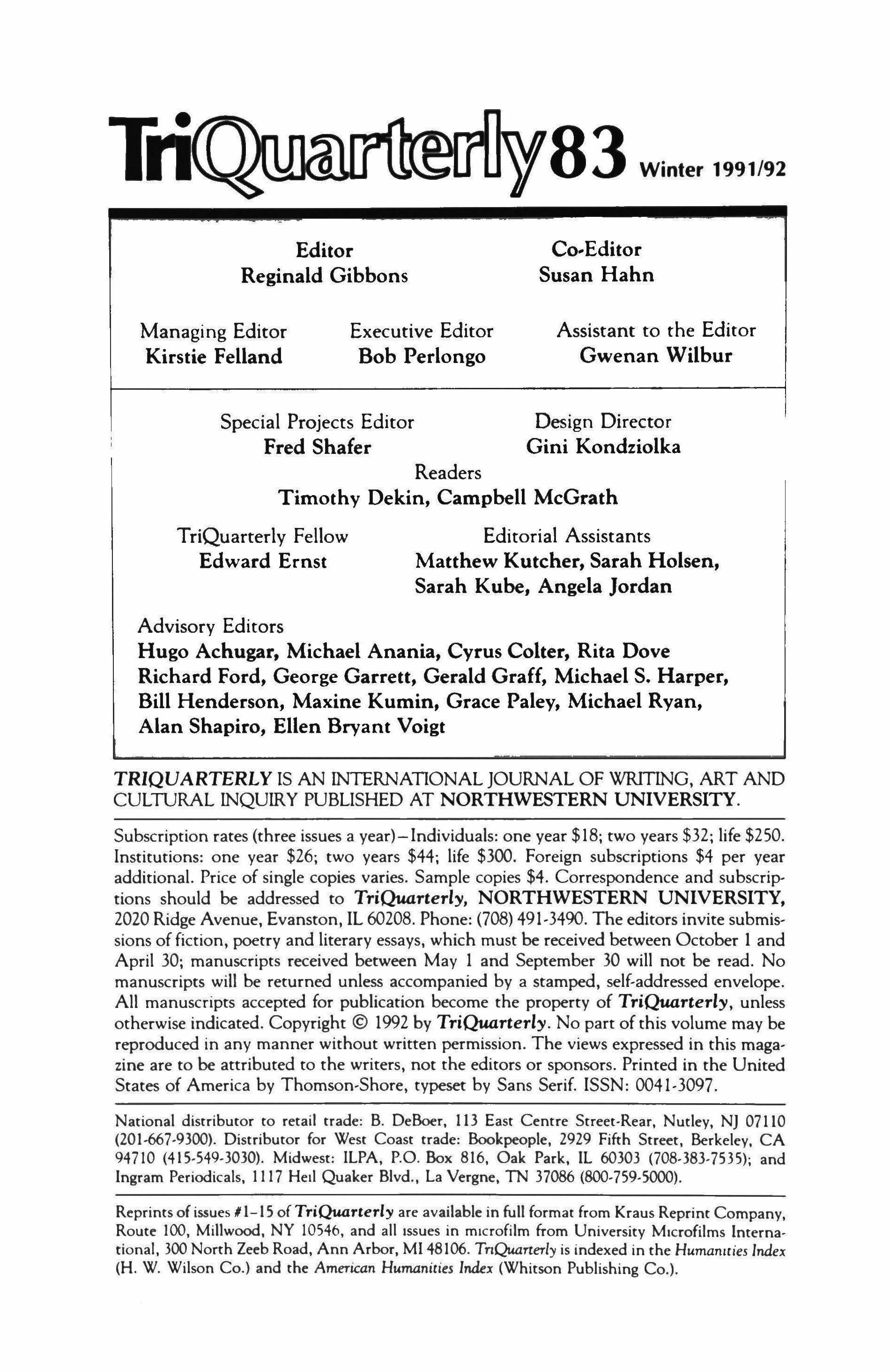
Winter 1991/92
Co-Editor Susan Hahn
Assistant to the Editor Gwenan Wilbur
Design Director Gini Kondziolka
Timothy Dekin, Campbell McGrath
TriQuarterly Fellow
Edward Ernst
Advisory Editors
Editorial Assistants
Matthew Kutcher, Sarah Holsen, Sarah Kube, Angela Jordan
Hugo Achugar, Michael Anania, Cyrus Colter, Rita Dove
Richard Ford, George Garrett, Gerald Graff, Michael S. Harper, Bill Henderson, Maxine Kumin, Grace Paley, Michael Ryan, Alan Shapiro, Ellen Bryant Voigt
TRIQUARTERLY IS AN INTERNATIONAL JOURNAL OF WRITING, ART AND CULTURAL INQUIRY PUBLISHED AT NORTHWESTERN UNIVERSITY.
Subscription rates (three issues a year)-IndividuaIs: one year $18; two years $32; life $250. Institutions: one year $26; two years $44; life $300. Foreign subscriptions $4 per year additional. Price of single copies varies. Sample copies $4. Correspondence and subscriptions should be addressed to TriQuarterly, NORTHWESTERN UNIVERSITY, 2020 Ridge Avenue, Evanston, IL 60208. Phone: (708) 491-3490. The editors invite submissions of fiction, poetry and literary essays, which must be received between October I and April 30; manuscripts received between May 1 and September 30 will not be read. No manuscripts will be returned unless accompanied by a stamped, self-addressed envelope. All manuscripts accepted for publication become the property of TriQuarterly, unless otherwise indicated. Copyright © 1992 by TriQuarterly. No part of this volume may be reproduced in any manner without written permission. The views expressed in this magazine are to be attributed to the writers, not the editors or sponsors. Printed in the United States of America by Thomson-Shore, typeset by Sans Serif. ISSN: 0041-3097.
National distributor to retail trade: B. DeBoer, 113 East Centre Street-Rear, Nutley, NJ 07110 (201-667-9300). Distributor for West Coast trade: Bookpeople, 2929 Fifth Street, Berkeley, CA 94710 (415-549-3030). Midwest: ILPA, P.O. Box 816, Oak Park, lL 60303 (708-383-7535); and Ingram Periodicals, 1117 Hell Quaker Blvd., La Vergne, TN 37086 (800-759-5000).
Reprints of issues # 1-15 of TTiQuaTteTly are available in full format from Kraus Reprint Company, Route 100, Millwood, NY 10546, and all Issues in microfilm from University MICrofilms International, 300 North Zeeb Road, Ann Arbor, MI 48106. TnQuaTterly is indexed in the Humanlties Index (H. W. Wilson Co.) and the American Humanities Index (Whitson Publishing Co.).
83
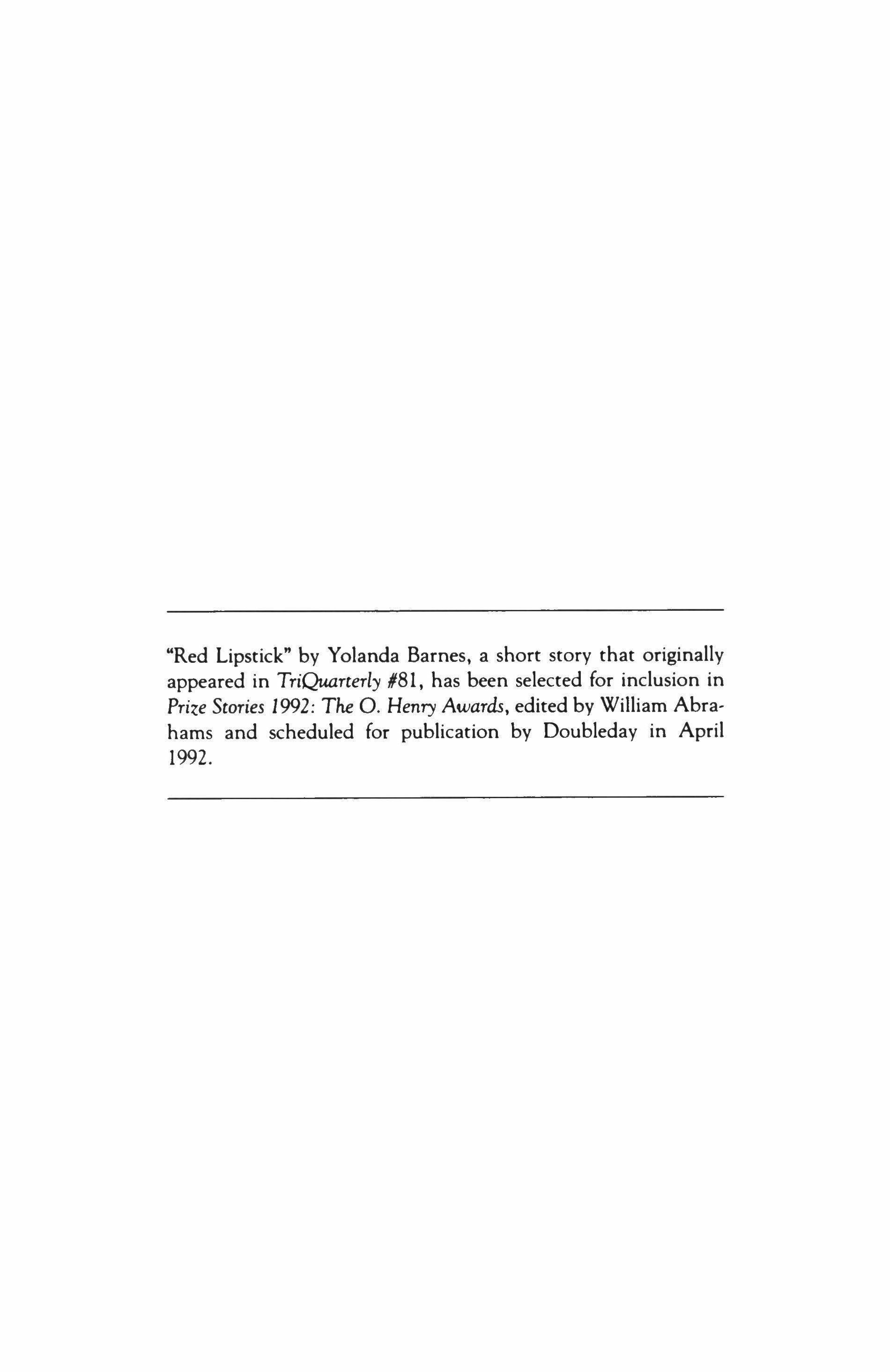
"Red Lipstick" by Yolanda Barnes, a short story that originally appeared in TriQuarterly #81, has been selected for inclusion in Prize Stories 1992: The O. Henry Awards, edited by William Abrahams and scheduled for publication by Doubleday in April 1992.

Guest Editor for this issue:
Alan Shapiro
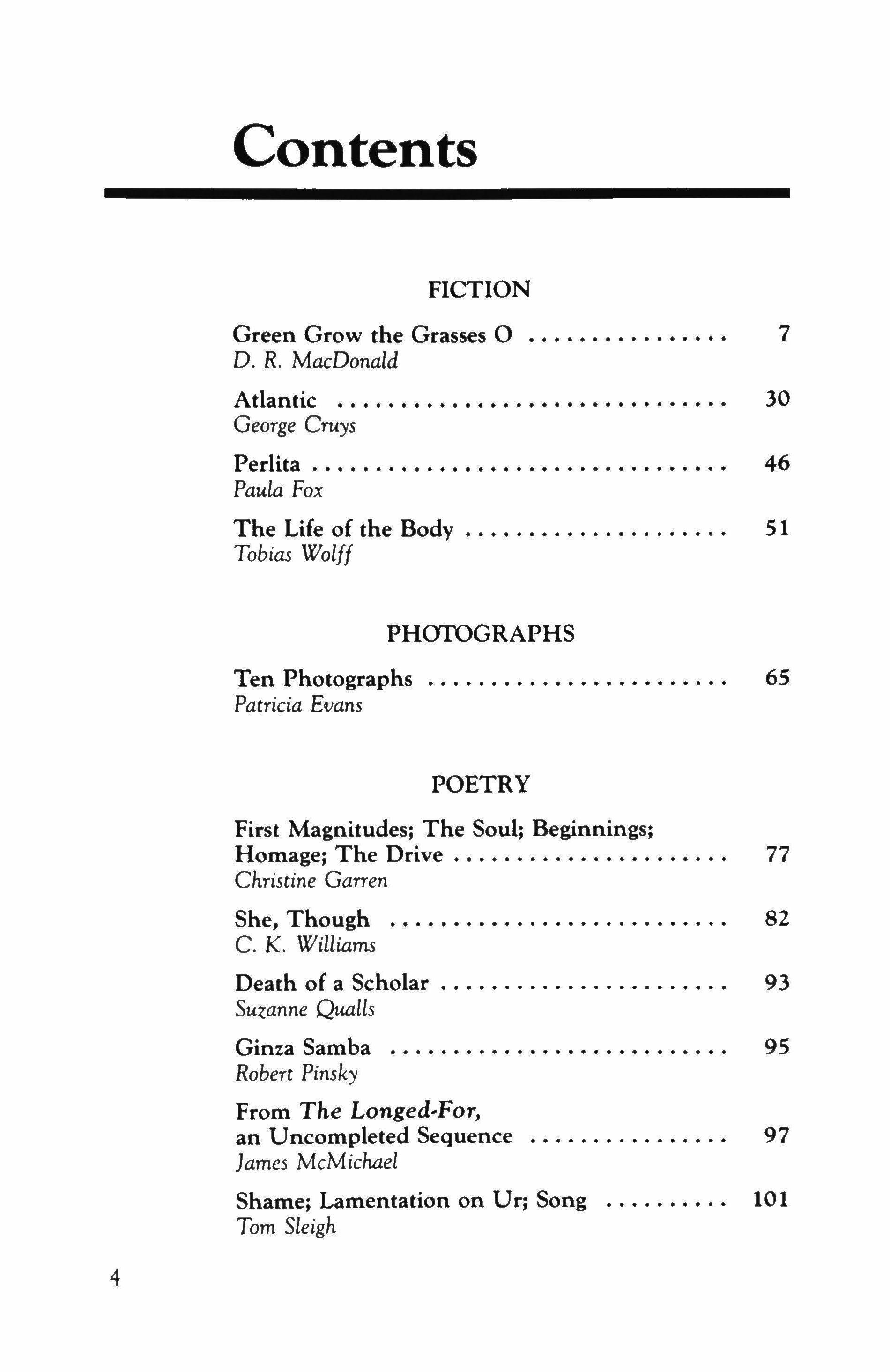
Contents FICTION Green Grow the Grasses 0 D. R. MacDonald Atlantic 30 7 George Cruys Perlita 46 Paula Fox The Life of the Body •.•• 51 Tobias Wolff PHOTOGRAPHS Ten Photographs Patricia Evans 65 POETRY First Magnitudes; The Soul; Beginnings; Homage; The Drive. 77 Christine Garren She, Though .••.•...................... 82 C. K. Williams Death of a Scholar 93 Suzanne Qualls Ginza Samba 95 Robert Pinsky From The Longed-For, an Uncompleted Sequence 97 James McMichael Shame; Lamentation on Uri Song Tom Sleigh 101 4
Ghost Ship
Mary Kinzie
Shadowfall
K. Reynolds Dixon
Abandoned Farm Grave; The Moon Is Made; The Taxidermist; Romantic Fever 115
Claudia Emerson Andrews
Late Arrival; From "Elijah" •. 119
Paul Breslin
Buddy's Corner; Saturday Afternoon; Self,Portrait; Reading Ovid 123
W. S. t» Piero
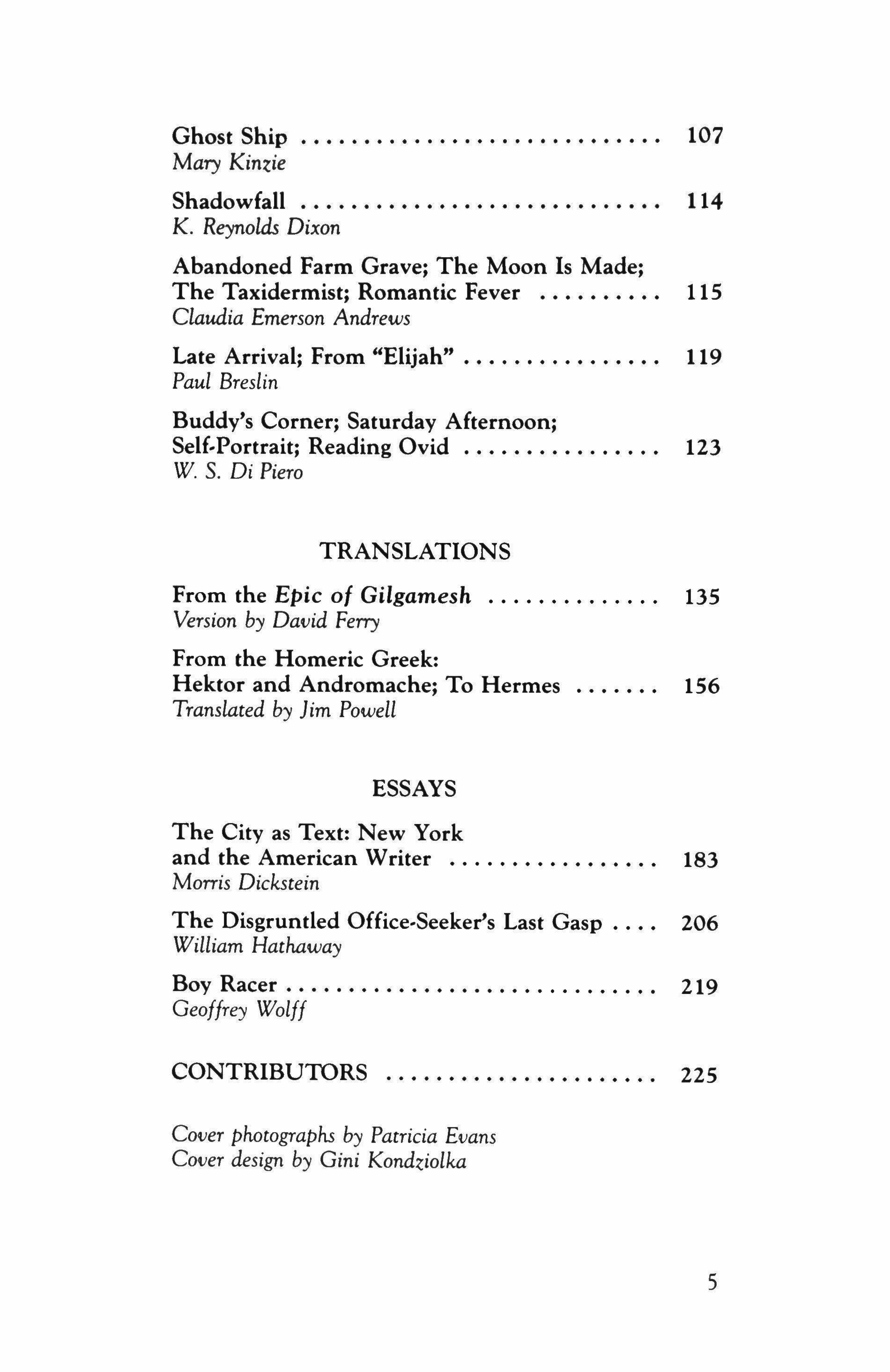
TRANSLATIONS
From the Epic of Gilgamesh Version by David Ferry
From the Homeric Greek: Hektor and Andromache; To Hermes
Translated by ]im Powell
ESSAYS
The City as Text: New York and the American Writer 183 Morris Dickstein
The Disgruntled Office-Seeker's Last Gasp 206 William Hathaway
Boy Racer 219 Geoffrey Wolff
CONTRIBUTORS 225
Cover photographs by Patricia Evans
Cover design by Gini Kondziolka
.••..••••••••......••......•• 114
107
135 156
5

Green Grow the Grasses 0
D. R. MacDonald

A suspicion had come down that Kenneth Munro was using dope in the house he rented above the road. "Harboring drugs" was the way Millie Patterson put it.
"I don't think he's that kind," Fiona Cameron said, in whose parlor Mr. Munro was being discussed. She had seen him coming and going, a thirtyish man with dark gray hair nearly to his shoulders. It was the only extravagant thing about him, how the wind would gust it across his eyes. He had left St. Aubin as a tot and returned suddenly now for reasons unclear.
"Drinking's one thing," Millie said. "But this."
"This what?" Fiona said. She was curious about him too, but in a different way. And Kenneth Munro, after all, was not just any outsider. His family was long gone but still remembered.
After some coaxing, Lloyd David, Millie's son, described how Munro's kitchen had been full of the smell the day he'd dropped by to cut the high wild grass out front. "There's no other smell like it," he said.
This expertise got him a hot glance from his mother. Millie missed no opportunity to point up the evils of drugs.
"But Millie," Fiona said, "a smell in his kitchen is hardly criminal."
"Fiona dear, you have no idea." Millie, a nurse for twenty-six years, recalled with horror a young man the Mounties brought into the emergency ward last winter: "In that weather, crawling down the highway in his undershorts, barking like a dog." Lloyd David chuckled, then caught himself. "He was that cold," Millie went on, "he was blue." She paused. "Marijuana." But the word came out of her mouth erotically rounded somehow, lush and foreign.
"But we hardly know Kenneth Munro," Fiona said. She knew he often
7

stood shirtless on his little front porch late in the morning, stretching his limbs. He'd just got up, it was plain to see. He was brown from the sun, though he'd brought the brown with him. Fiona could not imagine him crawling along a highway or barking either. What she could imagine she was not likely to admit. She was from the Isle of Harris in the Outer Hebrides but had lived in Cape Breton all her married life, nearly twenty years. Her eyes were an unusual pale green, peppered with colors you couldn't pin down, and they looked merry even when she was not. No, Millie would not easily let go of this matter. Kenneth Munro. And drugs. They had come to Cape Breton like everywhere else, and of course people saw on TV what drugs out there in the world could do. Marijuana? Just a hair's breadth from heroin, in Millie's eyes, whereas alcohol was as familiar as the weather. Hadn't there been a nasty murder over in Sydney where two kids on drugs stabbed an old man for his money? That shook everyone, murder being rare among Cape Bretoners, despite a reputation for lesser violence. Fiona glanced out the front window: she hadn't seen Munro all day. His bedroom window was flung high and the curtains, green as June grass, whipped in the wind.
"He's got a telescope in the backyard," Lloyd David said.
"What's he up to?" Millie said.
"Well, that's the point." Fiona took a sip of tea. It was cool. "We can't say."
"He seems like a nice fella." Harald, Fiona's husband, had come in from haying and stood stout and perspiring in his overalls. "Fiona's right," he said from the doorway. "Yesterday he was asking me about the bobolinks."
"About the what?" Millie said.
"Birds, Ma. Tweet tweet?"
She glared at her son: she hated his Oakland Raiders T-shirt with the insolent pirate face on the front.
"Well," Fiona said. "He's just over the road. We'll have to find out about him. Harald, won't we?"
"You be the detective, girl."
At a table by the west window of the Sealladh Na Mara Restaurant Kenneth Munro took in the postcard view. Whatever he saw he measured against the descriptions his father had given him years ago. He could see a good portion of Goose Cove and the mountain behind it whose profile darkened the water this time of the afternoon, calming the bay. Terns squabbled on a sandy bar. The waitress, whom he fancied and who, he felt, was ready for a move, came up behind him, her slender
8

figure reflected in the glass. In her unflattering uniform - a bland aqua, the hem too long-she seemed all the more pretty. She'd worn her fine brown hair unfashionably long down her back when he had seen her walking along the road, but now it was clasped in a bun.
"Ginny, suppose I was to take you to dinner some night soon? In Sydney?"
"Oh, I don't know. You're older than I am, by more than a bit." Ginny had graduated from McGill this summer and was back home, pondering her future. She loved the country she'd grown up in but knew she would work in a big city before long.
"I can't deny it," Munro said. "I'm up in years. I expect your parents wouldn't approve."
"No. No, they wouldn't much. And they've always known just about everything I've done around here." She looked over at two elderly women picking daintily at their lobster salads. "There's no need they should keep on knowing."
"l'll get you home early," he said. "Early as you like."
"I suppose we could. I'm thinking we might." She went off to another table and stood with her back to him. Munro drank from his water glass, running the ice around his tongue, and smiled comfortably at the immobile brilliance of the bay, its surface inked in shadow.
That was the kind of light he imagined in his special afternoon, an ambience like that.
They ate in a steakhouse too open and noisy, but after a bottle of wine they talked freely in raised voices, discovering that they might be distantly related through a great-grandmother, and that brought them a few inches closer. Munro told her about his carpentry work in San Francisco, cabinetmaking and remodeling, and how he liked working for gays because they paid him well and were particular. Ginny told him about Montreal and how she always tried to speak French there because she got to know the people. She asked him why he was living alone over there in St. Aubin with hay and woods all around him.
"Only for awhile," Munro said. He took a photograph out of his coat and laid it on the white tablecloth, moving his face closer to hers. "That man there is my father, Ginny. The women I don't know."
"I'd say they like him, eh?"
"Something more than that going on. Look at his face."
"Is he your age there, your dad?" "About."
"I like your gray hair. It's a bit long. His looks black."
9
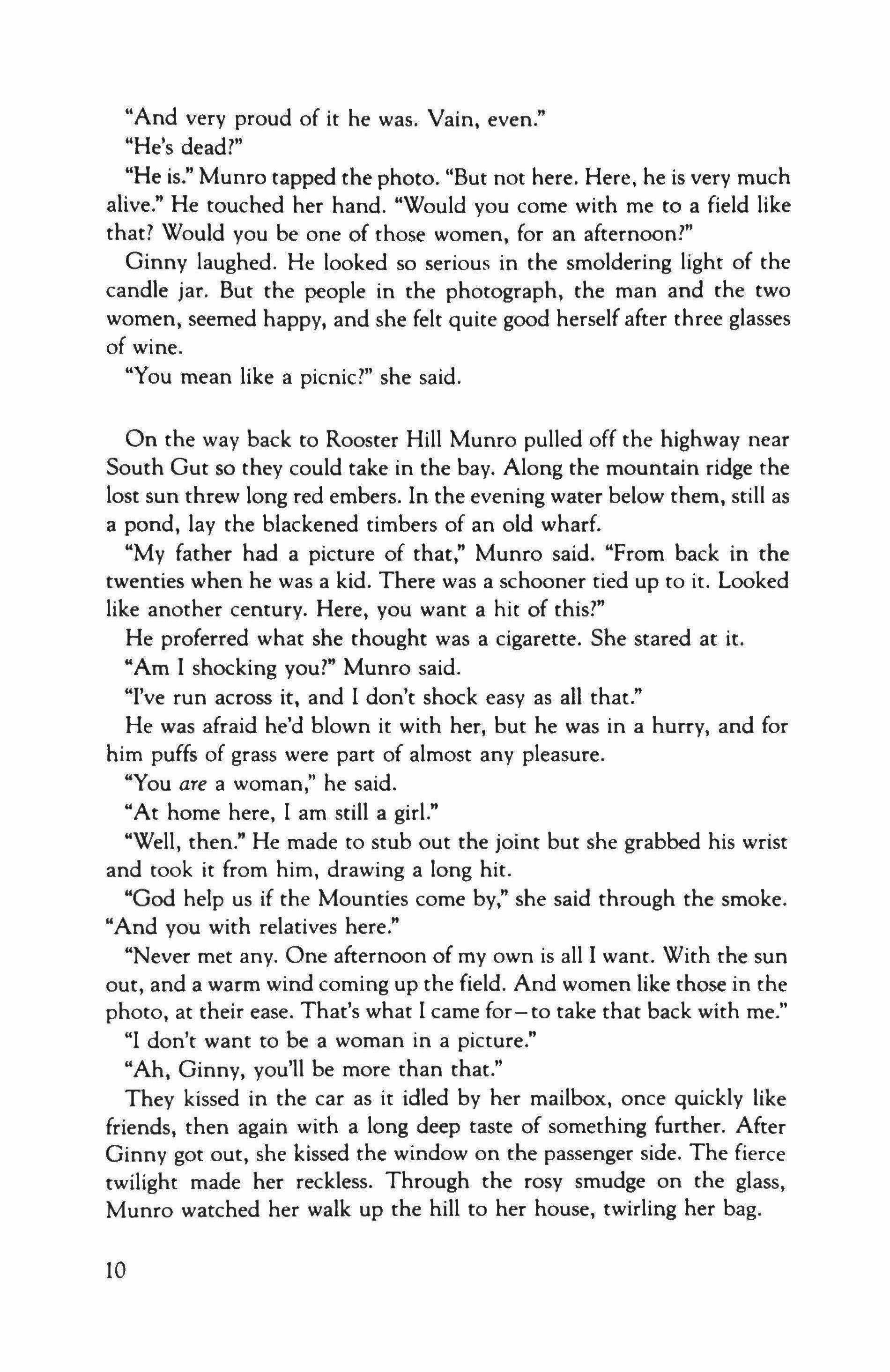
"And very proud of it he was. Vain, even."
"He's dead?"
"He is." Munro tapped the photo. "But not here. Here, he is very much alive." He touched her hand. "Would you come with me to a field like that? Would you be one of those women, for an afternoon?"
Ginny laughed. He looked so serious in the smoldering light of the candle jar. But the people in the photograph, the man and the two women, seemed happy, and she felt quite good herself after three glasses of wine.
"You mean like a picnic?" she said.
On the way back to Rooster Hill Munro pulled off the highway near South Gut so they could take in the bay. Along the mountain ridge the lost sun threw long red embers. In the evening water below them, still as a pond, lay the blackened timbers of an old wharf.
"My father had a picture of that," Munro said. "From back in the twenties when he was a kid. There was a schooner tied up to it. Looked like another century. Here, you want a hit of this?"
He proferred what she thought was a cigarette. She stared at it.
"Am 1 shocking you?" Munro said.
"I've run across it, and 1 don't shock easy as all that."
He was afraid he'd blown it with her, but he was in a hurry, and for him puffs of grass were part of almost any pleasure.
"You are a woman," he said.
"At home here, 1 am still a girl."
"Well, then." He made to stub out the joint but she grabbed his wrist and took it from him, drawing a long hit.
"God help us if the Mounties come by," she said through the smoke. "And you with relatives here."
"Never met any. One afternoon of my own is all 1 want. With the sun out, and a warm wind coming up the field. And women like those in the photo, at their ease. That's what 1 came for-to take that back with me."
"I don't want to be a woman in a picture."
"Ah, Ginny, you'll be more than that."
They kissed in the car as it idled by her mailbox, once quickly like friends, then again with a long deep taste of something further. After Ginny got out, she kissed the window on the passenger side. The fierce twilight made her reckless. Through the rosy smudge on the glass, Munro watched her walk up the hill to her house, twirling her bag.
10
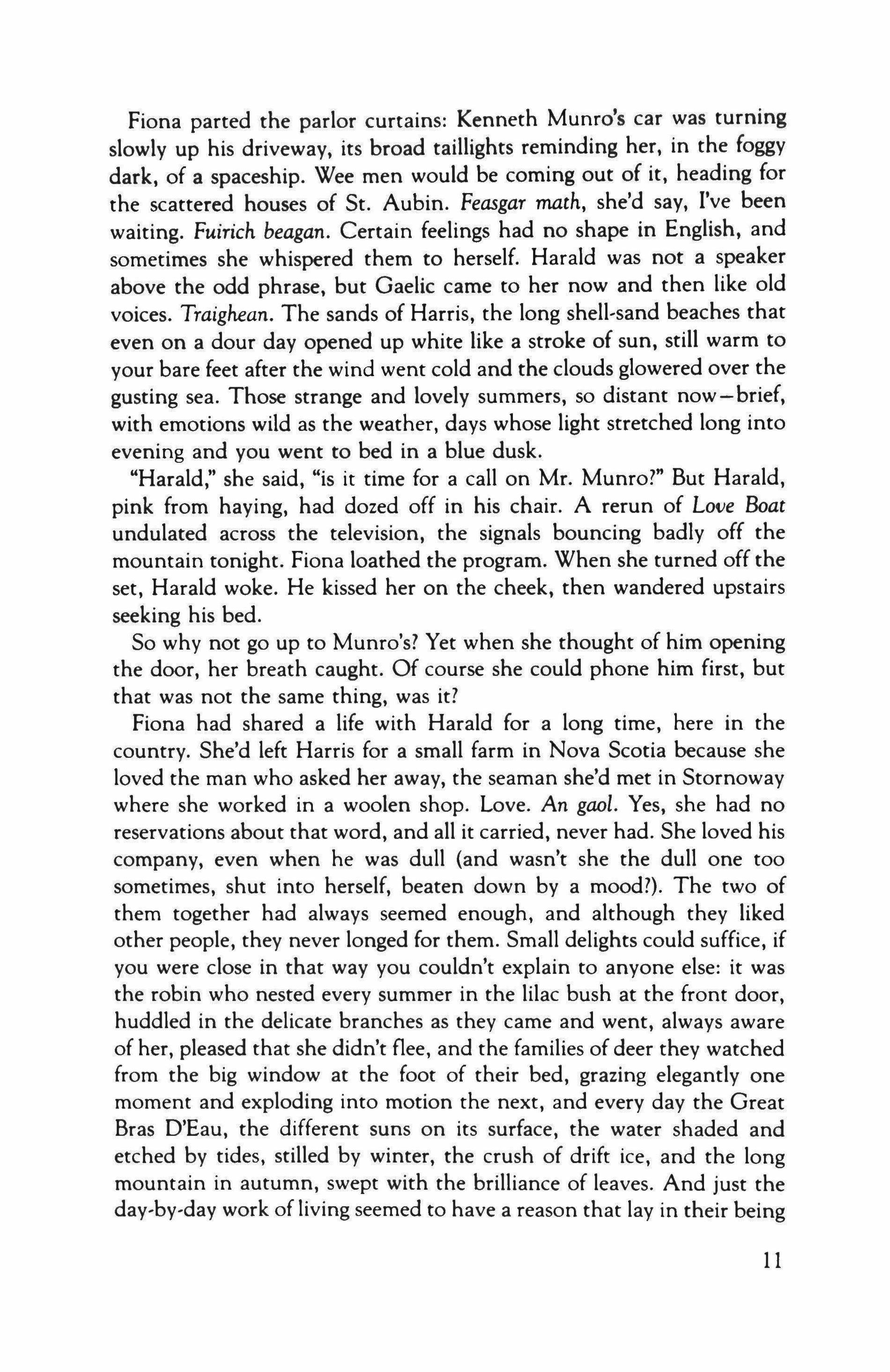
Fiona parted the parlor curtains: Kenneth Munro's car was turning slowly up his driveway, its broad taillights reminding her, in the foggy dark, of a spaceship. Wee men would be coming out of it, heading for the scattered houses of St. Aubin. Feasgar math, she'd say, I've been waiting. Fuirich beagan. Certain feelings had no shape in English, and sometimes she whispered them to herself. Harald was not a speaker above the odd phrase, but Gaelic came to her now and then like old voices. Traighean. The sands of Harris, the long shell-sand beaches that even on a dour day opened up white like a stroke of sun, still warm to your bare feet after the wind went cold and the clouds glowered over the gusting sea. Those strange and lovely summers, so distant now-brief, with emotions wild as the weather, days whose light stretched long into evening and you went to bed in a blue dusk.
"Harald," she said, "is it time for a call on Mr. Munro?" But Harald, pink from haying, had dozed off in his chair. A rerun of Love Boat undulated across the television, the signals bouncing badly off the mountain tonight. Fiona loathed the program. When she turned off the set, Harald woke. He kissed her on the cheek, then wandered upstairs seeking his bed.
So why not go up to Munro's? Yet when she thought of him opening the door, her breath caught. Of course she could phone him first, but that was not the same thing, was it?
Fiona had shared a life with Harald for a long time, here in the country. She'd left Harris for a small farm in Nova Scotia because she loved the man who asked her away, the seaman she'd met in Stornoway where she worked in a woolen shop. Love. An gaol. Yes, she had no reservations about that word, and all it carried, never had. She loved his company, even when he was dull (and wasn't she the dull one too sometimes, shut into herself, beaten down by a mood?). The two of them together had always seemed enough, and although they liked other people, they never longed for them. Small delights could suffice, if you were close in that way you couldn't explain to anyone else: it was the robin who nested every summer in the lilac bush at the front door, huddled in the delicate branches as they came and went, always aware of her, pleased that she didn't flee, and the families of deer they watched from the big window at the foot of their bed, grazing elegantly one moment and exploding into motion the next, and every day the Great Bras D'Eau, the different suns on its surface, the water shaded and etched by tides, stilled by winter, the crush of drift ice, and the long mountain in autumn, swept with the brilliance of leaves. And just the day-by-day work of living seemed to have a reason that lay in their being
11

together, but they could never have said what it was. A meal, a task, a domestic calamity-who could say what made them glad for having it? They talked about some things, but left most unsaid. She loved what? Harald's presence? Was that the word, liuhair? In some way that no one else could embrace? It was like a bit of music that was always there, behind everything, often too faint to be noticed, but there, and sometimes powerful. He knew her, and he loved her, without question. She had not yearned for any different thing between them.
Yet something shocked her out of sleep now and then, her heart galloping hard until the dream yielded to the bedroom, to the familiar window, and she knew again where she was. An impossible longing came on as she lay there in the dark, whether was there a bright moon out, or snow raging or flickering down, or a deep rain drumming on her nerves as she waited for thunder. Harald would mutter on in his own dreams. She wondered if they were anything like her own. He never said. And why anyway? They were his, he needed them. But in some dreams, she made another man care about her: his attentions were utterly new and like that first keen love when everything is on the tips of your fingers. Each time, in whatever dream place, the feeling was the same: rich in sensation, strange, like none she knew in her waking life, and there were no words for it in Gaelic or English either.
Munro's front light burned in the fog, a gathering coolness on her skin. In Harris as a girl, mists had sometimes frightened her because of the tales she'd heard and because sights would suddenly appear in her path, ambiguous shapes in a gray sea, and as she approached Munro's house, she thought maybe that was why he looked out his window a moment before disappearing from it fast. She rapped on his door. What had she seemed like to him? A specter? Tannasg? He was slow to answer. She stamped her feet lightly though the wind was not cold.
"Did I scare you?" she said, pleased to have that edge.
"I don't get many callers, not at night. Mrs. Cameron is it?"
He looked tense but he ushered her inside, smiling. There was an odd smoke in the air and she blushed.
"Am I interrupting you? Harald's asleep. Tired to the bone." Was she rattling on?
"Something to drink?" he said. "Rum and ginger ale maybe?"
"Well I think I will. A wee one. Thank you."
Munro pryed an ice tray from his snowy freezer, scattering frost on the floor. He jabbered on about bobolinks in the hayfield. Wouldn't the tractor mow through their nests, the females drab but the males decked
12
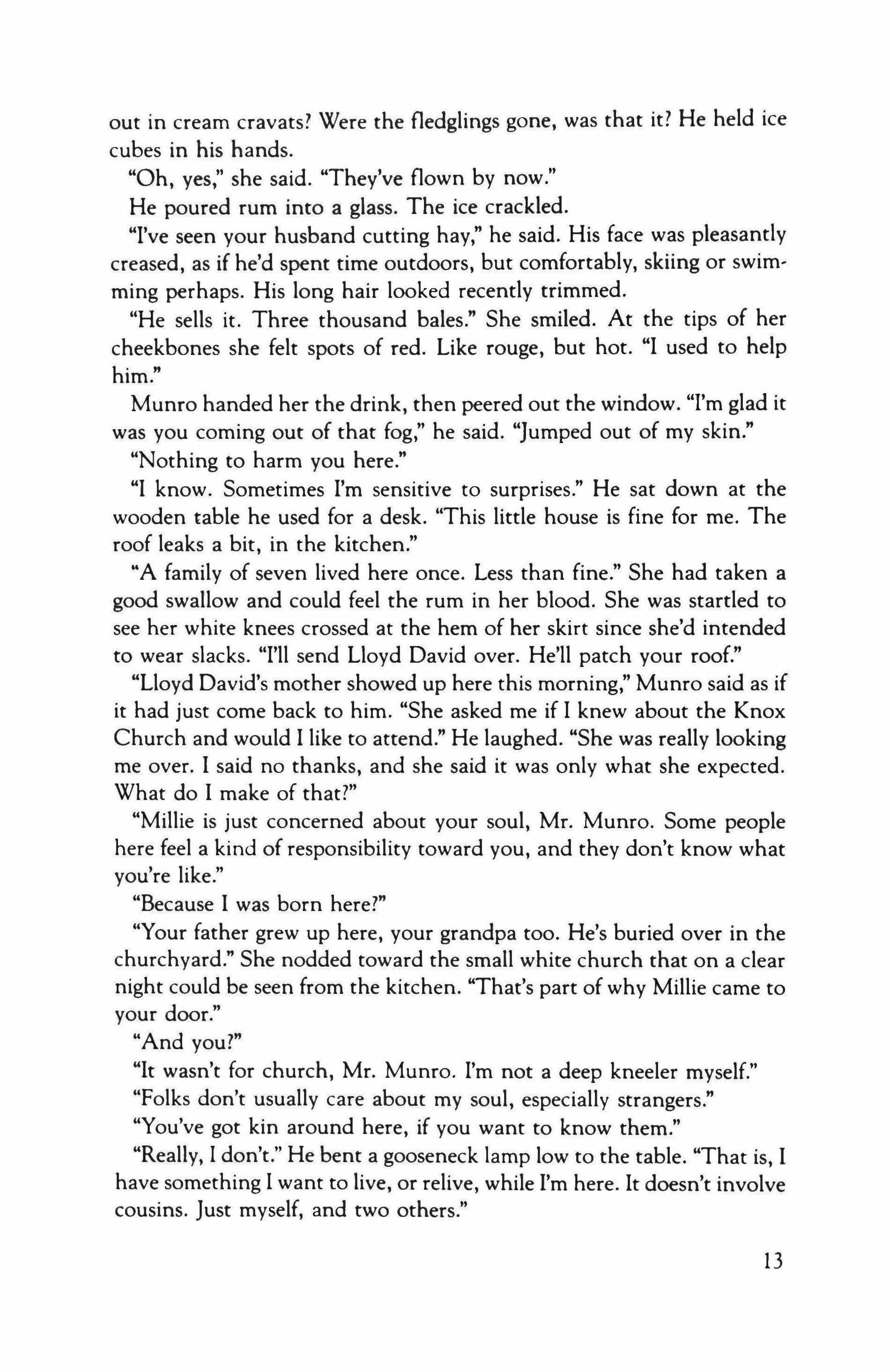
out in cream cravats! Were the fledglings gone, was that it! He held ice cubes in his hands.
"Oh, yes," she said. "They've flown by now."
He poured rum into a glass. The ice crackled.
"I've seen your husband cutting hay," he said. His face was pleasantly creased, as if he'd spent time outdoors, but comfortably, skiing or swimming perhaps. His long hair looked recently trimmed.
"He sells it. Three thousand bales." She smiled. At the tips of her cheekbones she felt spots of red. Like rouge, but hot. "I used to help him."
Munro handed her the drink, then peered out the window. "I'm glad it was you coming out of that fog," he said. "Jumped out of my skin."
"Nothing to harm you here."
"I know. Sometimes I'm sensitive to surprises." He sat down at the wooden table he used for a desk. "This little house is fine for me. The roof leaks a bit, in the kitchen."
A family of seven lived here once. Less than fine." She had taken a good swallow and could feel the rum in her blood. She was startled to see her white knees crossed at the hem of her skirt since she'd intended to wear slacks. "I'll send Lloyd David over. He'll patch your roof."
"Lloyd David's mother showed up here this morning," Munro said as if it had just come back to him. "She asked me if I knew about the Knox Church and would I like to attend." He laughed. "She was really looking me over. I said no thanks, and she said it was only what she expected. What do I make of that?"
"Millie is just concerned about your soul, Mr. Munro. Some people here feel a kind of responsibility toward you, and they don't know what you're like."
"Because I was born here?"
"Your father grew up here, your grandpa too. He's buried over in the churchyard." She nodded toward the small white church that on a clear night could be seen from the kitchen. "That's part of why Millie came to your door."
"And you?"
"It wasn't for church, Mr. Munro. I'm not a deep kneeler myself."
"Folks don't usually care about my soul, especially strangers."
"You've got kin around here, if you want to know them."
"Really, I don't." He bent a gooseneck lamp low to the table. "That is, I have something I want to live, or relive, while I'm here. It doesn't involve cousins. Just myself, and two others."
13
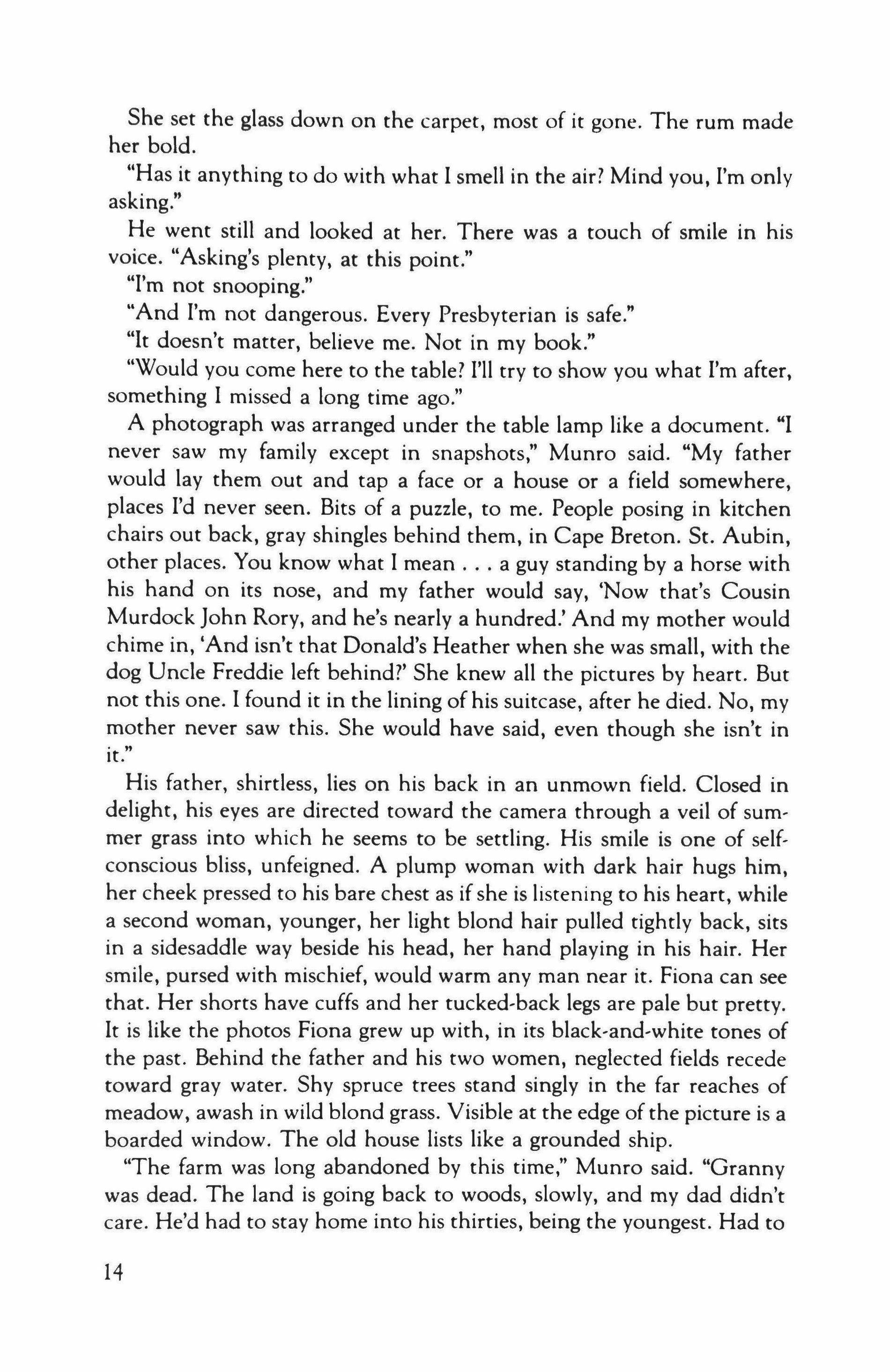
She set the glass down on the carpet, most of it gone. The rum made her bold.
"Has it anything to do with what I smell in the air? Mind you, I'm only asking."
He went still and looked at her. There was a touch of smile in his voice. "Asking's plenty, at this point."
"I'm not snooping."
"And I'm not dangerous. Every Presbyterian is safe."
"It doesn't matter, believe me. Not in my book."
"Would you come here to the table? I'll try to show you what I'm after, something I missed a long time ago."
A photograph was arranged under the table lamp like a document. "I never saw my family except in snapshots," Munro said. "My father would lay them out and tap a face or a house or a field somewhere, places I'd never seen. Bits of a puzzle, to me. People posing in kitchen chairs out back, gray shingles behind them, in Cape Breton. St. Aubin, other places. You know what I mean a guy standing by a horse with his hand on its nose, and my father would say, 'Now that's Cousin Murdock John Rory, and he's nearly a hundred.' And my mother would chime in, 'And isn't that Donald's Heather when she was small, with the dog Uncle Freddie left behind?' She knew all the pictures by heart. But not this one. I found it in the lining of his suitcase, after he died. No, my mother never saw this. She would have said, even though she isn't in it."
His father, shirtless, lies on his back in an unmown field. Closed in delight, his eyes are directed toward the camera through a veil of summer grass into which he seems to be settling. His smile is one of selfconscious bliss, unfeigned. A plump woman with dark hair hugs him, her cheek pressed to his bare chest as if she is listening to his heart, while a second woman, younger, her light blond hair pulled tightly back, sits in a sidesaddle way beside his head, her hand playing in his hair. Her smile, pursed with mischief, would warm any man near it. Fiona can see that. Her shorts have cuffs and her tucked-back legs are pale but pretty. It is like the photos Fiona grew up with, in its black-and-white tones of the past. Behind the father and his two women, neglected fields recede toward gray water. Shy spruce trees stand singly in the far reaches of meadow, awash in wild blond grass. Visible at the edge of the picture is a boarded window. The old house lists like a grounded ship.
"The farm was long abandoned by this time," Munro said. "Granny was dead. The land is going back to woods, slowly, and my dad didn't care. He'd had to stay home into his thirties, being the youngest. Had to
14
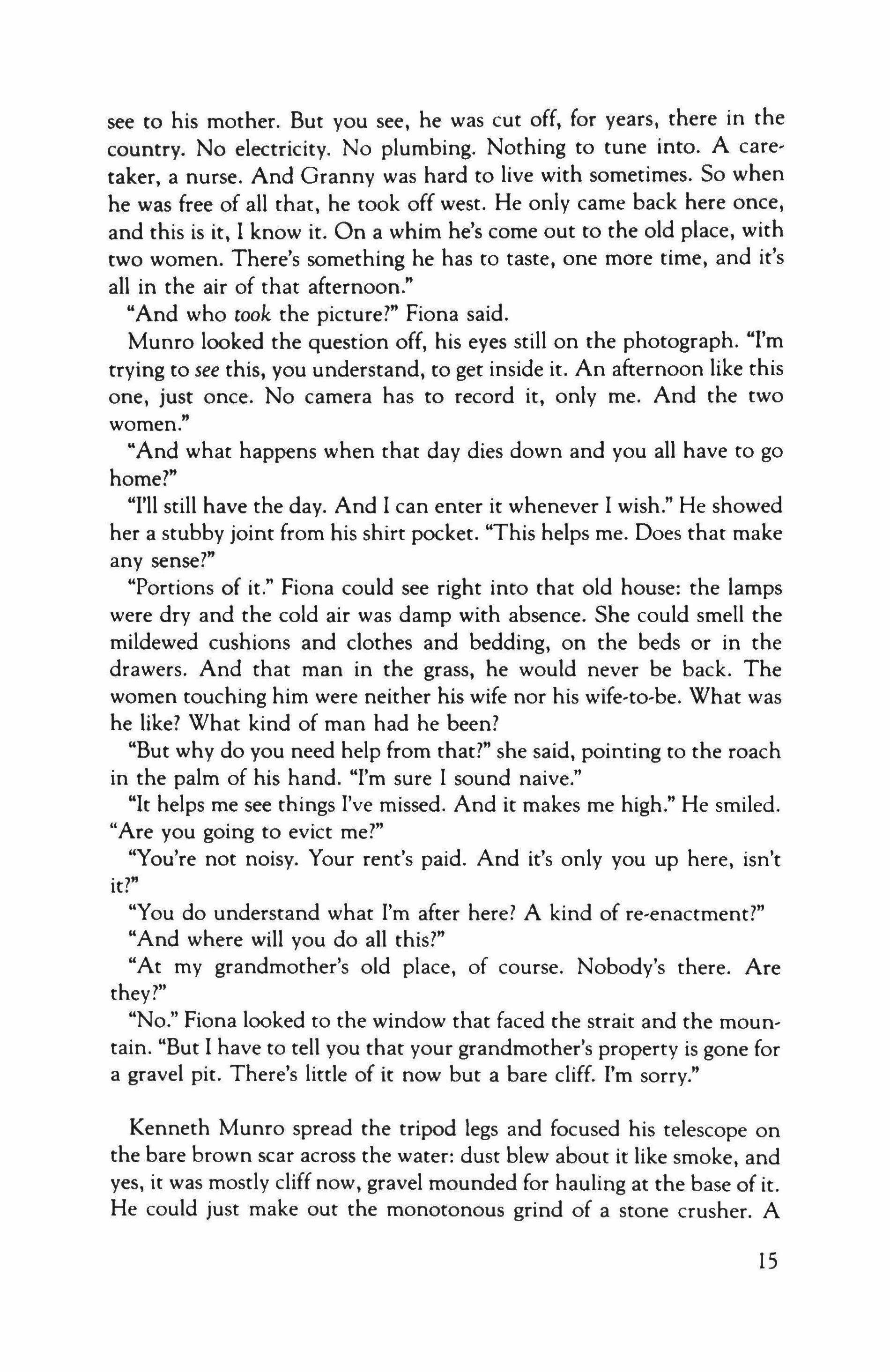
see to his mother. But you see, he was cut off, for years, there in the country. No electricity. No plumbing. Nothing to tune into. A caretaker, a nurse. And Granny was hard to live with sometimes. So when he was free of all that, he took off west. He only came back here once, and this is it, I know it. On a whim he's come out to the old place, with two women. There's something he has to taste, one more time, and it's all in the air of that afternoon."
"And who took the picture?" Fiona said. Munro looked the question off, his eyes still on the photograph. "I'm trying to see this, you understand, to get inside it. An afternoon like this one, just once. No camera has to record it, only me. And the two women."
And what happens when that day dies down and you all have to go home?"
"I'll still have the day. And I can enter it whenever I wish." He showed her a stubby joint from his shirt pocket. "This helps me. Does that make any sense?"
"Portions of it." Fiona could see right into that old house: the lamps were dry and the cold air was damp with absence. She could smell the mildewed cushions and clothes and bedding, on the beds or in the drawers. And that man in the grass, he would never be back. The women touching him were neither his wife nor his wife-to-be. What was he like? What kind of man had he been?
"But why do you need help from that?" she said, pointing to the roach in the palm of his hand. "I'm sure I sound naive."
"It helps me see things I've missed. And it makes me high." He smiled. "Are you going to evict me?"
"You're not noisy. Your rent's paid. And it's only you up here, isn't It.7"
"You do understand what I'm after here? A kind of re-enactment?"
"And where will you do all this?"
"At my grandmother's old place, of course. Nobody's there. Are they?"
"No." Fiona looked to the window that faced the strait and the mountain. "But I have to tell you that your grandmother's property is gone for a gravel pit. There's little of it now but a bare cliff. I'm sorry."
Kenneth Munro spread the tripod legs and focused his telescope on the bare brown scar across the water: dust blew about it like smoke, and yes, it was mostly cliff now, gravel mounded for hauling at the base of it. He could just make out the monotonous grind of a stone crusher. A
15
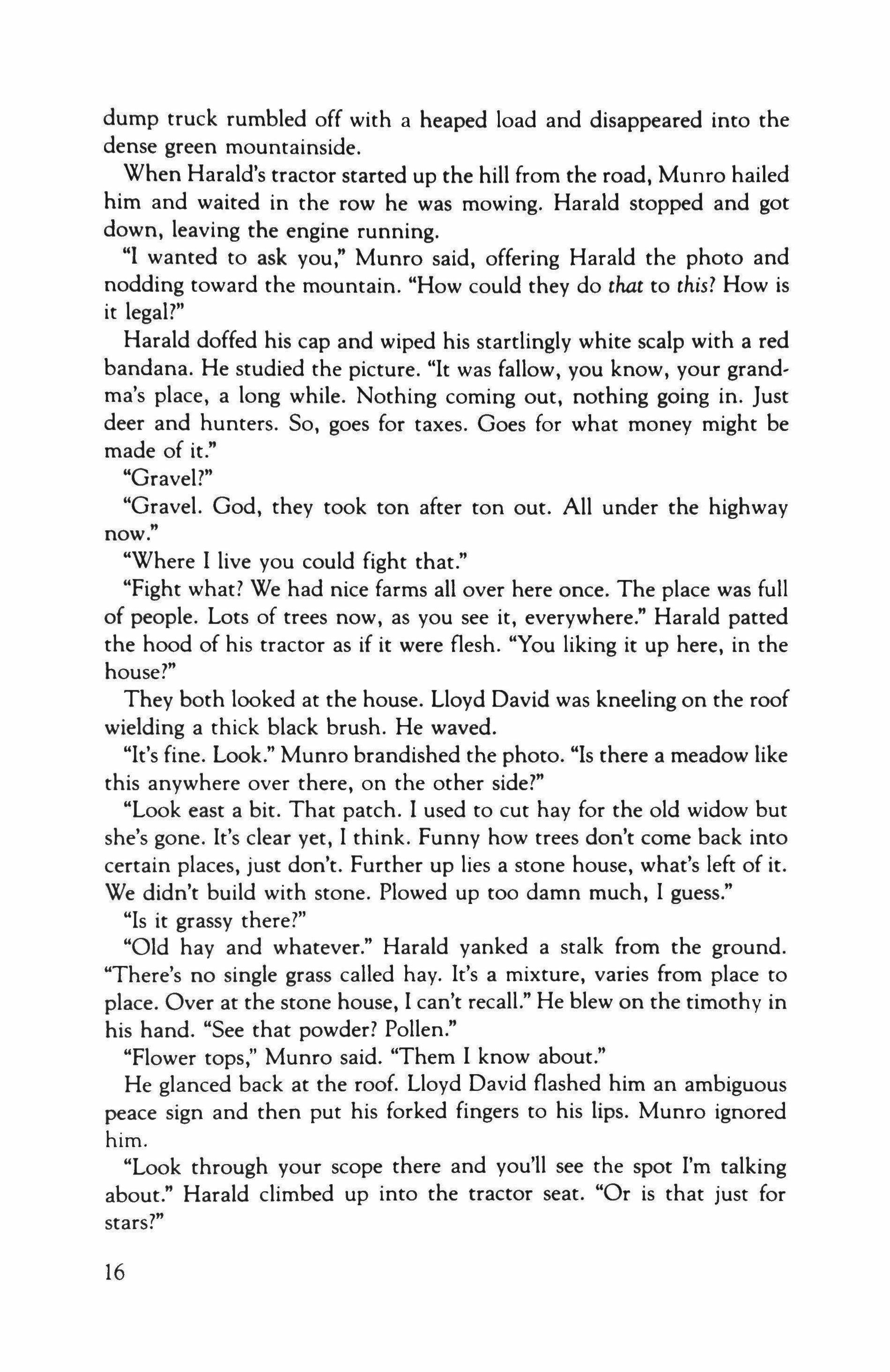
dump truck rumbled off with a heaped load and disappeared into the dense green mountainside.
When Harald's tractor started up the hill from the road, Munro hailed him and waited in the row he was mowing. Harald stopped and got down, leaving the engine running.
"I wanted to ask you," Munro said, offering Harald the photo and nodding toward the mountain. "How could they do that to this? How is it legal?"
Harald doffed his cap and wiped his startlingly white scalp with a red bandana. He studied the picture. "It was fallow, you know, your grandrna's place, a long while. Nothing coming out, nothing going in. Just deer and hunters. So, goes for taxes. Goes for what money might be made of it."
"Graven"
"Gravel. God, they took ton after ton out. All under the highway now."
"Where I live you could fight that."
"Fight what? We had nice farms all over here once. The place was full of people. Lots of trees now, as you see it, everywhere." Harald patted the hood of his tractor as if it were flesh. "You liking it up here, in the house?"
They both looked at the house. Lloyd David was kneeling on the roof wielding a thick black brush. He waved.
"It's fine. Look." Munro brandished the photo. "Is there a meadow like this anywhere over there, on the other side?"
"Look east a bit. That patch. I used to cut hay for the old widow but she's gone. It's clear yet, I think. Funny how trees don't come back into certain places, just don't. Further up lies a stone house, what's left of it. We didn't build with stone. Plowed up too damn much, I guess."
"Is it grassy there?"
"Old hay and whatever." Harald yanked a stalk from the ground. "There's no single grass called hay. It's a mixture, varies from place to place. Over at the stone house, I can't recall." He blew on the timothy in his hand. "See that powder? Pollen."
"Flower tops," Munro said. "Them I know about."
He glanced back at the roof. Lloyd David flashed him an ambiguous peace sign and then put his forked fingers to his lips. Munro ignored him.
"Look through your scope there and you'll see the spot I'm talking about." Harald climbed up into the tractor seat. "Or is that just for stars?"
16

"There's a comet due pretty soon. Next Friday, I think. Come up and have a look."
"Can't stay awake for a comet, Mr. Munro. That time of night I'm sawing heavy wood." He looked toward his house where Fiona had come out. "Now, Fiona, she'd love to. You show her the stars." Harald released the brake lever and fell instantly into the rhythm of mowing. The man would keep it up until dark, and if the weather shifted, he had other things to do. Had he noticed how lovely his wife looked?
Down by her lilac bush, Fiona was taking in the morning, her face up to the sun, or so it seemed, a mist of lavender still left in the branches behind her. When she saw him, she crossed the road and came slowly up the field, the wind in her clothes, billowing her pale green skirt. She stopped short of him and shaded her eyes. The sun warmed her honeycolored hair.
"There's a stone house over there I'd like to go to," Munro said.
"I heard it's dangerous." She was a bit out of breath and her cheeks had reddened. "It's falling in."
"I suppose there's some danger, sure," he said. He looked down at her white house and the green shutters. The barn, the big doors of its threshing floor thrown wide, was painted and trimmed the same, neatly. All of a piece. "Why did my father hate his own farm so much he let it be ground up into nothing? The fields have been hauled away in trucks."
"He wasn't happy there," Fiona said.
"He was at times. At times."
The sound of the tractor was fading out beyond the rise.
"I guess you've been to the stone house," Munro said.
"I never have. I know it's there."
"Do you like comets?"
"How couldn't l?"
At the big rock behind his house he helped her up to the telescope, his hands shaping her waist. Fiona looked into the eyepiece where the stone house was supposed to be. He watched her looking, her hands on her bare prim knees. Something in the tension of the skin there made him want to touch her.
"It fair puts you right there, doesn't it?" she said. She tapped the barrel of the scope. "That could find mischief far and wide." She looked down at him. "Why the stone house?"
"My afternoon lies over there. Would you come along? We'll have a look."
Harald was returning over the hill. Lloyd David had hauled his ladder
17
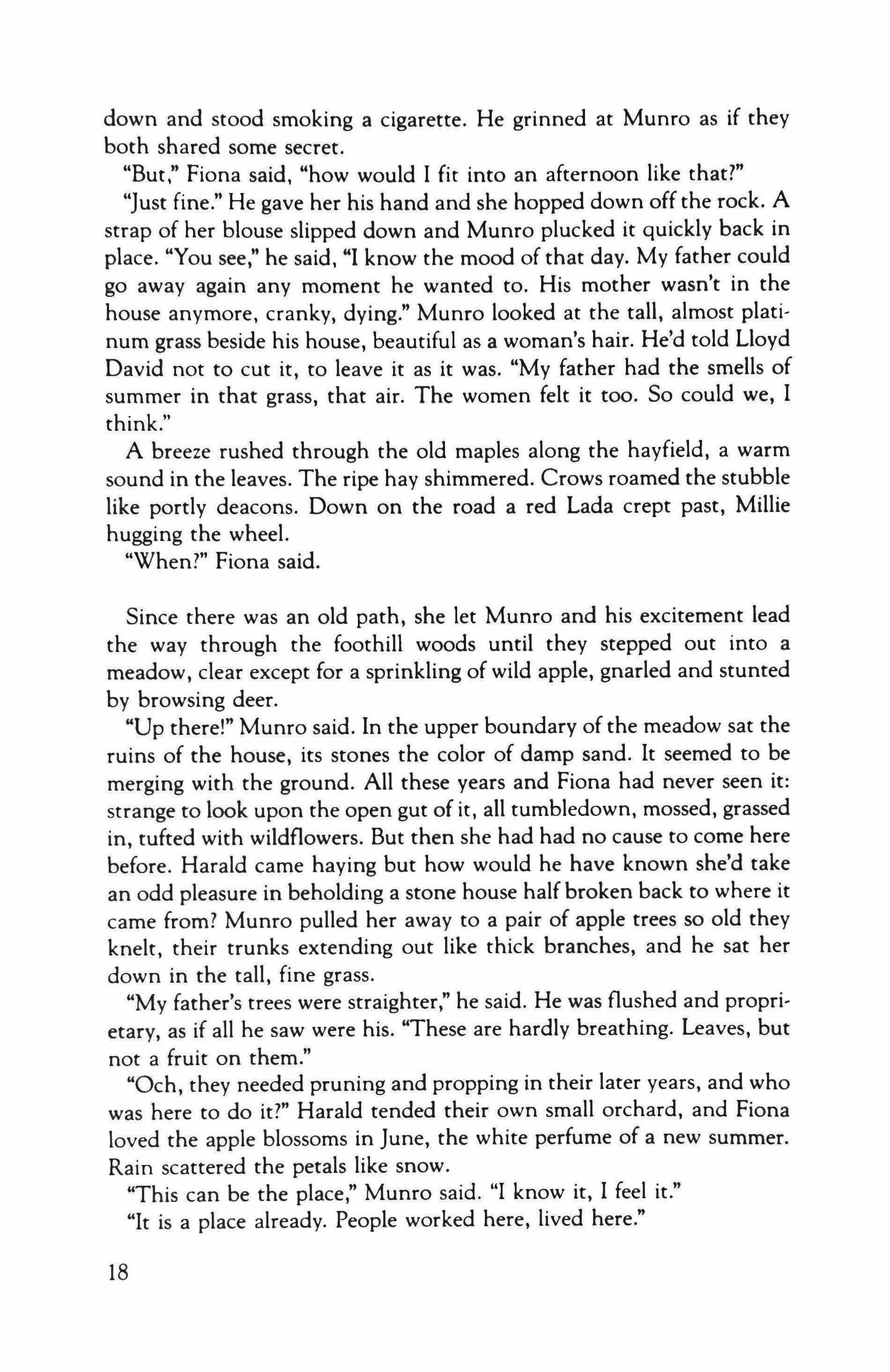
down and stood smoking a cigarette. He grinned at Munro as if they both shared some secret.
"But," Fiona said, "how would I fit into an afternoon like that?"
"Just fine." He gave her his hand and she hopped down off the rock. A strap of her blouse slipped down and Munro plucked it quickly back in place. "You see," he said, "I know the mood of that day. My father could go away again any moment he wanted to. His mother wasn't in the house anymore, cranky, dying." Munro looked at the tall, almost platinum grass beside his house, beautiful as a woman's hair. He'd told Lloyd David not to cut it, to leave it as it was. "My father had the smells of summer in that grass, that air. The women felt it too. So could we, I think."
A breeze rushed through the old maples along the hayfield, a warm sound in the leaves. The ripe hay shimmered. Crows roamed the stubble like portly deacons. Down on the road a red Lada crept past, Millie hugging the wheel.
"When?" Fiona said.
Since there was an old path, she let Munro and his excitement lead the way through the foothill woods until they stepped out into a meadow, clear except for a sprinkling of wild apple, gnarled and stunted by browsing deer.
"Up there!" Munro said. In the upper boundary of the meadow sat the ruins of the house, its stones the color of damp sand. It seemed to be merging with the ground. All these years and Fiona had never seen it: strange to look upon the open gut of it, all tumbledown, mossed, grassed in, tufted with wildflowers. But then she had had no cause to come here before. Harald came haying but how would he have known she'd take an odd pleasure in beholding a stone house half broken back to where it came from? Munro pulled her away to a pair of apple trees so old they knelt, their trunks extending out like thick branches, and he sat her down in the tall, fine grass.
"My father's trees were straighter," he said. He was flushed and proprietary, as if all he saw were his. "These are hardly breathing. Leaves, but not a fruit on them."
"Och, they needed pruning and propping in their later years, and who was here to do it?" Harald tended their own small orchard, and Fiona loved the apple blossoms in June, the white perfume of a new summer. Rain scattered the petals like snow.
"This can be the place," Munro said. "I know it, I feel it."
"It is a place already. People worked here, lived here."
18

"I'll borrow it for a day. That's all right, isn't it?"
"If there's ghosts, I doubt they'd mind."
Munro was lighting a joint as if it were no more than a cigarette, his eyes absorbed in the flame.
"They might well mind that, though," Fiona said.
"You mean they never got high, these people? Can't believe it."
"I didn't say that. But I wouldn't think you'd need that stuff up here," she said.
"My father had a bottle up here." Munro hissed more smoke from the joint and blew it out in a long sigh. "Background music, Fiona. Here, try a little. We'll see things the same way."
"Thanks, no. I'm seeing fine."
He was on his feet and striding toward the ruined house. That smoke changed him, she could see that clear enough: he took a little turn of his own and left her a step behind. What was it like? She had to wonder. She liked his eyes, but they were too light sometimes, like water in a swimming pool, and she could imagine him leaning against a palm tree. But that was unfair. His long hair suited him somehow, carefully trimmed, and the rough clothes too, the denim shirts and jeans that made no distinction between leisure and work.
She followed him up the hill, drawn more to the house itself than to Munro's investigation. She knew stone houses, growing up in Harris they were all she knew. But here she had never seen one like this, rude as an old hearth. Two of the walls, thick with stacked stones of many sizes, were nearly intact, their outer surfaces sealed in a layer of rough mortar (some crude version of harling?), but the inner ones exposed like a tall fence of fieldstones, weathered and stained from rains and the earth they'd been pulled from (but chosen with the patient eye and hand of a stone setter), smaller ones (pebbles even) wedged between larger, all to complete this solid unwavering puzzle, this wall. At the corners, broken or joined, the stones had been dressed to fit flat. The lintels of the low, cramped windows were long, chiseled blocks. Never fancy, this house, but Highland skill and labor had formed it. The roof had long ago pitched itself into the living space, atumble with split timbers, gray as driftwood, and with broken stone. Among them grass and hardy flowers sprouted from sod clumps. Rubble from the collapsed sections had spilled into the fruitcellar, a cell-like pit lined with stones dressed into neat blocks like the lintels. But all was collapse now, a giving in. It must have been dark indeed, but she could attest there was nothing like two feet of stone between you and the world, a kind of safety, coming as she did from an island of wind. Wind cowered her mother's flowers, but
19
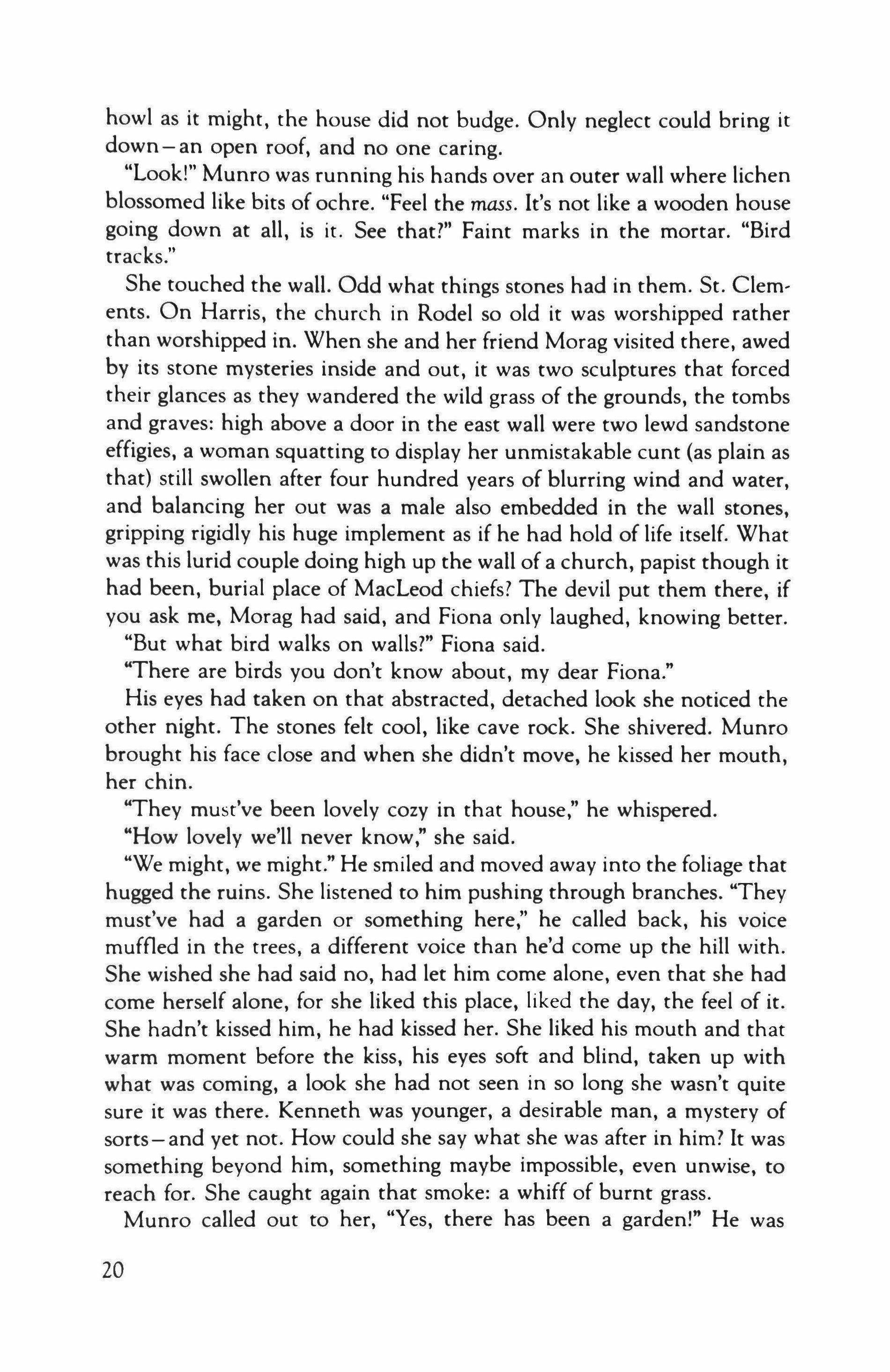
howl as it might, the house did not budge. Only neglect could bring it down - an open roof, and no one caring.
"look!" Munro was running his hands over an outer wall where lichen blossomed like bits of ochre. "Feel the mass. It's not like a wooden house going down at all, is it. See that?" Faint marks in the mortar. "Bird tracks."
She touched the wall. Odd what things stones had in them. St. Clements. On Harris, the church in Rodel so old it was worshipped rather than worshipped in. When she and her friend Morag visited there, awed by its stone mysteries inside and out, it was two sculptures that forced their glances as they wandered the wild grass of the grounds, the tombs and graves: high above a door in the east wall were two lewd sandstone effigies, a woman squatting to display her unmistakable cunt (as plain as that) still swollen after four hundred years of blurring wind and water, and balancing her out was a male also embedded in the wall stones, gripping rigidly his huge implement as if he had hold of life itself. What was this lurid couple doing high up the wall of a church, papist though it had been, burial place of Macleod chiefs? The devil put them there, if you ask me, Morag had said, and Fiona only laughed, knowing better.
"But what bird walks on walls?" Fiona said.
"There are birds you don't know about, my dear Fiona."
His eyes had taken on that abstracted, detached look she noticed the other night. The stones felt cool, like cave rock. She shivered. Munro brought his face close and when she didn't move, he kissed her mouth, her chin.
"They must've been lovely cozy in that house," he whispered.
"How lovely we'll never know," she said.
"We might, we might." He smiled and moved away into the foliage that hugged the ruins. She listened to him pushing through branches. "They must've had a garden or something here," he called back, his voice muffled in the trees, a different voice than he'd come up the hill with. She wished she had said no, had let him come alone, even that she had come herself alone, for she liked this place, liked the day, the feel of it. She hadn't kissed him, he had kissed her. She liked his mouth and that warm moment before the kiss, his eyes soft and blind, taken up with what was coming, a look she had not seen in so long she wasn't quite sure it was there. Kenneth was younger, a desirable man, a mystery of sorts-and yet not. How could she say what she was after in him? It was something beyond him, something maybe impossible, even unwise, to reach for. She caught again that smoke: a whiff of burnt grass.
Munro called out to her, "Yes, there has been a garden!" He was
20

shaking the branches of a tall shrub. "See? Lilac!" At the tips of its bony, dead-gray stalks were dry but visible blossoms, and yes, it was in leaf. Lost in the slender fir trees they found a spindly rose bush too tall to be wild, and further away a single apple tree, hoary but filled with tiny green fruit. "They had flowers here," Munro said, "no doubt about it." Then they nearly stumbled over a low stone wall, disguised by grass, much of it, and what they could make out here and there showed it as an enclosure within which the wild trees had checked their growth, the birches almost thinly decorous, the spruce lightly branched and airy. "How strange," Fiona said. A walled garden behind a small farmhouse like this, in this country, walled not to keep anything out but just to define a place, to contain pleasure. No vegetables in this space, their potatoes and turnips would have ripened elsewhere. How strong the scent of flowers must have been in the midsummer air when the people of the house came walking here, the same people who hauled and chiseled and hoisted those great stones ten feet up for windows and walls. It would have been peaceful, for the men as well as the women, with the fields cleared, the wind off the water. She sat down on a mossy patch of wall and imagined the garden without the invading trees. Daisies bloomed at her feet. What other flowers of their own had they put in the ground? Was it the women of this stone house who planted them? She wanted to think it had been a man, the kind of man who, after grappling with stones in those hard days, would have, with a splayed finger, poked tiny seeds into the dirt of a flower garden. Munro had knelt behind her and was parting, as he might a curtain, the back of her hair. He kissed her nape, and that was all she felt, just that sensation, unexpected, its surprise moving warm like wine into her face. She closed her eyes and turned her mouth to his. They slid down into the grass outside the wall. His fingers smelled of balsam, and very faintly of the lilac that had brushed him. Yes, the garden, and a coppery evening sun, the wind down, the flowers tense, waiting for night, birds merging into trees and leaves. She felt the warm sun on her legs, and then his fingers, almost cold so that she tensed and gave into him at the same moment, and it seemed they were sinking gently into the grass, she whispering to him but not words, his mouth hot through the cloth of her blouse as his breath moved down her waist. Then he stopped, his muscles hardening and he sat up out of her arms: "Someone's coming." Her own breath stopped, then she pulled her skirt down and smoothed it over her knees. Who was the someone coming? She didn't move. To flee would look more foolish than lying in the grass, a man on his knees next to you. In her daze she nearly laughed: oh Millie, turning her
21

tongue on them both, fiercely, first at this suspect man who had surely tricked Fiona into the trees, and then at Fiona who would have to be some kind of a thing herself to lie down in the weeds with him in the middle of a working day. Lord, the racket in the teacups, sipping her name, and his, and Harald's. Fiona sat up but stirred no further, nor did Munro while feet tramped nearer and took the forms of Lloyd David and a pal, a taller boy Fiona didn't know. their voices preceding them, earnest but unintelligible in the noise of leaves and snapping branches as they ducked and staggered through the trees. Lloyd David was holding in his fingers a cigarette butt like a captured bug and the boys paused long enough to share its smoke, taking it gravely to their lips in turn. They were not looking for anyone, were headed elsewhere, heads down, intent, guileless, the woods just something to be got through. They passed within a few yards of Munro and Fiona, stumbling on, oblivious, their bluejeans fading out into the thicker trees.
"He had a bottle in his back pocket, that squirt," Munro said. "God, I thought he was working with Harald."
"He was, this morning. He comes and goes."
Fiona brushed off her skirt and redid two buttons of her blouse, her fingers cool and clumsy. Over on a wall of the stone house a tree shadow swayed like a flame. She stood up: something had both happened and not happened. Munro lay back in the grass, his shirt open. There was a silver medallion in the thick hair of his chest.
"What was it my father used to say?" he said. "'Hot as Scotch love'?"
She saw in his closed eyes, in their fluttering lids. something of the father in the photo: something that had to be satisfied, but never would be.
"You're looking pleased with yourself," she said. "Does it not bother you a wee bit?"
"Does what?" He got to his feet and climbed on the stones so he could see down the hillside.
"I'm married," Fiona said. "You do know the man. You have met him."
"I like Harald. He's a worker, he is. But what have we done, you and me?"
"Half what we would do, I suppose. Isn't that part of your 'afternoon'?"
"We don't have to make love if you'd rather not."
"You're an arrogant man, you are. You know I like you, and like the feel of you. But there's an ache I'll carry home with me. I don't think you know anything about that. Do you feel it at all?"
"Feel what?"
22
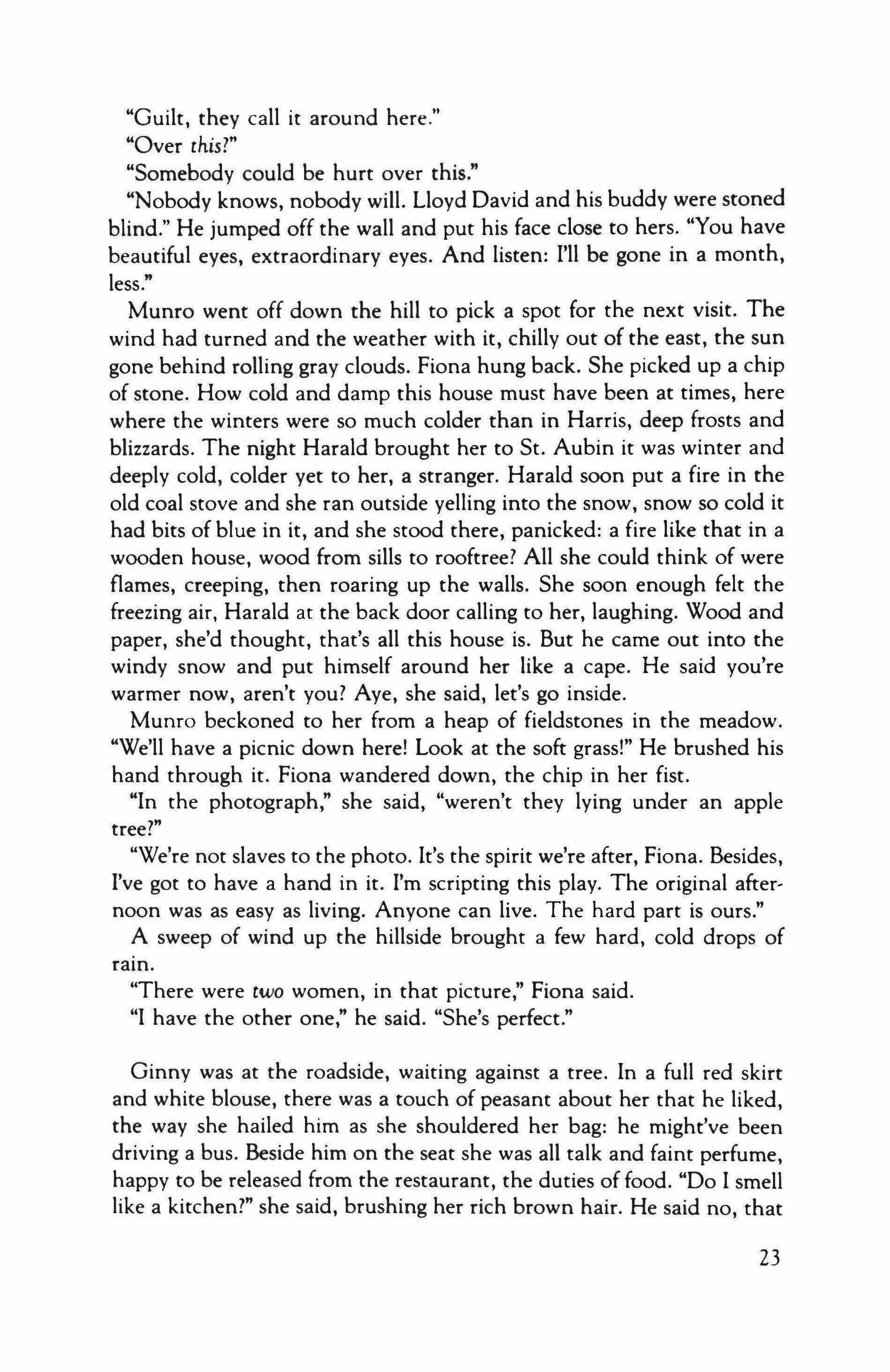
"Guilt, they call it around here."
"Over [his?"
"Somebody could be hurt over this."
"Nobody knows, nobody will. Lloyd David and his buddy were stoned blind." He jumped off the wall and put his face close to hers. "You have beautiful eyes, extraordinary eyes. And listen: I'll be gone in a month, less."
Munro went off down the hill to pick a spot for the next visit. The wind had turned and the weather with it, chilly out of the east, the sun gone behind rolling gray clouds. Fiona hung back. She picked up a chip of stone. How cold and damp this house must have been at times, here where the winters were so much colder than in Harris, deep frosts and blizzards. The night Harald brought her to St. Aubin it was winter and deeply cold, colder yet to her, a stranger. Harald soon put a fire in the old coal stove and she ran outside yelling into the snow, snow so cold it had bits of blue in it, and she stood there, panicked: a fire like that in a wooden house, wood from sills to rooftree? All she could think of were flames, creeping, then roaring up the walls. She soon enough felt the freezing air, Harald at the back door calling to her, laughing. Wood and paper, she'd thought, that's all this house is. But he came out into the windy snow and put himself around her like a cape. He said you're warmer now, aren't you? Aye, she said, let's go inside.
Munro beckoned to her from a heap of fieldstones in the meadow. "We'll have a picnic down here! Look at the soft grass!" He brushed his hand through it. Fiona wandered down, the chip in her fist.
"In the photograph," she said, "weren't they lying under an apple tree?"
"We're not slaves to the photo. It's the spirit we're after, Fiona. Besides, I've got to have a hand in it. I'm scripting this play. The original afternoon was as easy as living. Anyone can live. The hard part is ours."
A sweep of wind up the hillside brought a few hard, cold drops of rain.
"There were two women, in that picture," Fiona said. "I have the other one," he said. "She's perfect."
Ginny was at the roadside, waiting against a tree. In a full red skirt and white blouse, there was a touch of peasant about her that he liked, the way she hailed him as she shouldered her bag: he might've been driving a bus. Beside him on the seat she was all talk and faint perfume, happy to be released from the restaurant, the duties of food. "Do I smell like a kitchen?" she said, brushing her rich brown hair. He said no, that
23
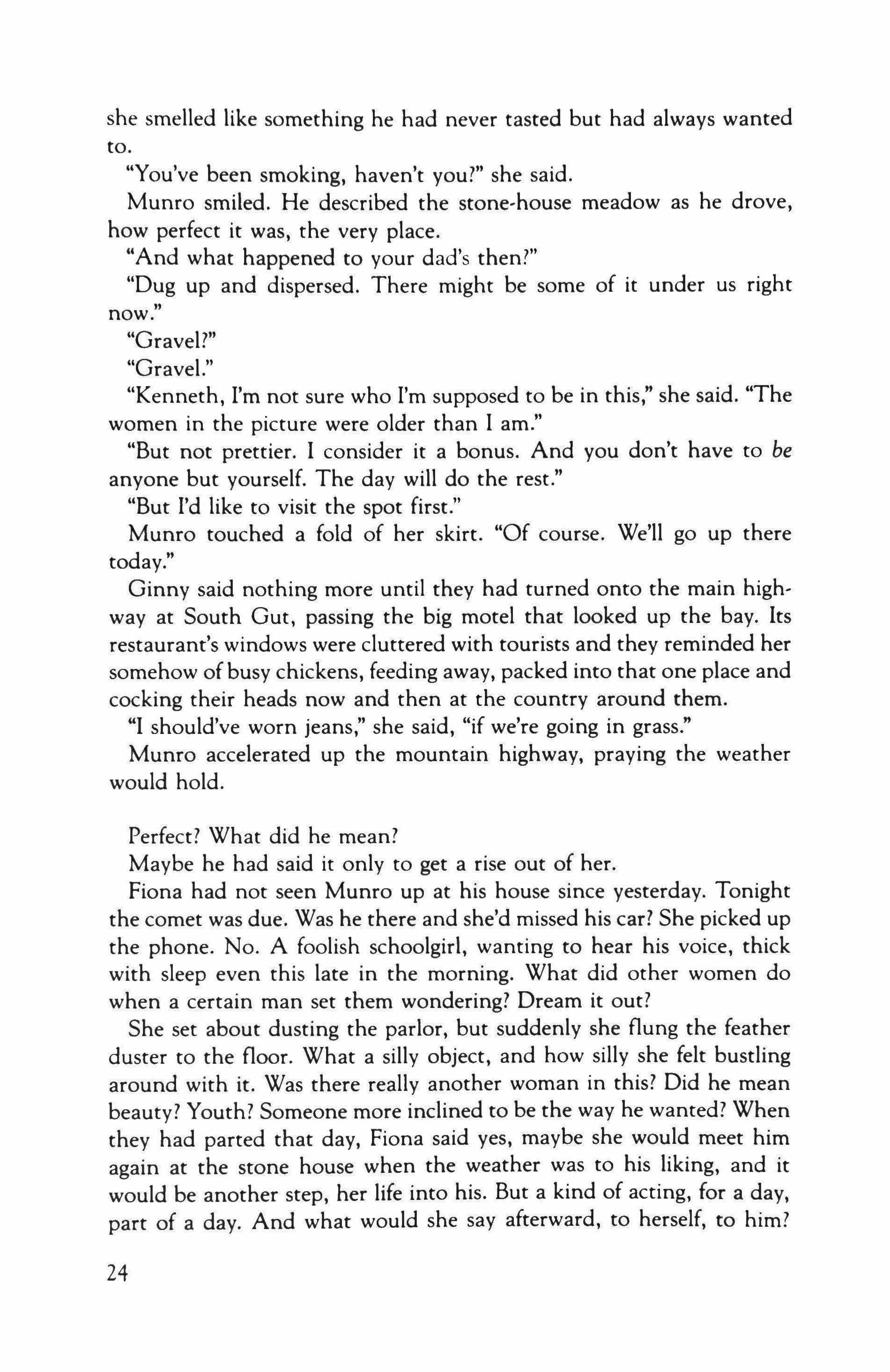
she smelled like something he had never tasted but had always wanted to.
"You've been smoking, haven't you?" she said.
Munro smiled. He described the stone-house meadow as he drove, how perfect it was, the very place.
"And what happened to your dad's then?"
"Dug up and dispersed. There might be some of it under us right now."
"Gravel?"
"Gravel."
"Kenneth, I'm not sure who I'm supposed to be in this," she said. "The women in the picture were older than I am."
"But not prettier. I consider it a bonus. And you don't have to be anyone but yourself. The day will do the rest."
"But I'd like to visit the spot first."
Munro touched a fold of her skirt. "Of course. We'll go up there today."
Ginny said nothing more until they had turned onto the main highway at South Gut, passing the big motel that looked up the bay. Its restaurant's windows were cluttered with tourists and they reminded her somehow of busy chickens, feeding away, packed into that one place and cocking their heads now and then at the country around them.
"I should've worn jeans," she said, "if we're going in grass."
Munro accelerated up the mountain highway, praying the weather would hold.
Perfect? What did he mean?
Maybe he had said it only to get a rise out of her.
Fiona had not seen Munro up at his house since yesterday. Tonight the comet was due. Was he there and she'd missed his car? She picked up the phone. No. A foolish schoolgirl, wanting to hear his voice, thick with sleep even this late in the morning. What did other women do when a certain man set them wondering? Dream it out?
She set about dusting the parlor, but suddenly she flung the feather duster to the floor. What a silly object, and how silly she felt bustling around with it. Was there really another woman in this? Did he mean beauty? Youth? Someone more inclined to be the way he wanted? When they had parted that day, Fiona said yes, maybe she would meet him again at the stone house when the weather was to his liking, and it would be another step, her life into his. But a kind of acting, for a day, part of a day. And what would she say afterward, to herself, to him?
24
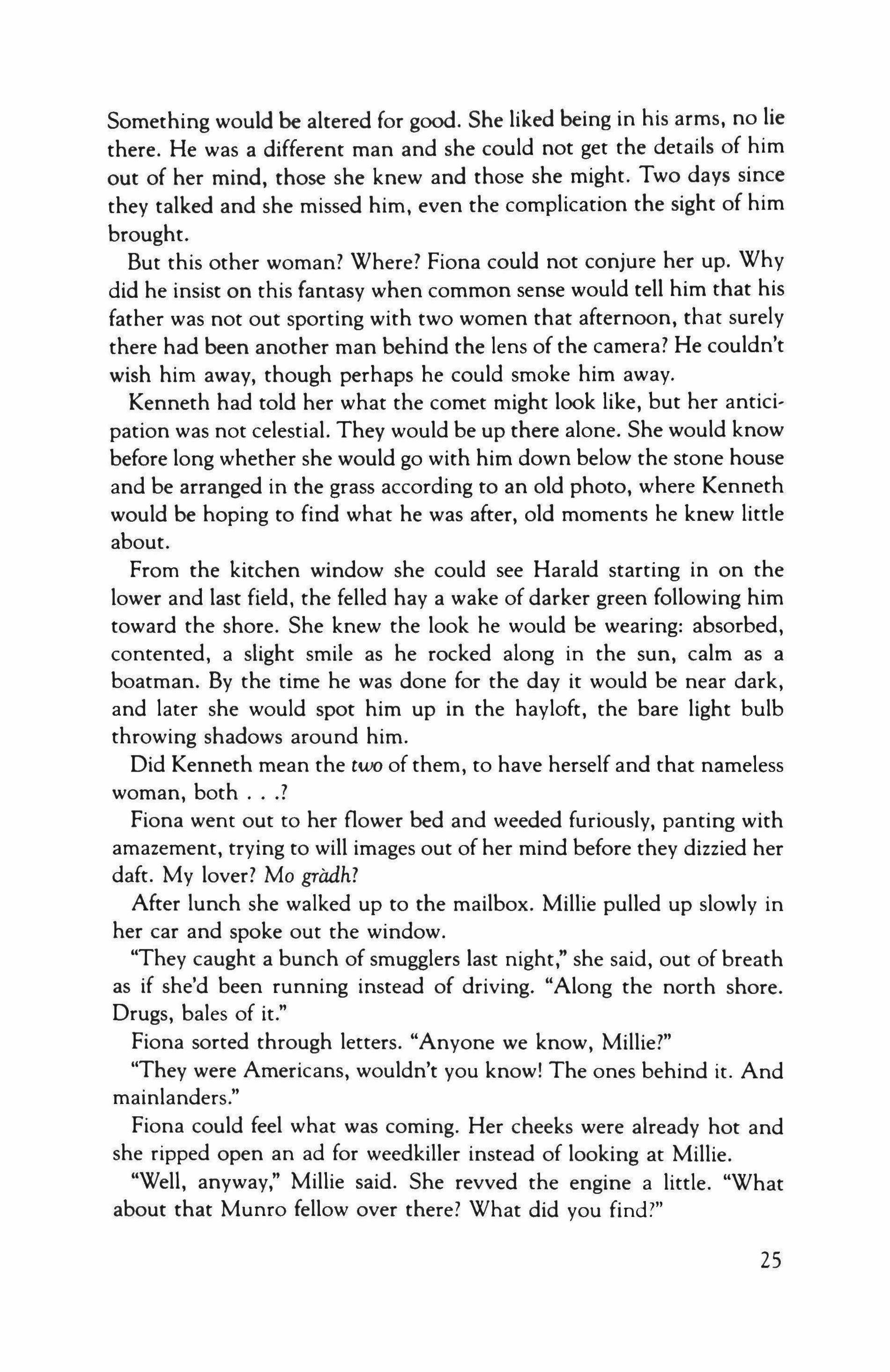
Something would be altered for good. She liked being in his arms, no lie there. He was a different man and she could not get the details of him out of her mind, those she knew and those she might. Two days since they talked and she missed him, even the complication the sight of him brought.
But this other woman? Where? Fiona could not conjure her up. Why did he insist on this fantasy when common sense would tell him that his father was not out sporting with two women that afternoon, that surely there had been another man behind the lens of the camera? He couldn't wish him away, though perhaps he could smoke him away.
Kenneth had told her what the comet might look like, but her anticipation was not celestial. They would be up there alone. She would know before long whether she would go with him down below the stone house and be arranged in the grass according to an old photo, where Kenneth would be hoping to find what he was after, old moments he knew little about.
From the kitchen window she could see Harald starting in on the lower and last field, the felled hay a wake of darker green following him toward the shore. She knew the look he would be wearing: absorbed, contented, a slight smile as he rocked along in the sun, calm as a boatman. By the time he was done for the day it would be near dark, and later she would spot him up in the hayloft, the bare light bulb throwing shadows around him.
Did Kenneth mean the two of them, to have herself and that nameless woman, both ?
Fiona went out to her flower bed and weeded furiously, panting with amazement, trying to will images out of her mind before they dizzied her daft. My lover? Mo gradh?
After lunch she walked up to the mailbox. Millie pulled up slowly in her car and spoke out the window.
"They caught a bunch of smugglers last night," she said, out of breath as if she'd been running instead of driving. "Along the north shore. Drugs, bales of it."
Fiona sorted through letters. "Anyone we know, Millie?"
"They were Americans, wouldn't you know! The ones behind it. And mainlanders."
Fiona could feel what was coming. Her cheeks were already hot and she ripped open an ad for weedkiller instead of looking at Millie.
"Well, anyway," Millie said. She revved the engine a little. "What about that Munro fellow over there? What did you find?"
25
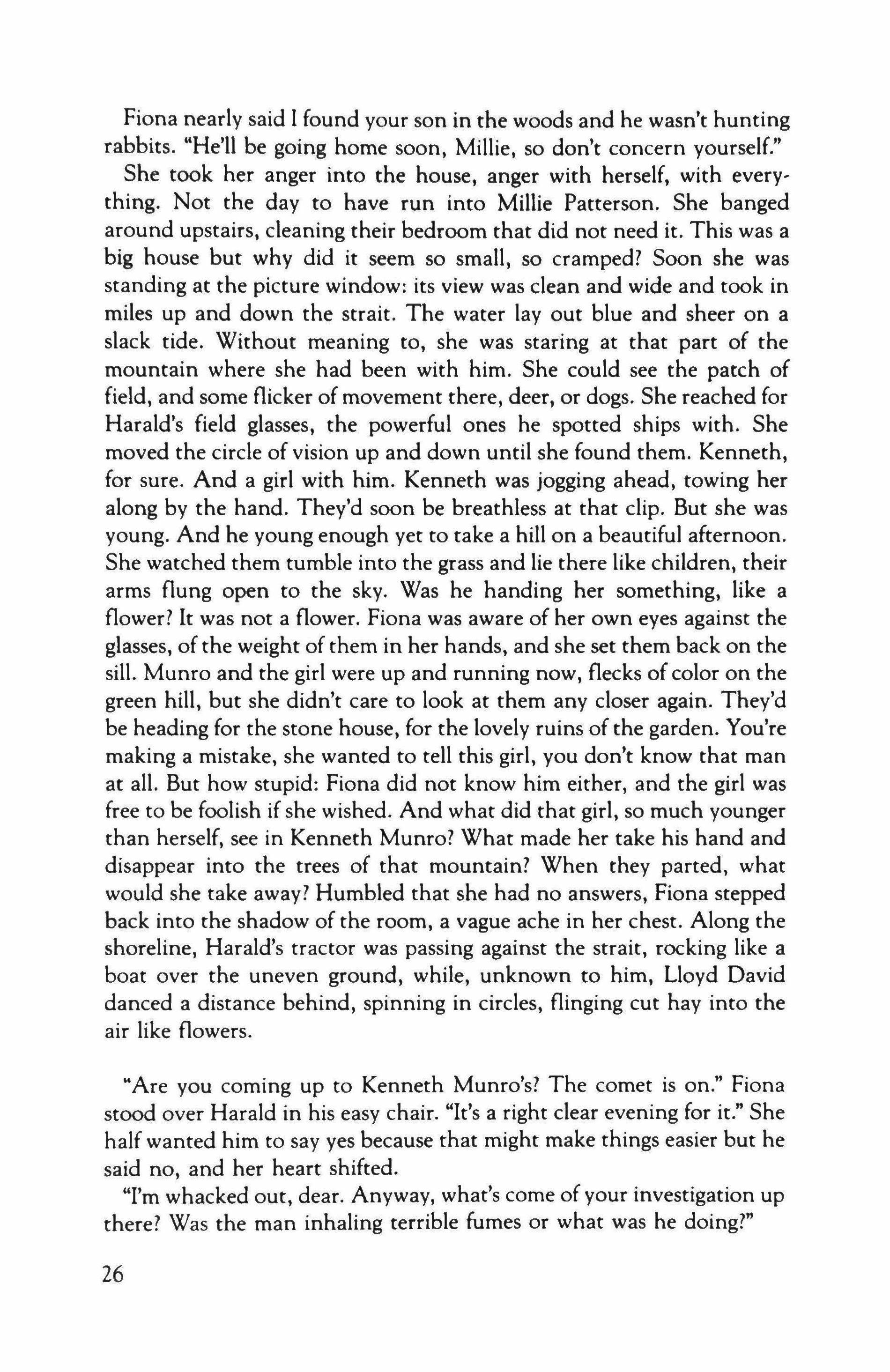
Fiona nearly said I found your son in the woods and he wasn't hunting rabbits. "He'll be going home soon, Millie, so don't concern yourself." She took her anger into the house, anger with herself, with everything. Not the day to have run into Millie Patterson. She banged around upstairs, cleaning their bedroom that did not need it. This was a big house but why did it seem so small, so cramped? Soon she was standing at the picture window: its view was clean and wide and took in miles up and down the strait. The water layout blue and sheer on a slack tide. Without meaning to, she was staring at that part of the mountain where she had been with him. She could see the patch of field, and some flicker of movement there, deer, or dogs. She reached for Harald's field glasses, the powerful ones he spotted ships with. She moved the circle of vision up and down until she found them. Kenneth, for sure. And a girl with him. Kenneth was jogging ahead, towing her along by the hand. They'd soon be breathless at that clip. But she was young. And he young enough yet to take a hill on a beautiful afternoon. She watched them tumble into the grass and lie there like children, their arms flung open to the sky. Was he handing her something, like a flower? It was not a flower. Fiona was aware of her own eyes against the glasses, of the weight of them in her hands, and she set them back on the sill. Munro and the girl were up and running now, flecks of color on the green hill, but she didn't care to look at them any closer again. They'd be heading for the stone house, for the lovely ruins of the garden. You're making a mistake, she wanted to tell this girl, you don't know that man at all. But how stupid: Fiona did not know him either, and the girl was free to be foolish if she wished. And what did that girl, so much younger than herself, see in Kenneth Munro? What made her take his hand and disappear into the trees of that mountain? When they parted, what would she take away? Humbled that she had no answers, Fiona stepped back into the shadow of the room, a vague ache in her chest. Along the shoreline, Harald's tractor was passing against the strait, rocking like a boat over the uneven ground, while, unknown to him, Lloyd David danced a distance behind, spinning in circles, flinging cut hay into the air like flowers.
M Are you coming up to Kenneth Munro's? The comet is on." Fiona stood over Harald in his easy chair. "It's a right clear evening for it." She half wanted him to say yes because that might make things easier but he said no, and her heart shifted.
"I'm whacked out, dear. Anyway, what's come of your investigation up there? Was the man inhaling terrible fumes or what was he doing?"
26
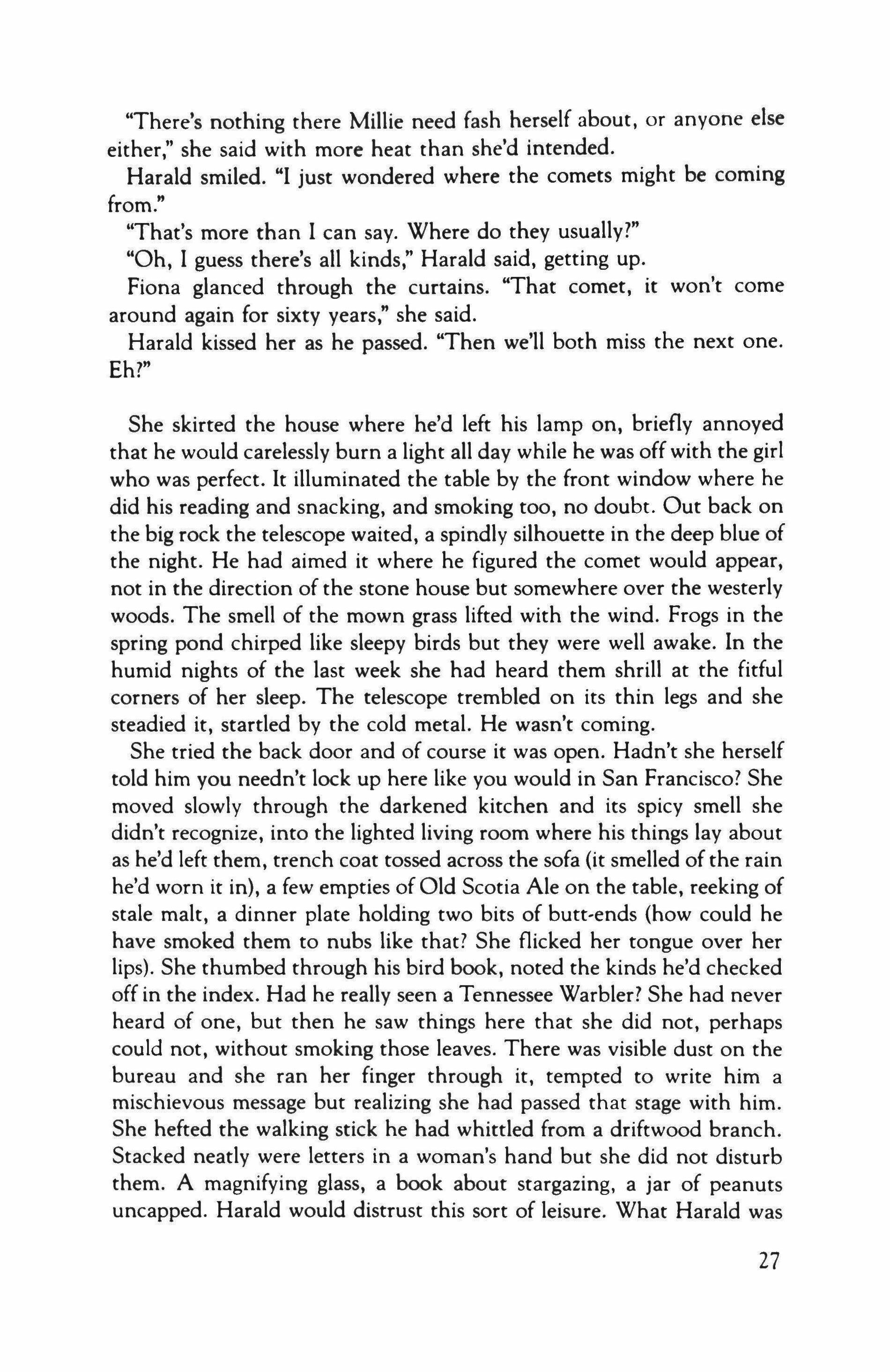
"There's nothing there Millie need fash herself about, or anyone else either," she said with more heat than she'd intended.
Harald smiled. "I just wondered where the comets might be coming from."
"That's more than I can say. Where do they usually?"
"Oh, I guess there's all kinds," Harald said, getting up.
Fiona glanced through the curtains. "That comet, it won't come around again for sixty years," she said.
Harald kissed her as he passed. "Then we'll both miss the next one. Eh?"
She skirted the house where he'd left his lamp on, briefly annoyed that he would carelessly burn a light all day while he was off with the girl who was perfect. It illuminated the table by the front window where he did his reading and snacking, and smoking too, no doubt. Out back on the big rock the telescope waited, a spindly silhouette in the deep blue of the night. He had aimed it where he figured the comet would appear, not in the direction of the stone house but somewhere over the westerly woods. The smell of the mown grass lifted with the wind. Frogs in the spring pond chirped like sleepy birds but they were well awake. In the humid nights of the last week she had heard them shrill at the fitful corners of her sleep. The telescope trembled on its thin legs and she steadied it, startled by the cold metal. He wasn't coming.
She tried the back door and of course it was open. Hadn't she herself told him you needn't lock up here like you would in San Francisco? She moved slowly through the darkened kitchen and its spicy smell she didn't recognize, into the lighted living room where his things lay about as he'd left them, trench coat tossed across the sofa (it smelled of the rain he'd worn it in), a few empties of Old Scotia Ale on the table, reeking of stale malt, a dinner plate holding two bits of butt-ends (how could he have smoked them to nubs like that? She flicked her tongue over her lips). She thumbed through his bird book, noted the kinds he'd checked off in the index. Had he really seen a Tennessee Warbler? She had never heard of one, but then he saw things here that she did not, perhaps could not, without smoking those leaves. There was visible dust on the bureau and she ran her finger through it, tempted to write him a mischievous message but realizing she had passed that stage with him. She hefted the walking stick he had whittled from a driftwood branch. Stacked neatly were letters in a woman's hand but she did not disturb them. A magnifying glass, a book about stargazing, a jar of peanuts uncapped. Harald would distrust this sort of leisure. What Harald was
27
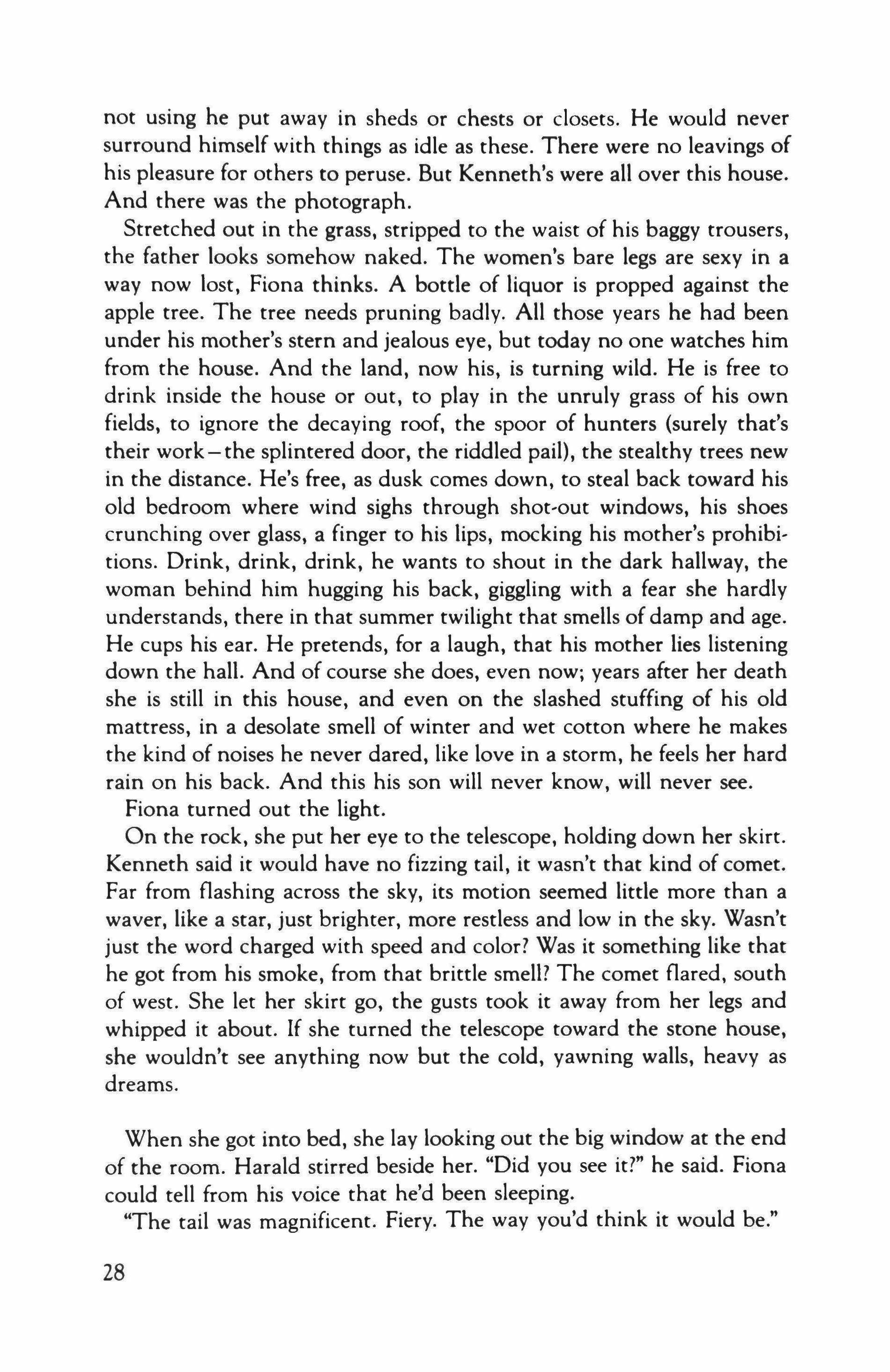
not using he put away in sheds or chests or closets. He would never surround himself with things as idle as these. There were no leavings of his pleasure for others to peruse. But Kenneth's were all over this house. And there was the photograph.
Stretched out in the grass, stripped to the waist of his baggy trousers, the father looks somehow naked. The women's bare legs are sexy in a way now lost, Fiona thinks. A bottle of liquor is propped against the apple tree. The tree needs pruning badly. All those years he had been under his mother's stern and jealous eye, but today no one watches him from the house. And the land, now his, is turning wild. He is free to drink inside the house or out, to play in the unruly grass of his own fields, to ignore the decaying roof, the spoor of hunters (surely that's their work-the splintered door, the riddled pail), the stealthy trees new in the distance. He's free, as dusk comes down, to steal back toward his old bedroom where wind sighs through shot-out windows, his shoes crunching over glass, a finger to his lips, mocking his mother's prohibitions. Drink, drink, drink, he wants to shout in the dark hallway, the woman behind him hugging his back, giggling with a fear she hardly understands, there in that summer twilight that smells of damp and age. He cups his ear. He pretends, for a laugh, that his mother lies listening down the hall. And of course she does, even now; years after her death she is still in this house, and even on the slashed stuffing of his old mattress, in a desolate smell of winter and wet cotton where he makes the kind of noises he never dared, like love in a storm, he feels her hard rain on his back. And this his son will never know, will never see.
Fiona turned out the light.
On the rock, she put her eye to the telescope, holding down her skirt. Kenneth said it would have no fizzing tail, it wasn't that kind of comet. Far from flashing across the sky, its motion seemed little more than a waver, like a star, just brighter, more restless and low in the sky. Wasn't just the word charged with speed and color? Was it something like that he got from his smoke, from that brittle smell? The comet flared. south of west. She let her skirt go, the gusts took it away from her legs and whipped it about. If she turned the telescope toward the stone house, she wouldn't see anything now but the cold, yawning walls, heavy as dreams.
When she got into bed, she lay looking out the big window at the end of the room. Harald stirred beside her. "Did you see it?" he said. Fiona could tell from his voice that he'd been sleeping.
"The tail was magnificent. Fiery. The way you'd think it would be."
28

"Streaked across the sky, did it?"
"No," she said. "No, it took longer than that." Harald touched her face, then turned back into sleep. She remembered waking one cold, cold February morning, unaware that Harald had wakened too. From their pillows they could see that the water of the Great Bras D'Eau had vanished, become a long white field. The men had not laid down a bushline yet but someone was crossing the new ice anyway, a woman, making her way slowly over the rough snow of the surface, her trail as fragile as a bird's. Her danger seemed to enter the room, and they watched her, she and Harald, saying nothing about her, this dark, tiny figure. They never saw where she came ashore, and they never found out what woman she was, coming so early, and finding her own way across.
29
Atlantic
George Cruys
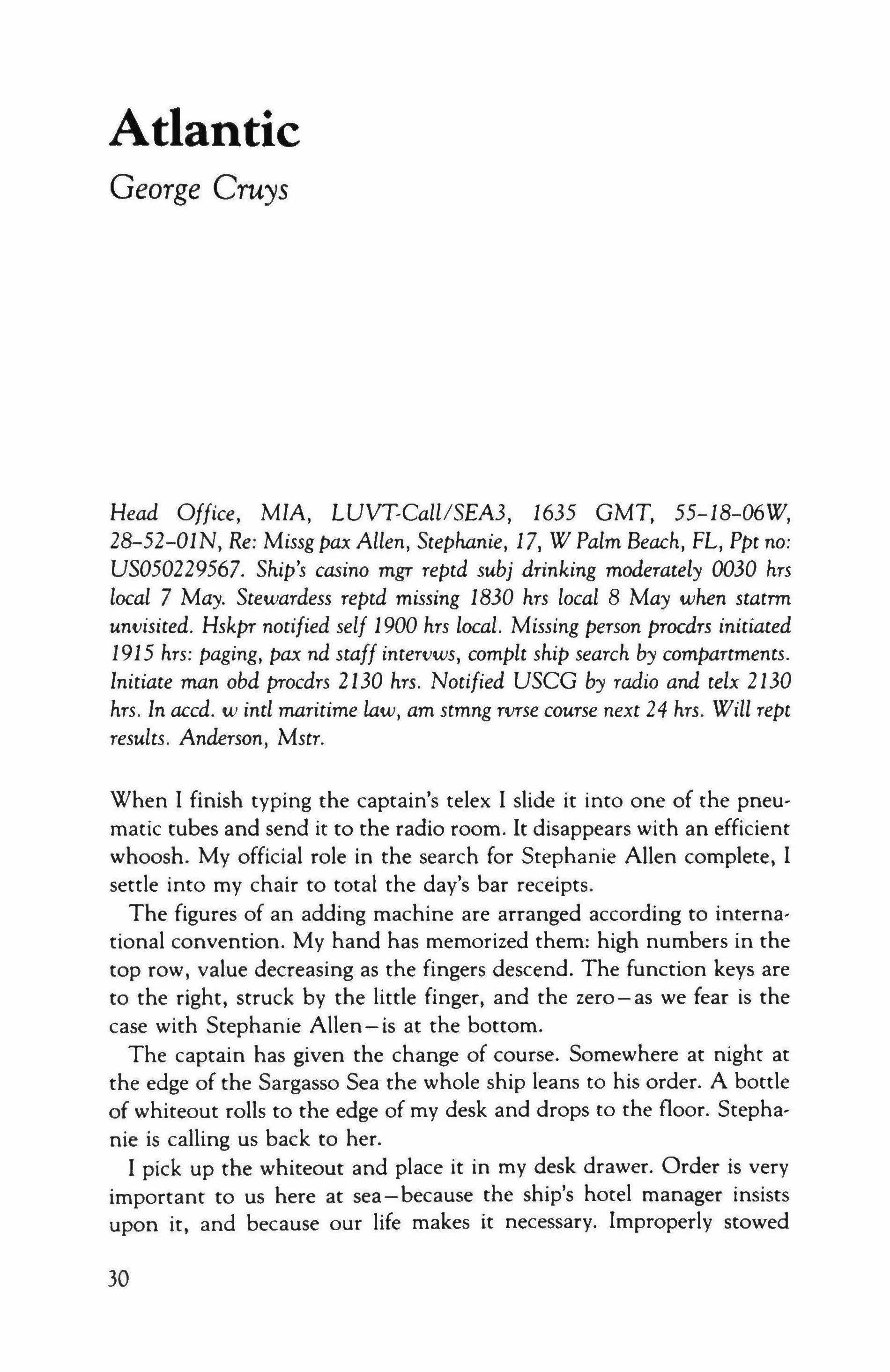
Head Office, MIA, LUVT-CalllSEA3, 1635 GMT, 55-18-06W, 28-52-01N, Re: Missg pax Allen, Stephanie, 17, W Palm Beach, FL, Ppt no: US050229567. Ship's casino mgr reptd subj drinking moderately 0030 hrs local 7 May. Stewardess reptd missing 1830 hrs local 8 May when statrm unvisited. Hskpr notified self 1900 hrs local. Missing person procdrs initiated 1915 hrs: paging, pax nd staff intervws, complt ship search by compartments. Initiate man obd procdrs 2130 hrs. Notified USCG by radio and telx 2130 hrs. In aced. w inti maritime law, am stmng rvrse course next 24 hrs. Will tept results. Anderson, Mstr.
When I finish typing the captain's telex I slide it into one of the pneumatic tubes and send it to the radio room. It disappears with an efficient whoosh. My official role in the search for Stephanie Allen complete, I settle into my chair to total the day's bar receipts.
The figures of an adding machine are arranged according to international convention. My hand has memorized them: high numbers in the top row, value decreasing as the fingers descend. The function keys are to the right, struck by the little finger, and the zero-as we fear is the case with Stephanie Allen - is at the bottom.
The captain has given the change of course. Somewhere at night at the edge of the Sargasso Sea the whole ship leans to his order. A bottle of whiteout rolls to the edge of my desk and drops to the floor. Stephanie is calling us back to her.
I pick up the whiteout and place it in my desk drawer. Order is very important to us here at sea - because the ship's hotel manager insists upon it, and because our life makes it necessary. Improperly stowed
30

material can come loose in a storm. We treat every day as if a typhoon was expected.
Once, when I was new on board, the hotel manager called out to me as I began to leave the office.
"You forgot to clean your desk!" he said. Some of the staff looked over their shoulders.
I walked back to my workstation and looked down. "It's clean," I told him. The top of the desk was not only neat, it was bare except for the blotter and my adding machine.
"Thisss!" he said, holding a single paper clip between his fingers. "You left this."
He placed the paper clip in my open palm.
"Excellence," said the hotel manager, "is made of details."
We are formal aboard this ship, jacket and tie required for gentlemen after six P.M. - dark shades preferred. Ladies are discouraged from wearing pantsuits. Every third night dinner dress is tuxedo and gowns. The staff wear uniforms with upright collars buttoned over the adam's apple. We are expected to make polite conversation. We do not talk about "issues"; we do not deal with politics. Travel is a good topic to fill uncomfortable silences. When we need something to say, we talk about places.
My place aboard this ship is clearly defined. I have a junior officer's cabin on crew deck and a numbered slot at the gangway for my identification card. My hours at work are stipulated and I am assigned a specific chair in the Reception Area. The crew recreational lounge-the only public place where I may appear out of uniform - is well aft on a lower deck.
It is important aboard this ship to know your place. There are diagrams in all the corridors to remind you. Deck name, compartment name. "You are here." And there are other signs: "Crew Only," "Officers Only," "Authorized Personnel Only." The arrow patterns on the carpet point toward the bow. As in the days of Captain Cook, we shoot sextant readings at noon and midnight, but the navigation satellite gives us a computer readout every four hours accurate to within five hundred yards.
As a junior officer aboard ship I am in the same location with people who do not share my world. Shipboard regulations encourage me to keep this in mind. Should I ever forget, as likely as not a passenger will remind me. Should I forget too often, the company will see that I do not have to be reminded again.
The thirty-two nationalities among the crew speak five primary lan-
31
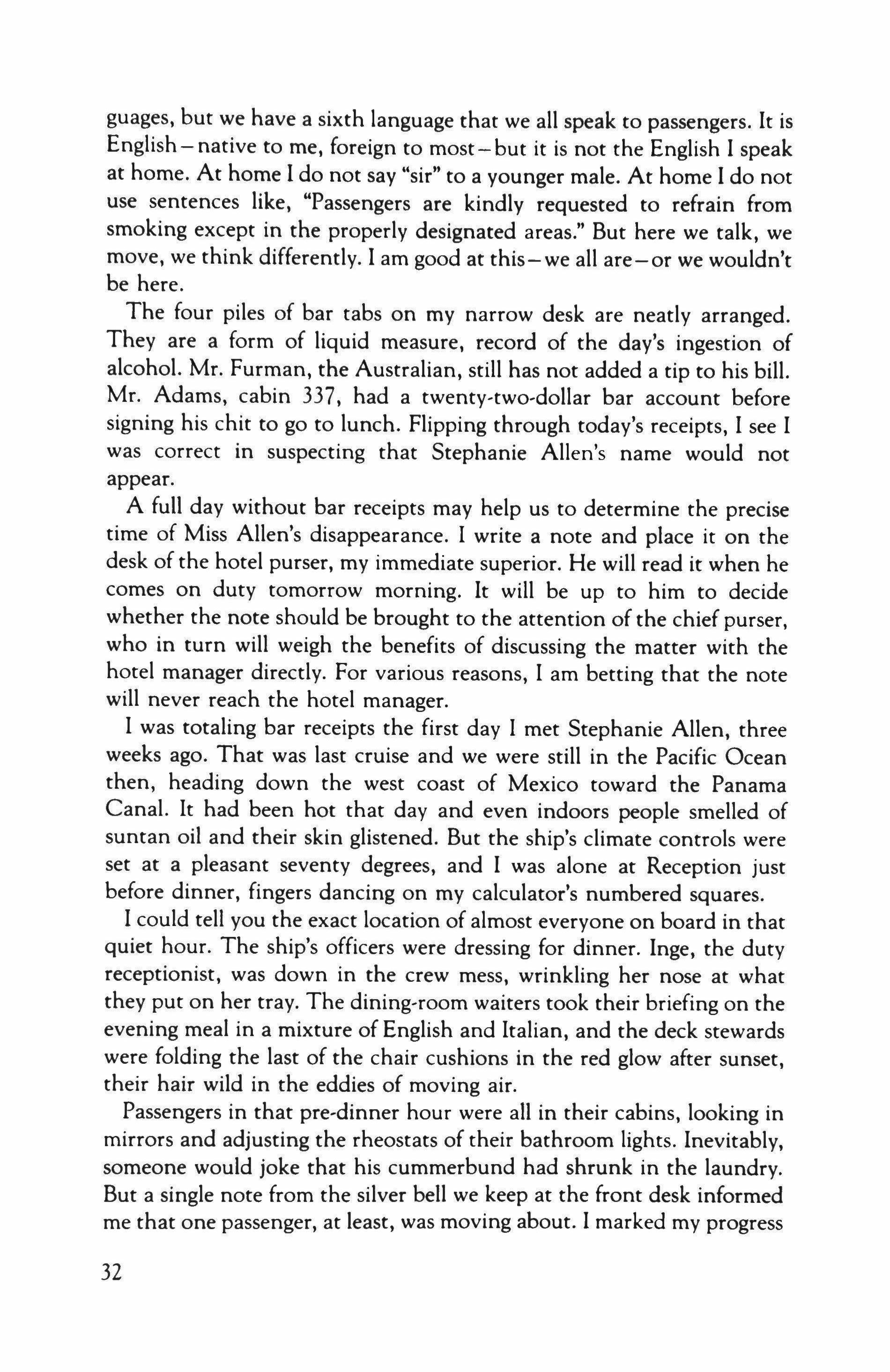
guages, but we have a sixth language that we all speak to passengers. It is English - native to me, foreign to most - but it is not the English I speak at home. At home I do not say "sir" to a younger male. At home I do not use sentences like, "Passengers are kindly requested to refrain from smoking except in the properly designated areas." But here we talk, we move, we think differently. I am good at this-we all are-or we wouldn't be here.
The four piles of bar tabs on my narrow desk are neatly arranged. They are a form of liquid measure, record of the day's ingestion of alcohol. Mr. Furman, the Australian, still has not added a tip to his bill. Mr. Adams, cabin 337, had a twenty-two-dollar bar account before signing his chit to go to lunch. Flipping through today's receipts, I see I was correct in suspecting that Stephanie Allen's name would not appear.
A full day without bar receipts may help us to determine the precise time of Miss Allen's disappearance. I write a note and place it on the desk of the hotel purser, my immediate superior. He will read it when he comes on duty tomorrow morning. It will be up to him to decide whether the note should be brought to the attention of the chief purser, who in turn will weigh the benefits of discussing the matter with the hotel manager directly. For various reasons, I am betting that the note will never reach the hotel manager.
I was totaling bar receipts the first day I met Stephanie Allen, three weeks ago. That was last cruise and we were still in the Pacific Ocean then, heading down the west coast of Mexico toward the Panama Canal. It had been hot that day and even indoors people smelled of suntan oil and their skin glistened. But the ship's climate controls were set at a pleasant seventy degrees, and I was alone at Reception just before dinner, fingers dancing on my calculator's numbered squares.
I could tell you the exact location of almost everyone on board in that quiet hour. The ship's officers were dressing for dinner. Inge, the duty receptionist, was down in the crew mess, wrinkling her nose at what they put on her tray. The dining-room waiters took their briefing on the evening meal in a mixture of English and Italian, and the deck stewards were folding the last of the chair cushions in the red glow after sunset, their hair wild in the eddies of moving air.
Passengers in that pre-dinner hour were all in their cabins, looking in mirrors and adjusting the rheostats of their bathroom lights. Inevitably, someone would joke that his cummerbund had shrunk in the laundry. But a single note from the silver bell we keep at the front desk informed me that one passenger, at least, was moving about. I marked my progress
32
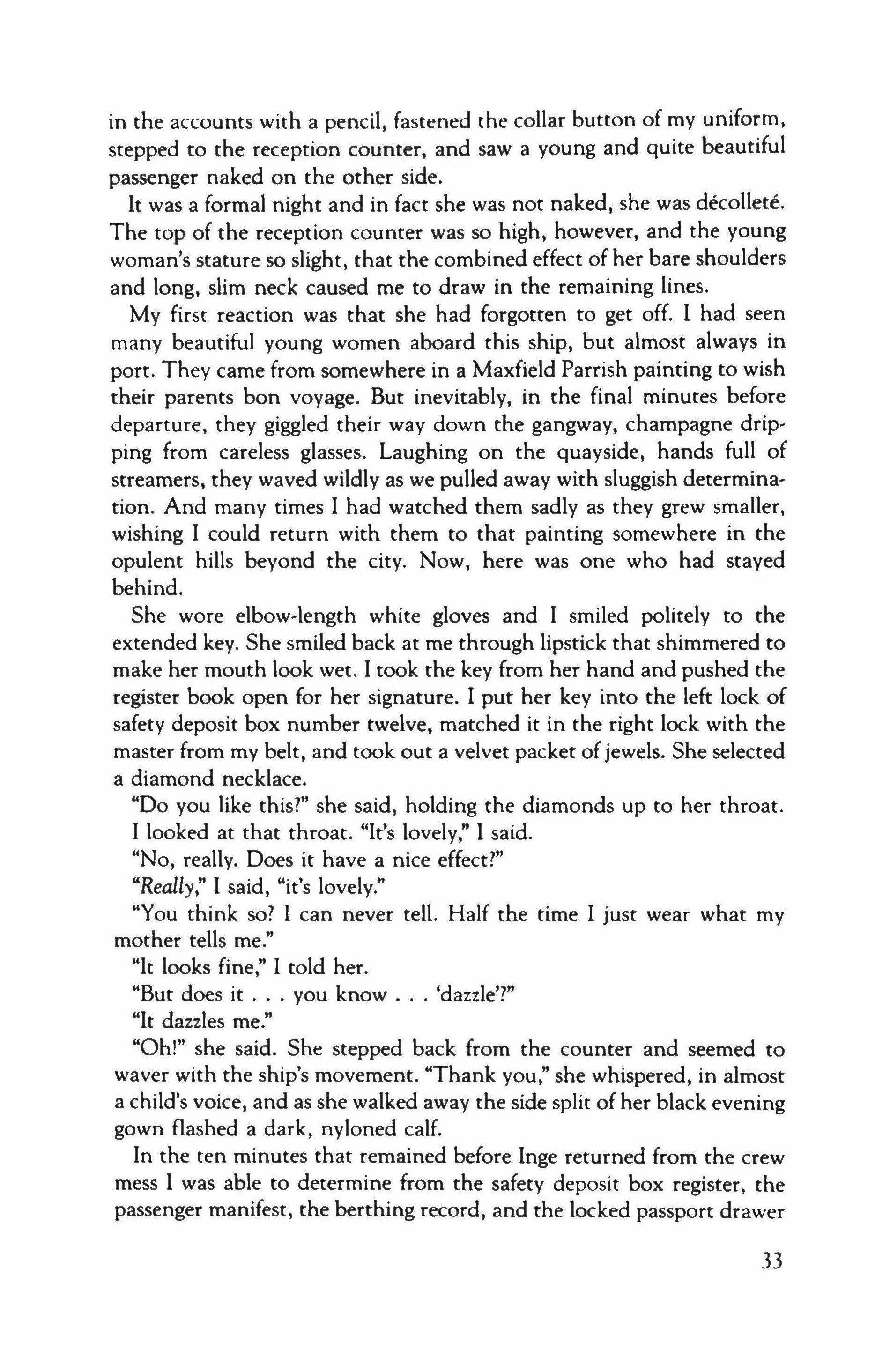
in the accounts with a pencil, fastened the collar button of my uniform, stepped to the reception counter, and saw a young and quite beautiful passenger naked on the other side.
It was a formal night and in fact she was not naked, she was decollete. The top of the reception counter was so high, however, and the young woman's stature so slight, that the combined effect of her bare shoulders and long, slim neck caused me to draw in the remaining lines.
My first reaction was that she had forgotten to get off. I had seen many beautiful young women aboard this ship, but almost always in port. They came from somewhere in a Maxfield Parrish painting to wish their parents bon voyage. But inevitably, in the final minutes before departure, they giggled their way down the gangway, champagne dripping from careless glasses. Laughing on the quayside, hands full of streamers, they waved wildly as we pulled away with sluggish determination. And many times I had watched them sadly as they grew smaller, wishing I could return with them to that painting somewhere in the opulent hills beyond the city. Now, here was one who had stayed behind.
She wore elbow-length white gloves and I smiled politely to the extended key. She smiled back at me through lipstick that shimmered to make her mouth look wet. I took the key from her hand and pushed the register book open for her signature. I put her key into the left lock of safety deposit box number twelve, matched it in the right lock with the master from my belt, and took out a velvet packet ofjewels. She selected a diamond necklace.
"Do you like this?" she said, holding the diamonds up to her throat. I looked at that throat. "It's lovely," I said.
"No, really. Does it have a nice effect?"
"Really," I said, "it's lovely."
"You think so? I can never tell. Half the time I just wear what my mother tells me."
"It looks fine," I told her.
"But does it you know 'dazzle'?"
"It dazzles me."
"Oh!" she said. She stepped back from the counter and seemed to waver with the ship's movement. "Thank you," she whispered, in almost a child's voice, and as she walked away the side split of her black evening gown flashed a dark, nvloned calf.
In the ten minutes that remained before Inge returned from the crew mess I was able to determine from the safety deposit box register, the passenger manifest, the berthing record, and the locked passport drawer
33
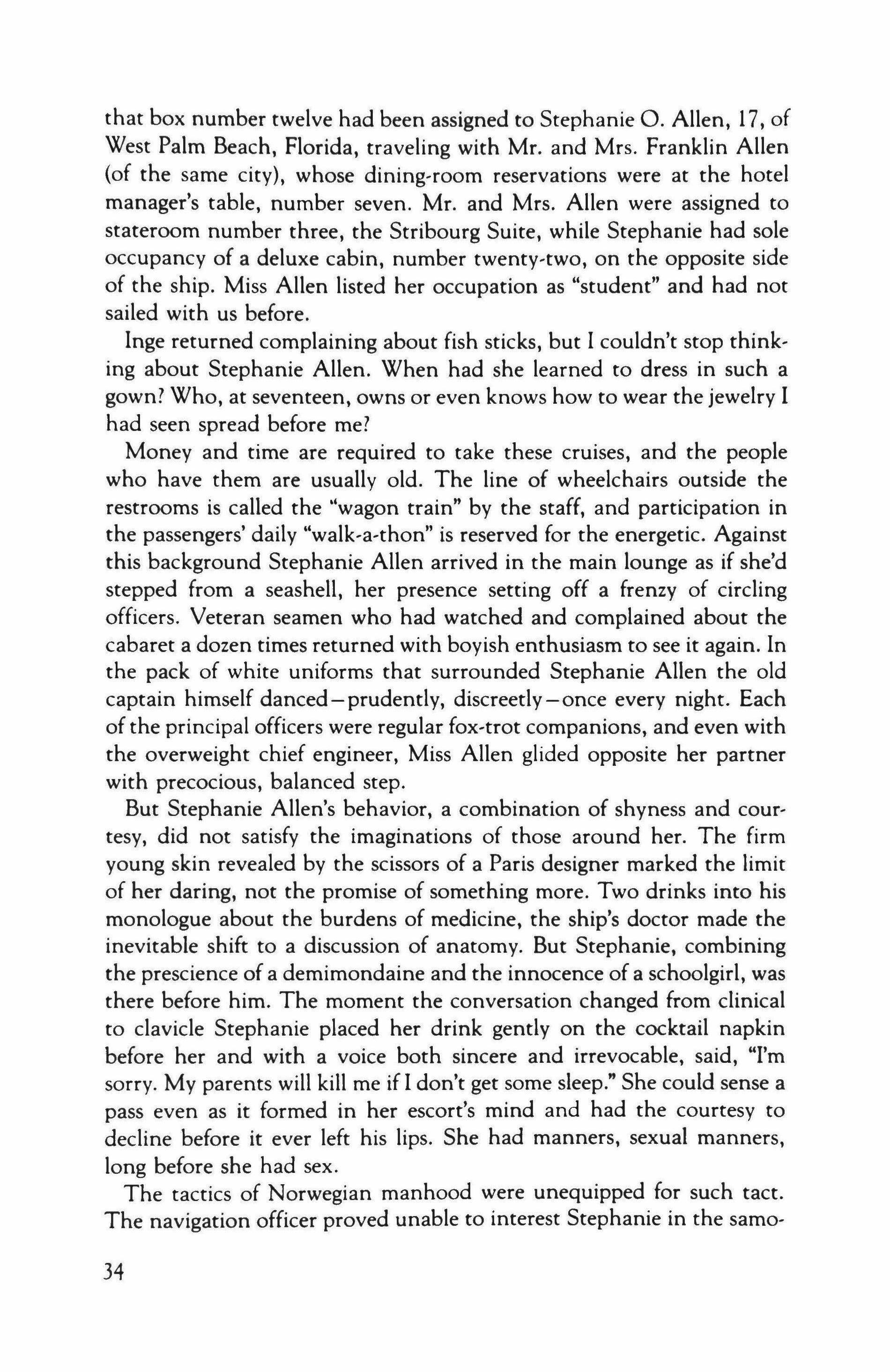
that box number twelve had been assigned to Stephanie O. Allen, 17, of West Palm Beach, Florida, traveling with Mr. and Mrs. Franklin Allen (of the same city), whose dining-room reservations were at the hotel manager's table, number seven. Mr. and Mrs. Allen were assigned to stateroom number three, the Stribourg Suite, while Stephanie had sole occupancy of a deluxe cabin, number twenty-two, on the opposite side of the ship. Miss Allen listed her occupation as "student" and had not sailed with us before.
lnge returned complaining about fish sticks, but I couldn't stop thinking about Stephanie Allen. When had she learned to dress in such a gown? Who, at seventeen, owns or even knows how to wear the jewelry I had seen spread before me?
Money and time are required to take these cruises, and the people who have them are usually old. The line of wheelchairs outside the restrooms is called the "wagon train" by the staff, and participation in the passengers' daily "walk-a-then" is reserved for the energetic. Against this background Stephanie Allen arrived in the main lounge as if she'd stepped from a seashell, her presence setting off a frenzy of circling officers. Veteran seamen who had watched and complained about the cabaret a dozen times returned with boyish enthusiasm to see it again. In the pack of white uniforms that surrounded Stephanie Allen the old captain himself danced-prudently, discreetly-once every night. Each of the principal officers were regular fox-trot companions, and even with the overweight chief engineer, Miss Allen glided opposite her partner with precocious, balanced step.
But Stephanie Allen's behavior, a combination of shyness and courtesy, did not satisfy the imaginations of those around her. The firm young skin revealed by the scissors of a Paris designer marked the limit of her daring, not the promise of something more. Two drinks into his monologue about the burdens of medicine, the ship's doctor made the inevitable shift to a discussion of anatomy. But Stephanie, combining the prescience of a demimondaine and the innocence of a schoolgirl, was there before him. The moment the conversation changed from clinical to clavicle Stephanie placed her drink gently on the cocktail napkin before her and with a voice both sincere and irrevocable, said, "I'm sorry. My parents will kill me if I don't get some sleep." She could sense a pass even as it formed in her escort's mind and had the courtesy to decline before it ever left his lips. She had manners, sexual manners, long before she had sex.
The tactics of Norwegian manhood were unequipped for such tact. The navigation officer proved unable to interest Stephanie in the sarno-
34

var in his cabin. And several of the junior officers discovered that the tried-and-true charms learned at folk dances in the north of Norway failed, in Miss Allen's case, to get them anywhere. Each evening, whether she accompanied her parents from the lounge or lingered afterward to satisfy the remaining dancers, Stephanie Allen returned to her stateroom and slipped out of her elegant gowns without assistance. In the cigar smoke and after-shave of the officers' quarters you could almost hear the sound of grinding teeth.
As a junior officer I wear a white uniform and I fretted at the edges of the swarm. I am permitted in passenger areas on official business onlyto check cash registers or count inventory-and so there was no question of asking Miss Allen to dance. Still, the evening after I met her I stood at the back of the lounge when the show ended, hoping to call out a greeting as she left. I thought she might linger to talk to the young officer who guarded her safety deposit box. And because imagination is free, I even hoped for more. Stephanie Allen had the kind of beauty that reminded you of your place in life, and then dared you to forget it.
"You look dazzling this evening," I called out in a choked voice that Hans-the lounge barkeeper-would later prove capable of mimicking perfectly. Miss Allen was dressed in white and she passed me like a gliding swan, surrounded by her parents, the navigation officer, the chief engineer, and-following protectively behind-the hotel manager. I doubt that she ever heard my voice. She certainly never turned. The hotel manager did turn, however, to look at me once, in the face. My private feelings had been officially noted. He could not reprimand me for complimenting a passenger while I was checking bar accounts. But I knew what his look meant. What I am is one stripe. That's more than no stripes, like Inge, but it's less than every other kind of stripe.
I was angry at the hotel manager's look, but it was not a surprised anger. I lived in a world where food, friends, recreation, corridors of access, laundry soap, cabin furnishings and even toilet paper were determined by the vessel. In such a world it was not all that surprising to turn a corner in the main lounge one evening and discover that my social aspirations had been assigned limits as well.
Late that night I finished my accounts and went up on deck to feel the breeze. The shores of Costa Rica lay beyond the starboard rail, a dim line in the mist. We were so close I could smell the land. I imagined what we must look like to a peasant on the shore, all lights and splendorglittering, passing. I thought of the way Stephanie Allen had passed me in the lounge, and of the hotel manager's look, and about the peasant as he watched all that brightness sail away. I felt sad, then ashamed-like
3S
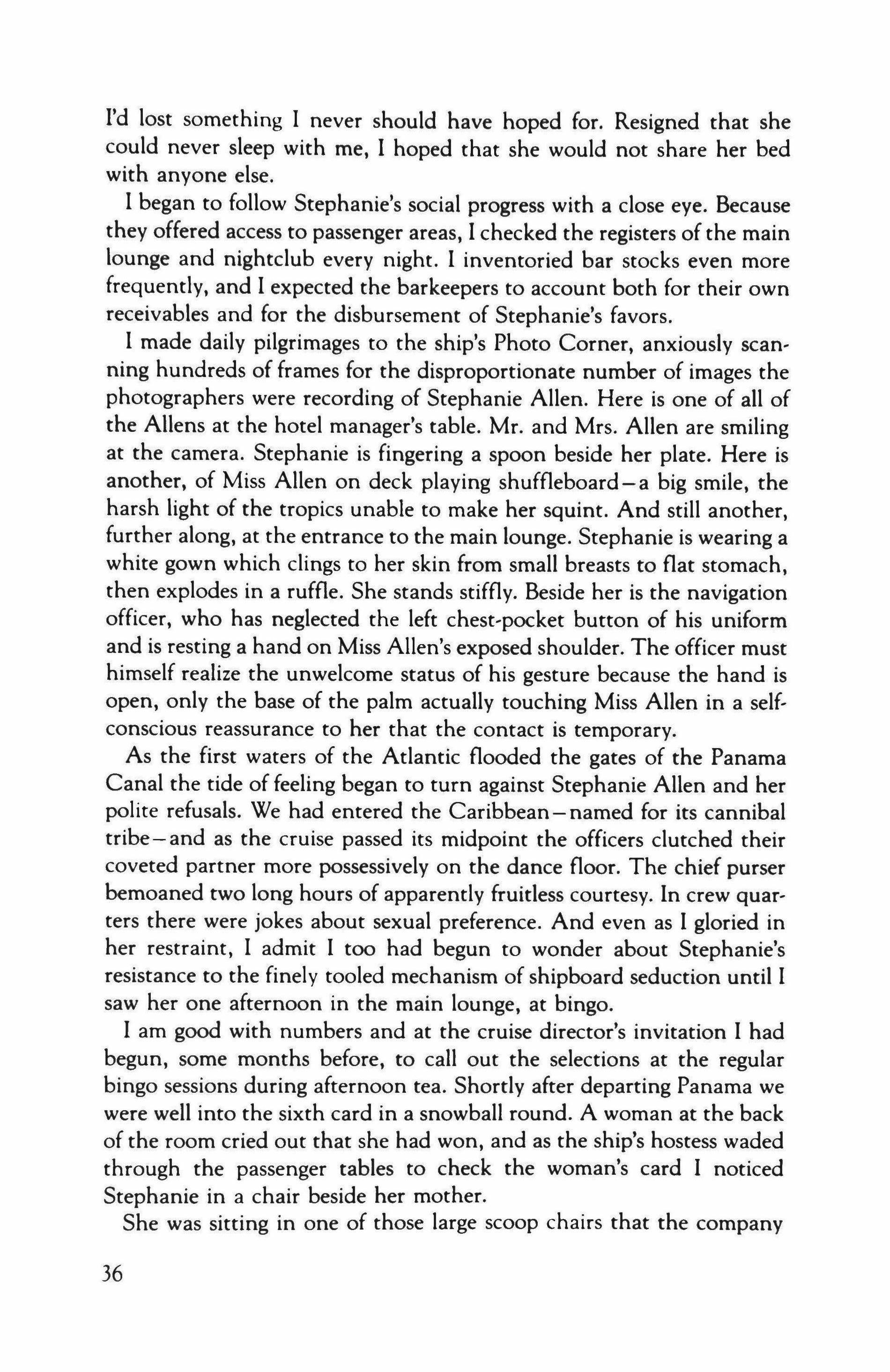
I'd lost something I never should have hoped for. Resigned that she could never sleep with me, I hoped that she would not share her bed with anyone else.
I began to follow Stephanie's social progress with a close eye. Because they offered access to passenger areas, I checked the registers of the main lounge and nightclub every night. I inventoried bar stocks even more frequently, and I expected the barkeepers to account both for their own receivables and for the disbursement of Stephanie's favors.
I made daily pilgrimages to the ship's Photo Corner, anxiously scanning hundreds of frames for the disproportionate number of images the photographers were recording of Stephanie Allen. Here is one of all of the Allens at the hotel manager's table. Mr. and Mrs. Allen are smiling at the camera. Stephanie is fingering a spoon beside her plate. Here is another, of Miss Allen on deck playing shuffleboard-a big smile, the harsh light of the tropics unable to make her squint. And still another, further along, at the entrance to the main lounge. Stephanie is wearing a white gown which clings to her skin from small breasts to flat stomach, then explodes in a ruffle. She stands stiffly. Beside her is the navigation officer, who has neglected the left chest-pocket button of his uniform and is resting a hand on Miss Allen's exposed shoulder. The officer must himself realize the unwelcome status of his gesture because the hand is open, only the base of the palm actually touching Miss Allen in a selfconscious reassurance to her that the contact is temporary.
As the first waters of the Atlantic flooded the gates of the Panama Canal the tide of feeling began to turn against Stephanie Allen and her polite refusals. We had entered the Caribbean-named for its cannibal tribe-and as the cruise passed its midpoint the officers clutched their coveted partner more possessively on the dance floor. The chief purser bemoaned two long hours of apparently fruitless courtesy. In crew quarters there were jokes about sexual preference. And even as I gloried in her restraint, I admit I too had begun to wonder about Stephanie's resistance to the finely tooled mechanism of shipboard seduction until I saw her one afternoon in the main lounge, at bingo.
I am good with numbers and at the cruise director's invitation I had begun, some months before, to call out the selections at the regular bingo sessions during afternoon tea. Shortly after departing Panama we were well into the sixth card in a snowball round. A woman at the back of the room cried out that she had won, and as the ship's hostess waded through the passenger tables to check the woman's card I noticed Stephanie in a chair beside her mother.
She was sitting in one of those large scoop chairs that the company
36

orders with armrests wide enough for even the most indulgent. This was sufficient to make Stephanie's already slight figure seem tiny. Her long black hair was in a ponytail and she was wearing a plain 'Tshirt, a simple pair of shorts and tennis shoes with socks crumpled unevenly about her ankles. Her hands were pressed flat under her thighs and she was swinging her legs as she looked around at nothing in particular. But what struck me most was that the bottoms of her feet, deprived of their high heels, did not touch the carpet. Miss Allen, the human focus of the male gaze, was in fact at that moment-and perhaps at many unexpected moments-a simple, rather bored little girl. I noticed that for once my eye had not been distracted by a low neckline, a diamond earring, or the shimmer of nylon over skin. She was pretty, like your niece might be pretty on the church steps after confirmation. The lipstick, the high heels-the things, I realized, that her mother had taught her-were all that stood between Stephanie Allen and lingering childhood. I was overcome. I stood silent before the microphone until the room began to murmur.
After bingo I became Stephanie Allen's defender. Office jokes about her provoked my stern silence and a stare. One afternoon belowdecks I interrupted a beefy oiler who was demonstrating the exact hip motion he felt would cure Stephanie's reticence. He glared back at me, then stopped. Shipboard fighting is punished by dismissal. He wasn't ready to lose a job over Stephanie Allen, but he could see that I was.
About that time I was going over the photo board when I noticed that Stephanie's mother had had a birthday. She was wearing one of those paper hats, and the ship's photographers had taken the usual pose of the waiters standing around the cake, singing in bad accents. At the left corner of the photo Stephanie joined in the celebration with widemouthed gusto and an eye, I imagined, for the upcoming cake. Seated beside Miss Allen was the ship's hotel manager.
I looked over the board and found three more photographs of Stephanie. In one she was seated in the main lounge with her parents, in a second she was on the dance floor, and in a third she was in the nightclub and her parents were missing. The hotel manager was in each of the photos.
The ship's hotel manager was descended from Norwegian aristocracy. He had traveled to almost as many countries as there were, spoke three languages, and had a passion for beluga caviar which he personally purchased by the kilo tin at the dollar stores in Leningrad. He liked to wash the beluga down with Dom Perignon. None of this information was new. I had already heard it recited by several of the ship's reception-
37

ists. I was simply trying to reconstruct the cocktail conversation depicted in the photos.
I picked up the Photo Shop phone and dialed [oop, the nightclub barkeeper.
"What happened last night?"
"Anything wrong with the receipts?"
"You know what I mean."
"Oh! They talked. They drank. They talked."
"How long?"
"Half an hour. Not more."
"Who left first?"
"She did."
I smiled into the receiver.
I went back to my desk and checked the dining-room liquor receipts from the evening before. Lobster and beef Wellington had been the entrees and at the hotel manager's table for eight, four bottles of wine had been ordered: two of white burgundy, Pouillv-Fuisse, at seventeen dollars and thirty-five cents per bottle, and two of French red, Chateau Margaux, at eighty-five dollars per bottle. Judging from the price differential, I could only imagine that he had persuaded her to try the beef.
Apparently the hotel manager had decided to enter his hand. He was one of the better candidates to accomplish Stephanie's downfall, to complete the transformation that style and fashion had begun. He would not crow over his victory. He was too experienced for that. He had heard symphonies. He had been to plays. One did not imagine him, at least, with lurefisk on his breath.
But the hotel manager did not know, or care, about Stephanie's rumpled socks. He was aware of her looks-was reminded of them nightly at close range - and I'm sure he was amused to watch the other officers gradually embarrass themselves. By the time I noticed his courtship of Stephanie, the pursuit of the "little American witch" had become a shipboard joke. Only a man of enormous self-confidence would have begun a play for her then.
At dinner the hotel manager was seated close enough to Stephanie's parents to tap glasses in a toast. It must have become clear to them, at least by that third day in the Caribbean, that their dinner companion was making more than menu suggestions to their daughter. Whenever possible, he monopolized her on the dance floor. They were seen sitting together on deck. The nightclub photo certainly should have been a warning. But Stephanie's parents were the same people who paid for their daughter's backless, strapless gowns. The packet ofjewelry Stepha-
38

nie owned was intended to adorn a young woman who was herself an ornament. Stephanie had been brought up-bred-to have men surround her. If her parents had noticed an unusual degree of interest among the ship's officer complement, they would have defined it as social success. A limited success, in view of their wealth and connections, but the only kind available here. For the moment, the ship's hotel manager represented wealth, authority and good family to the Aliens, and so would prove an appropriate escort. By the time it became clear that the hotel manager's breeding was not good enough to prevent him from exceeding that role, Stephanie's parents were much too busy on the shipboard social circuit to take notice.
Inge, who typed the cocktail invitations for the ship's officers, kept a barometric eye on shipboard society. This is not because she had an interest in it, beyond its gossip value, but because a socially active cruise produces more invitations for her to type, and the more invitations Inge has to type, the less time she has to read month-old issues of Aftenposten at the reception counter.
The morning before our arrival at Curacao, Inge was furious. Not only was there to be a third private party in the captain's quarters, and a second in those of the staff captain, but the chief purser had now decided that he would require a second private party and the hotel manager had approved it.
Inge's complaints were not new, but when she went on to grumble that Mr. and Mrs. Allen were to be invited "again," she had my attention.
"What do you mean 'again'?" I asked her, scooting my office chair across the floor to her typewriter.
"What do you mean, 'what do I mean again?'?" said Inge, who played indignation very well. "I mean again, and again, and again, and again."
Cocktail parties in officers' quarters were a social honor to be divided as equally as possible among the passengers. Only a fraction of those on board could be accommodated, so repeat invitations were rare.
"Who asked for them to be invited?" I said.
"Oh, the hotel manager," said Inge. "It's too much, I tell you."
"What did he say about the Aliens?"
"He said that they should be invited to all public and officer parties."
"All of them?"
"Unbelievable, isn't it?"
"And all of the Aliens?"
"The parents only, not the little tramp."
"Stephanie. You mean Stephanie."
39

"Sorry. Yes, she's not invited."
So the hotel manager had found a way of cutting the yearling from the herd. I rolled my chair back to my desk, nodding at his meticulous preparation.
Inge went on grumbling, but I had a final question.
"Inge," I interrupted from across the room. "When did the hotel manager order this?"
She looked up, frowned, and then told me more than I wanted to know about the depth of the hotel manager's designs. "Since the beginning," she said. "Since the second day of the cruise."
Inge waited for me to respond but I stared silently back, the calculator humming on my desk. "Details," I was thinking. "Excellence is made of details."
Was I making too much of this? Was I looking for seducers under a bed I knew I would never share? Every morning the hotel manager walked the passenger decks and ran his fingers over the leaves of potted plants to see if the night cleaners had washed them with lemon juice. He held his glass up to the light, even at dinner, before he let his waiter fill it. Once, when the captain made fun of him for arriving slightly late to a meeting, the hotel manager proved to him that the ship's clocks were wrong. The company liked the hotel manager because his eye was everywhere. He inspected staff uniforms, arrived unannounced to check the pantries and he personally reviewed the maitre d's dining-room arrangements before the first evening of every cruise. How does the most beautiful girl on board come to be seated at the hotel manager's table? I thought of the photos, and the liquor chits, and I became afraid for Stephanie Allen. There was a secret, relentless quality here. This was not a seduction that had begun in the eleventh hour. The hotel manager had simply made sure that none of us knew what he was doing until the eleventh hour of the seduction. Any evening now-tonight, tomorrow-the hotel manager would remove from Stephanie's delicate shoulders the fashionable trappings that Stephanie's mother had placed upon them. In the aftermath of what followed, what would become of the Stephanie I had seen only a few afternoons before at bingo? I could not say. But I had only to look at the ship around me to know that anything built from the outside first is hollow in the middle.
All that night and the next morning at Curacao I formed and discarded plans for Stephanie's rescue. He would have won her confidence by then. A simple warning might push her closer to him - at the cost of my position. I could have told her parents, but I had no proof and the hotel manager-as a result of careful labor on his part-was their friend.
40
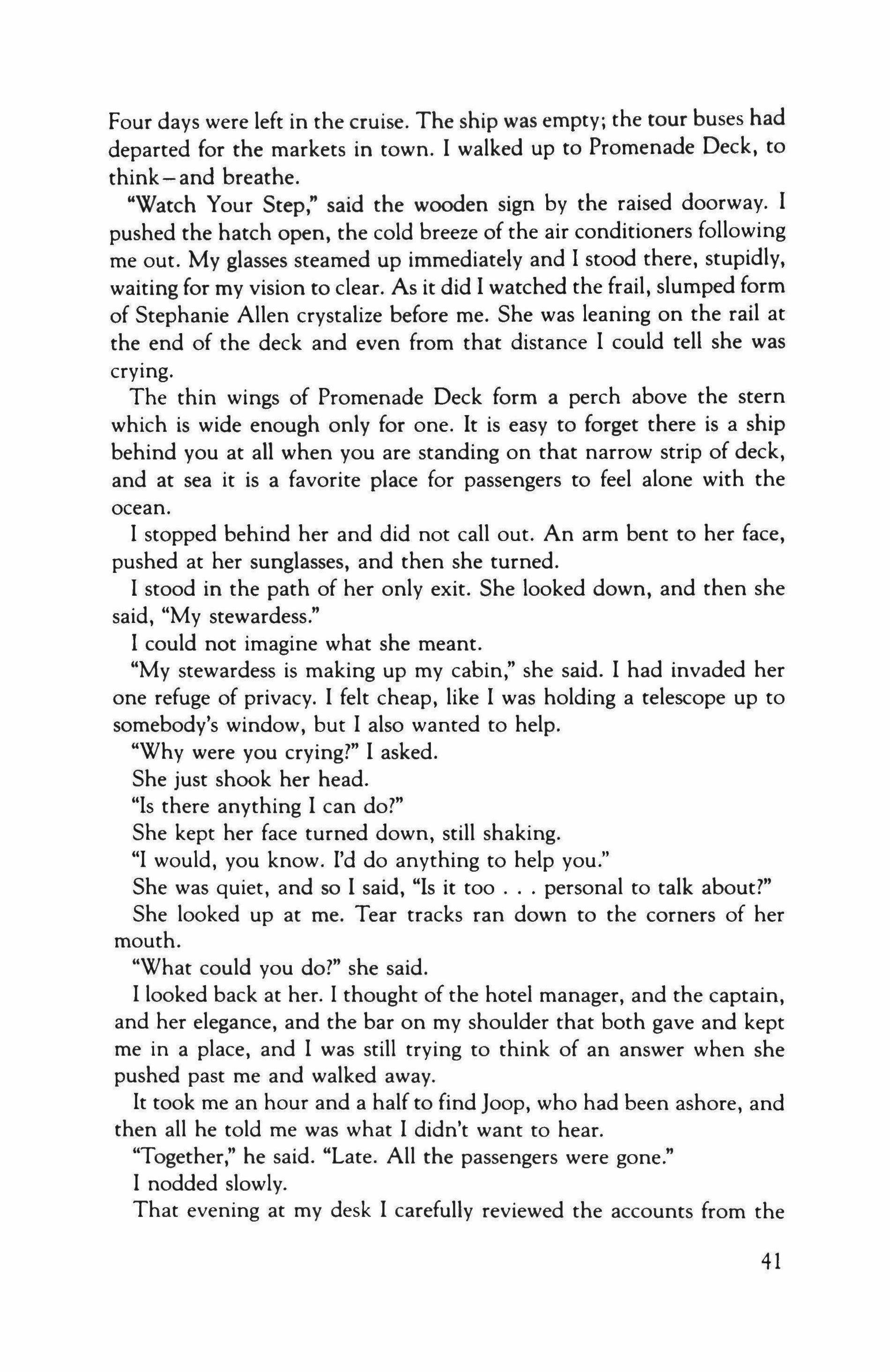
Four days were left in the cruise. The ship was empty; the tour buses had departed for the markets in town. I walked up to Promenade Deck, to think - and breathe.
"Watch Your Step," said the wooden sign by the raised doorway. I pushed the hatch open, the cold breeze of the air conditioners following me out. My glasses steamed up immediately and I stood there, stupidly, waiting for my vision to clear. As it did I watched the frail, slumped form of Stephanie Allen crystalize before me. She was leaning on the rail at the end of the deck and even from that distance I could tell she was crying.
The thin wings of Promenade Deck form a perch above the stern which is wide enough only for one. It is easy to forget there is a ship behind you at all when you are standing on that narrow strip of deck, and at sea it is a favorite place for passengers to feel alone with the ocean.
I stopped behind her and did not call out. An arm bent to her face, pushed at her sunglasses, and then she turned.
I stood in the path of her only exit. She looked down, and then she said, "My stewardess."
I could not imagine what she meant.
"My stewardess is making up my cabin," she said. I had invaded her one refuge of privacy. I felt cheap, like I was holding a telescope up to somebody's window, but I also wanted to help.
"Why were you crying?" I asked.
She just shook her head.
"Is there anything I can do?"
She kept her face turned down, still shaking.
"I would, you know. I'd do anything to help you."
She was quiet, and so I said, "Is it too personal to talk about?"
She looked up at me. Tear tracks ran down to the corners of her mouth.
"What could you do?" she said.
I looked back at her. I thought of the hotel manager, and the captain, and her elegance, and the bar on my shoulder that both gave and kept me in a place, and I was still trying to think of an answer when she pushed past me and walked away.
It took me an hour and a half to find joop, who had been ashore, and then all he told me was what I didn't want to hear.
"Together," he said. "Late. All the passengers were gone."
I nodded slowly.
That evening at my desk I carefully reviewed the accounts from the
41
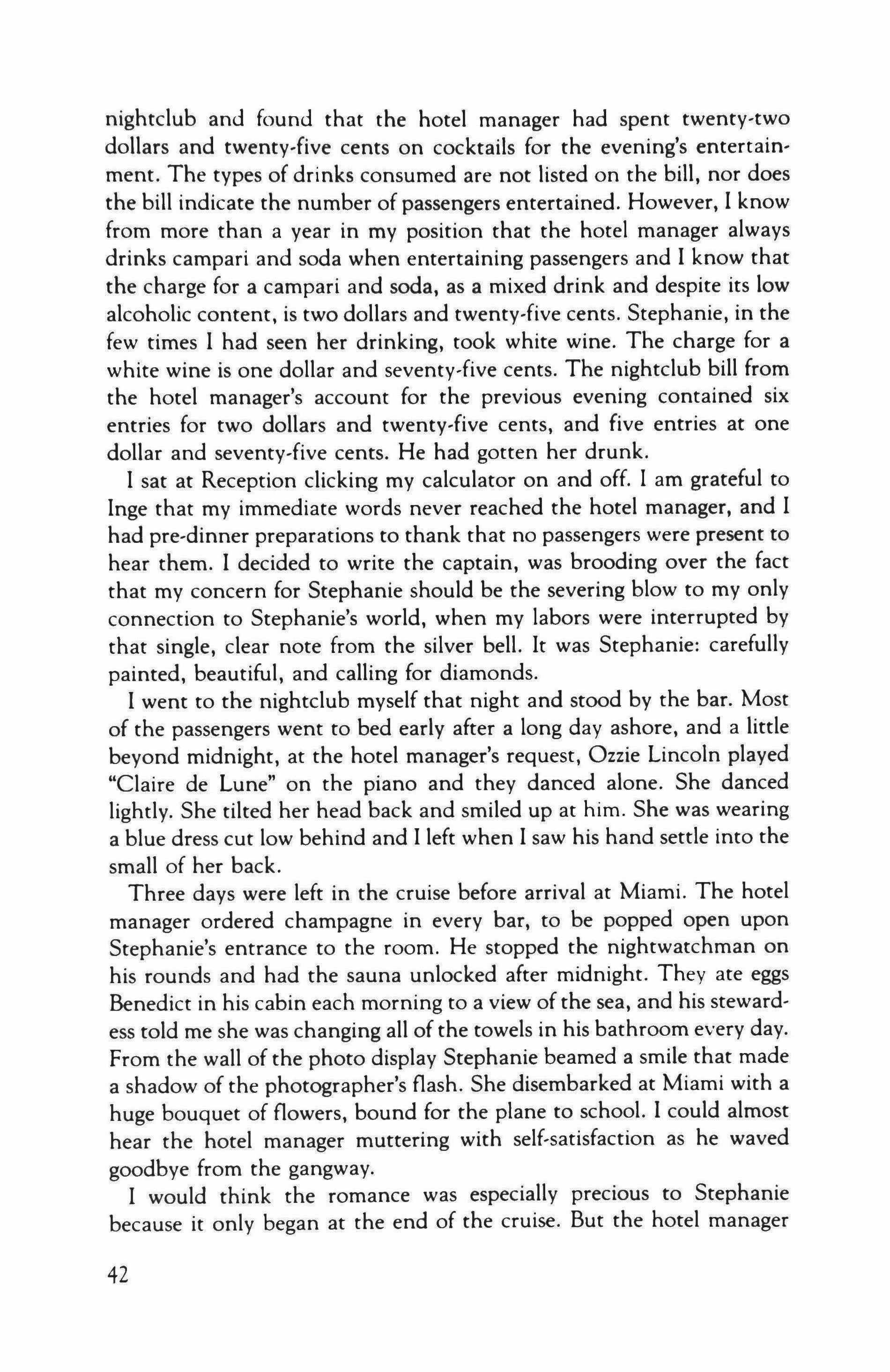
nightclub and found that the hotel manager had spent twenty-two dollars and twenty-five cents on cocktails for the evening's entertainment. The types of drinks consumed are not listed on the bill, nor does the bill indicate the number of passengers entertained. However, I know from more than a year in my position that the hotel manager always drinks campari and soda when entertaining passengers and I know that the charge for a campari and soda, as a mixed drink and despite its low alcoholic content, is two dollars and twenty-five cents. Stephanie, in the few times I had seen her drinking, took white wine. The charge for a white wine is one dollar and seventy-five cents. The nightclub bill from the hotel manager's account for the previous evening contained six entries for two dollars and twenty-five cents, and five entries at one dollar and seventy-five cents. He had gotten her drunk.
I sat at Reception clicking my calculator on and off. I am grateful to Inge that my immediate words never reached the hotel manager, and I had pre-dinner preparations to thank that no passengers were present to hear them. I decided to write the captain, was brooding over the fact that my concern for Stephanie should be the severing blow to my only connection to Stephanie's world, when my labors were interrupted by that single, clear note from the silver bell. It was Stephanie: carefully painted, beautiful, and calling for diamonds.
I went to the nightclub myself that night and stood by the bar. Most of the passengers went to bed early after a long day ashore, and a little beyond midnight, at the hotel manager's request, Ozzie Lincoln played "Claire de Lune" on the piano and they danced alone. She danced lightly. She tilted her head back and smiled up at him. She was wearing a blue dress cut low behind and I left when I saw his hand settle into the small of her back.
Three days were left in the cruise before arrival at Miami. The hotel manager ordered champagne in every bar, to be popped open upon Stephanie's entrance to the room. He stopped the nighrwatchrnan on his rounds and had the sauna unlocked after midnight. They ate eggs Benedict in his cabin each morning to a view of the sea, and his stewardess told me she was changing all of the towels in his bathroom every day. From the wall of the photo display Stephanie beamed a smile that made a shadow of the photographer's flash. She disembarked at Miami with a huge bouquet of flowers, bound for the plane to school. I could almost hear the hotel manager muttering with self-satisfaction as he waved goodbye from the gangway.
I would think the romance was especially precious to Stephanie because it only began at the end of the cruise. But the hotel manager
42
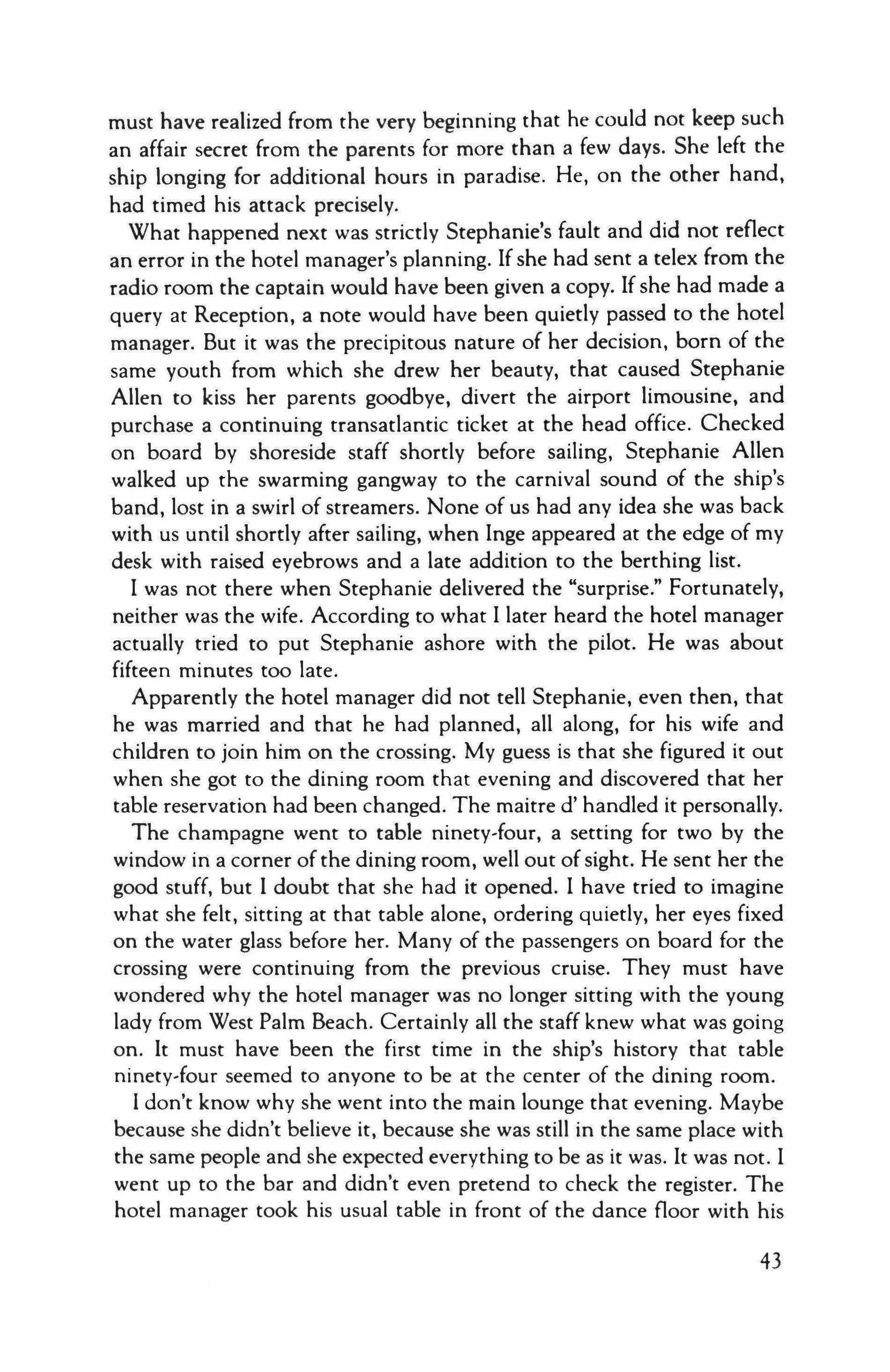
must have realized from the very beginning that he could not keep such an affair secret from the parents for more than a few days. She left the ship longing for additional hours in paradise. He, on the other hand, had timed his attack precisely.
What happened next was strictly Stephanie's fault and did not reflect an error in the hotel manager's planning. If she had sent a telex from the radio room the captain would have been given a copy. If she had made a query at Reception, a note would have been quietly passed to the hotel manager. But it was the precipitous nature of her decision, born of the same youth from which she drew her beauty, that caused Stephanie Allen to kiss her parents goodbye, divert the airport limousine, and purchase a continuing transatlantic ticket at the head office. Checked on board by shoreside staff shortly before sailing, Stephanie Allen walked up the swarming gangway to the carnival sound of the ship's band, lost in a swirl of streamers. None of us had any idea she was back with us until shortly after sailing, when Inge appeared at the edge of my desk with raised eyebrows and a late addition to the berthing list.
I was not there when Stephanie delivered the "surprise." Fortunately, neither was the wife. According to what I later heard the hotel manager actually tried to put Stephanie ashore with the pilot. He was about fifteen minutes too late.
Apparently the hotel manager did not tell Stephanie, even then, that he was married and that he had planned, all along, for his wife and children to join him on the crossing. My guess is that she figured it out when she got to the dining room that evening and discovered that her table reservation had been changed. The maitre d' handled it personally.
The champagne went to table ninety-four, a setting for two by the window in a corner ofthe dining room, well out of sight. He sent her the good stuff, but I doubt that she had it opened. I have tried to imagine what she felt, sitting at that table alone, ordering quietly, her eyes fixed on the water glass before her. Many of the passengers on board for the crossing were continuing from the previous cruise. They must have wondered why the hotel manager was no longer sitting with the young lady from West Palm Beach. Certainly all the staff knew what was going on. It must have been the first time in the ship's history that table ninety-four seemed to anyone to be at the center of the dining room.
I don't know why she went into the main lounge that evening. Maybe because she didn't believe it, because she was still in the same place with the same people and she expected everything to be as it was. It was not. I went up to the bar and didn't even pretend to check the register. The hotel manager took his usual table in front of the dance floor with his
43
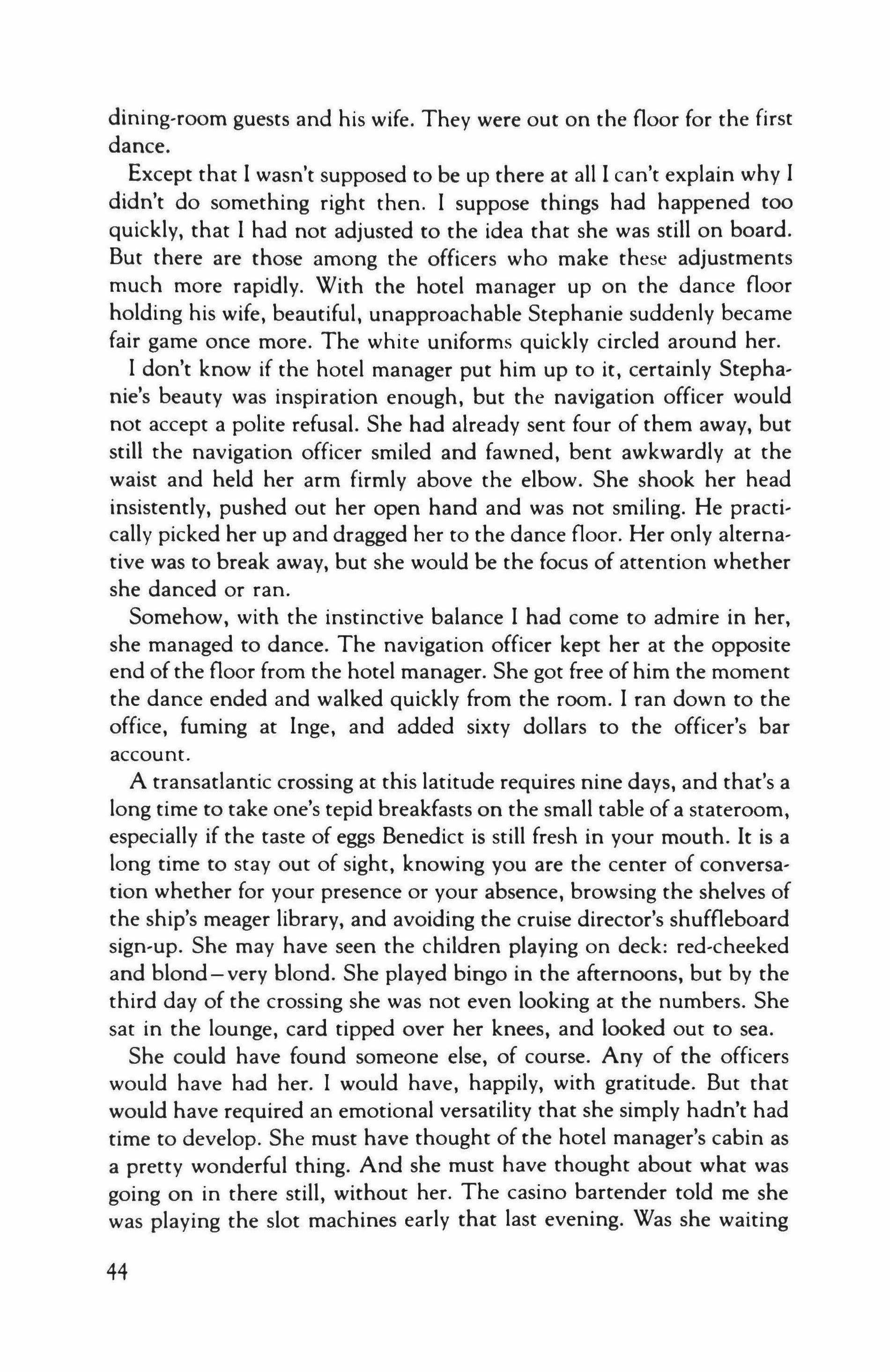
dining-room guests and his wife. They were out on the floor for the first dance.
Except that I wasn't supposed to be up there at aliI can't explain why I didn't do something right then. I suppose things had happened too quickly, that I had not adjusted to the idea that she was still on board. But there are those among the officers who make these adjustments much more rapidly. With the hotel manager up on the dance floor holding his wife, beautiful, unapproachable Stephanie suddenly became fair game once more. The white uniforms quickly circled around her.
I don't know if the hotel manager put him up to it, certainly Stephanie's beauty was inspiration enough, but the navigation officer would not accept a polite refusal. She had already sent four of them away, but still the navigation officer smiled and fawned, bent awkwardly at the waist and held her arm firmly above the elbow. She shook her head insistently, pushed out her open hand and was not smiling. He practically picked her up and dragged her to the dance floor. Her only alternative was to break away, but she would be the focus of attention whether she danced or ran.
Somehow, with the instinctive balance I had come to admire in her, she managed to dance. The navigation officer kept her at the opposite end of the floor from the hotel manager. She got free of him the moment the dance ended and walked quickly from the room. I ran down to the office, fuming at Inge, and added sixty dollars to the officer's bar account.
A transatlantic crossing at this latitude requires nine days, and that's a long time to take one's tepid breakfasts on the small table of a stateroom, especially if the taste of eggs Benedict is still fresh in your mouth. It is a long time to stay out of sight, knowing you are the center of conversation whether for your presence or your absence, browsing the shelves of the ship's meager library, and avoiding the cruise director's shuffleboard sign-up. She may have seen the children playing on deck: red-cheeked and blondvery blond. She played bingo in the afternoons, but by the third day of the crossing she was not even looking at the numbers. She sat in the lounge, card tipped over her knees, and looked out to sea.
She could have found someone else, of course. Any of the officers would have had her. I would have, happily, with gratitude. But that would have required an emotional versatility that she simply hadn't had time to develop. She must have thought of the hotel manager's cabin as a pretty wonderful thing. And she must have thought about what was going on in there still, without her. The casino bartender told me she was playing the slot machines early that last evening. Was she waiting
44
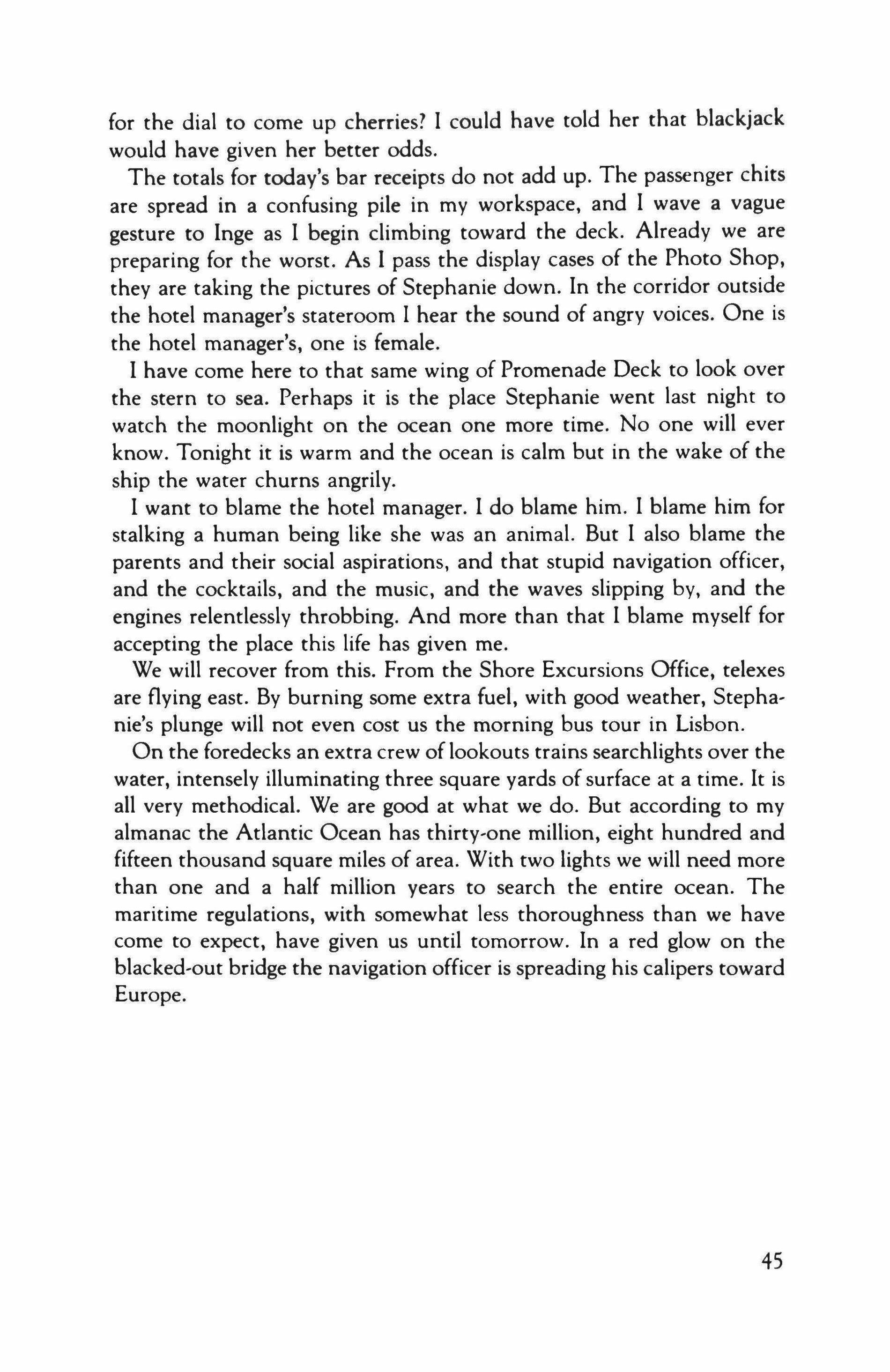
for the dial to come up cherries? I could have told her that blackjack would have given her better odds.
The totals for today's bar receipts do not add up. The passenger chits are spread in a confusing pile in my workspace, and I wave a vague gesture to Inge as I begin climbing toward the deck. Already we are preparing for the worst. As I pass the display cases of the Photo Shop, they are taking the pictures of Stephanie down. In the corridor outside the hotel manager's stateroom I hear the sound of angry voices. One is the hotel manager's, one is female.
I have come here to that same wing of Promenade Deck to look over the stern to sea. Perhaps it is the place Stephanie went last night to watch the moonlight on the ocean one more time. No one will ever know Tonight it is warm and the ocean is calm but in the wake of the ship the water churns angrily.
I want to blame the hotel manager. I do blame him. I blame him for stalking a human being like she was an animal. But I also blame the parents and their social aspirations, and that stupid navigation officer, and the cocktails, and the music, and the waves slipping by, and the engines relentlessly throbbing. And more than that I blame myself for accepting the place this life has given me.
We will recover from this. From the Shore Excursions Office, telexes are flying east. By burning some extra fuel, with good weather, Stephanie's plunge will not even cost us the morning bus tour in Lisbon.
On the foredecks an extra crew of lookouts trains searchlights over the water, intensely illuminating three square yards of surface at a time. It is all very methodical. We are good at what we do. But according to my almanac the Atlantic Ocean has thirty-one million, eight hundred and fifteen thousand square miles of area. With two lights we will need more than one and a half million years to search the entire ocean. The maritime regulations, with somewhat less thoroughness than we have come to expect, have given us until tomorrow. In a red glow on the blacked-out bridge the navigation officer is spreading his calipers toward Europe.
45
Perlita
Paula Fox

My great-uncle, Antonio de Carvajal, lived in a flat in a very old converted mansion on one of the broad avenues of Barcelona called ramblas. In the early spring of 1947, I left Paris where I was then living to visit him. I had $100 with which to support myself for the month I hoped to stay in Spain. I had been in eastern Europe during most of that winter, working in Warsaw as a stringer for a small British news agency. A stringer in the world of journalism was then equivalent to a bricklayer's assistant. My pay was barely enough for traveling but after nearly a year in postwar Europe, I had become practiced in converting my few dollars into other currencies at the best rates of exchange.
This was offered by professional black marketeers as well as by people who had once been teachers, engineers, actors and musicians, and others with now useless vocations, who had been exploded out of their ordinary days by the war and were drifting through the cities of Europe, waiting on the edge of hopelessness for work permits that might enable them to resume some version of their former lives.
I remember the garments they wore, clothes of dispersion, dark threadbare jackets, pants often held up by string, their cold-reddened hands thrust into torn pockets as they stood for hours in all weather near banks and post offices where foreigners tended to gather.
As I boarded the train in Paris, I was too young, too dumb, to worry about entering a fascist country; what I was apprehensive about were my meager funds. But two days after I arrived in Barcelona, I was put in touch with a man who gave me a good exchange for my dollars in pesetas, bills which, at that time, were printed in Leipzig, Germany.
He was a Republican doctor who was not allowed to practice medicine by the Falange. He earned a living of sorts in the black market. During
46
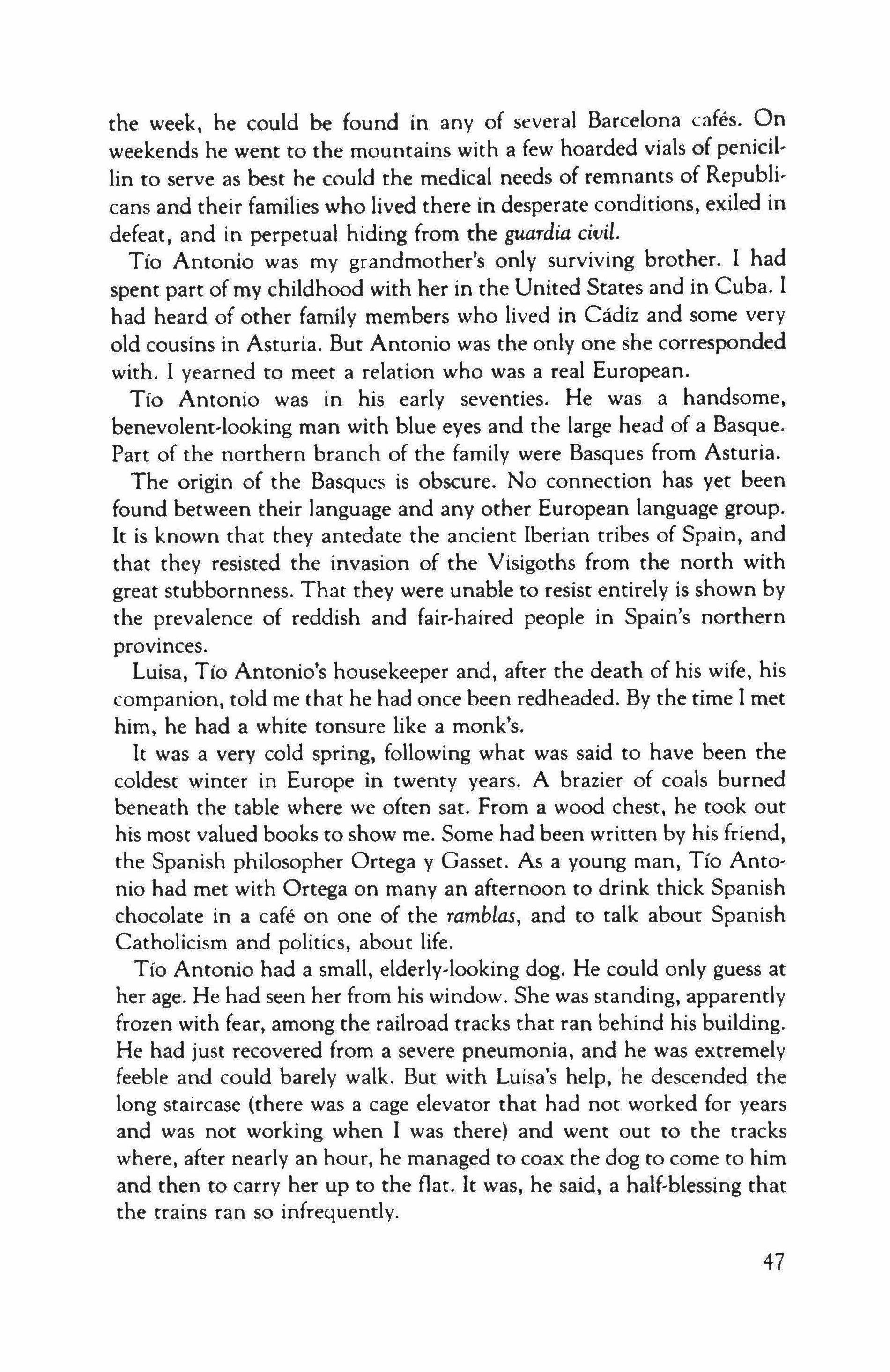
the week, he could be found in any of several Barcelona cafes. On weekends he went to the mountains with a few hoarded vials of penicillin to serve as best he could the medical needs of remnants of Republicans and their families who lived there in desperate conditions, exiled in defeat, and in perpetual hiding from the guardia civil.
Tto Antonio was my grandmother's only surviving brother. I had spent part of my childhood with her in the United States and in Cuba. I had heard of other family members who lived in Cadiz and some very old cousins in Asturia. But Antonio was the only one she corresponded with. I yearned to meet a relation who was a real European.
Tio Antonio was in his early seventies. He was a handsome, benevolent-looking man with blue eyes and the large head of a Basque. Part of the northern branch of the family were Basques from Asturia.
The origin of the Basques is obscure. No connection has yet been found between their language and any other European language group. It is known that they antedate the ancient Iberian tribes of Spain, and that they resisted the invasion of the Visigoths from the north with great stubbornness. That they were unable to resist entirely is shown by the prevalence of reddish and fair-haired people in Spain's northern provinces.
Luisa, Tto Antonio's housekeeper and, after the death of his wife, his companion, told me that he had once been redheaded. By the time I met him, he had a white tonsure like a monk's.
It was a very cold spring, following what was said to have been the coldest winter in Europe in twenty years. A brazier of coals burned beneath the table where we often sat. From a wood chest, he took out his most valued books to show me. Some had been written by his friend, the Spanish philosopher Ortega y Gasset. As a young man, Tfo Antonio had met with Ortega on many an afternoon to drink thick Spanish chocolate in a cafe on one of the ramblas, and to talk about Spanish Catholicism and politics, about life.
Tio Antonio had a small, elderly-looking dog. He could only guess at her age. He had seen her from his window. She was standing, apparently frozen with fear, among the railroad tracks that ran behind his building. He had just recovered from a severe pneumonia, and he was extremely feeble and could barely walk. But with Luisa's help, he descended the long staircase (there was a cage elevator that had not worked for years and was not working when I was there) and went out to the tracks where, after nearly an hour, he managed to coax the dog to come to him and then to carry her up to the flat. It was, he said, a half-blessing that the trains ran so infrequently.
47
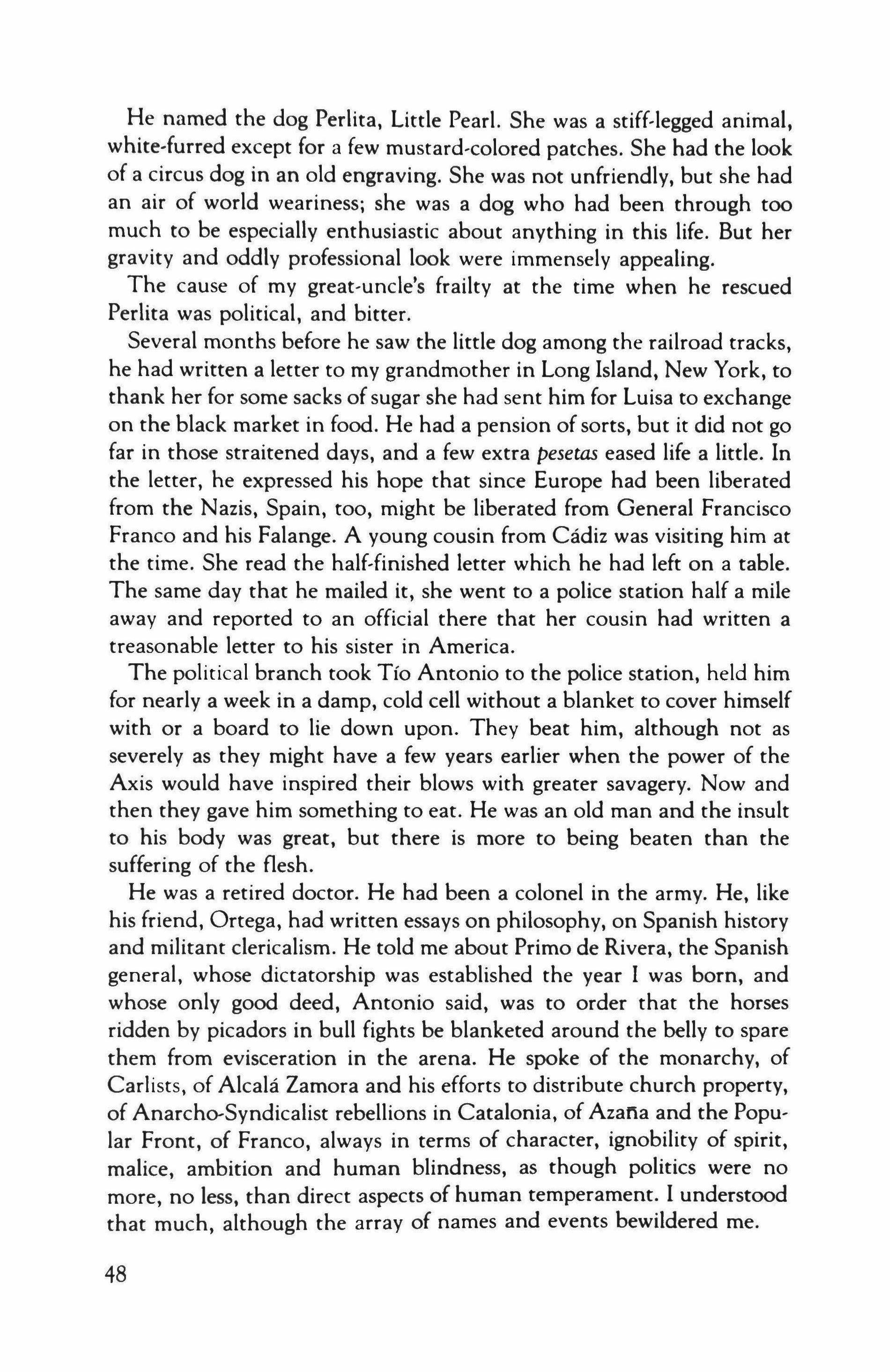
He named the dog Perlita, Little Pearl. She was a stiff-legged animal, white-furred except for a few mustard-colored patches. She had the look of a circus dog in an old engraving. She was not unfriendly, but she had an air of world weariness; she was a dog who had been through too much to be especially enthusiastic about anything in this life. But her gravity and oddly professional look were immensely appealing.
The cause of my great-uncle's frailty at the time when he rescued Perlita was political, and bitter.
Several months before he saw the little dog among the railroad tracks, he had written a letter to my grandmother in Long Island, New York, to thank her for some sacks of sugar she had sent him for Luisa to exchange on the black market in food. He had a pension of sorts, but it did not go far in those straitened days, and a few extra pesetas eased life a little. In the letter, he expressed his hope that since Europe had been liberated from the Nazis, Spain, too, might be liberated from General Francisco Franco and his Falange. A young cousin from Cadiz was visiting him at the time. She read the half-finished letter which he had left on a table. The same day that he mailed it, she went to a police station half a mile away and reported to an official there that her cousin had written a treasonable letter to his sister in America.
The political branch took Tio Antonio to the police station, held him for nearly a week in a damp, cold cell without a blanket to cover himself with or a board to lie down upon. They beat him, although not as severely as they might have a few years earlier when the power of the Axis would have inspired their blows with greater savagery. Now and then they gave him something to eat. He was an old man and the insult to his body was great, but there is more to being beaten than the suffering of the flesh.
He was a retired doctor. He had been a colonel in the army. He, like his friend, Ortega, had written essays on philosophy, on Spanish history and militant clericalism. He told me about Primo de Rivera, the Spanish general, whose dictatorship was established the year I was born, and whose only good deed, Antonio said, was to order that the horses ridden by picadors in bull fights be blanketed around the belly to spare them from evisceration in the arena. He spoke of the monarchy, of Carlists, of Alcala Zamora and his efforts to distribute church property, of Anarcho-Svndicalist rebellions in Catalonia, of Azana and the Popular Front, of Franco, always in terms of character, ignobility of spirit, malice, ambition and human blindness, as though politics were no more, no less, than direct aspects of human temperament. I understood that much, although the array of names and events bewildered me.
48

Luisa went to the police station each Jay he was there, bringing food and warm clothing which were not taken to him. She would wait outside until the dark came. And she was there that cold dusk when he was thrust out of the doors to faint in the street.
He was ill for a long time. It was during his convalescence that he saw the little dog and saved her.
Perlita was such a strange creature. She would stand for a long time at the threshhold of a room as though awaiting a sign. She was quite plump by the time I saw her. I asked him how he had fattened her up, for he told me she was nothing but skin and bones when he rescued her.
"Sopa de ajo," he answered, smiling.
Garlic soup.
When I lived with my grandmother in a small suburban village on Long Island, she occasionally sent me off to school in the morning with a breakfast rather different from cereal and toast. She minced cloves of garlic and spread them on a slice of dark bread that had been soaked in olive oil. On those mornings, my arrival at P.S. 99 was greeted by my schoolmates with cries of mock-horror and hands stretched out to warn me not to come close to them.
I was the foreigner in the school whose population was made up largely, as I recall, of working-class Irish Catholics. The final damning evidence of my foreignness was my grandmother herself when she came to school on those days set aside for parents to visit the classrooms.
She did not in the least resemble any other parents. She was older, of course. She had a thick Spanish accent. She looked like a Spanish woman from northern Spain.
I loved the dark bread covered with garlic, and I did not give it up.
Prejudice has its own headaches. I was a puzzle to the other children. I was fair-haired and might have been taken for a Scandinavian. One branch of my relatives in Southern Spain was descended from the Emirate of Granada. If the children had known I also had Arab ancestors from North Africa, they might have been entirely floored -or run me out of the school. As it was, they didn't know what to do with me. They settled for halfway measures, allowing themselves to torment me from time to time, becoming friendly when they forgot-as children willwhat it was exactly they were tormenting me for. Toward the end of my time at the school, their attention was diverted from me by the arrival of two boys, also "foreigners," an Armenian, and a French-Canadian whose accent was as heavy as my grandmother's. The three of us soon contrived a small country of our own.
When Tto Antonio told me what he had fed the starved Perlita, I
49
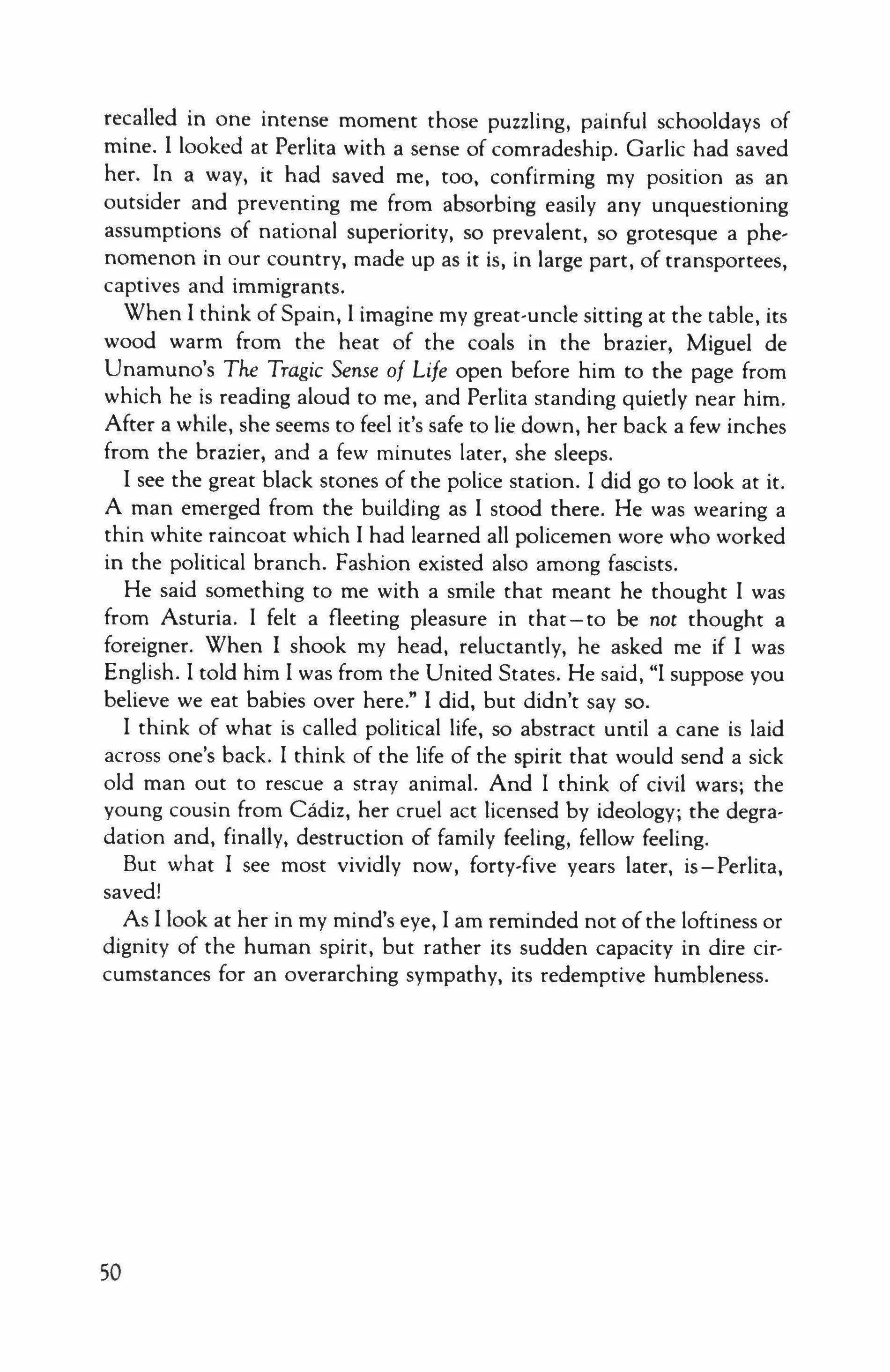
recalled in one intense moment those puzzling, painful schooldays of mine. I looked at Perlita with a sense of comradeship. Garlic had saved her. In a way, it had saved me, too, confirming my position as an outsider and preventing me from absorbing easily any unquestioning assumptions of national superiority, so prevalent, so grotesque a phenomenon in our country, made up as it is, in large part, of transportees, captives and immigrants.
When I think of Spain, I imagine my great-uncle sitting at the table, its wood warm from the heat of the coals in the brazier, Miguel de Unamuno's The Tragic Sense of Life open before him to the page from which he is reading aloud to me, and Perlita standing quietly near him. After a while, she seems to feel it's safe to lie down, her back a few inches from the brazier, and a few minutes later, she sleeps.
I see the great black stones of the police station. I did go to look at it. A man emerged from the building as I stood there. He was wearing a thin white raincoat which I had learned all policemen wore who worked in the political branch. Fashion existed also among fascists.
He said something to me with a smile that meant he thought I was from Asturia. I felt a fleeting pleasure in that-to be not thought a foreigner. When I shook my head, reluctantly, he asked me if I was English. I told him I was from the United States. He said, "I suppose you believe we eat babies over here." I did, but didn't say so.
I think of what is called political life, so abstract until a cane is laid across one's back. I think of the life of the spirit that would send a sick old man out to rescue a stray animal. And I think of civil wars; the young cousin from Cadiz, her cruel act licensed by ideology; the degradation and, finally, destruction of family feeling, fellow feeling.
But what I see most vividly now, forty-five years later, is-Perlita, saved!
As I look at her in my mind's eye, I am reminded not of the loftiness or dignity of the human spirit, but rather its sudden capacity in dire circumstances for an overarching sympathy, its redemptive humbleness.
50
The Life of the Body
Tobias Wolff
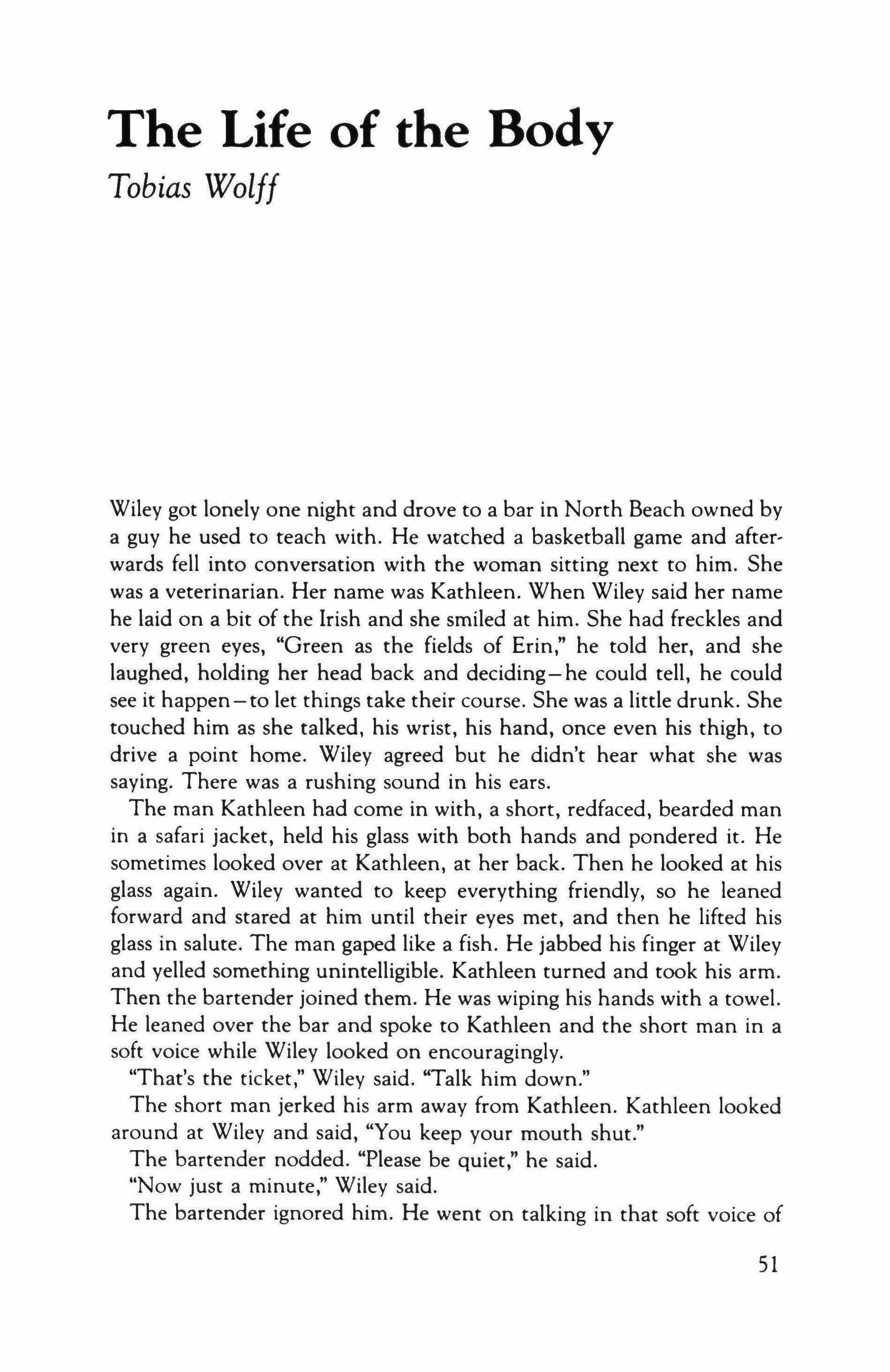
Wiley got lonely one night and drove to a bar in North Beach owned by a guy he used to teach with. He watched a basketball game and afterwards fell into conversation with the woman sitting next to him. She was a veterinarian. Her name was Kathleen. When Wiley said her name he laid on a bit of the Irish and she smiled at him. She had freckles and very green eyes, "Green as the fields of Erin," he told her, and she laughed, holding her head back and deciding-he could tell, he could see it happen-to let things take their course. She was a little drunk. She touched him as she talked, his wrist, his hand, once even his thigh, to drive a point home. Wiley agreed but he didn't hear what she was saying. There was a rushing sound in his ears.
The man Kathleen had come in with, a short, redfaced, bearded man in a safari jacket, held his glass with both hands and pondered it. He sometimes looked over at Kathleen, at her back. Then he looked at his glass again. Wiley wanted to keep everything friendly, so he leaned forward and stared at him until their eyes met, and then he lifted his glass in salute. The man gaped like a fish. He jabbed his finger at Wiley and yelled something unintelligible. Kathleen turned and took his arm. Then the bartender joined them. He was wiping his hands with a towel. He leaned over the bar and spoke to Kathleen and the short man in a soft voice while Wiley looked on encouragingly.
"That's the ticket," Wiley said. "Talk him down."
The short man jerked his arm away from Kathleen. Kathleen looked around at Wiley and said, "You keep your mouth shut."
The bartender nodded. "Please be quiet," he said.
"Now just a minute," Wiley said.
The bartender ignored him. He went on talking in that soft voice of
51
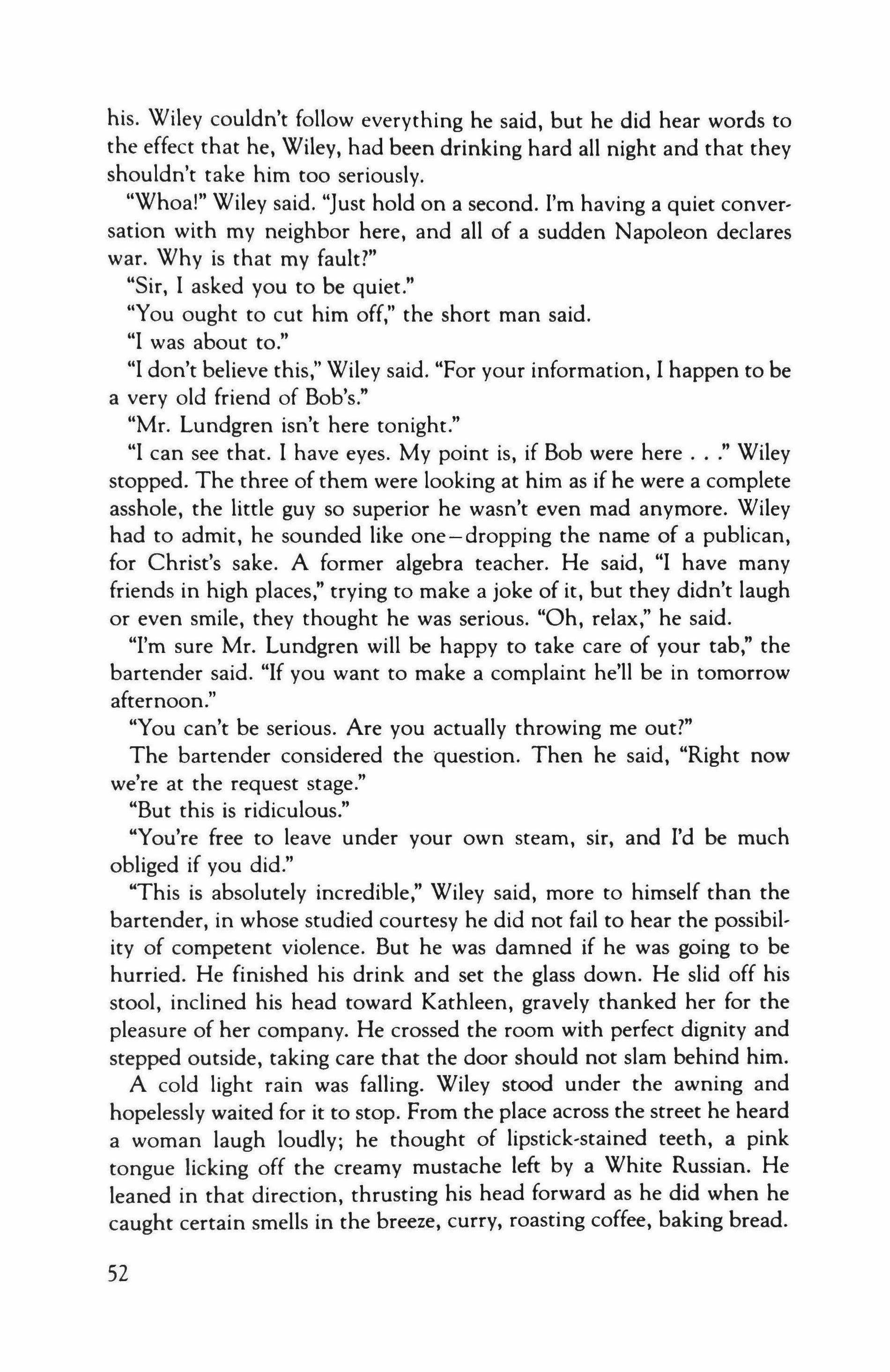
his. Wiley couldn't follow everything he said, but he did hear words to the effect that he, Wiley, had been drinking hard all night and that they shouldn't take him too seriously.
"Whoa!" Wiley said. "Just hold on a second. I'm having a quiet conversation with my neighbor here, and all of a sudden Napoleon declares war. Why is that my fault?"
"Sir, I asked you to be quiet."
"You ought to cut him off," the short man said.
"I was about to."
"I don't believe this," Wiley said. "For your information, I happen to be a very old friend of Bob's."
"Mr. Lundgren isn't here tonight."
"I can see that. I have eyes. My point is, if Bob were here " Wiley stopped. The three of them were looking at him as if he were a complete asshole, the little guy so superior he wasn't even mad anymore. Wiley had to admit, he sounded like one-dropping the name of a publican, for Christ's sake. A former algebra teacher. He said, "I have many friends in high places," trying to make a joke of it, but they didn't laugh or even smile, they thought he was serious. "Oh, relax," he said.
"I'm sure Mr. Lundgren will be happy to take care of your tab," the bartender said. "If you want to make a complaint he'll be in tomorrow afternoon."
"You can't be serious. Are you actually throwing me out?"
The bartender considered the question. Then he said, "Right now we're at the request stage."
"But this is ridiculous."
"You're free to leave under your own steam, sir, and I'd be much obliged if you did."
"This is absolutely incredible," Wiley said, more to himself than the bartender, in whose studied courtesy he did not fail to hear the possibility of competent violence. But he was damned if he was going to be hurried. He finished his drink and set the glass down. He slid off his stool, inclined his head toward Kathleen, gravely thanked her for the pleasure of her company. He crossed the room with perfect dignity and stepped outside, taking care that the door should not slam behind him.
A cold light rain was falling. Wiley stood under the awning and hopelessly waited for it to stop. From the place across the street he heard a woman laugh loudly; he thought of lipstick-stained teeth, a pink tongue licking off the creamy mustache left by a White Russian. He leaned in that direction, thrusting his head forward as he did when he caught certain smells in the breeze, curry, roasting coffee, baking bread.
52

Wiley raised his jacket collar and pushed off up the hill, toward the garage where he'd left his car. When he reached the corner he stopped. He could not go home now, not like this. He could not allow this absurd picture of himself to survive in Kathleen's mind. It was important that she know the truth about him, and not go through life believing that he was some kind of mouthy lush who got tossed out of bars. Because he wasn't. Nothing like this had ever happened to him before.
He crossed the street and walked back downhill to the other bar. Two women were sitting in the corner with three men. The one Wiley had heard laughing was still at it. Whenever anybody said anything she cracked up. They were all in their fifties, tourists from the look of them, the only customers in the place. Wiley bought a whiskey and carried it to a table by the window where he could keep an eye on the bar he'd just been asked to leave.
Nothing like this had ever happened to him. He was an English teacher in a private high school. He lived alone. He didn't go to bars much and almost never drank whiskey. He liked good wine, knew something about it, but was wary of knowing too much. At night, after he'd prepared his classes, he drank wine and read nineteenth-century novels. He didn't like modern fiction, its narcissism, its moral timidity, its silence in the face of great wrongs. Wiley had started teaching to support himself while he wrote his doctoral thesis on Dickens, and then lost interest in scholarship as he began to sense the power he had over his students. They were still young enough that they had no investment in the lies the world told about itself; he could make a difference in the way they saw things.
Wiley read thick books late into the night and sometimes got only a few hours' sleep, but in nine years he had never missed a day of work; come morning he pushed himself out of bed just in time and drove to school still fumbling with his buttons, stomach empty, coffee sloshing in the cup between his knees.
Wiley didn't like living alone. He wanted to get married, had always assumed he would be married by now, but he'd had bad luck with women. The last one brushed him off after four months. Her name was Monique. She was a French teacher on exchange, a tall jaunty Parisian who humiliated the boys in her class by mimicking their oafish accents, and the girls by rendering them invisible to the boys. She wore dark glasses even when she went to movies. Her full red lips were habitually pursed. Wiley learned they were held thus in readiness not for passion, but scorn, at least where he was concerned. After Monique read Catcher in the Rye her dissatisfaction found a home in the word "phony." He
53
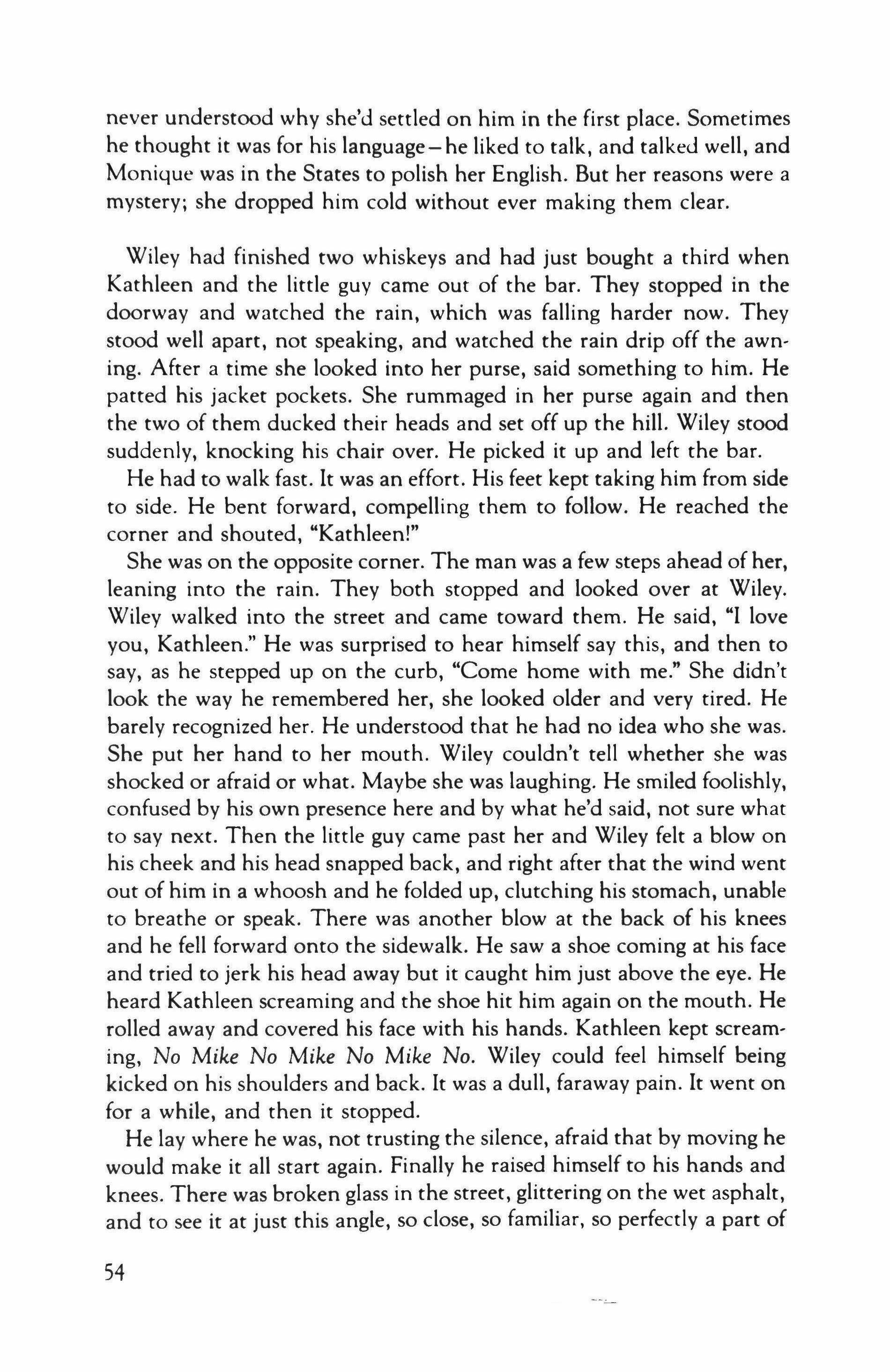
never understood why she'd settled on him in the first place. Sometimes he thought it was for his language-he liked to talk, and talked well, and Monique was in the States to polish her English. But her reasons were a mvsterv; she dropped him cold without ever making them clear.
Wiley had finished two whiskeys and had just bought a third when Kathleen and the little guy came out of the bar. They stopped in the doorway and watched the rain, which was falling harder now. They stood well apart, not speaking, and watched the rain drip off the awning. After a time she looked into her purse, said something to him. He patted his jacket pockets. She rummaged in her purse again and then the two of them ducked their heads and set off up the hill. Wiley stood suddenly, knocking his chair over. He picked it up and left the bar. He had to walk fast. It was an effort. His feet kept taking him from side to side. He bent forward, compelling them to follow. He reached the corner and shouted, "Kathleen!"
She was on the opposite corner. The man was a few steps ahead of her, leaning into the rain. They both stopped and looked over at Wiley. Wiley walked into the street and came toward them. He said, "I love you, Kathleen." He was surprised to hear himself say this, and then to say, as he stepped up on the curb, "Come home with me." She didn't look the way he remembered her, she looked older and very tired. He barely recognized her. He understood that he had no idea who she was. She put her hand to her mouth. Wiley couldn't tell whether she was shocked or afraid or what. Maybe she was laughing. He smiled foolishly, confused by his own presence here and by what he'd said, not sure what to say next. Then the little guy came past her and Wiley felt a blow on his cheek and his head snapped back, and right after that the wind went out of him in a whoosh and he folded up, clutching his stomach, unable to breathe or speak. There was another blow at the back of his knees and he fell forward onto the sidewalk. He saw a shoe coming at his face and tried to jerk his head away but it caught him just above the eye. He heard Kathleen screaming and the shoe hit him again on the mouth. He rolled away and covered his face with his hands. Kathleen kept screaming, No Mike No Mike No Mike No. Wiley could feel himself being kicked on his shoulders and back. It was a dull, faraway pain. It went on for a while, and then it stopped.
He lay where he was, not trusting the silence, afraid that by moving he would make it all start again. Finally he raised himself to his hands and knees. There was broken glass in the street, glittering on the wet asphalt, and to see it at just this angle, so close, so familiar, so perfectly a part of
54
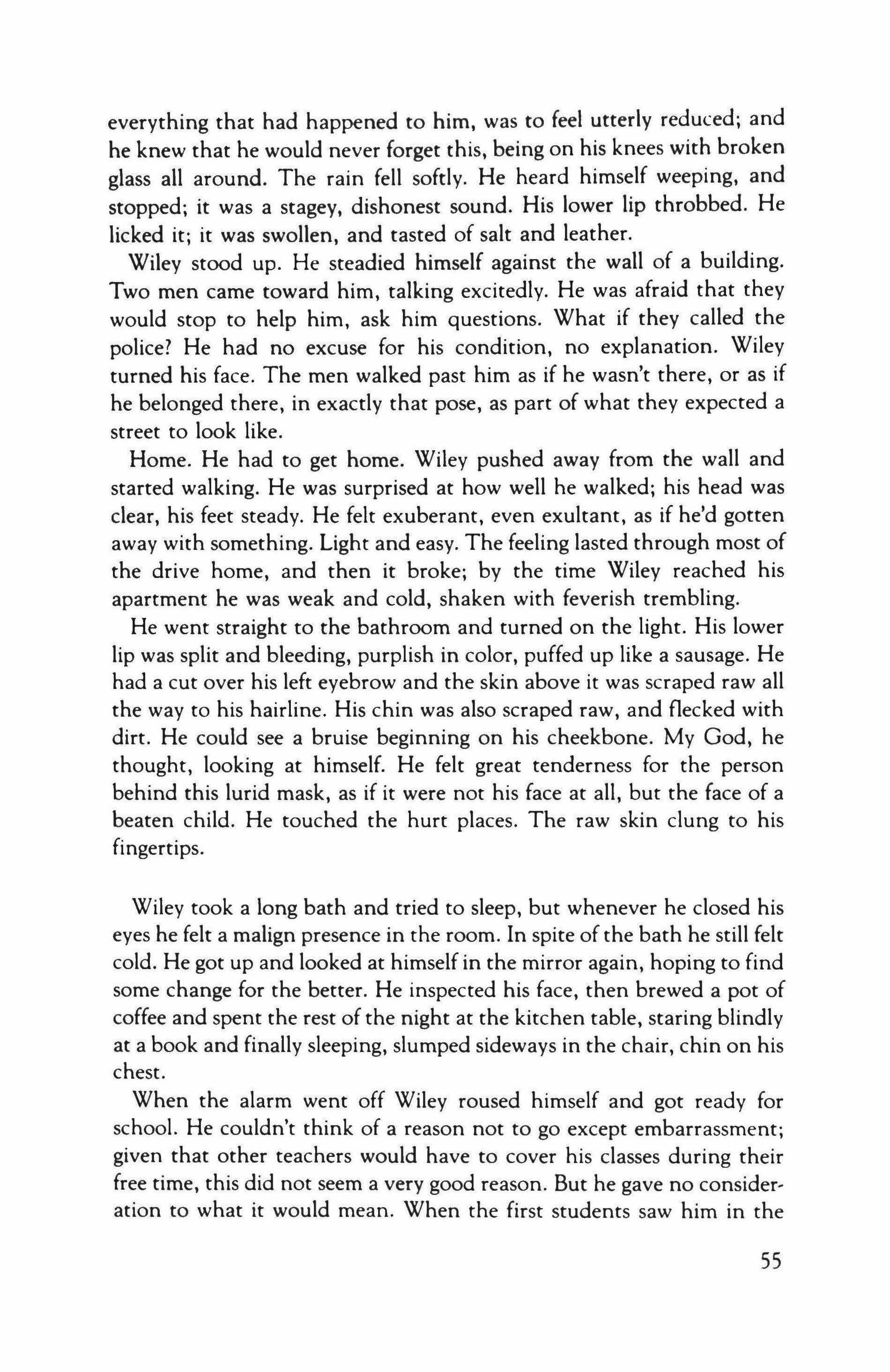
everything that had happened to him, was to feel utterly reduced; and he knew that he would never forget this, being on his knees with broken glass all around. The rain fell softly. He heard himself weeping, and stopped; it was a stagey, dishonest sound. His lower lip throbbed. He licked it; it was swollen, and tasted of salt and leather.
Wiley stood up. He steadied himself against the wall of a building. Two men came toward him, talking excitedly. He was afraid that they would stop to help him, ask him questions. What if they called the police? He had no excuse for his condition, no explanation. Wiley turned his face. The men walked past him as if he wasn't there, or as if he belonged there, in exactly that pose, as part of what they expected a street to look like.
Home. He had to get home. Wiley pushed away from the wall and started walking. He was surprised at how well he walked; his head was clear, his feet steady. He felt exuberant, even exultant, as if he'd gotten away with something. Light and easy. The feeling lasted through most of the drive home, and then it broke; by the time Wiley reached his apartment he was weak and cold, shaken with feverish trembling. He went straight to the bathroom and turned on the light. His lower lip was split and bleeding, purplish in color, puffed up like a sausage. He had a cut over his left eyebrow and the skin above it was scraped raw all the way to his hairline. His chin was also scraped raw, and flecked with dirt. He could see a bruise beginning on his cheekbone. My God, he thought, looking at himself. He felt great tenderness for the person behind this lurid mask, as if it were not his face at all, but the face of a beaten child. He touched the hurt places. The raw skin clung to his fingertips.
Wiley took a long bath and tried to sleep, but whenever he closed his eyes he felt a malign presence in the room. In spite of the bath he still felt cold. He got up and looked at himself in the mirror again, hoping to find some change for the better. He inspected his face, then brewed a pot of coffee and spent the rest of the night at the kitchen table, staring blindly at a book and finally sleeping, slumped sideways in the chair, chin on his chest.
When the alarm went off Wiley roused himself and got ready for school. He couldn't think of a reason not to go except embarrassment; given that other teachers would have to cover his classes during their free time, this did not seem a very good reason. But he gave no consideration to what it would mean. When the first students saw him in the
55

hallway and started quizzing him, he had no answers ready. One boy asked if he'd been mugged.
Wiley nodded, thinking that was basically true.
"Must have been a whole shitload of them."
"Well, not that many," Wiley said, and walked on. He went straight to his classroom instead of stopping off in the teachers' lounge, but he hadn't been at his desk five minutes before the principal came in. "Mr. Wiley," he said, "let's have a look at you." He walked up close and peered at Wiley's face. Students were filing in behind him. trying not to stare at Wiley as they took their seats. "What exactly happened?" the principal asked.
"1 got mugged."
"Have you seen a doctor?"
"Not yet."
"You should. That's a prize set of bruises you've got there. Very nasty. Call the police?"
"No. I'm still in sort of a daze." Wiley said this in a low voice so the students wouldn't hear him.
Wiley's friend Mac stuck his head in the door. When he saw the principal he nodded coolly. "You O.K.?" he said to Wiley.
"1 guess."
"1 heard there were eight of them. Is that right, eight?"
"No." Wiley tried to smile but his face wouldn't let him. "Just two," he said. He couldn't admit to one, not with all this damage, but eight sounded like a movie.
"Two's enough," Mac said. "You O.K.?"
The principal said, "Just let me know if you want to go home. Seriously, now, Mr. Wiley-no heroics. I'm touched that you came in at all." He stopped at the door on his way out and turned to the students. "Be warned, ladies and gentlemen. What happened to Mr. Wiley is going to happen to your children. It will be a common occurrence. That's the kind of world they're going to live in if you don't do something to change it." He let his eyes pass slowly around the room the way he did at school assemblies. "The choice is yours," he said.
Mac applauded silently behind him.
After Mac and the principal left two boys got up and pretended to attack each other with kicks and chops, crying Hai! Hai! Hai! One of them drove the other to the back of the class, where he crashed to the floor and lay with his arms and legs twitching. Then the bell rang and they both went back to their desks.
This was a senior honors class. The students had been reading "Benito
56
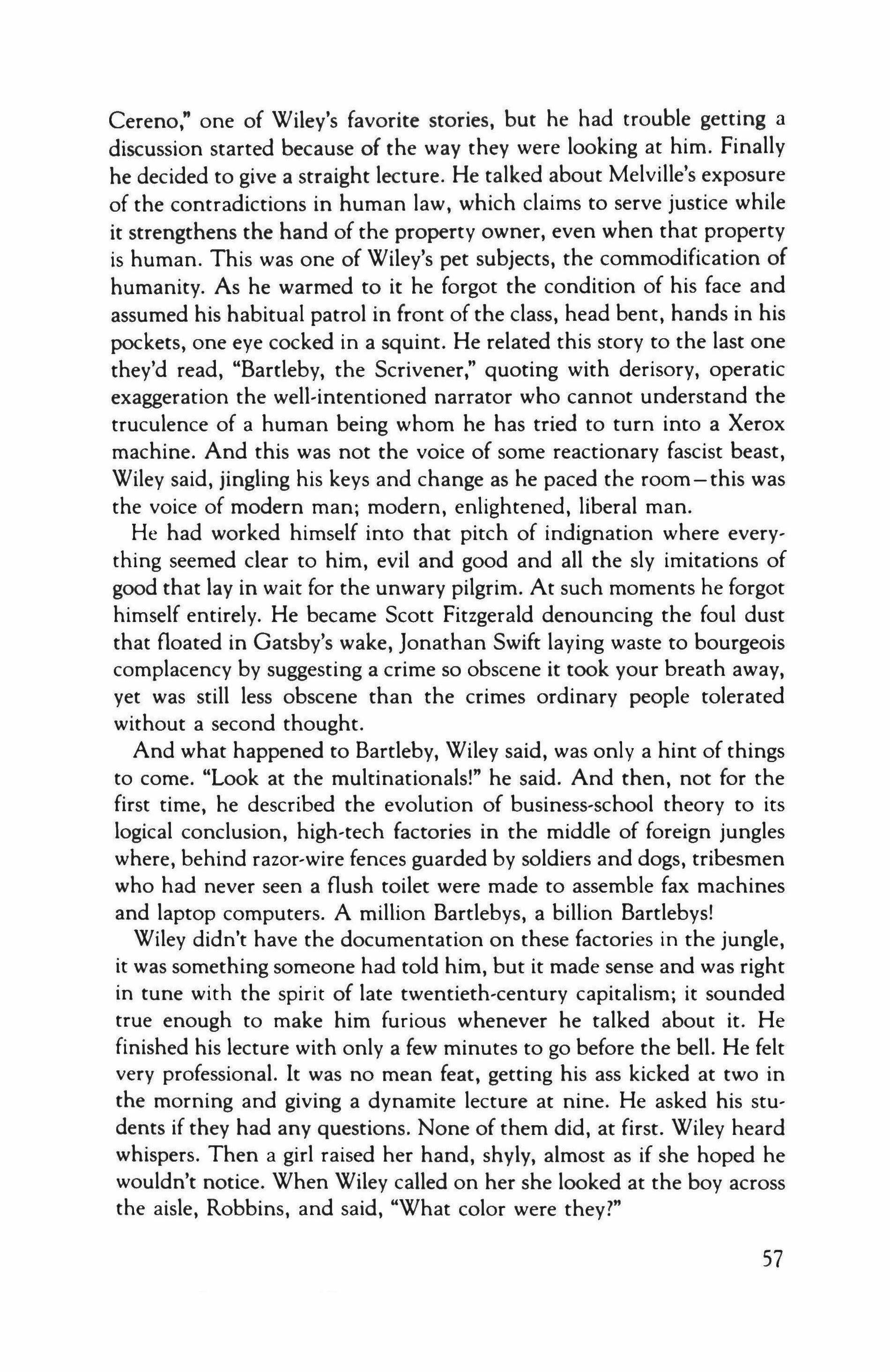
Cereno," one of Wiley's favorite stories, but he had trouble getting a discussion started because of the way they were looking at him. Finally he decided to give a straight lecture. He talked about Melville's exposure of the contradictions in human law, which claims to serve justice while it strengthens the hand of the property owner, even when that property is human. This was one of Wiley's pet subjects, the commodification of humanity. As he warmed to it he forgot the condition of his face and assumed his habitual patrol in front of the class, head bent, hands in his pockets, one eye cocked in a squint. He related this story to the last one they'd read, "Bartlebv, the Scrivener," quoting with derisory, operatic exaggeration the well-intentioned narrator who cannot understand the truculence of a human being whom he has tried to turn into a Xerox machine. And this was not the voice of some reactionary fascist beast, Wiley said, jingling his keys and change as he paced the room - this was the voice of modern man; modern, enlightened, liberal man.
He had worked himself into that pitch of indignation where everything seemed clear to him, evil and good and all the sly imitations of good that lay in wait for the unwary pilgrim. At such moments he forgot himself entirely. He became Scott Fitzgerald denouncing the foul dust that floated in Gatsby's wake, Jonathan Swift laying waste to bourgeois complacency by suggesting a crime so obscene it took your breath away, yet was still less obscene than the crimes ordinary people tolerated without a second thought.
And what happened to Bartleby, Wiley said, was only a hint of things to come. "Look at the multinationals!" he said. And then, not for the first time, he described the evolution of business-school theory to its logical conclusion, high-tech factories in the middle of foreign jungles where, behind razor-wire fences guarded by soldiers and dogs, tribesmen who had never seen a flush toilet were made to assemble fax machines and laptop computers. A million Bartlebys, a billion Bartlebys!
Wiley didn't have the documentation on these factories in the jungle, it was something someone had told him, but it made sense and was right in tune with the spirit of late twentieth-century capitalism; it sounded true enough to make him furious whenever he talked about it. He finished his lecture with only a few minutes to go before the bell. He felt very professional. It was no mean feat, getting his ass kicked at two in the morning and giving a dynamite lecture at nine. He asked his students if they had any questions. None of them did, at first. Wiley heard whispers. Then a girl raised her hand, shyly, almost as if she hoped he wouldn't notice. When Wiley called on her she looked at the boy across the aisle, Robbins, and said, "What color were they?"
57
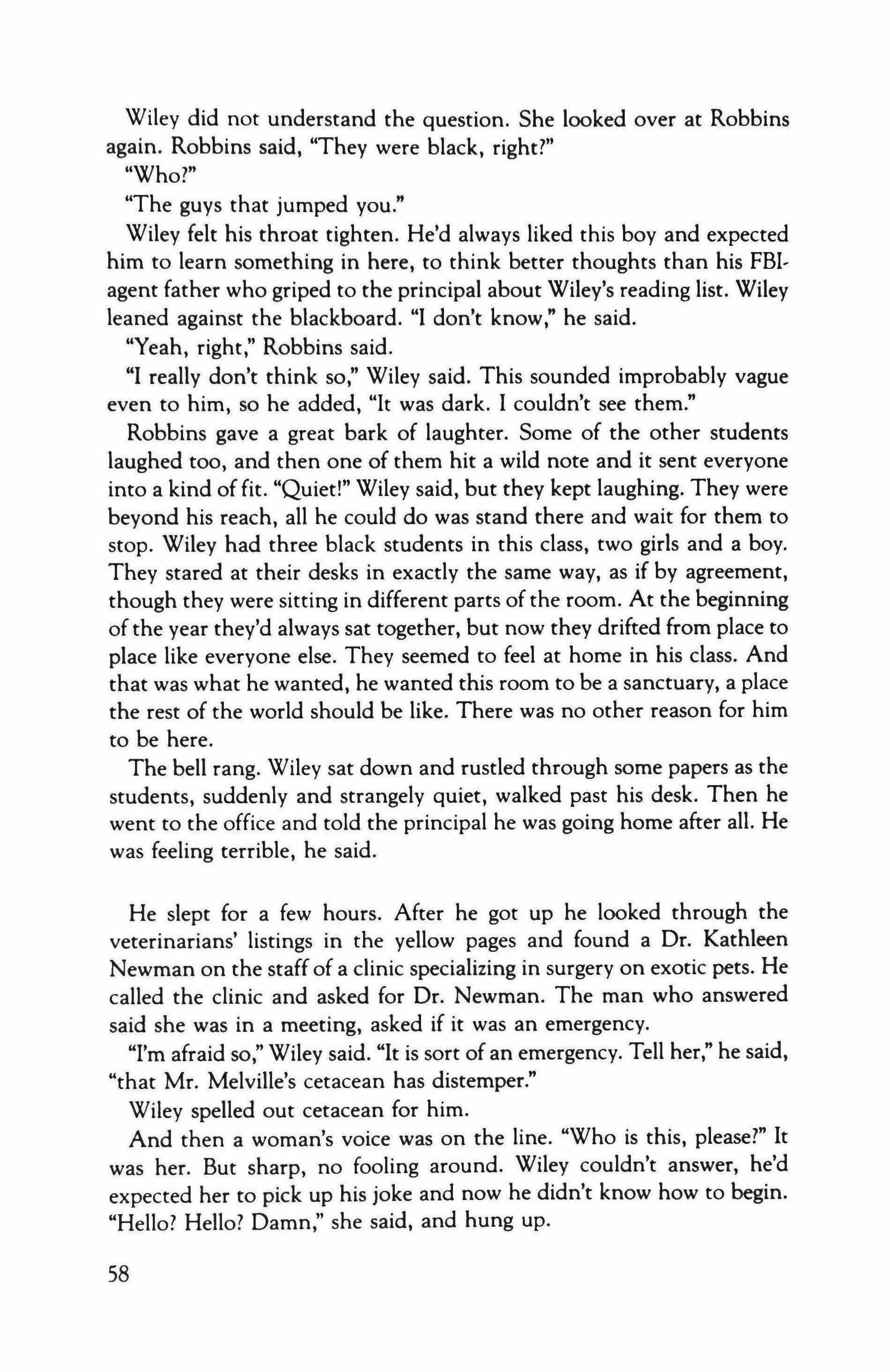
Wiley did not understand the question. She looked over at Robbins again. Robbins said, "They were black, right?"
"Who?"
"The guys that jumped you."
Wiley felt his throat tighten. He'd always liked this boy and expected him to learn something in here, to think better thoughts than his FBIagent father who griped to the principal about Wiley's reading list. Wiley leaned against the blackboard. "I don't know," he said.
"Yeah, right," Robbins said.
"I really don't think so," Wiley said. This sounded improbably vague even to him, so he added, "It was dark. I couldn't see them."
Robbins gave a great bark of laughter. Some of the other students laughed too, and then one of them hit a wild note and it sent everyone into a kind of fit. "Quiet!" Wiley said, but they kept laughing. They were beyond his reach, all he could do was stand there and wait for them to stop. Wiley had three black students in this class, two girls and a boy. They stared at their desks in exactly the same way, as if by agreement, though they were sitting in different parts of the room. At the beginning of the year they'd always sat together, but now they drifted from place to place like everyone else. They seemed to feel at home in his class. And that was what he wanted, he wanted this room to be a sanctuary, a place the rest of the world should be like. There was no other reason for him to be here.
The bell rang. Wiley sat down and rustled through some papers as the students, suddenly and strangely quiet, walked past his desk. Then he went to the office and told the principal he was going home after all. He was feeling terrible, he said.
He slept for a few hours. After he got up he looked through the veterinarians' listings in the yellow pages and found a Dr. Kathleen Newman on the staffof a clinic specializing in surgery on exotic pets. He called the clinic and asked for Dr. Newman. The man who answered said she was in a meeting, asked if it was an emergency.
"I'm afraid so," Wiley said. "It is sort of an emergency. Tell her," he said, "that Mr. Melville's cetacean has distemper."
Wiley spelled out cetacean for him.
And then a woman's voice was on the line. "Who is this, please?" It was her. But sharp, no fooling around. Wiley couldn't answer, he'd expected her to pick up his joke and now he didn't know how to begin. "Hello? Hello? Damn," she said, and hung up.
58
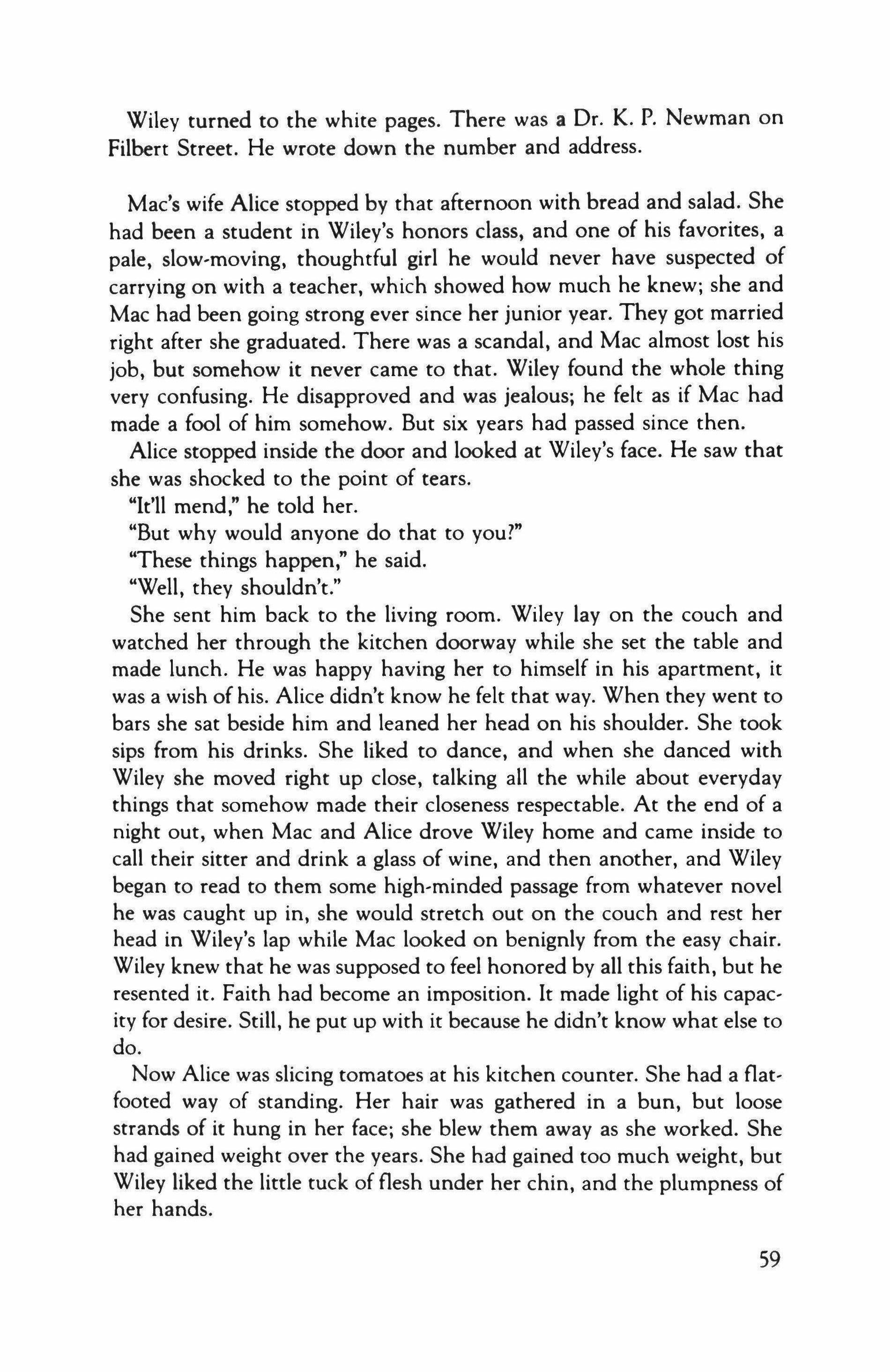
Wiley turned to the white pages. There was a Dr. K. P. Newman on Filbert Street. He wrote down the number and address.
Mac's wife Alice stopped by that afternoon with bread and salad. She had been a student in Wiley's honors class, and one of his favorites, a pale, slow-moving, thoughtful girl he would never have suspected of carrying on with a teacher, which showed how much he knew; she and Mac had been going strong ever since her junior year. They got married right after she graduated. There was a scandal, and Mac almost lost his job, but somehow it never came to that. Wiley found the whole thing very confusing. He disapproved and was jealous; he felt as if Mac had made a fool of him somehow. But six years had passed since then.
Alice stopped inside the door and looked at Wiley's face. He saw that she was shocked to the point of tears.
"It'll mend," he told her.
"But why would anyone do that to you?"
"These things happen," he said.
"Well, they shouldn't."
She sent him back to the living room. Wiley lay on the couch and watched her through the kitchen doorway while she set the table and made lunch. He was happy having her to himself in his apartment, it was a wish of his. Alice didn't know he felt that way. When they went to bars she sat beside him and leaned her head on his shoulder. She took sips from his drinks. She liked to dance, and when she danced with Wiley she moved right up close, talking all the while about everyday things that somehow made their closeness respectable. At the end of a night out, when Mac and Alice drove Wiley home and came inside to call their sitter and drink a glass of wine, and then another, and Wiley began to read to them some high-minded passage from whatever novel he was caught up in, she would stretch out on the couch and rest her head in Wiley's lap while Mac looked on benignly from the easy chair. Wiley knew that he was supposed to feel honored by all this faith, but he resented it. Faith had become an imposition. It made light of his capac' ity for desire. Still, he put up with it because he didn't know what else to do.
Now Alice was slicing tomatoes at his kitchen counter. She had a flat' footed way of standing. Her hair was gathered in a bun, but loose strands of it hung in her face; she blew them away as she worked. She had gained weight over the years. She had gained too much weight, but Wiley liked the little tuck of flesh under her chin, and the plumpness of her hands.
59
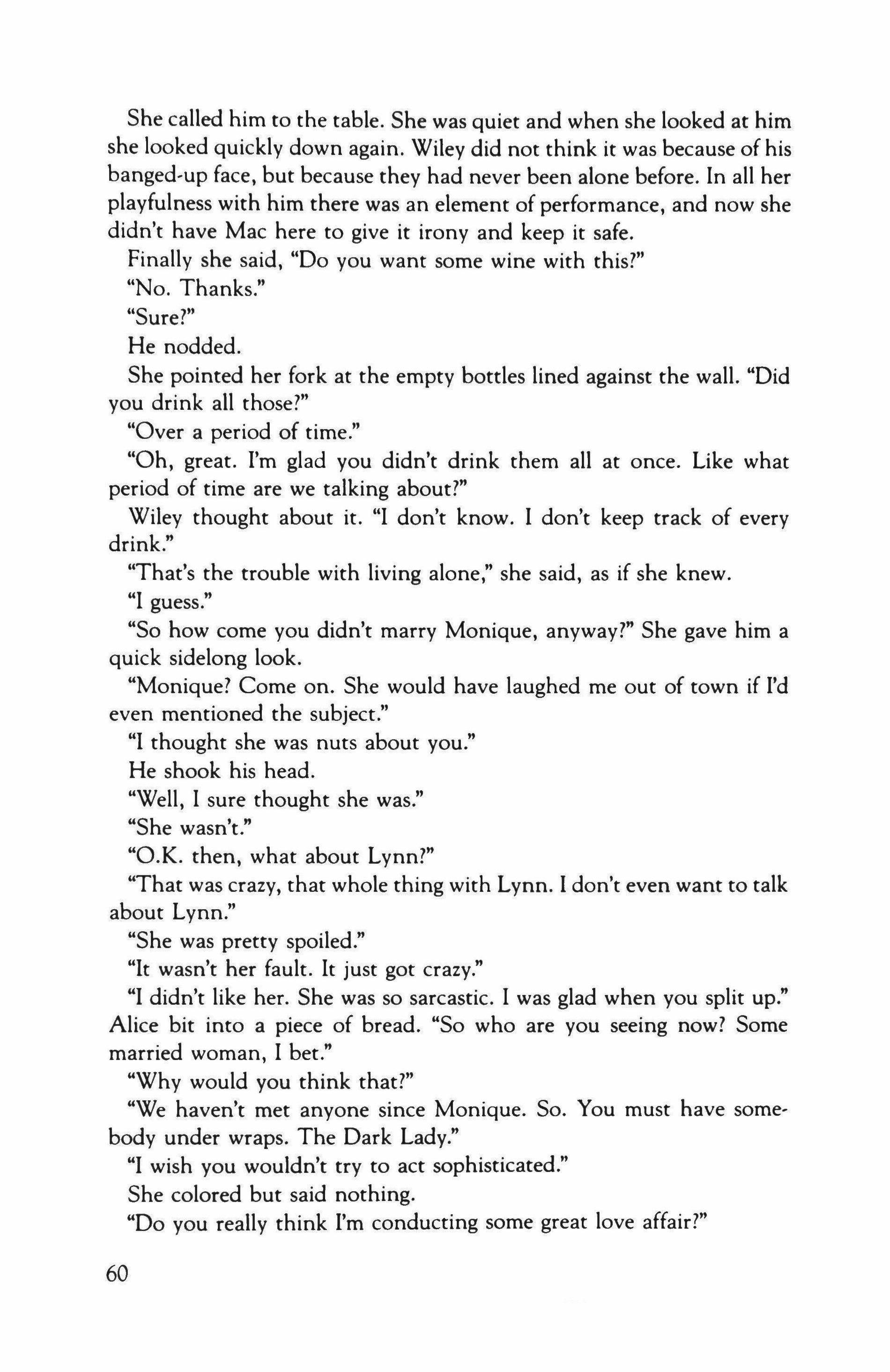
She called him to the table. She was quiet and when she looked at him she looked quickly down again. Wiley did not think it was because of his banged-up face, but because they had never been alone before. In all her playfulness with him there was an element of performance, and now she didn't have Mac here to give it irony and keep it safe.
Finally she said, "Do you want some wine with this?"
"No. Thanks."
"Sure?"
He nodded.
She pointed her fork at the empty bottles lined against the wall. "Did you drink all those?"
"Over a period of time."
"Oh, great. I'm glad you didn't drink them all at once. Like what period of time are we talking about?"
Wiley thought about it. "I don't know. I don't keep track of every drink."
"That's the trouble with living alone," she said, as if she knew.
"I guess."
"So how come you didn't marry Monique, anyway?" She gave him a quick sidelong look.
"Monique? Come on. She would have laughed me out of town if I'd even mentioned the subject."
"I thought she was nuts about you."
He shook his head.
"Well, I sure thought she was."
"She wasn't."
"O.K. then, what about Lynn?"
"That was crazy, that whole thing with Lynn. I don't even want to talk about Lynn."
"She was pretty spoiled."
"It wasn't her fault. It just got crazy."
"I didn't like her. She was so sarcastic. I was glad when you split up." Alice bit into a piece of bread. "So who are you seeing now? Some married woman, I bet."
"Why would you think that?"
"We haven't met anyone since Monique. So. You must have somebody under wraps. The Dark Lady."
"I wish you wouldn't try to act sophisticated."
She colored but said nothing.
"Do you really think I'm conducting some great love affair?"
60

"I figured you must have somebody." She sounded bored. She was studying his face. "Boy, those guys really did a job on you, didn't they?"
Wiley moved his plate to one side. "There was just one," he said. "Short fellow. No bigger than a minute."
"Oh. Mac told me two. ITwo of our dusky brethren: was what he said. Where did he get that stuff?"
"From me," Wiley said.
And then, because he trusted her and felt the need, he began to tell her what had really happened to him the night before. Alice listened without any disgust or pity that he could see. She seemed purely inter' ested. Now and then she laughed, because in talking about it Wiley could not help but make his little disaster into a story, and telling stories, even those about loneliness and humiliation, naturally brought out the hambone and wag in him. He could see she was having a good time listening to him, that this was something different for her, and not what she'd expected when Mac asked her to look in on him. And she was hearing some straight talk. She didn't get that at home. Mac was good, hearted, but he was also a tomcat and a liar.
Wiley's way of telling stories about himself was to tell them as if they'd happened to someone else. And from that distance he could see that there was something to be laughed at in the spectacle of a man who energetically professed the examined life, the life of the spirit and the mind, getting drunk and brawling over strange women. Well, the body had a mind of its own. He told it like that, like his body had abducted him for its own low purposes, like he'd been lashed to the back of a foaming runaway horse hell-bent on dragging him through every degradation.
But it was not on the whole a funny story. When he told Alice what went on in his class that morning she shook her head and looked down at the table.
"I was speechless," he said. "I couldn't say a thing. We do Native Son, we do Invisible Man, 1 get them really talking, really thinking about all this stuff, and then I start a race riot in my own classroom."
"Maybe you should tell them the truth."
"Are you serious?"
"They'd respect you for it."
"Hah!"
"Well, they should."
"Come on, Alice."
"Some of them would. And they'd be the right ones."
Wiley shook his head. "It would get all over school. I'd get fired."
61

"That's true," Alice said. She rested her cheek on her hand. "Still."
"Still what?" When she didn't answer, he said, "All right, let's say I don't care about getting fired. I do, but let's just hypothetically say I go in there tomorrow and tell them everything, the works. You know what they'll think? They'll think I'm making it up-the second story, not the first. You know, out of bleeding-heart sentimentality, to make the black kids feel better. But what'll really happen, they'll end up feeling worse. Condescended to. Insulted. They'll think I'm lying to protect them, as if they were guilty. Everyone will think I'm lying."
Wiley could see her hesitate. Then she said, "But you won't be lying. You'll be telling the truth."
"Yes, but no one will know it!"
"You will. You will know it."
"Look. Alice." Wiley was angry now and impatient. He waited, and then spoke so that his anger would not show. He said, "I feel terrible. I can't even count all the things I've done wrong today. But I did them. They're done. If I try to undo them I'm going to make them worse. Not only for me, for those kids." This seemed logical to Wiley, and well and reasonably said.
"Maybe so." She was turning one of her rings nervously. She looked over at him and said, "Maybe I'm being simplistic, but I just don't see where telling the truth can be wrong. I always thought that's what you were there for."
Wiley had other arguments to make. That he was a teacher, and could not afford to gamble with his moral authority. That when the truth did more harm than a lie, you had to give the lie its due. That ifother people had to suffer just so you could have a clean conscience you should accept your fallen condition and get on with it. They were good arguments, the very oil of adult life, but he said nothing. He was no fool, he knew what her answers would be, because after all they were his answers too. He simply couldn't act on them.
They sat there unhappily and then Alice got up and cleared the table. Wiley followed her to the kitchen. He stood in the doorway and watched her rinse the plates and stack them in the sink. When she finished she stayed leaning against the counter with her back to him.
"Alice," he said. "Are you listening?"
She nodded.
"I shouldn't have dropped all this stuff on you. It's pretty confusing."
"I'm not confused."
He didn't answer.
"I have to go," she said.
62

He walked her to the door.
"I won't say anything to Mac," she told him.
"I know that. I trust you."
"What, trust me to keep secrets from my husband?" She laughed, not pleasantly. "Don't worry," she said. "I know how he is."
Wiley corrected essays the rest of the afternoon. He broke for dinner and then finished them off. It was a good batch, the best he'd had all year. They were on "Bartlebv, the Scrivener." One of his students, a girl, had compared the situation to a marriage, with the narrator as the husband and Bartleby as the wife: "He looks at Bartleby the way men look at women, as if Bartleby has no other purpose on earth than to be of use to him." She bent the story around to fit her argument, but Wiley didn't mind. The essay was fresh and passionate. This particular girl wouldn't have thought to take such a view at the beginning of the year. Wiley was moved, and proud of her.
He recorded the grades in his book and then called the Filbert Street number of Dr. K. P. Newman. When she answered, he said, "It's me, Kathleen. From last night," he added.
"You," she said. "Where did you get my number?"
"Out of the phone book. I just wanted to set things straight."
"You called me before, didn't you?" she said. "You called me at work."
"Yes."
"I knew it. You didn't even say anything. You didn't even have the balls to give your own name."
"That was a joke," Wiley said.
"You're crazy. You call me again and I'll have the police on you."
"Wait. Kathleen. I need to see you."
"I don't need to see you."
"Wait. Please. Listen, Kathleen. I'm not like that, not like I seemed last night. Really, Kathleen. Last night was a series of misunderstandings. I just want to stop by for a minute or two, straighten everything out."
"What, you have my address?"
"It's in the book."
"Christ! I can't believe this! Don't even think about coming here. Mike's here," she said. "This time I won't stop him. I mean it."
"You aren't married to Mike."
"Who said?"
"You would have said if you were."
"So? What difference does that make?"
"It makes a difference."
63
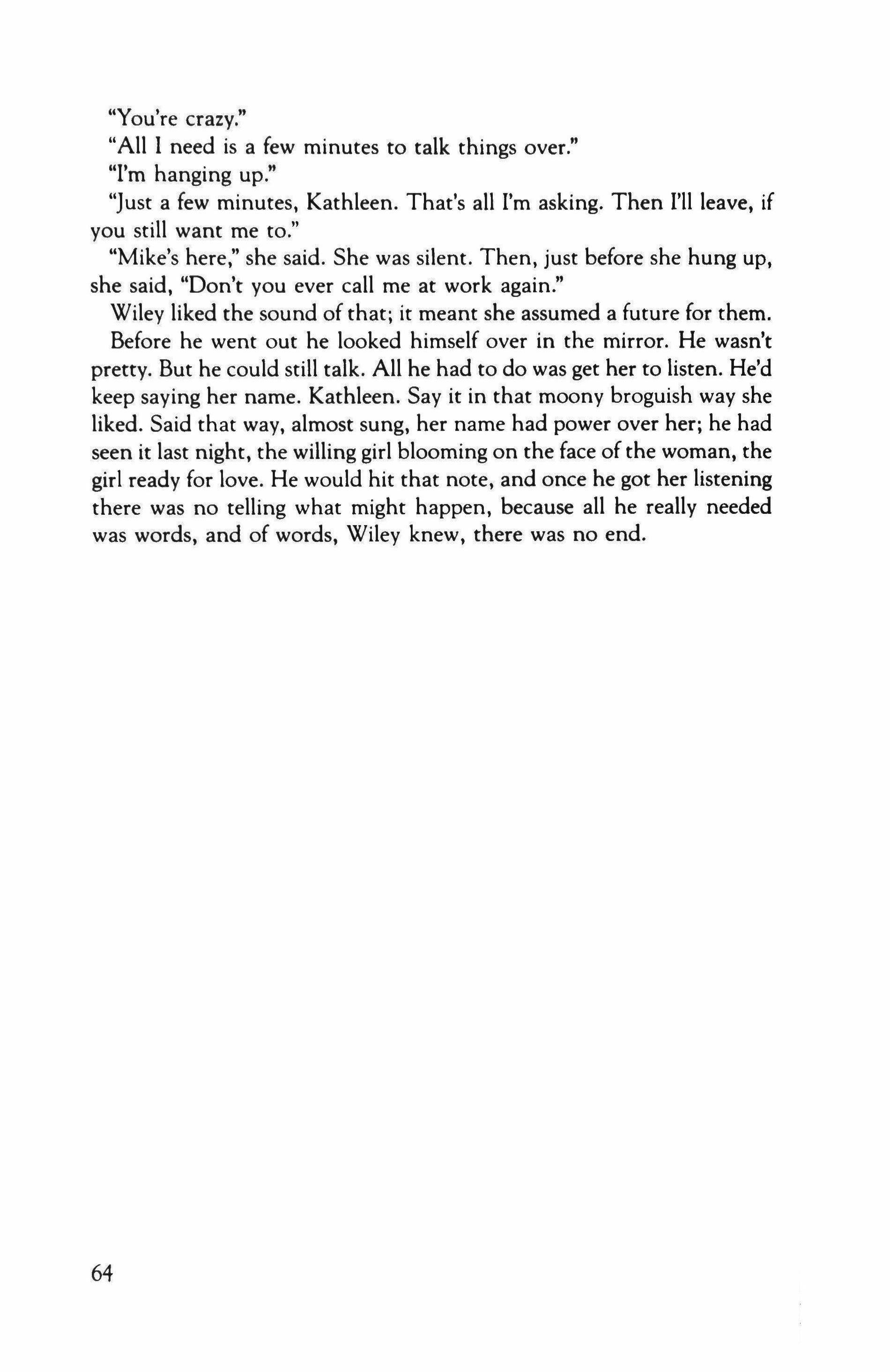
"You're crazy."
"All I need is a few minutes to talk things over."
"I'm hanging up."
"Just a few minutes, Kathleen. That's all I'm asking. Then I'll leave, if you still want me to."
"Mike's here," she said. She was silent. Then, just before she hung up, she said, "Don't you ever call me at work again." Wiley liked the sound of that; it meant she assumed a future for them. Before he went out he looked himself over in the mirror. He wasn't pretty. But he could still talk. All he had to do was get her to listen. He'd keep saying her name. Kathleen. Say it in that moony broguish way she liked. Said that way, almost sung, her name had power over her; he had seen it last night, the willinggirl blooming on the face of the woman, the girl ready for love. He would hit that note, and once he got her listening there was no telling what might happen, because all he really needed was words, and of words, Wiley knew, there was no end.
64


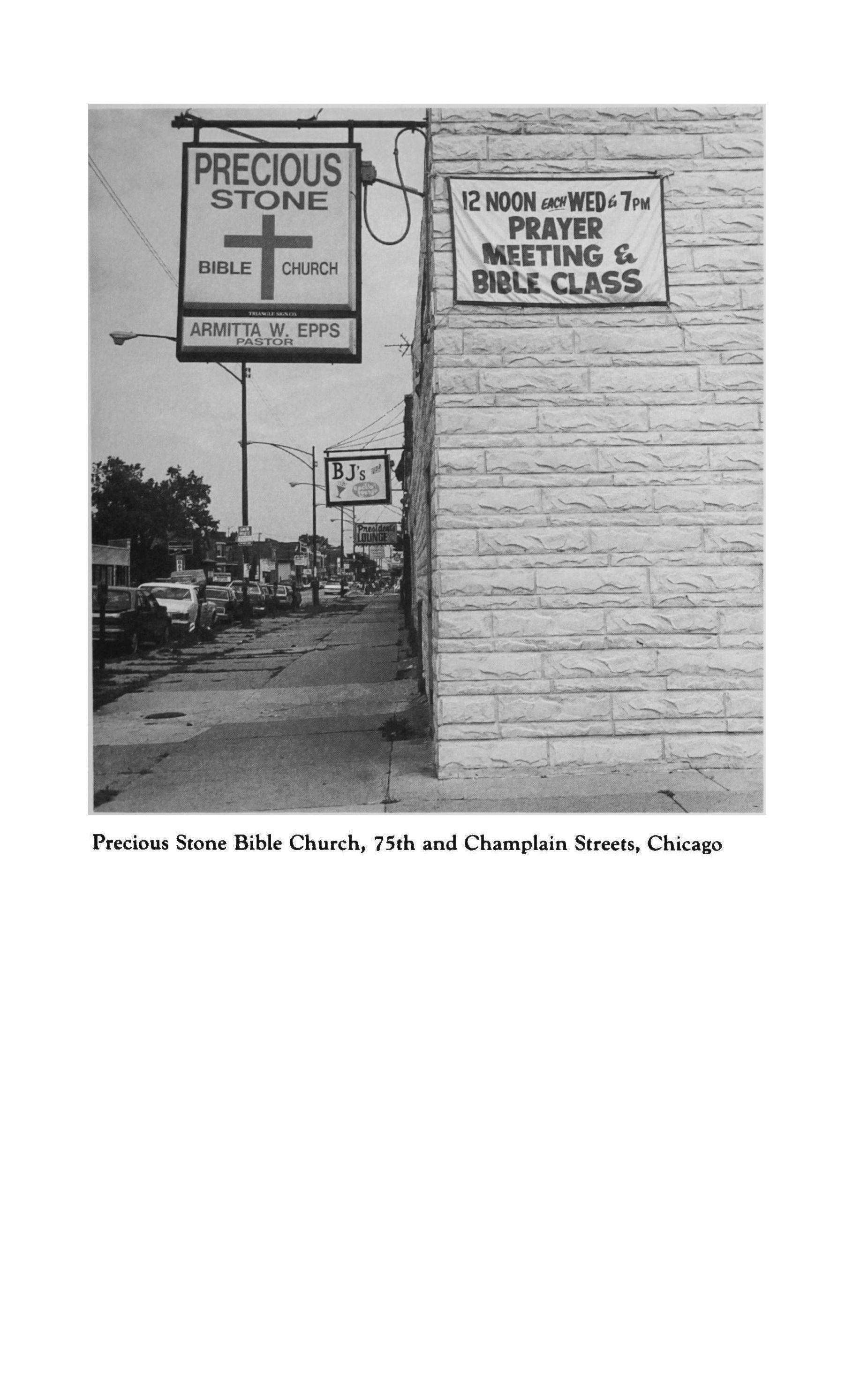 Precious Stone Bible Church, 75th and Champlain Streets, Chicago
Precious Stone Bible Church, 75th and Champlain Streets, Chicago
 Body of Christ Faith Ministries, 95th and Halsted Streets, Chicago
Body of Christ Faith Ministries, 95th and Halsted Streets, Chicago
 Abundant Love Baptist Church, 79th and Halsted Streets, Chicago
Abundant Love Baptist Church, 79th and Halsted Streets, Chicago

Mother's Day service, New Mount Pilgrim MB Church, Homan Avenue and Jackson Boulevard, Chicago
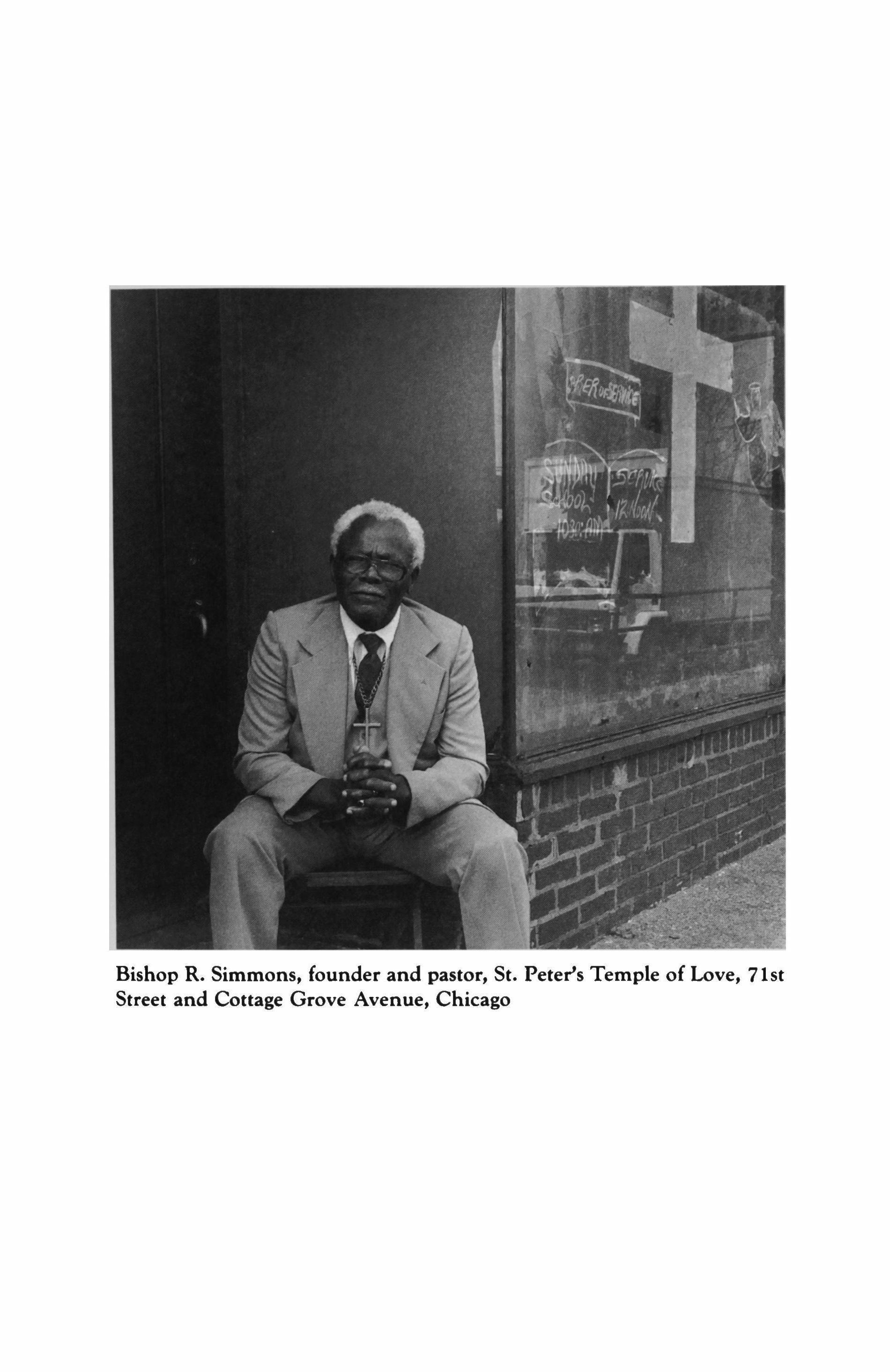 Bishop R. Simmons, founder and pastor, St. Peter's Temple of Love, 71st Street and Cottage Grove Avenue, Chicago
Bishop R. Simmons, founder and pastor, St. Peter's Temple of Love, 71st Street and Cottage Grove Avenue, Chicago
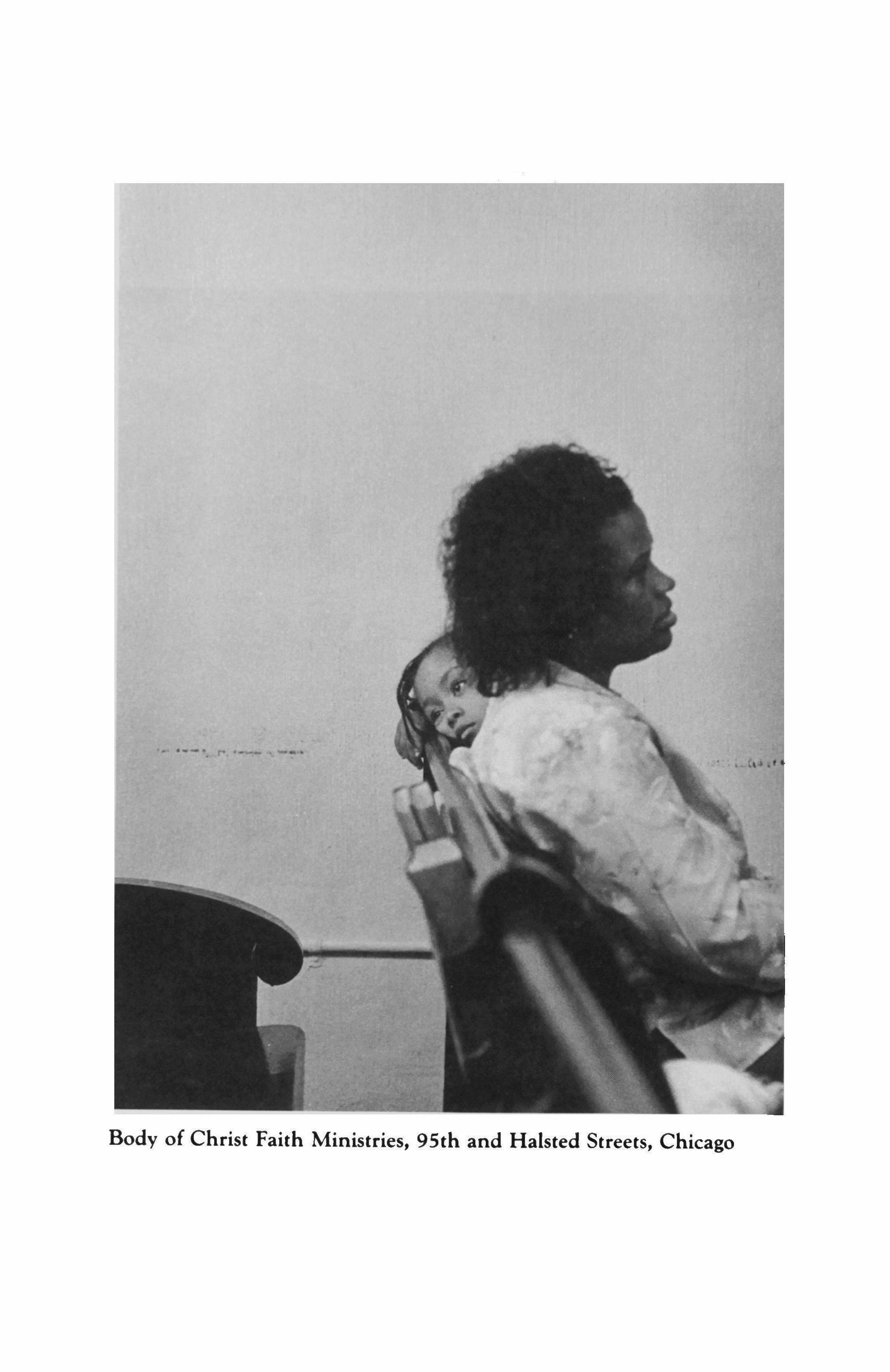 Body of Christ Faith Ministries, 95th and Halsted Streets, Chicago
Body of Christ Faith Ministries, 95th and Halsted Streets, Chicago
 New Mount Pilgrim MB Church, Homan Avenue and Jackson Boulevard, Chicago
New Mount Pilgrim MB Church, Homan Avenue and Jackson Boulevard, Chicago
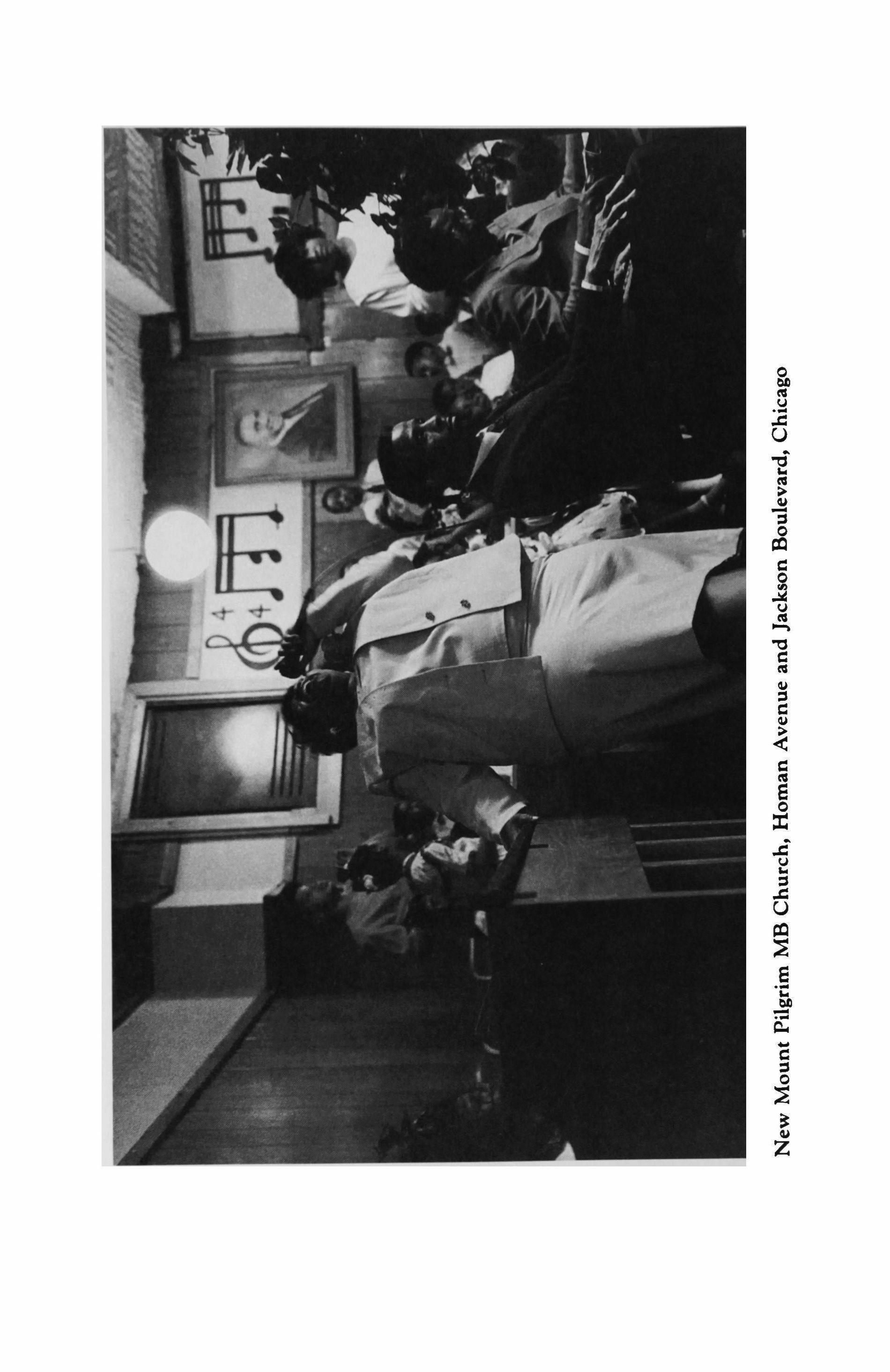 New Mount Pilgrim MB Church, Homan Avenue and Jackson Boulevard,
New Mount Pilgrim MB Church, Homan Avenue and Jackson Boulevard,
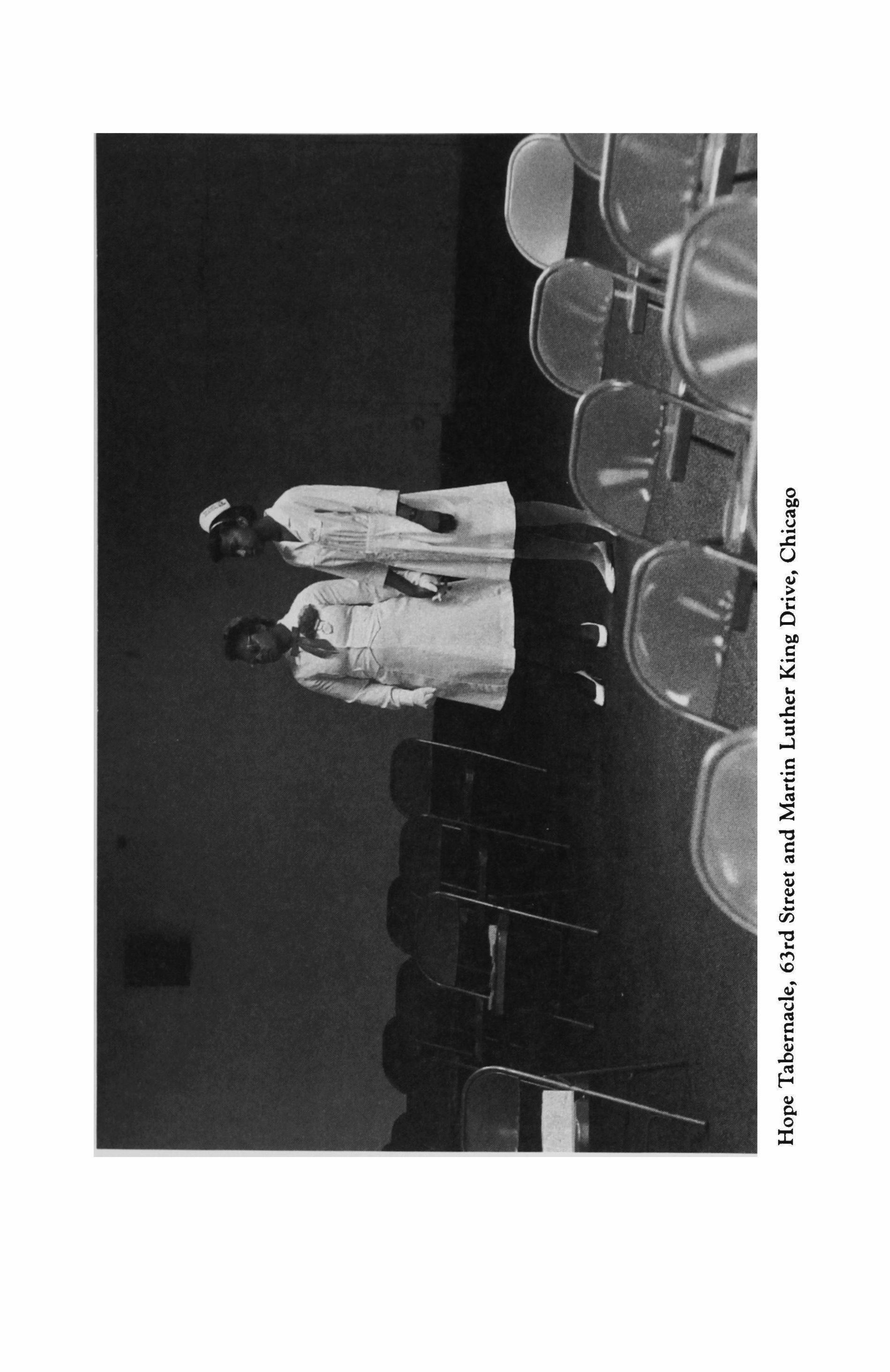 Hope Tabernacle, 63rd Street and Martin Luther King Drive, Chicago
Hope Tabernacle, 63rd Street and Martin Luther King Drive, Chicago
 Hope Tabernacle, 63rd Street and Martin Luther King Drive, Chicago
Hope Tabernacle, 63rd Street and Martin Luther King Drive, Chicago
Five Poems
Christine Garren

First Magnitudes
After you left, I carried buckets of water up the long hill past the horses shifting in the blind half of the field. Betelgeuse and Rigel floated under my pail's clamoring hinge then steadied like lit jewels in a coffer. I was tired with the loss of you, and halfway up the hill I paused while the animals foraged the clover. The random winds lifted their manes heavenward toward the studded figures sharpening the dark they roamed. As I went on higher to the barn, Orion seemed to follow me, bowing his head while I tilted his shoulder and foot and poured them out, into the trough, for the animals.
77
The Soul

wandering footpaths, tightens her scarf then ties her moccasins to run; darting the gray woods, flat-chested goddess, she stirs the fires once manned by those gone on. Not snobbish or sloppy she runs through the campgrounds of once-stationed Winnebagos, checking the barrels. When she gathers her robes from the ground their dust shimmies her gaseous lungs. I follow her now. Watch her, prism of being, eating the trash of those already departed.
78
Beginnings

I had almost forgotten how the down bag shifted, sulfured with pollen when I turned in it to the loons crossing the water. They lifted their necks to the stars the color of lime and carried this world on their pollen-backed wings. I know they went heavy with flowers to that island, innocent loons, though they may have lost some to the water. I can still hear their wing-beat rampant in the darkness. I think they were carrying me until they moored. And now, what of that island they settled a mile from their origin, its flowers dumb twins to the world they left behind?
79
Homage
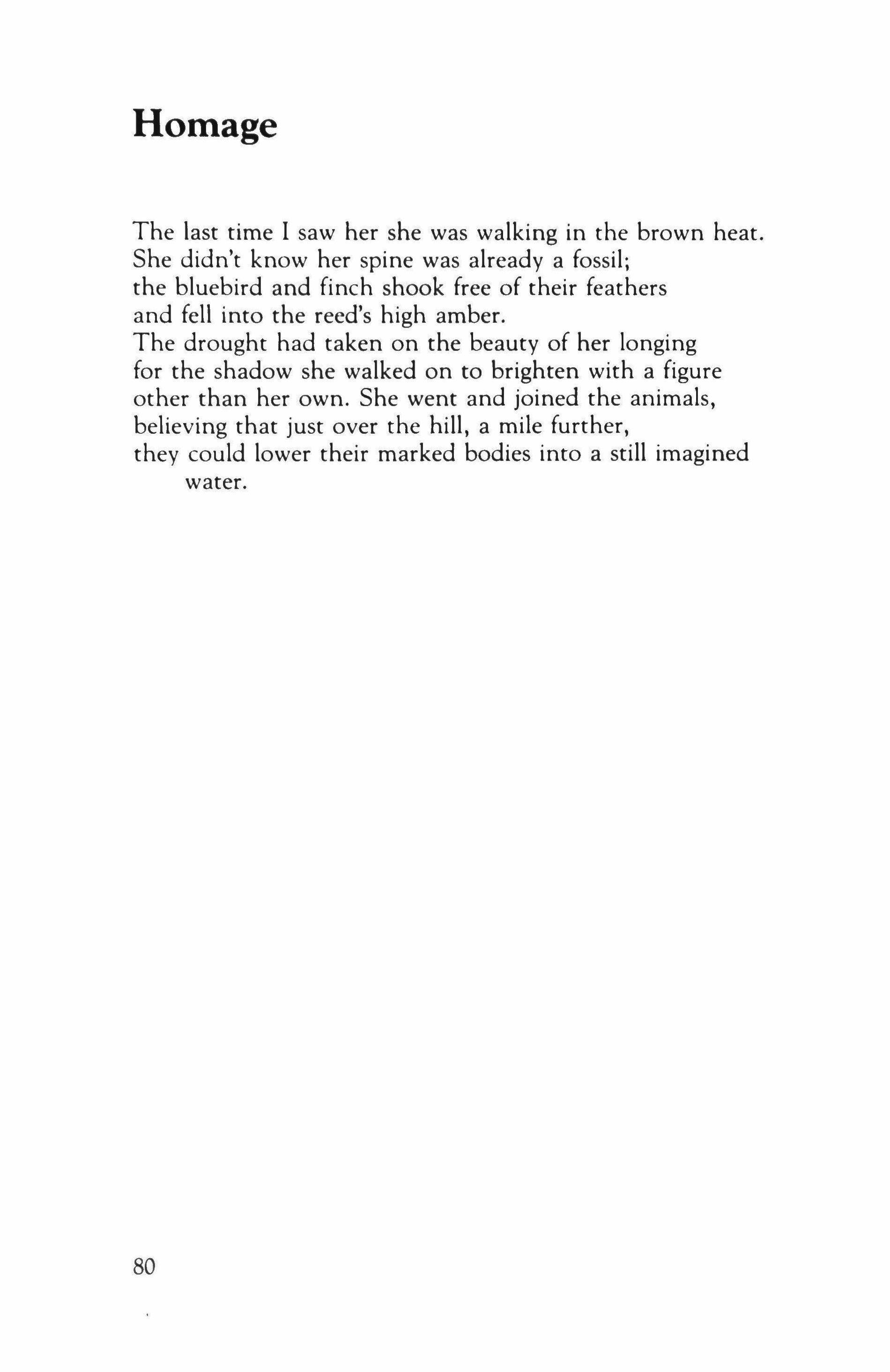
The last time I saw her she was walking in the brown heat. She didn't know her spine was already a fossil; the bluebird and finch shook free of their feathers and fell into the reed's high amber. The drought had taken on the beauty of her longing for the shadow she walked on to brighten with a figure other than her own. She went and joined the animals, believing that just over the hill, a mile further, they could lower their marked bodies into a still imagined water.
80
The Drive
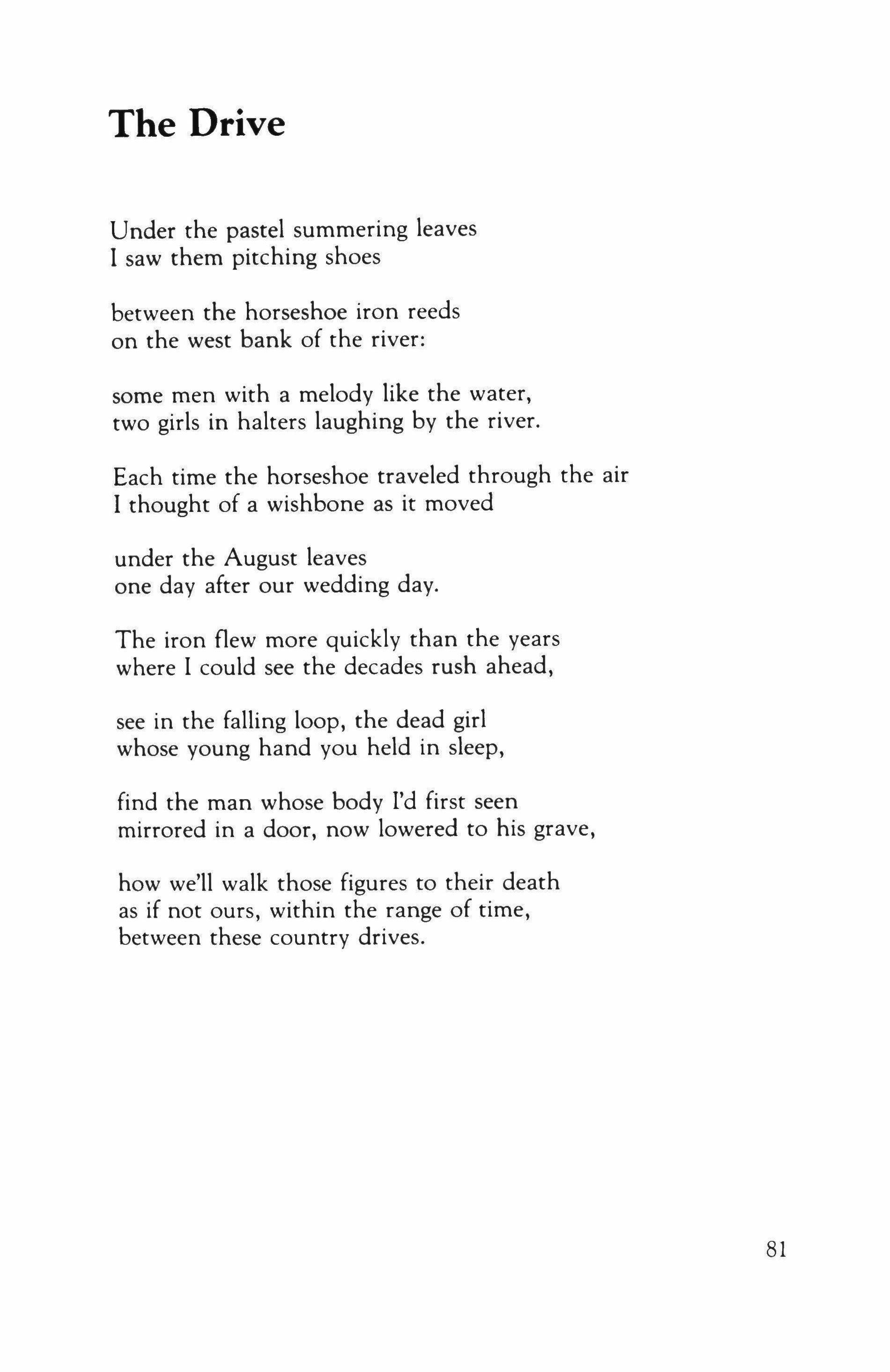
Under the pastel summering leaves
I saw them pitching shoes
between the horseshoe iron reeds on the west bank of the river:
some men with a melody like the water, two girls in halters laughing by the river.
Each time the horseshoe traveled through the air I thought of a wishbone as it moved
under the August leaves one day after our wedding day.
The iron flew more quickly than the years where I could see the decades rush ahead,
see in the falling loop, the dead girl whose young hand you held in sleep,
find the man whose body I'd first seen mirrored in a door, now lowered to his grave,
how we'll walk those figures to their death as if not ours, within the range of time, between these country drives.
81
She, Though
c. K. Williams
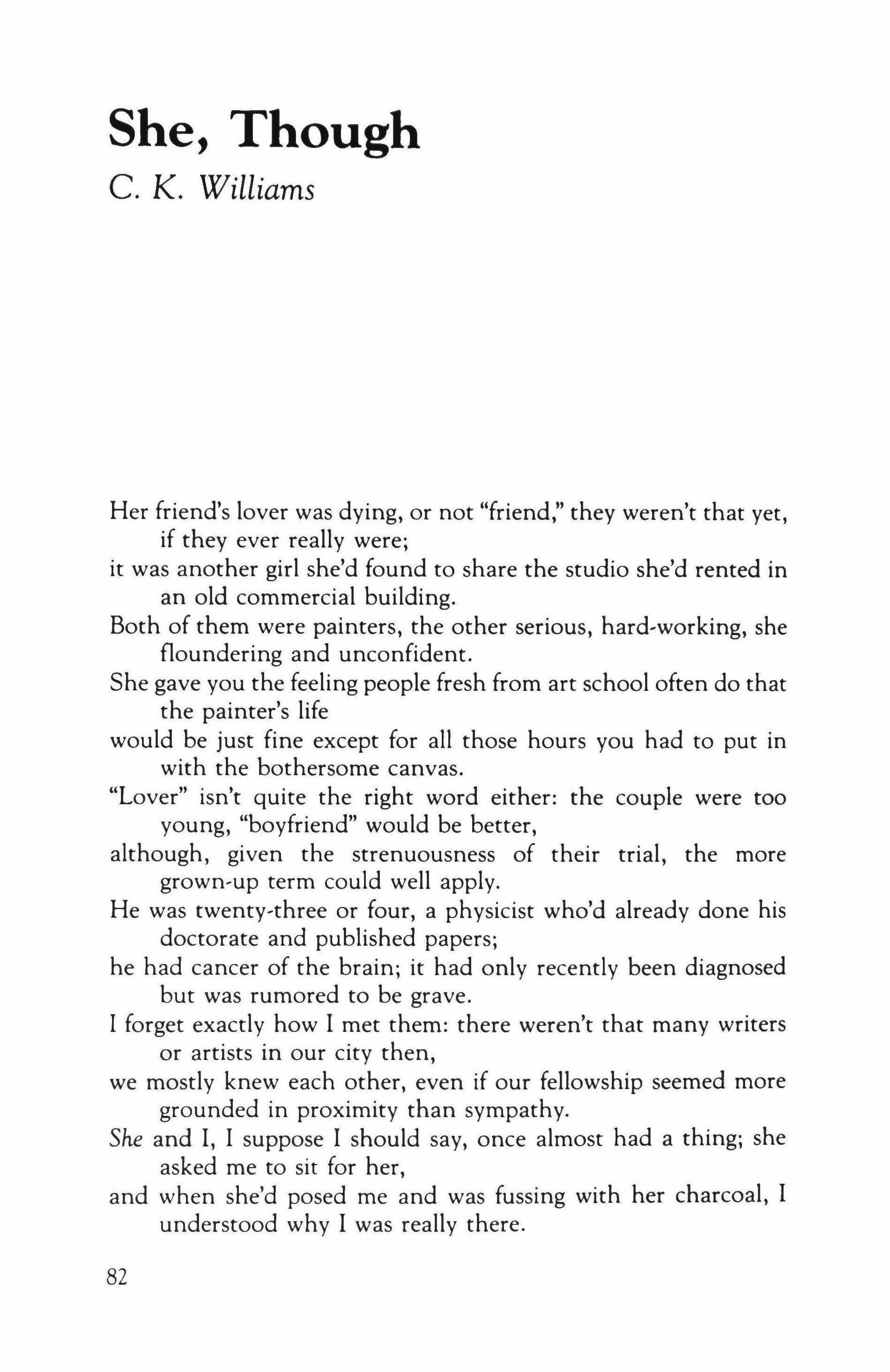
Her friend's lover was dying, or not "friend," they weren't that yet, if they ever really were; it was another girl she'd found to share the studio she'd rented in an old commercial building. Both of them were painters, the other serious, hard-working, she floundering and unconfident. She gave you the feeling people fresh from art school often do that the painter's life would be just fine except for all those hours you had to put in with the bothersome canvas.
"Lover" isn't quite the right word either: the couple were too young, "boyfriend" would be better, although, given the strenuousness of their trial, the more grown-up term could well apply. He was twenty-three or four, a physicist who'd already done his doctorate and published papers; he had cancer of the brain; it had only recently been diagnosed but was rumored to be grave.
I forget exactly how I met them: there weren't that many writers or artists in our city then, we mostly knew each other, even if our fellowship seemed more grounded in proximity than sympathy. She and I, I suppose I should say, once almost had a thing; she asked me to sit for her, and when she'd posed me and was fussing with her charcoal, I understood why I was really there.
82
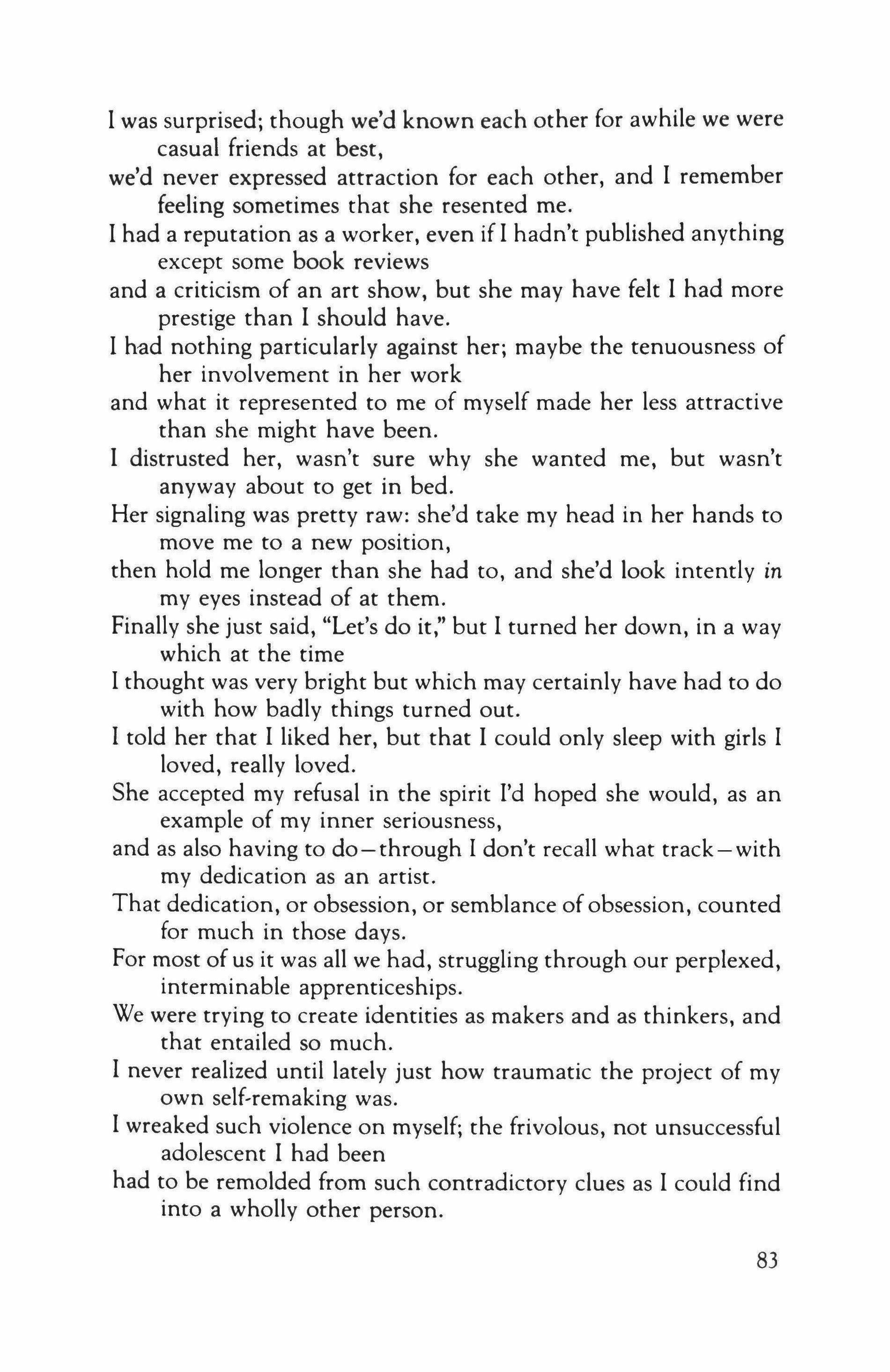
I was surprised; though we'd known each other for awhile we were casual friends at best, we'd never expressed attraction for each other, and I remember feeling sometimes that she resented me.
I had a reputation as a worker, even if I hadn't published anything except some book reviews and a criticism of an art show, but she may have felt I had more prestige than I should have.
I had nothing particularly against her; maybe the tenuousness of her involvement in her work and what it represented to me of myself made her less attractive than she might have been.
I distrusted her, wasn't sure why she wanted me, but wasn't anyway about to get in bed.
Her signaling was pretty raw: she'd take my head in her hands to move me to a new position, then hold me longer than she had to, and she'd look intently in my eyes instead of at them.
Finally she just said, "Let's do it," but I turned her down, in a way which at the time I thought was very bright but which may certainly have had to do with how badly things turned out.
I told her that I liked her, but that I could only sleep with girls I loved, really loved.
She accepted my refusal in the spirit I'd hoped she would, as an example of my inner seriousness, and as also having to do-through I don't recall what track-with my dedication as an artist.
That dedication, or obsession, or semblance of obsession, counted for much in those days.
For most of us it was all we had, struggling through our perplexed, interminable apprenticeships.
We were trying to create identities as makers and as thinkers, and that entailed so much.
I never realized until lately just how traumatic the project of my own self-remaking was.
I wreaked such violence on myself; the frivolous, not unsuccessful adolescent I had been had to be remolded from such contradictory clues as I could find into a wholly other person.
83
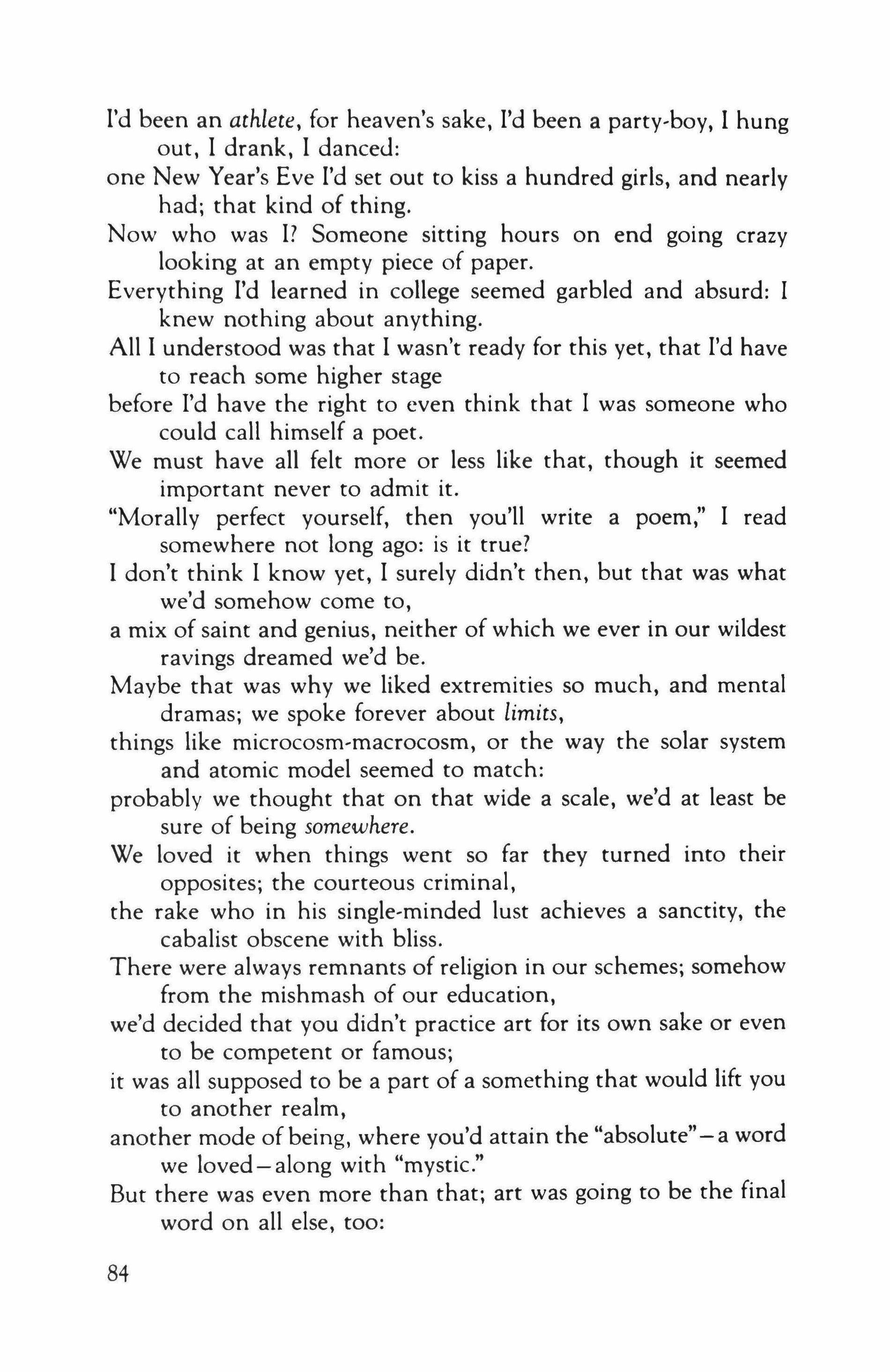
I'd been an athlete, for heaven's sake, I'd been a partv-bov, 1 hung out, 1 drank, 1 danced: one New Year's Eve I'd set out to kiss a hundred girls, and nearly had; that kind of thing.
Now who was I? Someone sitting hours on end going crazy looking at an empty piece of paper. Everything I'd learned in college seemed garbled and absurd: 1 knew nothing about anything. All 1 understood was that 1 wasn't ready for this yet, that I'd have to reach some higher stage before I'd have the right to even think that 1 was someone who could call himself a poet.
We must have all felt more or less like that, though it seemed important never to admit it.
"Morally perfect yourself, then you'll write a poem," 1 read somewhere not long ago: is it true? I don't think I know yet, I surely didn't then, but that was what we'd somehow come to, a mix of saint and genius, neither of which we ever in our wildest ravings dreamed we'd be.
Maybe that was why we liked extremities so much, and mental dramas; we spoke forever about limits, things like microcosm-macrocosm, or the way the solar system and atomic model seemed to match: probably we thought that on that wide a scale, we'd at least be sure of being somewhere.
We loved it when things went so far they turned into their opposites; the courteous criminal, the rake who in his single-minded lust achieves a sanctity, the cabalist obscene with bliss.
There were always remnants of religion in our schemes; somehow from the mishmash of our education, we'd decided that you didn't practice art for its own sake or even to be competent or famous; it was all supposed to be a part of a something that would lift you to another realm, another mode of being, where you'd attain the "absolute"-a word we loved - along with "mystic."
But there was even more than that; art was going to be the final word on all else, too:
84
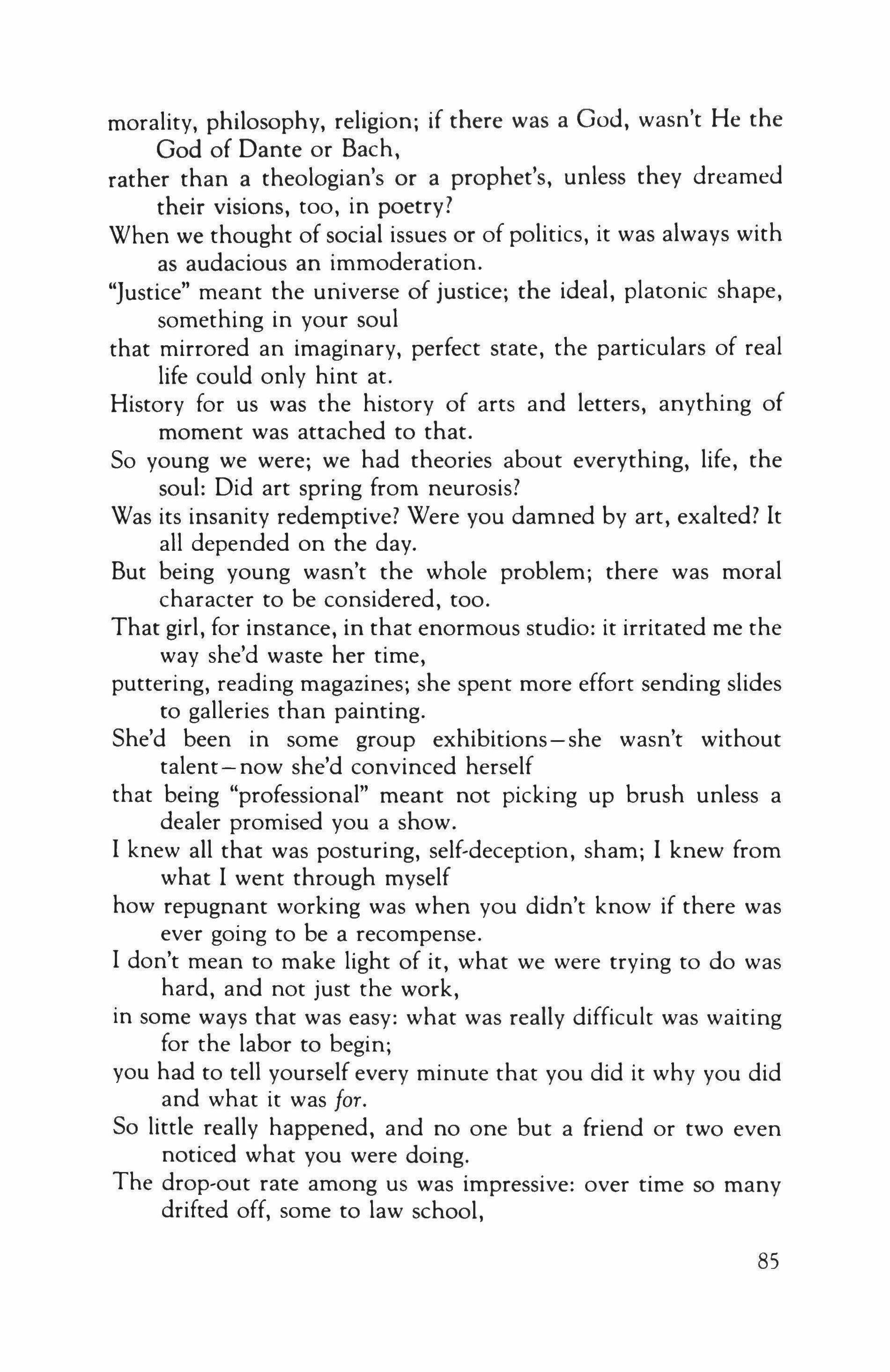
morality, philosophy, religion; if there was a God, wasn't He the God of Dante or Bach, rather than a theologian's or a prophet's, unless they dreamed their visions, too, in poetry?
When we thought of social issues or of politics, it was always with as audacious an immoderation.
"Justice" meant the universe of justice; the ideal, platonic shape, something in your soul that mirrored an imaginary, perfect state, the particulars of real life could only hint at.
History for us was the history of arts and letters, anything of moment was attached to that.
So young we were; we had theories about everything, life, the soul: Did art spring from neurosis?
Was its insanity redemptive? Were you damned by art, exalted? It all depended on the day.
But being young wasn't the whole problem; there was moral character to be considered, too.
That girl, for instance, in that enormous studio: it irritated me the way she'd waste her time, puttering, reading magazines; she spent more effort sending slides to galleries than painting.
She'd been in some group exhibitions-she wasn't without talent-now she'd convinced herself that being "professional" meant not picking up brush unless a dealer promised you a show.
I knew all that was posturing, self-deception, sham; I knew from what I went through myself how repugnant working was when you didn't know if there was ever going to be a recompense.
I don't mean to make light of it, what we were trying to do was hard, and not just the work, in some ways that was easy: what was really difficult was waiting for the labor to begin; you had to tell yourself every minute that you did it why you did and what it was for.
So little really happened, and no one but a friend or two even noticed what you were doing.
The drop-out rate among us was impressive: over time so many drifted off, some to law school,
85
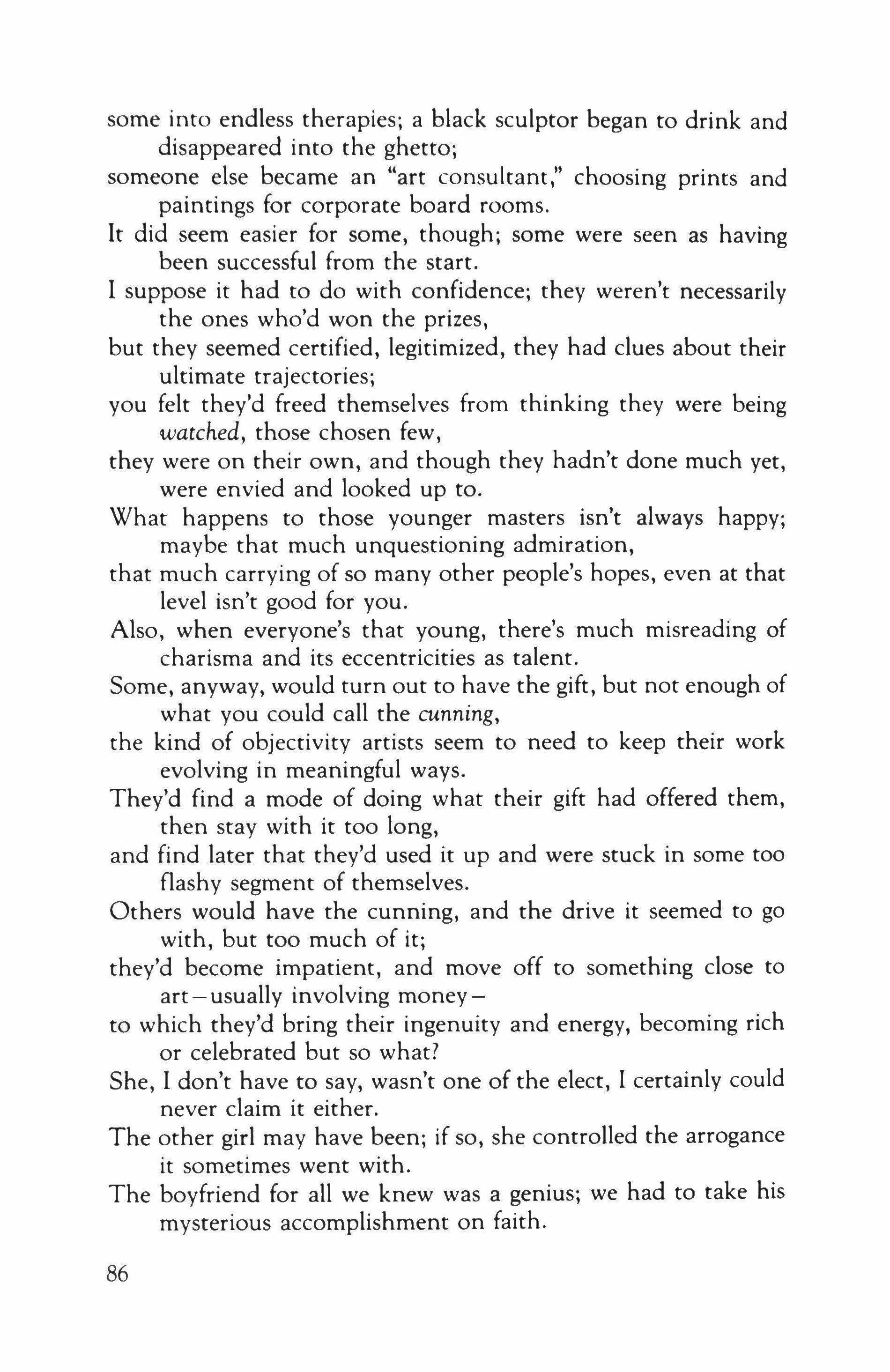
some into endless therapies; a black sculptor began to drink and disappeared into the ghetto; someone else became an "art consultant," choosing prints and paintings for corporate board rooms. It did seem easier for some, though; some were seen as having been successful from the start.
I suppose it had to do with confidence; they weren't necessarily the ones who'd won the prizes, but they seemed certified, legitimized, they had clues about their ultimate trajectories; you felt they'd freed themselves from thinking they were being watched, those chosen few, they were on their own, and though they hadn't done much yet, were envied and looked up to.
What happens to those younger masters isn't always happy; maybe that much unquestioning admiration, that much carrying of so many other people's hopes, even at that level isn't good for you.
Also, when everyone's that young, there's much misreading of charisma and its eccentricities as talent.
Some, anyway, would turn out to have the gift, but not enough of what you could call the cunning, the kind of objectivity artists seem to need to keep their work evolving in meaningful ways.
They'd find a mode of doing what their gift had offered them, then stay with it too long, and find later that they'd used it up and were stuck in some too flashy segment of themselves.
Others would have the cunning, and the drive it seemed to go with, but too much of it; they'd become impatient, and move off to something close to art-usually involving moneyto which they'd bring their ingenuity and energy, becoming rich or celebrated but so what?
She, I don't have to say, wasn't one of the elect, I certainly could never claim it either.
The other girl may have been; if so, she controlled the arrogance it sometimes went with.
The boyfriend for all we knew was a genius; we had to take his mysterious accomplishment on faith.
86
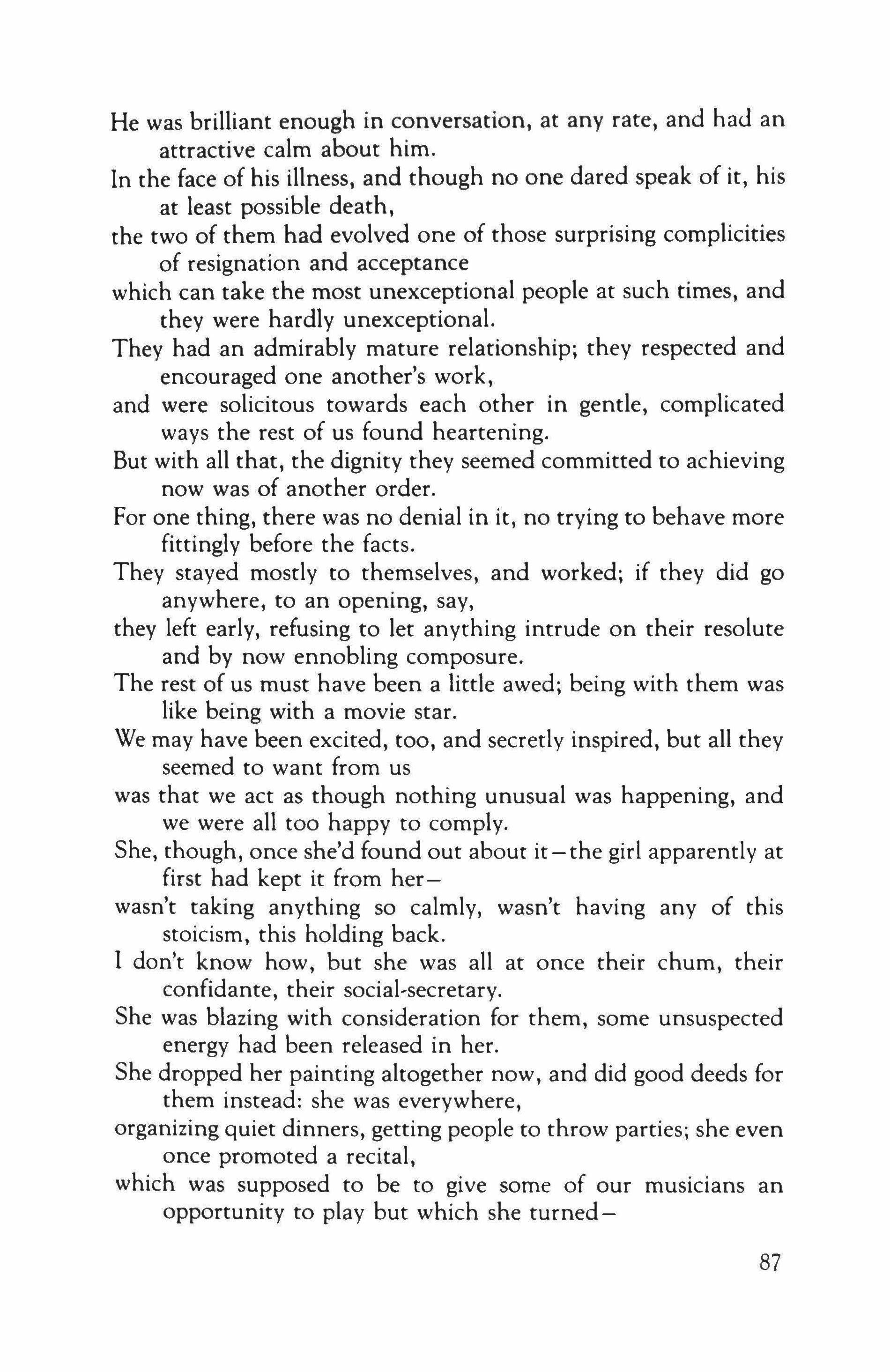
He was brilliant enough in conversation, at any rate, and had an attractive calm about him.
In the face of his illness, and though no one dared speak of it, his at least possible death, the two of them had evolved one of those surprising complicities of resignation and acceptance which can take the most unexceptional people at such times, and they were hardly unexceptional. They had an admirably mature relationship; they respected and encouraged one another's work, and were solicitous towards each other in gentle, complicated ways the rest of us found heartening.
But with all that, the dignity they seemed committed to achieving now was of another order.
For one thing, there was no denial in it, no trying to behave more fittingly before the facts.
They stayed mostly to themselves, and worked; if they did go anywhere, to an opening, say, they left early, refusing to let anything intrude on their resolute and by now ennobling composure.
The rest of us must have been a little awed; being with them was like being with a movie star.
We may have been excited, too, and secretly inspired, but all they seemed to want from us was that we act as though nothing unusual was happening, and we were all too happy to comply.
She, though, once she'd found out about it-the girl apparently at first had kept it from herwasn't taking anything so calmly, wasn't having any of this stoicism, this holding back.
I don't know how, but she was all at once their chum, their confidante, their social-secretary.
She was blazing with consideration for them, some unsuspected energy had been released in her.
She dropped her painting altogether now, and did good deeds for them instead: she was everywhere, organizing quiet dinners, getting people to throw parties; she even once promoted a recital, which was supposed to be to give some of our musicians an opportunity to play but which she turned-
87

and not in an unpleasantly pretentious way - into a elegant soiree and cocktail to honor them.
They became, in fact, as she took over, the unofficial guests of honor everywhere they went.
They hardly seemed to notice, though, and to hardly notice her; she was like a stage director, rushing back and forth behind the scenes, keeping all the action moving unobtrusively along, except it wasn't the audience which was supposed to be oblivious of all the cable-hauling, the changing sets and lighting, but the innocent creatures out there on the apron of the stage.
I often wondered, considering what they seemed to have wanted before she started in on that, whether they were ever bothered by her benevolent chicanery; they didn't appear to be.
They could have stopped her, but their sorrow may have been more oppressive than we knew; maybe there was something that they needed after all, maybe it was just that much attention. Or it could all have been just another factor to be balanced in their brilliant equation, the way one of their mother's clutching a tissue to an irrepressible tear would have been.
If they didn't have a problem with her machinations, though, I did; I found it all depressing.
I thought I knew what she was up to-a naked compensation for her failures at the easeland I began to stay away from functions she was overseeing, which meant most of them by now.
I just kept to myself more, even if it meant afflicting myself with still more loneliness, a loneliness the opposite of what I found in books, where you went off on your holy pilgrimage, enriched yourself with arcane meditations on the universe, and then produced your masterpiece. My masterpiece, if I still could have a fantasy of such a thing, seemed more buried every day beneath the layers of confusion, uncertainty and maladroitness to which I was so susceptible.
88

I don't remember what finally brought me to the party where I saw the three of them again.
It was just a night at someone's house; everyone was there, I was glad to be there, too, hearing other people's voices, breathing other people's breath, feeling ordinary human warmth.
The young man still looked well enough, the two of them were sitting at the piano, whispering.
She was near them; when she saw me, she came over, she was glad to see me, where had I been?
There was something she'd been wanting to ask me; no, not right now, wait, later on.
I couldn't conceive what question she might have for me, but I'd been by myself so much that any contact was intriguing, and besides, she looked, with her glow of purpose, quite enchanting.
As the party swirled on, I watched her: it was remarkable how she'd involved herself with them.
I'd never thought of her as subtle but I had to recognize how much intelligence she had for this.
She was always near them, but never overbearingly so; she was just available to them, they were always in a triangle with her, as though she possessed some benign, proprietary power.
She'd bring them drinks and sandwiches, lead people over to them, lean down to listen, laugh.
It seemed natural when she'd lightly touch the lover's shoulder, or stroke the girl's hair.
Later on, I caught her hand and led her to the bedroom: what had she been going to ask?
What she was going to ask was if I knew anything to read on death; could I recommend a book on death?
At first I didn't understand what she was saying, I couldn't register it, get it down.
What? "You've read a lot of books," she said, "I need one to give to somebody who's dying."
She said it quietly, she was serious, almost solemn, but she was looking at my eyes this time.
"Something to comfort them," she added with conspiratorial intensity, "in their ordeal."
89
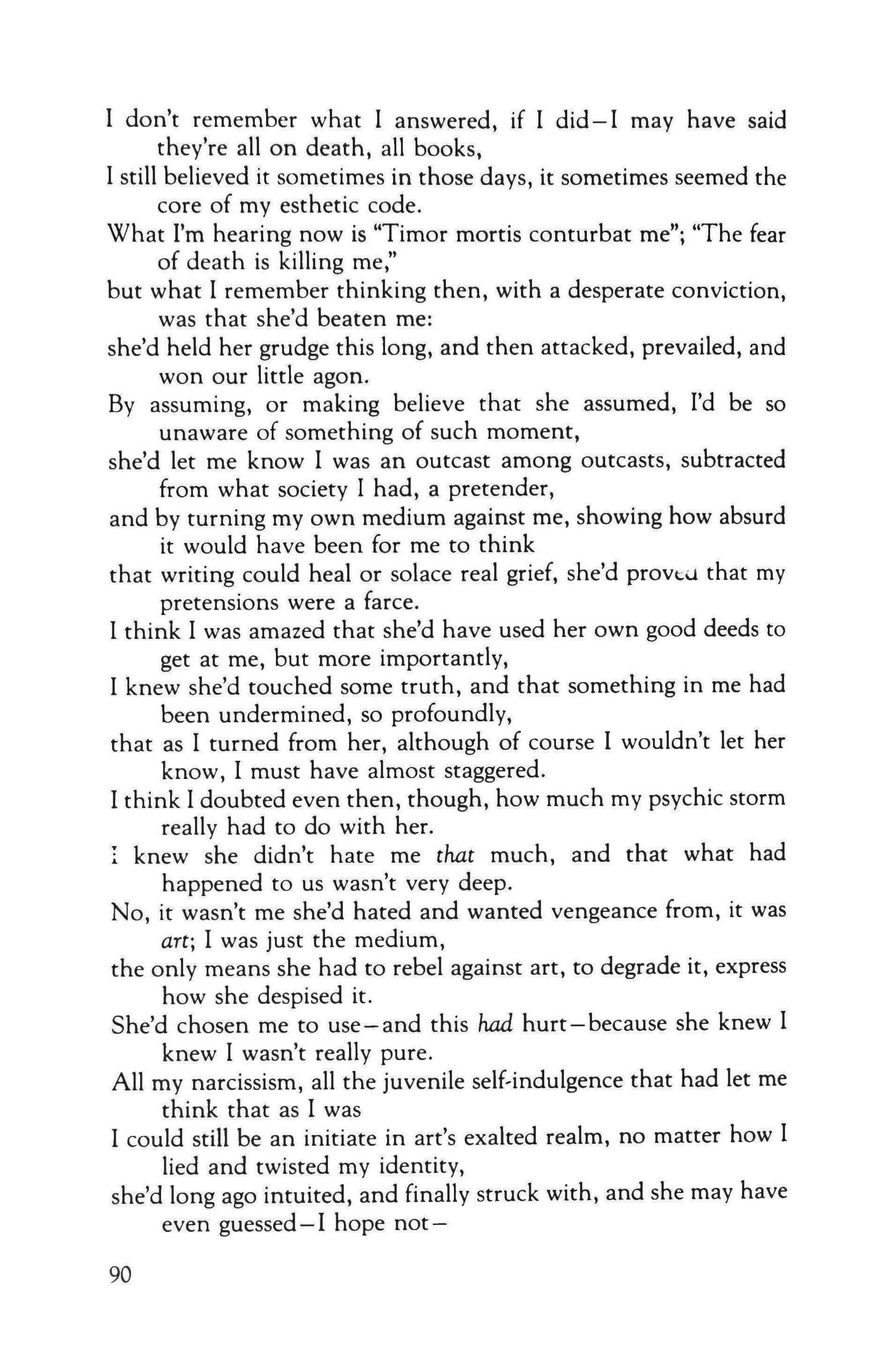
I don't remember what I answered, if I did-l may have said they're all on death, all books, I still believed it sometimes in those days, it sometimes seemed the core of my esthetic code.
What I'm hearing now is "Timor mortis conturbat me"; "The fear of death is killing me," but what I remember thinking then, with a desperate conviction, was that she'd beaten me: she'd held her grudge this long, and then attacked, prevailed, and won our little agon.
By assuming, or making believe that she assumed, I'd be so unaware of something of such moment, she'd let me know I was an outcast among outcasts, subtracted from what society I had, a pretender, and by turning my own medium against me, showing how absurd it would have been for me to think that writing could heal or solace real grief, she'd proveu that my pretensions were a farce.
I think I was amazed that she'd have used her own good deeds to get at me, but more importantly, I knew she'd touched some truth, and that something in me had been undermined, so profoundly, that as I turned from her, although of course I wouldn't let her know, I must have almost staggered.
I think I doubted even then, though, how much my psychic storm really had to do with her.
I knew she didn't hate me that much, and that what had happened to us wasn't very deep. No, it wasn't me she'd hated and wanted vengeance from, it was art; I was just the medium, the only means she had to rebel against art, to degrade it, express how she despised it. She'd chosen me to use-and this had hurt-because she knew I knew I wasn't really pure.
All my narcissism, all the juvenile self-indulgence that had let me think that as I was I could still be an initiate in art's exalted realm, no matter how I lied and twisted my identity, she'd long ago intuited, and finally struck with, and she may have even guessed - I hope not-
90
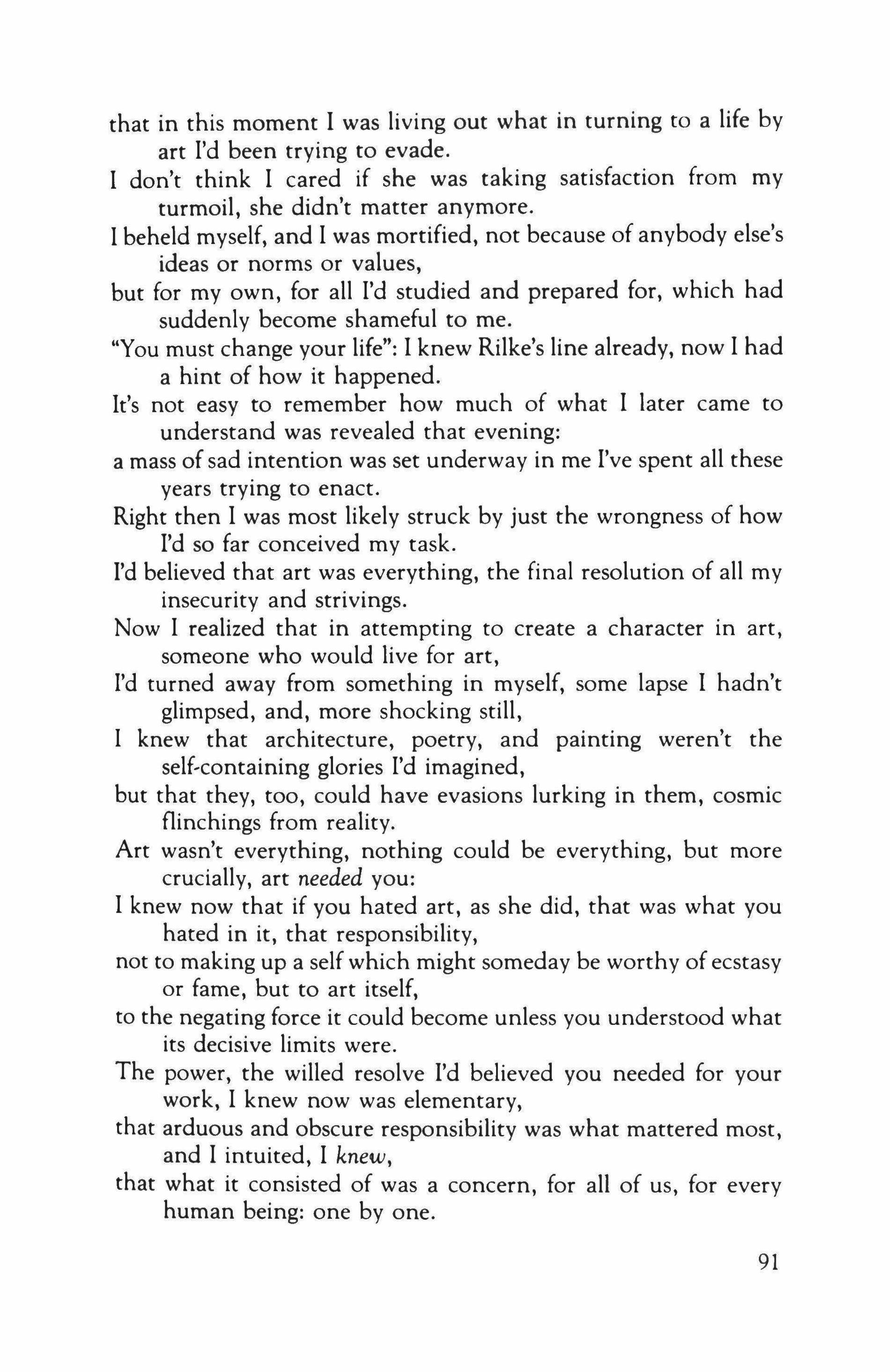
that in this moment I was living out what in turning to a life by art I'd been trying to evade.
I don't think I cared if she was taking satisfaction from my turmoil, she didn't matter anymore. I beheld myself, and I was mortified, not because of anybody else's ideas or norms or values, but for my own, for all I'd studied and prepared for, which had suddenly become shameful to me.
"You must change your life": I knew Rilke's line already, now I had a hint of how it happened.
It's not easy to remember how much of what I later came to understand was revealed that evening: a mass of sad intention was set underway in me I've spent all these years trying to enact.
Right then I was most likely struck by just the wrongness of how I'd so far conceived my task.
I'd believed that art was everything, the final resolution of all my insecurity and strivings.
Now I realized that in attempting to create a character in art, someone who would live for art, I'd turned away from something in myself, some lapse I hadn't glimpsed, and, more shocking still, I knew that architecture, poetry, and painting weren't the self-containing glories I'd imagined, but that they, too, could have evasions lurking in them, cosmic flinchings from reality.
Art wasn't everything, nothing could be everything, but more crucially, art needed you:
I knew now that if you hated art, as she did, that was what you hated in it, that responsibility, not to making up a self which might someday be worthy of ecstasy or fame, but to art itself, to the negating force it could become unless you understood what its decisive limits were.
The power, the willed resolve I'd believed you needed for your work, I knew now was elementary, that arduous and obscure responsibility was what mattered most, and I intuited, I knew, that what it consisted of was a concern, for all of us, for every human being: one by one.
91
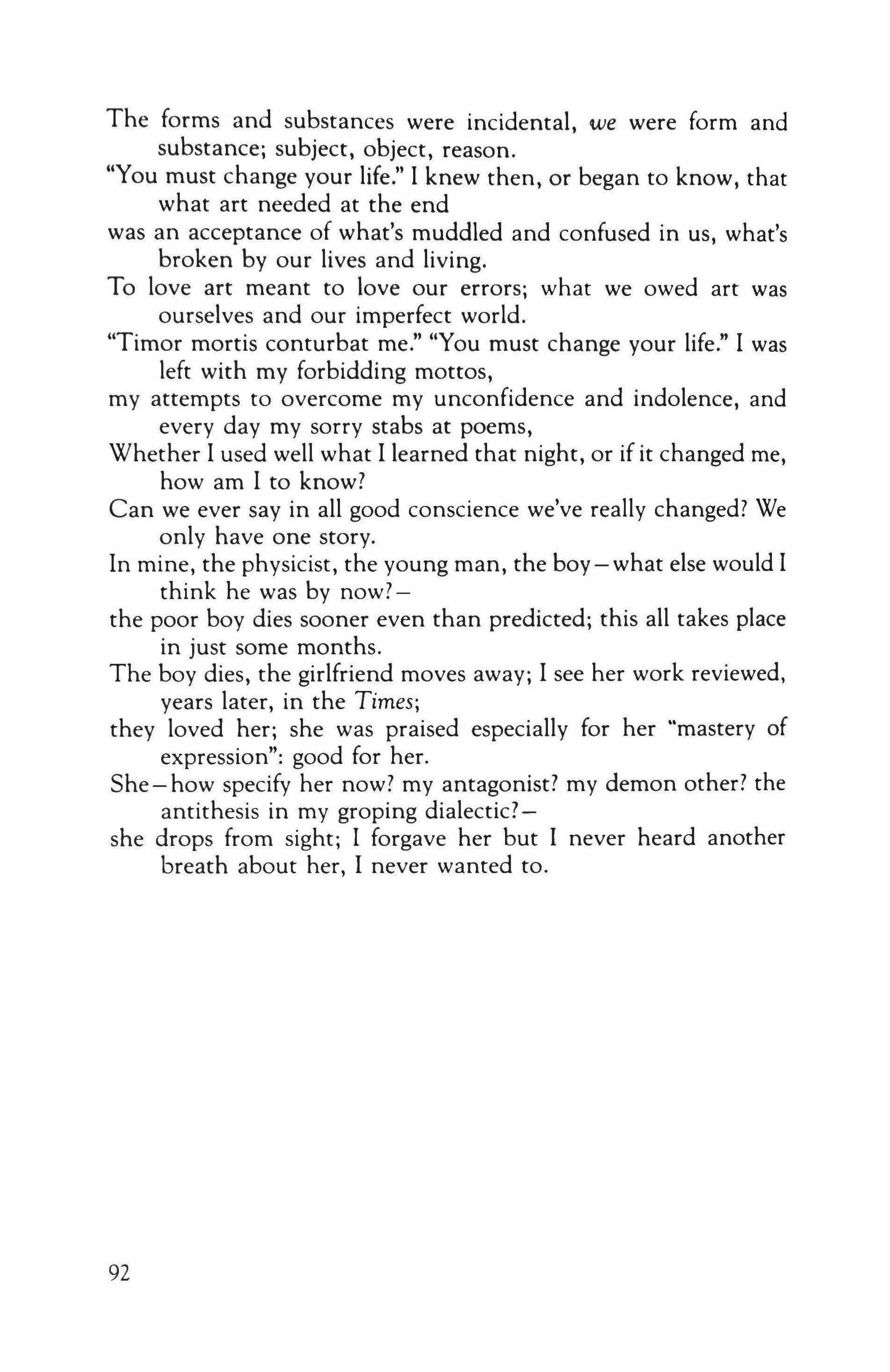
The forms and substances were incidental, we were form and substance; subject, object, reason.
"You must change your life." I knew then, or began to know, that what art needed at the end was an acceptance of what's muddled and confused in us, what's broken by our lives and living.
To love art meant to love our errors; what we owed art was ourselves and our imperfect world.
"Timor mortis conturbat me." "You must change your life." I was left with my forbidding mottos, my attempts to overcome my unconfidence and indolence, and every day my sorry stabs at poems, Whether I used well what I learned that night, or if it changed me, how am I to know?
Can we ever say in all good conscience we've really changed? We only have one story.
In mine, the physicist, the young man, the boy-what else would I think he was by now?the poor boy dies sooner even than predicted; this all takes place in just some months.
The boy dies, the girlfriend moves away; I see her work reviewed, years later, in the Times; they loved her; she was praised especially for her "mastery of expression": good for her.
She-how specify her now? my antagonist? my demon other? the antithesis in my groping dialectic?she drops from sight; I forgave her but I never heard another breath about her, I never wanted to.
92
Death of a Scholar
Suzanne Qualls
 fOT Joel Fineman
fOT Joel Fineman
Insectoid, all instinct, his limbs drawn up and atrophied, the body spindled, past any moment of relaxation into the bed, the bed permanently cranked up behind back and knees-his olive skin, once famously soft ("I always thought he smelled like lemons," his first wife said) now more olive, deeper into shades of gray and brown, the color absolutely wrong.
All this and his sheets strung over him, the angles of his limbs acute, the drapery sometimes slipping from a promontory, exposing all luckless accidents: crisscrossed abdominal scars, in varying degrees of freshness, emitting fine clear plastic tubes; everything permitted now, tolerated, even the one infected scar allowed to seep and redden, as the nurse, exasperated, in tones fit for little boys too long too quiet, and found to have misbehaved: "Th' hi dry' I " ere s not mg we can 0 lOr you. ou re termma But even she, the mythmakers now agree, was finally brought round to "say hi" through another nurse who helped you move from hospital to home. This, we felt, was testament of your worthiness;
93

we wanted to believe your suffering had cracked the heart of someone for whom death had lost all particularity; a tired witness to our agonies and transports, she had become philosopher: she couldn't even see a point in lessening your pain.
All angles now, the skin too large, the heavy crest of hair too fertile for what's left, your head bent toward your chest, the dry and wrinkling skin now more like hidebut you, refusing to be purely animal, would rouse yourself to say sardonic things. We saw triumph in that, too, in your wit and social graces, the comfort of a weening pride and intellect that lurked inside the face of a cadaver.
While you would be decorous to the end, I cannot be-and though I mean no disrespect, I dwell upon the vision that you made, and feel that I became a student of your death, learning a lesson I think you might approve: to live in fear of Death, and live extreme, unimpressed by his civilities.
94
Ginza Samba
Robert Pinsky

A monosyllabic European called Sax
Invents a horn, walla whirledy wah, a kind of twisted
Brazen clarinet, but with its column of vibrating
Air shaped not in a cylinder but in a cone
Widening ever outward and bawaah spouting
Infinitely upward through an upturned Swollen golden bell rimmed
Like a gloxinia flowering
In Sax's Belgian imagination
And in the unfathomable matrix
Of mothers and fathers as a genius graven Humming into the cells of the body
Or saved cupped in the resonating grail
Of memory changed and exchanged
As in the trading of brasses, Pearls and ivory, calicos and slaves, Laborers and girls, two
Cousins in a royal family
Of Niger known as the Birds or Hawks.
In Christendom one cousin's child
Becomes a "favorite negro" ennobled By decree of the Czar and founds
A great family, a line of generals, Dandies and courtiers including the poet Pushkin, killed in a duel concerning
95
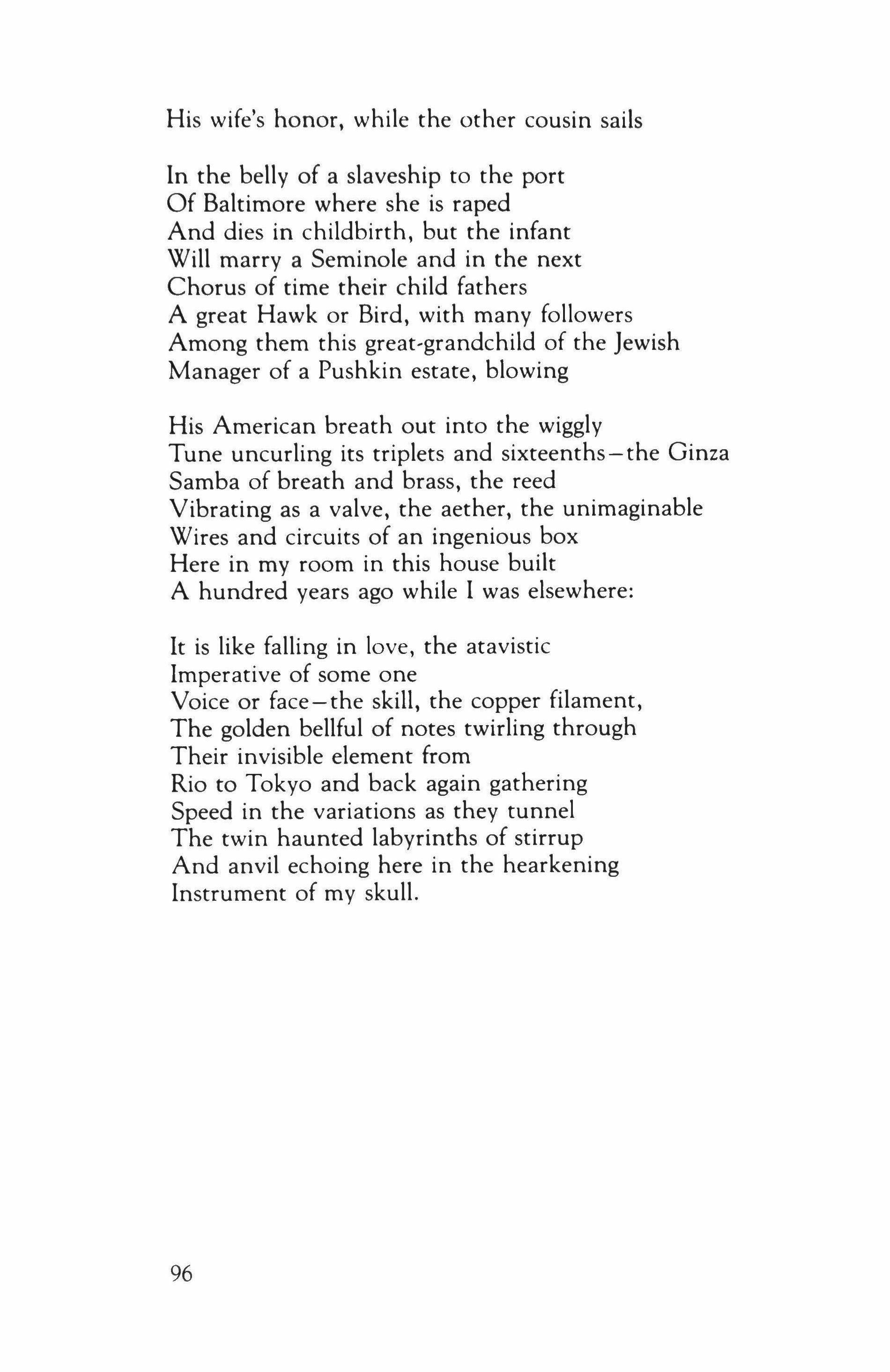
His wife's honor, while the other cousin sails
In the belly of a slaveship to the port Of Baltimore where she is raped And dies in childbirth, but the infant Will marry a Seminole and in the next Chorus of time their child fathers
A great Hawk or Bird, with many followers Among them this great-grandchild of the Jewish Manager of a Pushkin estate, blowing
His American breath out into the wiggly Tune uncurling its triplets and sixteenths - the Ginza Samba of breath and brass, the reed Vibrating as a valve, the aether, the unimaginable Wires and circuits of an ingenious box Here in my room in this house built A hundred years ago while I was elsewhere:
It is like falling in love, the atavistic Imperative of some one Voice or face-the skill, the copper filament, The golden bellful of notes twirling through Their invisible element from Rio to Tokyo and back again gathering Speed in the variations as they tunnel The twin haunted labyrinths of stirrup And anvil echoing here in the hearkening Instrument of my skull.
96
From The Longed-For,
an
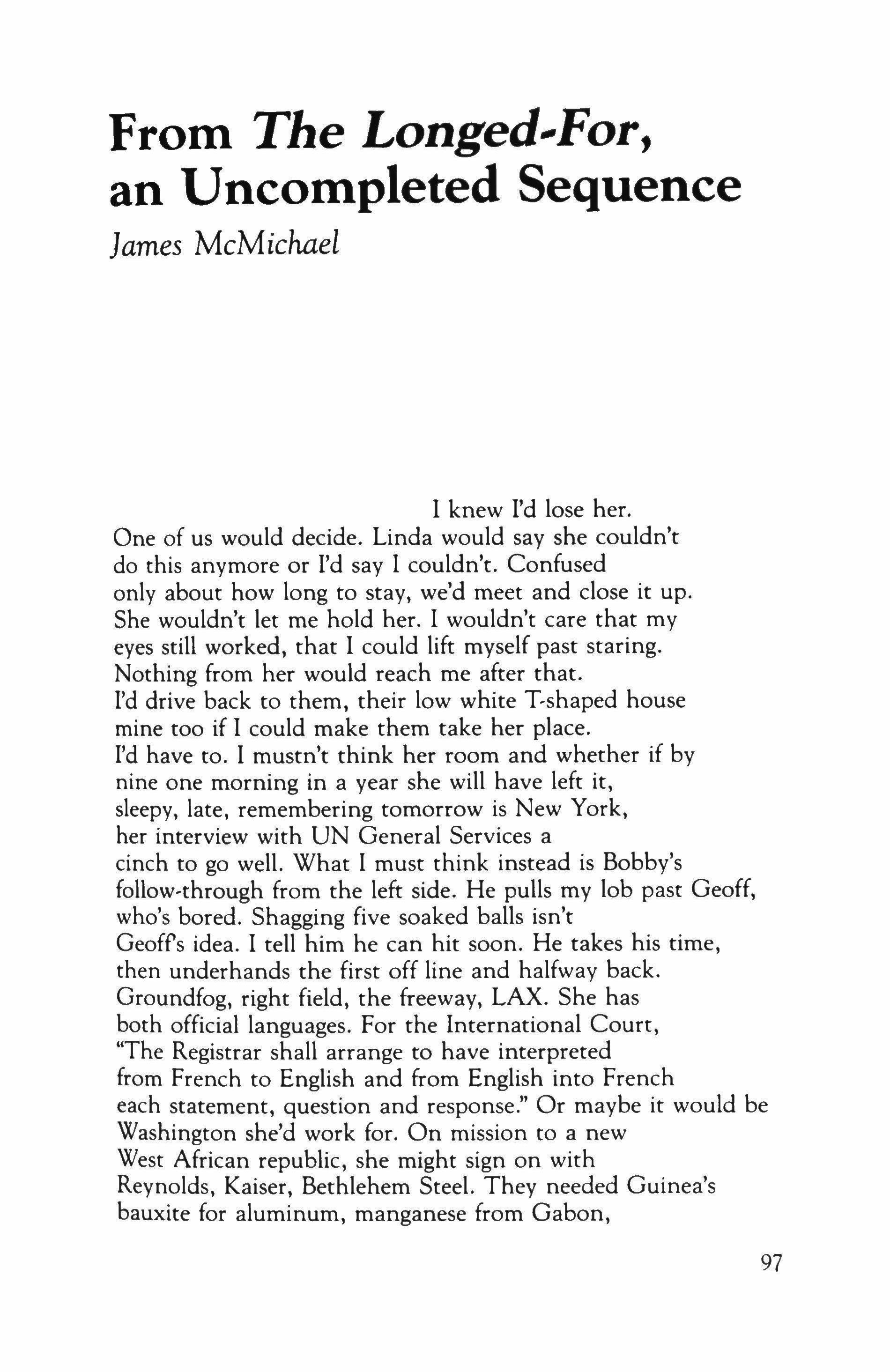
Uncompleted Sequence
James McMichael
I knew I'd lose her.
One of us would decide. Linda would say she couldn't do this anymore or I'd say I couldn't. Confused only about how long to stay, we'd meet and close it up. She wouldn't let me hold her. I wouldn't care that my eyes still worked, that I could lift myself past staring. Nothing from her would reach me after that.
I'd drive back to them, their low white T-shaped house mine too if I could make them take her place.
I'd have to. I mustn't think her room and whether if by nine one morning in a year she will have left it, sleepy, late, remembering tomorrow is New York, her interview with UN General Services a cinch to go well. What I must think instead is Bobby's follow-through from the left side. He pulls my lob past Geoff, who's bored. Shagging five soaked balls isn't Geoffs idea. I tell him he can hit soon. He takes his time, then underhands the first off line and halfway back. Groundfog, right field, the freeway, LAX. She has both official languages. For the International Court, "The Registrar shall arrange to have interpreted from French to English and from English into French each statement, question and response." Or maybe it would be Washington she'd work for. On mission to a new West African republic, she might sign on with Reynolds, Kaiser, Bethlehem Steel. They needed Guinea's bauxite for aluminum, manganese from Gabon,
97

their dealings for more plants and harbors slowed by lengthy phonecalls through Paris. When there were snags, she'd fly there that same afternoon, her calendar a mix of eighty hours on and whole weeks off. There'd be sidetrips to England by Calais and one aisle over from her on the crossing, by himself, the man I saw last week I fear she'd like. He'd have noticed her before they cleared the dock, she'd been writing something, left wrist bent toward him, the card almost filled, now, with whatever she was telling someone else. She'd start another, the address first. Eased that he'd sense it in his shoulders when she stood to leave, he'd keep himself from looking, it was much better not to look, he might not interest her, better not to be left remembering how she looked. Dover. He'd follow her to the train and sit across from her, apply himself convincingly to his four appointments and their dossiers. After she'd make notes to herself from a bed and breakfast guide, from The Guide to the National Trust, she'd put the books back in her hemp bag. He didn't mean to be nosy, he'd say, but was she going to see some country houses while she's here? Comfortably, she'd tell him which ones. Though he knew them all, he'd be so taken with her that he'd lose what she was saying, he'd undergo the list and ask if she'd be hiring a car. She'd pick one up tomorrow in Hammersmith and then drive west. Would she have dinner with him tonight? She'd say she'd like that: she was booked at the St. Margaret's, off Russell Square, could he meet her there at seven? When she'd close her eyes, her head against the cushioned wing of the seat, he'd think her managing to rest was not so much a carelessness to his attentions as that she wasn't vain. She wouldn't catch him watching if he angled his look away from her toward the window, in the tunnels especially he'd see reflected in its glass her gradual full outline as she breathed. There would be time all evening to talk. He'd tell her then about his uncle's place in Surrey where they'd both be welcome, its rubble-stone and leaded casements, tile, an east
98
loggia to the lawns and wooded slope. He'd loved the kitchen garden as a boy, the path there, silver lavender and catmint borders, an oak-doored archway framing for him on chains above a well the twin coronas of roses in the cool damp light. *
My wife is taking it well enough. If there's another woman she doesn't want to know. In LA, where no one knows us and would tell, I rent a studio above a garage. Linda moves out of the Y to the front unit of a duplex. She's at the Ambassador for Bobby Kennedy's victory party the night I leave. Dumbfoundedness, one more impossible cortege, but she can come over now, I can go see her, summer, our walks up the fireroad in the last light, rabbits and even deer sometimes across the reservoir on the grassy fans. We go to the store together. There's time for movies, now, and double solitaire. We wrestle. She cuts my hair one Saturday outside her kitchen.
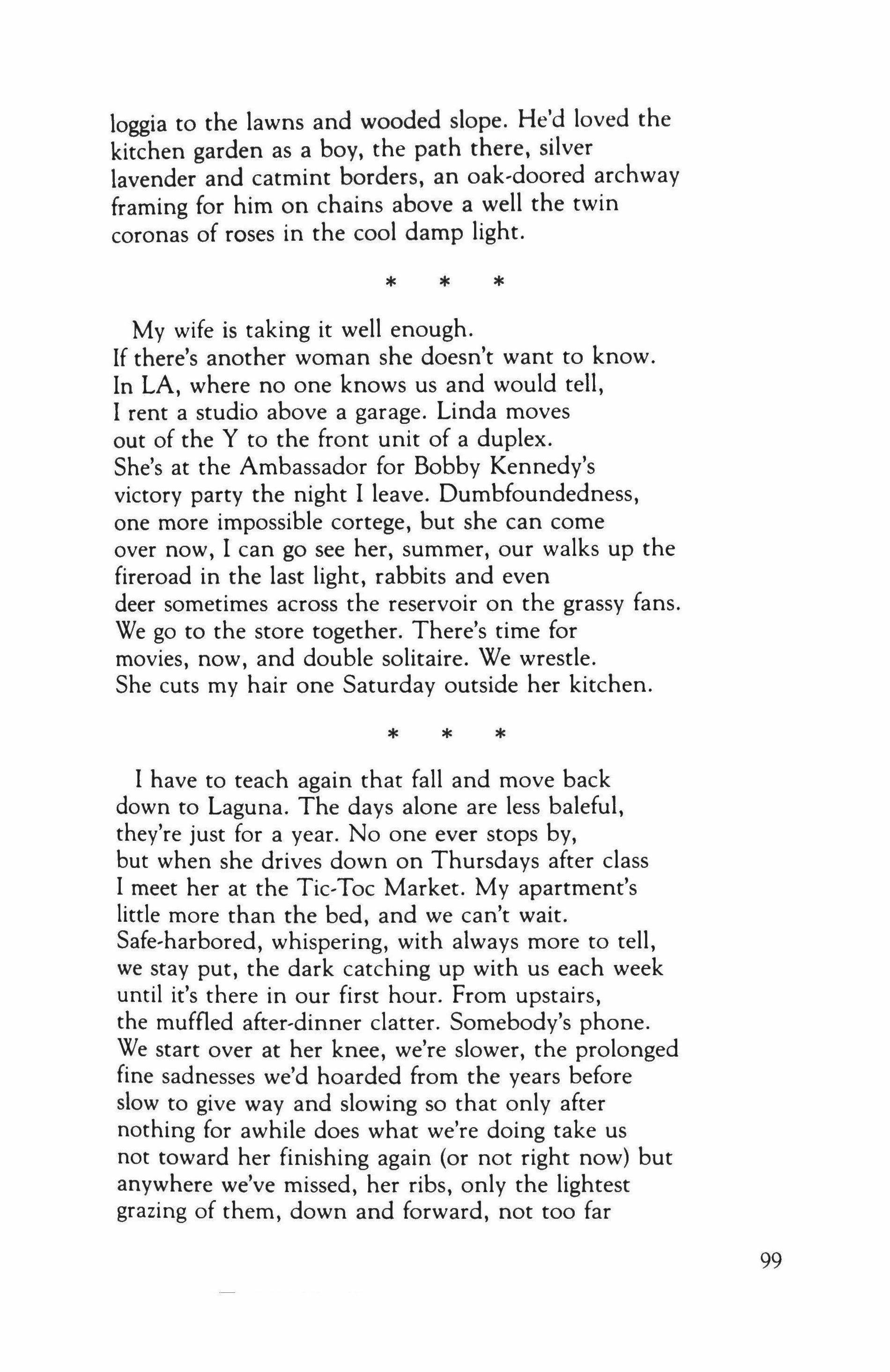
I have to teach again that fall and move back down to Laguna. The days alone are less baleful, they're just for a year. No one ever stops by, but when she drives down on Thursdays after class I meet her at the Tic-Toe Market. My apartment's little more than the bed, and we can't wait. Safe-harbored, whispering, with always more to tell, we stay put, the dark catching up with us each week until it's there in our first hour. From upstairs, the muffled after-dinner clatter. Somebody's phone. We start over at her knee, we're slower, the prolonged fine sadnesses we'd hoarded from the years before slow to give way and slowing so that only after nothing for awhile does what we're doing take us not toward her finishing again {or not right now} but anywhere we've missed, her ribs, only the lightest grazing of them, down and forward, not too far
* *
* * *
99

nor too far back again across, each furrow closer by its width to that last ridge below the pliant dominating compass of her breast. We're being pulled, of course. She hasn't stopped me. She won't. At its outermost, her body's what she touches with. It isn't long before she's moving too. Our skins poised for the next just barely altered place, we're thread-like stalks, light-running, sheer, our tiny leaves flush with the basin's wide paved curb. It's still gare-piered courtyard, ashlar dressed, a balustrade. From jets above the circular pool alcoves, water, its affection for an always lower point right-channeled in the iris rills, then underground, the land dropping away through poplars to the dell. Damp peaty banks easing to the full pond,hollow a single cream-white camas spearing up through the ferns to the tip of its tall sheaf, I'd never married, she'd been born to someone else.
100
Three Poems
Tom Sleigh
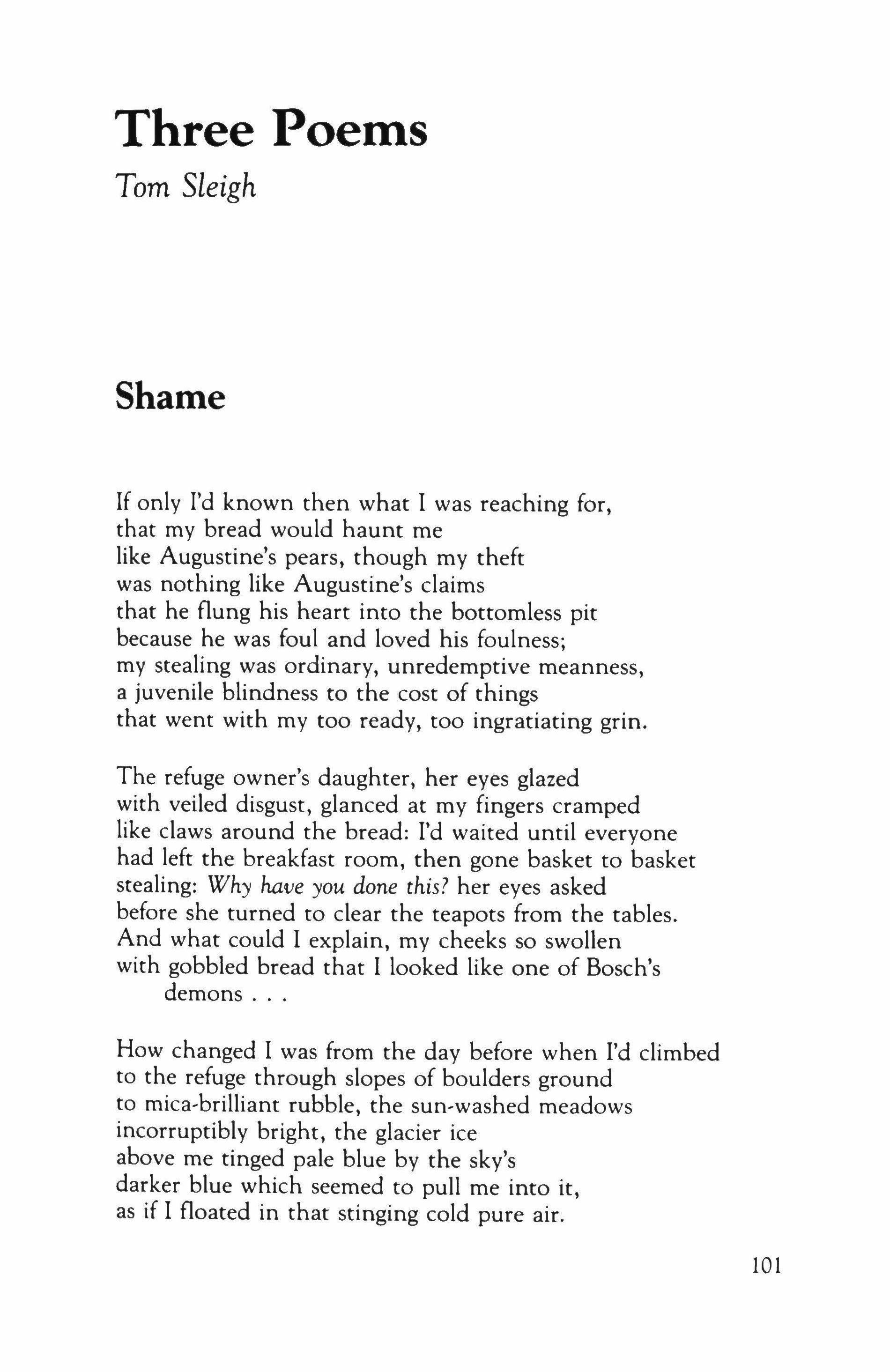
Shame
If only I'd known then what I was reaching for, that my bread would haunt me like Augustine's pears, though my theft was nothing like Augustine's claims that he flung his heart into the bottomless pit because he was foul and loved his foulness; my stealing was ordinary, unredemptive meanness, a juvenile blindness to the cost of things that went with my too ready, too ingratiating grin.
The refuge owner's daughter, her eyes glazed with veiled disgust, glanced at my fingers cramped like claws around the bread: I'd waited until everyone had left the breakfast room, then gone basket to basket stealing: Why have you done this? her eyes asked before she turned to clear the teapots from the tables. And what could I explain, my cheeks so swollen with gobbled bread that I looked like one of Bosch's demons
How changed I was from the day before when I'd climbed to the refuge through slopes of boulders ground to mica-brilliant rubble, the sun-washed meadows incorruptibly bright, the glacier ice above me tinged pale blue by the sky's darker blue which seemed to pull me into it, as if I floated in that stinging cold pure air.
101

The setting sun shrank back into blue-black space shadowing ridge after ridge surging upward into peaks that hovered one behind the other in dispersing clouds, my eyes straining to keep it all in viewand then across the glacier a mist unraveled like thready sleeves, long arms lifting up and balancing in midair ledges and crags of ice and stone
But how distant that all seemed in the leaden morning light, her eyes recoiling from my clutching hand: My breath died inside my chest, my palms ran cold with sweat, my shoulders hunched up around my ears: Shame. I'd even felt it the night before, like a fever coming on, when the other climbers, faces tight with scorn for the fact that I was green, gazed past me as I talked to them in crippled German: They greased their boots and ordered morning thermoses of coffee, poured Schnapps in tin cups, kept aloof from my questions about altitude, avalanche, crevasses And then, as if my stealing whispered that their meanness had been right, next morning on the glacier no one spoke to me: She must have gossiped the whole humiliating moment
Her face hovered before me as I climbed, the snowcrust's monotonous papery crunching beneath my crampons nagging like the shame I couldn't shake, dull as the ache in my muscles. The summit drifted in front of us, a fogged-in crag high up a slope so steep that each breath came hard and ragged, our shadows black weights dragging us back down. I kept seeing my hand reach for the bread, the flaking crust lightly dusted with flour, the long trestle tables and empty benches, the teapots and coffee cups and jars of jam
If only I'd known then what I was reaching for, that her eyes would pursue me, is it almost twenty years? The worst is knowing that I'd confirmed what they wanted
102
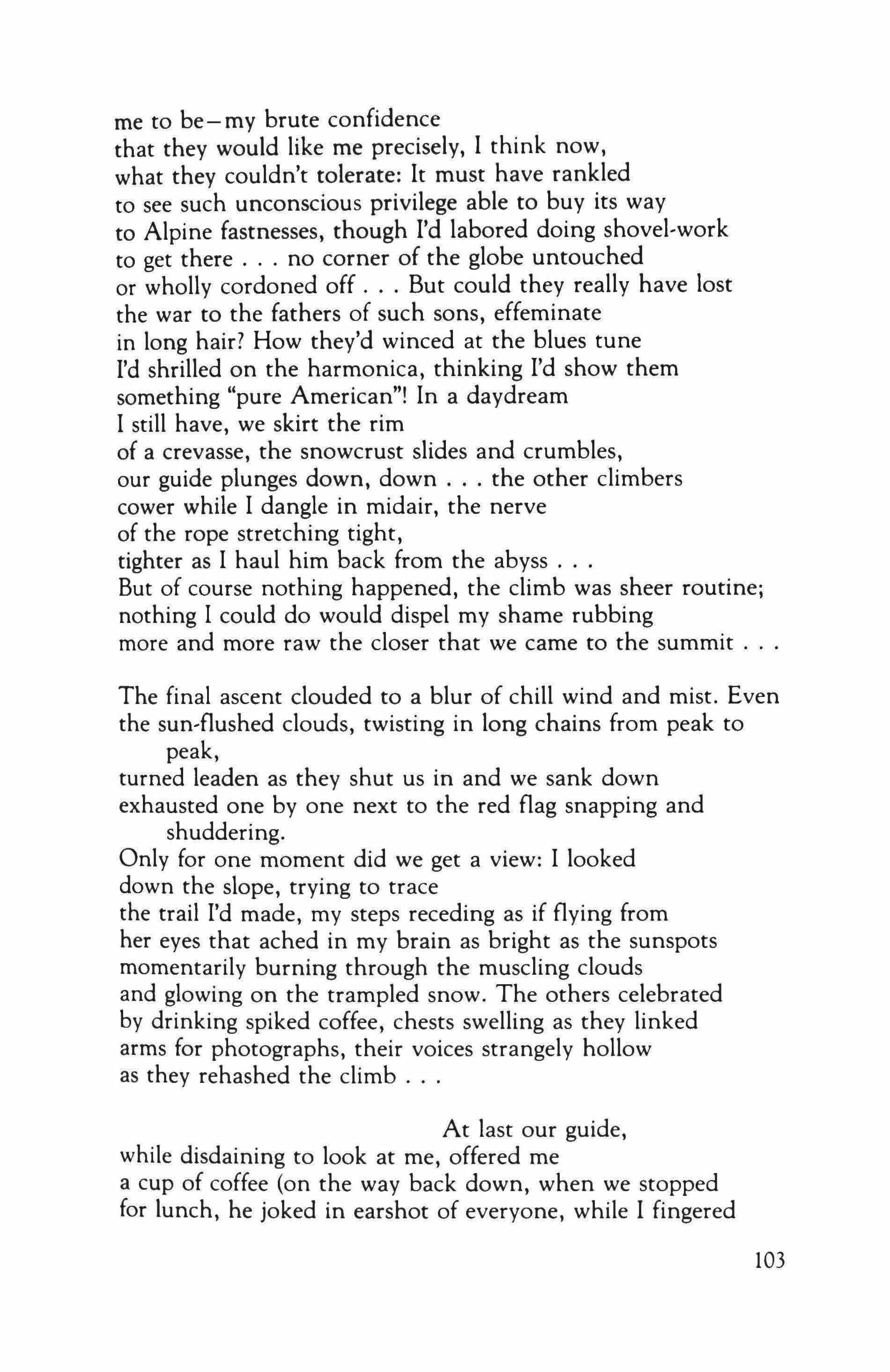
me to be-my brute confidence that they would like me precisely, I think now, what they couldn't tolerate: It must have rankled to see such unconscious privilege able to buy its way to Alpine fastnesses, though I'd labored doing shovel-work to get there no corner of the globe untouched or wholly cordoned off But could they really have lost the war to the fathers of such sons, effeminate in long hair? How they'd winced at the blues tune I'd shrilled on the harmonica, thinking I'd show them something "pure American"! In a daydream I still have, we skirt the rim of a crevasse, the snowcrust slides and crumbles, our guide plunges down, down the other climbers cower while I dangle in midair, the nerve of the rope stretching tight, tighter as I haul him back from the abyss But of course nothing happened, the climb was sheer routine; nothing I could do would dispel my shame rubbing more and more raw the closer that we came to the summit
The final ascent clouded to a blur of chill wind and mist. Even the sun-flushed clouds, twisting in long chains from peak to peak, turned leaden as they shut us in and we sank down exhausted one by one next to the red flag snapping and shuddering.
Only for one moment did we get a view: I looked down the slope, trying to trace the trail I'd made, my steps receding as if flying from her eyes that ached in my brain as bright as the sunspots momentarily burning through the muscling clouds and glowing on the trampled snow. The others celebrated by drinking spiked coffee, chests swelling as they linked arms for photographs, their voices strangely hollow as they rehashed the climb
At last our guide, while disdaining to look at me, offered me a cup of coffee (on the way back down, when we stopped for lunch, he joked in earshot of everyone, while I fingered
103

my bread I was too ashamed to eat, "Bon appetit, bon appetit'"). Homesick among the click of camera shutters, the tin cup burning against my mittened hands, I saw that in his eyes I was nothing but a thief - To think that summed me up, my hold on myself loosened by a stranger's slyly scornful glance, the "I" I thought 1 was mutable as mist Suddenly the glacier seemed minutely active, crisscrossed beneath the snowcrust by a thousand cracks and fissures. Queasy before the maze of tracks weaving down the slope, 1 muttered to him thanks, but he only turned his back, my too eager grin freezing on my face. All around me our ice-axes stuck blade-up in the snow, like a flock of steel birds balanced on one leg, chill beaks dully gleaming. -1 lowered my eyes, 1 was seized with such shame; and when he passed the log book, for a moment 1 considered signing a false name, some anonymous John Doe whom he could muse on later with the refuge owner's daughter, each reminding the other, if they ever think of it at all, The American, remember, who was the thief?
104
Lamentation on Ur

2,000 B.C.
Like molten bronze and iron shed blood pools. Our country's dead melt into the earth as grease melts in the sun, men whose helmets now lie scattered, men annihilated by the double-bladed axe. Heavy, beyond help, they lie still as a gazelle exhausted in a trap, muzzle in the dust. In home after home, empty doorways frame the absence of mothers and fathers who vanished in the flames remorselessly spreading claiming even frightened children who lay quiet in their mothers' arms, now borne into
oblivion, like swimmers swept out to sea by the surging current. May the great barred gate of blackest night again swing shut on silent hinges. Destroyed in its turn, May this disaster too be torn out of mind.
105
Song

Faces of My Lai, faces of Watts, grainy faces of slaughtered souls that a newspaper photo
puts to rest, harden into masks that make war and race riot objective pain which smaller pain joins to.
Pleasure of oblivion in grass and heroin, heightened, desperate, turmoiled
joy of speed and LSD, moments like relics shrunk hard as bone. Blindfolded will, childhood's
hand still searching the past like a body for causes and reasons.
Generation that announces a millenium that comes and goes until the next announcement that comes and goes unheeded, ignored, forgotten.
Earthbound pleasures and conflagrations: The terrible leisure of watching what happens happen.
106
Ghost Ship
Mary Kinzie
 for Zivile Bilaisis
for Zivile Bilaisis
'Mother, look down on me!' I whispered into the bare room."
-spoken by Mrs. Curren in J. M. Coetzee's Age of Iron
A mother's lovemy love for you - hurts at the core
Like a coal whitened by long burning, Nothing of me unsinged by your existence. Odd, How the metaphors for love grow dangerous: You pour Out of perfection death in all its low, Centrifugal furor-essentially, the flame Of consciousness, which flickers around the life That life begins to eat.
Look at yourself,
Hummed the books on motherhood with the enormous Photos of Brancusi wombs (unearthly skin Stretched on an ellipse); look in the mirror, See that sudden vein across your throat
We were to savor self as if we had to be in love With our own bodies.
I could not feel like that.
I was quiet as water, heavy as it, With the quizzical expectancy
Once observed by Paula Modersohn Painting garlands on her brief career. I watched that self not-me grow viable, Drowsing in blood running twice heavy, Twice rapidly through the welling arteries: How ripe your shining being, being heavy, The only grace, what came from your increase, Taking everything you needed.
107
The vein is still there, But it was not sudden; nothing grew to difference
Save attention to my mission
As the hull of your arrival. And the hormones, Sped up, fantastic, that made one so invulnerably Happy, have coursed on out, poured from me
Like an offering onto empty ground, Taking hair, give of the skin, and leaving In me weariness and fret, but not yet Fever-much as before. Yet nothing is the same.
These being true, why such a rhetoric, Foreboding and all that? Having what I wanted Beyond all deserving, visited by the angel
In my late age, you, who have brought Light to the water, my little stella maris, embryo Ore of pure being in quicksilver, why does the anvil
Of desperation hiss?

Only logic could pose
Such a question. Consider this child whom we can hear
Putting the paws of the stuffed dog on the keys
So it can learn piano (the minor melodies
She, too, must fumble to articulate
On the instrument, though she sings soulful
Unerring variants all day): the childish Trochees dancing in a winsome round-song
Under thrumming from the Middle Ages' Iron laments, atonal, harsh with conscienceBobby Shafto mourned, not by his lover, But by something older, dolorosa,
As he flew before the grinning headbone. Listen. Twinkle little star we wonder, All the starlight hardened to a stave
As her hand-paw hits the shrilling keys, Till the antic drag of every ditty
Knuckles to the ictus of the church chant, Solvet saeclum, turbid timor mortis, Death's old hobbled terror. Yes, I have Seen the Muffin Man. He said: "When she is your age, you shall be dead."
108
Before then, shall we waken
To see our days passing away like smoke, our bones
Ablaze as in the psalmist's furnace, Whipped by disease smiting
The heart, forgetting to eat our bread?
Sadness of life in age grieving for children. The earth shards, sleaze, waste waste! A filthy hail on a slag of lies
In the place of punishment. This is "progress," "Modern life," and "culture,">
A flail of bald vacuities for wrong
In an excremental idiom, Bereaving us. All mind comes back to this.

Birdsong in January, month of sparsity, in a dawn Angrily whining down the frozen highway. This was the house where the old woman died Before she could become your grandmother. After years alone, at last all winter
She heard the hymnal played, out of the darkness As if from Sweden Now, as then In her waning season, the earth so leached Of energy all it could muster was storm, never again Would nourishment float downward from the rain: No. Clouds and smoke. A sickly sun-flood (the fire Next time too lurid an idea-it would more likely be An age of ice), when the hard crumbs of snow like shaken Minerals scrape among the scrape of long, dead fronds.
Worse than deadened stretches, the deep griding
Made by the lives thrown down there with no cover In an unaccommodated nightmare, The skin a rind of frostbite that would bleed, Teeth split, no food, only kernels of rubble Wet by a brothy stench. No way to warm oneself.
Like roots in frost recoiling, as they dug the ground With sticks or hacked with their thumbs and nails
Like all slave labor, the old biology
* * *
109
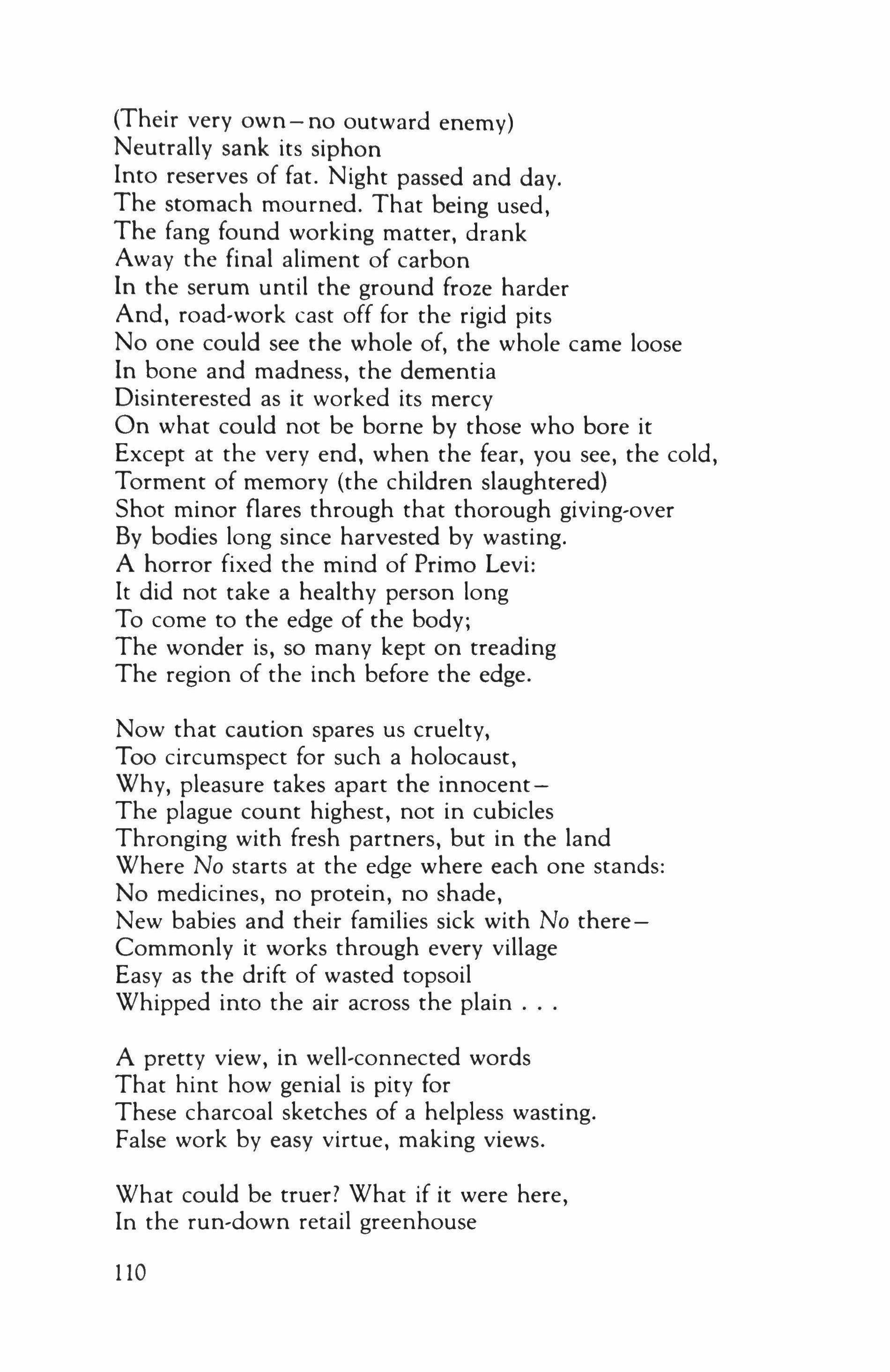
(Their very own-no outward enemy)
Neutrally sank its siphon
Into reserves of fat. Night passed and day. The stomach mourned. That being used, The fang found working matter, drank Away the final aliment of carbon
In the serum until the ground froze harder
And, road-work cast off for the rigid pits
No one could see the whole of, the whole came loose
In bone and madness, the dementia
Disinterested as it worked its mercy
On what could not be borne by those who bore it
Except at the very end, when the fear, you see, the cold, Torment of memory (the children slaughtered)
Shot minor flares through that thorough giving-over By bodies long since harvested by wasting.
A horror fixed the mind of Primo Levi:
It did not take a healthy person long
To come to the edge of the body;
The wonder is, so many kept on treading
The region of the inch before the edge.
Now that caution spares us cruelty, Too circumspect for such a holocaust, Why, pleasure takes apart the innocent-
The plague count highest, not in cubicles
Thronging with fresh partners, but in the land
Where No starts at the edge where each one stands:
No medicines, no protein, no shade, New babies and their families sick with No there
Commonly it works through every village
Easy as the drift of wasted topsoil
Whipped into the air across the plain
A pretty view, in well-connected words
That hint how genial is pity for These charcoal sketches of a helpless wasting. False work by easy virtue, making views.
What could be truer? What if it were here, In the run-down retail greenhouse
110
Where I brought you to buy flowers, to plant Like sparkling knots of water near the hedges, - What if this were the navel of disease?
Irrigation runnels of concrete Broken against a mossy mould that stank Of cats and urine The long house of glass Squinting along the trays of half-dead seedlings Among which humped the manic, injured cat At last a woman, teeth stained, filthy hands, Hot pants on her soft, attractive thighs, An orange dye hanging on her hair, Slurring of the eyes and tongue, would serve us Where she stood in reeking light. I snarled, "Stay right behind me," and this frightened you. Even when this pitiful, used creature Offered you out of her patchwork heart Some mangy flowers, I hissed, "Don't touch a thing." - Is this where it begins? not just disease, But worse, the complications of recoil That drive the blood up with self-satisfaction? How can we save you then?
Even the wish
Unworthy, given all those dead. I know this.

Four years now, since your second April- I Have thought about one moment free of blemish From nice style-one that struggles to fall empty; Wait; and clear.
The words that frothed and broke New-formed from you over a protean world Were miracles of error: the "glass station," Commands to "Flyaway." Like their revision Of the world of place and path, your transferred Logic, crooked on its pathway, By which the bird and airplane coincided With the tiny insect brief as daylight Whom the day shone through, admonished us To look even through large engines as through windows
* * *
III
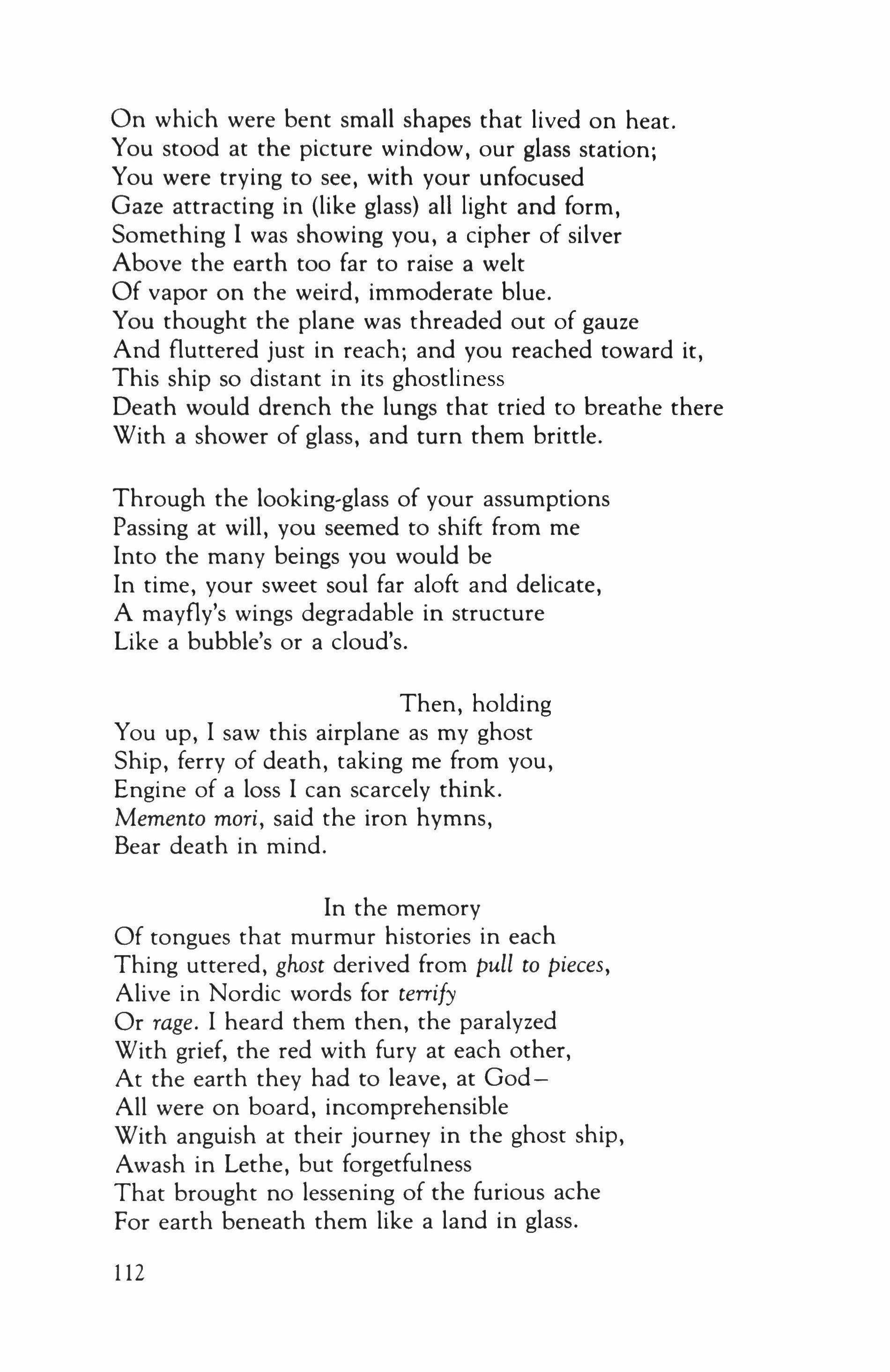
On which were bent small shapes that lived on heat. You stood at the picture window, our glass station; You were trying to see, with your unfocused Gaze attracting in (like glass) all light and form, Something I was showing you, a cipher of silver Above the earth too far to raise a welt
Of vapor on the weird, immoderate blue. You thought the plane was threaded out of gauze And fluttered just in reach; and you reached toward it, This ship so distant in its ghostliness
Death would drench the lungs that tried to breathe there With a shower of glass, and turn them brittle.
Through the looking-glass of your assumptions
Passing at will, you seemed to shift from me
Into the many beings you would be In time, your sweet soul far aloft and delicate, A mayfly's wings degradable in structure
Like a bubble's or a cloud's.
Then, holding
You up, I saw this airplane as my ghost Ship, ferry of death, taking me from you, Engine of a loss I can scarcely think. Memento mori, said the iron hymns, Bear death in mind.
In the memory
Of tongues that murmur histories in each Thing uttered, ghost derived from pull to pieces, Alive in Nordic words for terrify Or rage. I heard them then, the paralyzed With grief, the red with fury at each other, At the earth they had to leave, at God
All were on board, incomprehensible With anguish at their journey in the ghost ship, Awash in Lethe, but forgetfulness
That brought no lessening of the furious ache For earth beneath them like a land in glass.
112

How can we slip through this? Even the wish
Unworthy, given all those dead. I know, But on the wind from down the neighborhood, From out some military barge or brutal ship
Carrying also tusks and oranges, Some spoor will visit in a virulent strain
My child will perish from. And I yearn to save her, One child, and hide her in among the myriad gone. But the world is in the air. To our own sorrow.
Around her body we will stiffen at The moist eyelashes, the sleeping drop of blood
On the white embroidery of body, Our little ephemerid's, blown by a rising wind
Until too high, too far, anymore, to see.
Not that we care, we ask about the crone
No one will remember we forgot,
Although we know the pang must have a point: Someone is always missing from the scene, Or something that resists the camera. Is this the plenitude where former life Whispered its arrhythmia beside us?
At the last hour, are the roles reversed, Thought Mrs. Curren (heroine of love
Because she scrupled over those she did not)Do bearing a child and being one remarry In a guilty certainty of rescue, Softening as we listen to her heart?
What can be done to heal us from such longing?
Ghost of mothering, ghost of the earth
Whose sickening winds irradiate our bones, Weh, Weh, as she wails forth her grief, deeply Suspect, for all her scattered waifs.
113
Shadowfall
K. Reynolds Dixon
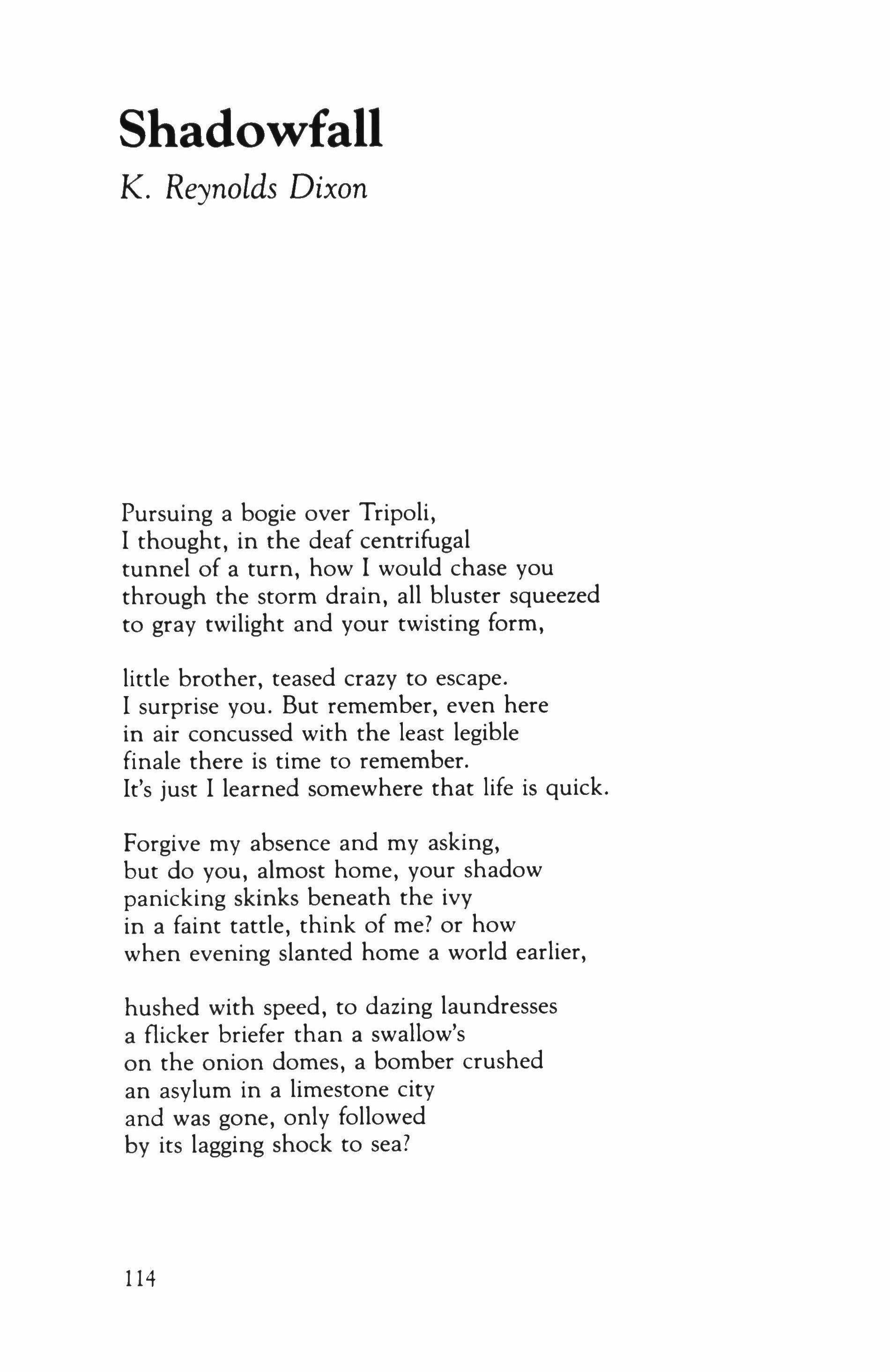
Pursuing a bogie over Tripoli, I thought, in the deaf centrifugal tunnel of a turn, how I would chase you through the storm drain, all bluster squeezed to gray twilight and your twisting form,
little brother, teased crazy to escape. I surprise you. But remember, even here in air concussed with the least legible finale there is time to remember. It's just I learned somewhere that life is quick.
Forgive my absence and my asking, but do you, almost home, your shadow panicking skinks beneath the ivy in a faint tattle, think of me? or how when evening slanted home a world earlier,
hushed with speed, to dazing laundresses a flicker briefer than a swallow's on the onion domes, a bomber crushed an asylum in a limestone city and was gone, only followed by its lagging shock to sea?
114
Four Poems
Claudia Emerson Andrews
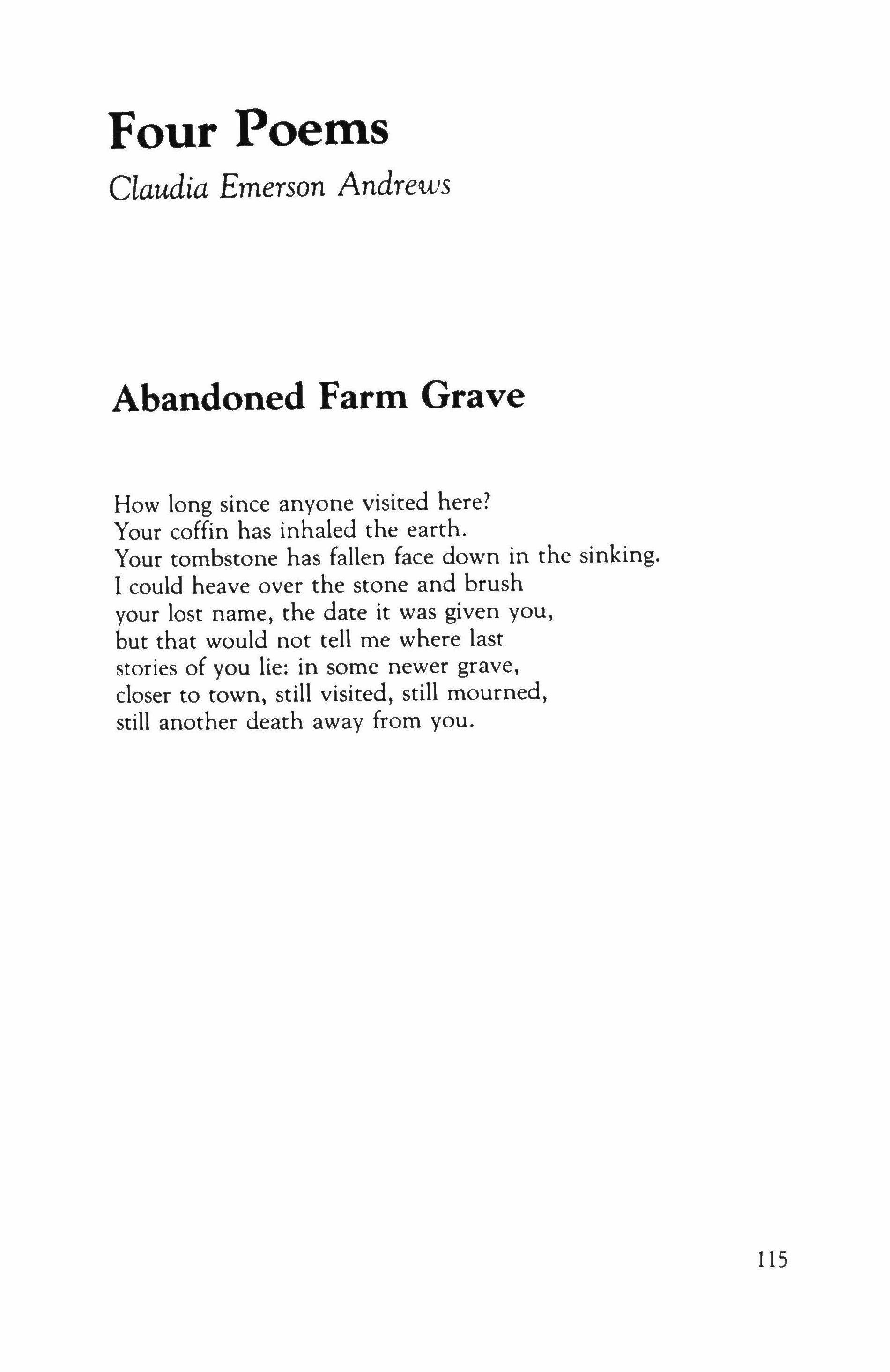
Abandoned Farm Grave
How long since anyone visited here? Your coffin has inhaled the earth. Your tombstone has fallen face down in the sinking. I could heave over the stone and brush your lost name, the date it was given you, but that would not tell me where last stories of you lie: in some newer grave, closer to town, still visited, still mourned, still another death away from you.
115
The Moon Is Made

Phil sold cigarettes and soft drinks up front and poured peach brandy in the back room of his corner gas station. Summers, my brother and I would ride our bikes around the two pumps to ring the bell, and Phil would yell not to and not mean it. He sliced rat cheese from a huge wheel, waned by appetite like a foul, yellow moon flat on its back; in deep July heat it reeked its gravitational pull. We bought hunks in white butcher paper and Saltines for lunch; hunkered down inside on cool concrete, we listened to Phil talk dirty about women. Well, you think, that's all a fine memory, except that even though I tried to hide it with high tops and a Cubs cap, I was a little girl, and I knew he knew it. But even my big brother only laughed when Phil rolled back the tin on kippers and said, "Don't let your nose knot your tongue every time." And he winked at me, at what he knew I would be, then tossed back his head, dropped a headless fish in his mouth to swim blindly down, while my shame, nameless, soured and curdled, and the moon fumed and overcame me.
116
The Taxidermist

In good weather I herd them onto my lawn, coats glossy, feathers bold. Cars slow for the fox beside the quail, the bobcat by the sleeping fawn. I turned each body inside-out, emptied it of flesh, fat, bones, eyes; the meat of the lie displays the thin, defining skin of something else. All that you see, I save. Good enough to shoot again, you laugh, but I know death is not held at bay, has not even looked over its shoulder at the fleshing knives and pliers, the saws and scalpels. This is tedious, messy resurrection, and what I preserve is not death or life or skill, but the wounded ghost of an old hunger that won't be satisfied by your finest trophy, that won't be tamed and taught to lick your hand, old hunter, but will bound through some finer field, beyond the wind you foul, even as I rummage for the right glass eye in drawered compartments. Here, see, they are all here: loon, lynx, owl, fox, snake, and coon. All sized, all blank, all blind.
117
Romantic Fever

I fought the lost summer of fifty-eight from the narrow sun-porch bed: rheumatic fever formed a clenched fist of every joint. My skin seared white-hot sheets my mother washed every day and hung on the line like sails swollen pointlessly against anything anchored this deep. She plugged in the Zenith for me; rock and roll melted in morphine. Jerry Lee's new release, "Great Balls of Fire," played every hour to unborn irony.
By September, pale legs like pain-hollowed sterns and wrists weak as oak leaves', I was fragile but redeemed, capable of growth, sent to school where I swayed by the lockers, watched as the viral rumor caught and spread: He's been in bed with romantic fever.
That night I lay harbored in the darkness watching the doomed fireflies rise; easier to believe the stars had fallen, crippling in the trees. In the damp grass one lay flat on its back, quietly coughing up light.
118
Two Poems
Paul Breslin

Late Arrival
If, steadily, this ray of light that left its star before the eye that sees it was conceived, and might have ended in any of the windows, too numerous to count, in any of the houses whose lights stretch farther than the eye can follow, or missed all houses altogether, dropping into a tree outside, the empty street, unpopulated woods or desert, drowned between two islands in the mid-Pacific, lost with Scott on the polar icecapswallowed down a crater of the moon, shining into a grain of sand on Mars, or ended nowhere at all, unreeling into unsounded space-
and having found, by a chance too slim to calculate, my window, must find my eye
119

as I turn my head a moment to see if the sky is clear, and not choose the white, the iris, but the sentient lens-
If this has reached me, who is to say my thoughts are unknown to You?
120
From "Elijah"

5.
The fifty of them marching down the hill, coming to summon me before the kingall certitude and sunlight on their helmets, wide in the shoulders, above the average height, with blank, symmetrical faces, as if formed out of a single intention, not their ownapproached until their captain called a halt. And while he droned his message, I began to study them, until each face took on An independent life. Two I was sure I knew, from neighborhoods that sheltered me, and seeing the recognition in my face were ill at ease. Secretly, one of them was with us, though he had to worship Baal to prove his loyalty. I'd seen the other come home at evening, still in uniformstrikingly handsome, and he knew it too. Women stole glances at him from the windows, the children followed him and asked to hold his shield, or touch the handle of his sword.
Once, a group of boys from pious households threw stones at him, calling him filthy names, until, coming upon them, I made them stop. He thanked me, though reluctantly, as you would thank an enemy for fighting fair. I warned him to repent, but he replied, "Whenever I meet a pretty girl, her god is my god, for however long it takes."
He didn't need a god, at least not yet, any more than a cat does, basking in sunlight; he meant no harm to anyone, and did none.
Now the captain finished up his speechI almost had forgotten he was there.
121

A vague presentiment of violence, and then, as dice leap free of the closed hand, came words: If 1 be a man of God, let fire come down from heaven and consume you and your fifty. I had to speak this, knowing they'd be ash as soon as it was out. And speak so none could guess from any trembling in my voice that I felt even the slightest trace of pity.
I waited, staring at those unsuspecting faces. Each now stood out in its uniqueness, irreplaceable. No turning back. They blazed, turned black, and dropped as bones-which ones were whose, who knew? I didn't sleep that night; Even the thought of eating seemed obscene.
At daybreak, in the slant red of the sun, came fifty soldiers, marching down the hill.
122
Four Poems
w. s. tn Piero

Buddy's Corner
The same fake eclairs and Communion cakes adorn D'Ambrosio's window, now behind bars. Thirty years ago, summer wind curled inside my ears; hits cribbed from Malory and Classics Illustrated crammed my head. Fireplug spouts erased the air. Kids in alleys swung sticks, bottlesonce I saw them kick a black, a rubberhead, till blood messed their sneakers. "You can't hurt them anyway," our fathers said. Adrift in old facts, visiting home, I still ride the #2 bus into town. At Buddy's Corner, five years in business, the glass sign's black-and-white hands clasping gleam intact. Nobody enters or leaves. From behind D'Ambrosio's counter, the sullen, knowing girls chew gum, watching the street. No one's buying. When the bus jumps and swerves, my head knocks the glass, waking me to teenage boys in high-tops and fishnet shirts gliding alongside, exploding eggs and tomatoes on the windows. Behind me, a girl shrieks.
123

A woman in cornrows snaps at the driver, "I hate nigger behavior."
Across the corner, Kim Park's Everything Store-"We Never Close" -
crams the storefront where they bombed Rocco's butchershop (I was twelve) for shorting numbers receipts. Peaches, tomatoes, apples, lettuce, stacked in pristine orders. Someone, arms crossed, glares from the doorway.
Next stop, the Baptist Church where happy noise exiled from our liturgy pounded shout and response, the god on the tongue: that pitch of witness, that suffered joy, rattled alien in me when I muttered High Mass.
Here to there, we pass houses brickpointed smart, brass doorknockers, potted shrubs on pavements, windowboxes blooming between white shutters, and punched sheetmetal doors and windows, granite steps upended like logs, brick-moss, weeds like scarecrow stuffing sprung from cracks in walls.
Old men on stoops are shouting not to make trouble, to be cool and act right.
Alongside, afloat between parked cars, the skinny boys stalk the bus, sifting past earnest Korean wives loaded down with grocery bags and kids.
Our slumping driver, opening the door, rolls not to a stop before the church.
124
Saturday Afternoon
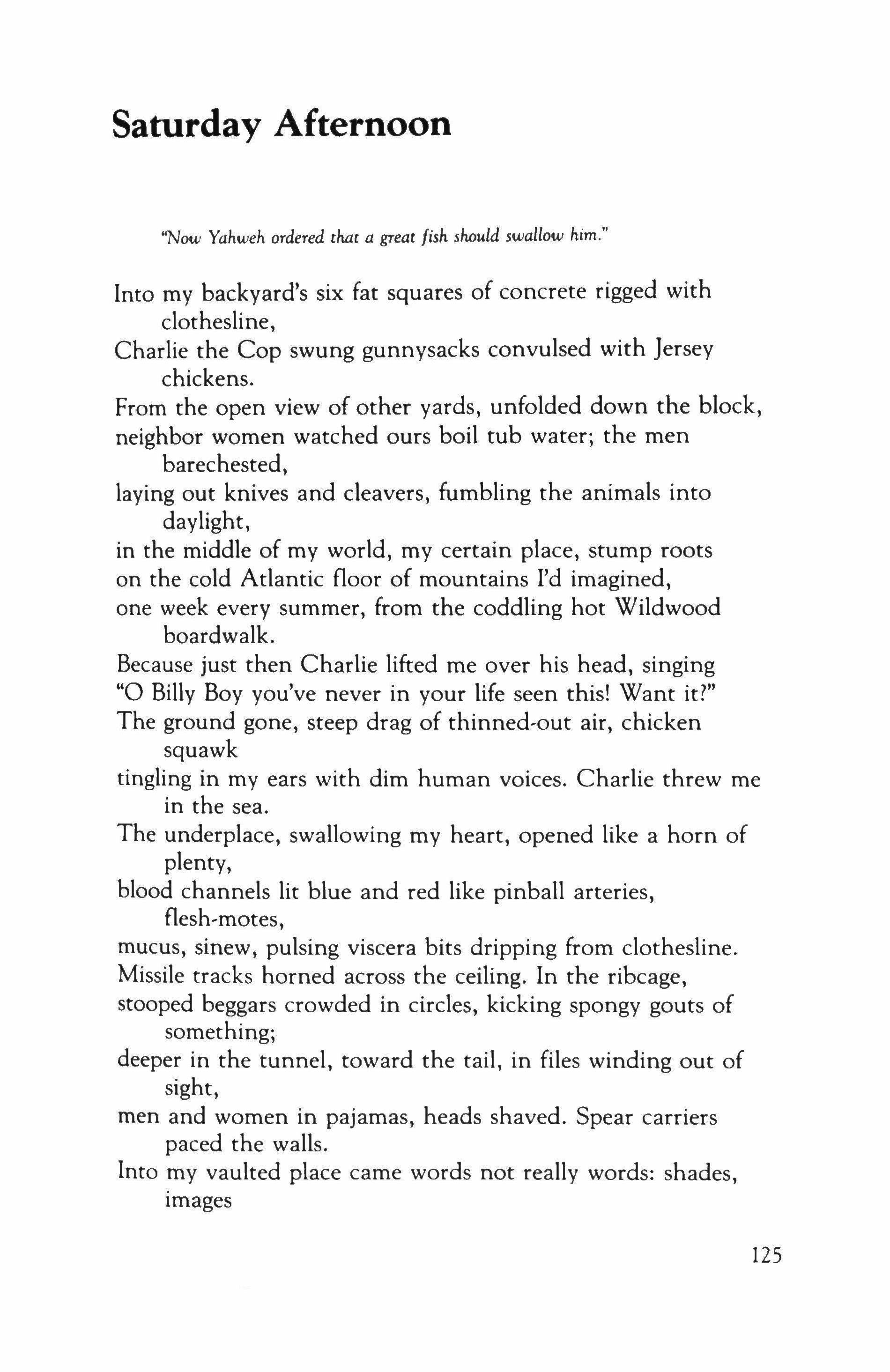
"Now Yahweh ordered that a great fish should swallow him."
Into my backyard's six fat squares of concrete rigged with clothesline, Charlie the Cop swung gunnysacks convulsed with Jersey chickens.
From the open view of other yards, unfolded down the block, neighbor women watched ours boil tub water; the men barechested, laying out knives and cleavers, fumbling the animals into daylight, in the middle of my world, my certain place, stump roots on the cold Atlantic floor of mountains I'd imagined, one week every summer, from the coddling hot Wildwood boardwalk.
Because just then Charlie lifted me over his head, singing "0 Billy Boy you've never in your life seen this! Want it?"
The ground gone, steep drag of thinned-out air, chicken squawk tingling in my ears with dim human voices. Charlie threw me in the sea.
The underplace, swallowing my heart, opened like a horn of plenty, blood channels lit blue and red like pinball arteries, flesh-motes, mucus, sinew, pulsing viscera bits dripping from clothesline. Missile tracks horned across the ceiling. In the ribcage, stooped beggars crowded in circles, kicking spongy gouts of something; deeper in the tunnel, toward the tail, in files winding out of sight, men and women in pajamas, heads shaved. Spear carriers paced the walls.
Into my vaulted place came words not really words: shades, images
125

with a wordly shape of meaning, but beyond me, aloof and hysterical, images of what I'd think someday, that history's god is a homicidal god.
How my body hungered for completeness there! I prayed. Take me, whatever formal god you are, kill the ignorant unloved childed me.
The silence contained me like a prickly woolen sleeve knit by my women's voices, shouting, out there, forever unrecoverable, while their horny speckled hands plucked and the sweaty men teased, stuffing tacky down inside their headscarves. I touched my soul's walls, combed of bloodcells where unfinished patterns kept seeping through.
The headlong, hungry pitch of existence, neon picturegrarns, color-drenched forms, twitched and glided on the screen of the whale's belly.
A still life with ginger jar and pomegranates; a flayed, ripening Christ;
an Ohio puddler stirring pig-iron mash, whose back is the same one in Giotto's Gethsemane that stays the hand slicing off the soldier's ear.
Sulfur, mercury, my heart, the sickening beautiful shiftingness of things
Kettles steamed, tin basins quivered with guts, my dear hell's bloodglyphs in things, in me: I'd not be whole in and of the world again. Quills cracked when Charlie put me down. In my backyard, in my head, women sang under a pier to the unformed sea, an unvoiced song
I'd heard inside the monster, breezing now through clotheslines.
Men scrubbed their hands at the spigot, the women sighing. Flies, charcoal scrawls on the air, nagged stains already scoured pure,
126

lighted on my arms, not waiting, but constant for me, my familiars, until their manic newsiness went away. Then, in that twilight, there were lightning bugs, slowed, shadowless, going on and off.
127
Self-Portrait
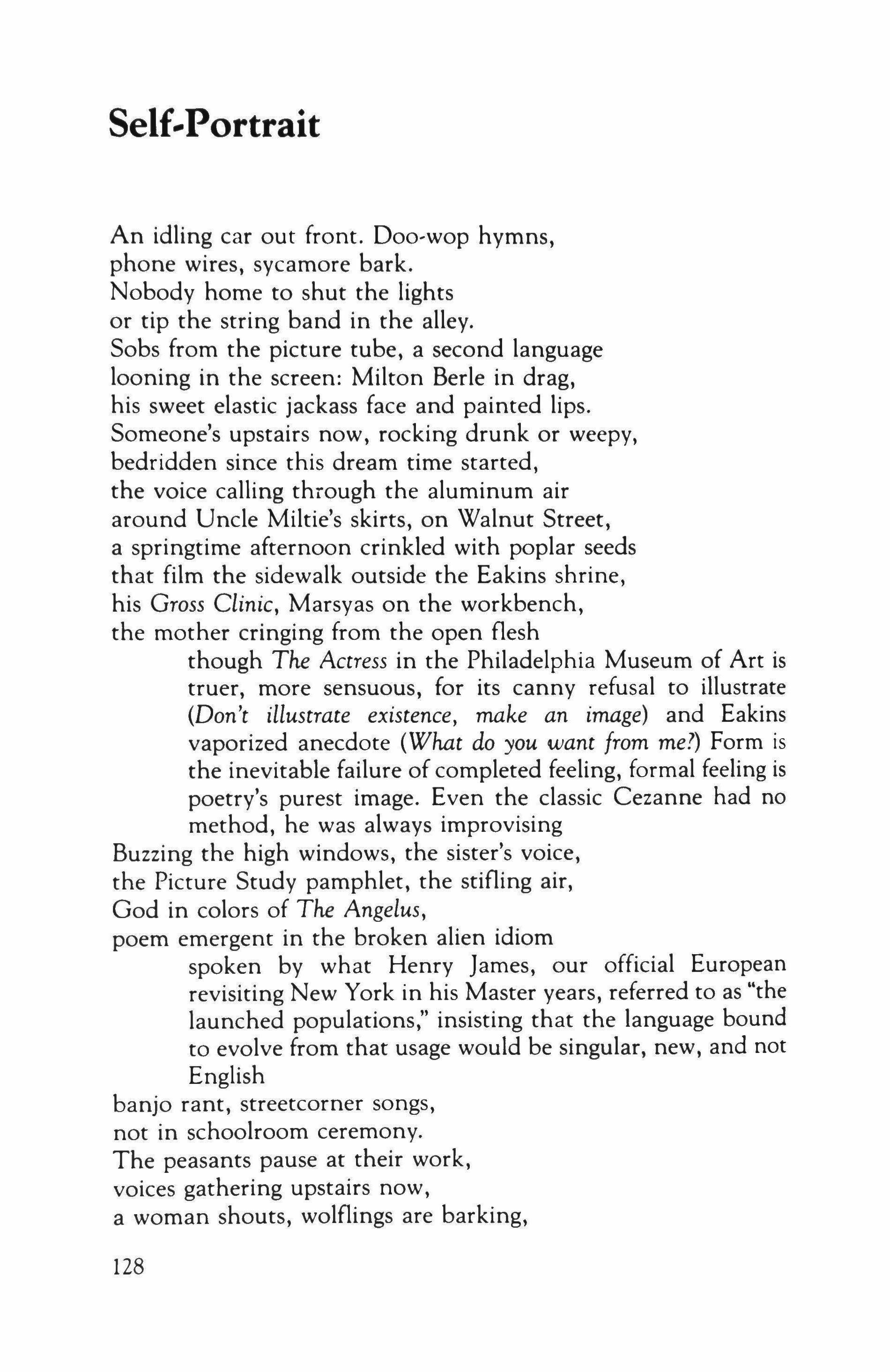
An idling car out front. Doo-wop hymns, phone wires, sycamore bark. Nobody home to shut the lights or tip the string band in the alley. Sobs from the picture tube, a second language looning in the screen: Milton Berle in drag, his sweet elastic jackass face and painted lips. Someone's upstairs now, rocking drunk or weepy, bedridden since this dream time started, the voice calling through the aluminum air around Uncle Miltie's skirts, on Walnut Street, a springtime afternoon crinkled with poplar seeds that film the sidewalk outside the Eakins shrine, his Gross Clinic, Marsyas on the workbench, the mother cringing from the open flesh though The Actress in the Philadelphia Museum of Art is truer, more sensuous, for its canny refusal to illustrate (Don't illustrate existence, make an image) and Eakins vaporized anecdote (What do you want from me?) Form is the inevitable failure of completed feeling, formal feeling is poetry's purest image. Even the classic Cezanne had no method, he was always improvising Buzzing the high windows, the sister's voice, the Picture Study pamphlet, the stifling air, God in colors of The Angelus, poem emergent in the broken alien idiom spoken by what Henry James, our official European revisiting New York in his Master years, referred to as "the launched populations," insisting that the language bound to evolve from that usage would be singular, new, and not English banjo rant, streetcorner songs, not in schoolroom ceremony. The peasants pause at their work, voices gathering upstairs now, a woman shouts, wolflings are barking,
128

words suffering to fall clear may never fall clear in words. But everyone's up there, out there in an image, hanging wash in steerage, on their way to this.
129
Reading Ovid

"Contrition, rhyme, eyelashes, leaders beggaring imagination
Foul-water delirium. Caesar a junkyard dog turned on his scrapmetal master, singing master. A Black Sea resort, bad food, mosquitoes, no wine, cornpone democracy that makes beggars citizens. Love baits, teases, poontang scripts, favors he taught girls to beg from potbellied industrialists, nothing helps now.
Canny technologue Daedalus warned his febrile son to stay a middle course, not burn up or belly down.
Daedalus was right. Making words of sweats and hungers, we fall in breakneck love with imagination's wants.
That's no right world. A poem, manic citizen, sheers past federal power harmlessly or catches like nettles in Caesar's smelly pillow. Who blames us for wanting so much forgiveness?
His pasty sun sets on bramble farms and clay fields. Washed up, he needs new subjects, or change of heart. He has materials, the frequent night raids, the poison arrows he's learning to shoot, a wife back home, animal pictures tortured on her loom. And Augustus, cold-war strategist, peeping at every bedroom window but his own.
The boonies mock a city's fine scales of grit, girls, sidewalk saxophonists, graffiti, cops, hot food and sugar
You can't say a senator, or his wife, screws dogs and expect people to appreciate your style. Well�bred ironies can make you famous and employed. Politicians, barbarians-they want whatever works.
A poem a day, stale myths, elegiac whining, whatever cuts contrition's vinegar taste.
His new friends could care less about his careful rhymes and will never understand his Latin. Shipped back home, these new poems get him nowhere with administrators, whose civic virtue cauterizes stage-makeup wounds.
He's picking up the local language, its phlegmy gruntsits nearest subject is its own gray wilderness.
130
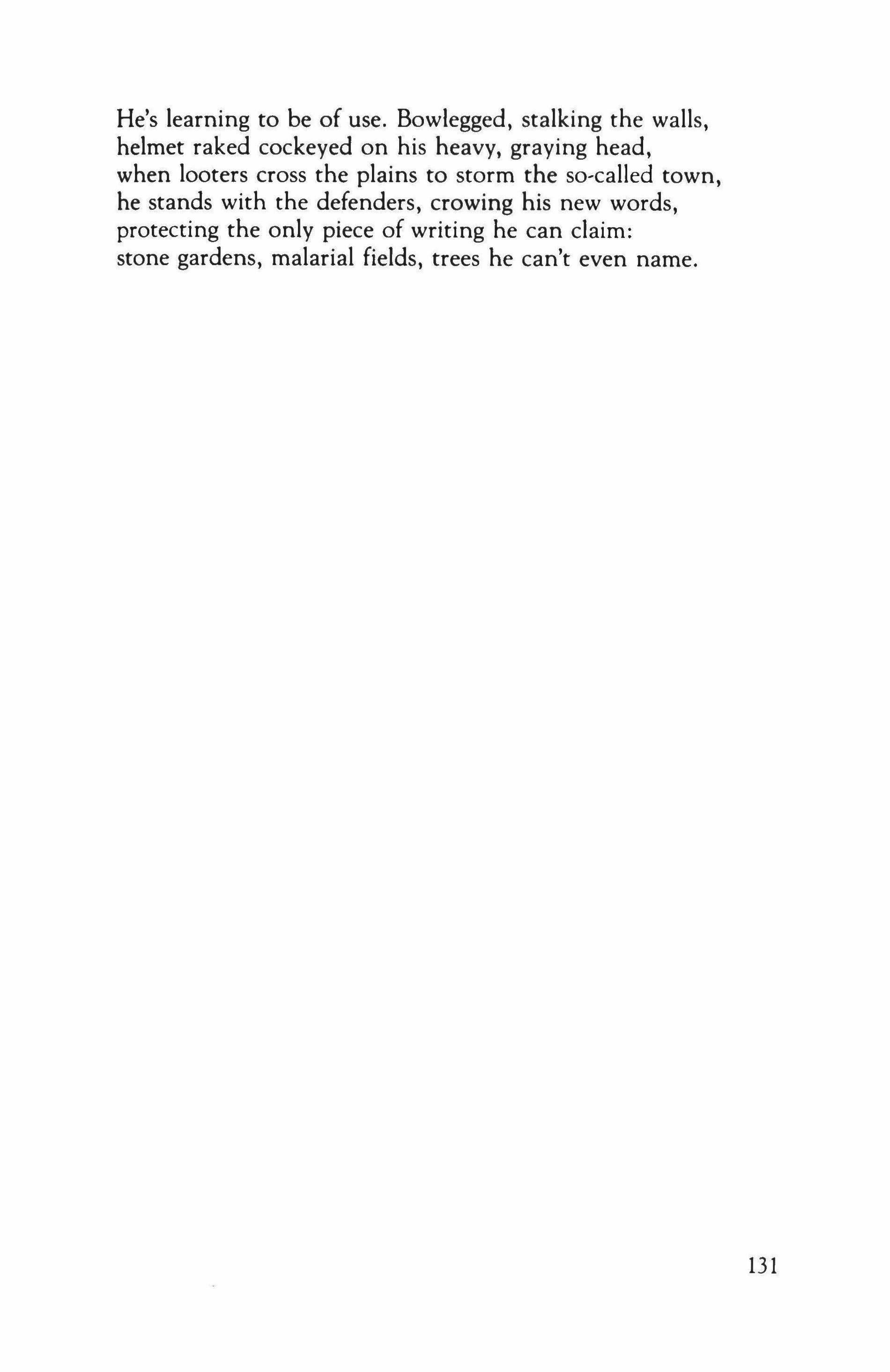
He's learning to be of use. Bowlegged, stalking the walls, helmet raked cockeyed on his heavy, graying head, when looters cross the plains to storm the so-called town, he stands with the defenders, crowing his new words, protecting the only piece of writing he can claim: stone gardens, malarial fields, trees he can't even name.
131

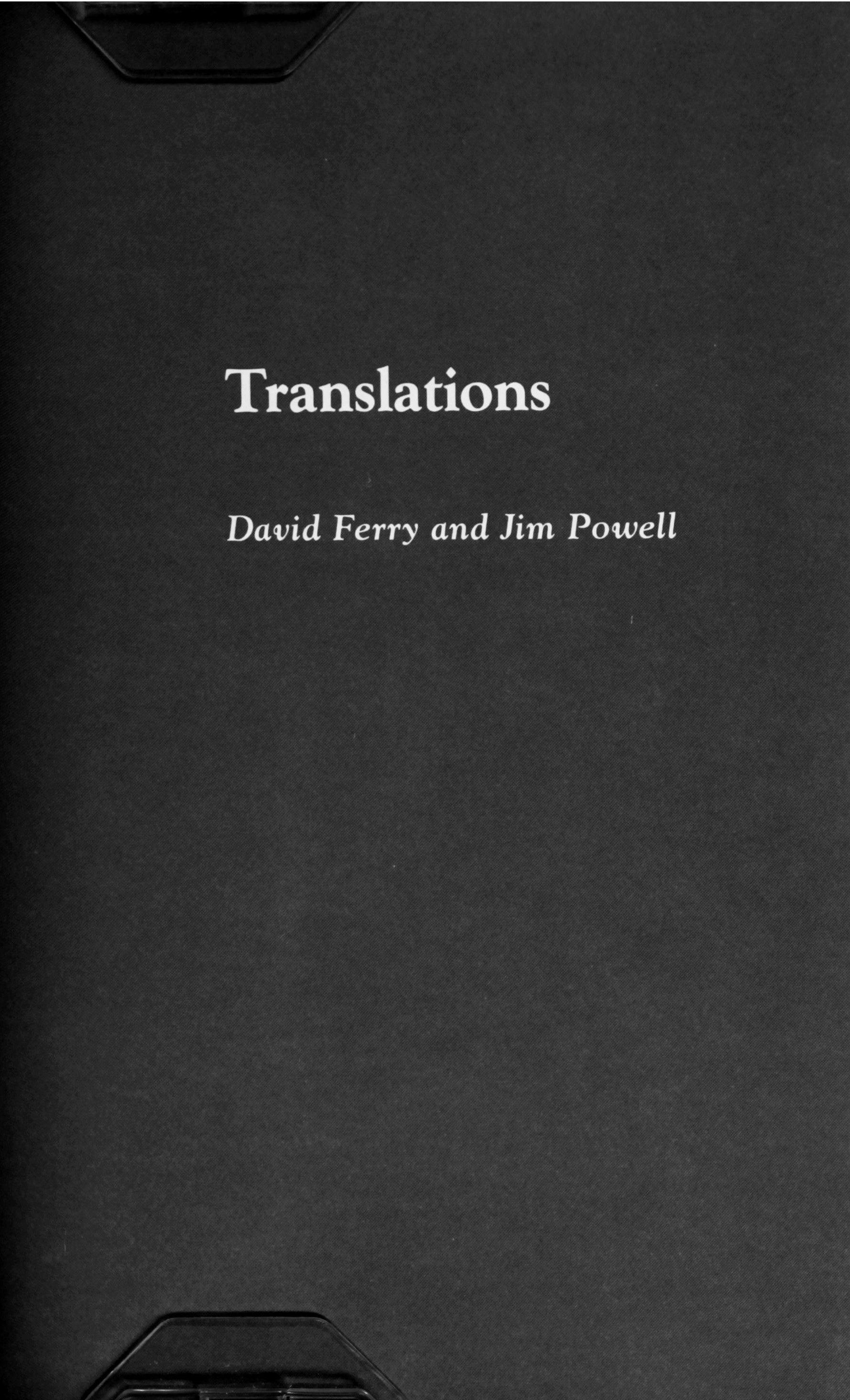

From the Epic of Gilgamesh
Version by David Ferry
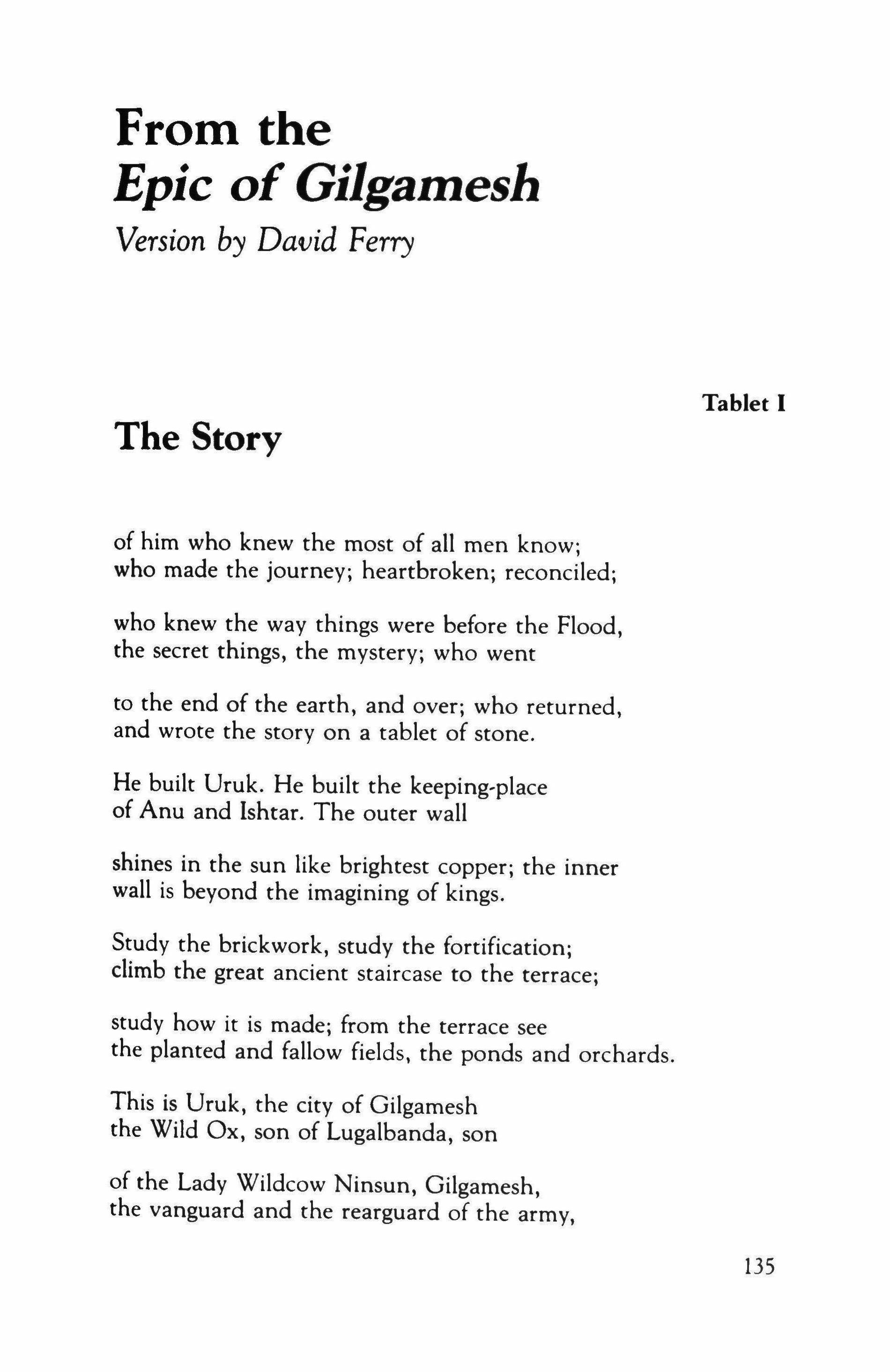
The Story
of him who knew the most of all men know; who made the journey; heartbroken; reconciled;
who knew the way things were before the Flood, the secret things, the mystery; who went to the end of the earth, and over; who returned, and wrote the story on a tablet of stone.
He built Uruk. He built the keeping-place of Anu and Ishtar. The outer wall
shines in the sun like brightest copper; the inner wall is beyond the imagining of kings.
Study the brickwork, study the fortification; climb the great ancient staircase to the terrace;
study how it is made; from the terrace see the planted and fallow fields, the ponds and orchards.
This is Uruk, the city of Gilgamesh the Wild Ox, son of Lugalbanda, son of the Lady Wildcow Ninsun, Gilgamesh, the vanguard and the rearguard of the army,
135
Tablet I
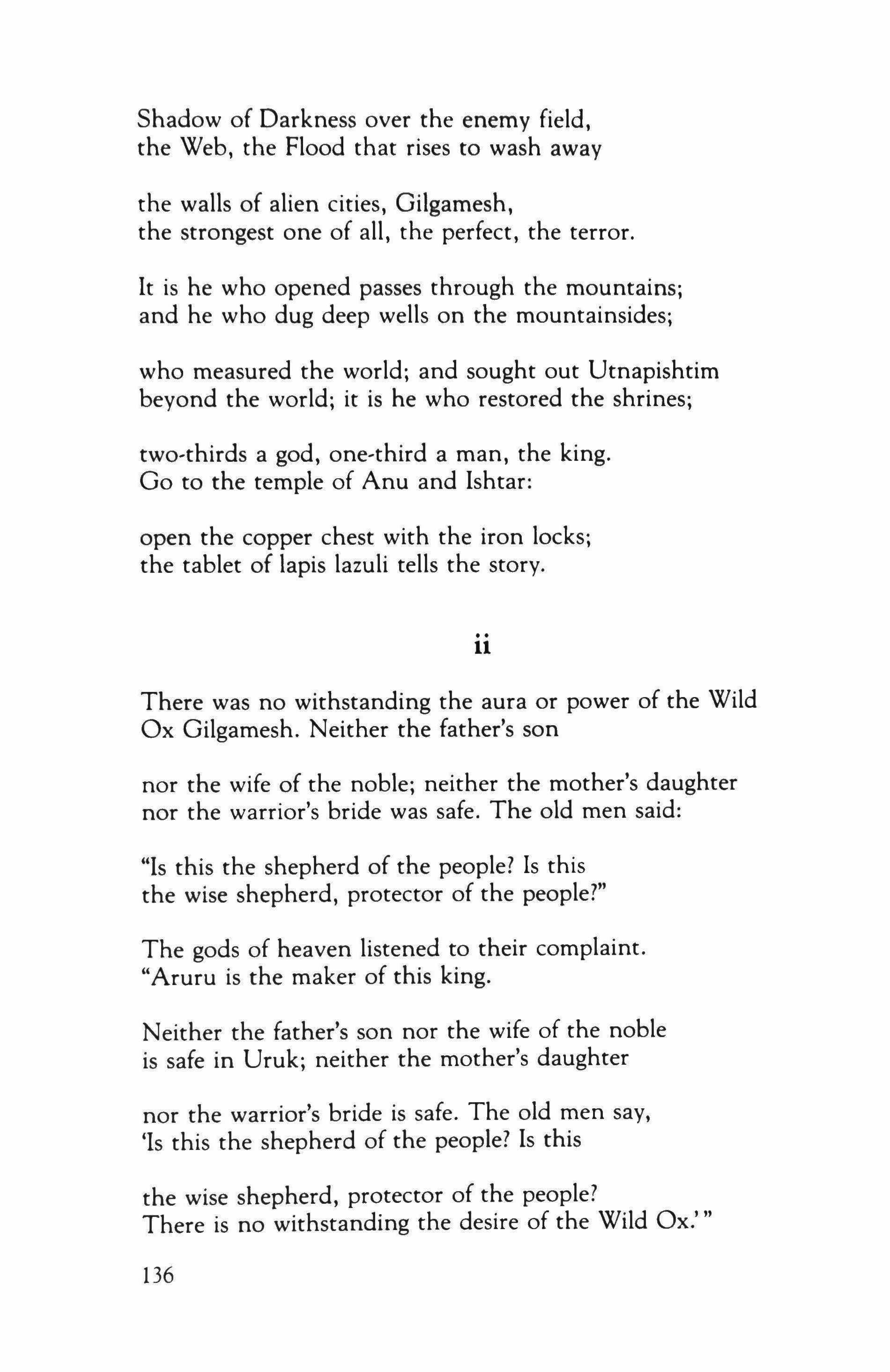
Shadow of Darkness over the enemy field, the Web, the Flood that rises to wash away
the walls of alien cities, Gilgarnesh, the strongest one of all, the perfect, the terror.
It is he who opened passes through the mountains; and he who dug deep wells on the mountainsides;
who measured the world; and sought out Utnapishtim beyond the world; it is he who restored the shrines;
two-thirds a god, one-third a man, the king. Go to the temple of Anu and Ishtar:
open the copper chest with the iron locks; the tablet of lapis lazuli tells the story. ii
There was no withstanding the aura or power of the Wild Ox Gilgamesh. Neither the father's son
nor the wife of the noble; neither the mother's daughter nor the warrior's bride was safe. The old men said:
"Is this the shepherd of the people? Is this the wise shepherd, protector of the people?"
The gods of heaven listened to their complaint. "Aruru is the maker of this king.
Neither the father's son nor the wife of the noble is safe in Uruk; neither the mother's daughter
nor the warrior's bride is safe. The old men say, 'Is this the shepherd of the people? Is this
the wise shepherd, protector of the people? There is no withstanding the desire of the Wild Ox.'''
136
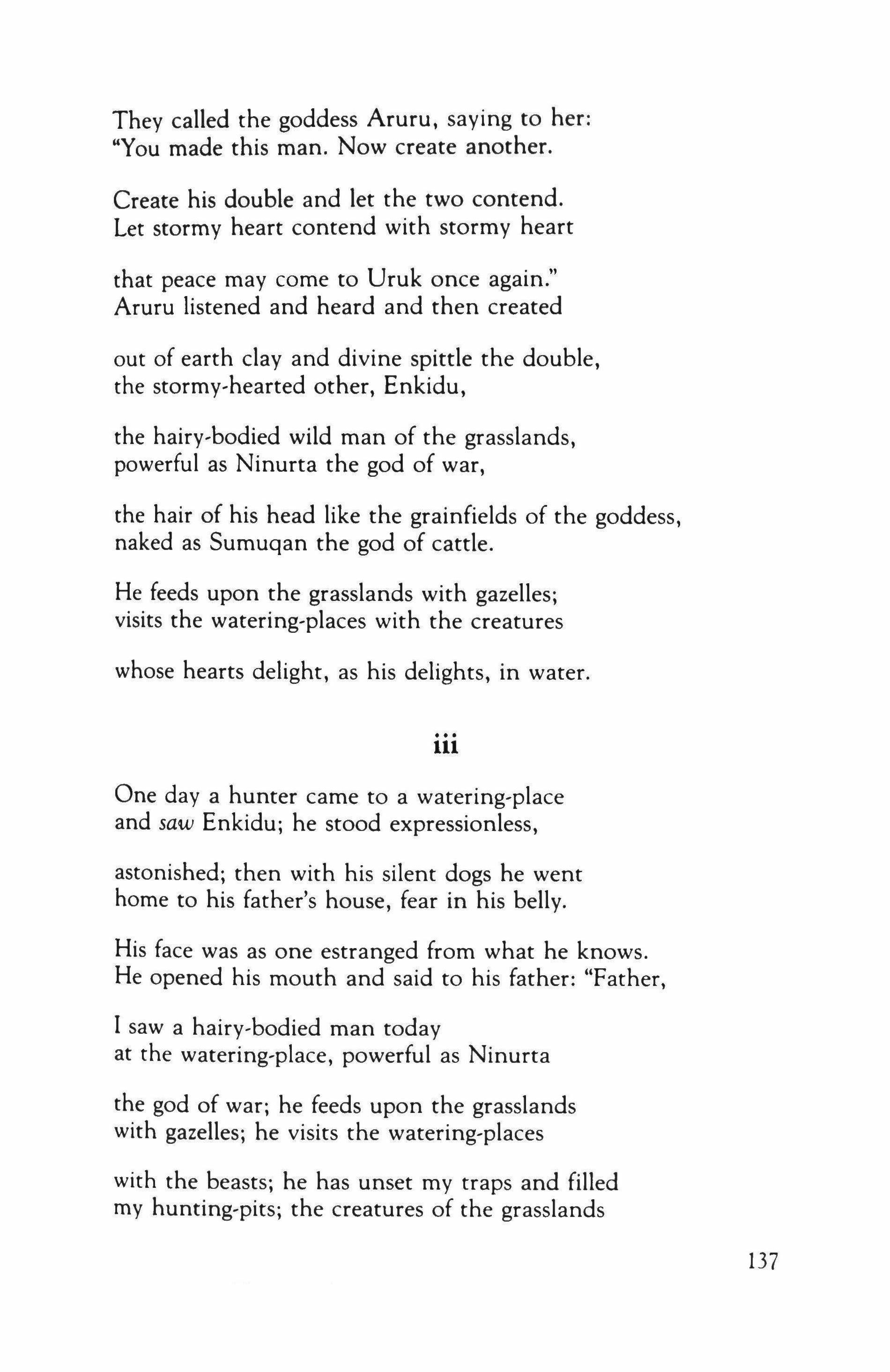
They called the goddess Aruru, saying to her: "You made this man. Now create another.
Create his double and let the two contend. Let stormy heart contend with stormy heart that peace may come to Uruk once again." Aruru listened and heard and then created out of earth clay and divine spittle the double, the stormy-hearted other, Enkidu, the hairy-bodied wild man of the grasslands, powerful as Ninurta the god of war, the hair of his head like the grainfields of the goddess, naked as Sumuqan the god of cattle.
He feeds upon the grasslands with gazelles; visits the watering-places with the creatures whose hearts delight, as his delights, in water.
iii
One day a hunter came to a watering-place and saw Enkidu, he stood expressionless, astonished; then with his silent dogs he went home to his father's house, fear in his belly.
His face was as one estranged from what he knows. He opened his mouth and said to his father: "Father, I saw a hairy-bodied man today at the watering-place, powerful as Ninurta the god of war: he feeds upon the grasslands with gazelles; he visits the watering-places with the beasts: he has unset my traps and filled my hunting-pits; the creatures of the grasslands
137

get away free. The wild man sets them free. Because of him I am no longer a hunter."
His father said: "00 to Uruk and there present yourself to Oilgamesh the king,
who is the strongest of all, the perfect, the terror, the wise shepherd, protector of the people.
Tell him about the power of the wild man. Ask him to send a harlot back with you, a temple-prostitute, to conquer him with her greater power. When he visits the watering-place, let her show him her breasts, her beauty, for his wonder. He will lie with her in pleasure, and then the creatures, the gazelles with whom he feeds upon the grasslands, and the others with whom he visits the watering-places, will flee from him who ranged the hills with them." So the hunter went to Oilgamesh in Uruk and told him about the power of the wild man, and how he had unset the traps and filled the pits, so that the creatures got away free. The lord of Uruk said to the hunter then:
"When you return, a temple-prostitute will go with you and with her beauty conquer the wild man. He will lie with her and then the gazelles with whom he feeds upon the grasslands, and the others with whom he visits the watering-places, will flee from him who ranged the hills with them."
138

The harlot and the hunter traveled together, taking three days, back to the watering-place.
For three more days they waited, and finally Enkidu came with the creatures that love the water, the gazelles and the others, so as to drink their fill. The temple-prostitute looked at him, Enkidu, the hairy-bodied wild man of the grasslands, the hair of his head like the grainfields of the goddess, naked as Sumuqan the god of cattle. "That is Enkidu, Sharnhat, show him your breasts, show him your beauty. Spread out your cloak on the ground. Lie down on it. The wild man will look at you.
Show him your body. The hairy-bodied man will come to you and lie down on you; and then show him the things a woman knows how to do. The gazelles and with them all the other creatures will flee from him who ranged the hills with them." And so the harlot, Shamhat, showed him her breasts, showed him her body. The hairy-bodied man came over to her, and lay down on her, and then she showed him the things a woman knows how to do. For seven days Enkidu in his wonder lay with her in pleasure, and then at last went to seek out the company of the creatures whose hearts delight in feeding upon the grasslands, and visiting the watering-places, and ranging the hills. But seeing him, they fled. The creatures were gone, and everything was changed.
IV
139
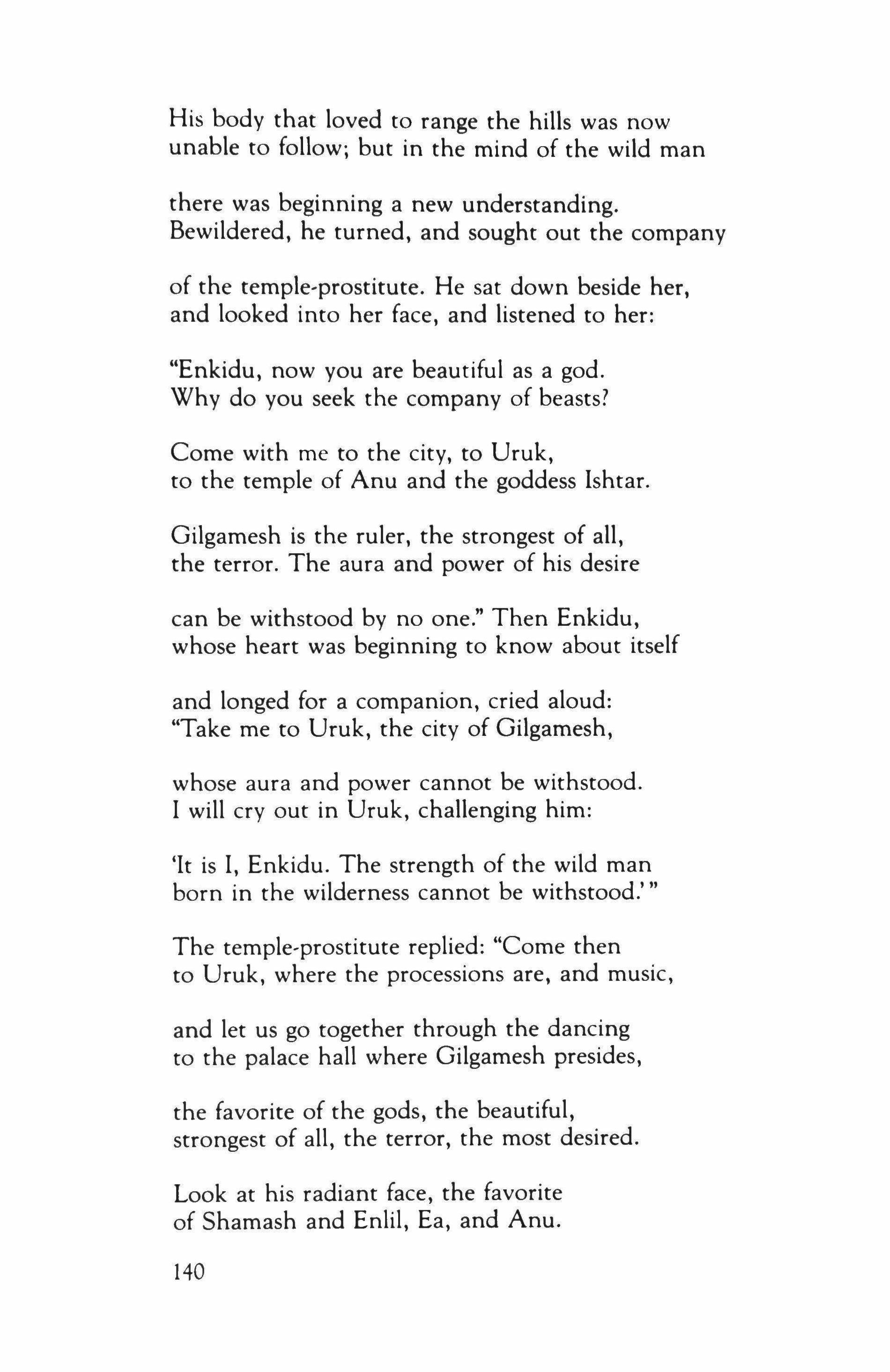
His body that loved to range the hills was now unable to follow; but in the mind of the wild man
there was beginning a new understanding. Bewildered, he turned, and sought out the company
of the temple-prostitute. He sat down beside her, and looked into her face, and listened to her:
"Enkidu, now you are beautiful as a god. Why do you seek the company of beasts?
Come with me to the city, to Uruk, to the temple of Anu and the goddess Ishtar.
Gilgamesh is the ruler, the strongest of all, the terror. The aura and power of his desire can be withstood by no one." Then Enkidu, whose heart was beginning to know about itself and longed for a companion, cried aloud: "Take me to Uruk, the city of Gilgarnesh, whose aura and power cannot be withstood. I will cry out in Uruk, challenging him:
'It is I, Enkidu. The strength of the wild man born in the wilderness cannot be withstood.' n
The temple-prostitute replied: "Come then to Uruk, where the processions are, and music, and let us go together through the dancing to the palace hall where Gilgamesh presides, the favorite of the gods, the beautiful, strongest of all, the terror, the most desired.
Look at his radiant face, the favorite of Shamash and Enlil, Ea, and Anu.
140
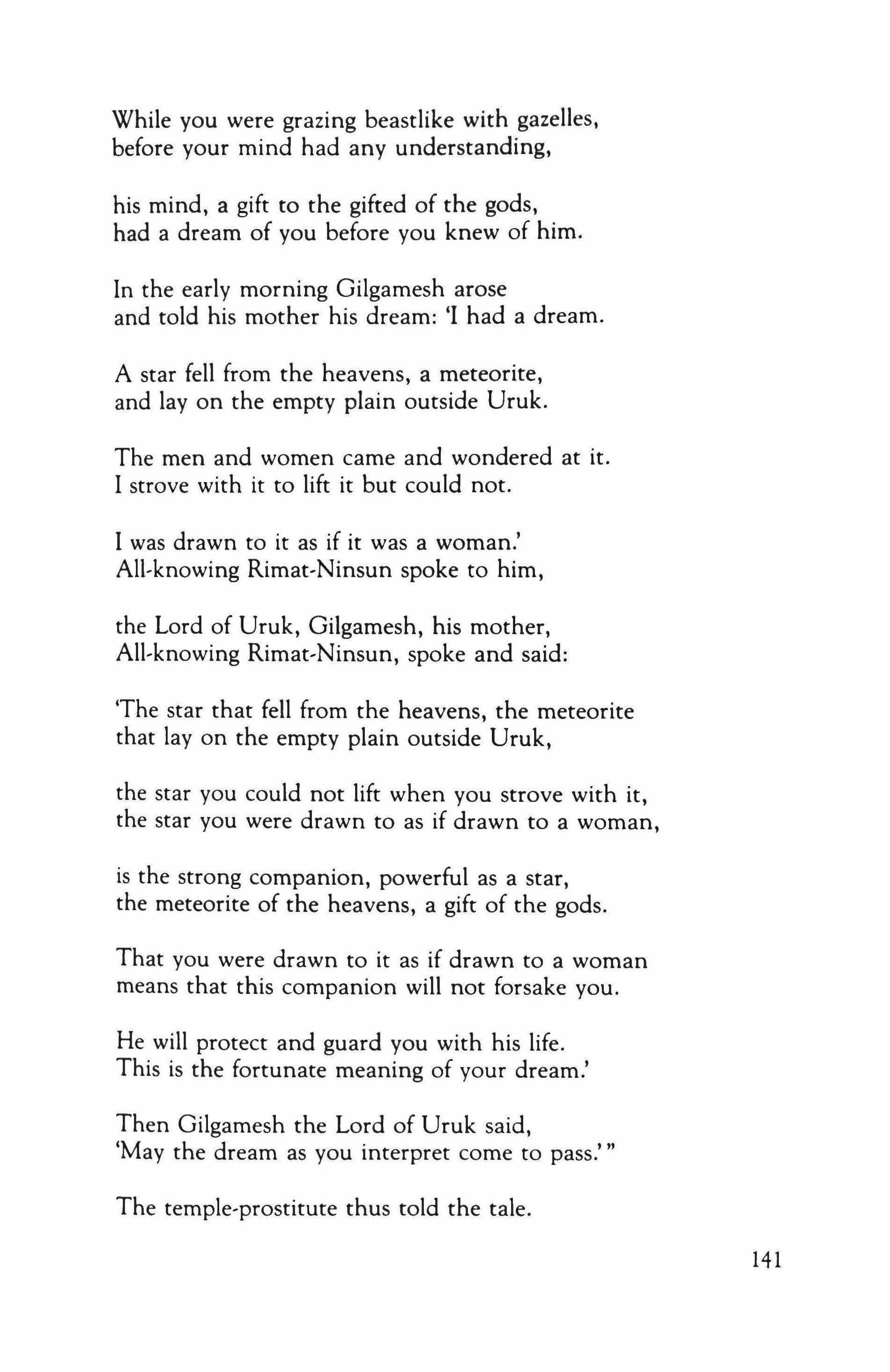
While you were grazing beastlike with gazelles, before your mind had any understanding,
his mind, a gift to the gifted of the gods, had a dream of you before you knew of him.
In the early morning Gilgamesh arose and told his mother his dream: 'I had a dream.
A star fell from the heavens, a meteorite, and lay on the empty plain outside Uruk.
The men and women came and wondered at it. I strove with it to lift it but could not.
I was drawn to it as if it was a woman.'
All-knowing Rirnat-Ninsun spoke to him,
the Lord of Uruk, Gilgamesh, his mother, All-knowing Rimat-Ninsun, spoke and said:
'The star that fell from the heavens, the meteorite that lay on the empty plain outside Uruk, the star you could not lift when you strove with it, the star you were drawn to as if drawn to a woman,
is the strong companion, powerful as a star, the meteorite of the heavens, a gift of the gods.
That you were drawn to it as if drawn to a woman means that this companion will not forsake you.
He will protect and guard you with his life. This is the fortunate meaning of your dream.'
Then Gilgamesh the Lord of Uruk said, 'May the dream as you interpret come to pass.'"
The temple-prostitute thus told the tale.
141
Tablets II and III
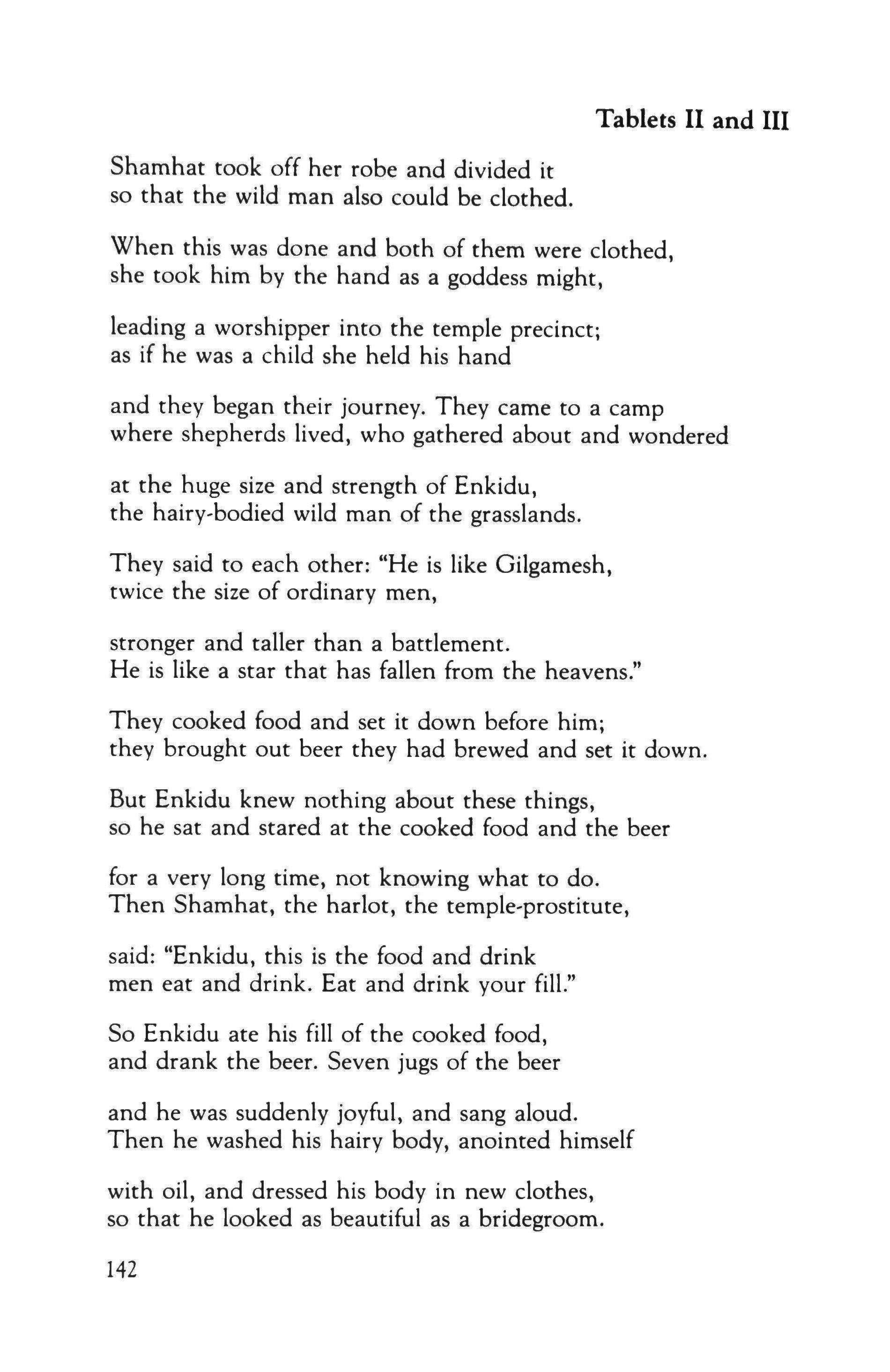
Shamhat took off her robe and divided it so that the wild man also could be clothed.
When this was done and both of them were clothed, she took him by the hand as a goddess might, leading a worshipper into the temple precinct; as if he was a child she held his hand and they began their journey. They came to a camp where shepherds lived, who gathered about and wondered at the huge size and strength of Enkidu, the hairy-bodied wild man of the grasslands.
They said to each other: "He is like Gilgamesh, twice the size of ordinary men, stronger and taller than a battlement. He is like a star that has fallen from the heavens."
They cooked food and set it down before him; they brought out beer they had brewed and set it down.
But Enkidu knew nothing about these things, so he sat and stared at the cooked food and the beer for a very long time, not knowing what to do. Then Shamhat, the harlot, the temple-prostitute, said: "Enkidu, this is the food and drink men eat and drink. Eat and drink your fill."
So Enkidu ate his fill of the cooked food, and drank the beer. Seven jugs of the beer and he was suddenly joyful, and sang aloud. Then he washed his hairy body, anointed himself with oil, and dressed his body in new clothes, so that he looked as beautiful as a bridegroom.
142
He took up a weapon to guard the flocks and shepherds against the wolves and lions that preyed upon them.
Therefore, at night, with Enkidu to guard them, the shepherds could lie down in peaceful sleep.
11
One day a stranger came into the camp bearing a richly decorated platter, and Enkidu asked Shamhat to question him. "Where are you going! Where are you hurrying to!"
The young man opened his mouth and said to them: "I am going to the wedding-feast in Uruk, bearing delicious offerings on the platter, ceremonial offerings for the feast.
Before the husband, Gilgamesh will lie in pleasure with the bride in the marital chamber.
There is no withstanding the aura or power of the desire of the Wild Ox Gilgamesh, the strongest of all."
Then Enkidu was full of anger and said: "Take me to Uruk, the city of Gilgamesh, whose aura and power cannot be withstood. I will cry out in Uruk, challenging him:
'It is I, Enkidu. The strength of the wild man born in the wilderness cannot be withstood.'"
So they set out for the wedding-feast in Uruk.
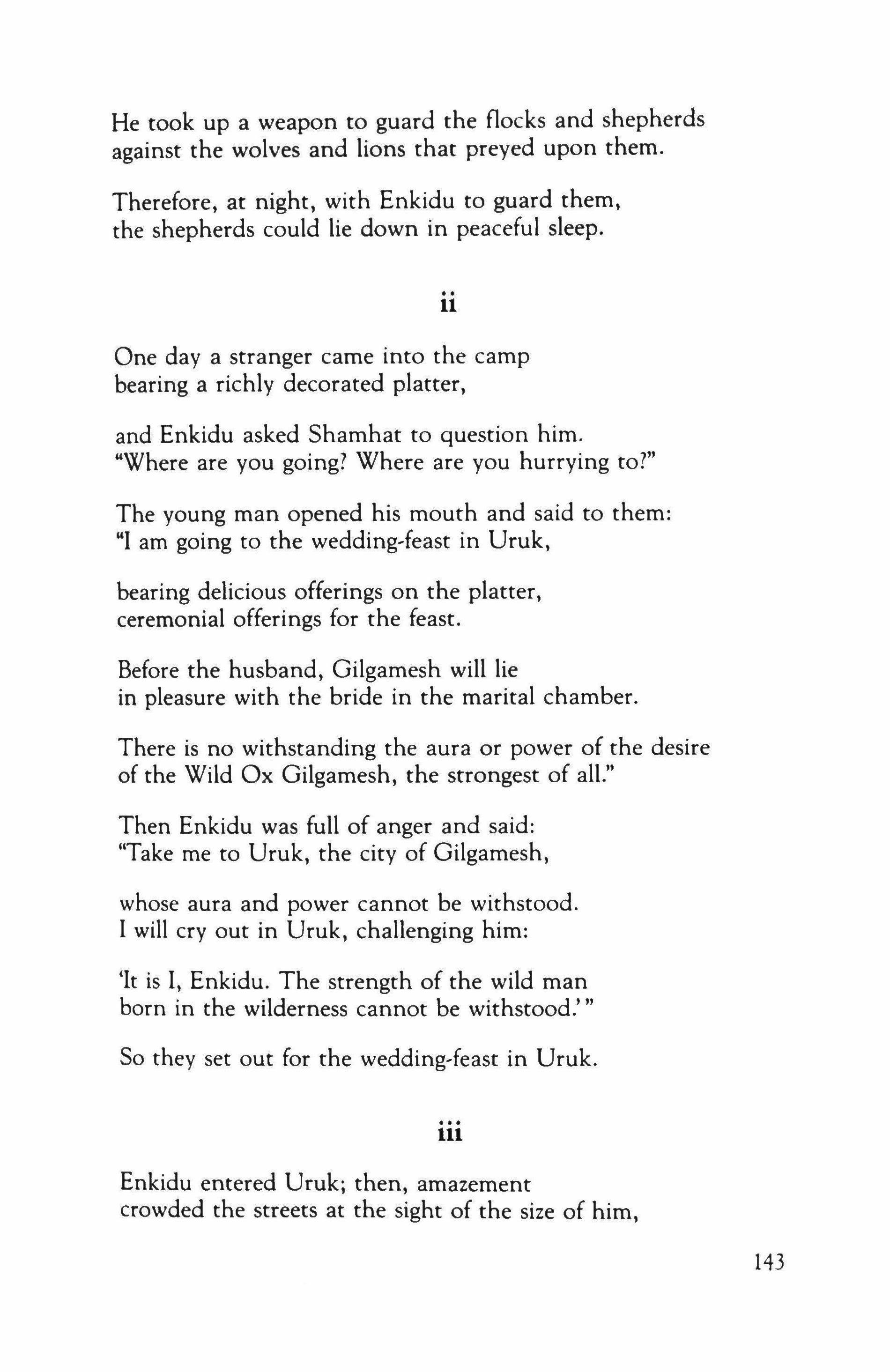
Enkidu entered Uruk; then, amazement crowded the streets at the sight of the size of him,
iii
143
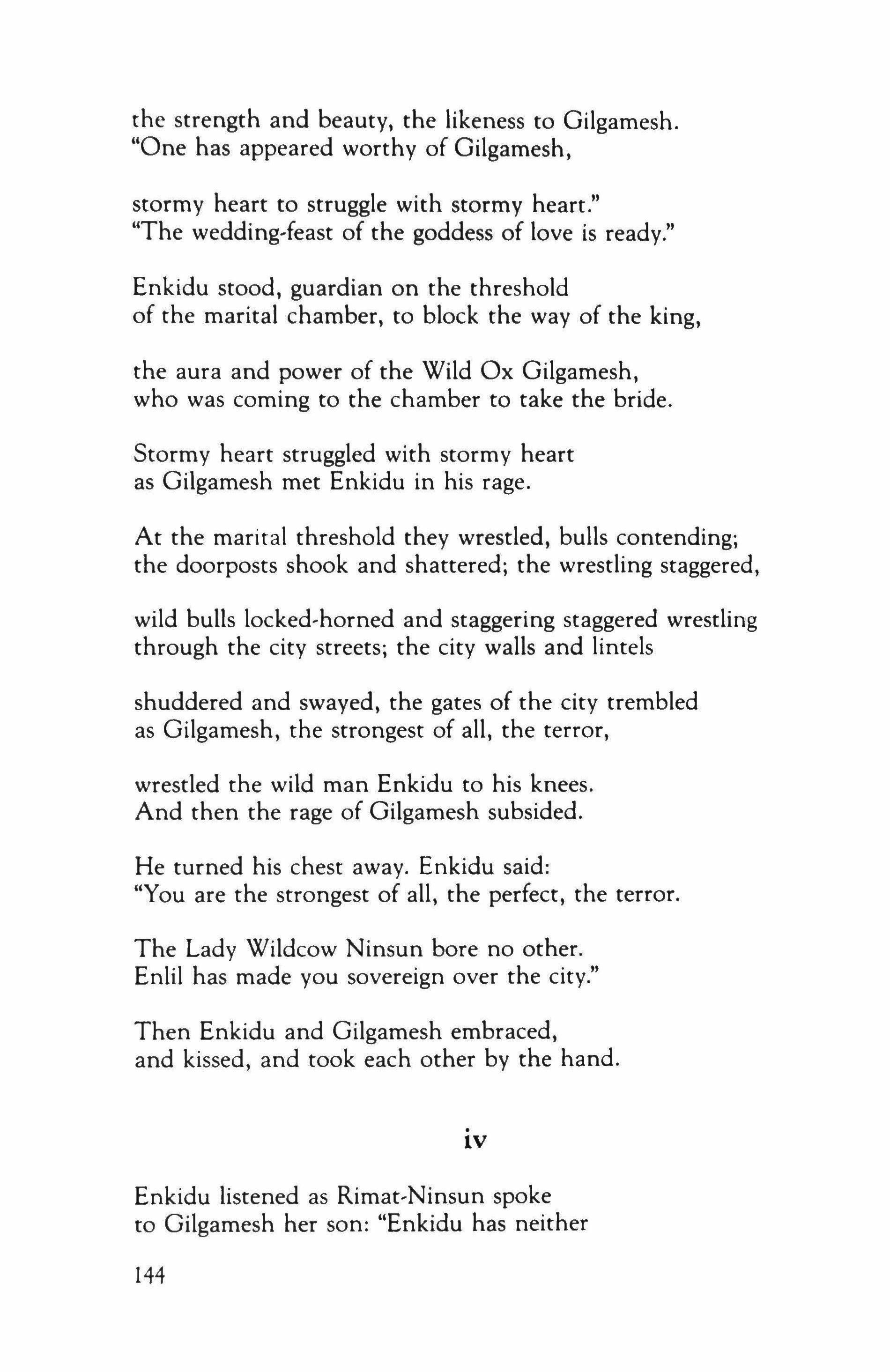
the strength and beauty, the likeness to Gilgamesh. "One has appeared worthy of Gilgamesh,
stormy heart to struggle with stormy heart." "The wedding-feast of the goddess of love is ready."
Enkidu stood, guardian on the threshold of the marital chamber, to block the way of the king,
the aura and power of the Wild Ox Gilgamesh, who was coming to the chamber to take the bride.
Stormy heart struggled with stormy heart as Gilgamesh met Enkidu in his rage.
At the marital threshold they wrestled, bulls contending; the doorposts shook and shattered; the wrestling staggered, wild bulls locked-horned and staggering staggered wrestling through the city streets; the city walls and lintels
shuddered and swayed, the gates of the city trembled as Gilgamesh, the strongest of all, the terror,
wrestled the wild man Enkidu to his knees. And then the rage of Gilgamesh subsided.
He turned his chest away. Enkidu said: "You are the strongest of all, the perfect, the terror.
The Lady Wildcow Ninsun bore no other. Enlil has made you sovereign over the city."
Then Enkidu and Gilgamesh embraced, and kissed, and took each other by the hand. lV
Enkidu listened as Rimat-Ninsun spoke to Gilgamesh her son: "Enkidu has neither
144
father nor mother; there is no one to cut the wild man's hair. He was born on the grasslands and grazed with gazelles and the other beasts on the grass of the grasslands; Enkidu, the companion, will not forsake you."
Enkidu listened, and wept, and felt his weakness. Then Enkidu and Gilgamesh embraced, and kissed, and took each other by the hand.
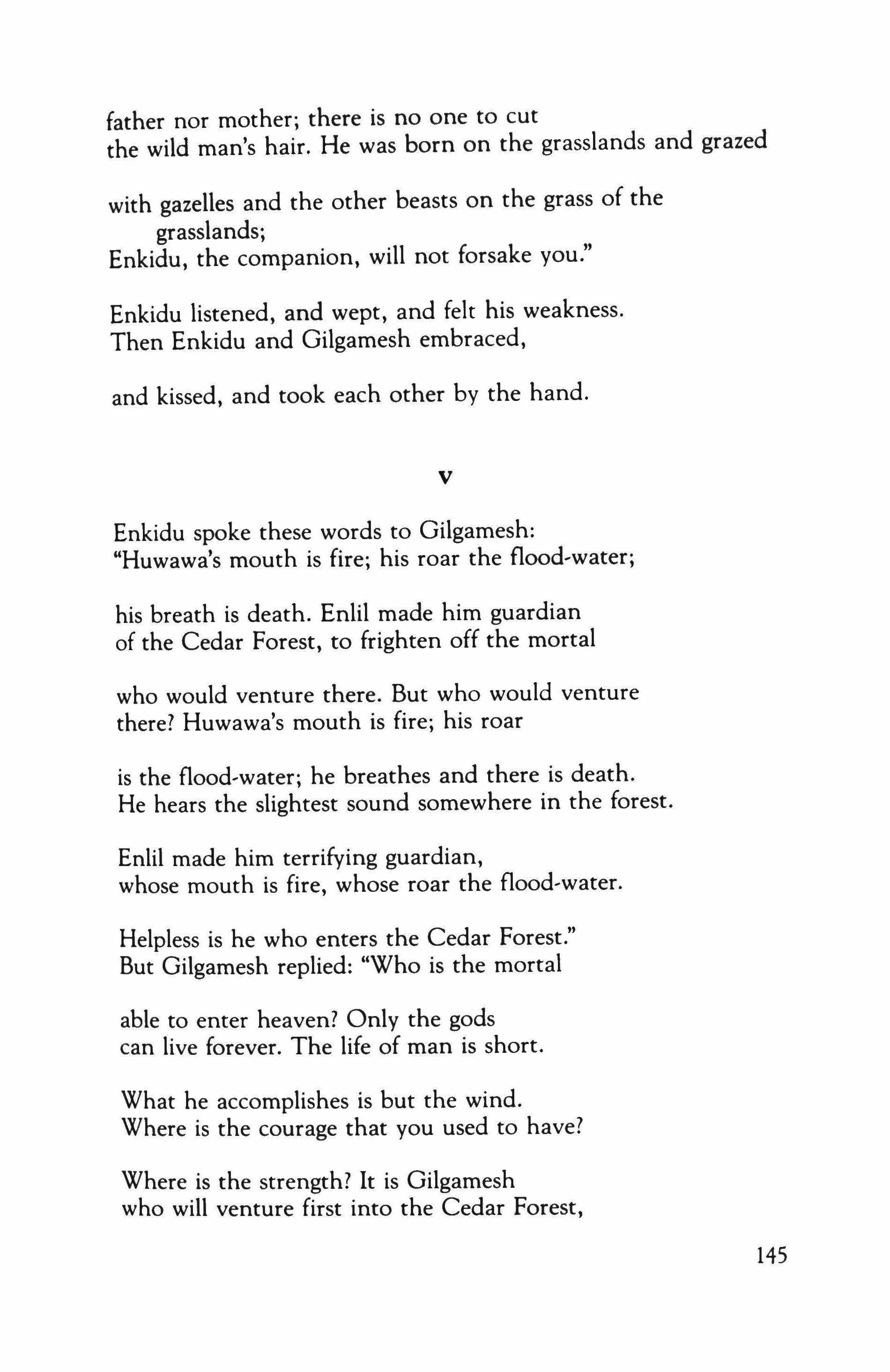
Enkidu spoke these words to Gilgamesh: "Huwawa's mouth is fire; his roar the flood-water; his breath is death. Enlil made him guardian of the Cedar Forest, to frighten off the mortal
who would venture there. But who would venture there? Huwawa's mouth is fire; his roar
is the flood-water; he breathes and there is death. He hears the slightest sound somewhere in the forest.
Enlil made him terrifying guardian, whose mouth is fire, whose roar the flood-water.
Helpless is he who enters the Cedar Forest." But Gilgamesh replied: "Who is the mortal able to enter heaven? Only the gods can live forever. The life of man is short.
What he accomplishes is but the wind. Where is the courage that you used to have?
Where is the strength? It is Gilgamesh who will venture first into the Cedar Forest,
v
145
and you can follow after, crying out, 'Go on, go forward, go on, embrace the danger!'
You who have fought with lions and with wolves, you know what danger is. Where is your courage?
If I should fall, my fame will be secure. 'It was Gilgamesh who fought against Huwawa!'
It is Gilgamesh who will venture into the Forest and cut the Cedar down and win the glory.
My fame will be secure to all my sons."
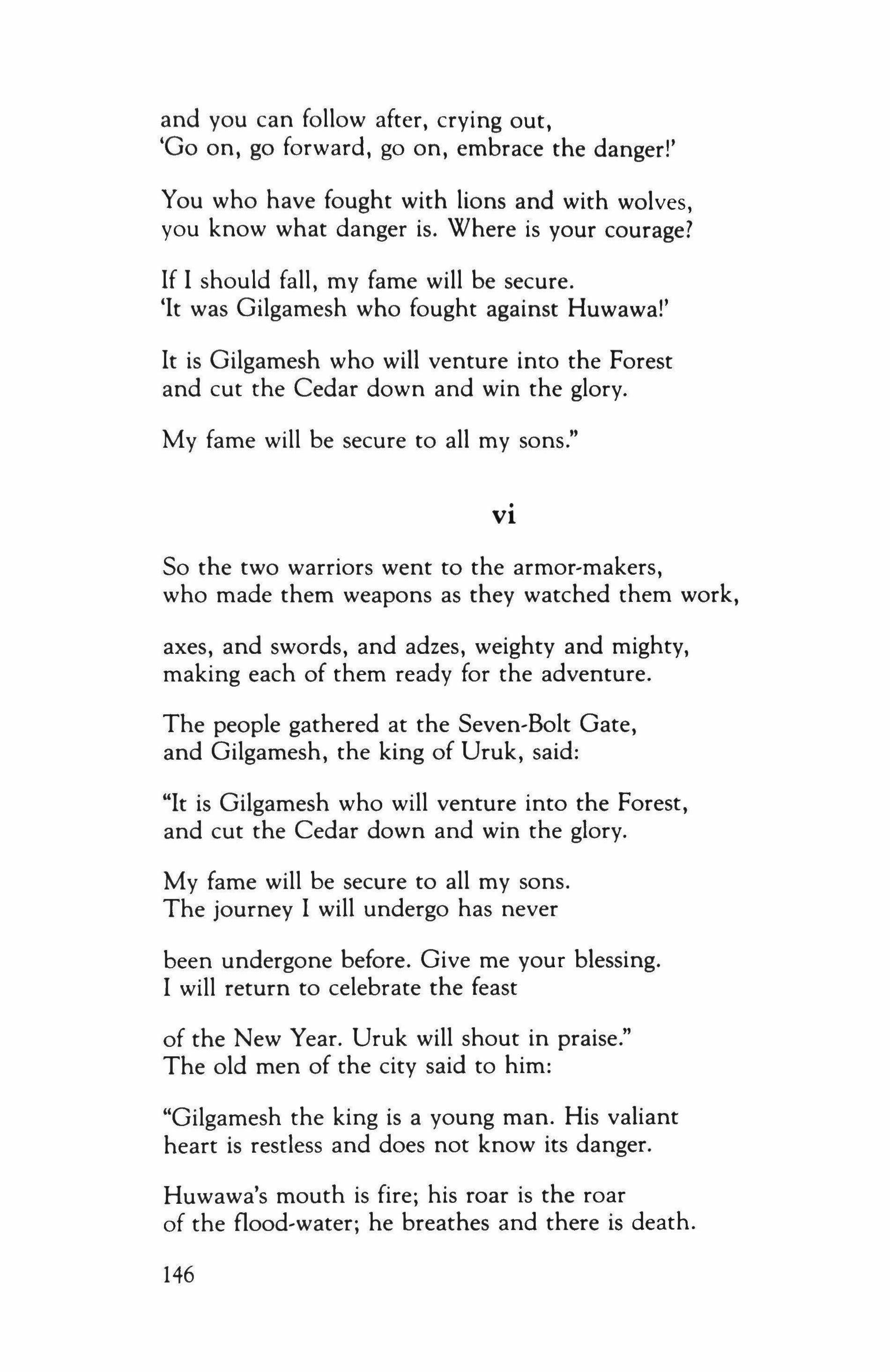
So the two warriors went to the armor-makers, who made them weapons as they watched them work, axes, and swords, and adzes, weighty and mighty, making each of them ready for the adventure.
The people gathered at the Seven-Bolt Gate, and Gilgamesh, the king of Uruk, said:
"It is Gilgamesh who will venture into the Forest, and cut the Cedar down and win the glory.
My fame will be secure to all my sons. The journey I will undergo has never been undergone before. Give me your blessing. I will return to celebrate the feast of the New Year. Uruk will shout in praise." The old men of the city said to him:
"Gilgamesh the king is a young man. His valiant heart is restless and does not know its danger.
Huwawa's mouth is fire; his roar is the roar of the flood-water: he breathes and there is death.
vi
146

Helpless is he who enters the Cedar Forest." Gilgarnesh, the king of Uruk, said:
"It is Gilgamesh who will venture into the Forest." The old men said: "Though you are strongest of all,
do not put all your trust in your own strength. Let Enkidu, who knows the way to the Forest, who knows the wilderness, let him go first. Enkidu the companion will not forsake you.
Let him go first to find the way through the passes. Let him whose heart delights in water find the hidden wilderness places where the pure cold secret of the earth may be disclosed
to quench your thirst. Offer to Shamash water. May the god Shamash grant you your desire.
Be mindful of your father, Lugalbanda. Be mindful of his memory. May he protect you."
Then Enkidu spoke and said to Gilgamesh: "It is your restless heart's desire to venture
into the Cedar Forest. Enkidu the companion will not forsake you. Let Enkidu who knows the wilderness, and knows the way to the Cedar Forest, let Enkidu go first
to find the way through the passes and find the water to quench your thirst and offer to the god."
Vll
Then Gilgamesh and Enkidu together went to the palace, Egalmah, to Ninsun
147
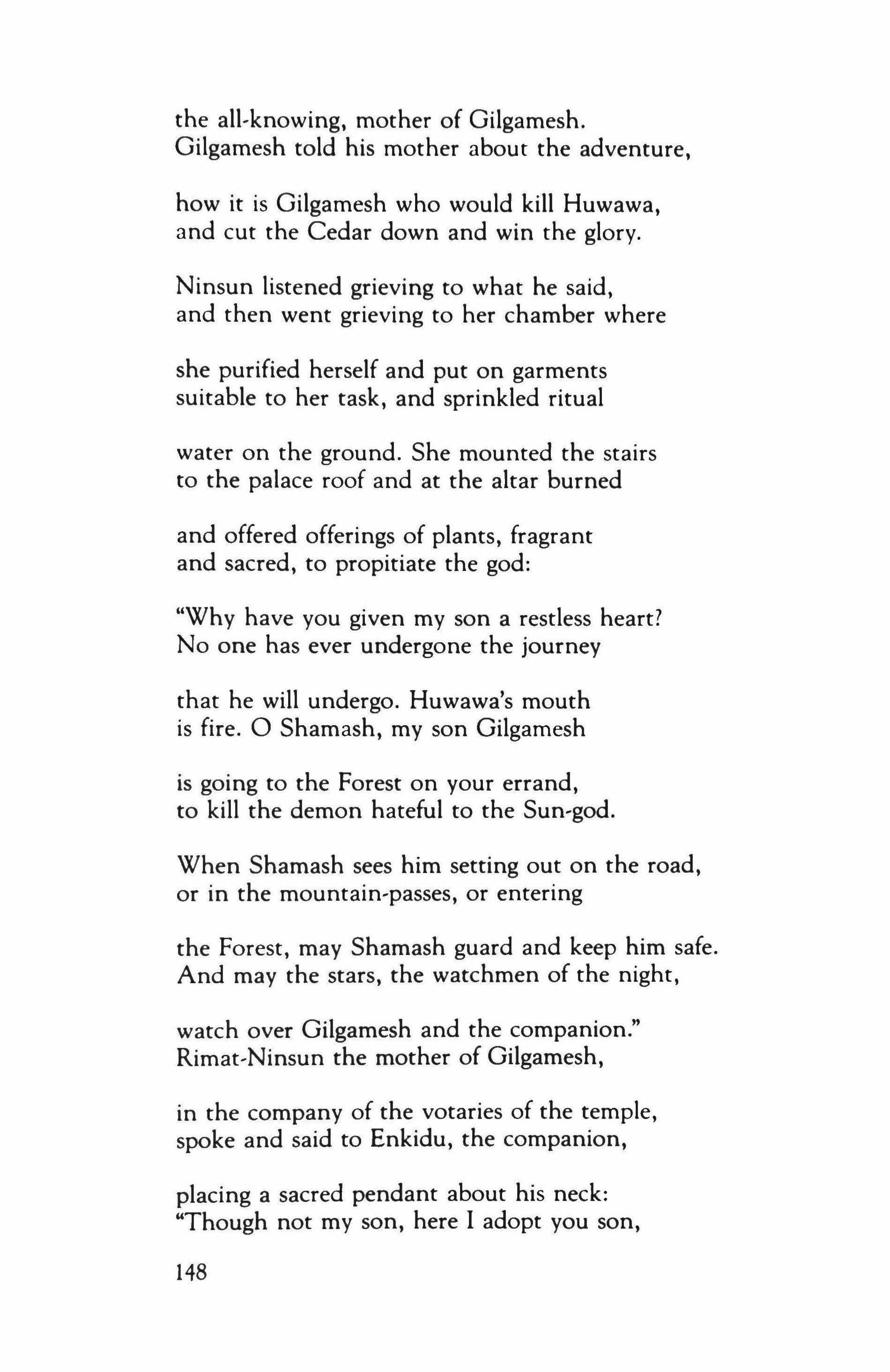
the all-knowing, mother of Gilgamesh. Gilgamesh told his mother about the adventure,
how it is Gilgamesh who would kill Huwawa, and cut the Cedar down and win the glory.
Ninsun listened grieving to what he said, and then went grieving to her chamber where she purified herself and put on garments suitable to her task, and sprinkled ritual water on the ground. She mounted the stairs to the palace roof and at the altar burned and offered offerings of plants, fragrant and sacred, to propitiate the god:
"Why have you given my son a restless heart? No one has ever undergone the journey that he will undergo. Huwawa's mouth is fire. 0 Shamash, my son Gilgamesh is going to the Forest on your errand, to kill the demon hateful to the Sun-god,
When Shamash sees him setting out on the road, or in the mountain-passes, or entering the Forest, may Shamash guard and keep him safe. And may the stars, the watchmen of the night, watch over Gilgamesh and the companion." Rimat-Ninsun the mother of Gilgamesh, in the company of the votaries of the temple, spoke and said to Enkidu, the companion,
placing a sacred pendant about his neck: "Though not my son, here I adopt you son, 148
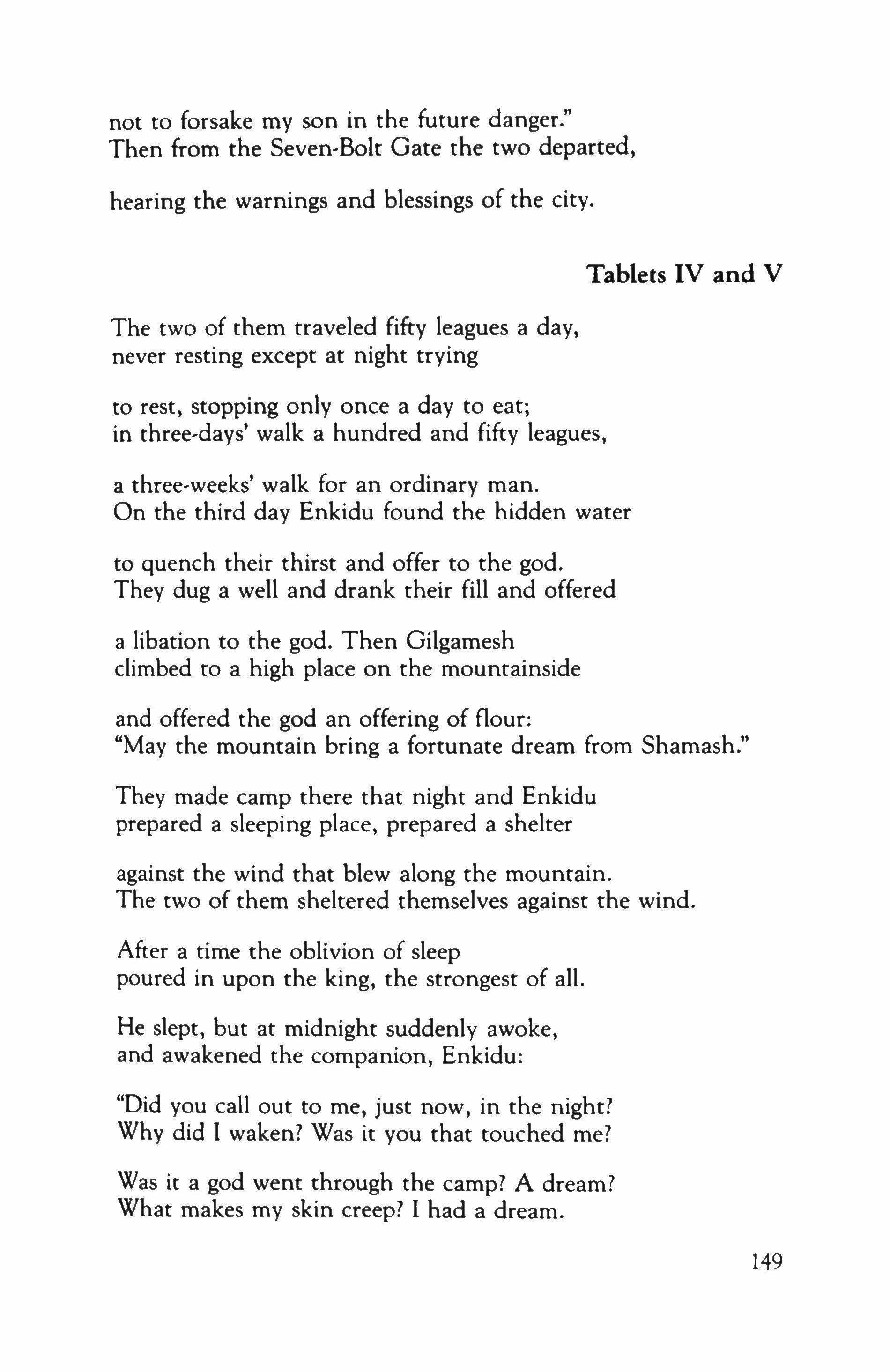
not to forsake my son in the future danger." Then from the Seven,Bolt Gate the two departed, hearing the warnings and blessings of the city.
Tablets IV and V
The two of them traveled fifty leagues a day, never resting except at night trying to rest, stopping only once a day to eat; in three-days' walk a hundred and fifty leagues, a three-weeks' walk for an ordinary man. On the third day Enkidu found the hidden water to quench their thirst and offer to the god. They dug a well and drank their fill and offered a libation to the god. Then Gilgamesh climbed to a high place on the mountainside and offered the god an offering of flour: "May the mountain bring a fortunate dream from Shamash."
They made camp there that night and Enkidu prepared a sleeping place, prepared a shelter against the wind that blew along the mountain. The two of them sheltered themselves against the wind.
After a time the oblivion of sleep poured in upon the king, the strongest of all. He slept, but at midnight suddenly awoke, and awakened the companion, Enkidu: "Did you call out to me, just now, in the night? Why did I waken? Was it you that touched me?
Was it a god went through the camp? A dream? What makes my skin creep? I had a dream.
149
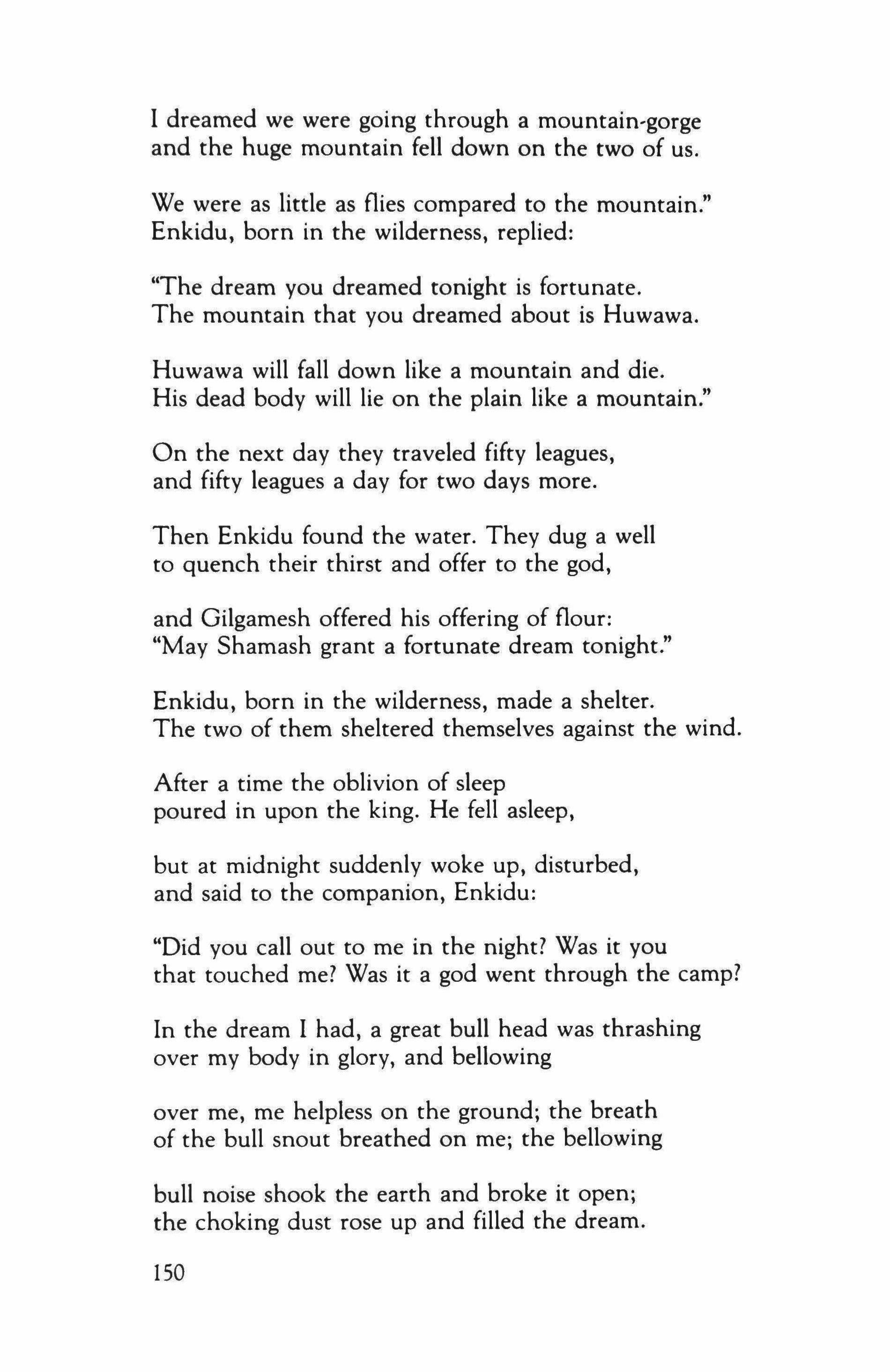
I dreamed we were going through a mountain-gorge and the huge mountain fell down on the two of us.
We were as little as flies compared to the mountain." Enkidu, born in the wilderness, replied:
"The dream you dreamed tonight is fortunate. The mountain that you dreamed about is Huwawa.
Huwawa will fall down like a mountain and die. His dead body will lie on the plain like a mountain."
On the next day they traveled fifty leagues, and fifty leagues a day for two days more.
Then Enkidu found the water. They dug a well to quench their thirst and offer to the god, and Gilgamesh offered his offering of flour: "May Shamash grant a fortunate dream tonight."
Enkidu, born in the wilderness, made a shelter. The two of them sheltered themselves against the wind.
After a time the oblivion of sleep poured in upon the king. He fell asleep,
but at midnight suddenly woke up, disturbed, and said to the companion, Enkidu:
"Did you call out to me in the night? Was it you that touched me? Was it a god went through the camp?
In the dream I had, a great bull head was thrashing over my body in glory, and bellowing
over me, me helpless on the ground; the breath of the bull snout breathed on me; the bellowing bull noise shook the earth and broke it open; the choking dust rose up and filled the dream.
150
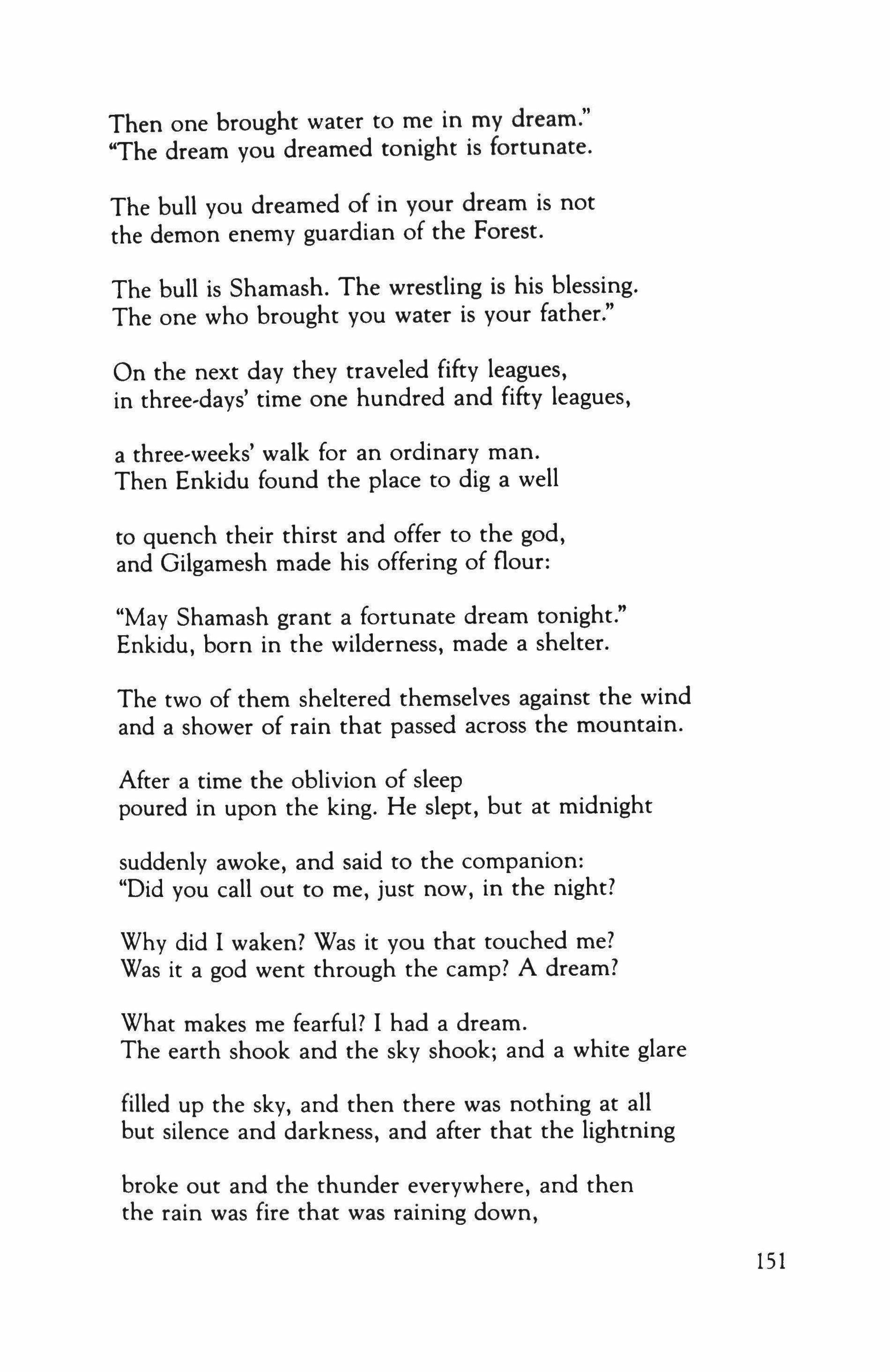
Then one brought water to me in my dream." "The dream you dreamed tonight is fortunate.
The bull you dreamed of in your dream is not the demon enemy guardian of the Forest.
The bull is Shamash. The wrestling is his blessing. The one who brought you water is your father."
On the next day they traveled fifty leagues, in three-days' time one hundred and fifty leagues, a three-weeks' walk for an ordinary man. Then Enkidu found the place to dig a well to quench their thirst and offer to the god, and Gilgamesh made his offering of flour:
"May Shamash grant a fortunate dream tonight." Enkidu, born in the wilderness, made a shelter.
The two of them sheltered themselves against the wind and a shower of rain that passed across the mountain.
After a time the oblivion of sleep poured in upon the king. He slept, but at midnight
suddenly awoke, and said to the companion: "Did you call out to me, just now, in the night?
Why did I waken? Was it you that touched me? Was it a god went through the camp? A dream?
What makes me fearful? I had a dream. The earth shook and the sky shook; and a white glare filled up the sky, and then there was nothing at all but silence and darkness, and after that the lightning broke out and the thunder everywhere, and then the rain was fire that was raining down,
151
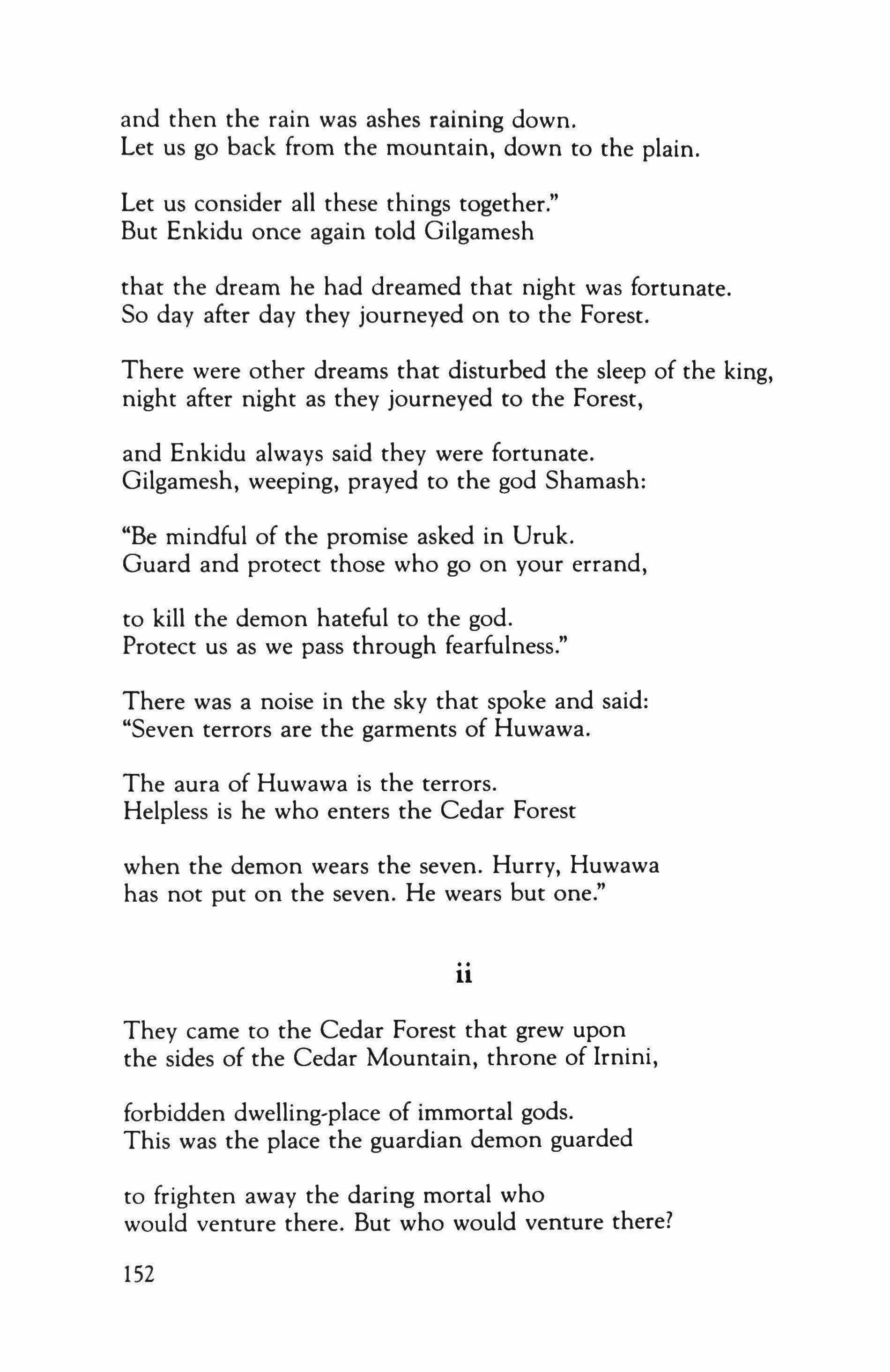
and then the rain was ashes raining down. Let us go back from the mountain, down to the plain.
Let us consider all these things together." But Enkidu once again told Gilgamesh
that the dream he had dreamed that night was fortunate. So day after day they journeyed on to the Forest.
There were other dreams that disturbed the sleep of the king, night after night as they journeyed to the Forest, and Enkidu always said they were fortunate. Gilgamesh, weeping, prayed to the god Shamash:
"Be mindful of the promise asked in Uruk. Guard and protect those who go on your errand, to kill the demon hateful to the god. Protect us as we pass through fearfulness."
There was a noise in the sky that spoke and said: "Seven terrors are the garments of Huwawa.
The aura of Huwawa is the terrors. Helpless is he who enters the Cedar Forest when the demon wears the seven. Hurry, Huwawa has not put on the seven. He wears but one." 11
They came to the Cedar Forest that grew upon the sides of the Cedar Mountain, throne of Irnini, forbidden dwelling-place of immortal gods. This was the place the guardian demon guarded to frighten away the daring mortal who would venture there. But who would venture there?
152
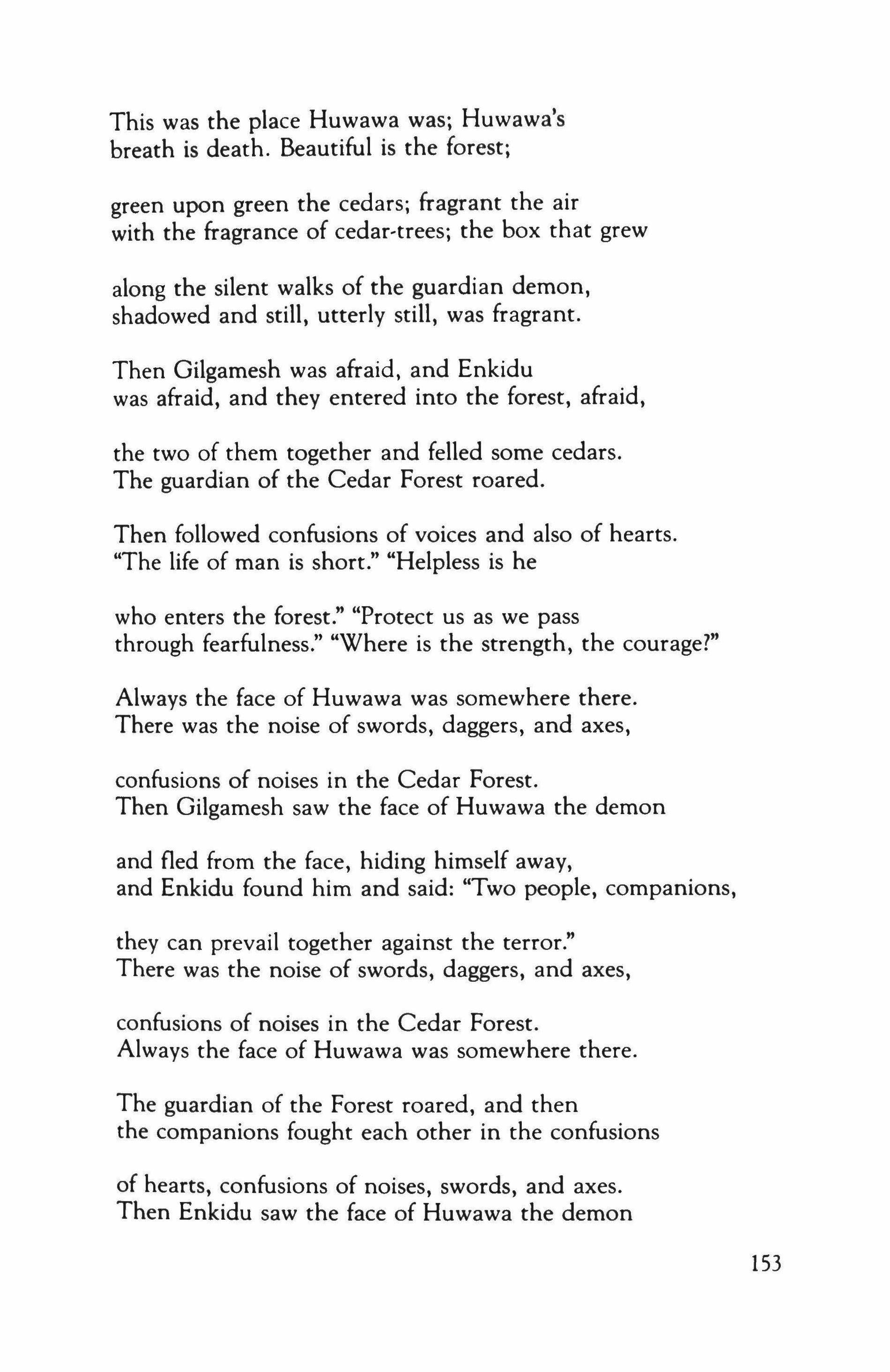
This was the place Huwawa was; Huwawa's breath is death. Beautiful is the forest;
green upon green the cedars; fragrant the air with the fragrance of cedar-trees; the box that grew
along the silent walks of the guardian demon, shadowed and still, utterly still, was fragrant.
Then Gilgamesh was afraid, and Enkidu was afraid, and they entered into the forest, afraid, the two of them together and felled some cedars. The guardian of the Cedar Forest roared.
Then followed confusions of voices and also of hearts. "The life of man is short." "Helpless is he who enters the forest." "Protect us as we pass through fearfulness." "Where is the strength, the courage?"
Always the face of Huwawa was somewhere there. There was the noise of swords, daggers, and axes, confusions of noises in the Cedar Forest. Then Gilgamesh saw the face of Huwawa the demon and fled from the face, hiding himself away, and Enkidu found him and said: "Two people, companions, they can prevail together against the terror." There was the noise of swords, daggers, and axes, confusions of noises in the Cedar Forest. Always the face of Huwawa was somewhere there.
The guardian of the Forest roared, and then the companions fought each other in the confusions of hearts, confusions of noises, swords, and axes. Then Enkidu saw the face of Huwawa the demon
153
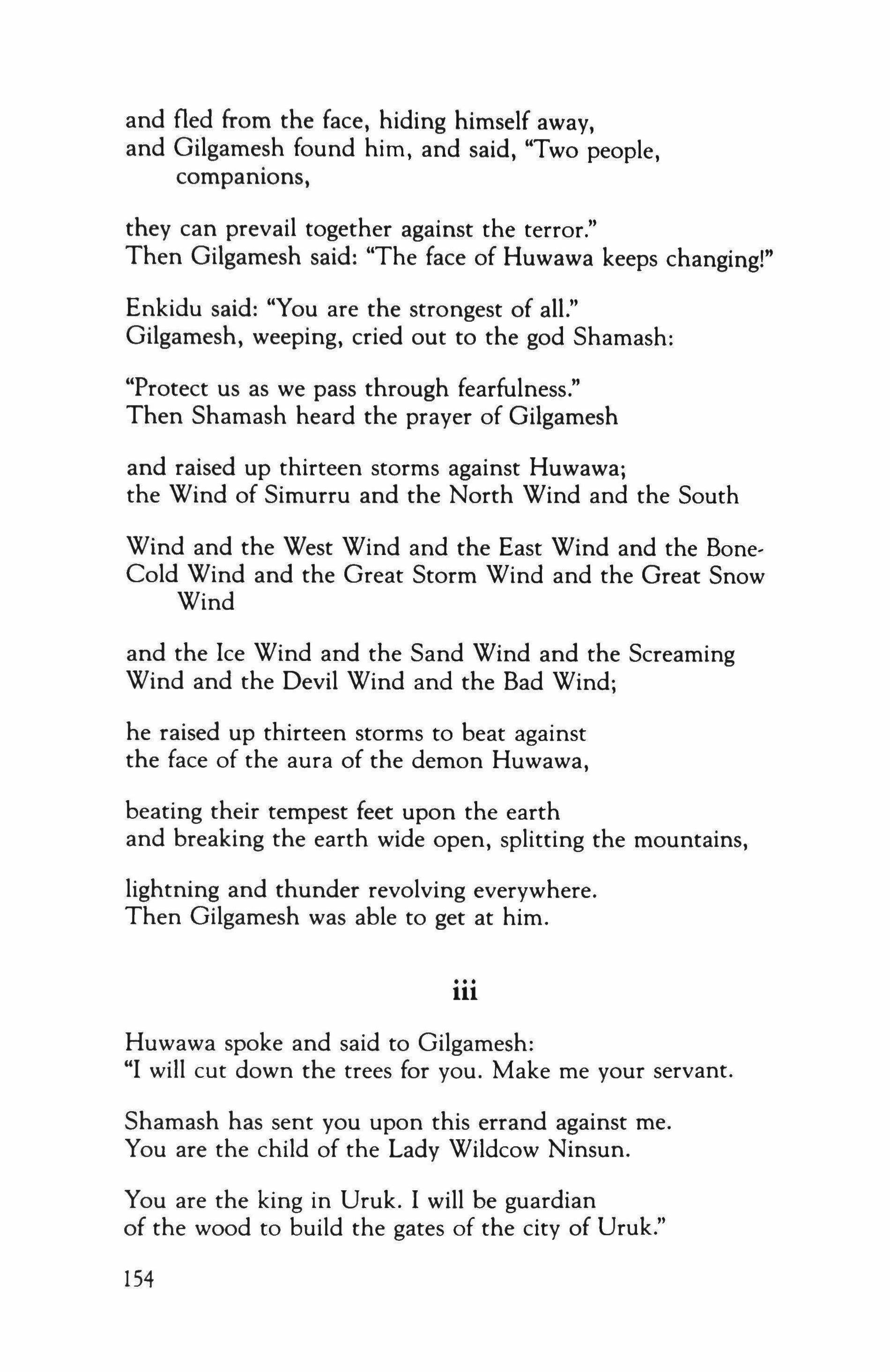
and fled from the face, hiding himself away, and Gilgamesh found him, and said, "Two people, companions, they can prevail together against the terror." Then Gilgamesh said: "The face of Huwawa keeps changing!"
Enkidu said: "You are the strongest of all." Gilgamesh, weeping, cried out to the god Shamash: "Protect us as we pass through fearfulness." Then Shamash heard the prayer of Gilgamesh and raised up thirteen storms against Huwawa; the Wind of Simurru and the North Wind and the South Wind and the West Wind and the East Wind and the Bone, Cold Wind and the Great Storm Wind and the Great Snow Wind and the Ice Wind and the Sand Wind and the Screaming Wind and the Devil Wind and the Bad Wind; he raised up thirteen storms to beat against the face of the aura of the demon Huwawa, beating their tempest feet upon the earth and breaking the earth wide open, splitting the mountains, lightning and thunder revolving everywhere. Then Gilgamesh was able to get at him.
iii
Huwawa spoke and said to Gilgamesh: "I will cut down the trees for you. Make me your servant.
Shamash has sent you upon this errand against me. You are the child of the Lady Wildcow Ninsun.
You are the king in Uruk. I will be guardian of the wood to build the gates of the city of Uruk."
154
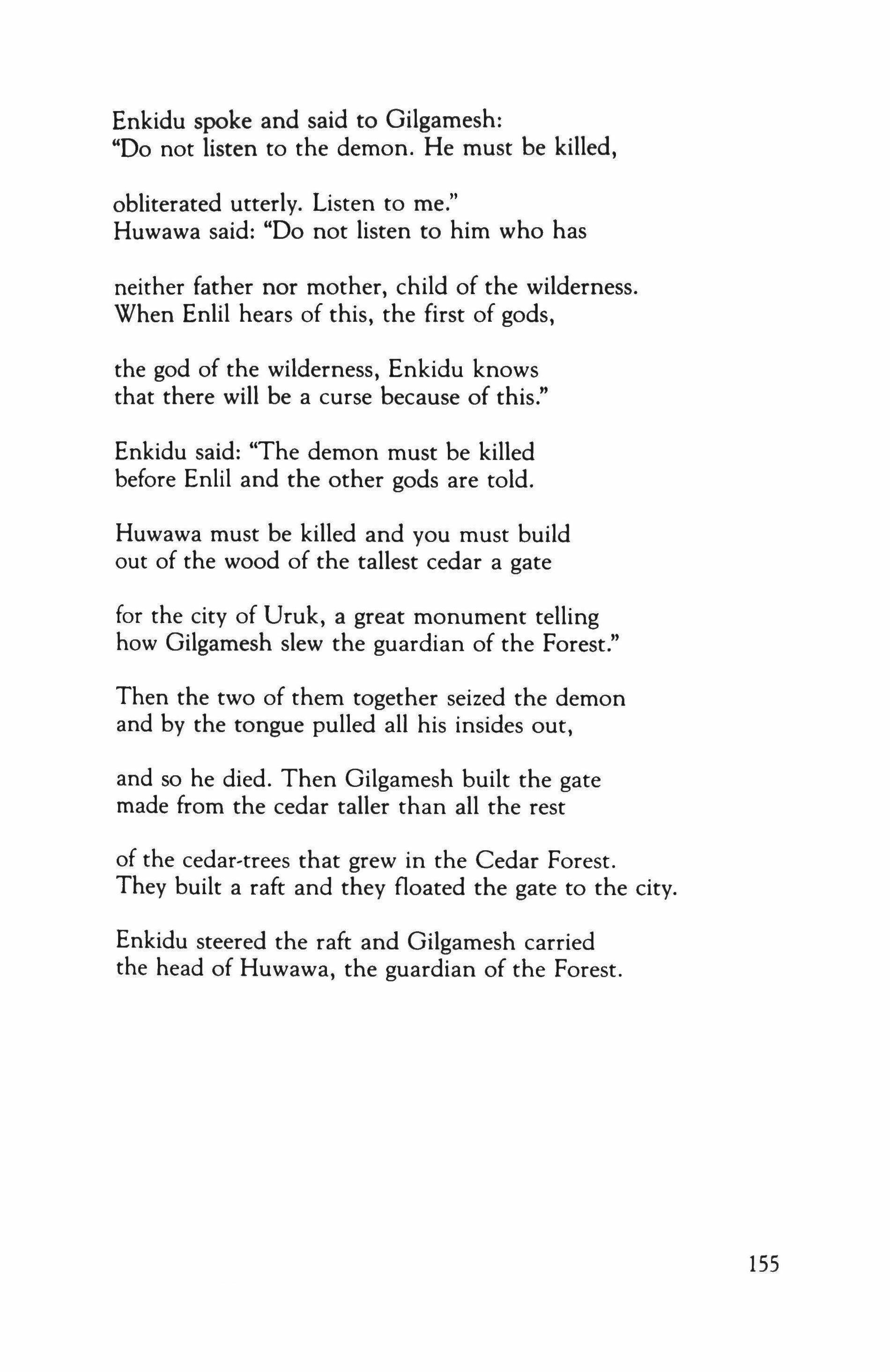
Enkidu spoke and said to Gilgamesh: "Do not listen to the demon. He must be killed,
obliterated utterly. Listen to me."
Huwawa said: "Do not listen to him who has
neither father nor mother, child of the wilderness. When Enlil hears of this, the first of gods, the god of the wilderness, Enkidu knows that there will be a curse because of this."
Enkidu said: "The demon must be killed before Enlil and the other gods are told.
Huwawa must be killed and you must build out of the wood of the tallest cedar a gate
for the city of Uruk, a great monument telling how Gilgamesh slew the guardian of the Forest."
Then the two of them together seized the demon and by the tongue pulled all his insides out,
and so he died. Then Gilgamesh built the gate made from the cedar taller than all the rest of the cedar-trees that grew in the Cedar Forest. They built a raft and they floated the gate to the city.
Enkidu steered the raft and Gilgamesh carried the head of Huwawa, the guardian of the Forest.
155
From the Homeric Greek
Translated by Jim Powell
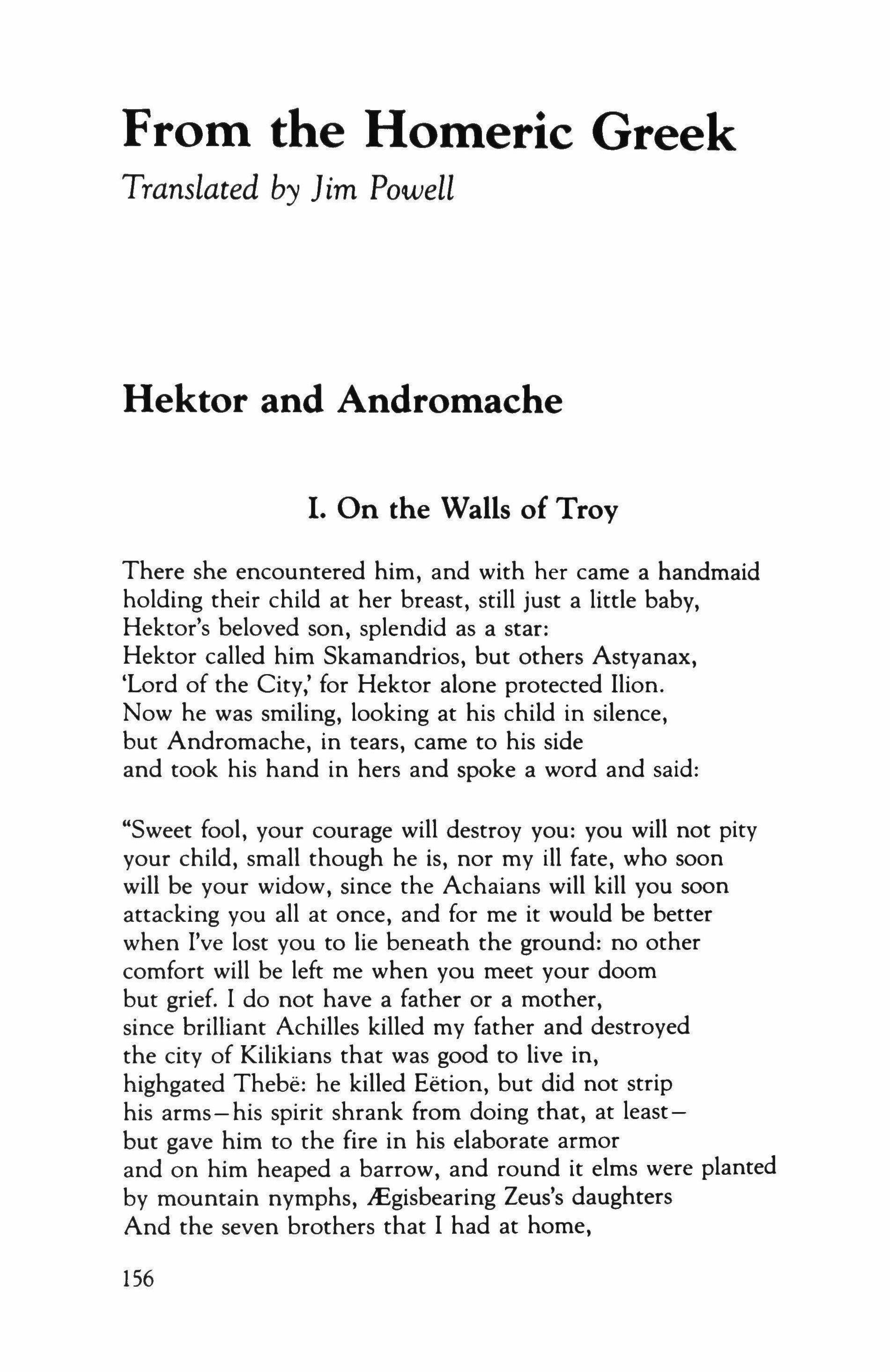
Hektor and Andromache
1. On the Walls of Troy
There she encountered him, and with her came a handmaid holding their child at her breast, still just a little baby, Hektor's beloved son, splendid as a star: Hektor called him Skamandrios, but others Astyanax, 'Lord of the City: for Hektor alone protected Ilion. Now he was smiling, looking at his child in silence, but Andromache, in tears, came to his side and took his hand in hers and spoke a word and said:
"Sweet fool, your courage will destroy you: you will not pity your child, small though he is, nor my ill fate, who soon will be your widow, since the Achaians will kill you soon attacking you all at once, and for me it would be better when I've lost you to lie beneath the ground: no other comfort will be left me when you meet your doom but grief. I do not have a father or a mother, since brilliant Achilles killed my father and destroyed the city of Kilikians that was good to live in, highgated Thebe: he killed Eetion, but did not strip his arms-his spirit shrank from doing that, at leastbut gave him to the fire in his elaborate armor and on him heaped a barrow, and round it elms were planted by mountain nymphs, JEgisbearing Zeus's daughters And the seven brothers that I had at home,
156
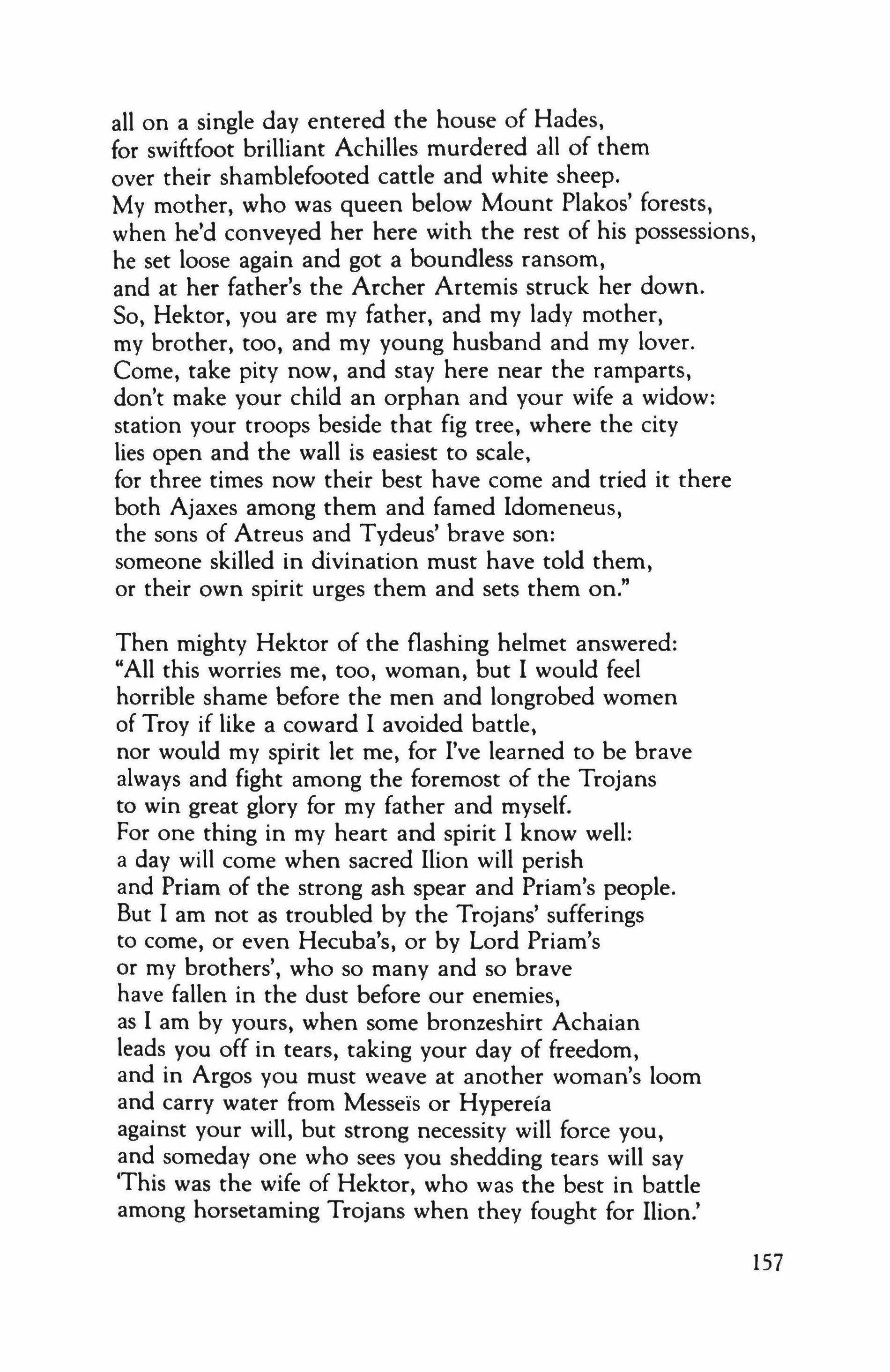
all on a single day entered the house of Hades, for swiftfoot brilliant Achilles murdered all of them over their shamblefooted cattle and white sheep. My mother, who was queen below Mount Plakos' forests, when he'd conveyed her here with the rest of his possessions, he set loose again and got a boundless ransom, and at her father's the Archer Artemis struck her down. So, Hektor, you are my father, and my lady mother, my brother, too, and my young husband and my lover. Come, take pity now, and stay here near the ramparts, don't make your child an orphan and your wife a widow: station your troops beside that fig tree, where the city lies open and the wall is easiest to scale, for three times now their best have come and tried it there both Ajaxes among them and famed Idomeneus, the sons of Atreus and Tvdeus' brave son: someone skilled in divination must have told them, or their own spirit urges them and sets them on."
Then mighty Hektor of the flashing helmet answered: "All this worries me, too, woman, but I would feel horrible shame before the men and longrobed women of Troy if like a coward I avoided battle, nor would my spirit let me, for I've learned to be brave always and fight among the foremost of the Trojans to win great glory for my father and myself. For one thing in my heart and spirit I know well: a day will come when sacred Ilion will perish and Priam of the strong ash spear and Priam's people. But I am not as troubled by the Trojans' sufferings to come, or even Hecuba's, or by Lord Priam's or my brothers', who so many and so brave have fallen in the dust before our enemies, as I am by yours, when some bronzeshirt Achaian leads you off in tears, taking your day of freedom, and in Argos you must weave at another woman's loom and carry water from Messeis or Hypereia against your will, but strong necessity will force you, and someday one who sees you shedding tears will say 'This was the wife of Hektor, who was the best in battle among horsetaming Trojans when they fought for Ilion.'
157
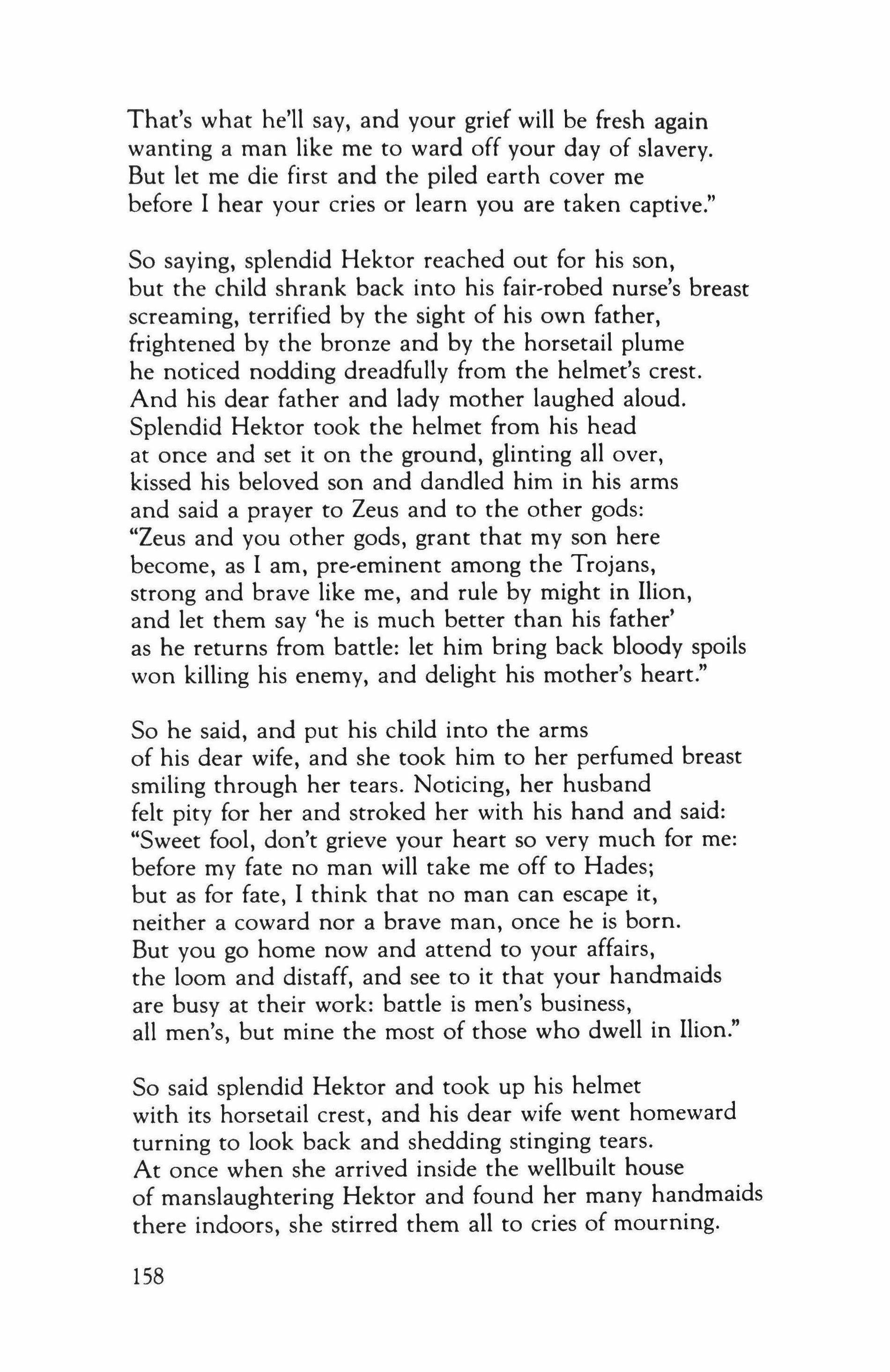
That's what he'll say, and your grief will be fresh again wanting a man like me to ward off your day of slavery. But let me die first and the piled earth cover me before I hear your cries or learn you are taken captive."
So saying, splendid Hektor reached out for his son, but the child shrank back into his fair-robed nurse's breast screaming, terrified by the sight of his own father, frightened by the bronze and by the horsetail plume he noticed nodding dreadfully from the helmet's crest. And his dear father and lady mother laughed aloud. Splendid Hektor took the helmet from his head at once and set it on the ground, glinting all over, kissed his beloved son and dandled him in his arms and said a prayer to Zeus and to the other gods: "Zeus and you other gods, grant that my son here become, as I am, pre-eminent among the Trojans, strong and brave like me, and rule by might in Ilion, and let them say 'he is much better than his father' as he returns from battle: let him bring back bloody spoils won killing his enemy, and delight his mother's heart."
So he said, and put his child into the arms of his dear wife, and she took him to her perfumed breast smiling through her tears. Noticing, her husband felt pity for her and stroked her with his hand and said: "Sweet fool, don't grieve your heart so very much for me: before my fate no man will take me off to Hades; but as for fate, I think that no man can escape it, neither a coward nor a brave man, once he is born. But you go home now and attend to your affairs, the loom and distaff, and see to it that your handmaids are busy at their work: battle is men's business, all men's, but mine the most of those who dwell in Ilion."
So said splendid Hektor and took up his helmet with its horsetail crest, and his dear wife went homeward turning to look back and shedding stinging tears. At once when she arrived inside the wellbuilt house of manslaughtering Hektor and found her many handmaids there indoors, she stirred them all to cries of mourning.
158
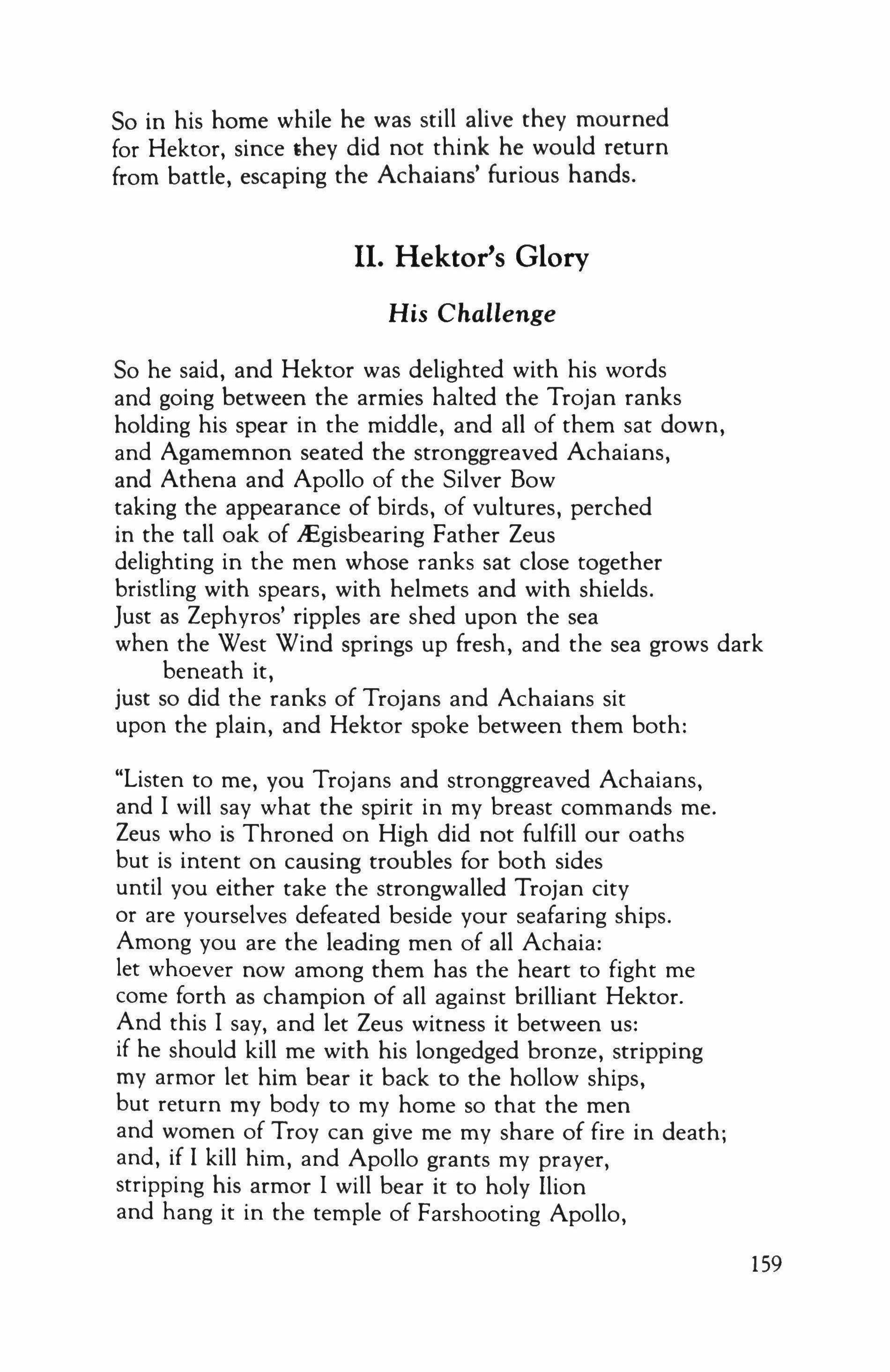
So in his home while he was still alive they mourned for Hektor, since shev did not think he would return from battle, escaping the Achaians' furious hands.
II. Hektor's Glory
His Challenge
So he said, and Hektor was delighted with his words and going between the armies halted the Trojan ranks holding his spear in the middle, and all of them sat down, and Agamemnon seated the stronggreaved Achaians, and Athena and Apollo of the Silver Bow taking the appearance of birds, of vultures, perched in the tall oak of )Egisbearing Father Zeus delighting in the men whose ranks sat close together bristling with spears, with helmets and with shields. Just as Zephyros' ripples are shed upon the sea when the West Wind springs up fresh, and the sea grows dark beneath it, just so did the ranks of Trojans and Achaians sit upon the plain, and Hektor spoke between them both:
"Listen to me, you Trojans and stronggreaved Achaians, and I will say what the spirit in my breast commands me. Zeus who is Throned on High did not fulfill our oaths but is intent on causing troubles for both sides until you either take the strongwalled Trojan city or are yourselves defeated beside your seafaring ships. Among you are the leading men of all Achaia: let whoever now among them has the heart to fight me come forth as champion of all against brilliant Hektor. And this I say, and let Zeus witness it between us: if he should kill me with his longedged bronze, stripping my armor let him bear it back to the hollow ships, but return my body to my home so that the men and women of Troy can give me my share of fire in death; and, if I kill him, and Apollo grants my prayer, stripping his armor I will bear it to holy Ilion and hang it in the temple of Farshooting Apollo,
159
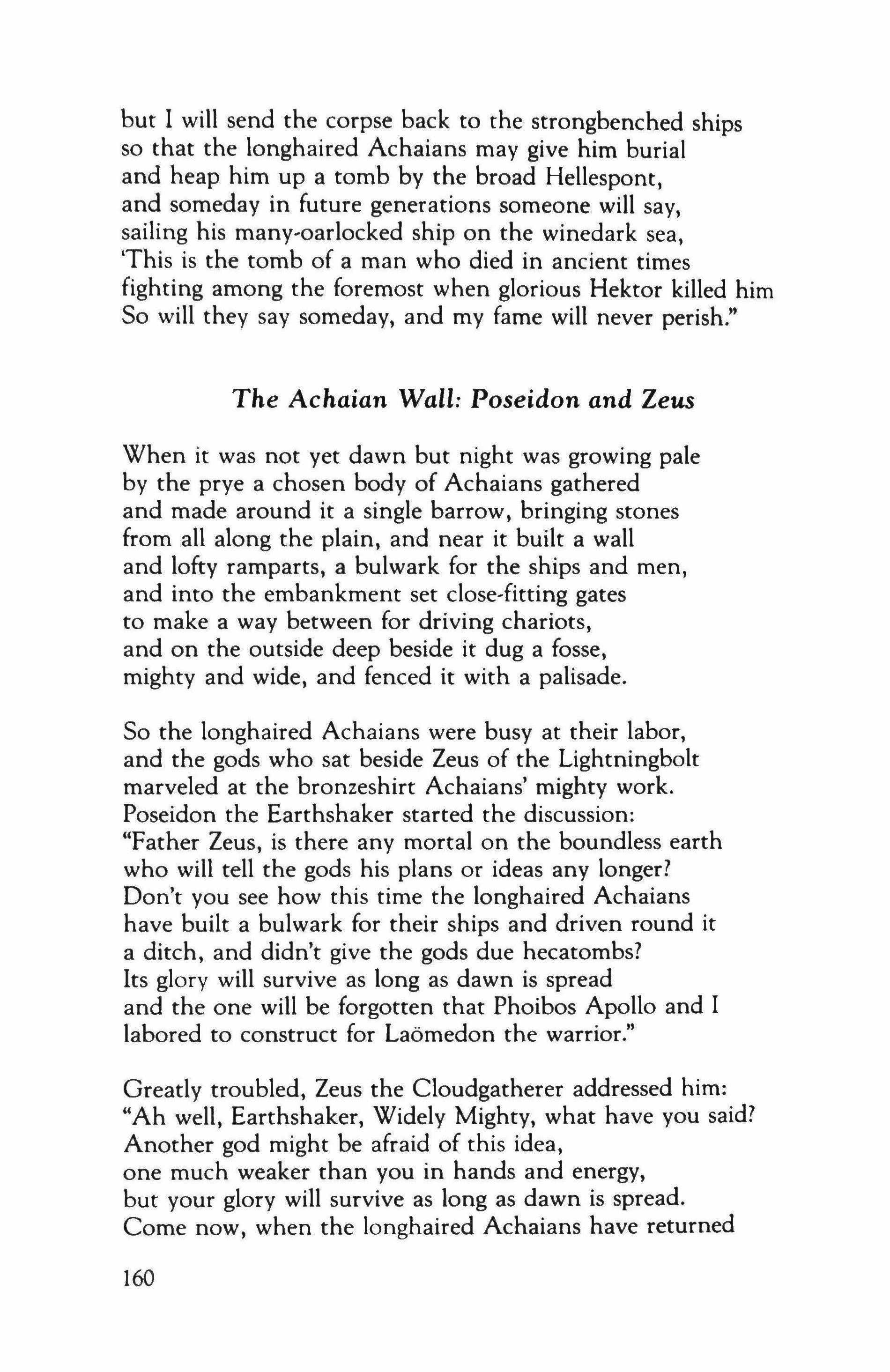
but I will send the corpse back to the strongbenched ships so that the longhaired Achaians may give him burial and heap him up a tomb by the broad Hellespont, and someday in future generations someone will say, sailing his manv-oarlocked ship on the winedark sea, This is the tomb of a man who died in ancient times fighting among the foremost when glorious Hektor killed him So will they say someday, and my fame will never perish."
The Achaian Wall: Poseidon and Zeus
When it was not yet dawn but night was growing pale by the prye a chosen body of Achaians gathered and made around it a single barrow, bringing stones from all along the plain, and near it built a wall and lofty ramparts, a bulwark for the ships and men, and into the embankment set close-fitting gates to make a way between for driving chariots, and on the outside deep beside it dug a fosse, mighty and wide, and fenced it with a palisade.
So the longhaired Achaians were busy at their labor, and the gods who sat beside Zeus of the Lightningbolt marveled at the bronzeshirt Achaians' mighty work. Poseidon the Earthshaker started the discussion: "Father Zeus, is there any mortal on the boundless earth who will tell the gods his plans or ideas any longer?
Don't you see how this time the longhaired Achaians have built a bulwark for their ships and driven round it a ditch, and didn't give the gods due hecatombs? Its glory will survive as long as dawn is spread and the one will be forgotten that Phoibos Apollo and I labored to construct for Laomedon the warrior."
Greatly troubled, Zeus the Cloudgatherer addressed him: "Ah well, Earthshaker, Widely Mighty, what have you said?
Another god might be afraid of this idea, one much weaker than you in hands and energy, but your glory will survive as long as dawn is spread. Come now, when the longhaired Achaians have returned
160
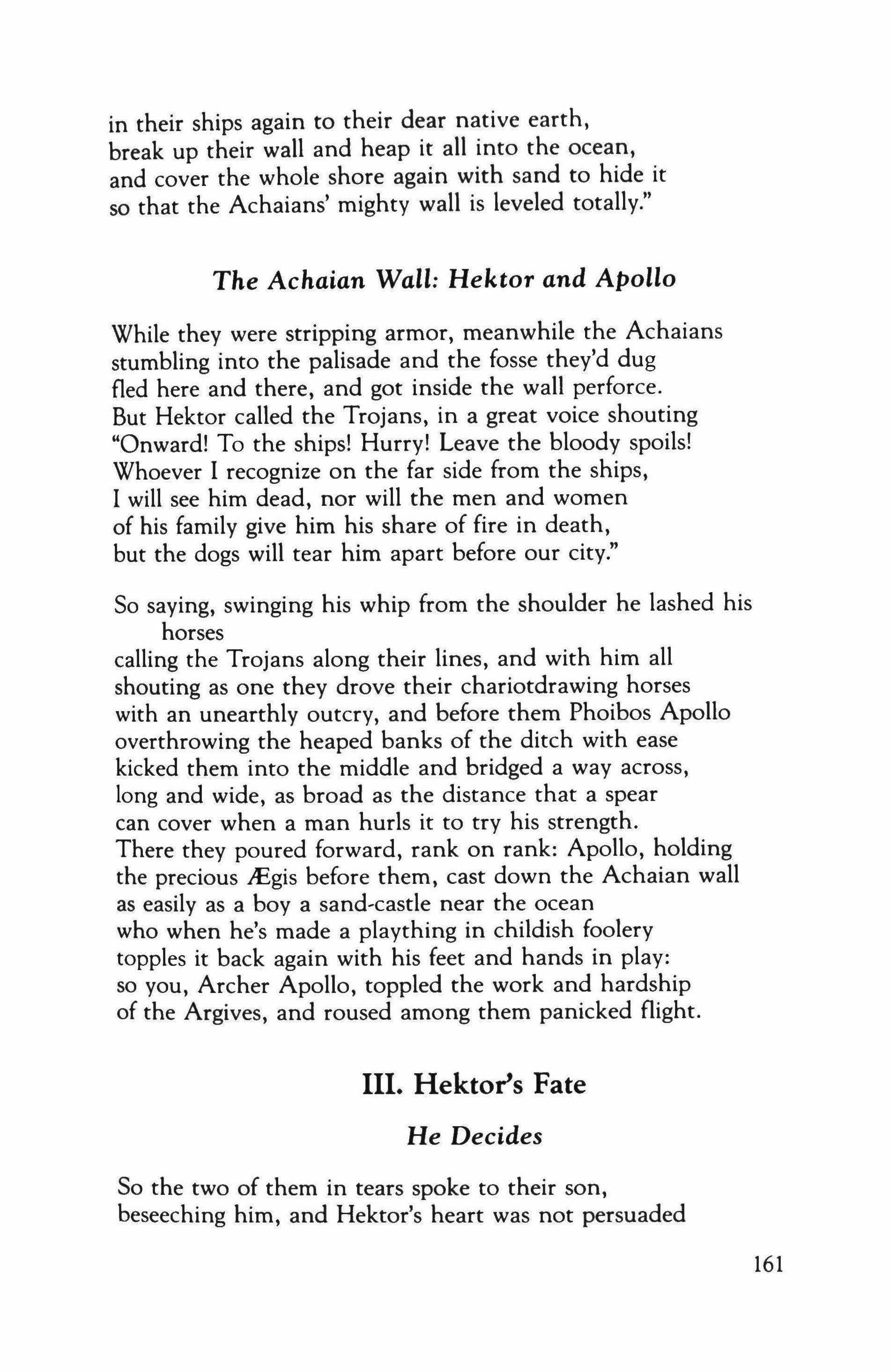
in their ships again to their dear native earth, break up their wall and heap it all into the ocean, and cover the whole shore again with sand to hide it so that the Achaians' mighty wall is leveled totally."
The Achaian Wall: HektoT and Apollo
While they were stripping armor, meanwhile the Achaians stumbling into the palisade and the fosse they'd dug fled here and there, and got inside the wall perforce. But Hektor called the Trojans, in a great voice shouting "Onward! To the ships! Hurry! Leave the bloody spoils! Whoever I recognize on the far side from the ships, I will see him dead, nor will the men and women of his family give him his share of fire in death, but the dogs will tear him apart before our city."
So saying, swinging his whip from the shoulder he lashed his horses calling the Trojans along their lines, and with him all shouting as one they drove their chariotdrawing horses with an unearthly outcry, and before them Phoibos Apollo overthrowing the heaped banks of the ditch with ease kicked them into the middle and bridged a way across, long and wide, as broad as the distance that a spear can cover when a man hurls it to try his strength. There they poured forward, rank on rank: Apollo, holding the precious lEgis before them, cast down the Achaian wall as easily as a boy a sand-castle near the ocean who when he's made a plaything in childish foolery topples it back again with his feet and hands in play: so you, Archer Apollo, toppled the work and hardship of the Argives, and roused among them panicked flight.
III. Hektor's Fate
He Decides
So the two of them in tears spoke to their son, beseeching him, and Hektor's heart was not persuaded
161
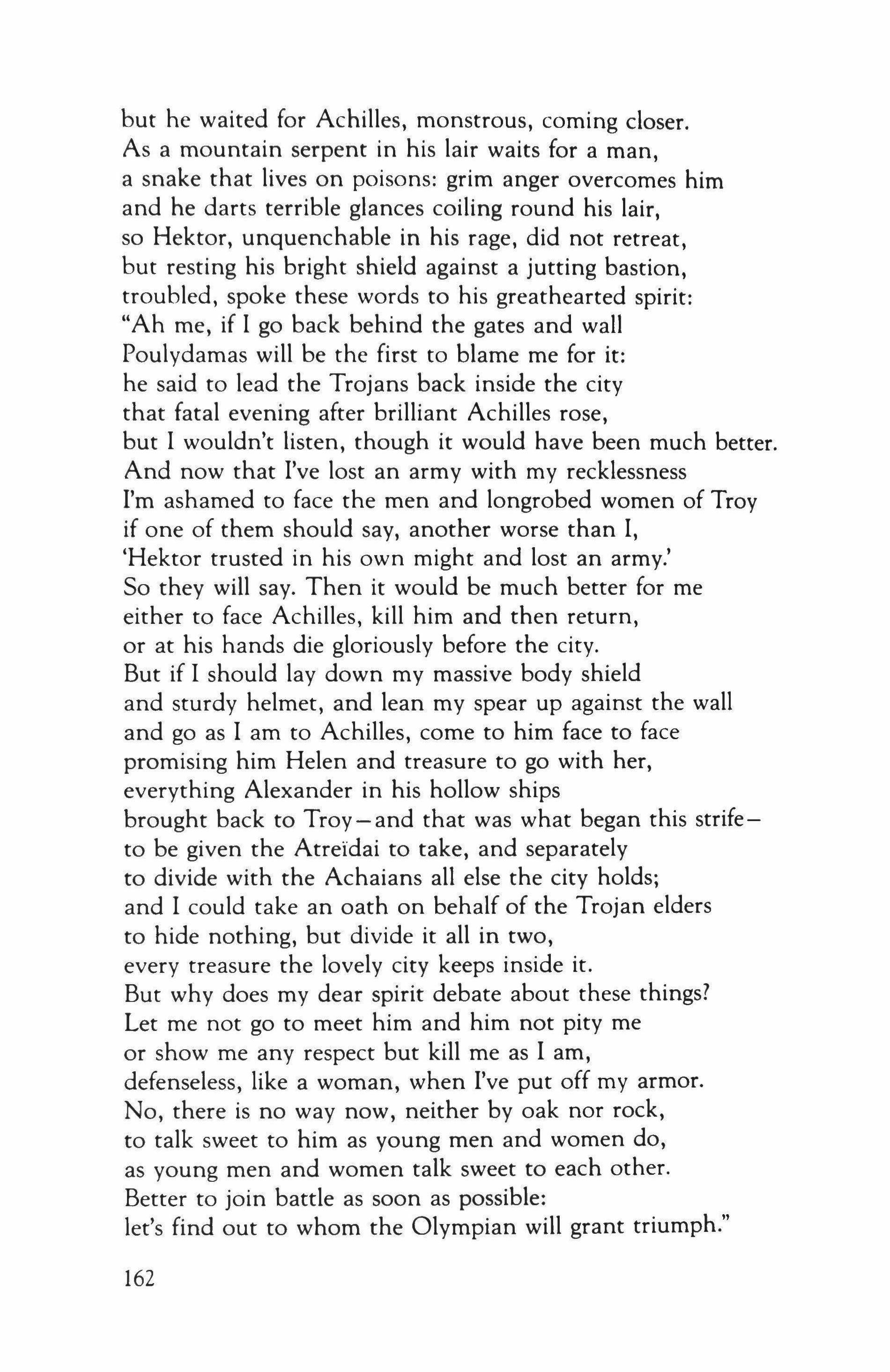
but he waited for Achilles, monstrous, coming closer. As a mountain serpent in his lair waits for a man, a snake that lives on poisons: grim anger overcomes him and he darts terrible glances coiling round his lair, so Hektor, unquenchable in his rage, did not retreat, but resting his bright shield against a jutting bastion, troubled, spoke these words to his greathearted spirit: "Ah me, if I go back behind the gates and wall Poulydamas will be the first to blame me for it: he said to lead the Trojans back inside the city that fatal evening after brilliant Achilles rose, but I wouldn't listen, though it would have been much better. And now that I've lost an army with my recklessness I'm ashamed to face the men and longrobed women of Troy if one of them should say, another worse than I, 'Hektor trusted in his own might and lost an army.' So they will say. Then it would be much better for me either to face Achilles, kill him and then return, or at his hands die gloriously before the city. But if I should lay down my massive body shield and sturdy helmet, and lean my spear up against the wall and go as I am to Achilles, come to him face to face promising him Helen and treasure to go with her, everything Alexander in his hollow ships brought back to Troy-and that was what began this strifeto be given the Atreidai to take, and separately to divide with the Achaians all else the city holds; and I could take an oath on behalf of the Trojan elders to hide nothing, but divide it all in two, every treasure the lovely city keeps inside it. But why does my dear spirit debate about these things? Let me not go to meet him and him not pity me or show me any respect but kill me as I am, defenseless, like a woman, when I've put off my armor. No, there is no way now, neither by oak nor rock, to talk sweet to him as young men and women do, as young men and women talk sweet to each other. Better to join battle as soon as possible: let's find out to whom the Olympian will grant triumph."
162
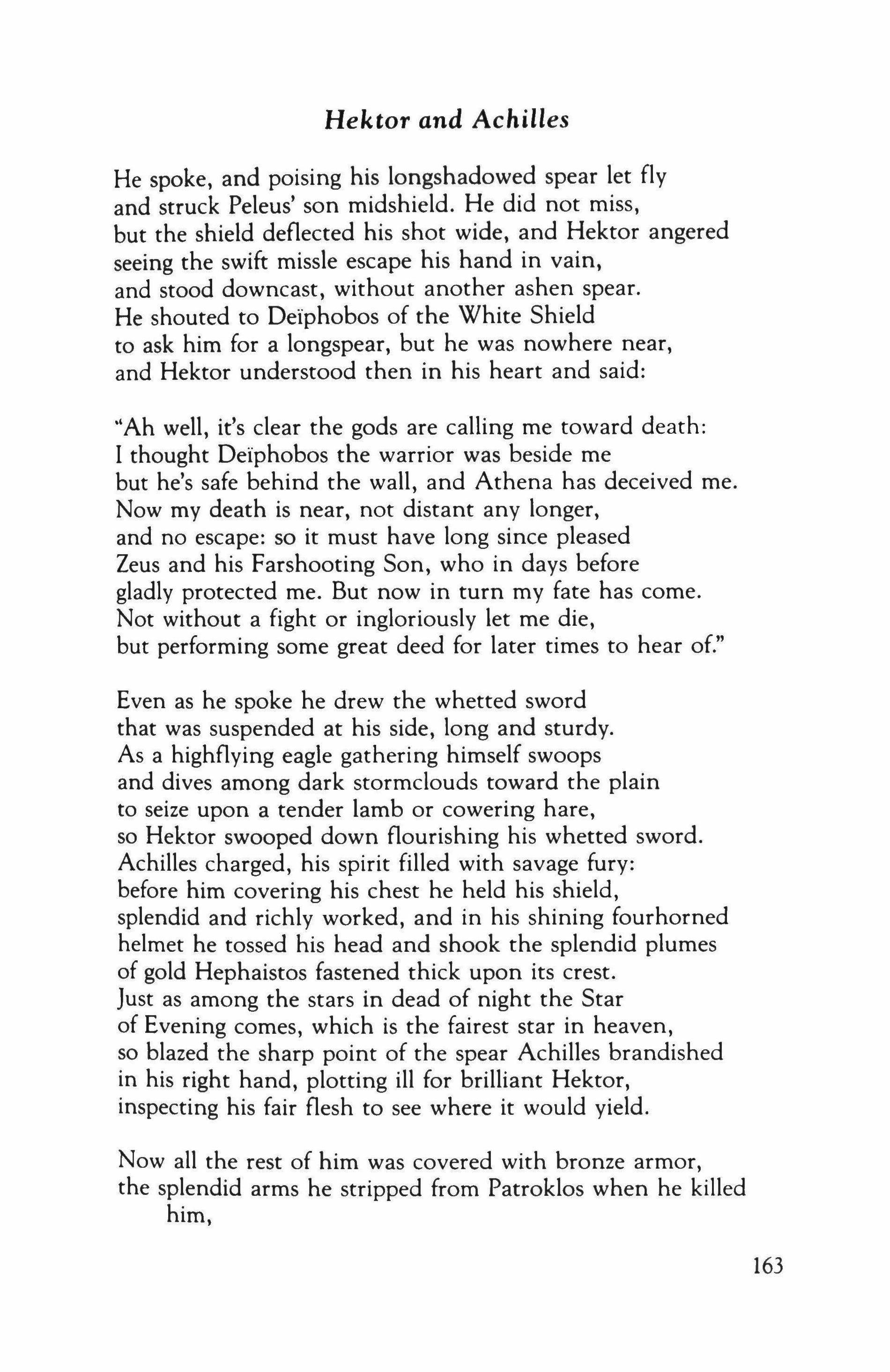
Hektor and Achilles
He spoke, and poising his longshadowed spear let fly and struck Peleus' son midshield. He did not miss, but the shield deflected his shot wide, and Hektor angered seeing the swift missle escape his hand in vain, and stood downcast, without another ashen spear. He shouted to Deiphobos of the White Shield to ask him for a longspear, but he was nowhere near, and Hektor understood then in his heart and said:
"Ah well, it's clear the gods are calling me toward death: I thought Deiphobos the warrior was beside me but he's safe behind the wall, and Athena has deceived me. Now my death is near, not distant any longer, and no escape: so it must have long since pleased Zeus and his Farshooting Son, who in days before gladly protected me. But now in turn my fate has come. Not without a fight or ingloriously let me die, but performing some great deed for later times to hear of."
Even as he spoke he drew the whetted sword that was suspended at his side, long and sturdy. As a highflying eagle gathering himself swoops and dives among dark stormclouds toward the plain to seize upon a tender lamb or cowering hare, so Hektor swooped down flourishing his whetted sword. Achilles charged, his spirit filled with savage fury: before him covering his chest he held his shield, splendid and richly worked, and in his shining fourhorned helmet he tossed his head and shook the splendid plumes of gold Hephaistos fastened thick upon its crest. Just as among the stars in dead of night the Star of Evening comes, which is the fairest star in heaven, so blazed the sharp point of the spear Achilles brandished in his right hand, plotting ill for brilliant Hektor, inspecting his fair flesh to see where it would yield.
Now all the rest of him was covered with bronze armor, the splendid arms he stripped from Patroklos when he killed him,
163
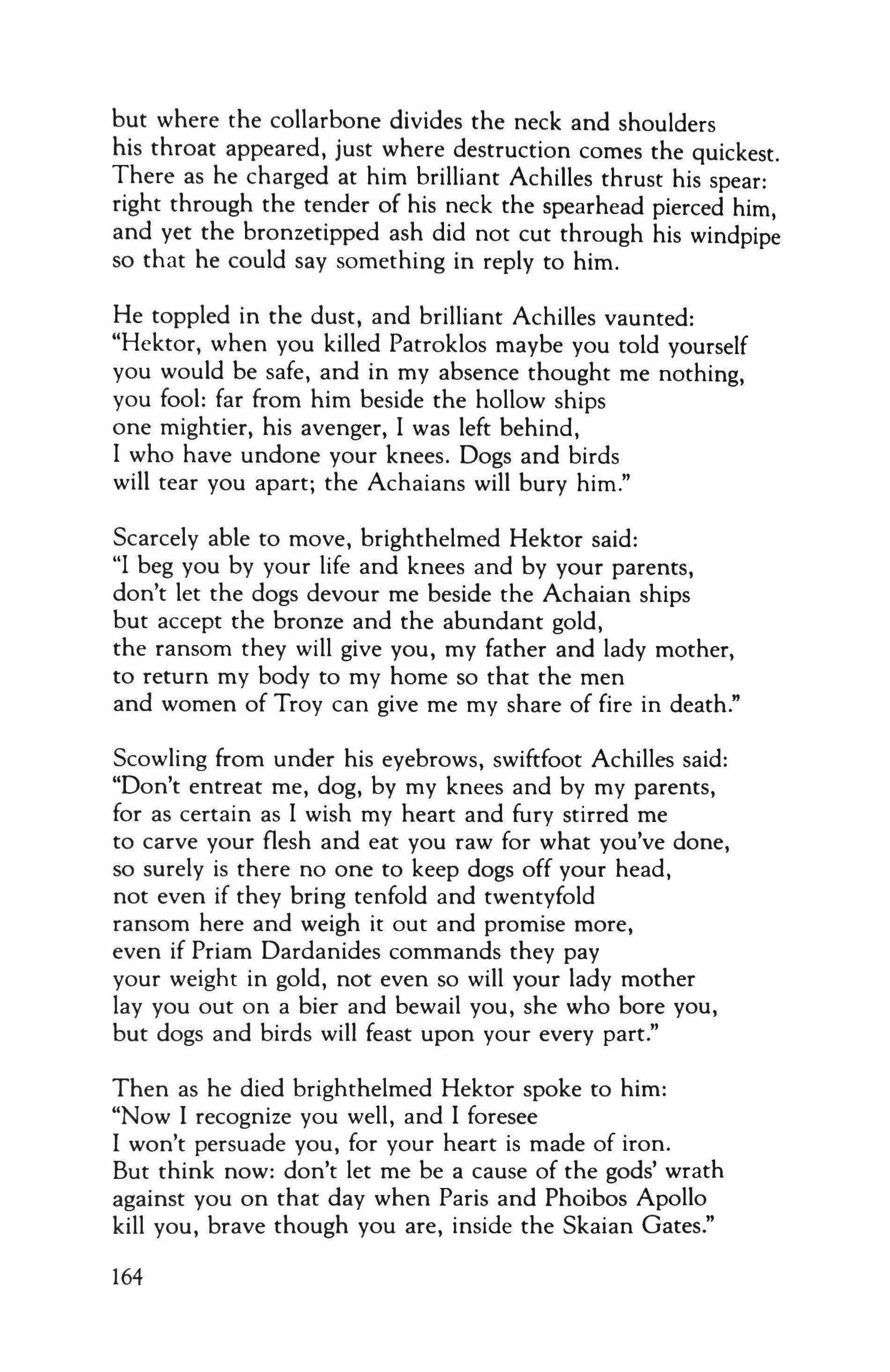
but where the collarbone divides the neck and shoulders his throat appeared, just where destruction comes the quickest. There as he charged at him brilliant Achilles thrust his spear: right through the tender of his neck the spearhead pierced him, and yet the bronzetipped ash did not cut through his windpipe so that he could say something in reply to him.
He toppled in the dust, and brilliant Achilles vaunted: "Hektor, when you killed Patroklos maybe you told yourself you would be safe, and in my absence thought me nothing, you fool: far from him beside the hollow ships one mightier, his avenger, I was left behind, 1 who have undone your knees. Dogs and birds will tear you apart; the Achaians will bury him."
Scarcely able to move, brighthelmed Hektor said: "I beg you by your life and knees and by your parents, don't let the dogs devour me beside the Achaian ships but accept the bronze and the abundant gold, the ransom they will give you, my father and lady mother, to return my body to my home so that the men and women of Troy can give me my share of fire in death."
Scowling from under his eyebrows, swiftfoot Achilles said: "Don't entreat me, dog, by my knees and by my parents, for as certain as 1 wish my heart and fury stirred me to carve your flesh and eat you raw for what you've done, so surely is there no one to keep dogs off your head, not even if they bring tenfold and twentyfold ransom here and weigh it out and promise more, even if Priam Dardanides commands they pay your weight in gold, not even so will your lady mother lay you out on a bier and bewail you, she who bore you, but dogs and birds will feast upon your every part."
Then as he died brighthelmed Hektor spoke to him: "Now 1 recognize you well, and 1 foresee 1 won't persuade you, for your heart is made of iron. But think now: don't let me be a cause of the gods' wrath against you on that day when Paris and Phoibos Apollo kill you, brave though you are, inside the Skaian Gates."
164

Even as he spoke the end of death enclosed him. His soul flew from his body and went down to Hades bewailing his fate, leaving his manhood and his youth. Though he was dead already, brilliant Achilles said: "Lie dead. I will accept my fate whenever Zeus and the other immortal gods wish to complete it."
IV. Andromache Learns
So she said, in tears, but Hektor's wife heard nothing yet, for no trustworthy messenger arrived to tell her that her husband stayed outside the gates. At her loom in the house's inmost nook she wove a purple doublecloak, inweaving artful lovecharms, and called to her fairbraided handmaids through the house to set the great tripod astride the fire and ready hot bathwater for Hektor when he returned from battlepoor fool, she did not recognize that far from baths at Achilles' hands Flashingeyed Athena broke him. But she heard the outcry and the wailing from the walls and her limbs were shaken and the shuttle fell to the floor, and again she spoke to her fairbraided handmaids:
"Here, two of you come with me, I must see what's happened. I heard my mother-in-law's dear voice, and my heart's blood rises throbbing in my throat, and below my knees are numb. Some evil must be near for Priam's children. May I never hear the word, but horribly I fear that brilliant Achilles, cutting off my brave Hektor alone, far from the city, drives him toward the plain and even now has stopped the painful manliness that controls him, for he never stays in the mass of men but runs out front, yielding to no one in his fury."
So saying, like a madwoman she hurried from the house shaking her head, and together with her went two handmaids. But when she reached the bastion and the crowd of men, she stood and looked out from the wall and recognized him where he was being dragged before the city: swift horses dragged him ruthlessly toward the Achaians' hollow ships.
165

Then infernal night covered up her eyes and she toppled over backward and exhaled her spirit. Far from her head she cast her shining ornaments, her diadem and coiflet and her plaited headband, and the veil, too, that Golden Aphrodite gave her on the day when brighthelmed Hektor led his bride from Eerion's house, and gave a boundless brideprice. And around her stood her husband's sisters in their numbers holding her among them, stricken near to death. But when she breathed again and her spirit had returned she spoke in lamentation among the Trojan women:
"Hektor, I am wretched. We were born to a single fate, the two of us, you here in Troy in Priam's house, and I in Thebe below Mount Plakos' wooded slopes in Eetion's house, who brought me up when I was small, his an ill fate, mine dreadful: I wish he hadn't fathered me. Now you are going into the house of Hades hidden beneath the earth, but you leave me in hateful grief, widowed in our home, and the child is still just small that you and I begot in our ill-fate, nor will you be a help to him, Hektor, dead, nor he to you. For even if he escapes the Achaians' tearful warfare, always hardship and sorrow will be his hereafter, for other men will set the boundaries of his fields.
The day he's orphaned excludes a child from his companions always he hangs his head, his cheeks are wet with tears, and in his need the boy goes up to his father's friends tugging at this one's cloak and that one's tunic, and someone gives him a sip from his cup in pity, just a little, but though it wets his lips, it does not wet his palate, and one with living parents drives him from the feast, striking him with his fists and abusing him with insults: 'Get out, you: your father doesn't dine among us.' Then in tears the boy goes up to his widowed mother, Astyanax, who used to sit on his father's knees eating only the marrow and rich fat of lambs, and when sleep caught him and he was finished with his play he would lie in his blankets in his nurse's arms in a soft bed, and his heart was full of happiness. But now he has much to suffer with his dear father gone,
166

Astyanax, as the Trojans call him, 'Lord of the City,' since you alone protected their high walls and gates. But now beside the curving ships far from your parents wriggling maggots will eat you, when the dogs have finished, stripped naked there, though clothes lie waiting in your house, graceful and fine woven, the work of women's hands. But I will burn them all in a consuming fire, no use at all to you, since you will not lie in them, but from the Trojans and Trojan women, for your glory." So she said, in tears, and the women lamented with her.
167

To Hermes
Sing, Muse, a hymn to Hermes, the Son of Zeus and Maia, lord of Kyllene and of Arkadia's many flocks, the immortals' speedy messenger whom Maia bore, a nymph with fair braids mingling in love with Zeus: shy, she avoided the company of the blessed gods dwelling in a shadowy cave where Krenos' Son mingled with his fairbraided girl in darkest night eluding the immortal gods and mortal men while Whitearmed Hera was enfolded by sweet sleep. But when the thought of mighty Zeus came to fulfillment and now the tenth moon of her time rose into heaven, into the light she brought him, and singular things happened, for then it was she bore that child of many moods, cunning witted, a robber and cattle rustler, the Dreamguide and Nighrspv, the Guardian of Gateways-he who'd soon perform deeds glorious among immortal gods. Born at dawn, before midday he played the lyre and that night stole Apollo the Farshooter's cattleall on the day of the fourth crescent, when Maia bore him.
Once he'd sprung from between his mother's immortal thighs he didn't wait long lying in his sacred cradle but leaping up went hunting for Apollo's cattle, overstepping the threshold of the highroofed cave. Finding a tortoise there he gained immense good fortune for Hermes was the first to make the tortoise sing, the one that he encountered at his courtyard door nibbling at the tall grass growing outside his house, waddling along as she went. The glorious Son of Zeus caught sight of her and laughed and right then spoke these words:
"Here's a lucky sign already! I won't neglect it. Hello, my lovely little dance and feast companion, I'm glad to meet you. Where did you find this gorgeous plaything, this shimmering dress of pottery, a mountain dwelling tortoise like you? I'll take you home. You'll be of use to me, and I won't dishonor you, but first of all you'll please me.
168
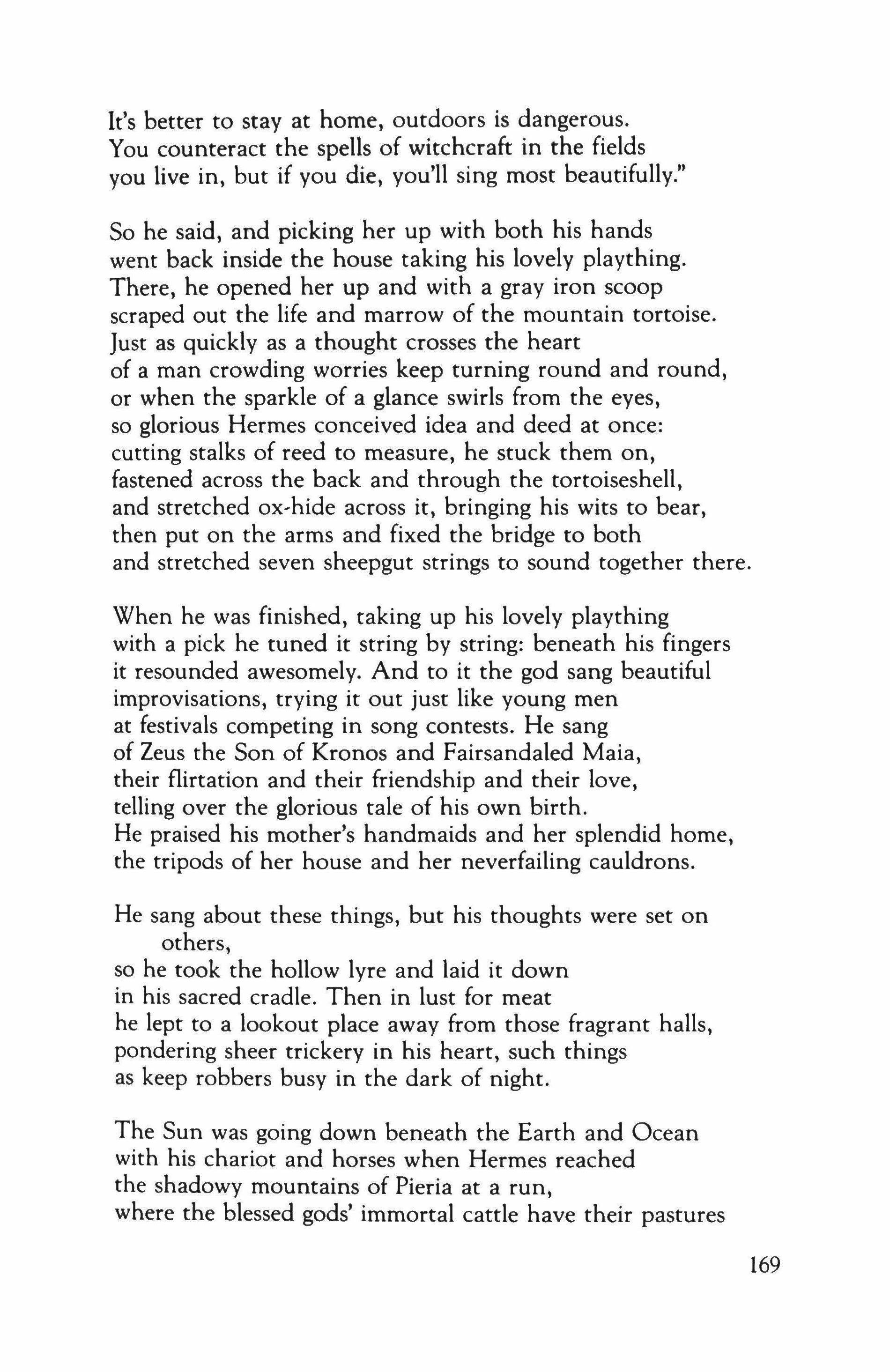
It's better to stay at home, outdoors is dangerous. You counteract the spells of witchcraft in the fields you live in, but if you die, you'll sing most beautifully."
So he said, and picking her up with both his hands went back inside the house taking his lovely plaything. There, he opened her up and with a gray iron scoop scraped out the life and marrow of the mountain tortoise. Just as quickly as a thought crosses the heart of a man crowding worries keep turning round and round, or when the sparkle of a glance swirls from the eyes, so glorious Hermes conceived idea and deed at once: cutting stalks of reed to measure, he stuck them on, fastened across the back and through the tortoiseshell, and stretched ox-hide across it, bringing his wits to bear, then put on the arms and fixed the bridge to both and stretched seven sheepgut strings to sound together there.
When he was finished, taking up his lovely plaything with a pick he tuned it string by string: beneath his fingers it resounded awesomely. And to it the god sang beautiful improvisations, trying it out just like young men at festivals competing in song contests. He sang of Zeus the Son of Kronos and Fairsandaled Maia, their flirtation and their friendship and their love, telling over the glorious tale of his own birth. He praised his mother's handmaids and her splendid horne, the tripods of her house and her neverfailing cauldrons.
He sang about these things, but his thoughts were set on others, so he took the hollow lyre and laid it down in his sacred cradle. Then in lust for meat he lept to a lookout place away from those fragrant halls, pondering sheer trickery in his heart, such things as keep robbers busy in the dark of night.
The Sun was going down beneath the Earth and Ocean with his chariot and horses when Hermes reached the shadowy mountains of Pieria at a run, where the blessed gods' immortal cattle have their pastures
169
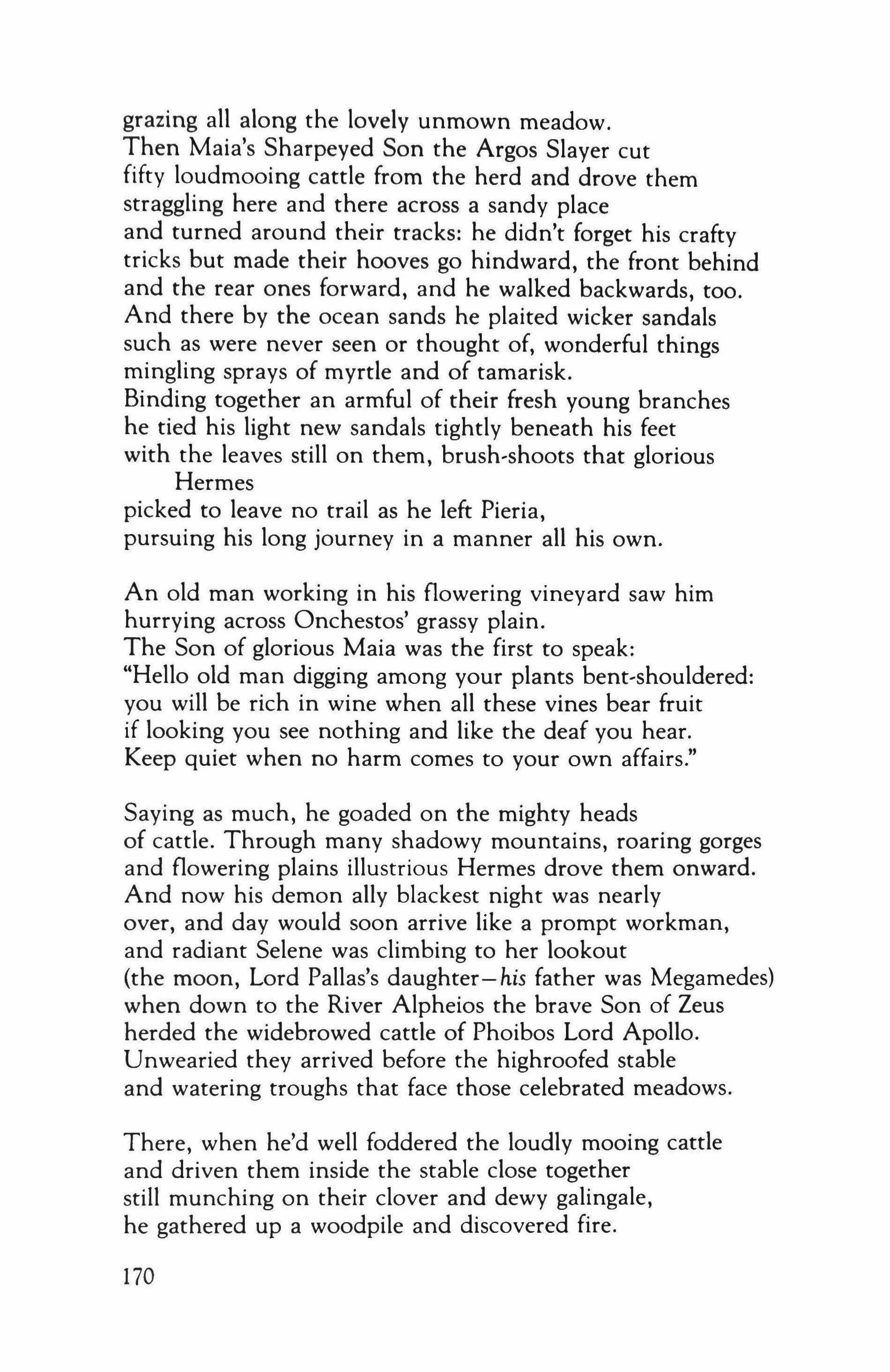
grazing all along the lovely unmown meadow. Then Maia's Sharpeyed Son the Argos Slayer cut fifty loudmooing cattle from the herd and drove them straggling here and there across a sandy place and turned around their tracks: he didn't forget his crafty tricks but made their hooves go hindward, the front behind and the rear ones forward, and he walked backwards, too. And there by the ocean sands he plaited wicker sandals such as were never seen or thought of, wonderful things mingling sprays of myrtle and of tamarisk.
Binding together an armful of their fresh young branches he tied his light new sandals tightly beneath his feet with the leaves still on them, brush-shoots that glorious Hermes
picked to leave no trail as he left Pieria, pursuing his long journey in a manner all his own.
An old man working in his flowering vineyard saw him hurrying across Onchestos' grassy plain. The Son of glorious Maia was the first to speak: "Hello old man digging among your plants bent-shouldered: you will be rich in wine when all these vines bear fruit if looking you see nothing and like the deaf you hear. Keep quiet when no harm comes to your own affairs."
Saying as much, he goaded on the mighty heads of cattle. Through many shadowy mountains, roaring gorges and flowering plains illustrious Hermes drove them onward. And now his demon ally blackest night was nearly over, and day would soon arrive like a prompt workman, and radiant Selene was climbing to her lookout (the moon, Lord Pallas's daughter-his father was Megamedes) when down to the River Alpheios the brave Son of Zeus herded the widebrowed cattle of Phoibos Lord Apollo. Unwearied they arrived before the highroofed stable and watering troughs that face those celebrated meadows.
There, when he'd well foddered the loudly mooing cattle and driven them inside the stable close together still munching on their clover and dewy galingale, he gathered up a woodpile and discovered fire. 170

Taking a branch of glorious laurel he stripped its bark, a knife fast in his hand, and the hot breath arose, for Hermes was the first to impart the craft of fire, gathering dry kindling and heaping full a pit hollowed in the ground. And the light shone far off as it sent up a mighty blast of blazing flame.
While the strength of Lord Hephaistos made the fire burn high he dragged two lowing longhorned cattle out the door and up close to the fire, and mighty was his power. He threw both to the ground, snorting, on their flanks, rolled them, bent back their necks, cut their throats to the spine and marrow. Then step by step he carved them into pieces, the meat well-marbled, pierced them on wooden skewers and started roasting them - haunches, prime steaks, and the liver, dense with dark blood, all together. There he laid them down and then stretched out the hides upon a jagged rock still there to this day: many years after this took place they have survived fused to the cliff. And then gladhearted Hermes drew his fine work from the spits onto a smooth flat stone and split it in twelve shares distributed by lot, each a perfect offering.
Then glorious Hermes lusted for the meat of sacrifice: its sweet fume wore him down, immortal though he is. But even so, his heroic heart would not consent, despite his lust, to let it pass down his sacred throat. Instead, he laid it all up in the highroofed stable, fat and flesh both, lifted into midair, raised there as a sign of his young theft. Then gathering more kindling he consumed the hooves and both heads utterly in fire. And when the god had finished all in proper order he hurled his sandals into the Alpheios' deep eddies, drenched the embers and leveled the ashes with the dust all night long. And from Selene fair light shone down.
Near dawn he went straight back again to the brilliant crests of Kvllene, and no one encountered him on that long journey,
171
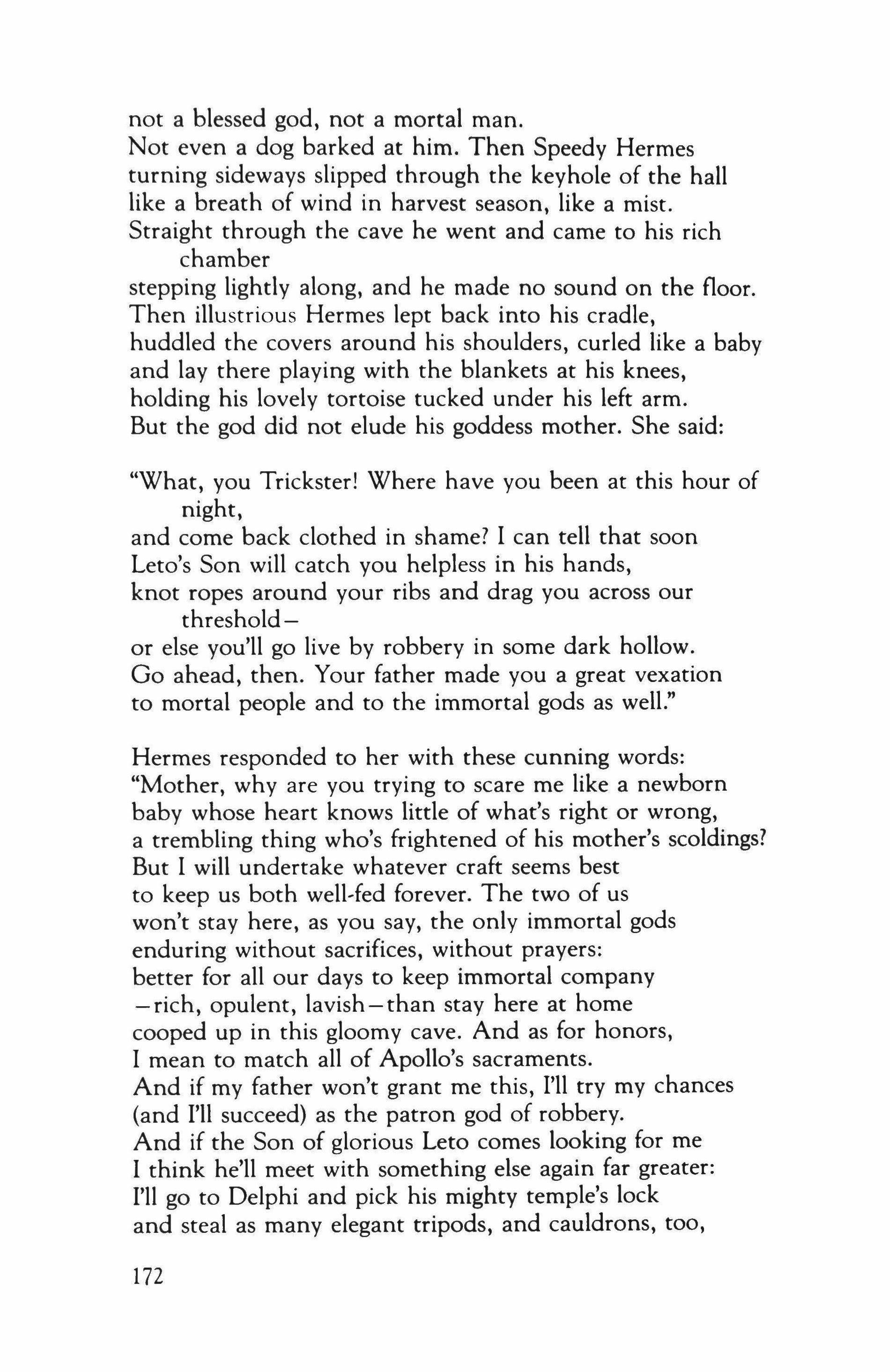
not a blessed god, not a mortal man. Not even a dog barked at him. Then Speedy Hermes turning sideways slipped through the keyhole of the hall like a breath of wind in harvest season, like a mist. Straight through the cave he went and came to his rich chamber stepping lightly along, and he made no sound on the floor. Then illustrious Hermes lept back into his cradle, huddled the covers around his shoulders, curled like a baby and lay there playing with the blankets at his knees, holding his lovely tortoise tucked under his left arm. But the god did not elude his goddess mother. She said:
"What, you Trickster! Where have you been at this hour of night, and come back clothed in shame? I can tell that soon Leto's Son will catch you helpless in his hands, knot ropes around your ribs and drag you across our thresholdor else you'll go live by robbery in some dark hollow. Go ahead, then. Your father made you a great vexation to mortal people and to the immortal gods as well."
Hermes responded to her with these cunning words: "Mother, why are you trying to scare me like a newborn baby whose heart knows little of what's right or wrong, a trembling thing who's frightened of his mother's scoldings? But I will undertake whatever craft seems best to keep us both well-fed forever. The two of us won't stay here, as you say, the only immortal gods enduring without sacrifices, without prayers: better for all our days to keep immortal company - rich, opulent, lavish - than stay here at home cooped up in this gloomy cave. And as for honors, I mean to match all of Apollo's sacraments. And if my father won't grant me this, I'll try my chances (and I'll succeed) as the patron god of robbery. And if the Son of glorious Leto comes looking for me I think he'll meet with something else again far greater: I'll go to Delphi and pick his mighty temple's lock and steal as many elegant tripods, and cauldrons, too,
172

and gold and ruddy iron, and all the splendid clothes I want - and you can watch me do it, if you like." So in these words the two of them addressed each other, the Son of .t£gisbearing Zeus and Mistress Maia.
But Dawn the Earlyborn who brings daylight to mortals ascended from deepflowing Ocean, and Apollo came to Onchestos on his way and the fair grove of the Loudroaring Earthenfolder, and found there an old man grazing an ox beside his vineyard hedge. The Son of glorious Leto was the first to speak: "Old man of meadowy Onchestos pulling weeds there, I've come here from Pieria in search of cattle from my herd, all females, all with crumpled horns. The black bull grazed alone, apart from all the others, but glad-eyed dogs accompanied the herd, four hounds like four men of one mind. But they were left behind there, both the dogs and the bull, which is a mighty wonder, and just as the sun went down my cattle disappeared out of their gentle meadow, leaving behind sweet pastures. Now tell me this, old man, have you seen anyone pass along this way accompanied by cows?"
The old man answered him, responding in these words: "My friend, it would be difficult to tell you all these eyes have seen, for many travelers come down this path, some with thoughts bent on evil, some on good, and all in a hurry, so that it's hard to recognize each one. But all day long until the sun set I was digging here around the foot of my hillside plot of vineyard, and I thought I saw a boy, sir, though I'm not clear about it, whoever he might be, and with him longhorned cattle - a little child, but he held a wand, and walking to and fro he drove them backwards, their heads facing him."
The old man spoke. Apollo heard and went more quickly down the road till he saw a longwinged bird of omen and right then recognized the thief was Zeus's child. Eagerly Zeus's Son Lord Apollo darted off to holy Pyles seeking his shamblefooted cattle, wrapping his broad shoulders in flickering stormcloud,
173
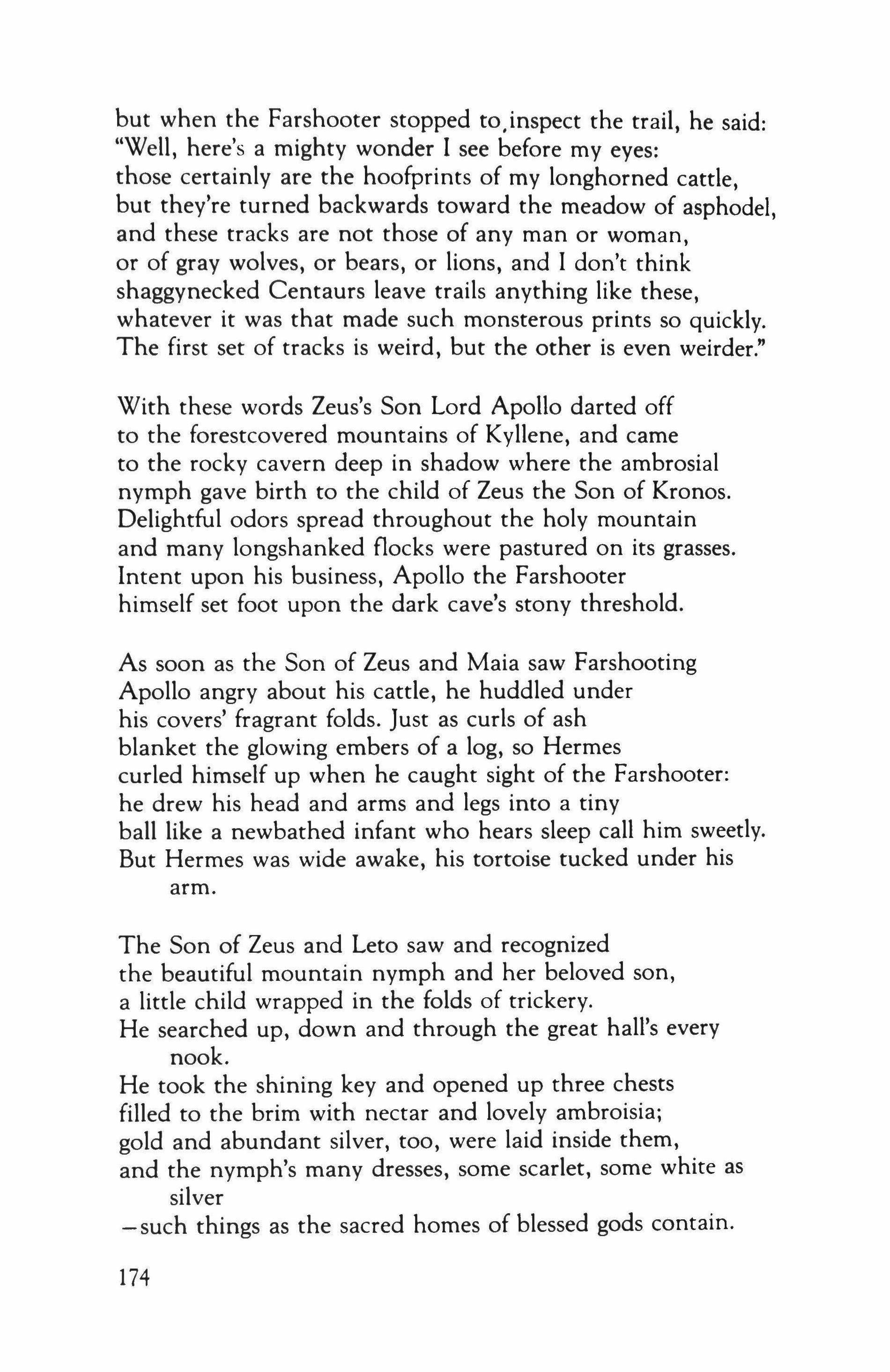
but when the Farshooter stopped toinspect the trail, he said: "Well, here's a mighty wonder I see before my eyes: those certainly are the hoofprints of my longhorned cattle, but they're turned backwards toward the meadow of asphodel, and these tracks are not those of any man or woman, or of gray wolves, or bears, or lions, and I don't think shaggynecked Centaurs leave trails anything like these, whatever it was that made such monsterous prints so quickly. The first set of tracks is weird, but the other is even weirder."
With these words Zeus's Son Lord Apollo darted off to the forestcovered mountains of Kvllene, and came to the rocky cavern deep in shadow where the ambrosial nymph gave birth to the child of Zeus the Son of Kronos. Delightful odors spread throughout the holy mountain and many longshanked flocks were pastured on its grasses. Intent upon his business, Apollo the Farshooter himself set foot upon the dark cave's stony threshold.
As soon as the Son of Zeus and Maia saw Farshooting Apollo angry about his cattle, he huddled under his covers' fragrant folds. Just as curls of ash blanket the glowing embers of a log, so Hermes curled himself up when he caught sight of the Farshooter: he drew his head and arms and legs into a tiny ball like a newbathed infant who hears sleep call him sweetly. But Hermes was wide awake, his tortoise tucked under his arm.
The Son of Zeus and Leto saw and recognized the beautiful mountain nymph and her beloved son, a little child wrapped in the folds of trickery. He searched up, down and through the great hall's every nook.
He took the shining key and opened up three chests filled to the brim with nectar and lovely arnbroisia: gold and abundant silver, too, were laid inside them, and the nymph's many dresses, some scarlet, some white as silver - such things as the sacred homes of blessed gods contain.
174
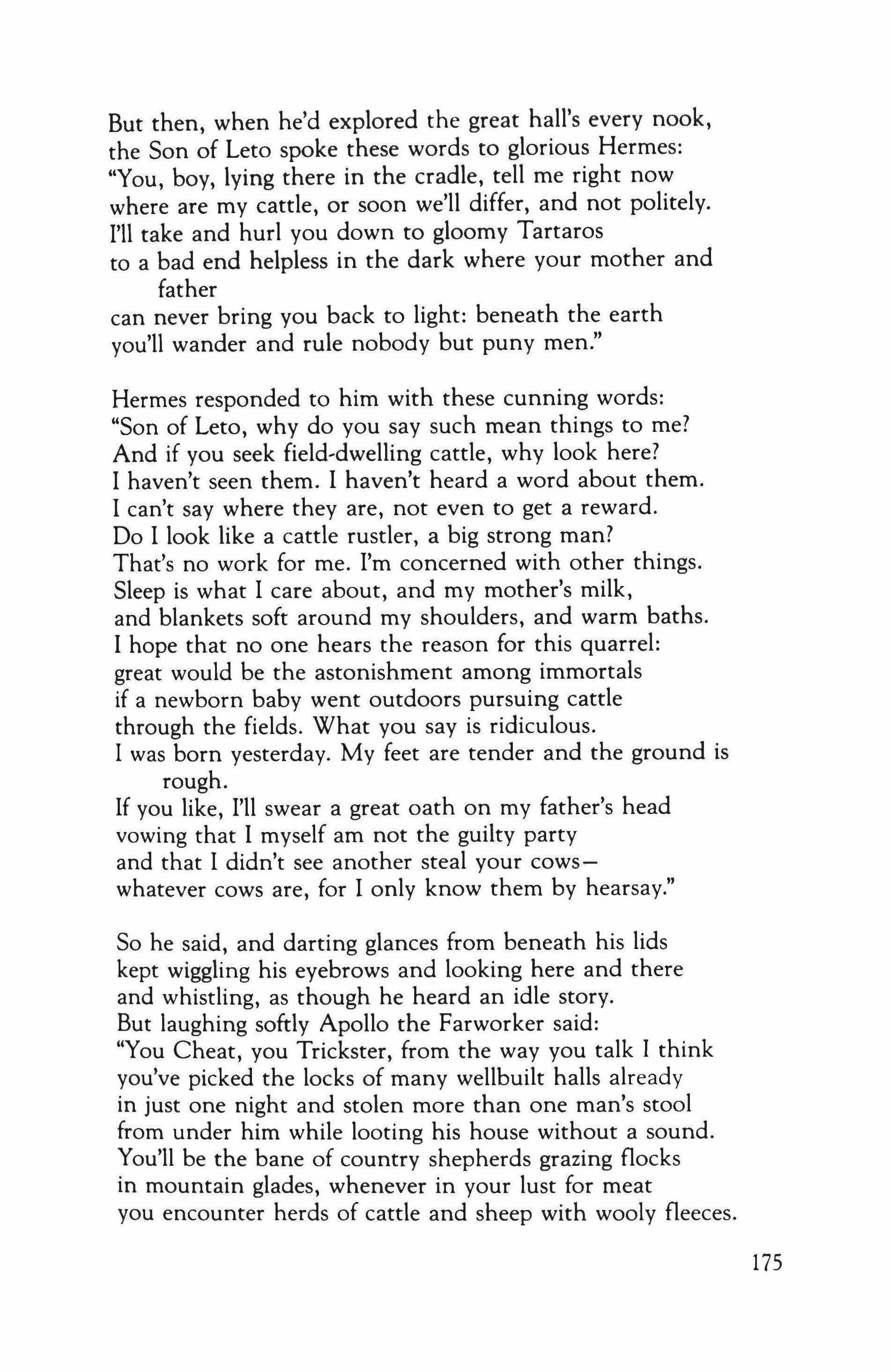
But then, when he'd explored the great hall's every nook, the Son of Leto spoke these words to glorious Hermes: "You, boy, lying there in the cradle, tell me right now where are my cattle, or soon we'll differ, and not politely. I'll take and hurl you down to gloomy Tartaros to a bad end helpless in the dark where your mother and father
can never bring you back to light: beneath the earth you'll wander and rule nobody but puny men."
Hermes responded to him with these cunning words: "Son of Leto, why do you say such mean things to me? And if you seek field-dwelling cattle, why look here? I haven't seen them. I haven't heard a word about them. I can't say where they are, not even to get a reward. Do I look like a cattle rustler, a big strong man? That's no work for me. I'm concerned with other things. Sleep is what I care about, and my mother's milk, and blankets soft around my shoulders, and warm baths. I hope that no one hears the reason for this quarrel: great would be the astonishment among immortals if a newborn baby went outdoors pursuing cattle through the fields. What you say is ridiculous. I was born yesterday. My feet are tender and the ground is rough.
If you like, I'll swear a great oath on my father's head vowing that I myself am not the guilty party and that I didn't see another steal your cowswhatever cows are, for I only know them by hearsay."
So he said, and darting glances from beneath his lids kept wiggling his eyebrows and looking here and there and whistling, as though he heard an idle story. But laughing softly Apollo the Farworker said: "You Cheat, you Trickster, from the way you talk I think you've picked the locks of many wellbuilt halls already in just one night and stolen more than one man's stool from under him while looting his house without a sound. You'll be the bane of country shepherds grazing flocks in mountain glades, whenever in your lust for meat you encounter herds of cattle and sheep with wooly fleeces.
175

But come, unless you want this sleep to be your last, climb out of that cradle, you Friend of Darkest Night, for henceforth you will bear that name among immortals and be called the Lord of Robbers for all your days."
So saying, Apollo took the child and started off. But then the mighty Argos Slayer conceived a plan and while Apollo held him in his arms sent forth an omen on the breeze, a pungent belly messenger, and sneezed right afterward. And when Apollo heard it out of his arms he dropped famed Hermes to the ground and though eager to be gone, sat down in front of him jeering at Hermes and addressed him in these words: "Take heart, you diapered baby Son of Zeus and Maia: I'll find my cattle soon, every mighty head, by these very omens, and you will lead the way."
So he said. Kyllenian Hermes sprang up at once, intent on going; with his hands he pulled the blanket wrapped around his shoulders up to both ears and said: "Where are you taking me, Farworker, rashest of gods? Is it your cattle make you so angry that you mistreat me? I wish the whole breed would die out. It wasn't me who stole your cows, and I saw no one else who might havewhatever cows are, for I only know them by hearsay. I want a trial. Take me to Zeus the Son of Kronos."
And when they'd argued it over point by point again, Hermes the Shepherd and the radiant Son of Leto, still they couldn't agree: Apollo told the truth, that he justly detained glorious Hermes for rustling cattle, but the Kyllenian crafted tricks and wheedling arguments hoping to deceive the God of the Silver Bow.
But when he found Apollo as prepared to thwart him as he was to dodge, he marched off quickly across the sands in front, and behind him came the Son of Zeus and Leto.
Soon Zeus's beautiful children reached the fragrant peak of Olympos and came before their father, Kronos' Son. There were the scales of justice poised before them both. Snowy Olympos was all harmony; the undying
176
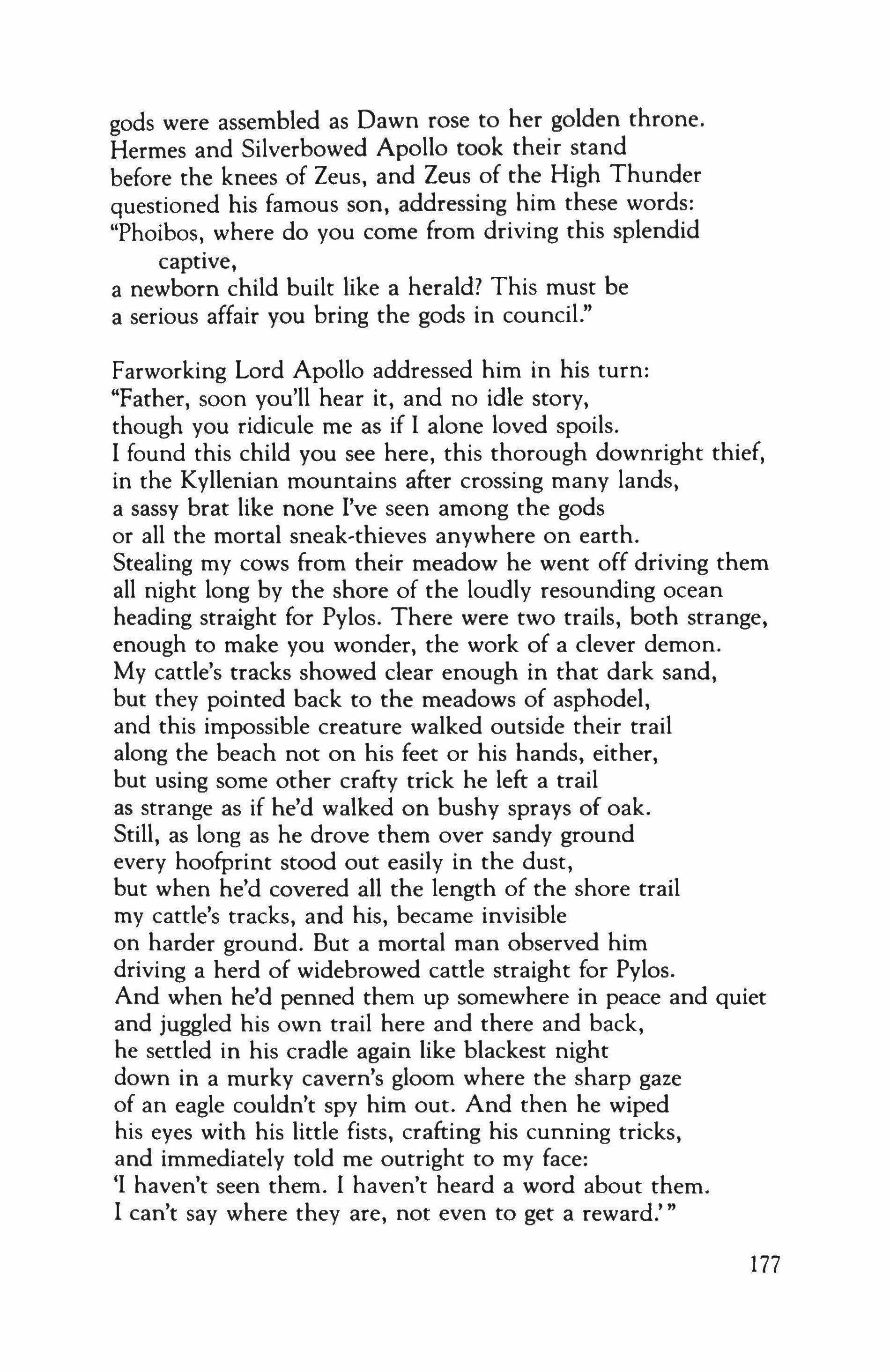
gods were assembled as Dawn rose to her golden throne. Hermes and Silverbowed Apollo took their stand before the knees of Zeus, and Zeus of the High Thunder questioned his famous son, addressing him these words: "Phoibos, where do you come from driving this splendid captive, a newborn child built like a herald? This must be a serious affair you bring the gods in council."
Farworking Lord Apollo addressed him in his turn: "Father, soon you'll hear it, and no idle story, though you ridicule me as if I alone loved spoils. I found this child you see here, this thorough downright thief, in the Kyllenian mountains after crossing many lands, a sassy brat like none I've seen among the gods or all the mortal sneak-thieves anywhere on earth. Stealing my cows from their meadow he went off driving them all night long by the shore of the loudly resounding ocean heading straight for Pylos. There were two trails, both strange, enough to make you wonder, the work of a clever demon. My cattle's tracks showed clear enough in that dark sand, but they pointed back to the meadows of asphodel, and this impossible creature walked outside their trail along the beach not on his feet or his hands, either, but using some other crafty trick he left a trail as strange as if he'd walked on bushy sprays of oak. Still, as long as he drove them over sandy ground every hoofprint stood out easily in the dust, but when he'd covered all the length of the shore trail my cattle's tracks, and his, became invisible on harder ground. But a mortal man observed him driving a herd of widebrowed cattle straight for Pylos. And when he'd penned them up somewhere in peace and quiet and juggled his own trail here and there and back, he settled in his cradle again like blackest night down in a murky cavern's gloom where the sharp gaze of an eagle couldn't spy him out. And then he wiped his eyes with his little fists, crafting his cunning tricks, and immediately told me outright to my face: 'I haven't seen them. I haven't heard a word about them. I can't say where they are, not even to get a reward.'"
177
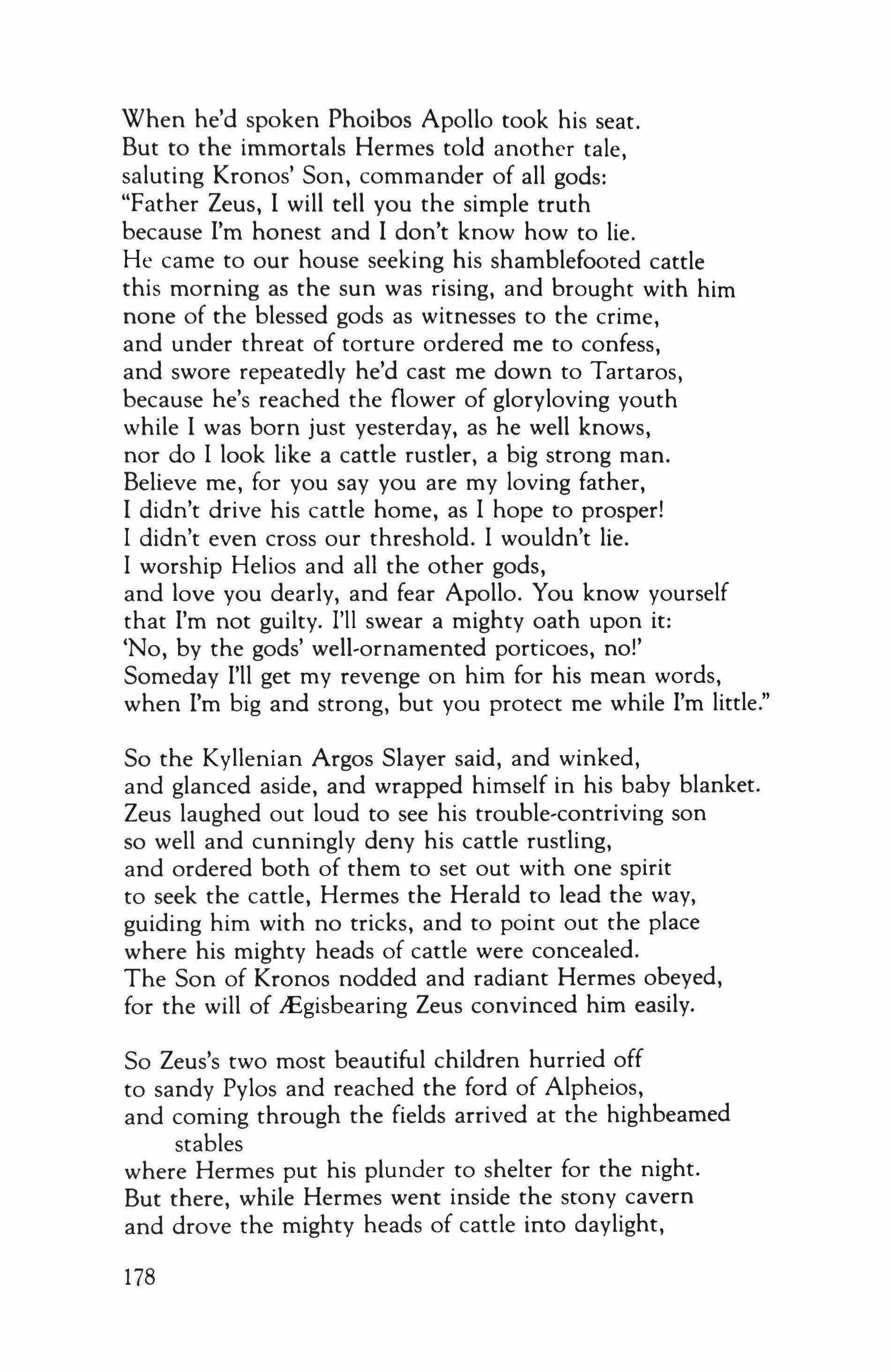
When he'd spoken Phoibos Apollo took his seat. But to the immortals Hermes told another tale, saluting Kronos' Son, commander of all gods: "Father Zeus, I will tell you the simple truth because I'm honest and I don't know how to lie. He came to our house seeking his shamblefooted cattle this morning as the sun was rising, and brought with him none of the blessed gods as witnesses to the crime, and under threat of torture ordered me to confess, and swore repeatedly he'd cast me down to Tartaros, because he's reached the flower of gloryloving youth while I was born just yesterday, as he well knows, nor do I look like a cattle rustler, a big strong man.
Believe me, for you say you are my loving father, I didn't drive his cattle home, as I hope to prosper! I didn't even cross our threshold. I wouldn't lie. I worship Helios and all the other gods, and love you dearly, and fear Apollo. You know yourself that I'm not guilty. I'll swear a mighty oath upon it: 'No, by the gods' well-ornamented porticoes, no!' Someday I'll get my revenge on him for his mean words, when I'm big and strong, but you protect me while I'm little."
So the Kvllenian Argos Slayer said, and winked, and glanced aside, and wrapped himself in his baby blanket. Zeus laughed out loud to see his trouble-contriving son so well and cunningly deny his cattle rustling, and ordered both of them to set out with one spirit to seek the cattle, Hermes the Herald to lead the way, guiding him with no tricks, and to point out the place where his mighty heads of cattle were concealed. The Son of Kronos nodded and radiant Hermes obeyed, for the will of lEgisbearing Zeus convinced him easily.
So Zeus's two most beautiful children hurried off to sandy Pvlos and reached the ford of Alpheios, and coming through the fields arrived at the highbeamed stables where Hermes put his plunder to shelter for the night. But there, while Hermes went inside the stony cavern and drove the mighty heads of cattle into daylight,
178

the Son of Leto looked aside and saw the cowhides on the cliff face and at once asked glorious Hermes: "Where did you find the strength, Trickster, to flay two cattle, a newborn baby like you? I'm scared to think what power you'd have, full grown. Son of Maia, Kvllenian Hermes, there's no need for you to grow much bigger."
So he said, and started plaiting strong osier ropes, but from the ground before his feet shot up fresh growths twisting together, intertangling all the cattle by the will of Hermes Who Steals Wits. Apollo was astonished to behold it, but meanwhile mighty Hermes Slayer of Argos glanced around the place to hide the sparkle in his eyes, and easily he gentled glorious Leto's Son the Farshooter to his wishes, strong though he is. Taking his lyre in his left hand with a pick he tuned it string by string: beneath his fingers it resounded awesomely, and Phoibos Apollo started to smile as the lovely rush of its godgiven voice entered his spirit, and sweet longing seized his soul as he kept listening. Then striking up a lustier tune Maia's Son took courage and stood at the left hand of Phoibos Apollo. And soon to the clear notes of the lyre he began to sing a prelude, in a lovely voice celebrating the immortal gods and the dark earth, telling how they were born and the fate allotted each. Mnemosyne first of gods he glorified in song, Memory, Mother of Muses, for Hermes is her own. Then from the eldest and according to their birth the radiant Son of Zeus praised the immortal gods, telling stories on each in order, playing the lyre.
Irresistible desire possessed Apollo's soul and he spoke, addressing him these winged words: "Cattlekiller, hardworking inventor, feasting companion, this song of yours is worth all of my fifty cattle. We can settle our differences peacefully, I think. But come now, Son of Maia, you child of many moods, tell me: was this amazing invention yours from birth or did one of the immortals or of mortal men
179

give you this noble gift and teach you its godly music? This astonishing new sound I heard just now I'm certain no one ever knew before, not men nor the immortal gods who dwell upon Olvmpos, no one but you, thieving Son of Zeus and Maia. What craft, what muse of troubles without remedy, what path have you found here? For surely there are three things worth choosing: good company and love and sweetest sleep. I am myself a follower of the Olympian Muses who love choruses and the radiant path of song, flourishing dances and the lovely thrill of flutes, but never was my heart so taken by those arts at young men's festivals as it is now by this. Son of Zeus, I'm amazed how seductively you play. But now, since though you're little, you understand the art, sit down and listen, brother, to your elders' words. Now honor will be yours among immortal gods, and your mother's, too. And truly I tell you this: by this staff of cornel-wood I'll seat you as a leader famous and fortunate among immortals, and give you radiant gifts, and to the end I'll never cheat you."
Hermes responded to him with these cunning words: "You question me cleverly, Farworker, but I won't grudge you initiation into this craft of mine. This very day you'll learn it. I want to be kind to you in thought and speech, for your heart understands all things since you sit first among immortals, Son of Zeus, brave and strong, and Zeus the Counselor loves you past everything holy, and has given you radiant gifts: they say you've learned theology from Zeus's lips, and prophecy, Farworker, all his divine decrees. But of this art that I've just recently discovered it's yours to choose and learn whatever you desire. Since your heart so leaps at the thought of playing the lyre, Sing! Play! Prepare the festivities! Take it all as my gift, and in return, friend, give me the credit. With this clear-voiced companion in your arms, you'll sing well: you're an expert already at saying the proper thing nicely.
180
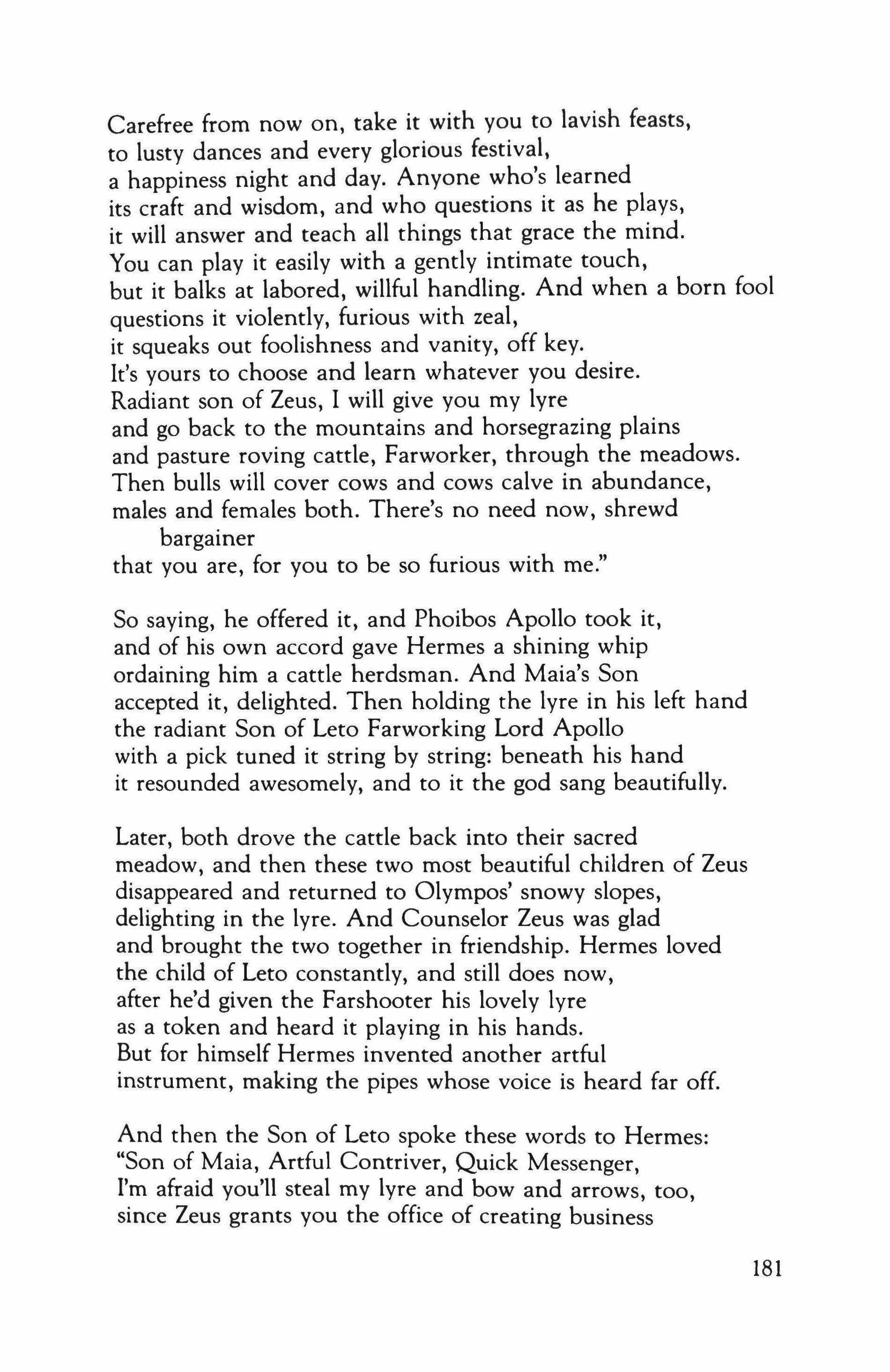
Carefree from now on, take it with you to lavish feasts, to lusty dances and every glorious festival, a happiness night and day. Anyone who's learned its craft and wisdom, and who questions it as he plays, it will answer and teach all things that grace the mind. You can play it easily with a gently intimate touch, but it balks at labored, willful handling. And when a born fool questions it violently, furious with zeal, it squeaks out foolishness and vanity, off key. It's yours to choose and learn whatever you desire.
Radiant son of Zeus, I will give you my lyre and go back to the mountains and horsegrazing plains and pasture roving cattle, Farworker, through the meadows. Then bulls will cover cows and cows calve in abundance, males and females both. There's no need now, shrewd bargainer that you are, for you to be so furious with me."
So saying, he offered it, and Phoibos Apollo took it, and of his own accord gave Hermes a shining whip ordaining him a cattle herdsman. And Maia's Son accepted it, delighted. Then holding the lyre in his left hand the radiant Son of Leto Farworking Lord Apollo with a pick tuned it string by string: beneath his hand it resounded awesomely, and to it the god sang beautifully.
Later, both drove the cattle back into their sacred meadow, and then these two most beautiful children of Zeus disappeared and returned to Olympos' snowy slopes, delighting in the lyre. And Counselor Zeus was glad and brought the two together in friendship. Hermes loved the child of Leto constantly, and still does now, after he'd given the Farshooter his lovely lyre as a token and heard it playing in his hands. But for himself Hermes invented another artful instrument, making the pipes whose voice is heard far off.
And then the Son of Leto spoke these words to Hermes: "Son of Maia, Artful Contriver, Quick Messenger, I'm afraid you'll steal my lyre and bow and arrows, too, since Zeus grants you the office of creating business
181
customs among people throughout the fertile earth, but if you swear you won't, and take the gods' great oath, - just nod your head or name the Styx's heavy watersyou'll make my gratitude and happiness complete." And then the Son of Maia nodded and gave his promise never to steal anything the Farshooter owned and not even to go near his solid house, and Apollo the Son of Leto consented to this league and friendship.
So Lord Apollo befriended Maia's Son and showed him every kindness. And Kronos' Son gave him grace besides. He is acquainted with all mortals and immortals. He's not much help, and he cheats constantly and thieves in the dead of night among all tribes of mortal men.
And so goodbye for now, 0 Son of Zeus and Maia, but I'll remember you again in another song.
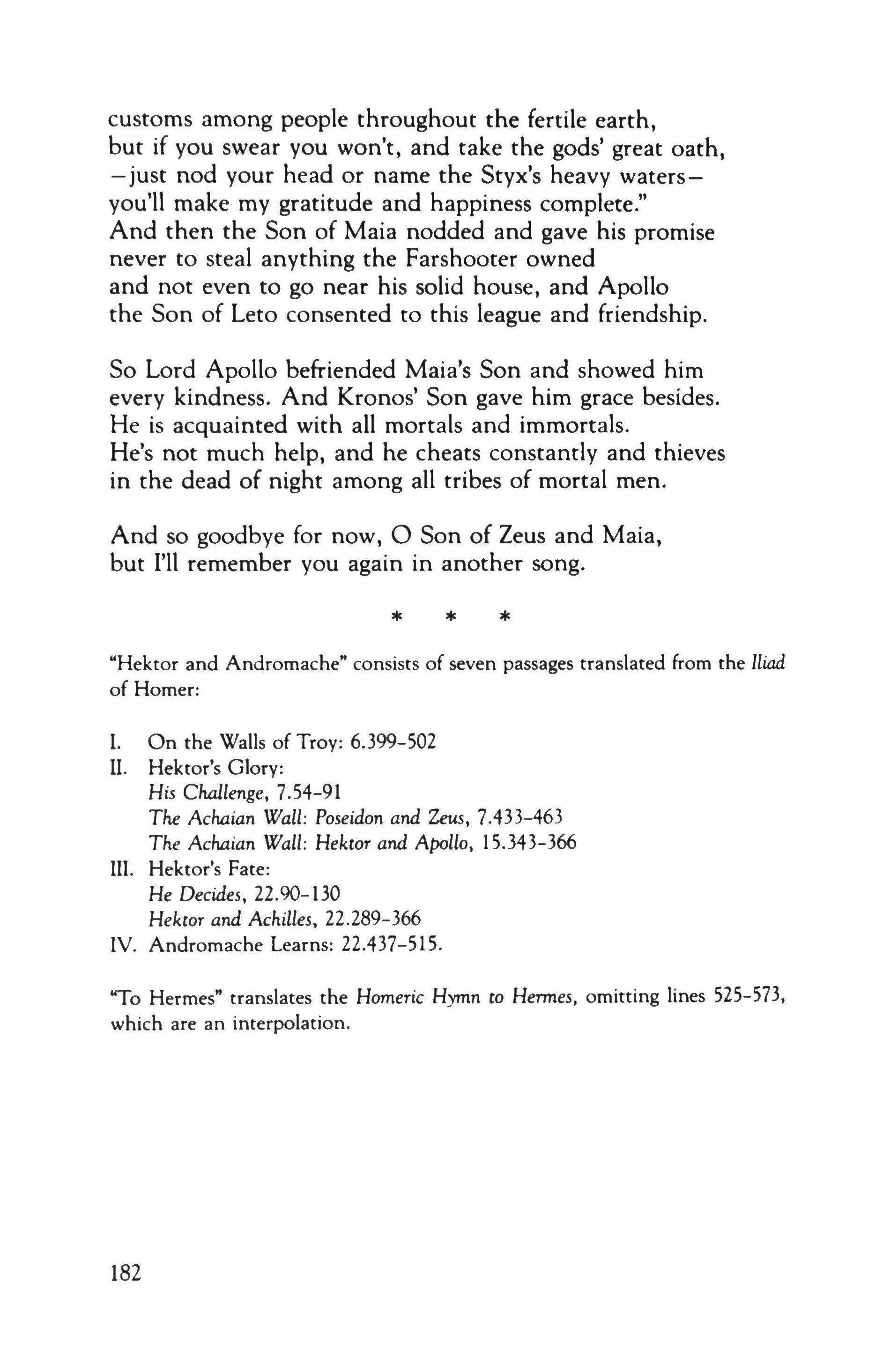
"Hektor and Andromache" consists of seven passages translated from the Iliad of Homer:
I. On the Walls of Troy: 6.399-502
II. Hektor's Glory:
His Challenge, 7.54-91
The Achaian Wall: Poseidon and Zeus, 7.433-463
The Achaian Wall: Hektor and Apollo, 15.343-366
III. Hektor's Fate:
He Decides, 22.90-130
Hektor and Achilles, 22.289-366
IV. Andromache Learns: 22.437-515.
"To Hermes" translates the Homeric Hymn to Hermes, omitting lines 525-573, which are an interpolation.
* * *
182
The City as Text: New York and the American Writer
Morris Dickstein
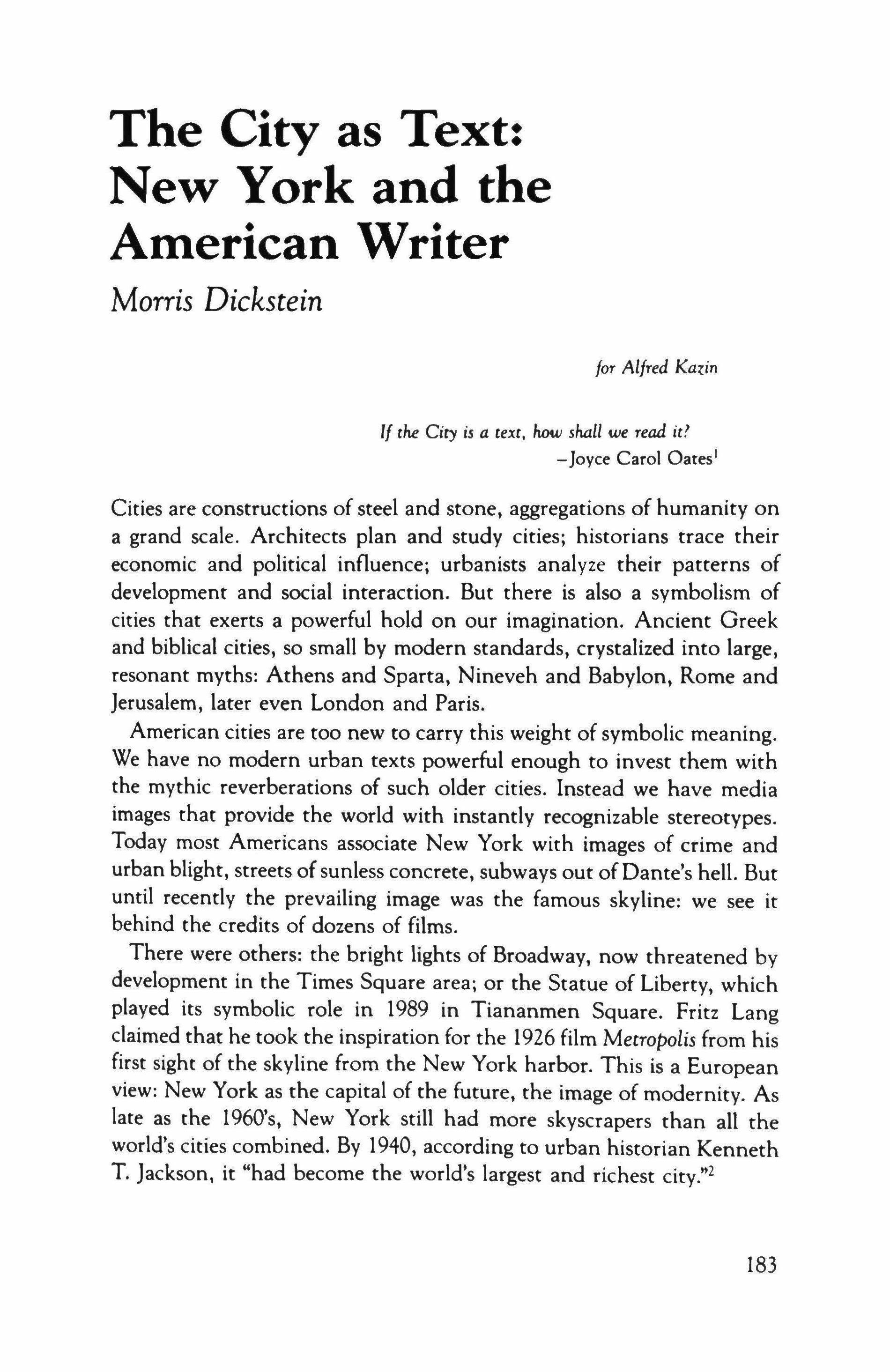 for Alfred Ka?:in
for Alfred Ka?:in
If the Ciry is a text, how shall we read it?
- Joyce Carol Oates'
Cities are constructions of steel and stone, aggregations of humanity on a grand scale. Architects plan and study cities; historians trace their economic and political influence; urbanists analyze their patterns of development and social interaction. But there is also a symbolism of cities that exerts a powerful hold on our imagination. Ancient Greek and biblical cities, so small by modern standards, crystalized into large, resonant myths: Athens and Sparta, Nineveh and Babylon, Rome and Jerusalem, later even London and Paris.
American cities are too new to carry this weight of symbolic meaning. We have no modern urban texts powerful enough to invest them with the mythic reverberations of such older cities. Instead we have media images that provide the world with instantly recognizable stereotypes. Today most Americans associate New York with images of crime and urban blight, streets of sunless concrete, subways out ofDante's hell. But until recently the prevailing image was the famous skyline: we see it behind the credits of dozens of films.
There were others: the bright lights of Broadway, now threatened by development in the Times Square area; or the Statue of Liberty, which played its symbolic role in 1989 in Tiananmen Square. Fritz Lang claimed that he took the inspiration for the 1926 film Metropolis from his first sight of the skyline from the New York harbor. This is a European view: New York as the capital of the future, the image of modernity. As late as the 1960's, New York still had more skyscrapers than all the world's cities combined. By 1940, according to urban historian Kenneth T. Jackson, it "had become the world's largest and richest city,'?
183
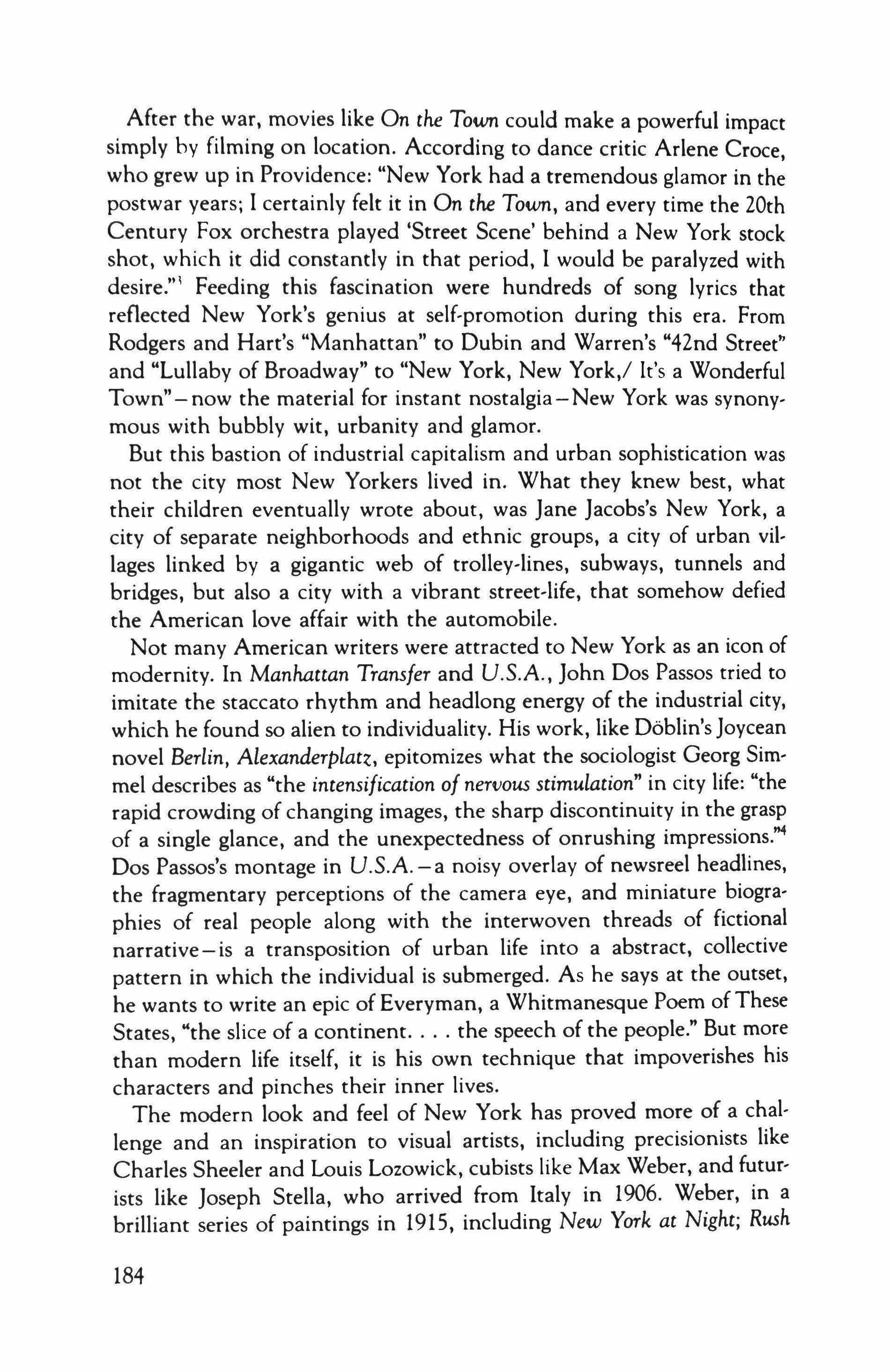
After the war, movies like On the Town could make a powerful impact simply hy filming on location. According to dance critic Arlene Croce, who grew up in Providence: "New York had a tremendous glamor in the postwar years; I certainly felt it in On the Town, and every time the 20th Century Fox orchestra played 'Street Scene' behind a New York stock shot, which it did constantly in that period, I would be paralyzed with desire."1 Feeding this fascination were hundreds of song lyrics that reflected New York's genius at self-promotion during this era. From Rodgers and Hart's "Manhattan" to Dubin and Warren's "42nd Street" and "Lullaby of Broadway" to "New York, New York/It's a Wonderful Town" - now the material for instant nostalgia - New York was synonymous with bubbly wit, urbanity and glamor.
But this bastion of industrial capitalism and urban sophistication was not the city most New Yorkers lived in. What they knew best, what their children eventually wrote about, was Jane Jacobs's New York, a city of separate neighborhoods and ethnic groups, a city of urban villages linked by a gigantic web of trolley-lines, subways, tunnels and bridges, but also a city with a vibrant street-life, that somehow defied the American love affair with the automobile.
Not many American writers were attracted to New York as an icon of modernity. In Manhattan Transfer and U.S.A., John Dos Passos tried to imitate the staccato rhythm and headlong energy of the industrial city, which he found so alien to individuality. His work, like Doblin's Joycean novel Berlin, Alexanderplatz, epitomizes what the sociologist Georg Simmel describes as "the intensification of nervous stimulation" in city life: "the rapid crowding of changing images, the sharp discontinuity in the grasp of a single glance, and the unexpectedness of onrushing impressions." Dos Passos's montage in U.S.A. -a noisy overlay of newsreel headlines, the fragmentary perceptions of the camera eye, and miniature biographies of real people along with the interwoven threads of fictional narrative - is a transposition of urban life into a abstract, collective pattern in which the individual is submerged. As he says at the outset, he wants to write an epic of Everyman, a Whitmanesque Poem of These States, "the slice of a continent the speech of the people." But more than modern life itself, it is his own technique that impoverishes his characters and pinches their inner lives.
The modern look and feel of New York has proved more of a challenge and an inspiration to visual artists, including precisionists like Charles Sheeler and Louis Lozowick, cubists like Max Weber, and futurists like Joseph Stella, who arrived from Italy in 1906. Weber, in a brilliant series of paintings in 1915, including New York at Night; Rush
184
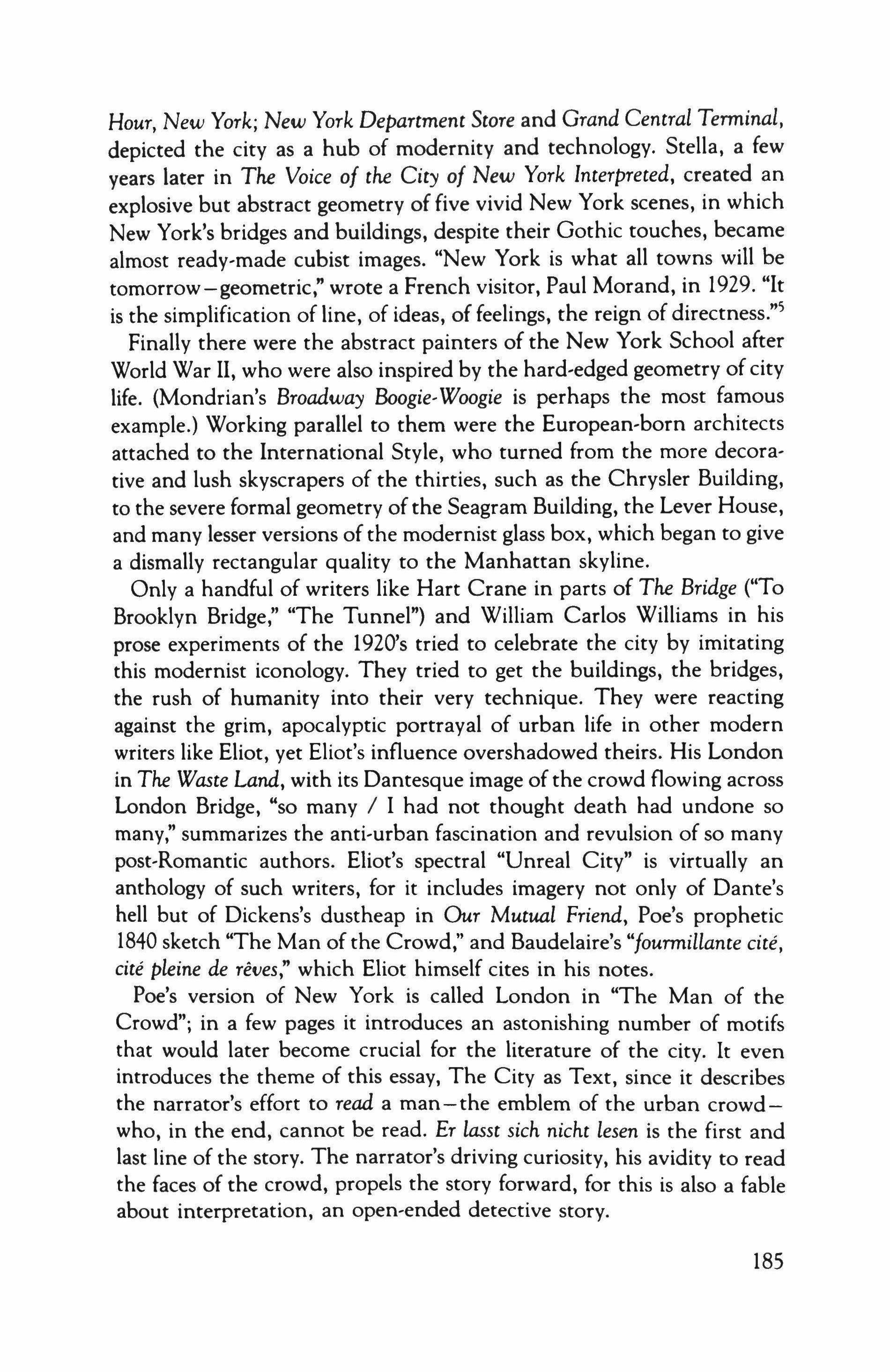
Hour, New York; New York Department Store and Grand Central Terminal, depicted the city as a hub of modernity and technology. Stella, a few years later in The Voice of the City of New York Interpreted, created an explosive but abstract geometry of five vivid New York scenes, in which New York's bridges and buildings, despite their Gothic touches, became almost ready-made cubist images. "New York is what all towns will be tomorrow-geometric," wrote a French visitor, Paul Morand, in 1929. "It is the simplification of line, of ideas, of feelings, the reign of directness."
Finally there were the abstract painters of the New York School after World War II, who were also inspired by the hard-edged geometry of city life. (Mondrian's Broadway Boogie-Woogie is perhaps the most famous example.) Working parallel to them were the European-born architects attached to the International Style, who turned from the more decorative and lush skyscrapers of the thirties, such as the Chrysler Building, to the severe formal geometry ofthe Seagram Building, the Lever House, and many lesser versions of the modernist glass box, which began to give a dismally rectangular quality to the Manhattan skyline.
Only a handful of writers like Hart Crane in parts of The Bridge ("To Brooklyn Bridge," "The Tunnel") and William Carlos Williams in his prose experiments of the 1920's tried to celebrate the city by imitating this modernist iconology. They tried to get the buildings, the bridges, the rush of humanity into their very technique. They were reacting against the grim, apocalyptic portrayal of urban life in other modern writers like Eliot, yet Eliot's influence overshadowed theirs. His London in The Waste Land, with its Dantesque image of the crowd flowing across London Bridge, "so many / I had not thought death had undone so many," summarizes the anti-urban fascination and revulsion of so many post-Romantic authors. Eliot's spectral "Unreal City" is virtually an anthology of such writers, for it includes imagery not only of Dante's hell but of Dickens's dustheap in Our Mutual Friend, Poe's prophetic 1840 sketch "The Man of the Crowd," and Baudelaire's "fourmillante cite, cite pleine de refJes," which Eliot himself cites in his notes. Poe's version of New York is called London in "The Man of the Crowd"; in a few pages it introduces an astonishing number of motifs that would later become crucial for the literature of the city. It even introduces the theme of this essay, The City as Text, since it describes the narrator's effort to read a man - the emblem of the urban crowdwho, in the end, cannot be read. Er lasst sich nicht lesen is the first and last line of the story. The narrator's driving curiosity, his avidity to read the faces of the crowd, propels the story forward, for this is also a fable about interpretation, an open-ended detective story.
185
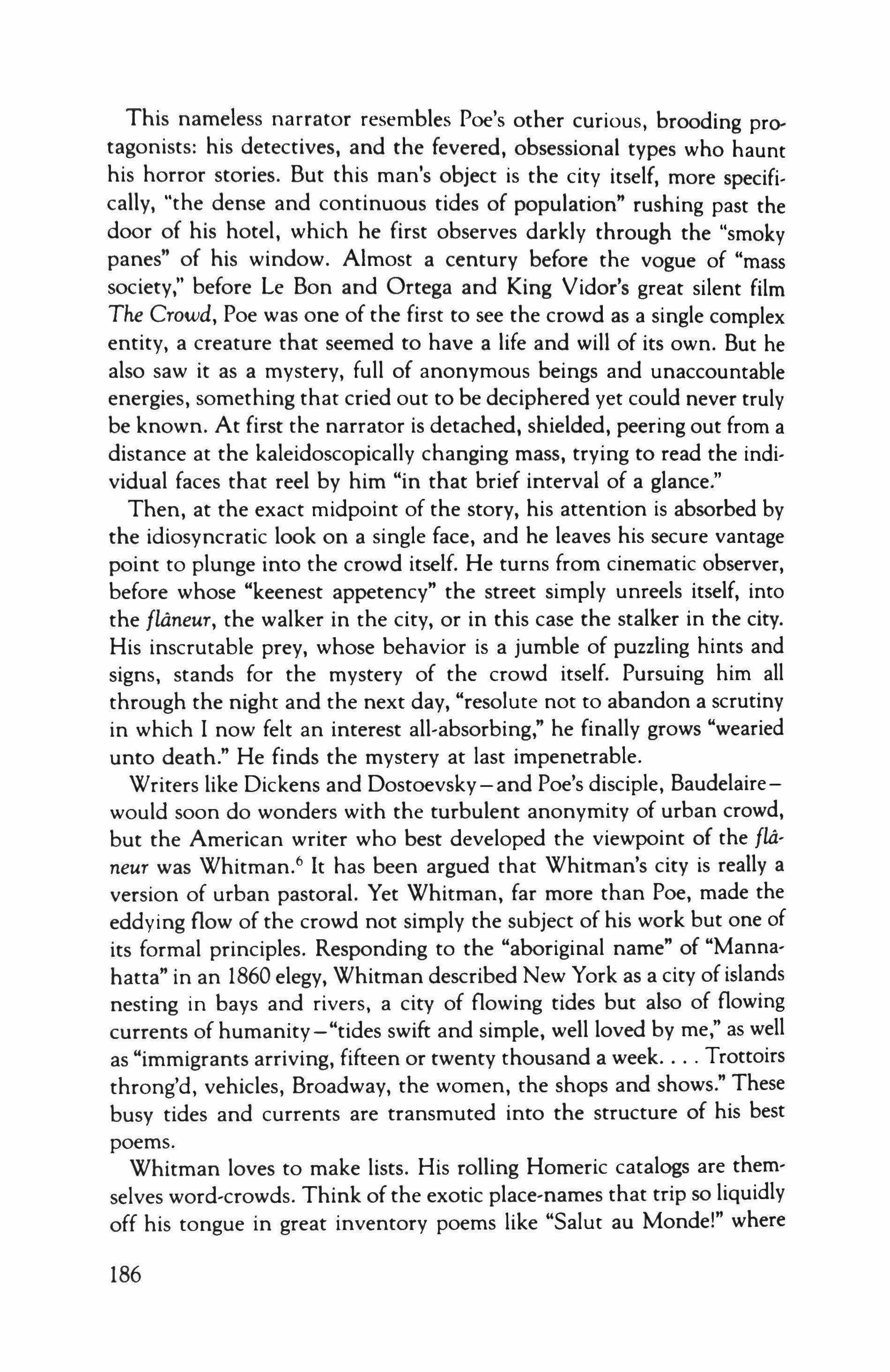
This nameless narrator resembles Poe's other curious, brooding protagonists: his detectives, and the fevered, obsessional types who haunt his horror stories. But this man's object is the city itself, more specifically, "the dense and continuous tides of population" rushing past the door of his hotel, which he first observes darkly through the "smoky panes" of his window. Almost a century before the vogue of "mass society," before Le Bon and Ortega and King Vidor's great silent film The Crowd, Poe was one of the first to see the crowd as a single complex entity, a creature that seemed to have a life and will of its own. But he also saw it as a mystery, full of anonymous beings and unaccountable energies, something that cried out to be deciphered yet could never truly be known. At first the narrator is detached, shielded, peering out from a distance at the kaleidoscopically changing mass, trying to read the individual faces that reel by him "in that brief interval of a glance."
Then, at the exact midpoint of the story, his attention is absorbed by the idiosyncratic look on a single face, and he leaves his secure vantage point to plunge into the crowd itself. He turns from cinematic observer, before whose "keenest appetency" the street simply unreels itself, into the flaneur, the walker in the city, or in this case the stalker in the city. His inscrutable prey, whose behavior is a jumble of puzzling hints and signs, stands for the mystery of the crowd itself. Pursuing him all through the night and the next day, "resolute not to abandon a scrutiny in which I now felt an interest all-absorbing," he finally grows "wearied unto death." He finds the mystery at last impenetrable.
Writers like Dickens and Dostoevsky-and Poe's disciple, Baudelairewould soon do wonders with the turbulent anonymity of urban crowd, but the American writer who best developed the viewpoint of the flaneur was Whitman.6 It has been argued that Whitman's city is really a version of urban pastoral. Yet Whitman, far more than Poe, made the eddying flow of the crowd not simply the subject of his work but one of its formal principles. Responding to the "aboriginal name" of "Mannahatta" in an 1860 elegy, Whitman described New York as a city of islands nesting in bays and rivers, a city of flowing tides but also of flowing currents of humanity - "tides swift and simple, well loved by me," as well as "immigrants arriving, fifteen or twenty thousand a week Trottoirs rhrong'd, vehicles, Broadway, the women, the shops and shows." These busy tides and currents are transmuted into the structure of his best poems.
Whitman loves to make lists. His rolling Homeric catalogs are themselves word-crowds. Think of the exotic place'names that trip so liquidly off his tongue in great inventory poems like "Salut au Monde!" where
186
Whitman becomes the flaneur in orbit, reeling off an immense geography, encircling the globe as he had circled the city. Whitman ingests the country and the city, the rivers and the mountains. But the ebb and flow of what Whitman names in these poems, those words that taste so good to him, infuse the whole rhythm and substance of greater poems such as "Song of Myself" and "Crossing Brooklyn Ferry."
If Whitman is not fully a city poet, it's because he takes in city activity as he takes up everything else, as part of an endless current through which he reaches out to the world and assimilates it to himself: "To me the converging objects of the universe perpetually flow," he says in "Song of Myself." Yet unlike many poets who preceded him, who felt swamped and nullified by city life, Whitman takes pleasure in this current, revels in its diversity. For Wordsworth in the seventh book of The Prelude, London was summed up in the freakish carnival of St. Bartholomew's Fair, melting individual identity into a monstrous amalgam. But Whitman, for all his stress on selfhood, on personality, relishes the undifferentiated quality of the urban mass. Wordsworth in London feels depressed, spiritually starved, under threat of dissolution. For Whitman this chaos is a plenitude, a blurring of the hard boundaries of the self, the separations of space and time.
Whitman assimilates the city to the rhythm of physical activity, not just the movement of the body but the systole and diastole of its inner pulsations. He personalizes the crowd without individualizing any member of it, not even himself. The "Calamus" poems, at once both sexual and political, express his dream of "a new city of friends," a community which is both plebeian and sensual. Does he takes his pen in hand, he asks, to record
the vaunted glory and growth of the great city spread around me?no; But merely of two simple men 1 saw to-day on the pier in the midst of the crowd, parting the parting of dear friends
("What Think You 1 Take My Pen in Hand?")
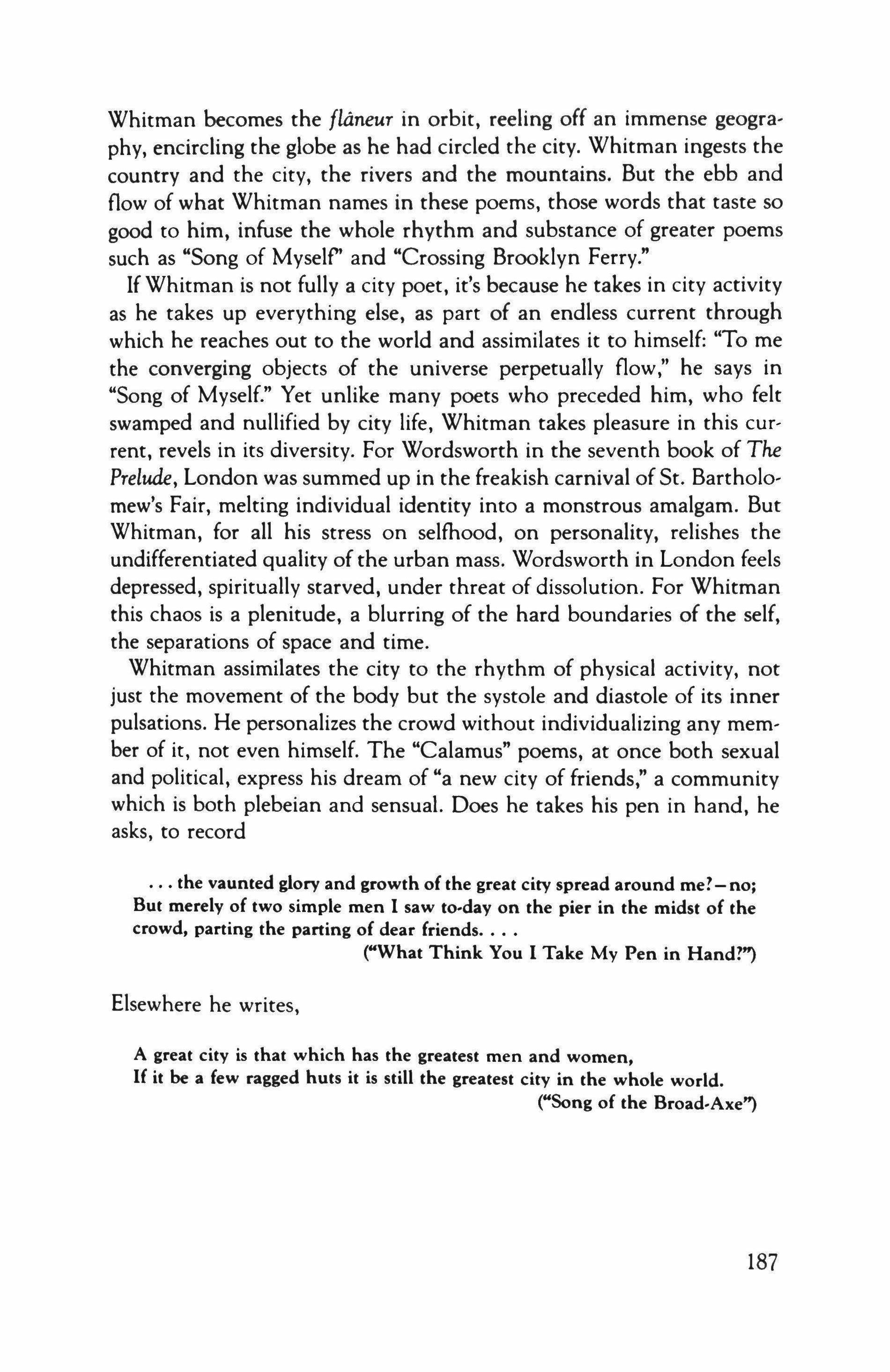
Elsewhere he writes,
A great city is that which has the greatest men and women, If it be a few ragged huts it is still the greatest city in the whole world. ("Song of the Broad-Axe")
187
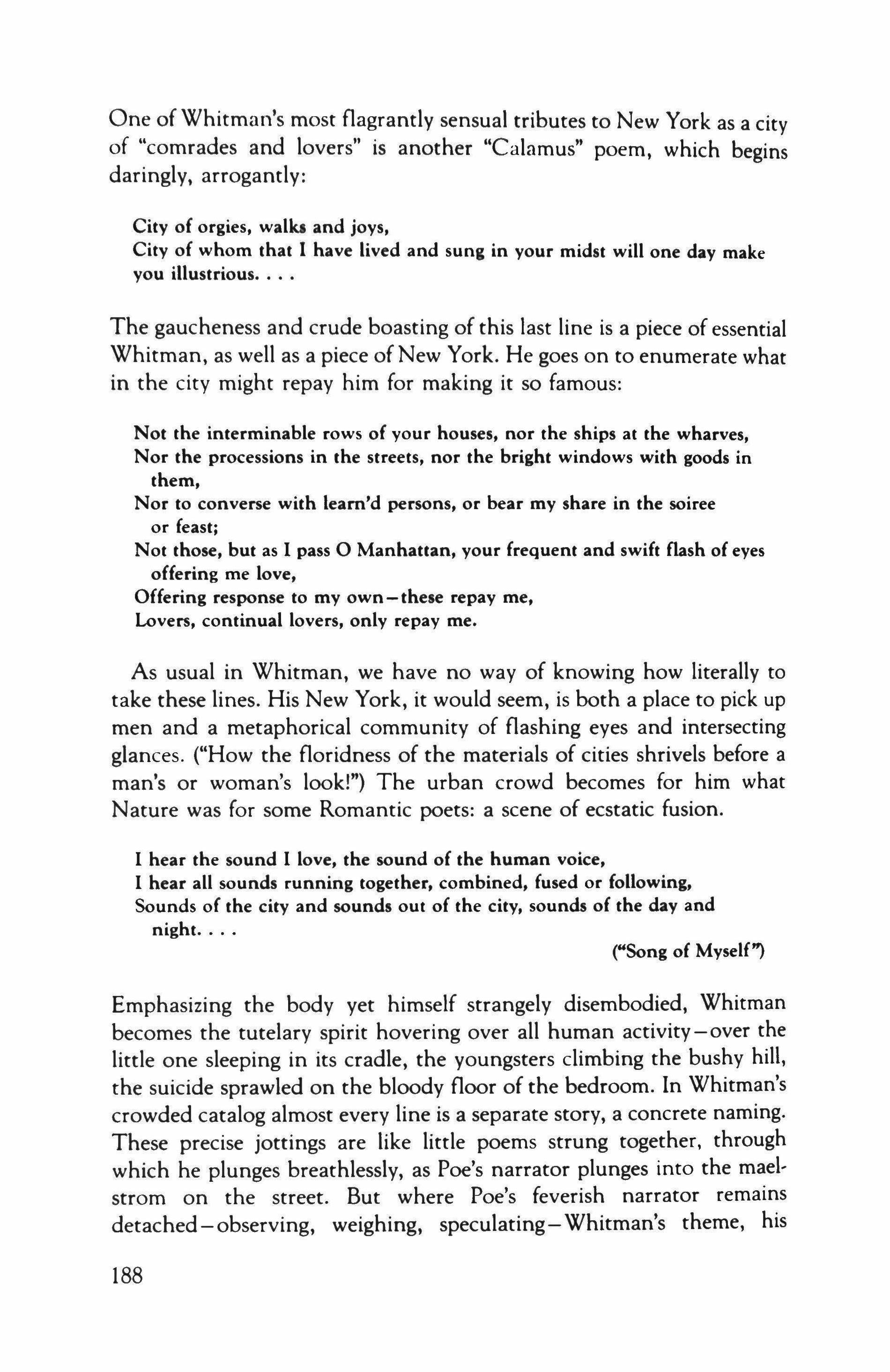
One of Whitman's most flagrantly sensual tributes to New York as a city of "comrades and lovers" is another "Calamus" poem, which begins daringly, arrogantly:
City of orgies, walk. and joys, City of whom that I have lived and sung in your midst will one day make you illustrious
The gaucheness and crude boasting of this last line is a piece of essential Whitman, as well as a piece of New York. He goes on to enumerate what in the city might repay him for making it so famous:
Not the interminable rows of your houses, nor the ships at the wharves, Nor the processions in the streets, nor the bright windows with goods in them,
Nor to converse with leam'd persons, or bear my share in the soiree or feast;
Not those, but as I pass 0 Manhattan, your frequent and swift flash of eyes offering me love,
Offering response to my own - these repay me, Lovers, continual lovers, only repay me.
As usual in Whitman, we have no way of knowing how literally to take these lines. His New York, it would seem, is both a place to pick up men and a metaphorical community of flashing eyes and intersecting glances. {"How the floridness of the materials of cities shrivels before a man's or woman's look!"} The urban crowd becomes for him what Nature was for some Romantic poets: a scene of ecstatic fusion.
I hear the sound I love, the sound of the human voice, I hear all sounds running together, combined, fused or following, Sounds of the city and sounds out of the city, sounds of the day and night
("Song of Myself")
Emphasizing the body yet himself strangely disembodied, Whitman becomes the tutelary spirit hovering over all human activity-over the little one sleeping in its cradle, the youngsters climbing the bushy hill, the suicide sprawled on the bloody floor of the bedroom. In Whitman's crowded catalog almost every line is a separate story, a concrete naming. These precise jottings are like little poems strung together, through which he plunges breathlessly, as Poe's narrator plunges into the maelstrom on the street. But where Poe's feverish narrator remains detached-observing, weighing, speculating-Whitman's theme, his
188

essential myth, is one of connection, of something far more deeply interfused: "And these tend inward to me, and I tend outward to them
And of these one and all I weave the song of myself."
After the audacities of "Song of Myself," Whitman's most daring leap (as well as his greatest city poem) was "Crossing Brooklyn Ferry." There his myth of connection sheds its vagueness and, with an uncanny gift for prophecy, he projects himself fifty and a hundred years into the future. For Whitman, whose life was split between Brooklyn and Manhattan, the ferry became what the Brooklyn Bridge would later be for writers like Hart Crane: a symbol of passage, a poetic crossing that signals their own leaps of imagination. For Whitman it is more-the link between the city and the bay, as well as a bridge between the past, the present and the future. (Many years later Whitman in prose recalled his passion for ferries, comparing the "oceanic currents, eddies, underneath" with "the great tides of humanity also, with ever-shifting movements.")
Whitman's genius in the poem is to imagine not an abstract future but people in the flesh, traversing the same tide a hundred years later, and to insist that they imagine his personal reality, even to the point of imagining him imagine them.
Just as you feel when you look on the river and sky, so I felt, Just as any of you is one of a living crowd, I was one of a crowd
I too lived, Brooklyn of ample hills was mine, I too walk'd the streets of Manhattan island, and bathed in the waten around it,
I too felt the curious abrupt questionings stir within me, I too receiv'd identity by my body
What thought you have of me now, I had as much of you-I laid in my stores in advance, I consider'd long and seriously of you before you were born.
Whitman turns our perception of the past and future into an insistent moral demand: that we acknowledge that the people who have once lived and will yet live are as real as we are. But the self-delighting narcissist in Whitman wants more than to be recognized: he wants to be petted, known, loved, he wants to create the future, to dominate it, to merge with it sexually across time and death. The poem itself becomes the medium that "fuses me into you now, and pours my meaning into you." The city, like the poem, now assures his immortality, and he concludes by laying a benediction upon it, for it is now coeval with his
189

own body, blood of his blood, flesh of his flesh, eddying forward like his own throbbing brain.
If Whitman is the poet of urban euphoria, who saw his work as "a call in the midst of a crowd, / My own voice, orotund, sweeping and final," then Melville, his exact contemporary, created the most powerful contrary vision. Melville did not often write about cities, but in a few texts he gave us indelible images of urban isolation, anonymity and entrapment worthy of Kafka. Alfred Kazin has written about Melville's "angry attachment to his birthplace," where his mother, Maria Gansevoort, came from an illustrious family. There he spent not only some of his early days but his years of neglect and anonymity as a deputy customs inspector, a job too dimly reminiscent of his years at sea. Moby-Dick begins in Manhattan only so that Ishmael can describe the crowd at the water's edge, to explain the irresistible fascination of the sea. In MobyDick, cities represent the safe confinements of domesticity and civilization, but the urban scenes in Melville's other novels are frequently nightmarish. Pierre Glendinning's arrival in New York (in Pierre) is a Biblical scene of almost hellish phantasmagoria; Pierre lands in the midst of a chaotic urban crowd-the underclass, as we would call it today-a Babel of sexes, races and languages that fills him "with inexpressible horror and fury."
In indescribable disorder, frantic and diseased-looking men and women of all colors, and in all imaginable flaunting, immodest, grotesque, and shattered dresses, were leaping, yelling, and cursing around him.
Their language he describes as "words and phrases unrepeatable in God's sunlight, and whose very existence was utterly unknown, and undreamed of by tens of thousands of the decent people of the city." This is not the ordinary urban crowd, certainly not Whitman's benign current of humanity. This is the edge of the city, the boundary line between civilization and chaos. With its thieves-quarters and brothels and strange foreign tongues, it is the city of vice and crime, an urban archaeology of a buried, invisible stratum of city life.
In Redburn, a few years earlier, Melville had sent his hero down to explore another invisible city. Descending from his ship in Liverpool, armed only with a fifty-year-old guidebook his father had once used, Redburn finds barely the faintest resemblance between the city on paper and the "modern" Liverpool. Here change is the law of life and everything old has been torn down and forgotten. (Melville's point is clear:
190
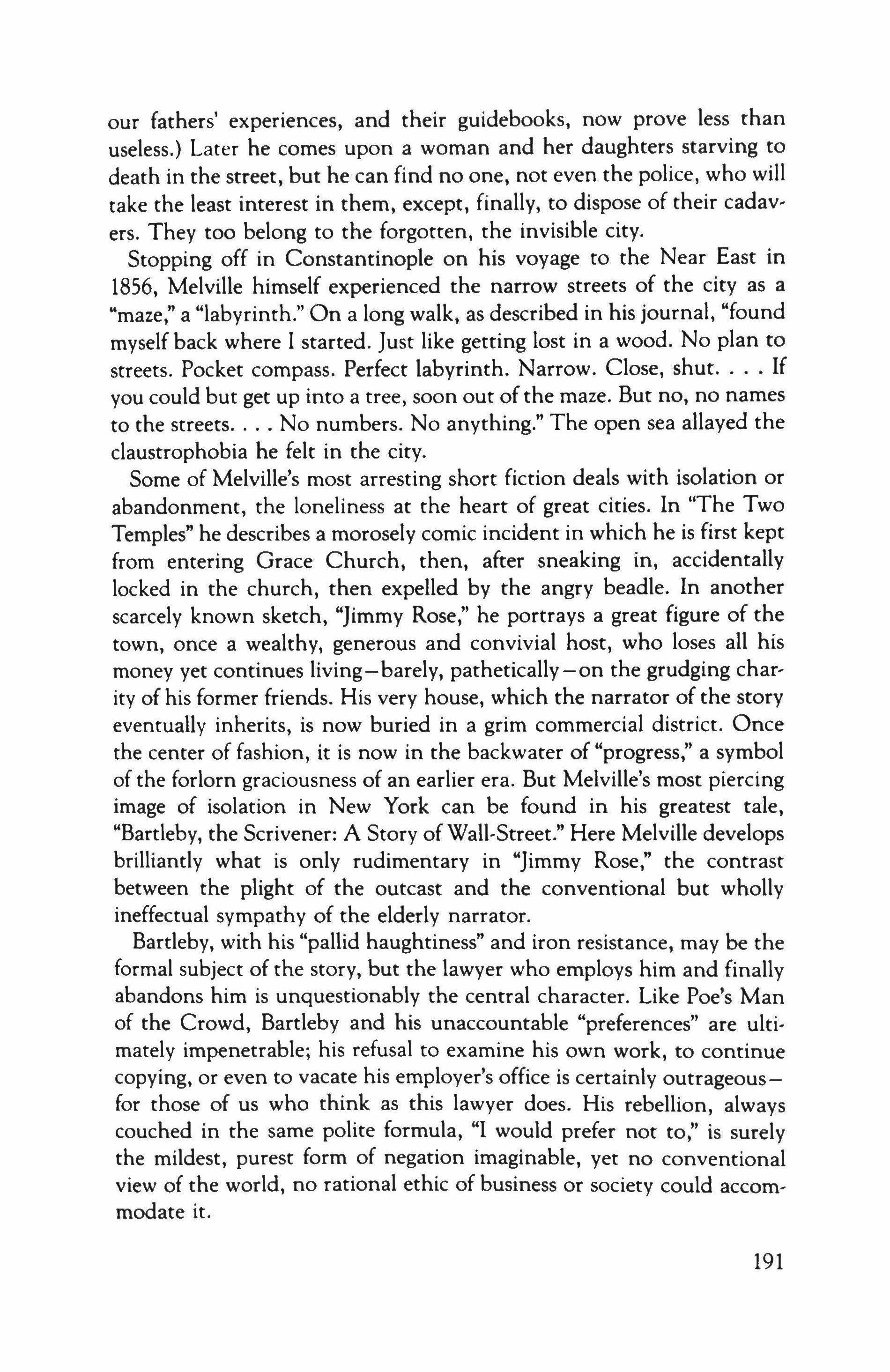
our fathers' experiences, and their guidebooks, now prove less than useless.} Later he comes upon a woman and her daughters starving to death in the street, but he can find no one, not even the police, who will take the least interest in them, except, finally, to dispose of their cadavers. They too belong to the forgotten, the invisible city.
Stopping off in Constantinople on his voyage to the Near East in 1856, Melville himself experienced the narrow streets of the city as a "maze," a "labyrinth." On a long walk, as described in his journal, "found myself back where I started. Just like getting lost in a wood. No plan to streets. Pocket compass. Perfect labyrinth. Narrow. Close, shut If you could but get up into a tree, soon out of the maze. But no, no names to the streets No numbers. No anything." The open sea allayed the claustrophobia he felt in the city.
Some of Melville's most arresting short fiction deals with isolation or abandonment, the loneliness at the heart of great cities. In "The Two Temples" he describes a morosely comic incident in which he is first kept from entering Grace Church, then, after sneaking in, accidentally locked in the church, then expelled by the angry beadle. In another scarcely known sketch, "Jimmy Rose," he portrays a great figure of the {Own, once a wealthy, generous and convivial host, who loses all his money yet continues living-barely, pathetically-on the grudging charity of his former friends. His very house, which the narrator of the story eventually inherits, is now buried in a grim commercial district. Once the center of fashion, it is now in the backwater of "progress," a symbol of the forlorn graciousness of an earlier era. But Melville's most piercing image of isolation in New York can be found in his greatest tale, "Bartleby, the Scrivener: A Story of Wall-Street." Here Melville develops brilliantly what is only rudimentary in "Jimmy Rose," the contrast between the plight of the outcast and the conventional but wholly ineffectual sympathy of the elderly narrator.
Bartleby, with his "pallid haughtiness" and iron resistance, may be the formal subject of the story, but the lawyer who employs him and finally abandons him is unquestionably the central character. Like Poe's Man of the Crowd, Bartleby and his unaccountable "preferences" are ultimately impenetrable; his refusal to examine his own work, to continue copying, or even to vacate his employer's office is certainly outrageousfor those of us who think as this lawyer does. His rebellion, always couched in the same polite formula, "I would prefer not to," is surely the mildest, purest form of negation imaginable, yet no conventional view of the world, no rational ethic of business or society could accommodate it.
191
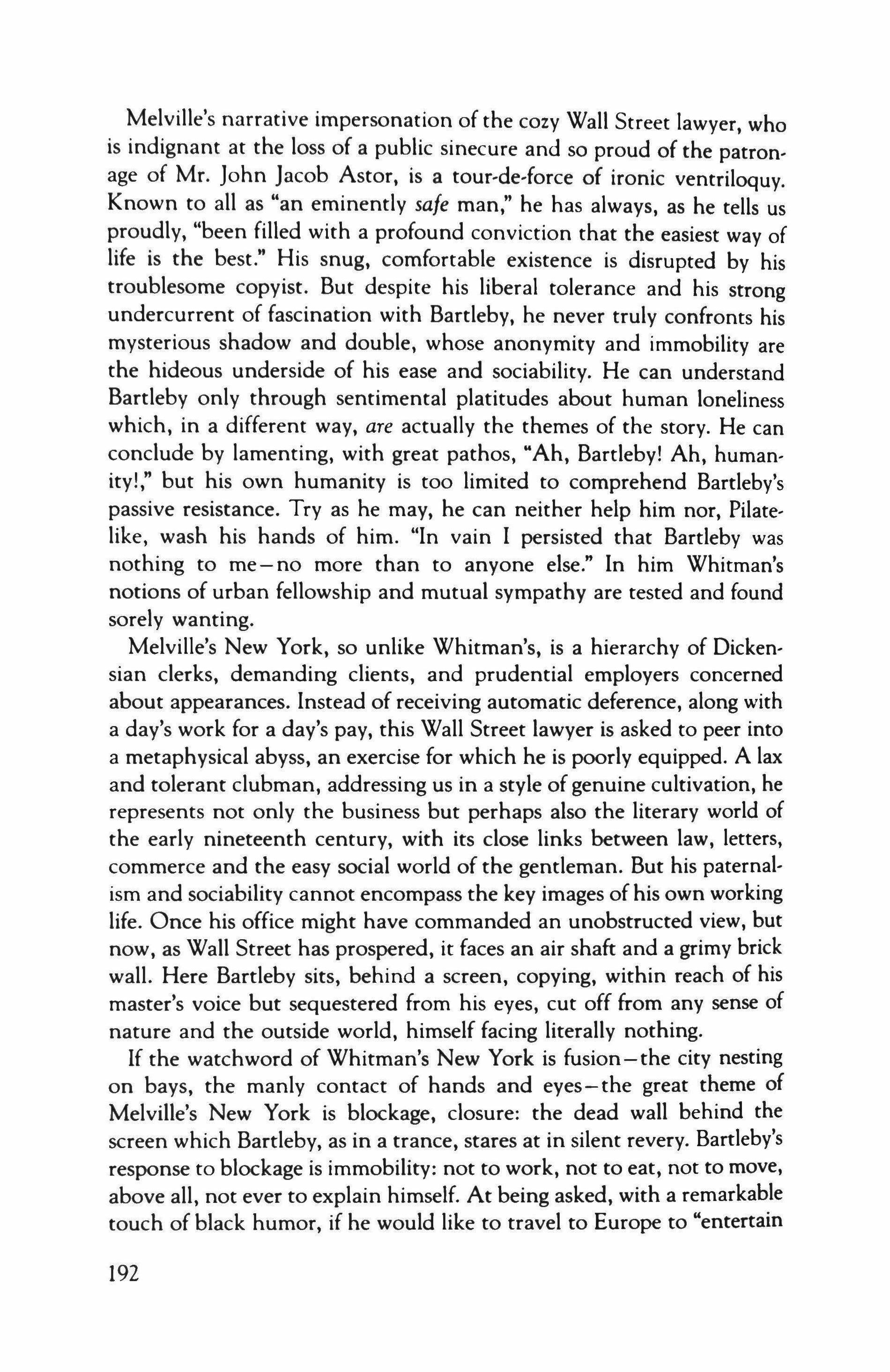
Melville's narrative impersonation of the cozy Wall Street lawyer, who is indignant at the loss of a public sinecure and so proud of the patronage of Mr. John Jacob Astor, is a tour-de-force of ironic ventriloquy. Known to all as "an eminently safe man," he has always, as he tells us proudly, "been filled with a profound conviction that the easiest way of life is the best." His snug, comfortable existence is disrupted by his troublesome copyist. But despite his liberal tolerance and his strong undercurrent of fascination with Bartleby, he never truly confronts his mysterious shadow and double, whose anonymity and immobility are the hideous underside of his ease and sociability. He can understand Bartleby only through sentimental platitudes about human loneliness which, in a different way, zzre actually the themes of the story. He can conclude by lamenting, with great pathos, Ah, Bartleby! Ah, humanity!," but his own humanity is too limited to comprehend Bartleby's passive resistance. Try as he may, he can neither help him nor, Pilatelike, wash his hands of him. "In vain I persisted that Bartleby was nothing to me-no more than to anyone else." In him Whitman's notions of urban fellowship and mutual sympathy are tested and found sorely wanting.
Melville's New York, so unlike Whitman's, is a hierarchy of Dickensian clerks, demanding clients, and prudential employers concerned about appearances. Instead of receiving automatic deference, along with a day's work for a day's pay, this Wall Street lawyer is asked to peer into a metaphysical abyss, an exercise for which he is poorly equipped. A lax and tolerant clubman, addressing us in a style of genuine cultivation, he represents not only the business but perhaps also the literary world of the early nineteenth century, with its close links between law, letters, commerce and the easy social world of the gentleman. But his paternalism and sociability cannot encompass the key images of his own working life. Once his office might have commanded an unobstructed view, but now, as Wall Street has prospered, it faces an air shaft and a grimy brick wall. Here Bartleby sits, behind a screen, copying, within reach of his master's voice but sequestered from his eyes, cut off from any sense of nature and the outside world, himself facing literally nothing.
If the watchword of Whitman's New York is fusion-the city nesting on bays, the manly contact of hands and eyes-the great theme of Melville's New York is blockage, closure: the dead wall behind the screen which Bartlebv, as in a trance, stares at in silent revery. Bartlebv's response to blockage is immobility: not to work, not to eat, not to move, above all, not ever to explain himself. At being asked, with a remarkable touch of black humor, if he would like to travel to Europe to "entertain
192

some young gentleman" with his "conversation," Bartleby mildly replies, "I like to be stationary. But I am not particular."
Whitman could write optimistically in Specimen Days that "an appreciative and perceptive study of the current humanity of New York gives the directest proof yet ofsuccessful democracy." But the relation between Bartleby and his employer shows the irreducible social, economic and human obstacles to this urban utopia. "I know you," Bartleby finally says to the lawyer, without looking at him, "and I want nothing to say to you." Starving himself to death, he curls up in a fetal position in the courtyard of the Tombs, then already one of New York's horrendous prisons.
Though Melville himself was forgotten after the 1850's, his deeply ambivalent vision ofNew York lived on in the work ofother writers. His treatment of the underclass, of social conflict and urban disintegration, became a staple ofthe naturalism of the 1890's, while his satiric portrayal of the narrow but comfortable world of the respectable middle class, as represented by the lawyer, became material for the social novels of Henry James and Edith Wharton. Amid the crude commercial values and cataclysmic social changes of the Gilded Age, these two writers, themselves products of New York gentility, painted a picture of the social hierarchy of Old New York that was acidulously critical yet touchingly elegiac.
The naturalists concentrated on the immediate topical world of the slum and the strike, on living conditions and working conditions. Theirs was the modern city just corning into being, with legions of immigrant workers arriving each week, squeezed into crowded, miserable living quarters and unhealthy workplaces. Theirs was the downtown world of the tenement, the sweatshop, the Tammany ward, the union hall, the dance hall, and the gin shop-the now no-longer-so-invisible world that Poe and Melville had begun to excavate. (Melville had even written a prescient sketch, "The Tartarus of Maids," about the dreadful lives of factory girls in a huge New England mill.)
James and Wharton, on the other hand, wrote about the uptown world of the great houses and magnificent dinner parties. They too dealt with the vertiginous rate of change in the city, which so dramatically altered the world they had known. Between 1860 and 1900, New York was transformed from an important commercial port and manufacturing center into a dominant force in the national economy - America's only world city. ("There's only one city that belongs to the whole country," says a character in Howells's 1890 novel A Hazard of New Fortunes, a
193

testament to New York's new ascendency.) It was also physically transformed - at the lower end by the tremendous influx of immigrants, at the upper end by the surge of new industry and wealth, which tore down old structures and inexorably pushed the development of the city northward.
In 1898 New York swallowed its own suburbs, incorporating the four outer boroughs, including Brooklyn, which was itself America's fourth largest city. When james returned to New York after a twenty-one-year absence in 1904, he was struck by the "note of vehemence in the local life," which reflected "the appeal of a particular type of dauncIess power." The crude, brash energy of the Gilded Age was everywhere: in the crush of humanity on the electric trolley-lines, in the skyscrapers that dwarfed passersby and blocked his view of the churches of his boyhood, even in the conversation which, like the architecture, he felt, lacked "quiet interspace" (The American Scene, p. 95).
james saw New York as the triumph of the onrushing future over the gracious past, of "the economic idea" over any "aesthetic view." He described the skyscraper as "a huge, continuous, fifty-floored conspiracy against the very idea of the ancient graces" (p. 95). His own birthplace on Washington Place, right off Washington Square, had been torn down, with no "tablet" to mark his entrance into the world. "Where, in fact, is the point of inserting a mural tablet, at any legible height, in a building certain to be destroyed to make room for a sky-scraper?" (Just a few years later, james's birthplace would be the site of the notorious Triangle Shirtwaist fire, in which so many immigrant working girls perished. Today the site of this chilling juxtaposition, marked by the plaque james missed, belongs to New York University.)
The disappearance of his birthplace inspired james to write one of his last great stories, "The jolly Corner," to imagine what his life might have been like if the house had survived, if he had not left home, and had instead become one of the movers and shakers of the new economic order. This is a kind of ghost story, and james imagines his hero's alter ego as a developer, an entrepreneur, an emblem of the buccaneering new city, and of America itself. This alter ego comes to him as a haunting apparition, a Mr. Hyde whose unhappiness and deformity hint at the horrors of his own unlived life. This is "The Beast in the Jungle" as social history.
In The American Scene james writes with the same mixture of recoil and fascination about what New York had become in his long absence. On one hand he feels a "sense of dispossession," "a horrible, hateful sense of personal antiquity" (pp. 86, 80). On the other hand he is drawn to the
194
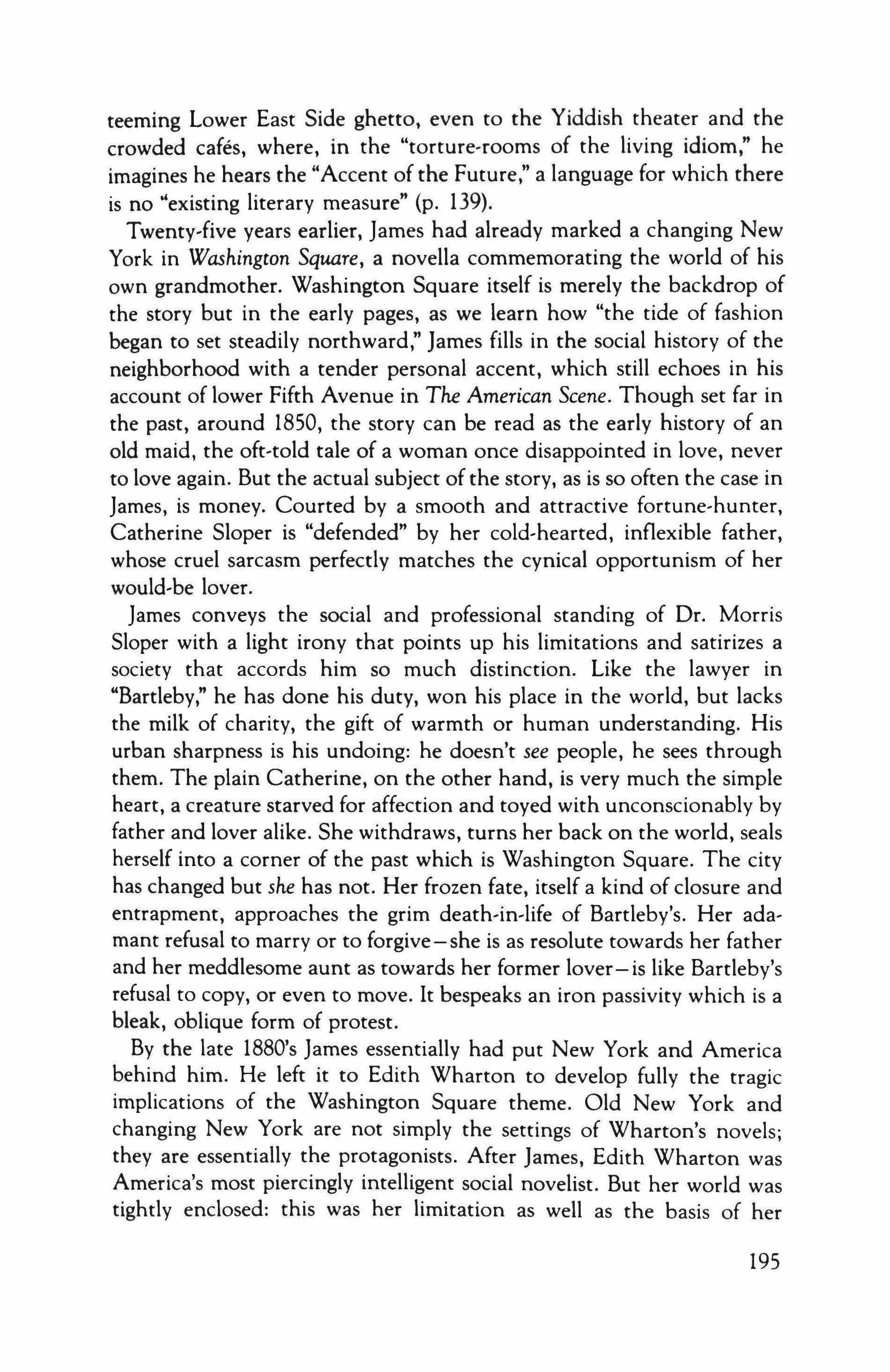
teeming Lower East Side ghetto, even to the Yiddish theater and the crowded cafes, where, in the "torture-rooms of the living idiom," he imagines he hears the"Accent of the Future," a language for which there is no "existing literary measure" (p. 139).
Twenty-five years earlier, James had already marked a changing New York in Washington Square, a novella commemorating the world of his own grandmother. Washington Square itself is merely the backdrop of the story but in the early pages, as we learn how "the tide of fashion began to set steadily northward," James fills in the social history of the neighborhood with a tender personal accent, which still echoes in his account of lower Fifth Avenue in The American Scene. Though set far in the past, around 1850, the story can be read as the early history of an old maid, the oft-told tale of a woman once disappointed in love, never to love again. But the actual subject of the story, as is so often the case in James, is money. Courted by a smooth and attractive fortune-hunter, Catherine Sloper is "defended" by her cold-hearted, inflexible father, whose cruel sarcasm perfectly matches the cynical opportunism of her would-be lover.
James conveys the social and professional standing of Dr. Morris Sloper with a light irony that points up his limitations and satirizes a society that accords him so much distinction. Like the lawyer in "Bartlebv," he has done his duty, won his place in the world, but lacks the milk of charity, the gift of warmth or human understanding. His urban sharpness is his undoing: he doesn't see people, he sees through them. The plain Catherine, on the other hand, is very much the simple heart, a creature starved for affection and toyed with unconscionably by father and lover alike. She withdraws, turns her back on the world, seals herself into a corner of the past which is Washington Square. The city has changed but she has not. Her frozen fate, itself a kind of closure and entrapment, approaches the grim death-in-life of Barrlebv's, Her adamant refusal to marry or to forgive-she is as resolute towards her father and her meddlesome aunt as towards her former lover- is like Bartlebv's refusal to copy, or even to move. It bespeaks an iron passivity which is a bleak, oblique form of protest.
By the late 1880's James essentially had put New York and America behind him. He left it to Edith Wharton to develop fully the tragic implications of the Washington Square theme. Old New York and changing New York are not simply the settings of Wharton's novels; they are essentially the protagonists. After James, Edith Wharton was America's most piercingly intelligent social novelist. But her world was tightly enclosed: this was her limitation as well as the basis of her
195
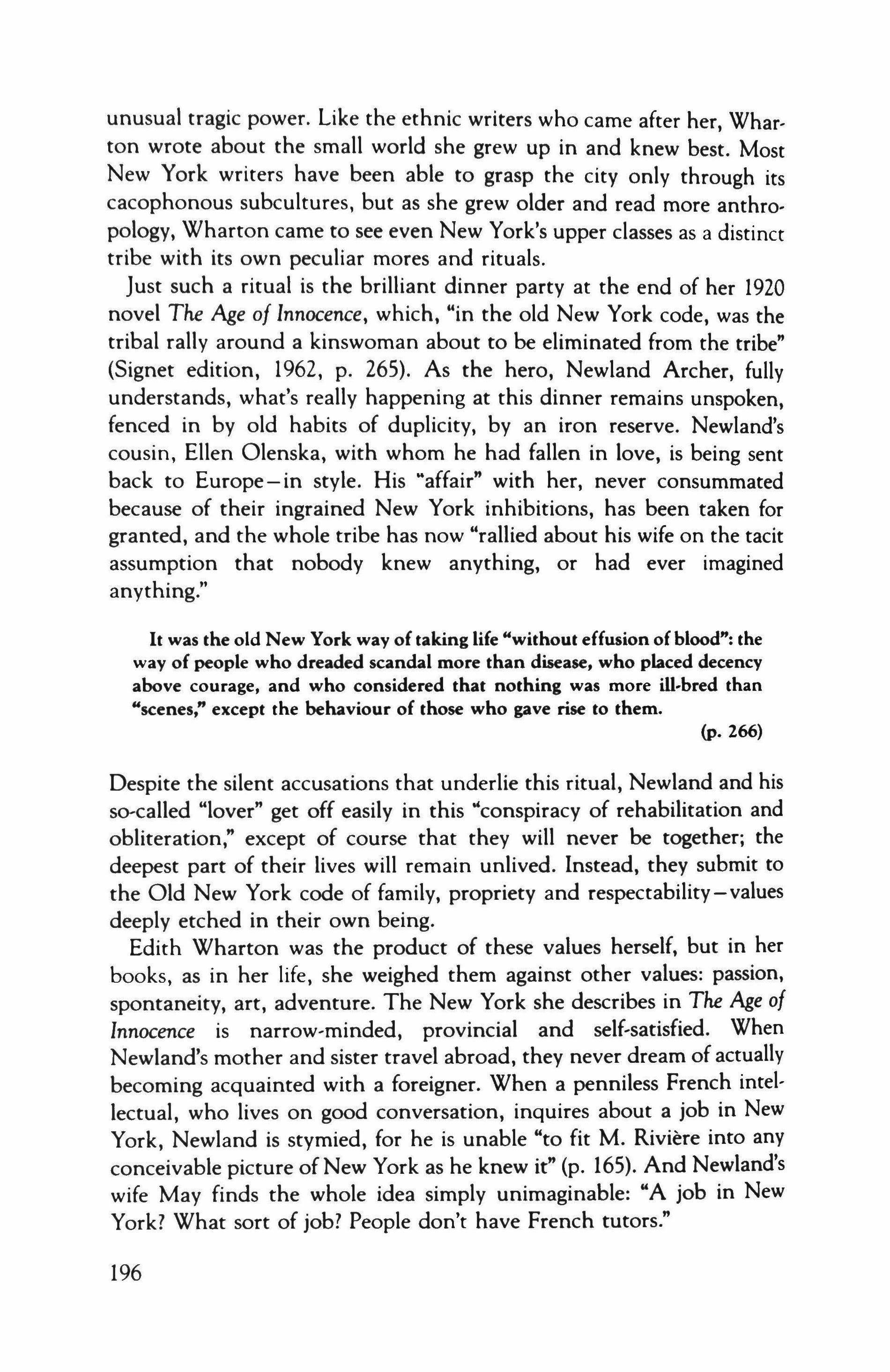
unusual tragic power. Like the ethnic writers who came after her, Wharton wrote about the small world she grew up in and knew best. Most New York writers have been able to grasp the city only through its cacophonous subcultures, but as she grew older and read more anthropology, Wharton came to see even New York's upper classes as a distinct tribe with its own peculiar mores and rituals.
Just such a ritual is the brilliant dinner party at the end of her 1920 novel The Age of Innocence, which, "in the old New York code, was the tribal rally around a kinswoman about to be eliminated from the tribe" (Signet edition, 1962, p. 265). As the hero, Newland Archer, fully understands, what's really happening at this dinner remains unspoken, fenced in by old habits of duplicity, by an iron reserve. Newland's cousin, Ellen Olenska, with whom he had fallen in love, is being sent back to Europe-in style. His "affair" with her, never consummated because of their ingrained New York inhibitions, has been taken for granted, and the whole tribe has now "rallied about his wife on the tacit assumption that nobody knew anything, or had ever imagined anything."
It was the old New York way of taking life "without effusion of blood": the way of people who dreaded scandal more than disease, who placed decency above courage, and who considered that nothing was more ill-bred than "scenes," except the behaviour of those who gave rise to them.
(p.266)
Despite the silent accusations that underlie this ritual, Newland and his so-called "lover" get off easily in this "conspiracy of rehabilitation and obliteration," except of course that they will never be together; the deepest part of their lives will remain unlived. Instead, they submit to the Old New York code of family, propriety and respectability-values deeply etched in their own being.
Edith Wharton was the product of these values herself, but in her books, as in her life, she weighed them against other values: passion, spontaneity, art, adventure. The New York she describes in The Age of Innocence is narrow-minded, provincial and self-satisfied. When Newland's mother and sister travel abroad, they never dream of actually becoming acquainted with a foreigner. When a penniless French intellectual, who lives on good conversation, inquires about a job in New York, Newland is stymied, for he is unable "to fit M. Riviere into any conceivable picture of New York as he knew it" (p. 165). And Newland's wife May finds the whole idea simply unimaginable: "A job in New York? What sort of job? People don't have French tutors."
196
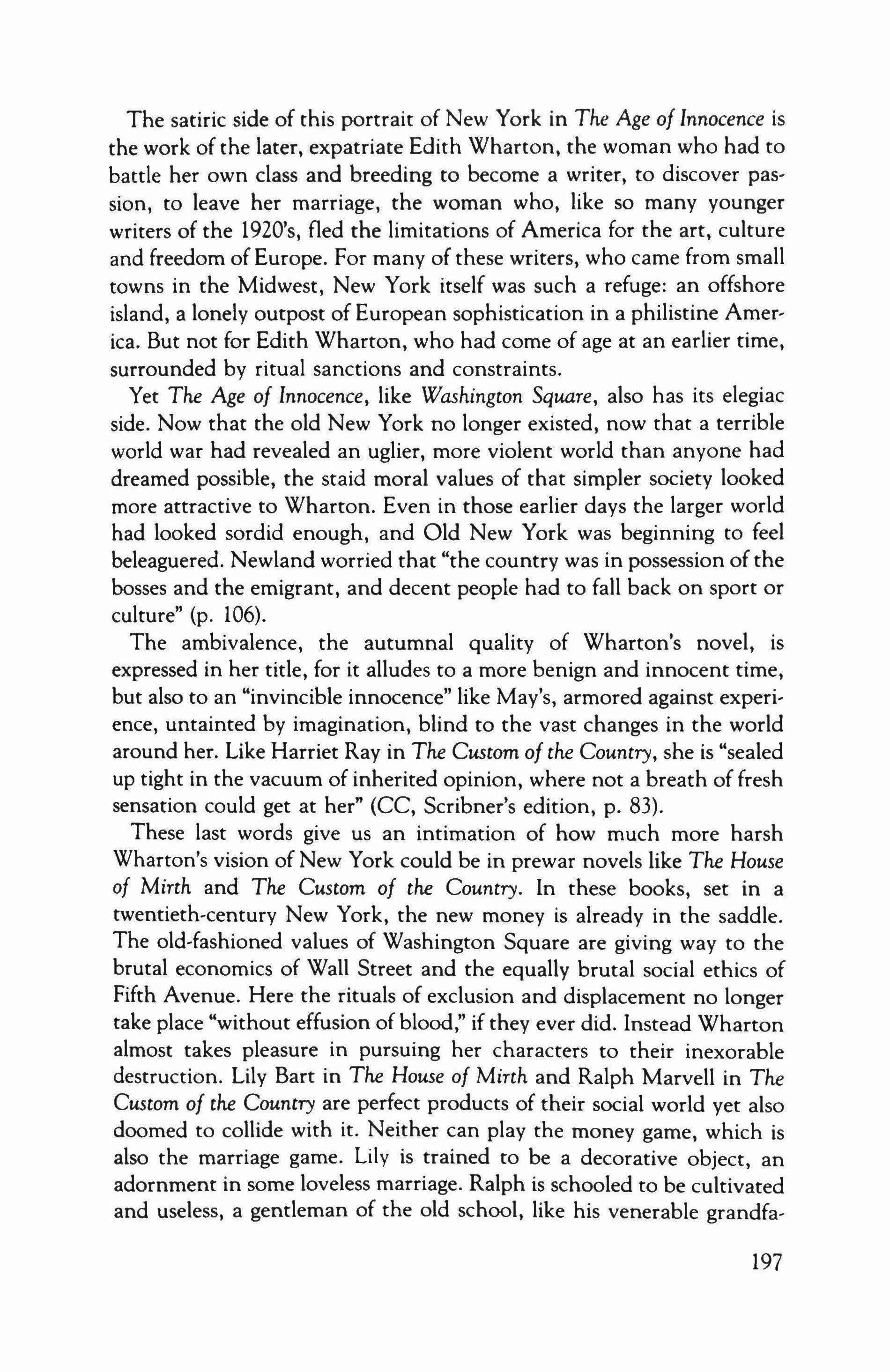
The satiric side of this portrait of New York in The Age of Innocence is the work of the later, expatriate Edith Wharton, the woman who had to battle her own class and breeding to become a writer, to discover passion, to leave her marriage, the woman who, like so many younger writers of the 1920's, fled the limitations of America for the art, culture and freedom of Europe. For many of these writers, who came from small towns in the Midwest, New York itself was such a refuge: an offshore island, a lonely outpost of European sophistication in a philistine America. But not for Edith Wharton, who had come of age at an earlier time, surrounded by ritual sanctions and constraints.
Yet The Age of Innocence, like Washington Square, also has its elegiac side. Now that the old New York no longer existed, now that a terrible world war had revealed an uglier, more violent world than anyone had dreamed possible, the staid moral values of that simpler society looked more attractive to Wharton. Even in those earlier days the larger world had looked sordid enough, and Old New York was beginning to feel beleaguered. Newland worried that "the country was in possession of the bosses and the emigrant, and decent people had to fall back on sport or culture" (p. 106).
The ambivalence, the autumnal quality of Wharton's novel, is expressed in her title, for it alludes to a more benign and innocent time, but also to an "invincible innocence" like May's, armored against experience, untainted by imagination, blind to the vast changes in the world around her. Like Harriet Ray in The Custom of the Country, she is "sealed up tight in the vacuum of inherited opinion, where not a breath of fresh sensation could get at her" (CC, Scribner's edition, p. 83).
These last words give us an intimation of how much more harsh Wharton's vision of New York could be in prewar novels like The House of Mirth and The Custom of the Country. In these books, set in a twentieth-century New York, the new money is already in the saddle. The old-fashioned values of Washington Square are giving way to the brutal economics of Wall Street and the equally brutal social ethics of Fifth Avenue. Here the rituals of exclusion and displacement no longer take place "without effusion of blood," if they ever did. Instead Wharton almost takes pleasure in pursuing her characters to their inexorable destruction. Lily Bart in The House of Mirth and Ralph Marvell in The Custom of the Country are perfect products of their social world yet also doomed to collide with it. Neither can play the money game, which is also the marriage game. Lily is trained to be a decorative object, an adornment in some loveless marriage. Ralph is schooled to be cultivated and useless, a gentleman of the old school, like his venerable grandfa-
197
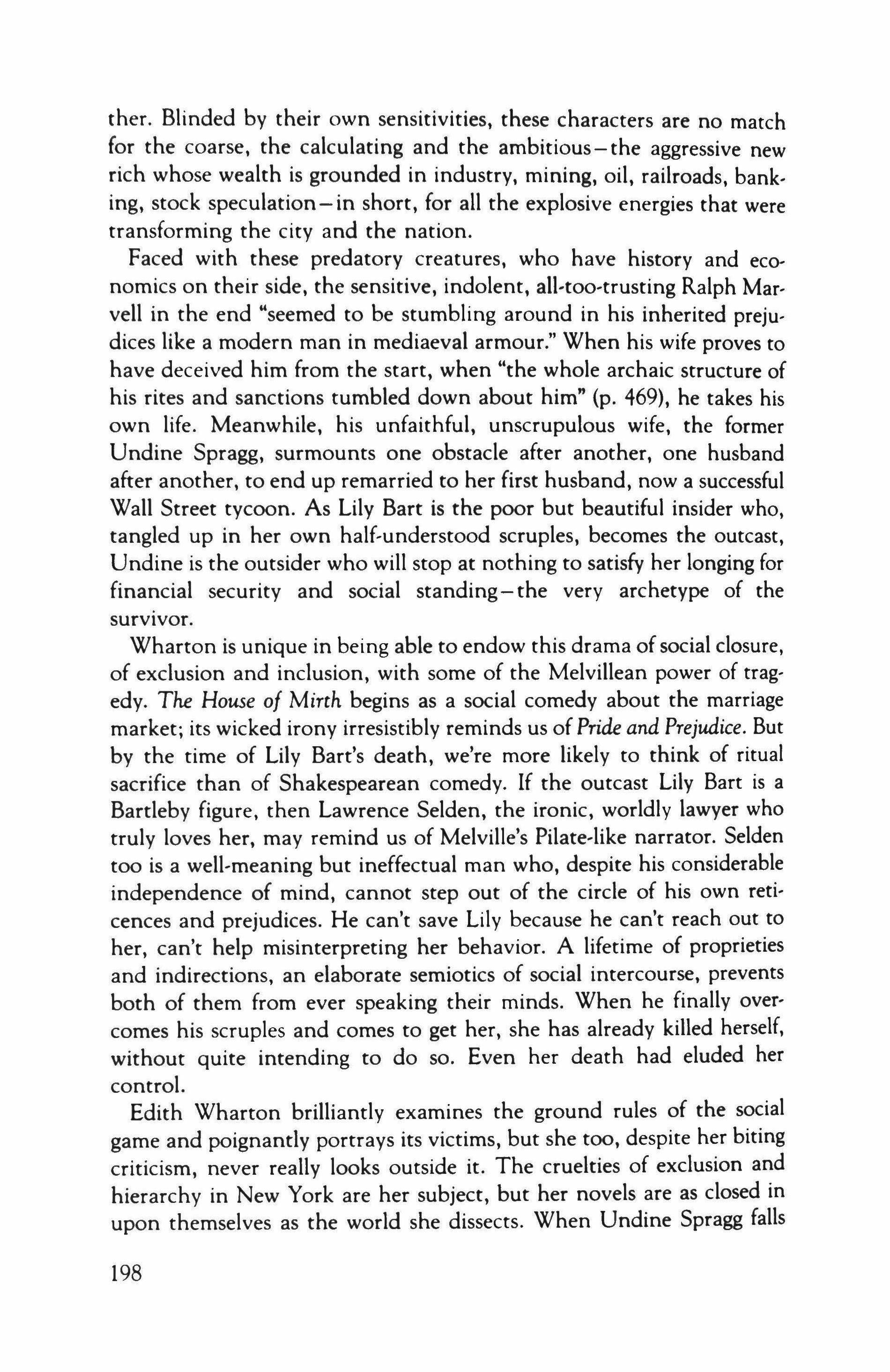
ther. Blinded by their own sensitivities, these characters are no match for the coarse, the calculating and the ambitious-the aggressive new rich whose wealth is grounded in industry, mining, oil, railroads, banking, stock speculation- in short, for all the explosive energies that were transforming the city and the nation.
Faced with these predatory creatures, who have history and economics on their side, the sensitive, indolent, all-too-trusting Ralph Marvell in the end "seemed to be stumbling around in his inherited prejudices like a modern man in mediaeval armour." When his wife proves to have deceived him from the start, when "the whole archaic structure of his rites and sanctions tumbled down about him" (p. 469), he takes his own life. Meanwhile, his unfaithful, unscrupulous wife, the former Undine Spragg, surmounts one obstacle after another, one husband after another, to end up remarried to her first husband, now a successful Wall Street tycoon. As Lily Bart is the poor but beautiful insider who, tangled up in her own half-understood scruples, becomes the outcast, Undine is the outsider who will stop at nothing to satisfy her longing for financial security and social standing-the very archetype of the survivor.
Wharton is unique in being able to endow this drama of social closure, of exclusion and inclusion, with some of the Melvillean power of tragedy. The House of Mirth begins as a social comedy about the marriage market; its wicked irony irresistibly reminds us of Pride and Prejudice. But by the time of Lily Bart's death, we're more likely to think of ritual sacrifice than of Shakespearean comedy. If the outcast Lily Bart is a Bartlebv figure. then Lawrence Selden, the ironic, worldly lawyer who truly loves her, may remind us of Melville's Pilate-like narrator. Selden too is a well-meaning but ineffectual man who, despite his considerable independence of mind, cannot step out of the circle of his own reticences and prejudices. He can't save Lily because he can't reach out to her, can't help misinterpreting her behavior. A lifetime of proprieties and indirections, an elaborate semiotics of social intercourse, prevents both of them from ever speaking their minds. When he finally overcomes his scruples and comes to get her, she has already killed herself, without quite intending to do so. Even her death had eluded her control.
Edith Wharton brilliantly examines the ground rules of the social game and poignantly portrays its victims, but she too, despite her biting criticism, never really looks outside it. The cruelties of exclusion and hierarchy in New York are her subject, but her novels are as closed in upon themselves as the world she dissects. When Undine Spragg falls
198

out of favor with society, she discovers that she has become invisible. She can go to the opera, yet no one there actually sees her. Lily Bart, in her precipitous decline, finds every social avenue simply closed to her. But as far as Wharton shows, there simply was no world outside those avenues, no New York apart from what she represents under the names of Washington Square, Wall Street and Fifth Avenue. The new middleclass flats and residential hotels along West End Avenue are worse than death; from the viewpoint of society, they scarcely exist. Lily Bart does seek out a woman who is poor, and takes some comfort from her survival, but she represents nothing significant in the world of the novel. She also spurns the help of a Jewish financier and speculator, whose manners are bad and whose grammar is unspeakable, but who manages to buy his way up from Wall Street to Fifth Avenue.
The naturalistic writers of the turn of the century and the New York ethnic writers who followed them specialized in everything Edith Wharton left out or condemned: the titanic forces of the new economic machine, the despised immigrants who were its first victims but who eventually were able to use it to gain a foothold in New York. In Edith Wharton's New York there are only a handful of streets, all of them instantly readable. Her characters are defined by where they live, when they go out, whom they see; a chance indiscretion tells all. Everyone knows everyone else; their families have intermarried for generations; their very names, like Newland and Archer, are grafts from their family trees. Even Wharton's style of cadenced narrative, cutting irony, and acute social observation suggests the knowing but irreverent insider, whose values continue to reflect the world she criticizes.
How different' is the cool journalistic manner of Stephen Crane's Maggie: A Girl of the Streets (subtitled "A Story of New York," as Melville had called his tale "A Story of Wall-Street"). Looking for some archetypal city tale, the young Crane gives us a fable ofthe prodigal daughter: a story of drunken parents, coarse men, and a girl's Hogarthian descent from slum life to prostitution to abandonment and self-immolation - in short, the material of Victorian melodrama. What is new about the story, what echoes down through every tenement novel in the twentieth century, through every film from Griffith's Musketeers of Pig Alley through Dead End to The Naked City and Mean Streets, is the taste and feel of the overcrowded streets, down to the thousand cooking odors streaming out of the tenement. Like Jacob Riis in How the Other Half Lives, Abraham Cahan in Yekl, Dreiser in Sister Carrie, Jack London in The People of the Abyss, and Upton Sinclair in The Jungle, Crane discov-
199
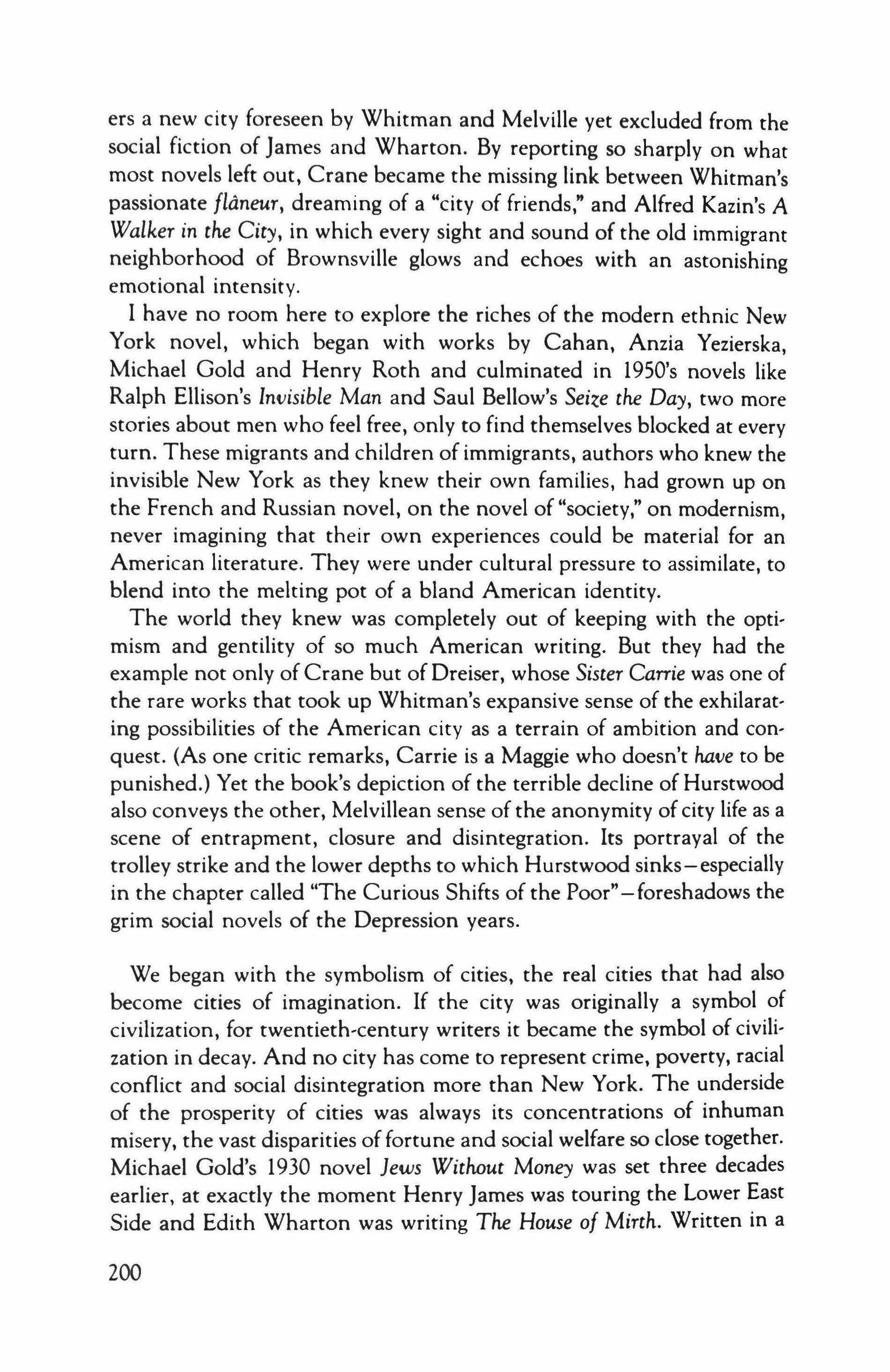
ers a new city foreseen by Whitman and Melville yet excluded from the social fiction of James and Wharton. By reporting so sharply on what most novels left out, Crane became the missing link between Whitman's passionate flaneur, dreaming of a "city of friends," and Alfred Kazin's A Walker in the City, in which every sight and sound of the old immigrant neighborhood of Brownsville glows and echoes with an astonishing emotional intensity.
I have no room here to explore the riches of the modern ethnic New York novel, which began with works by Cahan, Anzia Yezierska, Michael Gold and Henry Roth and culminated in 1950's novels like Ralph Ellison's Invisible Man and Saul Bellow's Seize the Day, two more stories about men who feel free, only to find themselves blocked at every turn. These migrants and children of immigrants, authors who knew the invisible New York as they knew their own families, had grown up on the French and Russian novel, on the novel of "society," on modernism, never imagining that their own experiences could be material for an American literature. They were under cultural pressure to assimilate, to blend into the melting pot of a bland American identity.
The world they knew was completely out of keeping with the optimism and gentility of so much American writing. But they had the example not only of Crane but of Dreiser, whose Sister Carrie was one of the rare works that took up Whitman's expansive sense of the exhilarating possibilities of the American city as a terrain of ambition and conquest. (As one critic remarks, Carrie is a Maggie who doesn't have to be punished.) Yet the book's depiction of the terrible decline of Hurstwood also conveys the other, Melvillean sense of the anonymity ofcity life as a scene of entrapment, closure and disintegration. Its portrayal of the trolley strike and the lower depths to which Hurstwood sinks-especially in the chapter called "The Curious Shifts of the Poor" - foreshadows the grim social novels of the Depression years.
We began with the symbolism of cities, the real cities that had also become cities of imagination. If the city was originally a symbol of civilization, for twentieth-century writers it became the symbol of civilization in decay. And no city has come to represent crime, poverty, racial conflict and social disintegration more than New York. The underside of the prosperity of cities was always its concentrations of inhuman misery, the vast disparities offortune and social welfare so close together. Michael Gold's 1930 novel Jews Without Money was set three decades earlier, at exactly the moment Henry James was touring the Lower East Side and Edith Wharton was writing The House of Mirth. Written in a
200
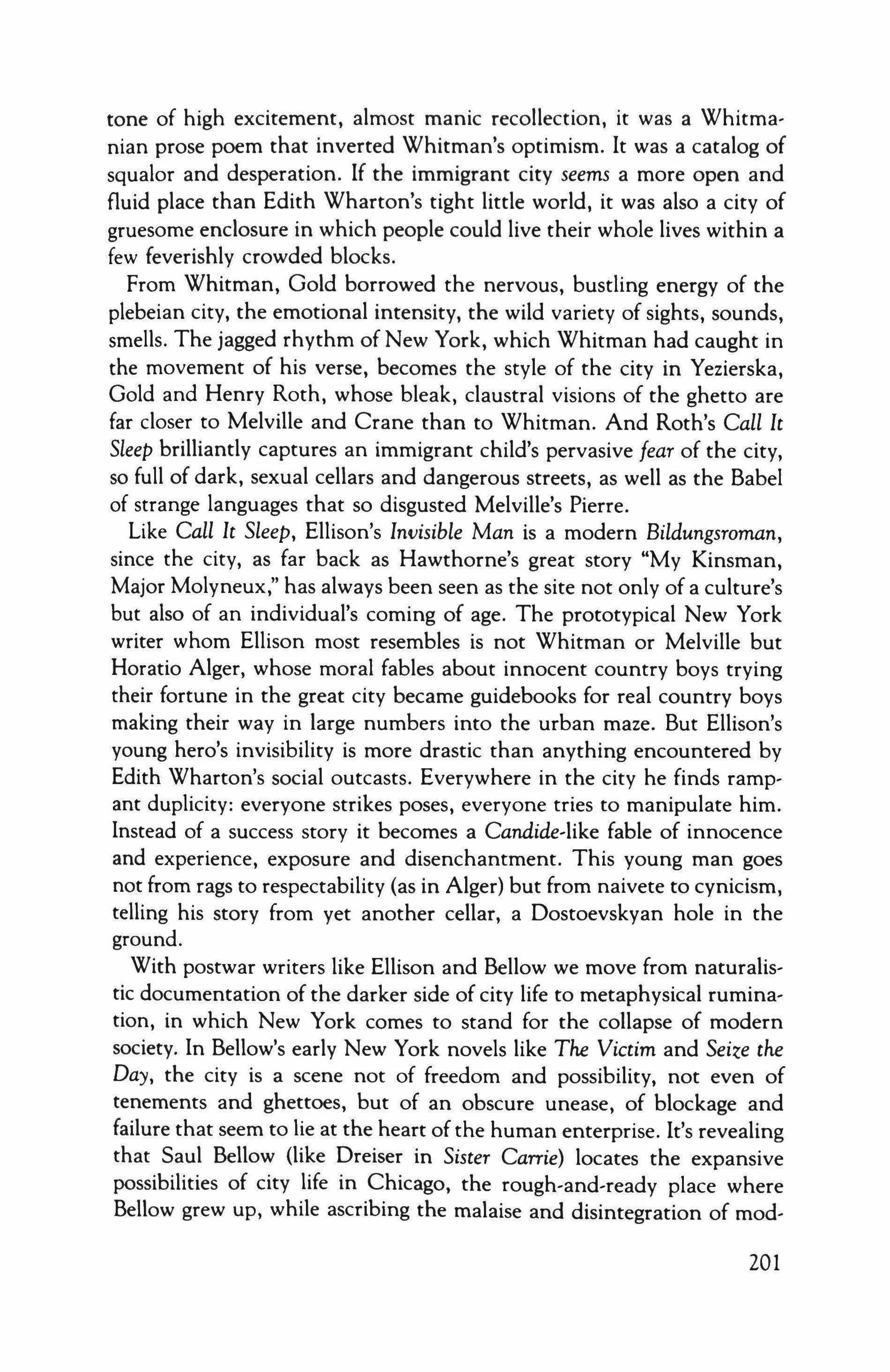
tone of high excitement, almost manic recollection, it was a Whitmanian prose poem that inverted Whitman's optimism. It was a catalog of squalor and desperation. If the immigrant city seems a more open and fluid place than Edith Wharton's tight little world, it was also a city of gruesome enclosure in which people could live their whole lives within a few feverishly crowded blocks.
From Whitman, Gold borrowed the nervous, bustling energy of the plebeian city, the emotional intensity, the wild variety of sights, sounds, smells. The jagged rhythm of New York, which Whitman had caught in the movement of his verse, becomes the style of the city in Yezierska, Gold and Henry Roth, whose bleak, claustral visions of the ghetto are far closer to Melville and Crane than to Whitman. And Roth's Call It Sleep brilliantly captures an immigrant child's pervasive fear of the city, so full of dark, sexual cellars and dangerous streets, as well as the Babel of strange languages that so disgusted Melville's Pierre.
Like Call It Sleep, Ellison's Invisible Man is a modern Bildungsrornan, since the city, as far back as Hawthorne's great story "My Kinsman, Major Molyneux," has always been seen as the site not only of a culture's but also of an individual's coming of age. The prototypical New York writer whom Ellison most resembles is not Whitman or Melville but Horatio Alger, whose moral fables about innocent country boys trying their fortune in the great city became guidebooks for real country boys making their way in large numbers into the urban maze. But Ellison's young hero's invisibility is more drastic than anything encountered by Edith Wharton's social outcasts. Everywhere in the city he finds rampant duplicity: everyone strikes poses, everyone tries to manipulate him. Instead of a success story it becomes a Candide-like fable of innocence and experience, exposure and disenchantment. This young man goes not from rags to respectability (as in Alger) but from naivete to cynicism, telling his story from yet another cellar, a Dostoevskyan hole in the ground.
With postwar writers like Ellison and Bellow we move from naturalistic documentation of the darker side of city life to metaphysical rumination, in which New York comes to stand for the collapse of modern society. In Bellow's early New York novels like The Victim and Seize the Day, the city is a scene not of freedom and possibility, not even of tenements and ghettoes, but of an obscure unease, of blockage and failure that seem to lie at the heart of the human enterprise. It's revealing that Saul Bellow (like Dreiser in Sister Carrie) locates the expansive possibilities of city life in Chicago, the rough-and-ready place where Bellow grew up, while ascribing the malaise and disintegration of mod-
201

ern life to New York, the city to which he later came as an aspiring writer. It's a long way from the buoyant adventures of Augie March to the sense of entrapment in Seize the Day and the saturnine outlook of Mr. Sammler. By the time of Mr. Sammler's Planet, which depicts New York in the "swinging sixties," individual failure and unhappiness have given way to large-scale social apocalypse-epitomized for Bellow by black criminals, disrespectful students and sexually voracious women.
The primitivist fantasies of some modern writers, Bellow says, have become the daily fare of the New York streets: "The dreams of nineteenth-century poets polluted the psychic atmosphere of the great boroughs and suburbs of New York" (p. 33). "From the black side, strong currents were sweeping over everyone. Child, black, redskin-the unspoiled Seminole against the horrible Whiteman. Millions of civilized people wanted oceanic, boundless, primitive, neckfree nobility, experienced a strange release of galloping impulses, and acquired the peculiar aim of sexual niggerhood for everyone" (p. 162). These rancid views have rarely been cited by critics, though they are placed in the mouth of a venerable figure who can hardly be separated from Bellow himself.
In this grim, arguably racist fantasy, New York had become a wholly terrifying city, a locus of appetite and anarchy for the grasping middle class as well as the ferocious underclass. Yet at the very same time, the rest of the world was drawn to the city as a scene of boundless energy and modernity, a safe haven from every kind of persecution, not as the Waterloo of Western civilization. Once they arrived, their very presence would make Mr. Sammler rueful and anxious.
On this apocalyptic note, our brief trajectory through New York writing must conclude. There are many competing postwar versions of New York that I cannot deal with here: Frank O'Hara's chatty portrait of the city as a movie set and gossip mill inhabited by a few good friends, Pvnchon's comic myth of the New York underworld in V., or Donald Barthelme's postmodern New York of "The Balloon" and "City Life." Later we have Richard Price's rough but vital blue-collar New York, the frivolous punk New York of Tama Janowitz and Between C and D, the Yuppie New York of Jay McInerney's Bright Lights, Big City, the New York noir of Paul Auster's metaphysical detective stories, which take us back to the artist-fables of Poe and James, a late echo of Edith Wharton's New York in the engrossing social novels of Louis Auchincloss, and finally Tom Wolfe's insider-reports on a city fractured by race and greed - trendy journalism disguised as fiction. But they can hardly match the ever-greater power of the movies to create and recreate the city-from On the Town and The Naked City of
202
the late forties to the recent films of Martin Scorsese, Woody Allen, Sidney Lumet, Susan Seidelman and Spike Lee. Since location shooting became the norm at the end of the sixties, New York has belonged more to the filmmakers than to the writers. Richard Price (in Sea of Love and New York Stories) has become an adept screenwriter, and many New York novels today are simply embryonic movies. Oddly, Bellow's [uvenalian screed, which he himself has since discounted, was one of the few books that had the vehemence and violence to compete with those visual images. Unlike the work of the filmmakers and younger writers, Bellow's book alludes to the long literary tradition we've described here, but is not nourished by it. Bellow's Sammler is a distant descendant of the fumeur, but the fumeur as an old man, out of touch, a wisdom-figure who is cranky, brilliant, haughty and dismissive. As Steven Marcus notes, his is a city that can no longer be read, though he reads it, insistently, through the lens of the most perverse modern authors." Many other ethnic groups would follow Bellow's restless, haunted Jews in taking refuge in New York, but Mr. Sammler could only see them as a threat. In him the walker in the city has become a virtual blind man, whose urban text has turned into dark biblical prophecy and fierce social allegory.

1. Joyce Carol Oates, "Imaginary Cities: America," Literature and the Urban Experience, ed. Michael C. Jaye and Ann Chalmers Watts (New Brunswick, NJ: Rutgers University Press, 1981), p. 11.
2. Kenneth T. Jackson, "The Capital of Capitalism: the New York Metropolitan Region, 1890-1940," Metropolis 1890-1940, ed. Anthony Sutcliffe (Chicago: University of Chicago Press, 1984), p. 323.
3. Arlene Croce, The Fred Astaire & Ginger Rogers Book (New York: Galahad Books, 1972), p. 171.
4. Georg Simmel, "The Metropolis and Mental Life," Classic Essays on the Culture of Cities, ed. Richard Sennett (New York: Appleton-Century-Crofts, 1969), p. 48.
5. Paul Morand, New York, trans. Hamish Miles (New York: Henry Holt, 1930), pp. 313-14.
6. Walter Benjamin's essays on Baudelaire and nineteenth-century Paris are a classic analysis of the flaneur and the urban crowd. See also Marshall Berman's discussions of Baudelaire's prose poems and Dostoevsky's St. Petersburg in All That Is Solid Melts into Air (New York: Simon & Schuster, 1982).
203

7. Henry James, The American Scene, ed. Leon Edel (1907; Bloomington: Indiana University Press, 1968), p. 74.
8. In "New York" (1921) Marianne Moore would cite James and play upon his ambivalence. She chooses an offbeat urban subject, the wholesale fur trade, that stands for both commerce and beauty, the savagery of the hunt and the finery of fashion. Although she knows that "estimated in raw meat and berries, we could feed the universe," in the end, she says, quoting James, "it is not the atmosphere of ingenuity it is not the plunder, / but 'accessibility to experience'." For a commentary, see Charles Molesworth, Marianne Moore: A Literary Life (New York: Atheneum, 1990), pp. 240-44.
9. "Almost all the signifying messages have now become contradictory and cancel each other out The tendency of the whole is to collapse away from meaning (forget about systematic meaning) into incognizability and chaos."
Steven Marcus, "Reading the Illegible: Some Modern Representations of Urban Experience," Visions of the Modem City, ed. William Sharpe and Leonard Wallock (Baltimore: Johns Hopkins University Press, 1987), pp. 246-47.
Bibliography
Bender, Thomas. New York Intellect. New York: Knopf, 1987. Berman, Marshall. All That Is Solid Melts into Air: The Experience of Modernity. New York: Simon & Schuster, 1982.
Choay, Francoise, ed. L'urbanisme, utopies er realites. Paris: Editions du Seuil, 1965.
Conrad, Peter. The Art of the City: Views and Versions of New York. New York: Oxford University Press, 1984.
Gelfant, Blanche Housman. The American City Newel. 2nd edition. Norman: University of Oklahoma Press, 1970.
Jaye, Michael C. and Ann Chalmers Watts, eds. Literature & the Urban Experience. New Brunswick, NJ: Rutgers University Press, 1981.
Kazin, Alfred. A Writer's America. New York: Knopf, 1988. and David Finn. Our New York. New York: Harper & Row, 1989.
Lankevich, George J., and Howard B. Furer. A BriefHistory of New York City. Port Washington, NY: Associated Faculty Press, 1984.
Morand, Paul. New York. Trans. Hamish Miles. Illustrations by Joaquin Vaquero. New York: Henry Holt, 1930.
Mumford, Lewis. The Brown Decades. 2nd edition. New York: Dover, 1955.
The City in History. New York: Harcourt Brace Jovanovich, 1968. 204
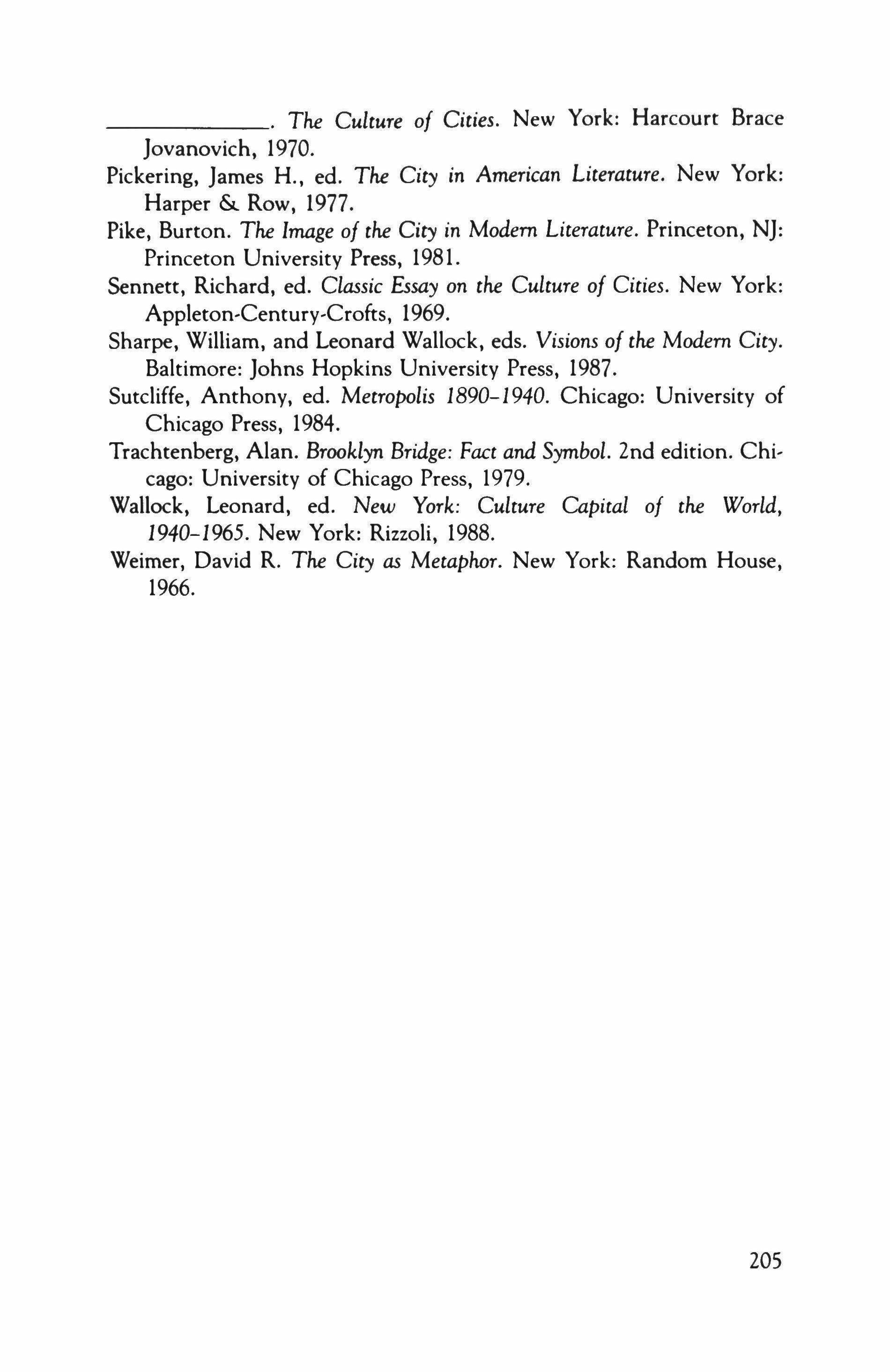
The Culture of Cities. New York: Harcourt Brace Jovanovich, 1970.
Pickering, James H., ed. The City in American Literature. New York: Harper & Row, 1977.
Pike, Burton. The Image of the City in Modem Literature. Princeton, NJ: Princeton University Press, 1981.
Sennett, Richard, ed. Classic Essay on the Culture of Cities. New York: Appleton-Century-Crofts, 1969.
Sharpe, William, and Leonard Wallock, eds. Visions of the Modem City. Baltimore: Johns Hopkins University Press, 1987.
Sutcliffe, Anthony, ed. Metropolis 1890-1940. Chicago: University of Chicago Press, 1984.
Trachtenberg, Alan. Brooklyn Bridge: Fact and Symbol. 2nd edition. Chicago: University of Chicago Press, 1979.
Wallock, Leonard, ed. New York: Culture Capital of the World, 1940-1965. New York: Rizzoli, 1988.
Weimer, David R. The City as Metaphor. New York: Random House, 1966.
205
The Disgruntled Office-Seeker's Last Gasp
William Hathaway
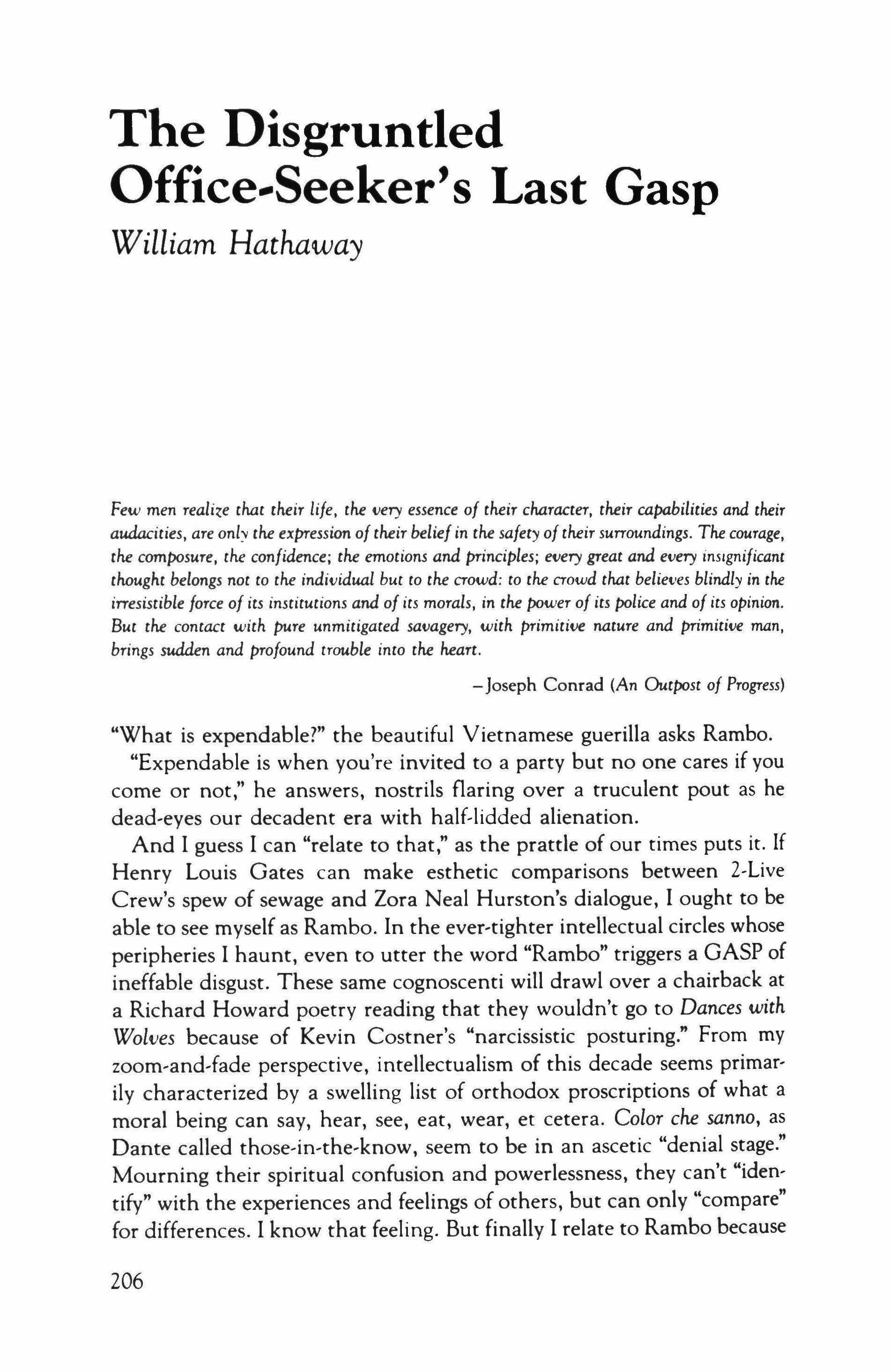
Few men reolize that their life, the very essence of their character, their capabilities and their audacities, are onl:v the expression of their belief in the safety of their surroundings. The courage, the composure, the confidence; the emotions and principles; every great and every insIgnificant thought belongs not to the individual but to the crowd: to the crowd that believes blindly in the irresistible force of its institutions and of its morals, in the power of its police and of its opinion. But the contact with pure unmitigated savagery, with primitive nature and primitive man, brings sudden and profound trouble into the heart.
- Joseph Conrad (An Outpost of Progress)
"What is expendable?" the beautiful Vietnamese guerilla asks Rambo. "Expendable is when you're invited to a party but no one cares if you come or not," he answers, nostrils flaring over a truculent pout as he dead-eyes our decadent era with half-lidded alienation. And I guess I can "relate to that," as the prattle of our times puts it. If Henry Louis Gates can make esthetic comparisons between 2-Live Crew's spew of sewage and Zora Neal Hurston's dialogue, I ought to be able to see myself as Rambo. In the ever-tighter intellectual circles whose peripheries I haunt, even to utter the word "Rambo" triggers a GASP of ineffable disgust. These same cognoscenti will drawl over a chairback at a Richard Howard poetry reading that they wouldn't go to Dances with Wolves because of Kevin Costner's "narcissistic posturing." From my zoom-and-fade perspective, intellectualism of this decade seems primarily characterized by a swelling list of orthodox proscriptions of what a moral being can say, hear, see, eat, wear, et cetera. Color che sanno as Dante called those-in-the-know, seem to be in an ascetic "denial stage." Mourning their spiritual confusion and powerlessness, they can't "identify" with the experiences and feelings of others, but can only "compare" for differences. I know that feeling. But finally I relate to Rambo because
206
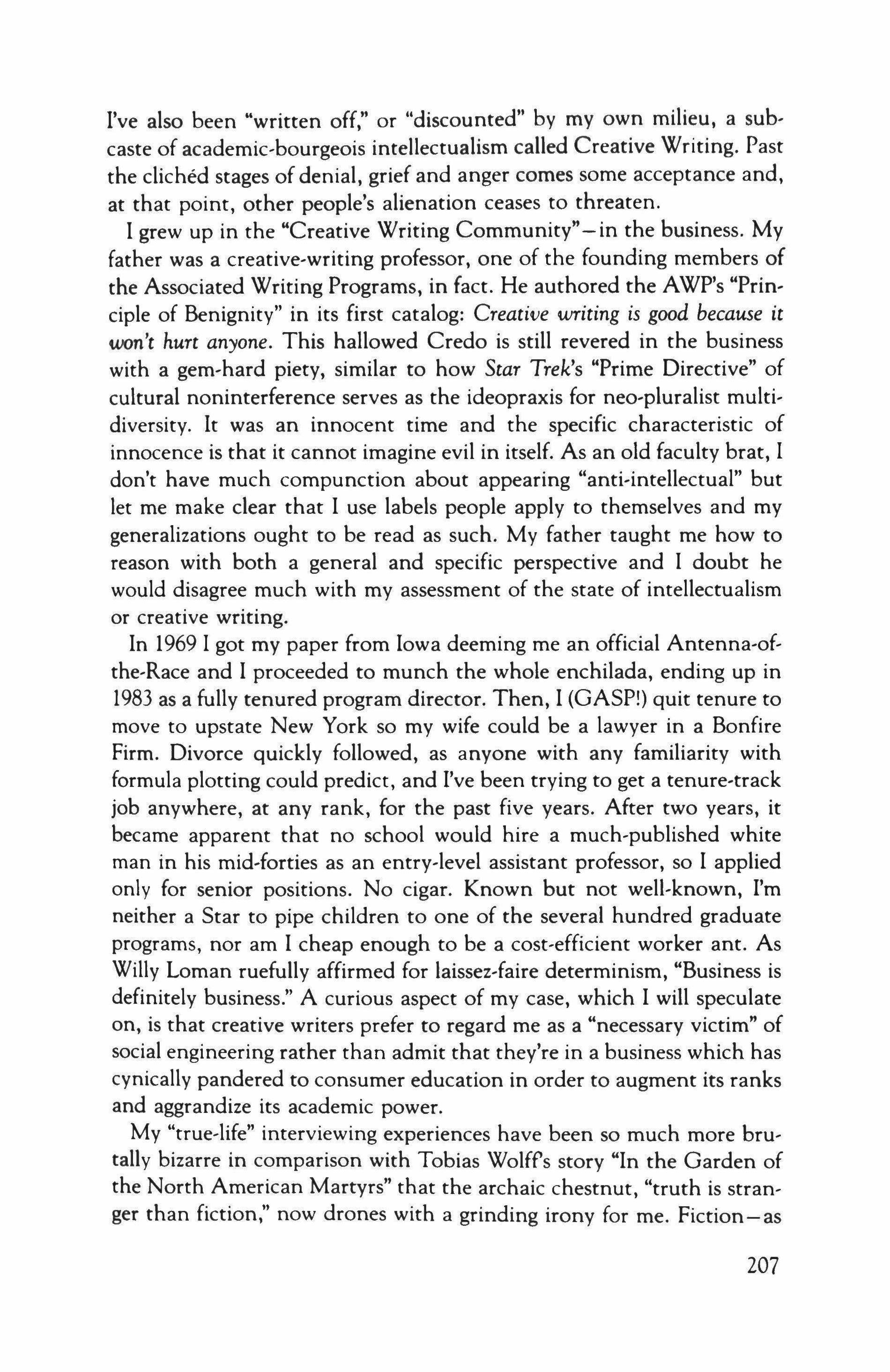
I've also been "written off," or "discounted" by my own milieu, a subcaste of academic-bourgeois intellectualism called Creative Writing. Past the cliched stages of denial, grief and anger comes some acceptance and, at that point, other people's alienation ceases to threaten.
I grew up in the "Creative Writing Community" - in the business. My father was a creative-writing professor, one of the founding members of the Associated Writing Programs, in fact. He authored the AWP's "Principle of Benignity" in its first catalog: Creative writing is good because it won't hurt anyone. This hallowed Credo is still revered in the business with a gem-hard piety, similar to how Star Trek's "Prime Directive" of cultural noninterference serves as the ideopraxis for neo-pluralist multidiversity. It was an innocent time and the specific characteristic of innocence is that it cannot imagine evil in itself. As an old faculty brat, I don't have much compunction about appearing "anti-intellectual" but let me make clear that I use labels people apply to themselves and my generalizations ought to be read as such. My father taught me how to reason with both a general and specific perspective and I doubt he would disagree much with my assessment of the state of intellectualism or creative writing.
In 1969 I got my paper from Iowa deeming me an official Antenna-ofthe-Race and I proceeded to munch the whole enchilada, ending up in 1983 as a fully tenured program director. Then, I (GASP!) quit tenure to move to upstate New York so my wife could be a lawyer in a Bonfire Firm. Divorce quickly followed, as anyone with any familiarity with formula plotting could predict, and I've been trying to get a tenure-track job anywhere, at any rank, for the past five years. After two years, it became apparent that no school would hire a much-published white man in his mid-forties as an entry-level assistant professor, so I applied only for senior positions. No cigar. Known but not well-known, I'm neither a Star to pipe children to one of the several hundred graduate programs, nor am I cheap enough to be a cost-efficient worker ant. As Willy Loman ruefully affirmed for laissez-faire determinism, "Business is definitely business." A curious aspect of my case, which I will speculate on, is that creative writers prefer to regard me as a "necessary victim" of social engineering rather than admit that they're in a business which has cynically pandered to consumer education in order to augment its ranks and aggrandize its academic power.
My "true-life" interviewing experiences have been so much more brutally bizarre in comparison with Tobias Wolffs story "In the Garden of the North American Martyrs" that the archaic chestnut, "truth is stranger than fiction," now drones with a grinding irony for me. Fiction - as
207
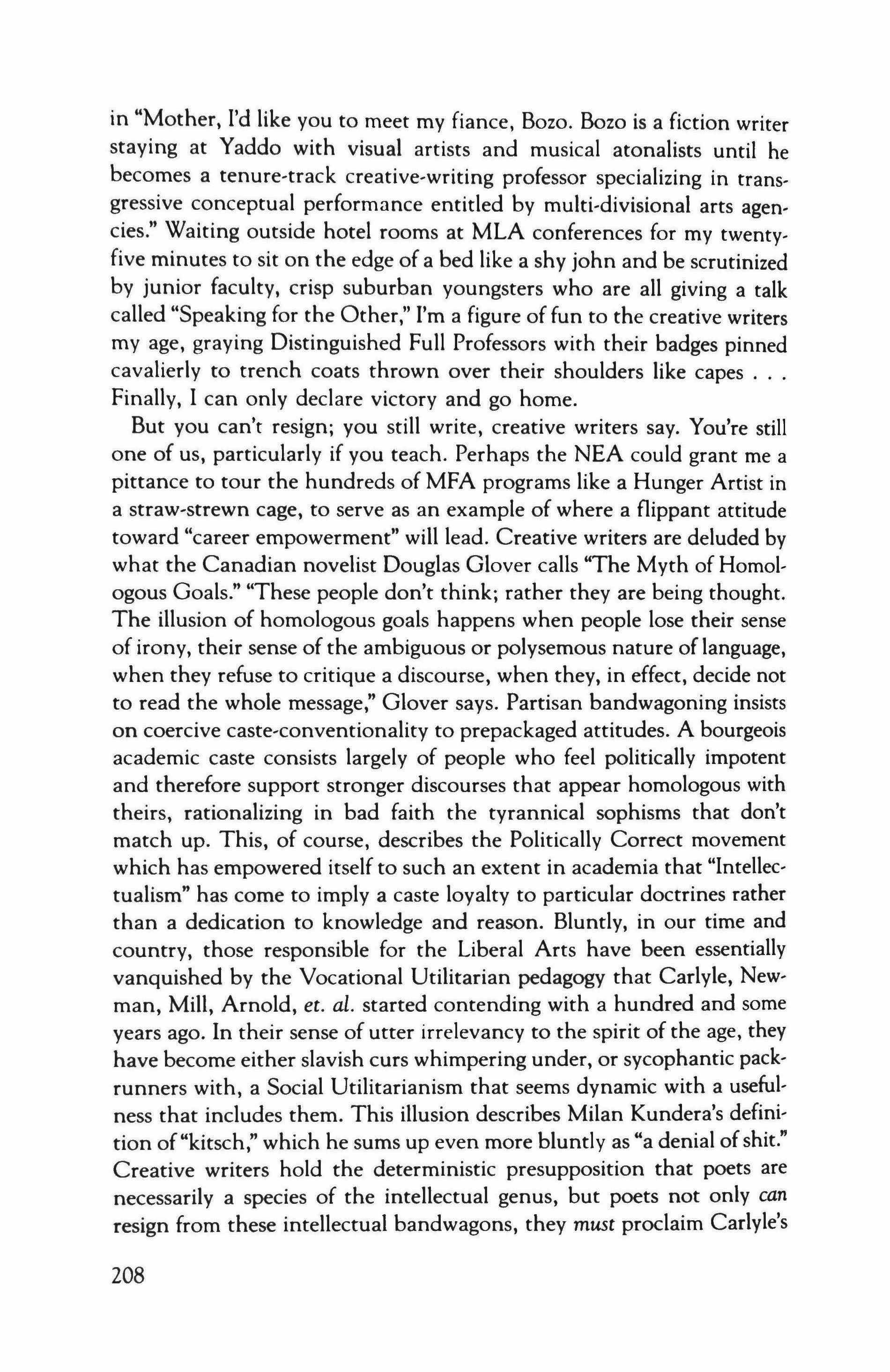
in "Mother, I'd like you to meet my fiance, Bozo. Bozo is a fiction writer staying at Yaddo with visual artists and musical atonalists until he becomes a tenure-track creative-writing professor specializing in transgressive conceptual performance entitled by multi-divisional arts agencies." Waiting outside hotel rooms at MLA conferences for my twentyfive minutes to sit on the edge of a bed like a shy john and be scrutinized by junior faculty, crisp suburban youngsters who are all giving a talk called "Speaking for the Other," I'm a figure of fun to the creative writers my age, graying Distinguished Full Professors with their badges pinned cavalierly to trench coats thrown over their shoulders like capes Finally, I can only declare victory and go home.
But you can't resign; you still write, creative writers say. You're still one of us, particularly if you teach. Perhaps the NEA could grant me a pittance to tour the hundreds of MFA programs like a Hunger Artist in a straw-strewn cage, to serve as an example of where a flippant attitude toward "career empowerment" will lead. Creative writers are deluded by what the Canadian novelist Douglas Glover calls "The Myth of Homologous Goals." "These people don't think; rather they are being thought. The illusion of homologous goals happens when people lose their sense of irony, their sense of the ambiguous or polysemous nature of language, when they refuse to critique a discourse, when they, in effect, decide not to read the whole message," Glover says. Partisan bandwagoning insists on coercive caste-conventionality to prepackaged attitudes. A bourgeois academic caste consists largely of people who feel politically impotent and therefore support stronger discourses that appear homologous with theirs, rationalizing in bad faith the tyrannical sophisms that don't match up. This, of course, describes the Politically Correct movement which has empowered itself to such an extent in academia that "Intellectualism" has come to imply a caste loyalty to particular doctrines rather than a dedication to knowledge and reason. Bluntly, in our time and country, those responsible for the Liberal Arts have been essentially vanquished by the Vocational Utilitarian pedagogy that Carlyle, Newman, Mill, Arnold, et. al. started contending with a hundred and some years ago. In their sense of utter irrelevancy to the spirit of the age, they have become either slavish curs whimpering under, or sycophantic packrunners with, a Social Utilitarianism that seems dynamic with a usefulness that includes them. This illusion describes Milan Kundera's definition of"kitsch," which he sums up even more bluntly as "a denial ofshit." Creative writers hold the deterministic presupposition that poets are necessarily a species of the intellectual genus, but poets not only can resign from these intellectual bandwagons, they must proclaim Carlyle's
208
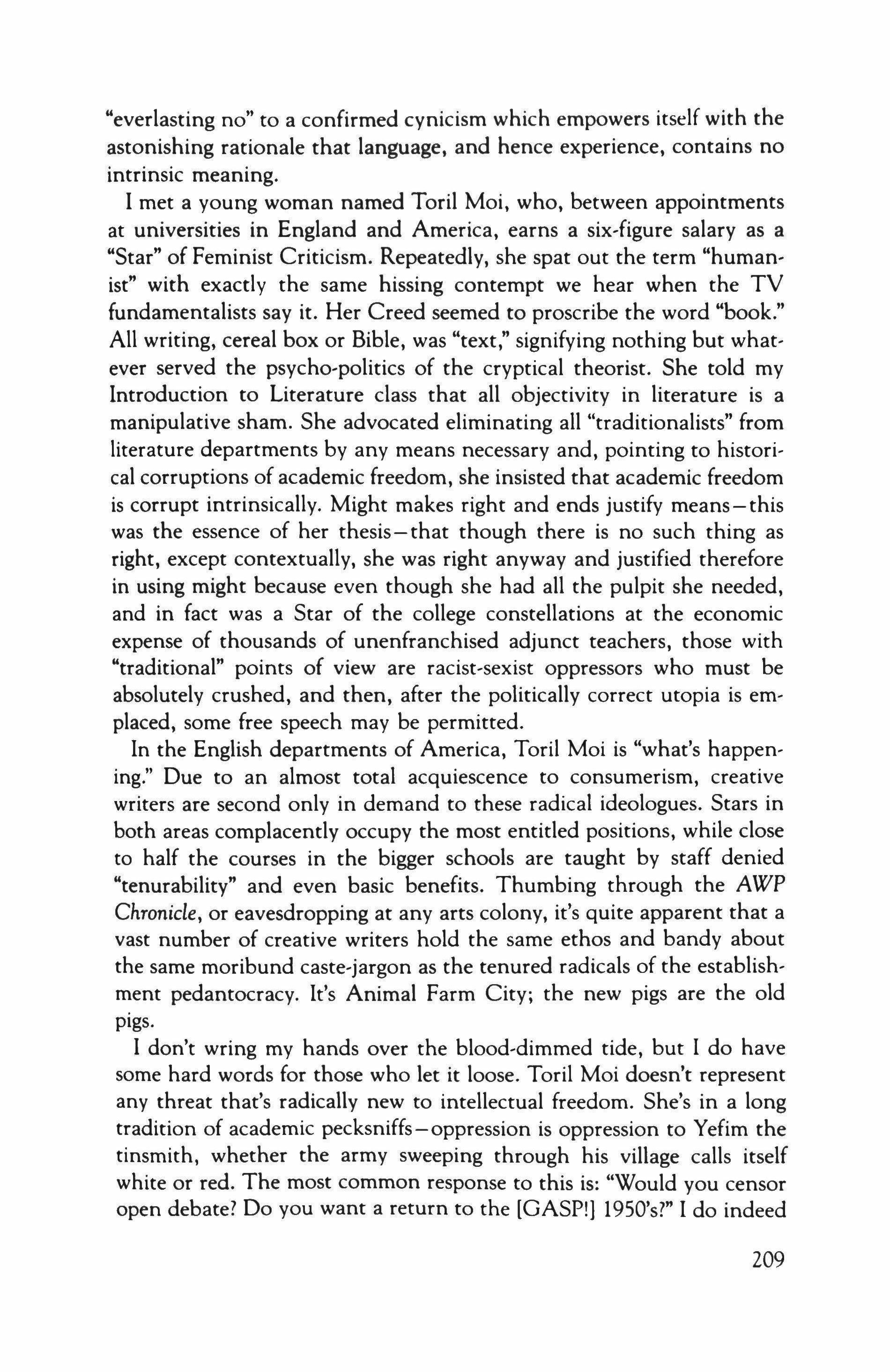
"everlasting no" to a confirmed cynicism which empowers itself with the astonishing rationale that language, and hence experience, contains no intrinsic meaning.
I met a young woman named Toril Moi, who, between appointments at universities in England and America, earns a six-figure salary as a "Star" of Feminist Criticism. Repeatedly, she spat out the term "humanist" with exactly the same hissing contempt we hear when the TV fundamentalists say it. Her Creed seemed to proscribe the word "book." All writing, cereal box or Bible, was "text," signifying nothing but whatever served the psycho-politics of the cryptical theorist. She told my Introduction to Literature class that all objectivity in literature is a manipulative sham. She advocated eliminating all "traditionalists" from literature departments by any means necessary and, pointing to historical corruptions of academic freedom, she insisted that academic freedom is corrupt intrinsically. Might makes right and ends justify means-this was the essence of her thesis-that though there is no such thing as right, except contextually, she was right anyway and justified therefore in using might because even though she had all the pulpit she needed, and in fact was a Star of the college constellations at the economic expense of thousands of unenfranchised adjunct teachers, those with "traditional" points of view are racist-sexist oppressors who must be absolutely crushed, and then, after the politically correct utopia is emplaced, some free speech may be permitted.
In the English departments of America, Toril Moi is "what's happening." Due to an almost total acquiescence to consumerism, creative writers are second only in demand to these radical ideologues. Stars in both areas complacently occupy the most entitled positions, while close to half the courses in the bigger schools are taught by staff denied "tenurabilitv" and even basic benefits. Thumbing through the AWP Chronicle, or eavesdropping at any arts colony, it's quite apparent that a vast number of creative writers hold the same ethos and bandy about the same moribund caste-jargon as the tenured radicals of the establishment pedantocracy. It's Animal Farm City; the new pigs are the old pigs.
I don't wring my hands over the blood-dimmed tide, but I do have some hard words for those who let it loose. Toril Moi doesn't represent any threat that's radically new to intellectual freedom. She's in a long tradition of academic pecksniffs-oppression is oppression to Yefim the tinsmith, whether the army sweeping through his village calls itself white or red. The most common response to this is: "Would you censor open debate? Do you want a return to the [GASP!] 1950's?" I do indeed
209
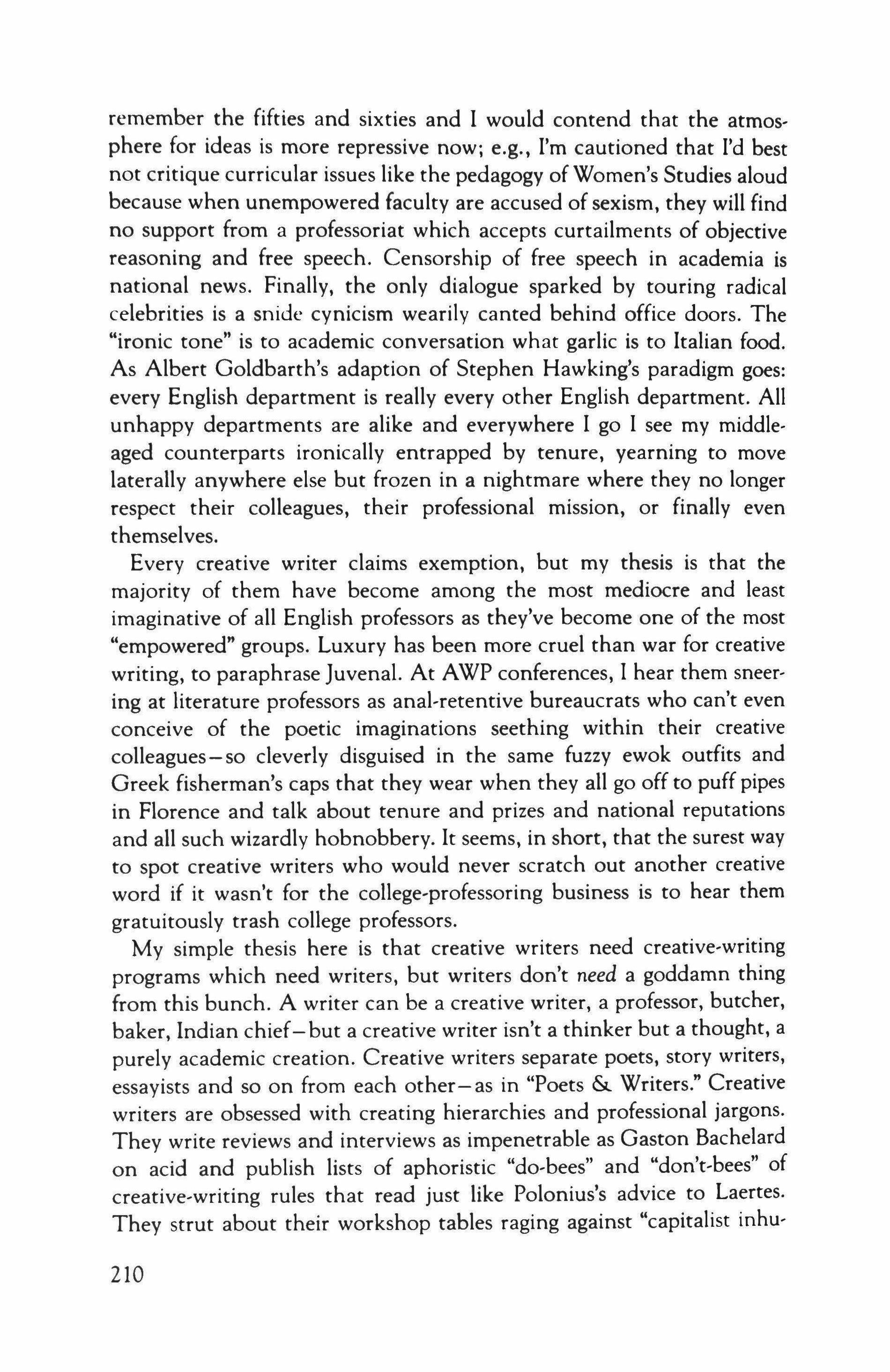
remember the fifties and sixties and I would contend that the atmosphere for ideas is more repressive now; e.g., I'm cautioned that I'd best not critique curricular issues like the pedagogy of Women's Studies aloud because when unempowered faculty are accused of sexism, they will find no support from a professoriat which accepts curtailments of objective reasoning and free speech. Censorship of free speech in academia is national news. Finally, the only dialogue sparked by touring radical celebrities is a snide cynicism wearily canted behind office doors. The "ironic tone" is to academic conversation what garlic is to Italian food. As Albert Goldbarth's adaption of Stephen Hawking's paradigm goes: every English department is really every other English department. All unhappy departments are alike and everywhere I go I see my middleaged counterparts ironically entrapped by tenure, yearning to move laterally anywhere else but frozen in a nightmare where they no longer respect their colleagues, their professional mission, or finally even themselves.
Every creative writer claims exemption, but my thesis is that the majority of them have become among the most mediocre and least imaginative of all English professors as they've become one of the most "empowered" groups. Luxury has been more cruel than war for creative writing, to paraphrase Juvenal. At AWP conferences, I hear them sneering at literature professors as anal-retentive bureaucrats who can't even conceive of the poetic imaginations seething within their creative colleagues-so cleverly disguised in the same fuzzy ewok outfits and Greek fisherman's caps that they wear when they all go off to puff pipes in Florence and talk about tenure and prizes and national reputations and all such wizardly hobnobbery. It seems, in short, that the surest way to spot creative writers who would never scratch out another creative word if it wasn't for the college-professoring business is to hear them gratuitously trash college professors.
My simple thesis here is that creative writers need creative-writing programs which need writers, but writers don't need a goddamn thing from this bunch. A writer can be a creative writer, a professor, butcher, baker, Indian chief-but a creative writer isn't a thinker but a thought, a purely academic creation. Creative writers separate poets, story writers, essayists and so on from each other-as in "Poets & Writers." Creative writers are obsessed with creating hierarchies and professional jargons. They write reviews and interviews as impenetrable as Gaston Bachelard on acid and publish lists of aphoristic "do-bees" and "don't-bees" of creative-writing rules that read just like Polonius's advice to Laerres. They strut about their workshop tables raging against "capitalist inhu-
210
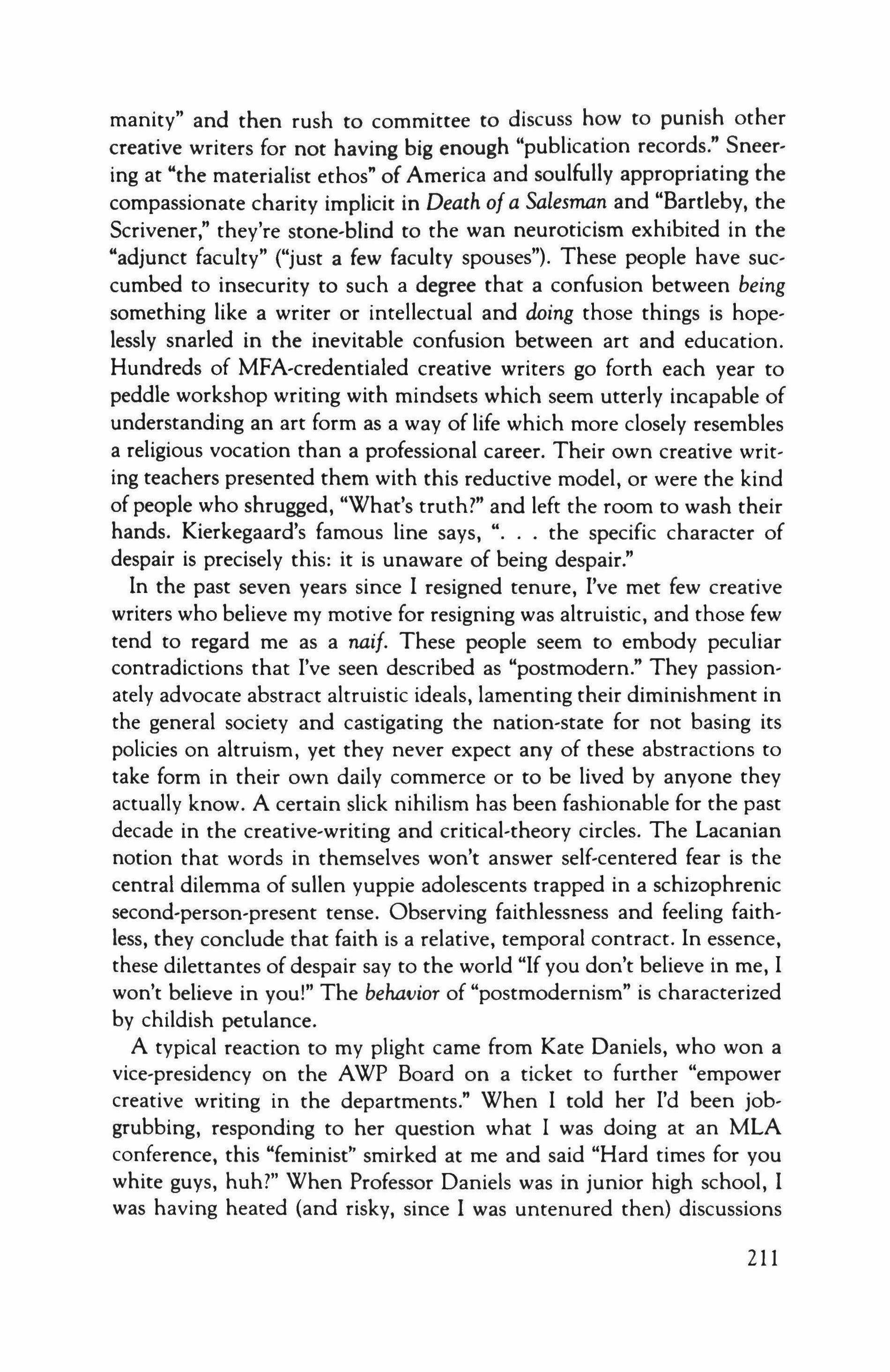
manity" and then rush to committee to discuss how to punish other creative writers for not having big enough "publication records." Sneering at "the materialist ethos" of America and soulfully appropriating the compassionate charity implicit in Death of a Salesman and "Bartlebv, the Scrivener," they're stone-blind to the wan neuroticism exhibited in the "adjunct faculty" ("just a few faculty spouses"). These people have succumbed to insecurity to such a degree that a confusion between being something like a writer or intellectual and doing those things is hopelessly snarled in the inevitable confusion between art and education. Hundreds of MFA-credentialed creative writers go forth each year to peddle workshop writing with mindsets which seem utterly incapable of understanding an art form as a way of life which more closely resembles a religious vocation than a professional career. Their own creative writing teachers presented them with this reductive model, or were the kind of people who shrugged, "What's truth?" and left the room to wash their hands. Kierkegaard's famous line says, ", the specific character of despair is precisely this: it is unaware of being despair."
In the past seven years since I resigned tenure, I've met few creative writers who believe my motive for resigning was altruistic, and those few tend to regard me as a naif. These people seem to embody peculiar contradictions that I've seen described as "postrnodern," They passionately advocate abstract altruistic ideals, lamenting their diminishment in the general society and castigating the nation-state for not basing its policies on altruism, yet they never expect any of these abstractions to take form in their own daily commerce or to be lived by anyone they actually know. A certain slick nihilism has been fashionable for the past decade in the creative-writing and critical-theory circles. The Lacanian notion that words in themselves won't answer self-centered fear is the central dilemma of sullen yuppie adolescents trapped in a schizophrenic second-person-present tense. Observing faithlessness and feeling faithless, they conclude that faith is a relative, temporal contract. In essence, these dilettantes of despair say to the world "If you don't believe in me, I won't believe in you!" The behavior of "postmodernism" is characterized by childish petulance.
A typical reaction to my plight came from Kate Daniels, who won a vice-presidency on the AWP Board on a ticket to further "empower creative writing in the departments." When I told her I'd been jobgrubbing, responding to her question what I was doing at an MLA conference, this "feminist" smirked at me and said "Hard times for you white guys, huh?" When Professor Daniels was in junior high school, I was having heated (and risky, since I was untenured then) discussions
211
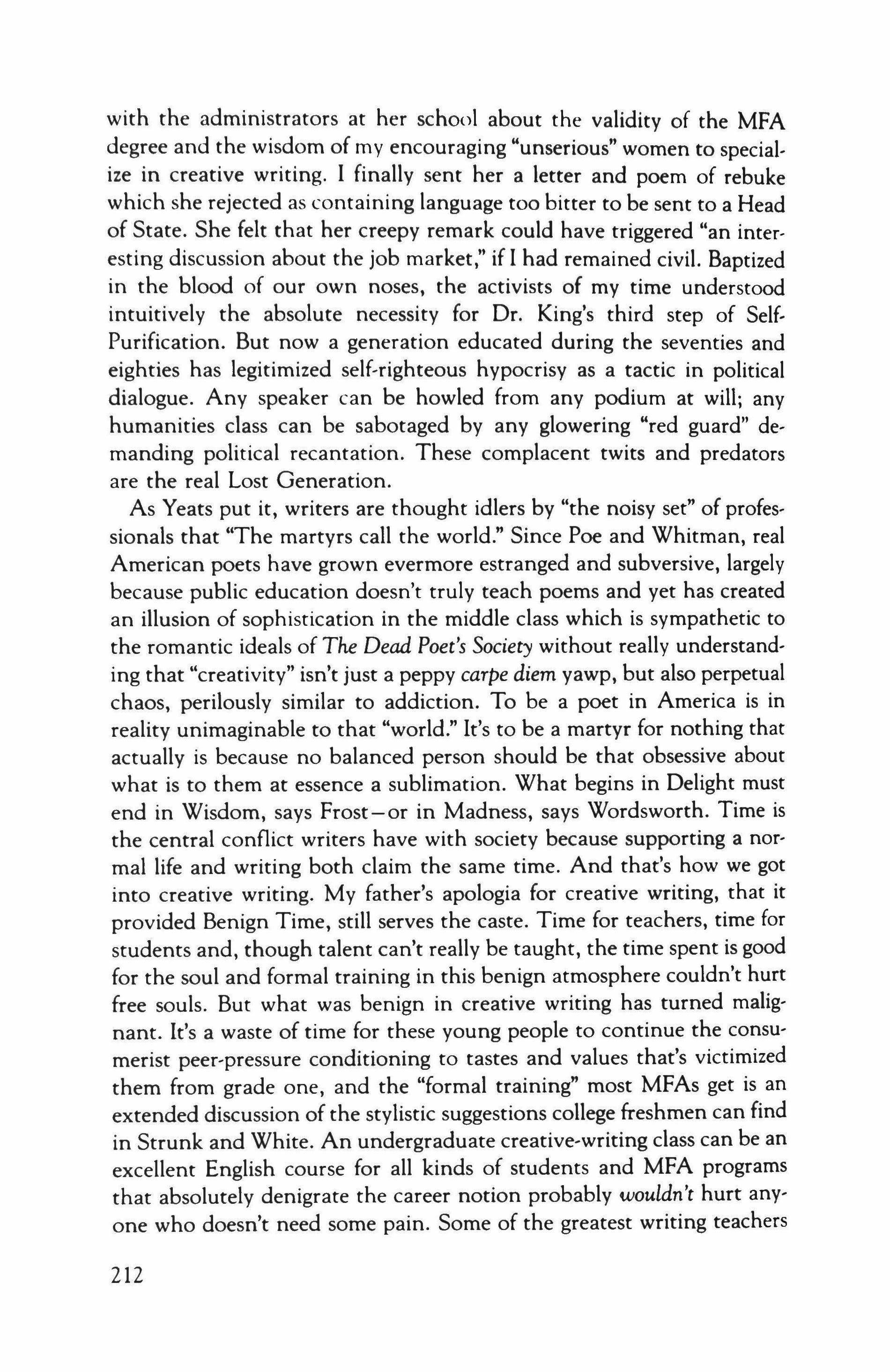
with the administrators at her school about the validity of the MFA degree and the wisdom of my encouraging "unserious" women to specialize in creative writing. I finally sent her a letter and poem of rebuke which she rejected as containing language too bitter to be sent to a Head of State. She felt that her creepy remark could have triggered "an interesting discussion about the job market," if I had remained civil. Baptized in the blood of our own noses, the activists of my time understood intuitively the absolute necessity for Dr. King's third step of SelfPurification. But now a generation educated during the seventies and eighties has legitimized self-righteous hypocrisy as a tactic in political dialogue. Any speaker can be howled from any podium at will; any humanities class can be sabotaged by any glowering "red guard" demanding political recantation. These complacent twits and predators are the real Lost Generation.
As Yeats put it, writers are thought idlers by "the noisy set" of professionals that "The martyrs call the world." Since Poe and Whitman, real American poets have grown evermore estranged and subversive, largely because public education doesn't truly teach poems and yet has created an illusion of sophistication in the middle class which is sympathetic to the romantic ideals of The Dead Poet's Society without really understanding that "creativity" isn't just a peppy carpe diem yawp, but also perpetual chaos, perilously similar to addiction. To be a poet in America is in reality unimaginable to that "world." It's to be a martyr for nothing that actually is because no balanced person should be that obsessive about what is to them at essence a sublimation. What begins in Delight must end in Wisdom, says Frost-or in Madness, says Wordsworth. Time is the central conflict writers have with society because supporting a normal life and writing both claim the same time. And that's how we got into creative writing. My father's apologia for creative writing, that it provided Benign Time, still serves the caste. Time for teachers, time for students and, though talent can't really be taught, the time spent is good for the soul and formal training in this benign atmosphere couldn't hurt free souls. But what was benign in creative writing has turned malignant. It's a waste of time for these young people to continue the consumerist peer-pressure conditioning to tastes and values that's victimized them from grade one, and the "formal training" most MFAs get is an extended discussion of the stylistic suggestions college freshmen can find in Strunk and White. An undergraduate creative-writing class can be an excellent English course for all kinds of students and MFA programs that absolutely denigrate the career notion probably wouldn't hurt anyone who doesn't need some pain. Some of the greatest writing teachers
212

were never much as writers and thousands of great writers never learned workshop jargon. Starting in high schools, creative writing has become another extension of the suburban public education psychocracy and it's a predictable irony that those being hurt the most by its professionalizaton are mainly unaware of how their virtu has been subverted into accidie. Too many of the MFA-holders I meet have such a schoolish understanding of language and literature it would be best if they had none at all. The only curiosity many of them have for books, ideas or reading is from a professional-currency standpoint. Their social and cultural attitudes are complacently fixed; they talk in arts-speak and psychobabble and they suffer from the contemporary malaise of aimless narcissistic insecurity which focuses on "career-fear."
Of course, I wouldn't be waxing so acerbic if I didn't want a tenured teaching job and I do quite naturally harbor a generation-gap grudge that many of these ignorant and often disagreeable grown-up children brag about turning down jobs I can't get. But fuck me if I can't take a joke, right? I'd like to have a lot of stuff. I'd like to publish every word I write in lovely, best-selling books and have my poems made into blockbuster movies like "Gunga Din" was. I want to go to brilliant literary parties where brilliant, beautiful people are brilliantly beautiful to me. I'd like the NEA, Guggenheims, MacArthurs and all to mail me bushels of money and when I feel blue I want to crawl up on Helen Vendler's lap and suck my thumb into sweet serenity. But, of course, I don't need any of this crap. In dealing with what martyrs call the world, we have to wear life like a loose raiment, give unto Caesar and slide on our own steam like an ice cube across a hot stove. But I don't like to be patronized and I sure as hell won't be mealy-mouthed by artsocrats whose smug, presupposed professionalism proscribes the bitterness of those they exclude and trivialize. As for how my job failure compromises my complaint: yes, my grapes seem sour but, as Edmund Burke points out, your palates are already vitiated to a complacency with bitter wine. Call me "just bitter," but name-calling isn't any refutation, intellectual or otherwise. Why don't intellectuals protected by tenure either reform their works and days and insist on making my case their own, or quit their high-toned moral posturing in the name of intellectualism?
Creative writers are the kind of people who say to me "You ought to get a sex-change operation. Har-har-har," They're also the sort of people who label such lame wit as "locker-room sexism" when someone else says it. In fact, it's faculty-lounge cynicism - but their own self-loathing is the sort of shit they must deny at all costs. Everyone in the "bizness" knows that poets are particularly superfluous to the market and one very prob-
213
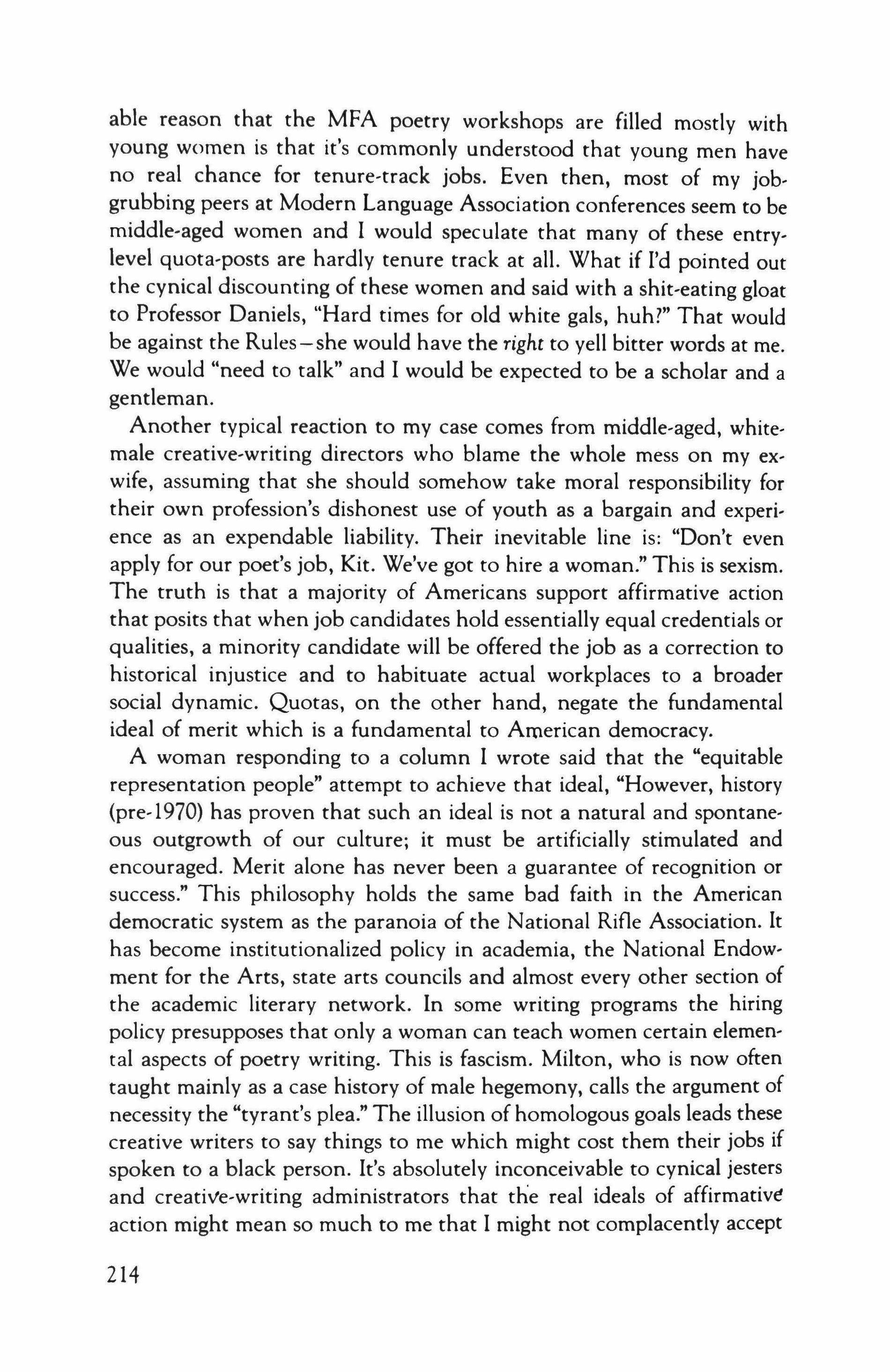
able reason that the MFA poetry workshops are filled mostly with young women is that it's commonly understood that young men have no real chance for tenure-track jobs. Even then, most of my jobgrubbing peers at Modern Language Association conferences seem to be middle-aged women and I would speculate that many of these entrylevel quota-posts are hardly tenure track at all. What if I'd pointed out the cynical discounting of these women and said with a shit-eating gloat to Professor Daniels, "Hard times for old white gals, huh?" That would be against the Rules - she would have the right to yell bitter words at me. We would "need to talk" and I would be expected to be a scholar and a gentleman.
Another typical reaction to my case comes from middle-aged, whitemale creative-writing directors who blame the whole mess on my exwife, assuming that she should somehow take moral responsibility for their own profession's dishonest use of youth as a bargain and experience as an expendable liability. Their inevitable line is: "Don't even apply for our poet's job, Kit. We've got to hire a woman." This is sexism. The truth is that a majority of Americans support affirmative action that posits that when job candidates hold essentially equal credentials or qualities, a minority candidate will be offered the job as a correction to historical injustice and to habituate actual workplaces to a broader social dynamic. Quotas, on the other hand, negate the fundamental ideal of merit which is a fundamental to American democracy.
A woman responding to a column I wrote said that the "equitable representation people" attempt to achieve that ideal, "However, history (pre-1970) has proven that such an ideal is not a natural and spontaneous outgrowth of our culture; it must be artificially stimulated and encouraged. Merit alone has never been a guarantee of recognition or success." This philosophy holds the same bad faith in the American democratic system as the paranoia of the National Rifle Association. It has become institutionalized policy in academia, the National Endowment for the Arts, state arts councils and almost every other section of the academic literary network. In some writing programs the hiring policy presupposes that only a woman can teach women certain elemental aspects of poetry writing. This is fascism. Milton, who is now often taught mainly as a case history of male hegemony, calls the argument of necessity the "tyrant's plea." The illusion of homologous goals leads these creative writers to say things to me which might cost them their jobs if spoken to a black person. It's absolutely inconceivable to cynical jesters and creative-writing administrators that the real ideals of affirmative action might mean so much to me that I might not complacently accept
214
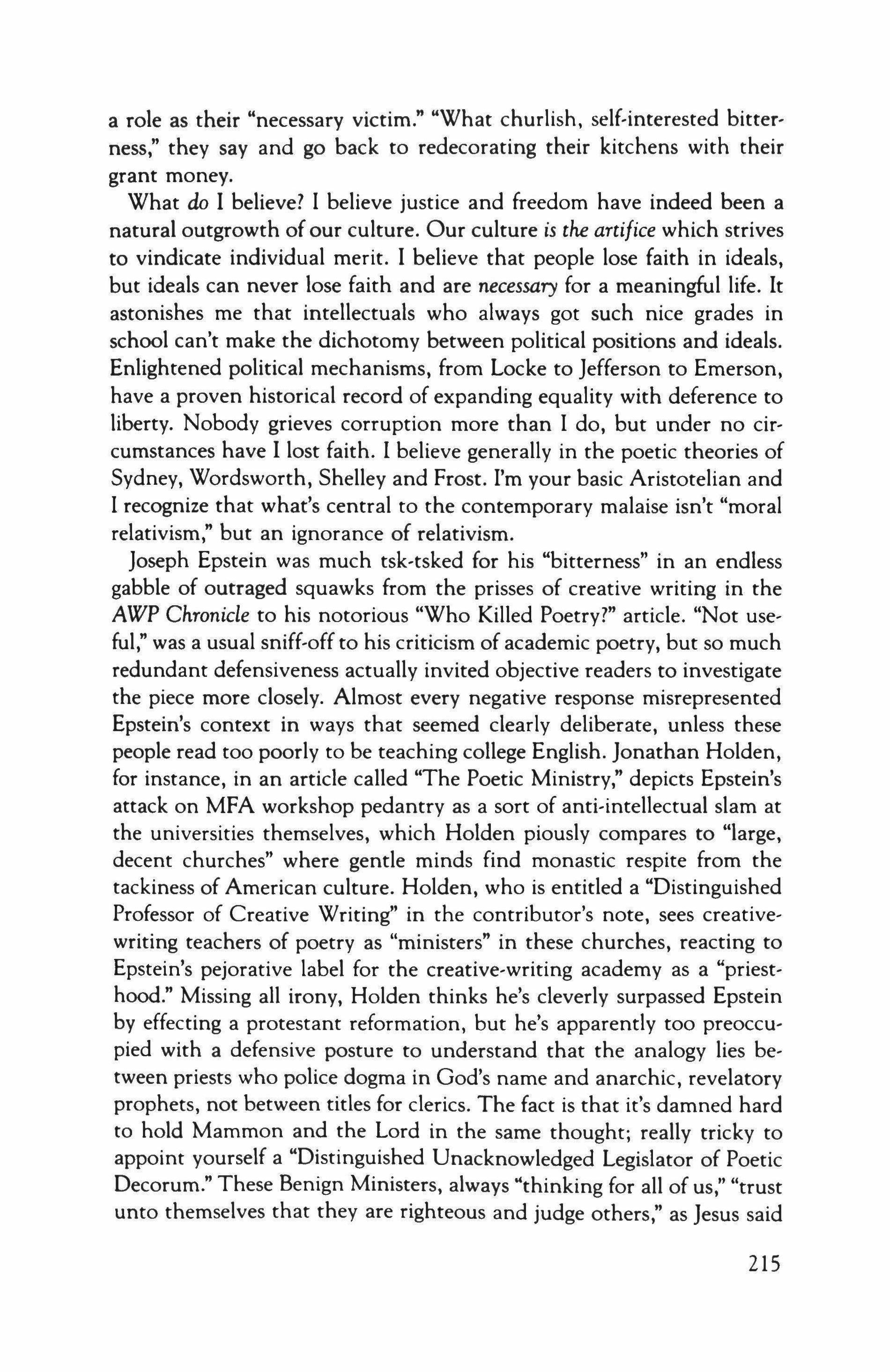
a role as their "necessary victim." "What churlish, self-interested bitterness," they say and go back to redecorating their kitchens with their grant money.
What do I believe? I believe justice and freedom have indeed been a natural outgrowth of our culture. Our culture is the artifice which strives to vindicate individual merit. I believe that people lose faith in ideals, but ideals can never lose faith and are necessary for a meaningful life. It astonishes me that intellectuals who always got such nice grades in school can't make the dichotomy between political positions and ideals. Enlightened political mechanisms, from Locke to Jefferson to Emerson, have a proven historical record of expanding equality with deference to liberty. Nobody grieves corruption more than I do, but under no circumstances have I lost faith. I believe generally in the poetic theories of Sydney, Wordsworth, Shelley and Frost. I'm your basic Aristotelian and I recognize that what's central to the contemporary malaise isn't "moral relativism," but an ignorance of relativism.
Joseph Epstein was much tsk-tsked for his "bitterness" in an endless gabble of outraged squawks from the prisses of creative writing in the AWP Chronicle to his notorious "Who Killed Poetry?" article. "Not useful," was a usual sniff-off to his criticism of academic poetry, but so much redundant defensiveness actually invited objective readers to investigate the piece more closely. Almost every negative response misrepresented Epstein's context in ways that seemed clearly deliberate, unless these people read too poorly to be teaching college English. Jonathan Holden, for instance, in an article called "The Poetic Ministry," depicts Epstein's attack on MFA workshop pedantry as a sort of anti-intellectual slam at the universities themselves, which Holden piously compares to "large, decent churches" where gentle minds find monastic respite from the tackiness of American culture. Holden, who is entitled a "Distinguished Professor of Creative Writing" in the contributor's note, sees creativewriting teachers of poetry as "ministers" in these churches, reacting to Epstein's pejorative label for the creative-writing academy as a "priesthood." Missing all irony, Holden thinks he's cleverly surpassed Epstein by effecting a protestant reformation, but he's apparently too preoccupied with a defensive posture to understand that the analogy lies between priests who police dogma in God's name and anarchic, revelatory prophets, not between titles for clerics. The fact is that it's damned hard to hold Mammon and the Lord in the same thought; really tricky to appoint yourself a "Distinguished Unacknowledged Legislator of Poetic Decorum." These Benign Ministers, always "thinking for all of us," "trust unto themselves that they are righteous and judge others," as Jesus said
215

of his Pharisees. Analogously, it follows that MFA students should be mature enough to do as their teachers say, but not as they do. But few of them can divine that the "Question Authority" stickers on their teachers' Volvos really cover a "Shit Happens" philosophy. Epstein says, " just now the entire enterprise of poetic creation seems threatened by having been taken out of the world, chilled in the classroom, and vastly overproduced by men and women who are licensed to write it by degree if not necessarily by talent or spirit." A common conviction of MFA students is that many or most of their fellows are phonies who were admitted to pad the program. I think they're probably right, but that it's not a new circumstance, nor that it threatens "the entire enterprise of poetic creation." What Epstein is probably saying is that the poetic literary scene in America has become a drag because consumer education has turned creative writing into another parochial publication-field in the ivory tower. A flabby pedantry, twisting the concept of prophetic "unworldliness" to ironically justify a banal parochialism, presents itself as the sole poetic enterprise to a generation whose education has made them believe that the intellectual process is a comparison of preassembled ideas to confirm an ideology of cultural materialism, an ironically absolute relativism. Epstein is finally too categorical to escape the search for knowledge as a conscientious field-study along projected lines of logic. Poets, however, don't "keep up" with fields; they "stick with nothing deliberately, but will let what will stick to them like burrs when they walk in the fields," as Frost says. Epstein and Holden seem ironically similar to me; both know these things and, in fact, say them often. J. S. Mill said, "Originality is the one thing unoriginal minds cannot feel the use of." How could they? An interesting characteristic of uncreative minds is not that creativity is a mystery to them, but that it appears so explicable to them it's almost a banality. They hear with their ears, but don't see with their eyes. They talk the talk, but don't walk the walk. The truth is that churches need God, but God doesn't need churches. Epstein's analysis that writing workshops have become the studios of a stifling Academy is quite correct and Holden's argument that real poetry still happens is also true. But, as Frost says, the really precious quality of poetry is that it runs on itself and carries away the poet with it toward wisdom.
Creative writing isn't like a religion, a denomination of churches, but like a business corporation or, speaking metaphorically, it makes a business of a religion. It operates like development real estate in a scarcity economy of value where "progress" is equated with constant growth. The National Endowment for the Arts is the other side of what is an
216

Academic/Government Complex. When political right-wingers who want to censor art went after the NEA in 1989, those pseudoconservatives made a fine distinction: they didn't want to censor any art, they just didn't want taxpayers to fund art they find objectionable. Which means art funded by taxpayers would be censored for what some few might find obscene or blasphemous. Which means, of course, that everything that depends on such funding, which is really a hell of a lot, would have to consider the censor. The Right Thing To Do in the face of this is really quite simple. No compromise.
The truth is that the NEA has already politicized itself and in doing so made the arts (whatever in hell "the arts" really are) funded by government money vulnerable to right-wing puritanism. Guidelines for almost all federally-funded grants demand an "equitable" mix of peer panelists by gender, race and region, which in practice means demographic quotas and also implies a psychocratic stance which is obsessed with an idea of art as an expression of"Cultural Identity." Communities are sectionalized from each other on the basis of their victimization by larger communities. All gays, all women, all Native Americans and so on-all become monolithic voices crying the crude kitsch of homologous goals. Artwork is routinely dismissed by panels from further consideration for funding when even one of the panelists detects a whiff of a politically incorrect attitude. Jesse Helms, who is just a cynical demagogue working for cigarette companies who have their own very pointed free-speech issues, is merely saying tit for tat: I get to censor what I think is socially offensive, just like you. The truth is that the politicalization of this illusion of homologous goals has decimated American liberalism, drowned the ceremony of innocence by letting loose both the trust-fund radicals and cargo-cult conservatives. But other people write whole books on that. I won't even speculate on "Networkshopping," except to note that many of the articles on the NEA controversy admit ruefully that funded art has no "impact," political or cultural, on the country as a whole. The "spirit of the age" is not in these fabricators of fixed icon and static litany who are the completely acknowledged programmers of conformism for a socially irrelevant caste of intelligentsia.
Under these circumstances, many poets would rather the NEA Literature Division didn't exist at all, though it rarely seems worth the trouble to say so. If all the NEA did was to offer chunks of money to some lucky folk: What the hell-go for it! But after years of going for it, I came to understand I wasn't likely to win that lottery, that I didn't like gambling, didn't need to win anything, and didn't much care who did win - as long
217
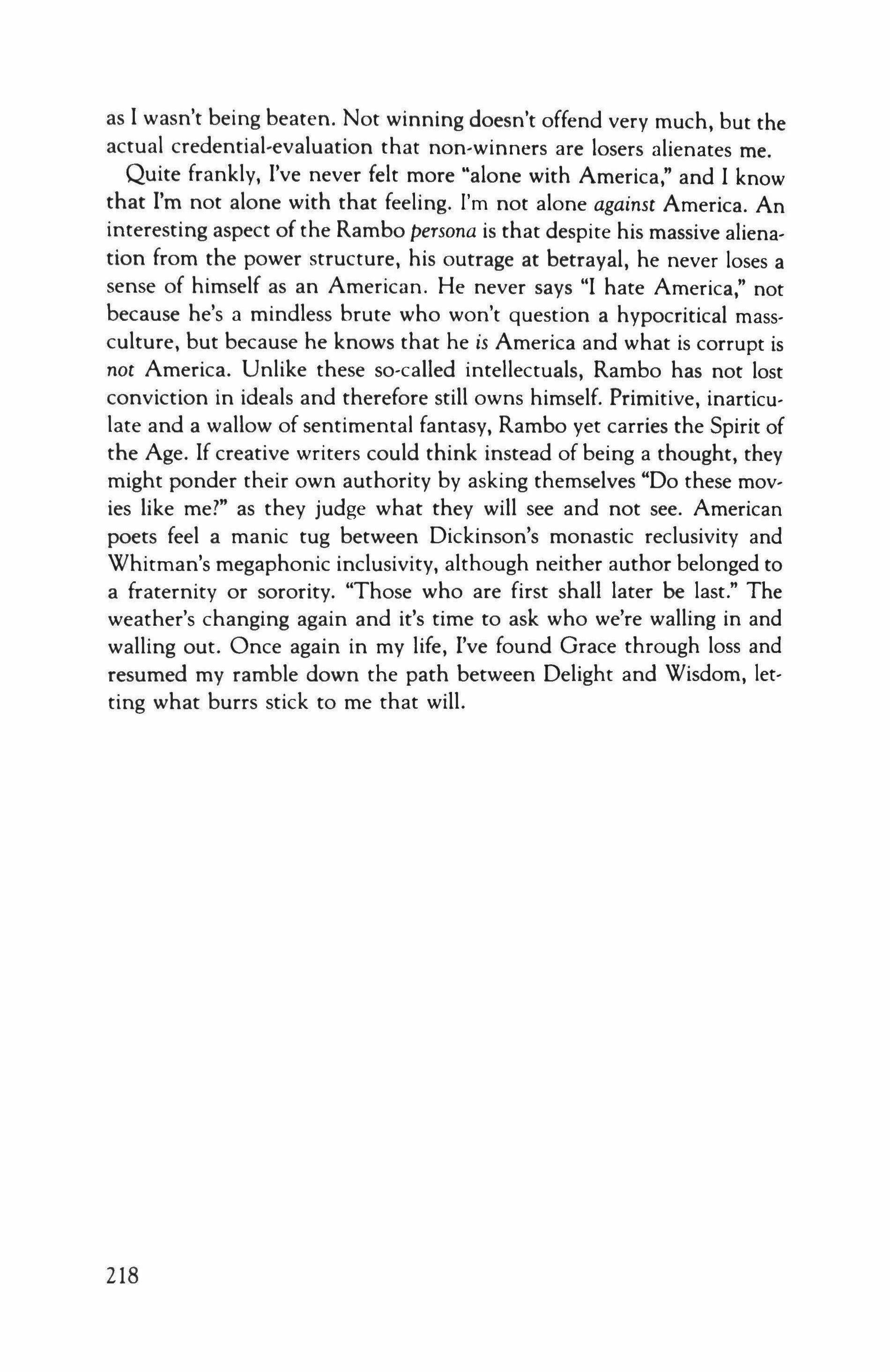
as I wasn't being beaten. Not winning doesn't offend very much, but the actual credential-evaluation that non-winners are losers alienates me. Quite frankly, I've never felt more "alone with America," and I know that I'm not alone with that feeling. I'm not alone against America. An interesting aspect of the Rambo persona is that despite his massive alienation from the power structure, his outrage at betrayal, he never loses a sense of himself as an American. He never says "I hate America," not because he's a mindless brute who won't question a hypocritical massculture, but because he knows that he is America and what is corrupt is not America. Unlike these so-called intellectuals, Rambo has not lost conviction in ideals and therefore still owns himself. Primitive, inarticulate and a wallow of sentimental fantasy, Rambo yet carries the Spirit of the Age. If creative writers could think instead of being a thought, they might ponder their own authority by asking themselves "Do these movies like me?" as they judge what they will see and not see. American poets feel a manic tug between Dickinson's monastic reclusivity and Whitman's megaphonic inclusivity, although neither author belonged to a fraternity or sorority. "Those who are first shall later be last." The weather's changing again and it's time to ask who we're walling in and walling out. Once again in my life, I've found Grace through loss and resumed my ramble down the path between Delight and Wisdom, letting what burrs stick to me that will.
218
Boy Racer
Geoffrey Wolff

I own two Bugattis (a dark blue Type 35B, the "B" for "blown," supercharged, and a black-and-red 1932 Type 50 coupe, tres rare, with Carrosserie Profilee coachwork); I shall mention as well my 1931 Le Mans Alfa Romeo (red, need I say?), and drop the name of my Hispano-Suiza drophead coupe. Of course I control rights to a 1953 Mercedes 300SL Gullwing (gray). There are other motorcars in my stable, but these five I keep eye-level as I write, on a shelf above my desk, where busts of Melville and Flaubert might sit. How could I explain to the busts of Melville and Flaubert my high-pitched car noises - the commotion of gear-changes at Brooklands, Silverstone, Monaco, Monza, the dread Nurburgring, Lime Rock, brrrmmmm, brmmmmm, yaaaaaaah? My toy cars are accustomed to the racket.
Some think it's weird. I got looks a few days ago at the parking lot of lnskip Motors, near where I live in Rhode Island. You wouldn't think customers and salespeople would find it whimsical to see a half century of homo sapiens revving up with his vocal cords, and wrestling the steering wheel of a stationary Porsche 911 Turbo.
What's to understand? American kids make car noises. I sounded off riding my Schwinn, and whacking bumper cars into other bumper cars at Rye's Playland. In math class I drew cars. A dream for me was a car dream, or a dream car: in bicycle days a Hudson Hornet, by 1948 an MGTC.
Let me lay my genes on the table: my dad was nuts about cars; he'd do anything to bring the car of his dreams to life full-size, and make the uproar for him. When I say he'd do anything, I mean anything, but that's a darker story, ending with bad checks and the steel chateau.
I grew up traveling Pacific to Atlantic to Pacific to Atlantic in an
219

unpaid-for 1936 Packard 12-cylinder Victoria convertible, followed after its repossession by a similarly-financed 1937 Ford station, the ur-Woody, just a peach of a car, and if Corgi or Rio or Matchbox made toy models of that Ford, I'd be humming "Sutfin' Safari" to it right now.
The Packard and Ford, my parents' terminal Made-in-America motorcars, represent conventional nostalgia, a memory of the cars you grew up hearing your mom and dad boast about, the cars you told your school-friends were so manifestly superior to their own parents' DeSotos and Pontiacs that you were ashamed to share a homeroom with the poor saps. My father's 1948 MG TC was miles beyond this American pack, even if its top speed of 8S-supercharged, with the blower bolted to the front bumper, where it couldn't be missed by viewer or backing-upDodge-truck-could be exceeded by a poorly-tuned Buick sedan.
But great hairy Ned! That MG was a sport's car. Brewster green, almost black, with wire wheels, tan hide cockpit, steering wheel on the wrong side, fold-down windshield, a ride as stiff as a buckboard's, whining exhaust, undependable, fussy, unforeseen. People laughed at it, but uncomfortably, as I imagine they might if the Second Comer comes. You didn't not notice my dad's MG, not in Old Lyme, Connecticut, you didn't not, not if you were the kid getting driven to his first day of school at Old Lyme Elementary School by a big man in a tiny car, and the big man would say anything to anyone, and stutter when he said the thing.
So I got used to riding in cars people noticed. A few years after the MG had sated my father's interest there arrived in our family a Jaguar XK 120, the highline "M" version, with wire wheels, cream exterior, red leather, very fussy. This was the car I, at fourteen, stole. I could scuff my toe about this crime, put on a long, blushing face and say I was going through a confused adolescence, I know better now, I'll be better. But in fact I'd steal it again if it were in my driveway in Bell Buckle, Tennessee, again, and I believed the owner to be sleeping an air-conditioned sleep on a sweltering August night, and I knew where the keys were kept, and how to move the gear lever around, sort of. I backed that roadster down our driveway, and started her, and trolled her out to the road to Wartrace, and blew some serious doors.
That night set the hook in me. Later my father got keys (but no titles) to a mess of European cars: two more Jags, a Ferrari roadster, an Alfa sedan (for the practical side of him), a couple of Abarth-Zagatos, I must be forgetting a few. We built car models together, and washed our cars together, and waxed cars together, and went to Lime Rock and Bridgehampton together, and listened to Sounds of Sebring, a long-playing
220
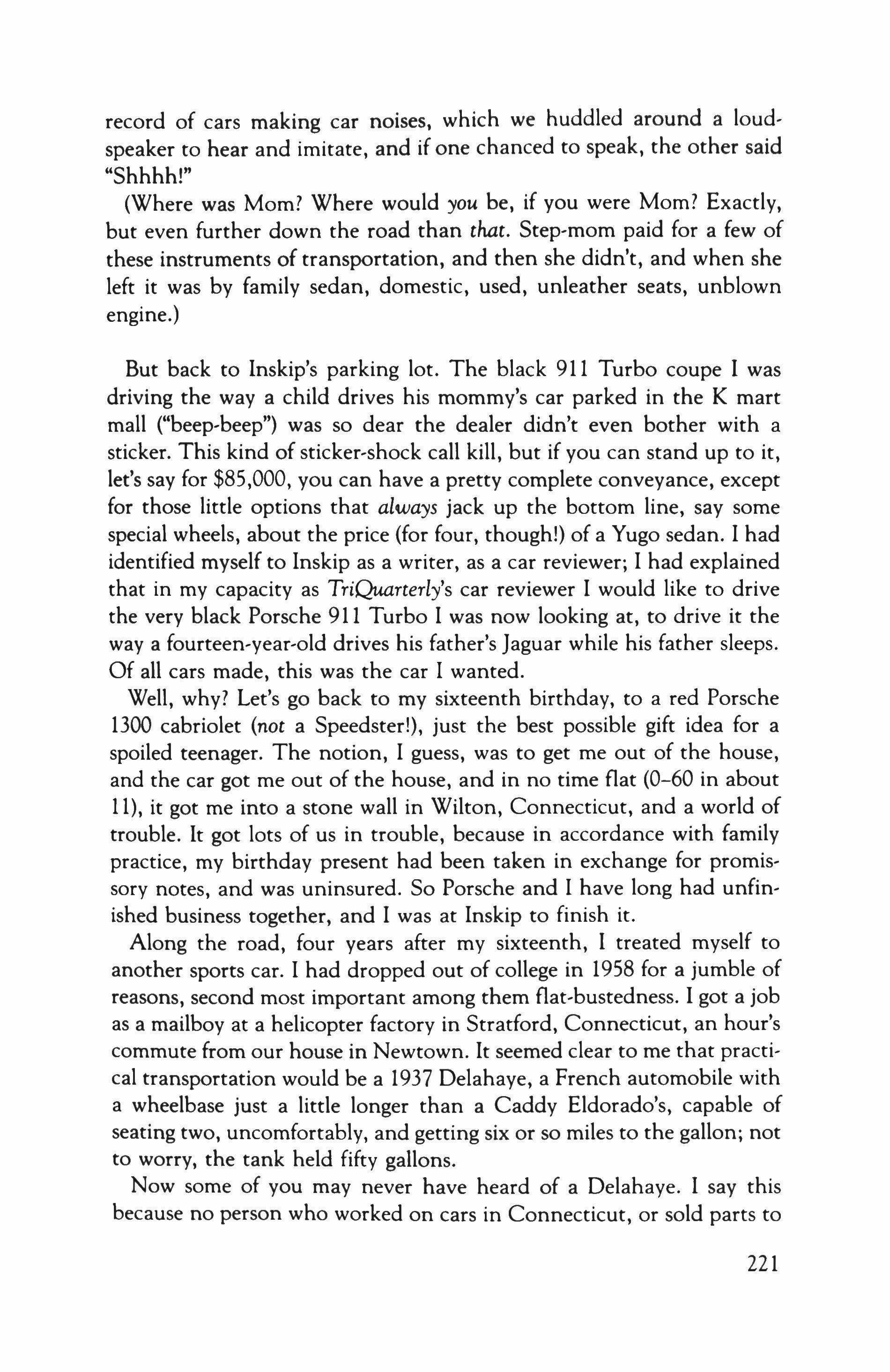
record of cars making car noises, which we huddled around a loudspeaker to hear and imitate, and if one chanced to speak, the other said "Shhhh!"
(Where was Mom? Where would you be, if you were Mom? Exactly, but even further down the road than that. Step-mom paid for a few of these instruments of transportation, and then she didn't, and when she left it was by family sedan, domestic, used, unleather seats, unblown engine.)
But back to Inskip's parking lot. The black 911 Turbo coupe I was driving the way a child drives his mommy's car parked in the K mart mall ("beep-beep") was so dear the dealer didn't even bother with a sticker. This kind of sticker-shock call kill, but if you can stand up to it, let's say for $85,000, you can have a pretty complete conveyance, except for those little options that always jack up the bottom line, say some special wheels, about the price (for four, though!) of a Yugo sedan. I had identified myself to Inskip as a writer, as a car reviewer; I had explained that in my capacity as TriQuarterly's car reviewer I would like to drive the very black Porsche 911 Turbo I was now looking at, to drive it the way a fourteen-year-old drives his father's Jaguar while his father sleeps. Of all cars made, this was the car I wanted.
Well, why? Let's go back to my sixteenth birthday, to a red Porsche 1300 cabriolet (not a Speedster!), just the best possible gift idea for a spoiled teenager. The notion, I guess, was to get me out of the house, and the car got me out of the house, and in no time flat (0-60 in about 11), it got me into a stone wall in Wilton, Connecticut, and a world of trouble. It got lots of us in trouble, because in accordance with family practice, my birthday present had been taken in exchange for promissory notes, and was uninsured. So Porsche and I have long had unfinished business together, and I was at Inskip to finish it.
Along the road, four years after my sixteenth, I treated myself to another sports car. I had dropped out of college in 1958 for a jumble of reasons, second most important among them flat-bustedness. I got a job as a mailboy at a helicopter factory in Stratford, Connecticut, an hour's commute from our house in Newtown. It seemed clear to me that practical transportation would be a 1937 Delahaye, a French automobile with a wheelbase just a little longer than a Caddy Eldorado's, capable of seating two, uncomfortably, and getting six or so miles to the gallon; not to worry, the tank held fifty gallons.
Now some of you may never have heard of a Delahaye. I say this because no person who worked on cars in Connecticut, or sold parts to 221

attach to cars, had heard of a Delahaye. I'll take a moment here to describe my Delahaye:
Think of a romantic tragic movie of the 1940's, The Flying Dutchman, I think it was titled, James Mason driving Ava Gardner along one of the corniche roads (must have been the haute!) from Nice to Monte, top down, her hair blowing straight back, the moon lighting the masts far below at Villefrance, a sharp left-hander, bad news, tragic fall. Now think of moi-rneme as the James Mason character, rising at 5:30 A.M. to jump-start my black roadster (the battery, many batteries, never failed to discharge overnight, or by day in the employees' parking lot at Sikorski, so jumper cables and a winning smile were essential options to the efficient operation of this Delahaye). Now I've got her going, and I am King of the Merritt Parkway. My wheels are wire, body by Saoutchick, my seats are covered with the kind of tan ecru Mark Cross never even heard about. I look at my brushed nickel dashboard, and note the tach is nearing its redline, 3000 rpm! We are talking smooth. I shift gears.
A word about the Delahaye's gearbox. It was a Cotal pre-selector, and if you don't know who was Saoutchick, I'm sure as hell not going to get into Cotal's bona fides, except to promise you that my Delahaye had as many speeds (four), and as high a top speed (about 110), backward as forward. I won't reveal exactly how much I paid for the Delahaye, but I'll give a ballpark figure of between $849 and $851. Then a rear axle broke again, and the previous axle had had to be hand-turned in a Waterbury machine shop, and my dad drove my car into a ditch, just after it was painted, and I put the thing in storage, and couldn't pay the storage fees, and whoever got my Delahaye, worth today more than my house, got it for less than I got it for, which I took (and take) to be a sign.
I gave up sport's cars, but not quite yet being a sport. I paid for and rode as fast as I could English motorcycles: a 500cc black Matchless single-cylinder thumper, wicked throaty, the first motorcycle I had ever mounted (Daddy forbade me!), which I learned to ride during a twentyminute lesson in London's Mayfair during business hours, and then managed to coax to Dover, and from Calais to Paris, where I sat idling it on the curb in front of the Cafe des Deux Magers waiting for Her, whoever She was, to ask for a ride. Then a red BSA Rocket, a Royal Enfield Constellation (which put me in a Cambridge hospital, where I was tutored in the wisdom of helmets), a gray Norton 600 (my favorite), marriage, another BSA (Yellow Cab yellow: I was first on my block, I thought yellow up, don't laugh till you see it) and finally, and this is a finally, a (don't I wish I could tell you Vincent Black Shadow?) a (oh, this hurts!) 350-cc Honda, a weenie-mount. 222

1 was driving that little Honda on a Vermont road in October, beautiful day, late afternoon. 1 was myself a dad. (My sons-apprentice Hell's Angels-liked to park their bike and big-wheel trike beside my mount. May 1 admit this aroused in me mixed feelings?) 1 leaned into a sweet, safe right-hander bordering the Mad River and too late saw leaves. My front wheel slipped, just a little chop, and I didn't go down. I'd gone down many a time, but that day in Vermont I decided some things for me were just done and gone, and I traded that tinny squirt to a friend who plowed roads, for a season of free snow-plowing, and that was the winter it snowed about an inch, and 1 don't regret the transaction.
Now here comes the practical part. My wife and I bought a Volvo, because the ads promised it would endure eleven brutal Scandinavian winters, and maybe eleventy-seven American years, and while I was puzzled by the briefest warranty ever dared, six months ("What do you need a warranty for, unbreakable automobile like this?" asked the salesman, kicking the tires), I was confident I had done, at last, The Prudent Thing.
I was a fool. The 1966 gray Volvo four-door was a junker. Nothing didn't break, beginning six months and a day after I bought it, and about thirty months before I finished paying for it. Its patented perversity was to snap ignition keys off in the ignition, just short of contact with the starting solenoid, in cold weather. The car would not start, but the battery would drain. 1 hated the useless junker. I was not rational. I kicked the stuffing out of that Volvo. I vandalized my own car, and was on the point of ice-picking its tires and sugaring its gas tank when I heard, almost too late for the little sedan, my cry for help. If the victim who bought it off the used-car lot where I kind of gave it away, refusing to leave in it, wonders about the size-IO, double-B dents in the fenders, blame my shoemaker.
I took revenge on that Volvo in a novel, libeling it, but it got the last word, because almost nobody read the novel. O.K., so I'm an American; I got a practical American car, an '80 Chevy Citation, an X-car (General Motors wanted you to think experimental, like in a jet fighter; think instead execrable).
There's been a Jeep Wagoneer (I won't speak again of it), a Volkswagen Rabbit which 1 had to back across the Appalachian Gap, because VW got it right the first time, rear engine over rear-wheel drive on snowy roads. We have driven sensible Subarus, and sensible Mazdas. To satisfy the boy racer in me I thrash my Wheel Horse riding mower, eight horsepower, five forward speeds (but only one speed, alas, in reverse) around our lawn.
223
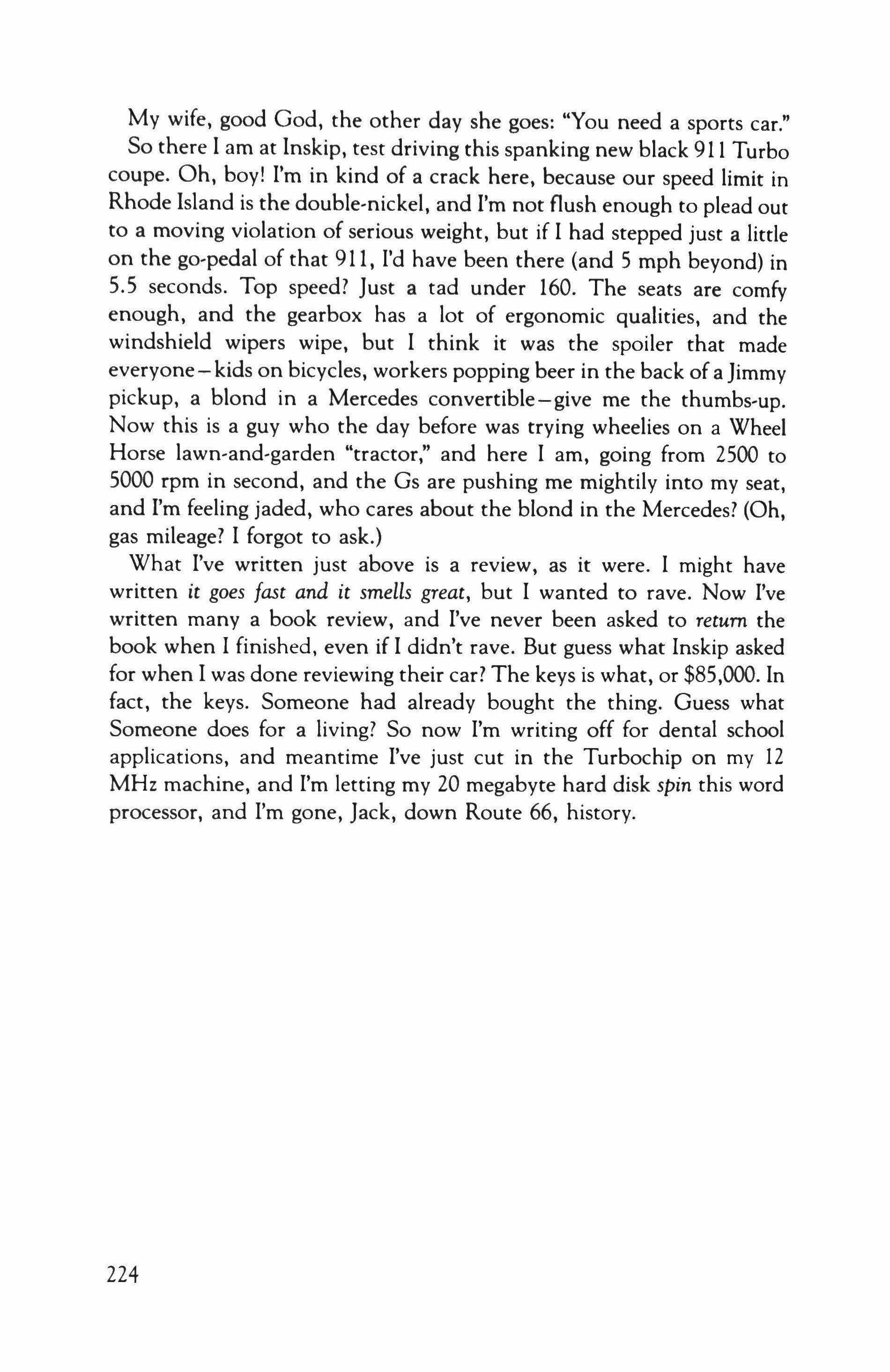
My wife, good God, the other day she goes: "You need a sports car." So there I am at lnskip, test driving this spanking new black 911 Turbo coupe. Oh, boy! I'm in kind of a crack here, because our speed limit in Rhode Island is the double-nickel, and I'm not flush enough to plead out to a moving violation of serious weight, but if I had stepped just a little on the go-pedal of that 911, I'd have been there (and 5 mph beyond) in 5.5 seconds. Top speed? Just a tad under 160. The seats are comfy enough, and the gearbox has a lot of ergonomic qualities, and the windshield wipers wipe, but I think it was the spoiler that made everyone - kids on bicycles, workers popping beer in the back of a Jimmy pickup, a blond in a Mercedes convertible-give me the thumbs-up. Now this is a guy who the day before was trying wheelies on a Wheel Horse lawn-and-garden "tractor," and here I am, going from 2500 to 5000 rpm in second, and the Gs are pushing me mightily into my seat, and I'm feeling jaded, who cares about the blond in the Mercedes? (Oh, gas mileage? I forgot to ask.)
What I've written just above is a review, as it were. I might have written it goes fast and it smells great, but I wanted to rave. Now I've written many a book review, and I've never been asked to return the book when I finished, even if I didn't rave. But guess what Inskip asked for when I was done reviewing their car? The keys is what, or $85,000. In fact, the keys. Someone had already bought the thing. Guess what Someone does for a living? So now I'm writing off for dental school applications, and meantime I've just cut in the Turbochip on my 12 MHz machine, and I'm letting my 20 megabyte hard disk spin this word processor, and I'm gone, Jack, down Route 66, history.
224
Contributors
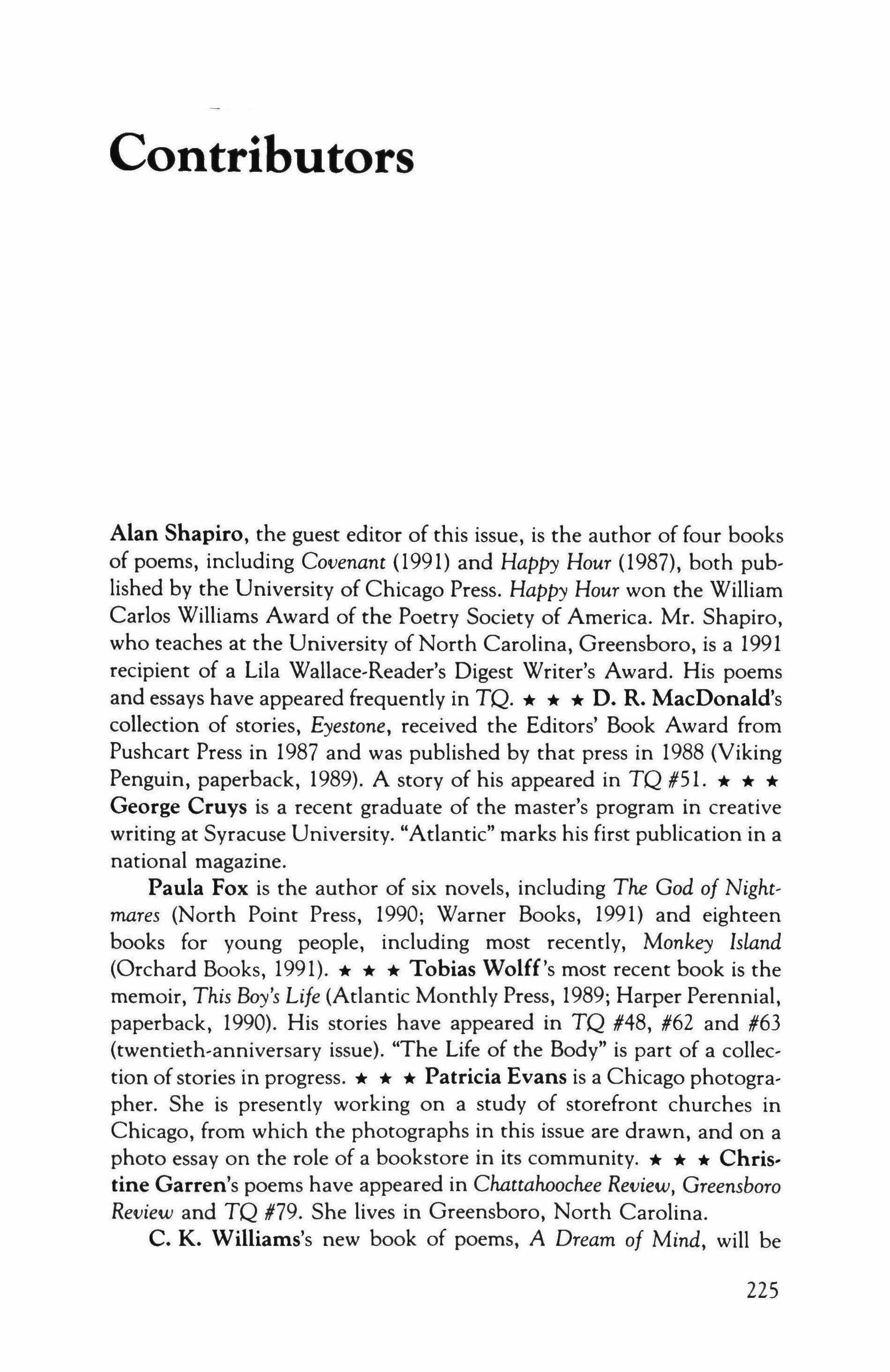
Alan Shapiro, the guest editor of this issue, is the author of four books of poems, including Covenant (1991) and Happy Hour (1987), both published by the University of Chicago Press. Happy Hour won the William Carlos Williams Award of the Poetry Society of America. Mr. Shapiro, who teaches at the University of North Carolina, Greensboro, is a 1991 recipient of a Lila Wallace#Reader's Digest Writer's Award. His poems and essays have appeared frequently in TQ. * * * D. R. MacDonald's collection of stories, Eyestone, received the Editors' Book Award from Pushcart Press in 1987 and was published by that press in 1988 (Viking Penguin, paperback, 1989). A story of his appeared in TQ #51. * * * George Cruys is a recent graduate of the master's program in creative writing at Syracuse University. "Atlantic" marks his first publication in a national magazine.
Paula Fox is the author of six novels, including The God of Night# mares (North Point Press, 1990; Warner Books, 1991) and eighteen books for young people, including most recently, Monkey Island (Orchard Books, 1991). * * * Tobias Wolff's most recent book is the memoir, This Boy's Life (Atlantic Monthly Press, 1989; Harper Perennial, paperback, 1990). His stories have appeared in TQ #48, #62 and #63 (twentieth-anniversary issue). "The Life of the Body" is part of a collection of stories in progress. * * * Patricia Evans is a Chicago photographer. She is presently working on a study of storefront churches in Chicago, from which the photographs in this issue are drawn, and on a photo essay on the role of a bookstore in its community. * * * Christine Garren's poems have appeared in Chattahoochee Review, Greensboro Review and TQ #79. She lives in Greensboro, North Carolina.
C. K. Williams's new book of poems, A Dream of Mind, will be
225
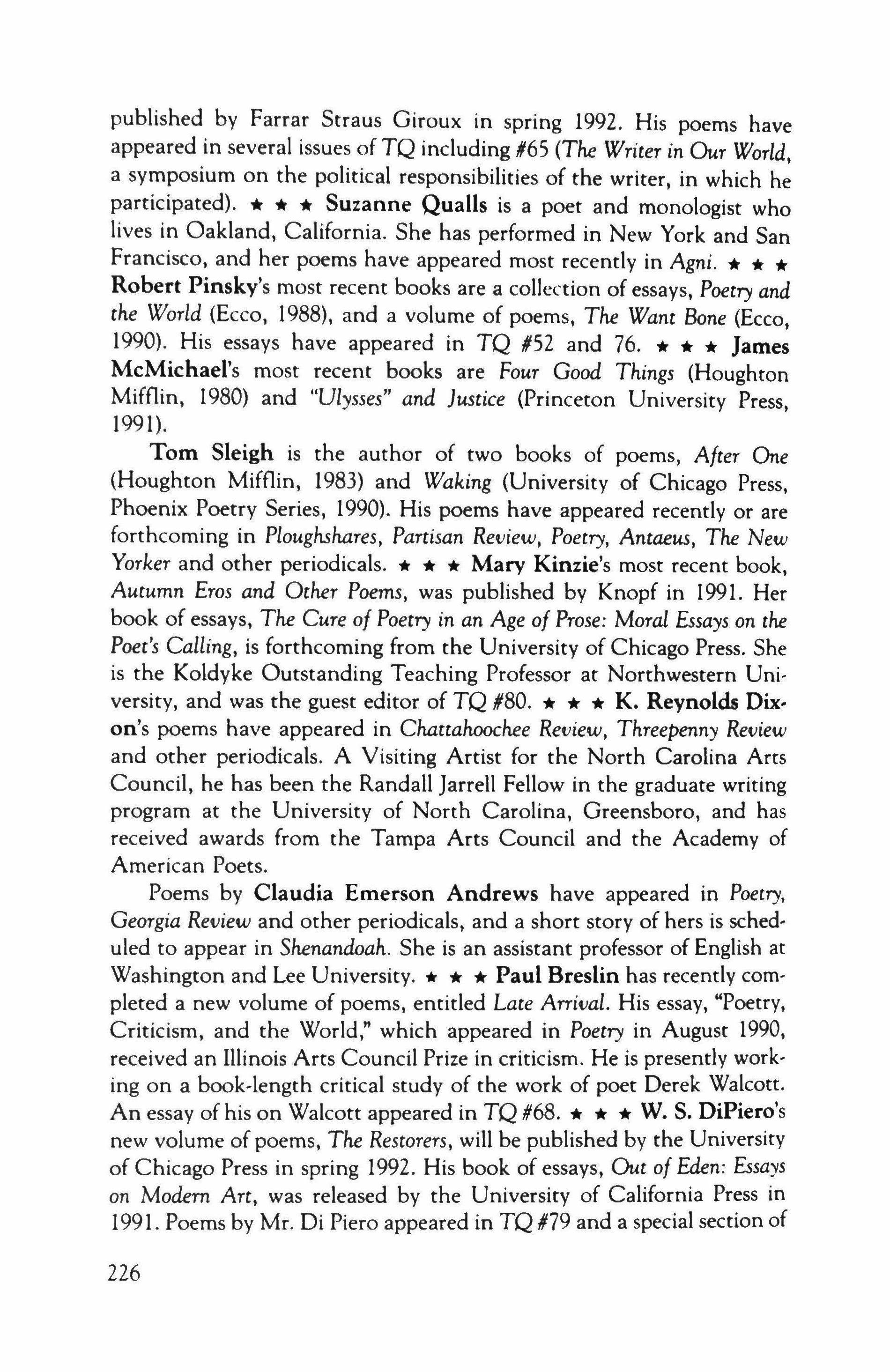
published by Farrar Straus Giroux in spring 1992. His poems have appeared in several issues of TQ including #65 (The Writer in Our World, a symposium on the political responsibilities of the writer, in which he participated). * * * Suzanne Qualls is a poet and monologist who lives in Oakland, California. She has performed in New York and San Francisco, and her poems have appeared most recently in Agni. * * * Robert Pinsky's most recent books are a collection of essays, Poetry and the World (Ecco, 1988), and a volume of poems, The Want Bone (Ecco, 1990). His essays have appeared in TQ #52 and 76. * * * James McMichael's most recent books are Four Good Things (Houghton Mifflin, 1980) and "Ulysses" and Justice (princeton University Press, 1991).
Tom Sleigh is the author of two books of poems, After One (Houghton Mifflin, 1983) and Waking (University of Chicago Press, Phoenix Poetry Series, 1990). His poems have appeared recently or are forthcoming in Ploughshares, Partisan Review, Poetry, Antaeus, The New Yorker and other periodicals. * * * Mary Kinzie's most recent book, Autumn Eros and Other Poems, was published by Knopf in 1991. Her book of essays, The Cure of Poetry in an Age of Prose: Moral Essays on the Poet's Calling, is forthcoming from the University of Chicago Press. She is the Koldyke Outstanding Teaching Professor at Northwestern University, and was the guest editor of TQ #80. * * * K. Reynolds Dixon's poems have appeared in Chattahoochee Review, Threepenny Review and other periodicals. A Visiting Artist for the North Carolina Arts Council, he has been the Randall Jarrell Fellow in the graduate writing program at the University of North Carolina, Greensboro, and has received awards from the Tampa Arts Council and the Academy of American Poets.
Poems by Claudia Emerson Andrews have appeared in Poetry, Georgia Review and other periodicals, and a short story of hers is scheduled to appear in Shenandoah. She is an assistant professor of English at Washington and Lee University. * * * Paul Breslin has recently completed a new volume of poems, entitled Late Arrival. His essay, "Poetry, Criticism, and the World," which appeared in Poetry in August 1990, received an Illinois Arts Council Prize in criticism. He is presently working on a book-length critical study of the work of poet Derek Walcott. An essay of his on Walcott appeared in TQ #68. * * * W. S. DiPiero's new volume of poems, The Restorers, will be published by the University of Chicago Press in spring 1992. His book of essays, Out of Eden: Essays on Modem Art, was released by the University of California Press in 1991. Poems by Mr. Di Piero appeared in TQ #79 and a special section of
226
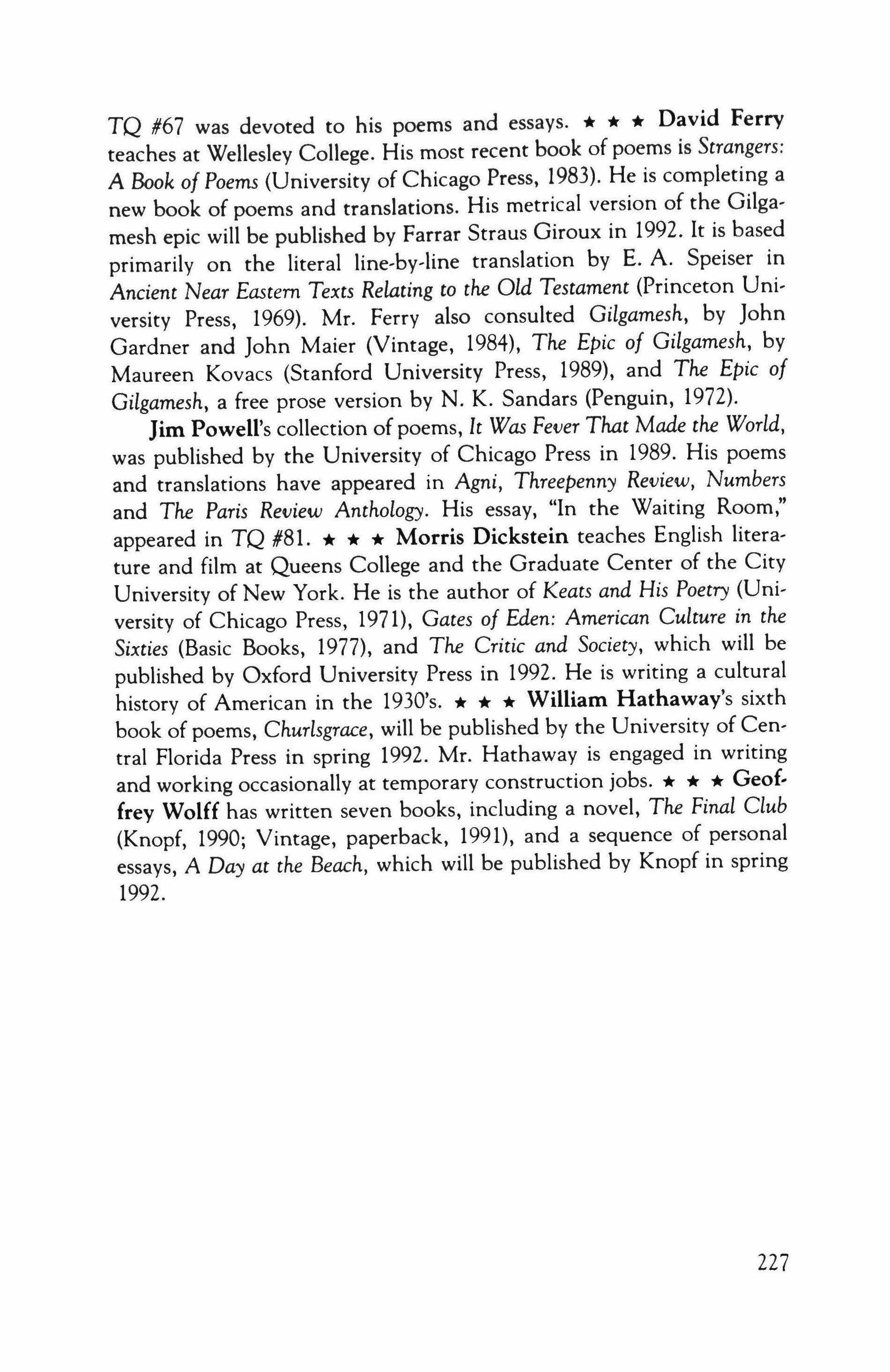
TQ #67 was devoted to his poems and essays. * * * David Ferry teaches at Wellesley College. His most recent book of poems is Strangers: A Book of Poems (University of Chicago Press, 1983). He is completing a new book of poems and translations. His metrical version of the Gilgamesh epic will be published by Farrar Straus Giroux in 1992. It is based primarily on the literal line-by-line translation by E. A. Speiser in Ancient Near Eastern Texts Relating to the Old Testament (Princeton University Press, 1969). Mr. Ferry also consulted Gilgamesh, by John Gardner and John Maier (Vintage, 1984), The EPic of Gilgamesh, by Maureen Kovacs (Stanford University Press, 1989), and The EPic of Gilgamesh, a free prose version by N. K. Sandars (Penguin, 1972).
Jim Powell's collection of poems, It Was Fever That Made the World, was published by the University of Chicago Press in 1989. His poems and translations have appeared in Agni, Threepenny Review, Numbers and The Paris Review Anthology. His essay, "In the Waiting Room," appeared in TQ #81. * * * Morris Dickstein teaches English literature and film at Queens College and the Graduate Center of the City University of New York. He is the author of Keats and His Poetry (University of Chicago Press, 1971), Gates of Eden: American Culture in the Sixties (Basic Books, 1977), and The Critic and Society, which will be published by Oxford University Press in 1992. He is writing a cultural history of American in the 1930's. * * * William Hathaway's sixth book of poems, Churlsgrace, will be published by the University of Central Florida Press in spring 1992. Mr. Hathaway is engaged in writing and working occasionally at temporary construction jobs. * * * Geof. frey Wolff has written seven books, including a novel, The Final Club (Knopf, 1990; Vintage, paperback, 1991), and a sequence of personal essays, A Day at the Beach, which will be published by Knopf in spring 1992.
227

"Not since James Agee and Robert Penn Warren has a southern writer displayed such masterful versatility." -Los Angeles Times
Y7(Ore c5hapes 7han One
�' A ':'8 0 0 K 0 F S TOR I. E S -�
"Marvelous renditions-sometimes exuberant, sometimes meditative, arcane or antic as circular as Borges, as richly symbolic as Kafka, and as zany as Woody Allen."
-K,rkll.r Reoieu»
"A Southern writer whose baroque, eloquent style pays litrle heed to minimalist trends. Chappell's writing is in the tradition of Ambrose Bierce and H.P. Lovecrafr."
-Pllbli.rher.r Weekly
:JreclChappeJf •••
S T. MAR TIN'S PRE S S
New York 10010 This Publication is available in Microform. University Microfilms International Plca\C '-Cnd ujdIlUIO.11 mtormauon 'mT� Namc In'tI1uth'''SIrCCL.._ Cuy State Z,p, 300 North Zeeb Road Dept PR Ann Arbor. M, 48106
175 Fifth Ave.,
THE PUSHCART PRZE
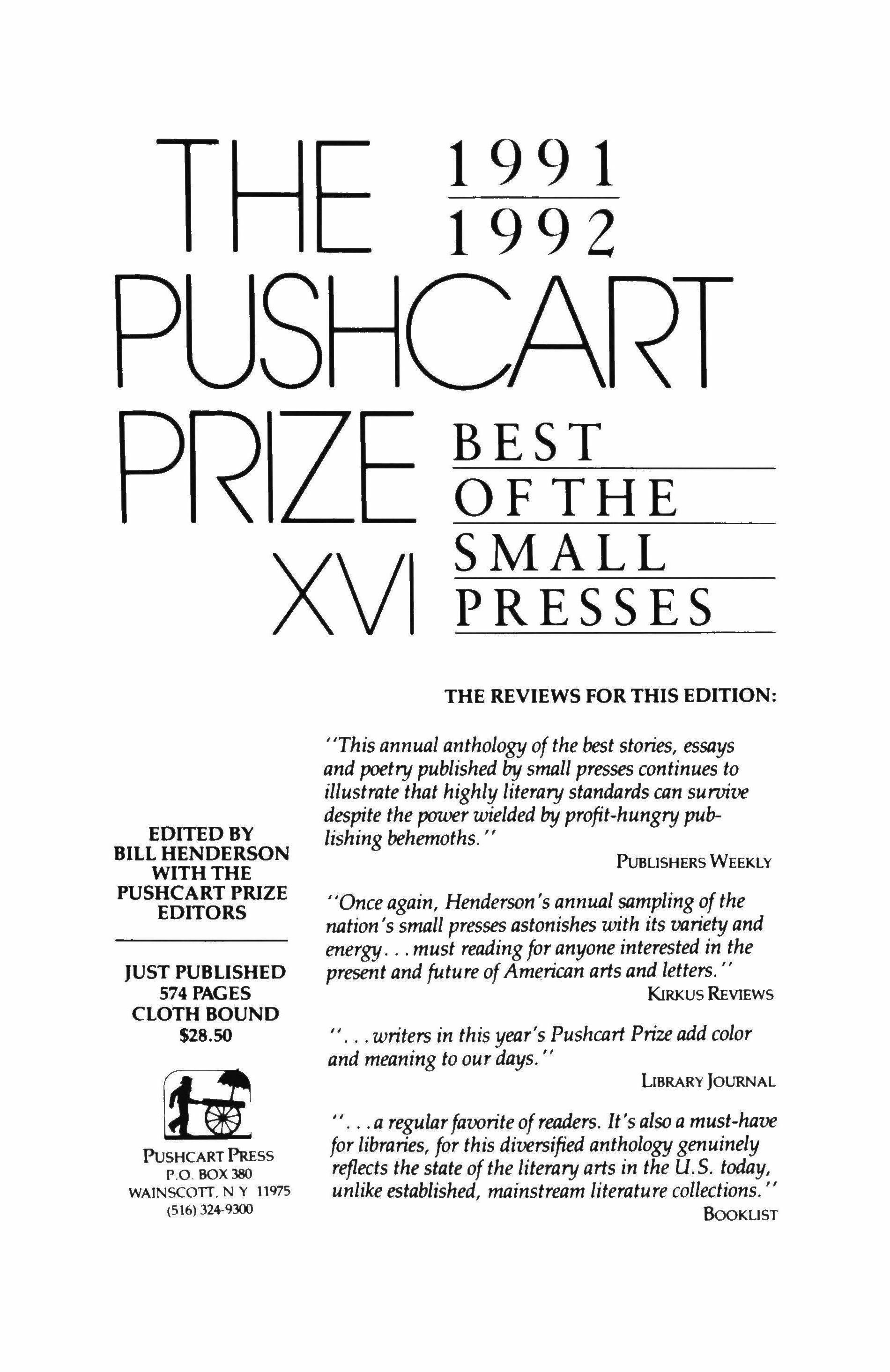 EDITED BY BILL HENDERSON
EDITED BY BILL HENDERSON
THE REVIEWS FOR THIS EDITION:
'This annual anthology of the best stories, essays and poetry published by small presses continues to illustrate that highly literary standards can suroioe despite the power wielded byprofit-hungrypublishing behemoths.
PuBLISHERS WEEKLY
"Once again, Henderson's annual sampling of the nation's small presses astonishes with its variety and energy must readingfor anyone interested in the present and future ofAmerican arts and letters.
KIRKUS REVIEWS writers in this year's Pushcart Prize add color and meaning to our days.
LIBRARY JOURNAL
a regularfavoriteofreaders. It's also a must-have for libraries, for this diversified anthologygenuinely reflects the state of the literary arts in the U. S. today, unlike established, mainstream literature collections.
BooKLlST
xv
THE PUSHCART PRIZE
JUST PUBLISHED 574 PAGES CLOTHBOUND $28.50 PuSHCART PREss
BOX380 WAINSCOTT, N Y 11975 (516) 324-9300 1991 1992 BEST OFTHE SMALL
WITH
EDITORS
r.o
PRESSES
the modern writer as witness
"Not easy, at any given time, to reckon a count of the literary magazines that this nation has the good luck to have such a bounty of But every so often it is time to welcome a new litmag that seems determined to make ofitselfsomething rather more than a mere additive, a small palliative. Such an enterprise is Witness. So that's what these sentences of mine aremy witness for Witness."
Gordon Lish
"Witness, fromfirst word to last, aims to make a difference-and does. It is loud and angry and serious -like fistfights, and literature, ought to be."
Lee K. Abbott

"Witness is one ofseveral excellent new literaryand intellectualjournals of the pastfew years that confirms our sense of the variety and scope of the imaginative life in the United States. Its focus upon thematic subjects is particularly valuable."
Joyce Carol Oates
Witness presents nationally known writers, as well as new talent, and highlights the role of the modem writer as witness.
• Witness blends the features of a literary and an issue-oriented magazine to appeal to alert readers in all walks of life.
• Witness will publish special issues on Autobiography in 1991, and Sports in America in 1992.
11111111
Oakland Community College Orchard Ridge Campus
27055 Orchard Lake Road
Farmington Hills, MI 48334
Individuals
1 yr/2 issues $12 2 yrs/4 issues $22
Institutions
$18
$34
Now available on cassette
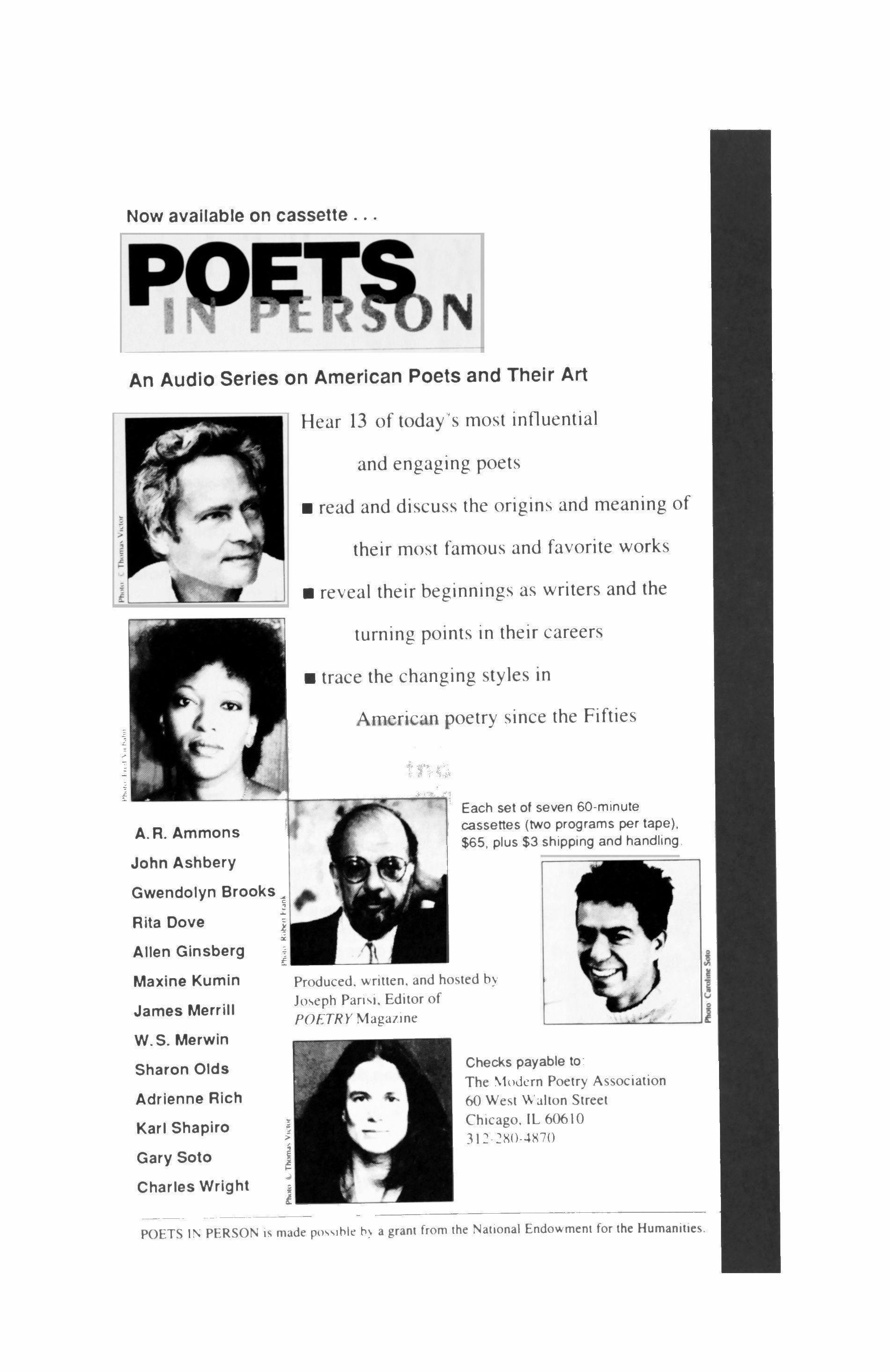
An Audio Series on American Poets and Their Art
Hear 13 of todays most influential
and engaging poets
• read and discuss the origins and meaning of their most famous and favorite works
• reveal their beginnings as writers and the turning points in their careers
• trace the changing styles in American poetry since the Fifties
A.R. Ammons
John Ashbery
Gwendolyn Brooks]
Rita Dove
Allen Ginsberg
Maxine Kumin
James Merrill
W.S. Merwin
Sharon Olds
Adrienne Rich
Karl Shapiro
Gary Soto
Charles Wright
Each set of seven 60-minute cassettes (two programs per tape). $65. plus $3 shipping and handling
Checks payable to' The 'lodern Poetry Association 60 West Walton Street Chicago. IL 60610 31:' C Si)·"X 70
Produced. written. and hosted by Joseph Panvi, Editor of POETRY Magazine
POETS 11' PERSON IS made povvrb!e h\ a grant from the Nanonal Endowment for the Humaniues.
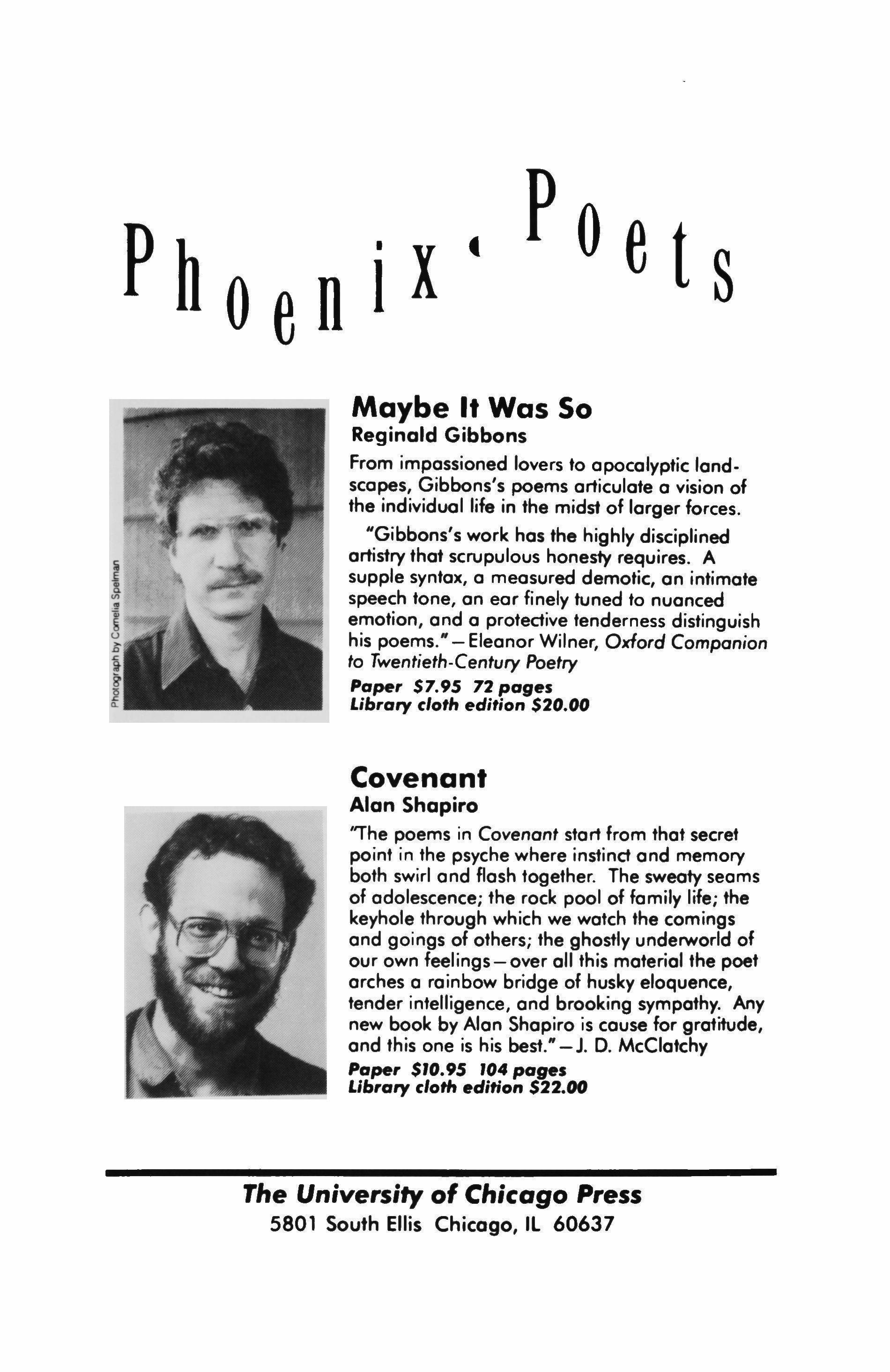
Maybe It Was So Reginald Gibbons
From impassioned lovers to apocalyptic landscapes, Gibbons's poems articulate a vision of the individual life in the midst of larger forces.
"Gibbons's work has the highly disciplined artistry that scrupulous honesty requires. A supple syntax, a measured demotic, an intimate speech tone, an ear finely tuned to nuanced emotion, and a protedive tenderness distinguish his poems.· - Eleanor Wilner, Oxford Companion to Twentieth-Century Poetry
Paper $7.95 72 pages
Library cloth edition $20.00
Covenant
Alan Shapiro
''The poems in Covenant start from that secret point in the psyche where instind and memory both swirl and flash together. The sweaty seams of adolescence; the rock pool of family life; the keyhole through which we watch the comings and goings of others; the ghostly underworld of our own feelings-over all this material the poet arches a rainbow bridge of husky eloquence, tender intelligence, and brooking sympathy. Any new book by Alan Shapiro is cause for gratitude, and this one is his best: -J. D. McClatchy
Paper $JO.95 J04 pages
Library cloth edition $22.00
The University of Chicago Press 5801 South Ellis Chicago, Il 60637
AMERICAN VOICE
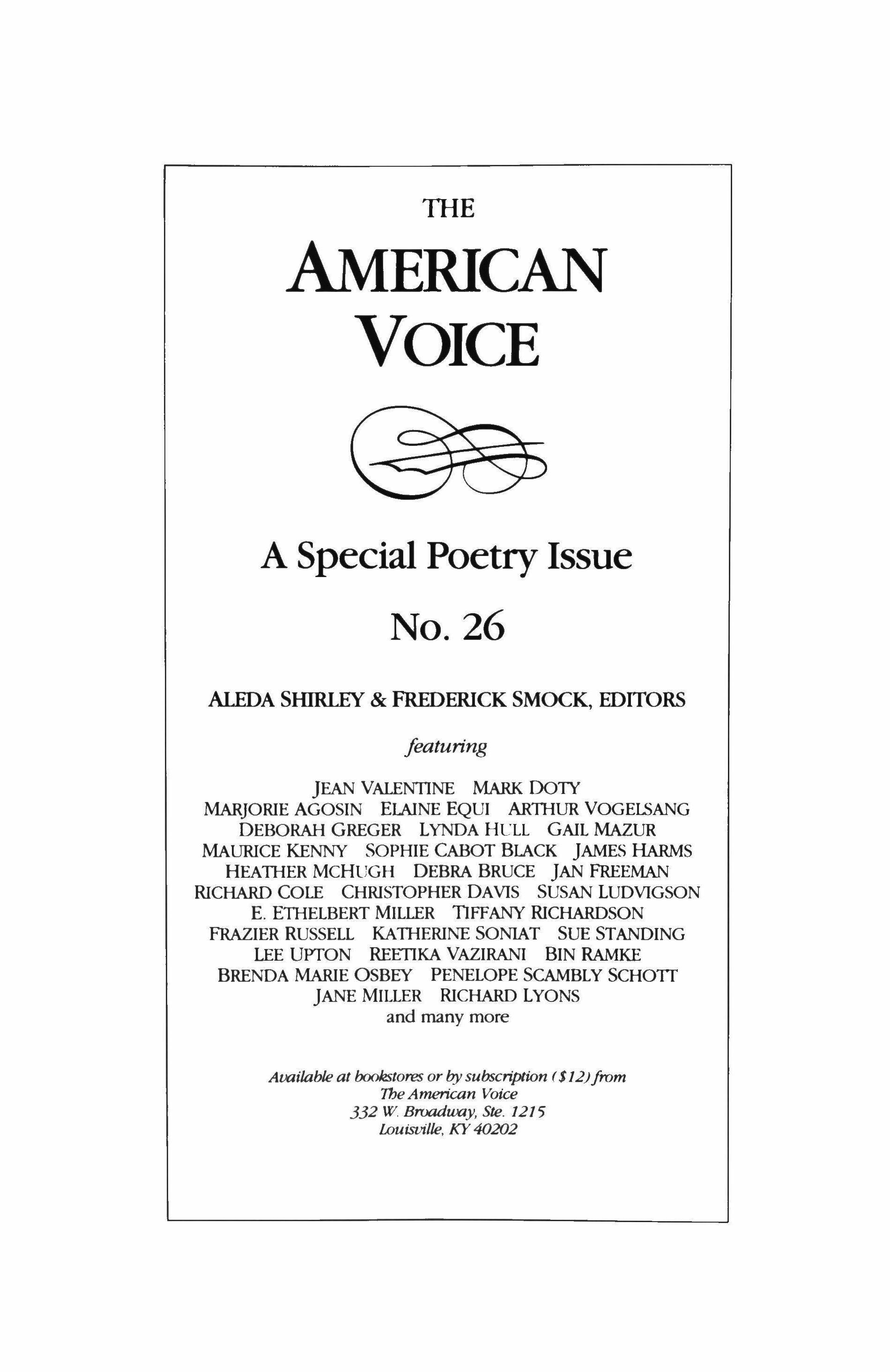
A Special Poetry Issue No.
26
ALEDA SlDRLEY & FREDERICK SMOCK, EDITORS featuring
JEAN VALENTINE MARK oorv
MARJORIE AGOSIN ElAINE EQUI ARTIIUR VOGELSANG
DEBORAH GREGER LYNDA HUL GAIL MAZUR
MAURICE KENNY SOPHIE CABOT BLACK JAMES HARMS
HEATIIER MCHUGH DEBRA BRUCE JAN FREEMAN
RICHARD COLE CHRISTOPHER DAVIS SUSAN LUDVIGSON
E. ETIIELBERT MILLER TIFFANY RICHARDSON
FRAZIER RUSSELL KATIIERINE SONIAT SUE STANDING
LEE UPTON REETIKA VAZIRANI BIN RAMKE
BRENDA MARIE OSBEY PENELOPE SCAMBLY SCHOTT
JANE MILLER RICHARD LYONS and many more
TIlE
Available at bookstores or trysubscription ($12)from The American Voice 332 W. Broadway, Ste. 1215 Louisville, KY 40202
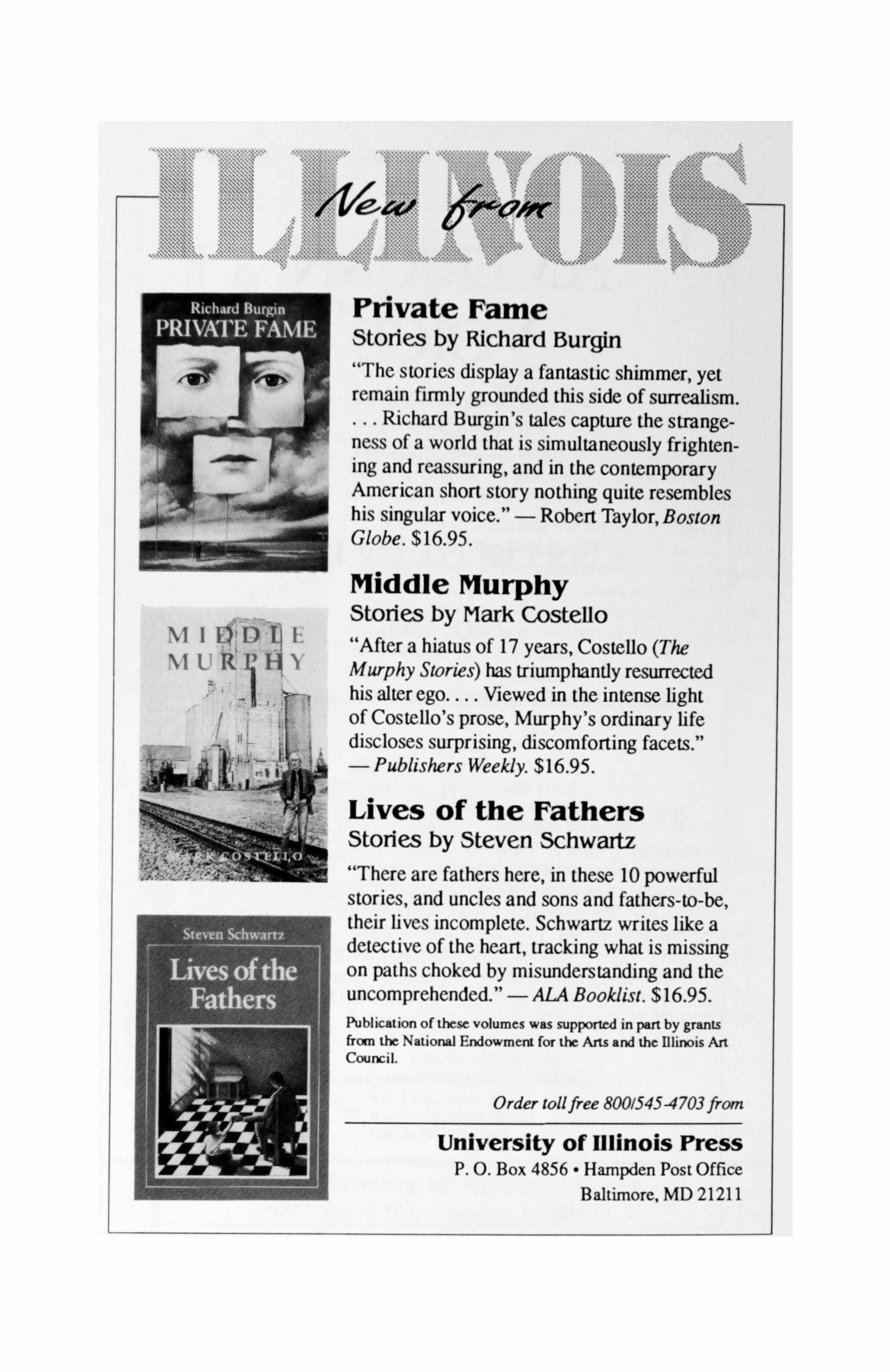
Private Fame
Stories by Richard Burgin
"The stories display a fantastic shimmer, yet remain firmly grounded this side of surrealism Richard Burgin's tales capture the strangeness of a world that is simultaneously frightening and reassuring, and in the contemporary American short story nothing quite resembles his singular voice." - Robert Taylor, Boston Globe. $16.95.
Middle Murphy
Stories by Mark Costello
"After a hiatus of 17 years, Costello (The Murphy Stories) has triumphantly resurrected his alter ego Viewed in the intense light of Costello's prose, Murphy's ordinary life discloses surprising, discomforting facets." - Publishers Weekly. $16.95.
Lives of the Fathers
Stories by Steven Schwartz
"There are fathers here, in these 10 powerful stories, and uncles and sons and fathers-to-be, their lives incomplete. Schwartz writes like a detective of the heart, tracking what is missing on paths choked by misunderstanding and the uncomprehended." - ALA Booklist. $16.95.
Publication of these volumes was supported in part by grants from the National Endowment for the Arts and the Dlinois Art Council. Order tollfree 80015454703from University of Dlinois Press P. O. Box 4856 Hampden Post Office Baltimore, MD 21211
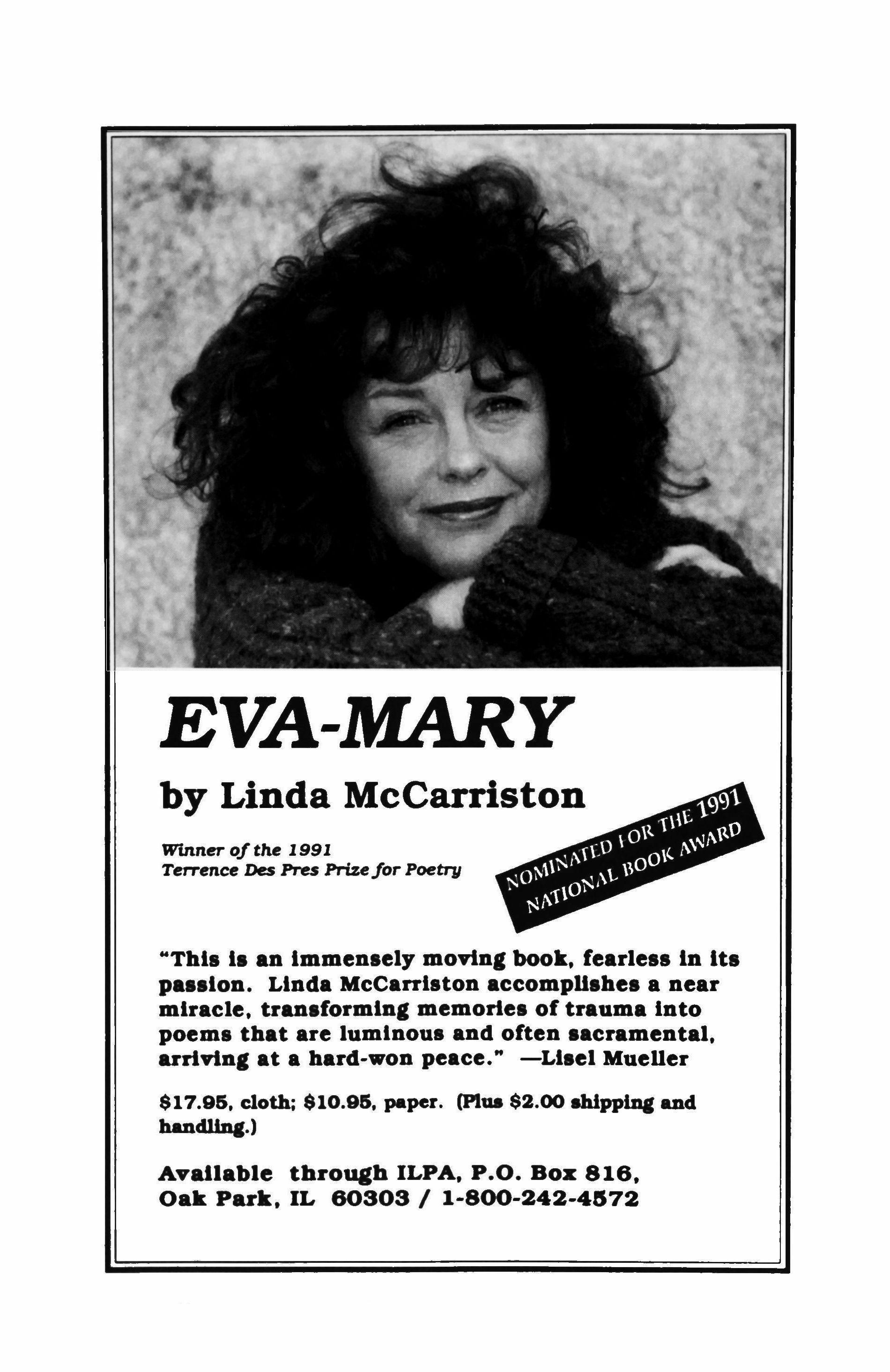
EVA-MARY by Linda McCarriston Winner of the 1991 TerTence Des Pres Priufor Poetrg "This I. an Immensely moving book, fearless In Its pa.slon. Linda McCarrlston accompUshes a near miracle, tran.formlng memories of trauma Into poems that are luminous and often .acramental, arriving at a hard-won peace." -LiseI Mueller $17.95. cloth; $10.95. paper. (PIa $2.00 8hlppm, and banclllDa·) Available throUlh ILPA, P.O. BOl[ 816, Oak Park, IL 60303 I 1-800-242-4572
Rock & Roll and Culture
90:4 (Foil 1991 )
Anthony DeCurtis, speciol issue editor
Robert Polmer on the Chunh of the Soni( Guitor
Trent Hill on Censorship in Ro(k Musi( in the 1950's
Greil Mor(Us's "A Corpse in Your Mouth"
Glenn Goss osks Why Don't We Do It in the Clossroom?
Poul Smith on Ploying for Englond
Dovid R. Shumway on RO(k & Roll os Culturol Prom(e
Robert B. Roy on Tro(king
Mork Dery on Lourie Anderson's Crisis of Meaning
Mi(hoel JorreH on the Progress of RO(k & Roll
Poul Evons's "Los Angeles, 1999"
Murtho Nell Smith on Sexuol Mobilities in Bru(e Springsteen
Alon Light on Rop's R8(urrent Conflict
Don Rubey on Desire ond Pleasure on MTV
Jeff Colder's Observotions on Ufe in 0 RO(k & Roll Bond
Subs(ription pri(es: S20 individuols, S40 institutions
Pleose odd S8 for postoge outside the U.S.
Single issue prke: S10
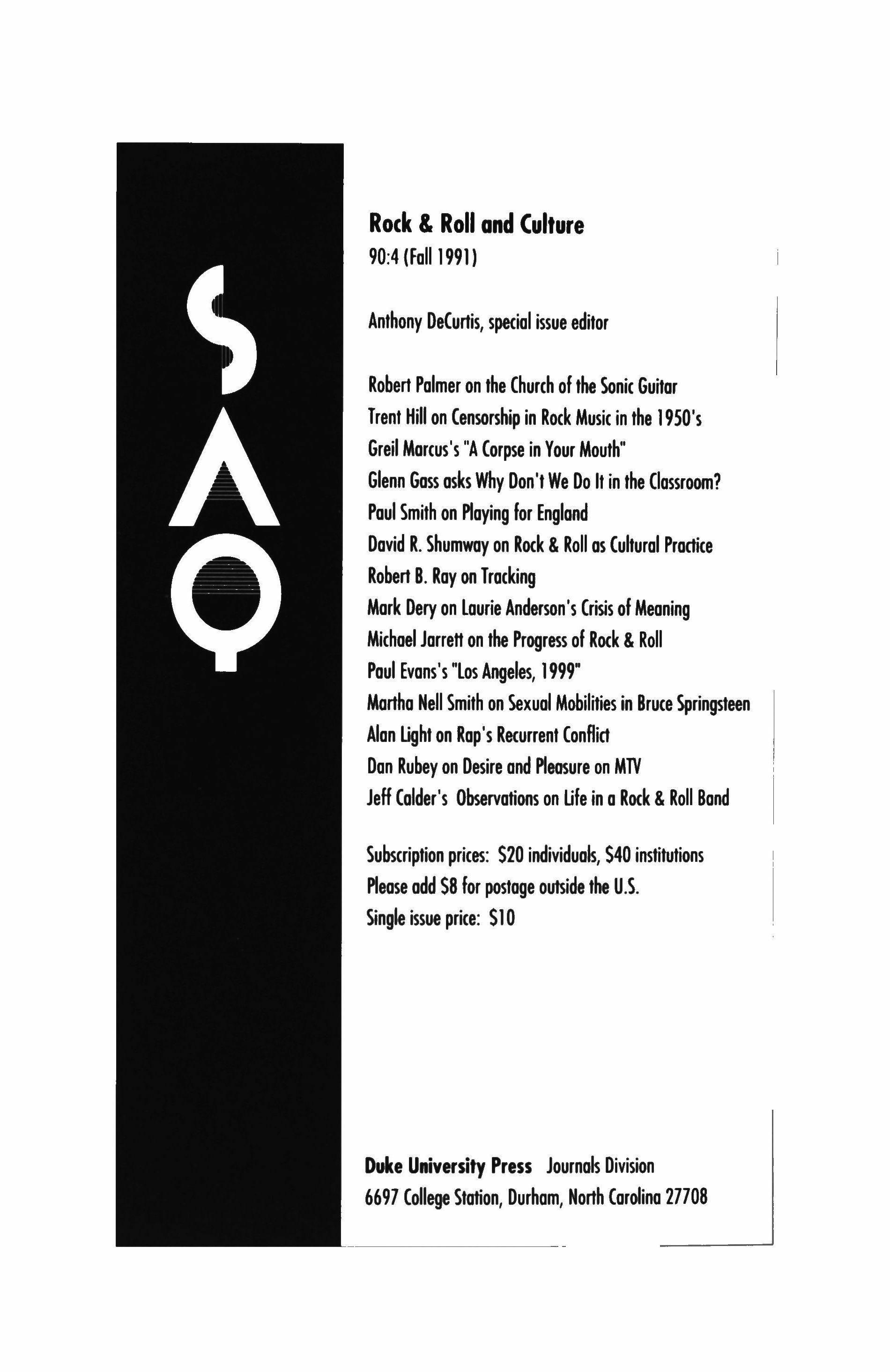
Duke U.iversity Press Journols Division
6697 College Station, Durhom, North Corolino 27708
Harriet Rubin's Mother's Wooden Hand
Susan Hahn
Harriet Rubin s Mothers Wooden Hand is a superb book, passionate and moving, yet put together with considerable elegance and control. found it gripping and consistently involving. A very remarkable first book.",-Frank Bidart
Paper $8.95 96 pages
Cloth $22.00
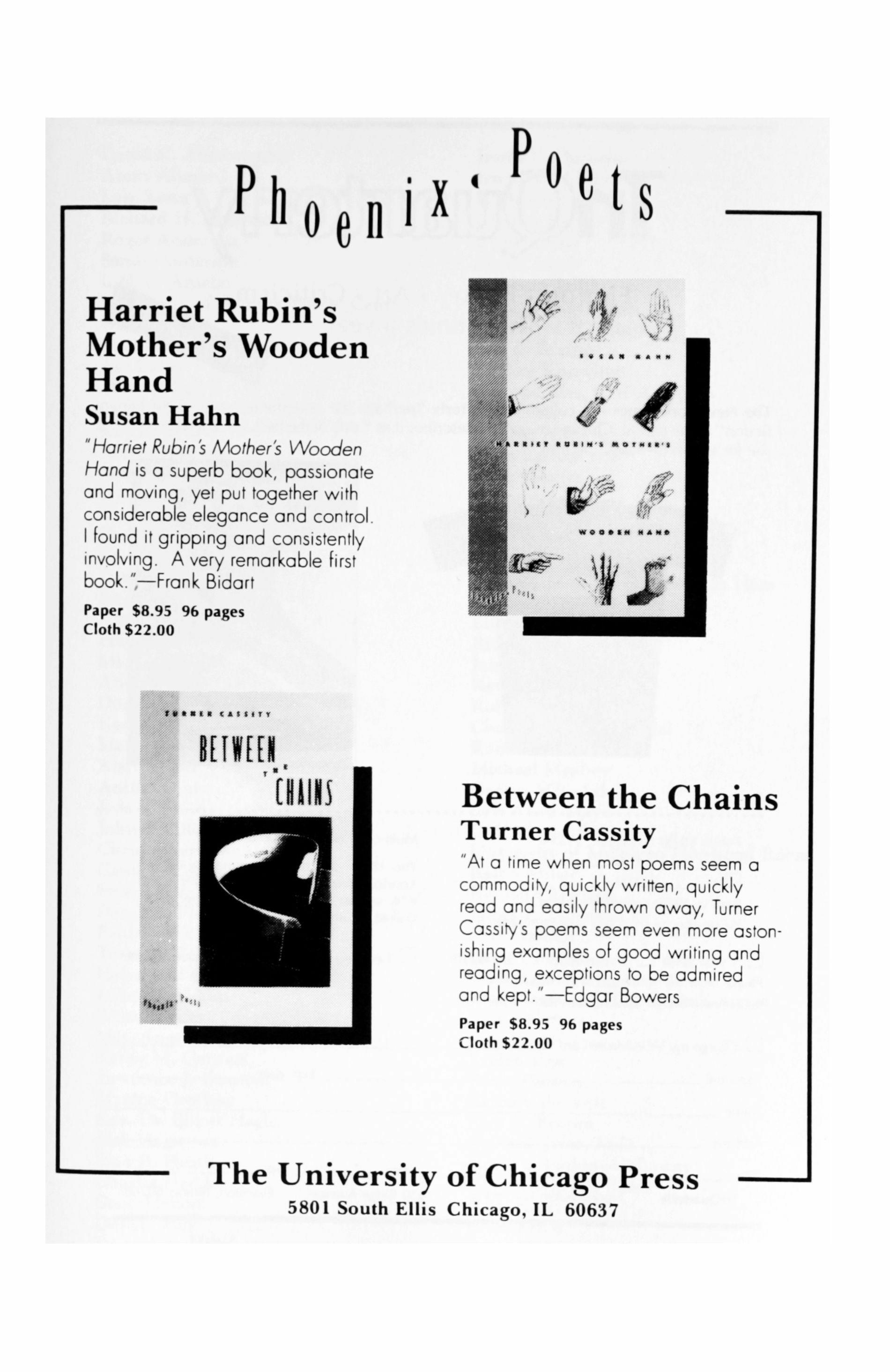
Between the Chains
Turner Cassity
"At a time when most poems seem a commodity, quickly written, quickly read and easily thrown away, Turner Cassity's poems seem even more aston' ishing examples of good writing and reading, exceptions to be admired and kept."-Edgar Bowers
Paper $8.95 96 pages
Cloth $22.00
Ph 'x·
o e n I
POets
''1" II: l. (._". r y HTWHN
r�iI.S
r
The University of Chicago Press 5801 South Ellis Chicago,IL 60637
Fiction Poetry. Art Criticism
Three times a year
The New York Times has called TriQuarterly "perhaps the pre-eminent journal for literary fiction" in the nation. Chicago magazine describes it as one of the best, issue after issue." But see for vourself-esubscnbe now

T-�hlrt: $9.00 Sweatshrrt: S 15.00 Ds D M
o l 0 Xl
Both In 50/50 cotton/poly blend. Please speCify vrzes and quantities desired.
01 year ($18) 0 2year�($32) 0 life ($250l
Please enter my subscnpnon to T"Quarterly magazine (Foreign subscnpnons add $4 per year)
o Charge my VISAlMa�terCard 11'
Multi-color poster: $9 00 0
ThiS 18" 24" poster. designed by Gin! Kondzrolka and featured as the cover of TQ #74. will be shipped In a sturdv, �peCially c rarted mailing tube.
o I enclose $ 0 Please bill me
Signature Exp. date
Name Addre" City State ZiP TriQuarterly Northwestern Uruversrtv 2020 Ridge Avenue Evanston. llhnors 60208
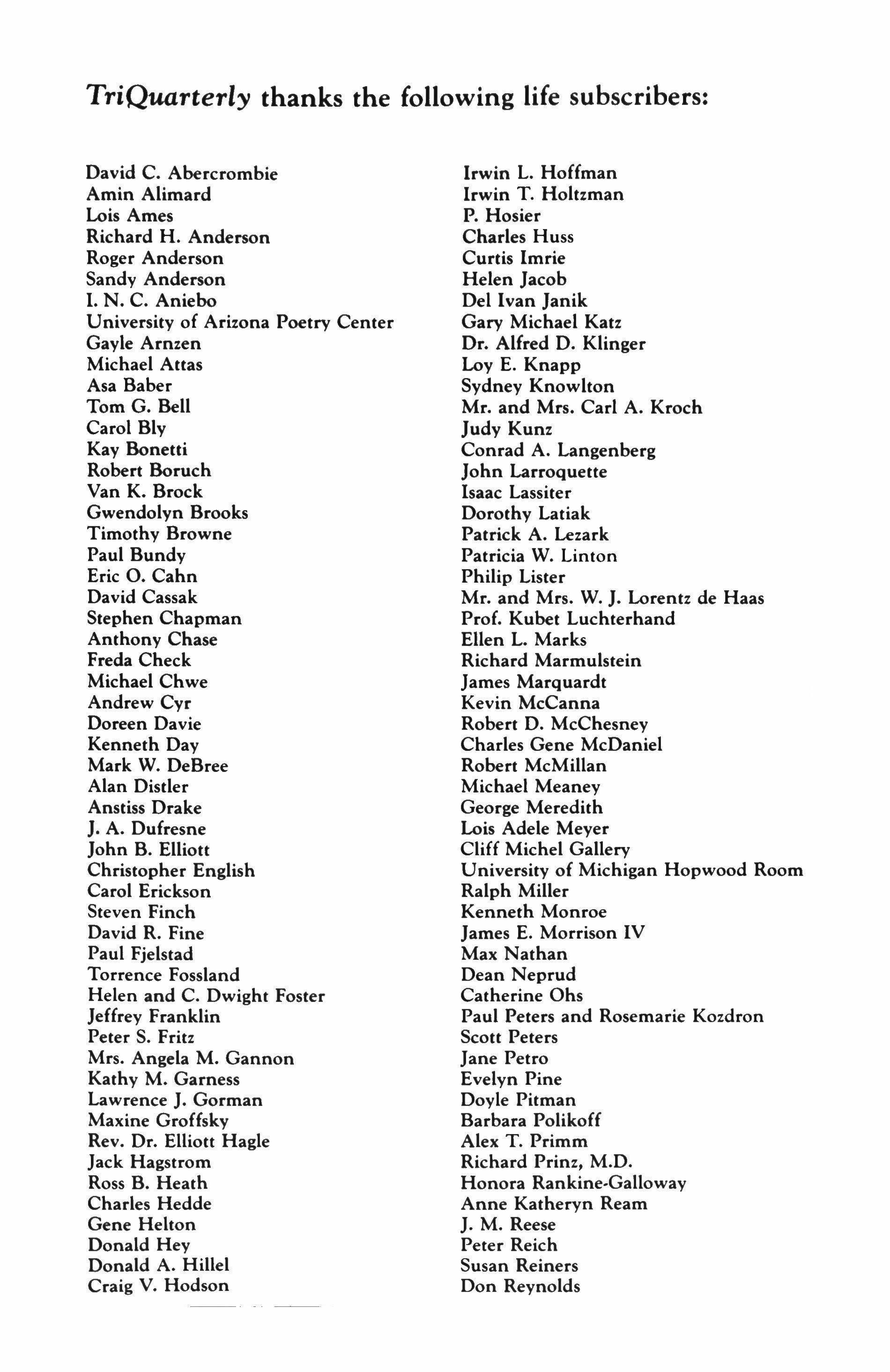
TTiQuaTteTly thanks the following life subscribers:
David C. Abercrombie
Amin Alimard
Lois Ames
Richard H. Anderson
Roger Anderson
Sandy Anderson
1. N. C. Aniebo
University of Arizona Poetry Center
Gayle Arnzen
Michael Attas
Asa Baber
Tom G. Bell
Carol Bly
Kay Bonetti
Robert Boruch
Van K. Brock
Gwendolyn Brooks
Timothy Browne
Paul Bundy
Eric O. Cahn
David Cassak
Stephen Chapman
Anthony Chase
Freda Check
Michael Chwe
Andrew Cvr
Doreen Davie
Kenneth Day
Mark W. DeBree
Alan Distler
Anstiss Drake
J. A. Dufresne
John B. Elliott
Christopher English
Carol Erickson
Steven Finch
David R. Fine
Paul Fjelstad
Torrence Fossland
Helen and C. Dwight Foster
Jeffrey Franklin
Peter S. Fritz
Mrs. Angela M. Gannon
Kathy M. Garness
Lawrence J. Gorman
Maxine Groffsky
Rev. Dr. Elliott Hagle
Jack Hagstrom
Ross B. Heath
Charles Hedde
Gene Helton
Donald Hey
Donald A. Hillel
Craig V. Hodson
Irwin L. Hoffman
Irwin T. Holtzman
P. Hosier
Charles Huss
Curtis Imrie
Helen Jacob
Del Ivan Janik
Gary Michael Katz
Dr. Alfred D. Klinger
Loy E. Knapp
Sydney Knowlton
Mr. and Mrs. Carl A. Kroch
Judy Kunz
Conrad A. Langenberg
John Larroquette
Isaac Lassiter
Dorothy Latiak
Patrick A. Lezark
Patricia W. Linton
Philip Lister
Mr. and Mrs. W. J. Lorentz de Haas
Prof. Kubet Luchterhand
Ellen L. Marks
Richard Marmulstein
James Marquardt
Kevin McCanna
Robert D. McChesney
Charles Gene McDaniel
Robert McMillan
Michael Meaney
George Meredith
Lois Adele Meyer
Cliff Michel Gallery
University of Michigan Hopwood Room
Ralph Miller
Kenneth Monroe
James E. Morrison IV
Max Nathan
Dean Neprud
Catherine Ohs
Paul Peters and Rosemarie Kozdron
Scott Peters
Jane Petro
Evelyn Pine
Doyle Pitman
Barbara Polikoff
Alex T. Primm
Richard Prinz, M.D.
Honora Rankine-Galloway
Anne Katheryn Ream
J. M. Reese
Peter Reich
Susan Reiners
Don Reynolds
Christopher Richter
Diane Rider
Rivier College
Sam Rosenthal
David Roth, M.D.
Jim Rowe
Patricia Ruby
Joan Rybka
Joel Schilling, D.D.S.
Paul and June Schlueter, Ph.D.s
Mrs. H. C. Schmidt
Robert 1. Schneideman
Hart Frank Schulz
Koji Seki
David A. Selby
Herbert Shore
John Silbersack
Martin Silverman
Gregory F. Smolarek
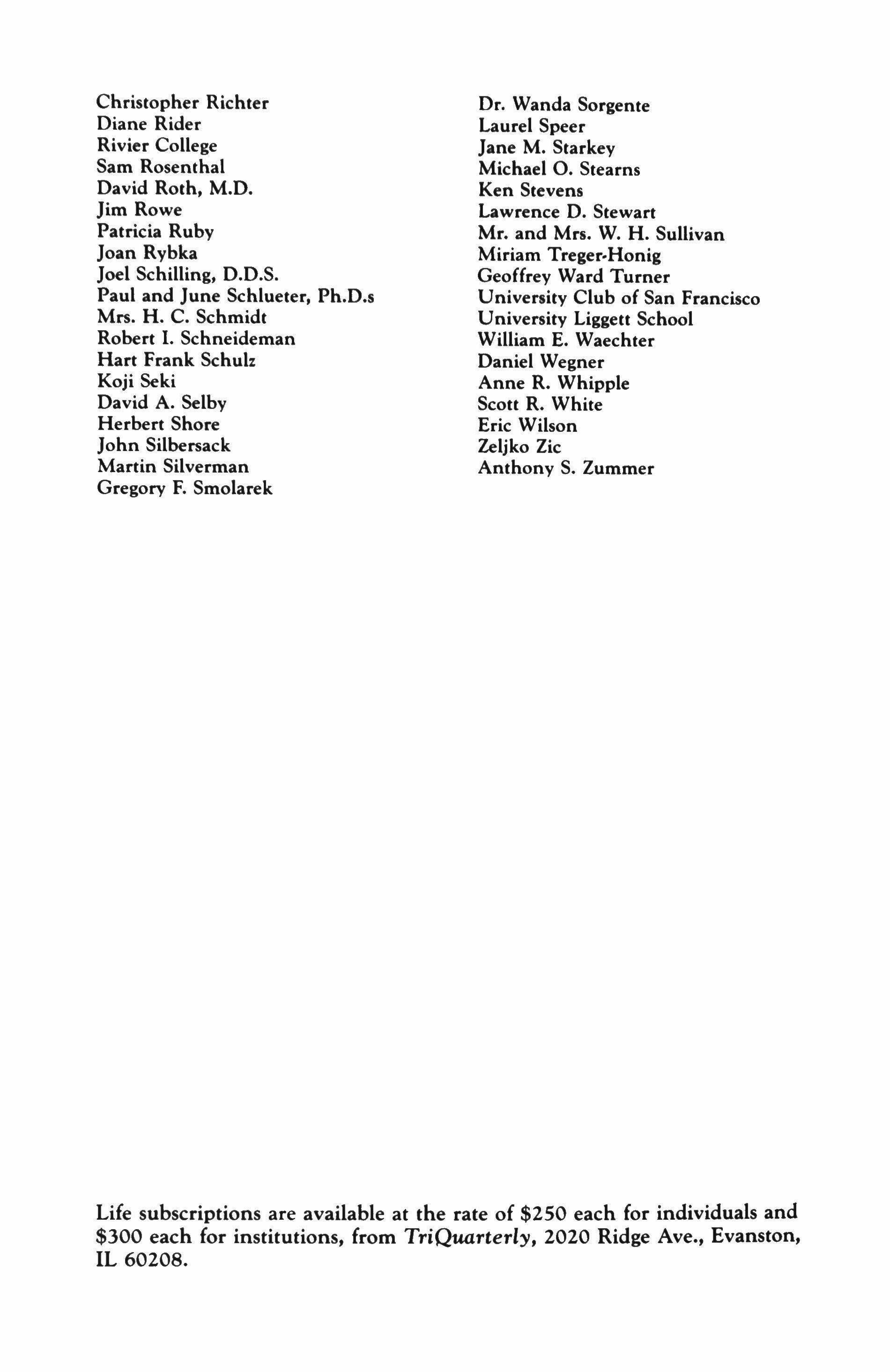
Dr. Wanda Sorgente
Laurel Speer
Jane M. Starkey
Michael O. Stearns
Ken Stevens
Lawrence D. Stewart
Mr. and Mrs. W. H. Sullivan
Miriam Treger-Honig
Geoffrey Ward Turner
University Club of San Francisco
University Liggett School
William E. Waechter
Daniel Wegner
Anne R. Whipple
Scott R. White
Eric Wilson
Zeljko lic
Anthony S. lummer
Life subscriptions are available at the rate of $250 each for individuals and $300 each for institutions, from TriQuarterly, 2020 Ridge Ave., Evanston, IL 60208.
We wish to express our thanks to the following donors to TriQuartt'rly:
TriQuarterly Council

Lee Philip Bell
Simon J. Blattner, Jr.
Mr. and Mrs. Andrew K. Block
William Brashler
Mr. and Mrs. Richard S. Brennan
Willard Cook
Melvin P. Firestone, M.D.
Mr. and Mrs. Solway F. Firestone
Mr. and Mrs. Stanford J. Goldblatt
Mrs. Donald Haider
Mrs. Heidi Hall-Jones
Mr. and Mrs. Daggett Harvey, Jr.
Mrs. James E. Hayes
Mr. and Mrs. David C. Hilliard
Mr. and Mrs. Thomas D. Hodgkins
Mr. and Mrs. C. Hadlai Hull
Ward Just
Mr. and Mrs. Martin J. Koldvke
Mr. and Mrs. David W. Maher
Florence D. McMillan
Mr. and Mrs. Andrew McNally IV
Marcia Lee Masters
Michal Miller
FredS.Novy
Mary Ellen Reynolds
Mrs. Richard Rinella
Roberta Rubin
Mrs. Earl W. Shapiro
Mr. and Mrs. Raymond I. Skilling
Judith Thornburg
Scott Turow
Charles A. Whittingham
Friends of TriQuarterly
Mr. and Mrs. Walter L Adams
Laurence Barasa
Hadassah Baskin
Sandra Berris
Sallie Bingham
Mr. and Mrs. William Cottle
Robert A. Creamer
Mr. and Mrs. James L. Currie
Elizabeth Des Pres
Mr. and Mrs. Barry L. Maclean
Charles T. Martin, Jr.
Ms. Jane Mayer
Mrs. Robert Mayer
William T. Morgan
Martin H. McGrath
Mrs. Marlene Welsh Phillips (Benefactor)
Fran Podulka
Barbara Polikoff
Mr. and Mrs. Donald Egan (patron) Geraldine R. Pratt
Mr. and Mrs. H. Bernard Firestone
Patricia P. Flenrve
Mr. and Mrs. C. Dwight Foster
Anne Gottlieb
Mr. and Mrs. Patrick Gramm
Mrs. Melvin Gray
Joann B. Griffith
Mr. and Mrs. John Hartigan
Mary Gray Hughes
Kenneth J. James
Fran Katz (patron)
Shelley Korshak
Rebecca Riley
Ms. Jennie Ritchie
Deborah N. Rosen
Faye Schwimmer
Gilaine Shindelman (Benefactor)
Lyn M. Sils
Allen R. Smart
Ruth Smith
Mr. and Mrs. Jules N. Stiffel
Mr. and Mrs. Raymond Suekoff
Geraldine Szymanski
The TriQuarterly Council and the Friends of TriQuarterly support the publica. tion of TriQuarterly Books and other projects of TriQt.u,trterly magazine. For information about both groups, please write to the editor.
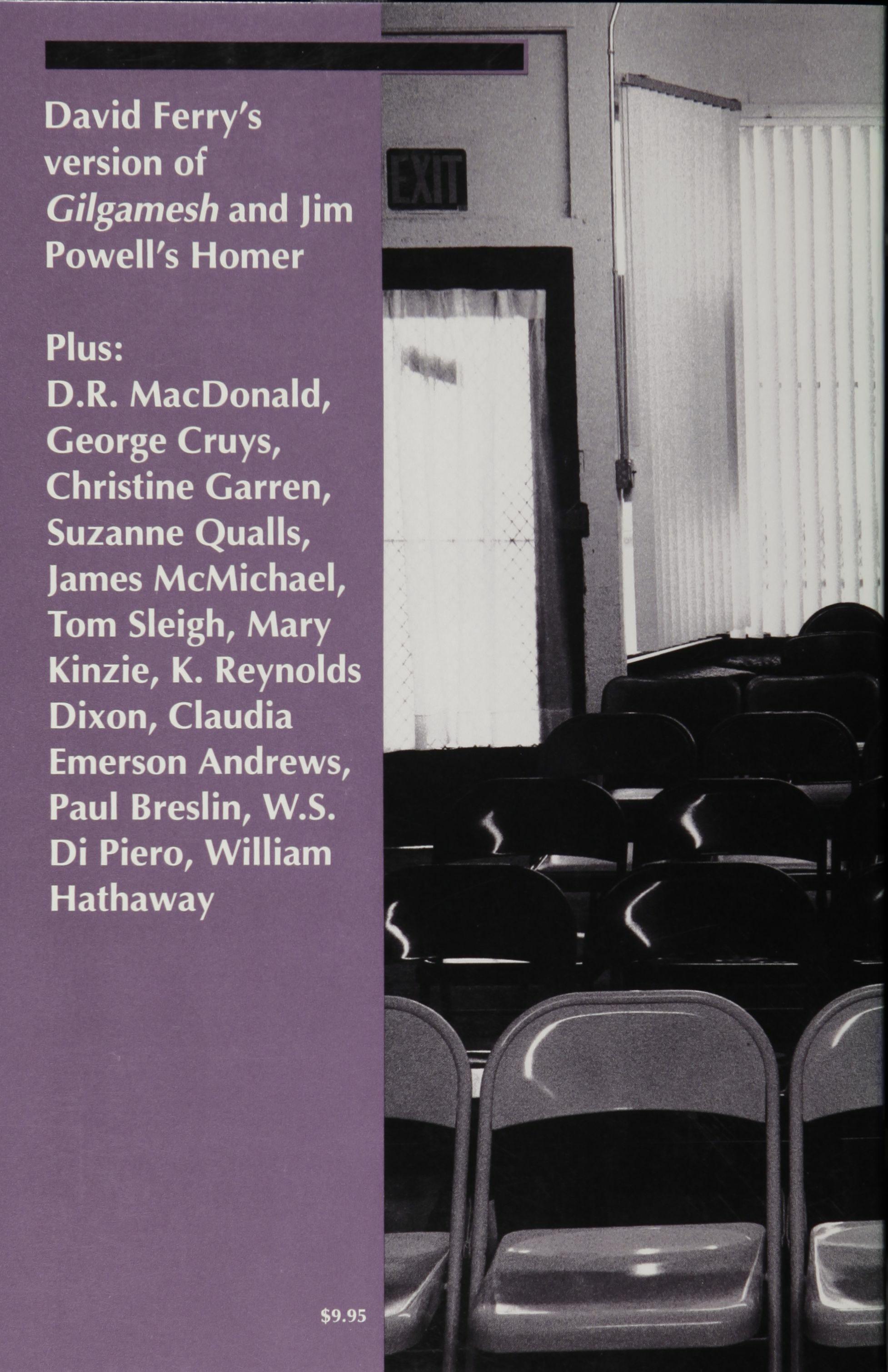




































































 Precious Stone Bible Church, 75th and Champlain Streets, Chicago
Precious Stone Bible Church, 75th and Champlain Streets, Chicago
 Body of Christ Faith Ministries, 95th and Halsted Streets, Chicago
Body of Christ Faith Ministries, 95th and Halsted Streets, Chicago
 Abundant Love Baptist Church, 79th and Halsted Streets, Chicago
Abundant Love Baptist Church, 79th and Halsted Streets, Chicago

 Bishop R. Simmons, founder and pastor, St. Peter's Temple of Love, 71st Street and Cottage Grove Avenue, Chicago
Bishop R. Simmons, founder and pastor, St. Peter's Temple of Love, 71st Street and Cottage Grove Avenue, Chicago
 Body of Christ Faith Ministries, 95th and Halsted Streets, Chicago
Body of Christ Faith Ministries, 95th and Halsted Streets, Chicago
 New Mount Pilgrim MB Church, Homan Avenue and Jackson Boulevard, Chicago
New Mount Pilgrim MB Church, Homan Avenue and Jackson Boulevard, Chicago
 New Mount Pilgrim MB Church, Homan Avenue and Jackson Boulevard,
New Mount Pilgrim MB Church, Homan Avenue and Jackson Boulevard,
 Hope Tabernacle, 63rd Street and Martin Luther King Drive, Chicago
Hope Tabernacle, 63rd Street and Martin Luther King Drive, Chicago
 Hope Tabernacle, 63rd Street and Martin Luther King Drive, Chicago
Hope Tabernacle, 63rd Street and Martin Luther King Drive, Chicago
















 fOT Joel Fineman
fOT Joel Fineman













 for Zivile Bilaisis
for Zivile Bilaisis









































































 for Alfred Ka?:in
for Alfred Ka?:in













































 EDITED BY BILL HENDERSON
EDITED BY BILL HENDERSON












